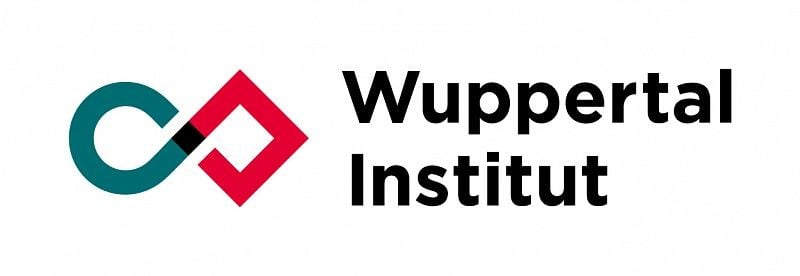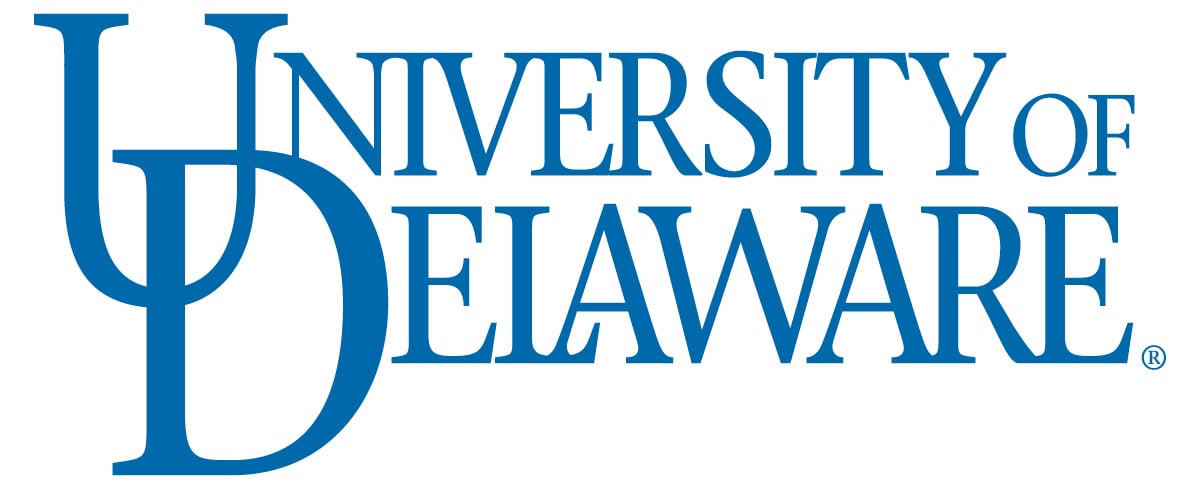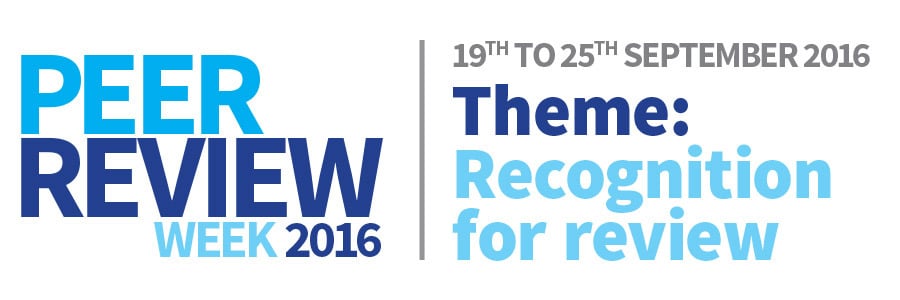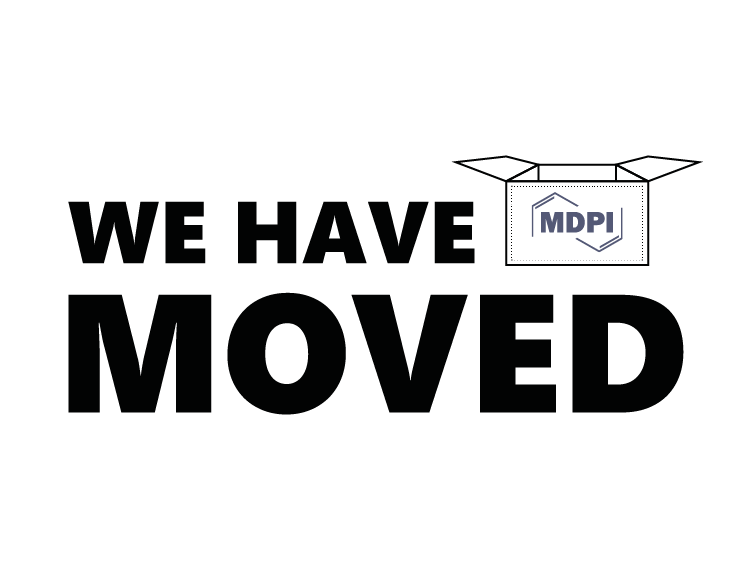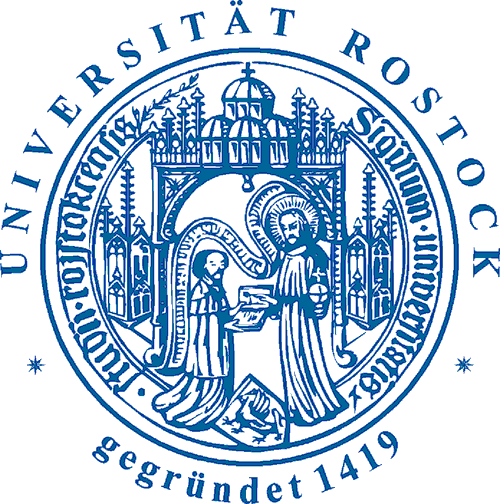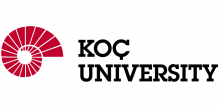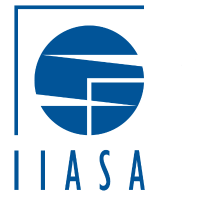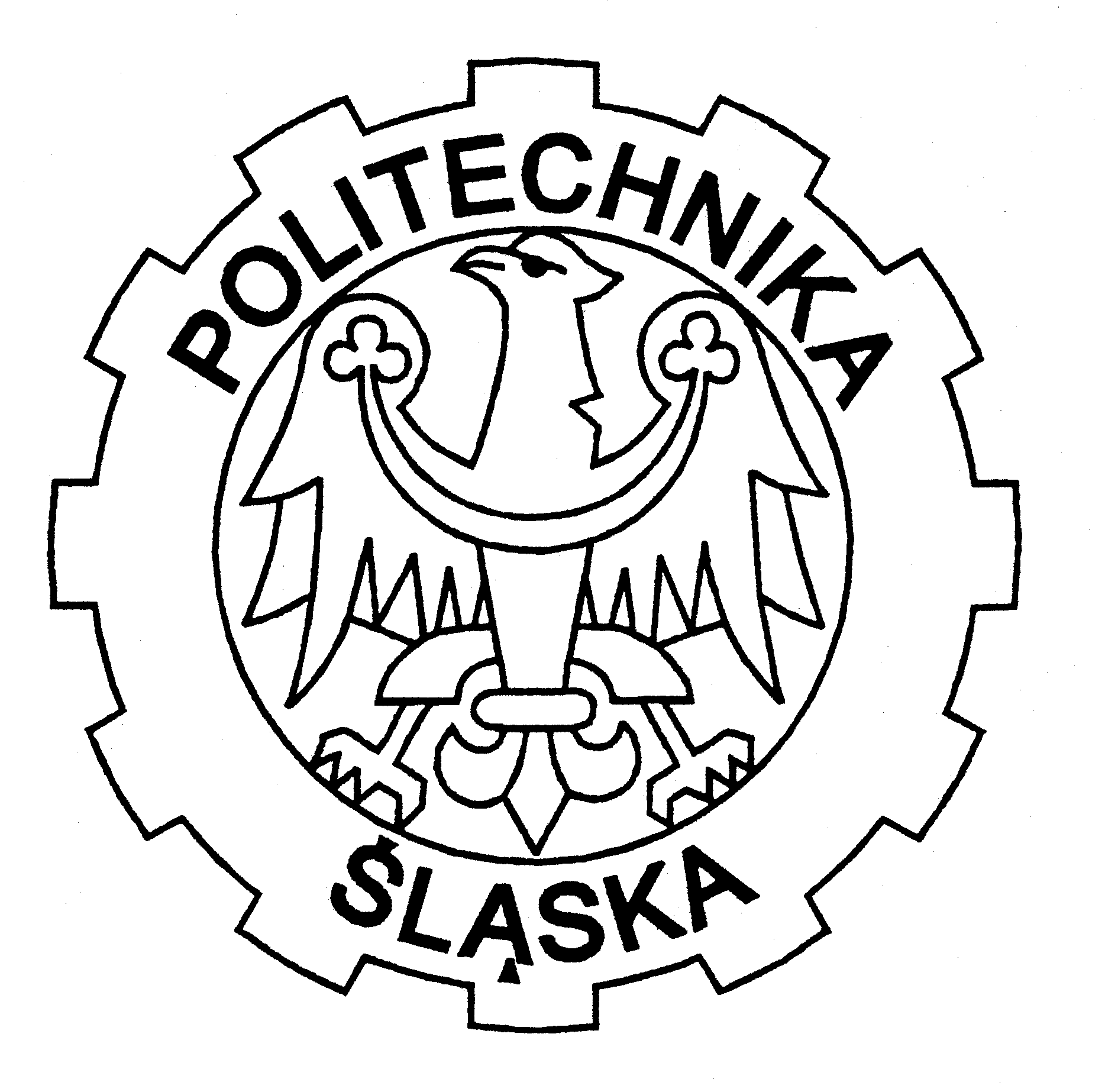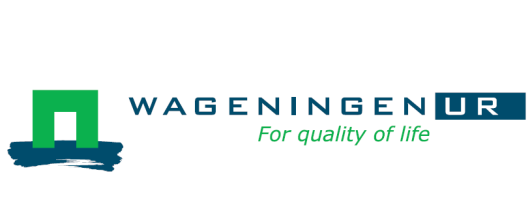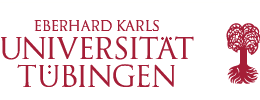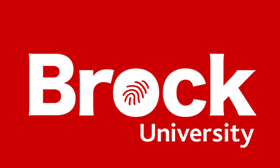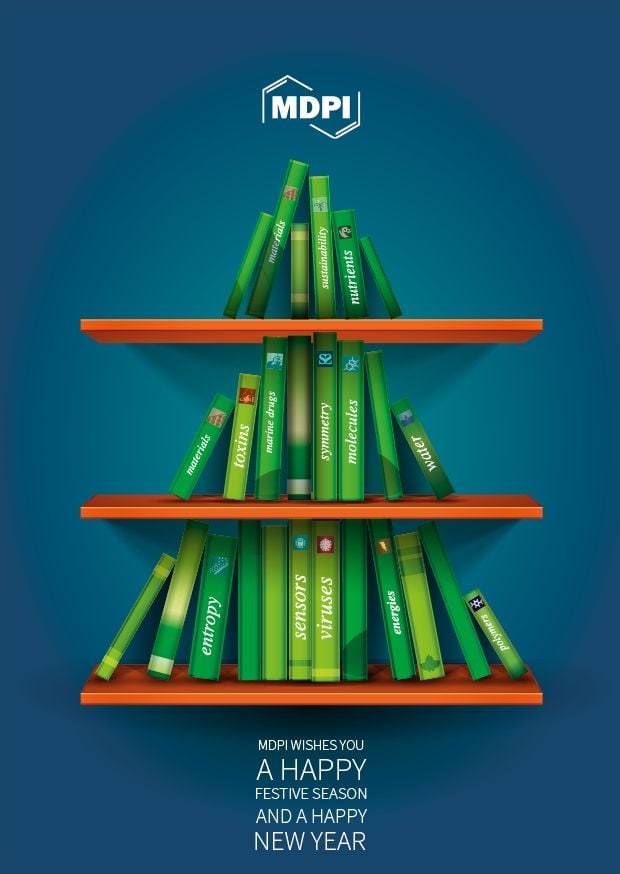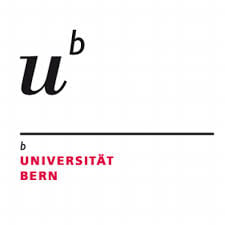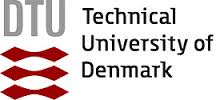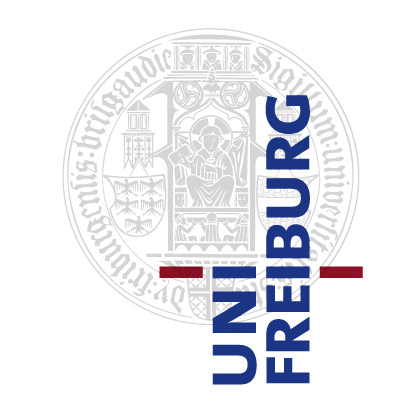
Journal Menu
► ▼ Journal Menu-
- Brain Sciences Home
- Aims & Scope
- Editorial Board
- Reviewer Board
- Topical Advisory Panel
- Instructions for Authors
- Special Issues
- Topics
- Sections & Collections
- Article Processing Charge
- Indexing & Archiving
- Editor’s Choice Articles
- Most Cited & Viewed
- Journal Statistics
- Journal History
- Journal Awards
- Society Collaborations
- Conferences
- Editorial Office
Journal Browser
► ▼ Journal BrowserNeed Help?
Announcements
15 April 2024
Brain Sciences | Highly Cited Papers in 2022–2023 in the Section “Neuro-otology and Neuro-ophthalmology”
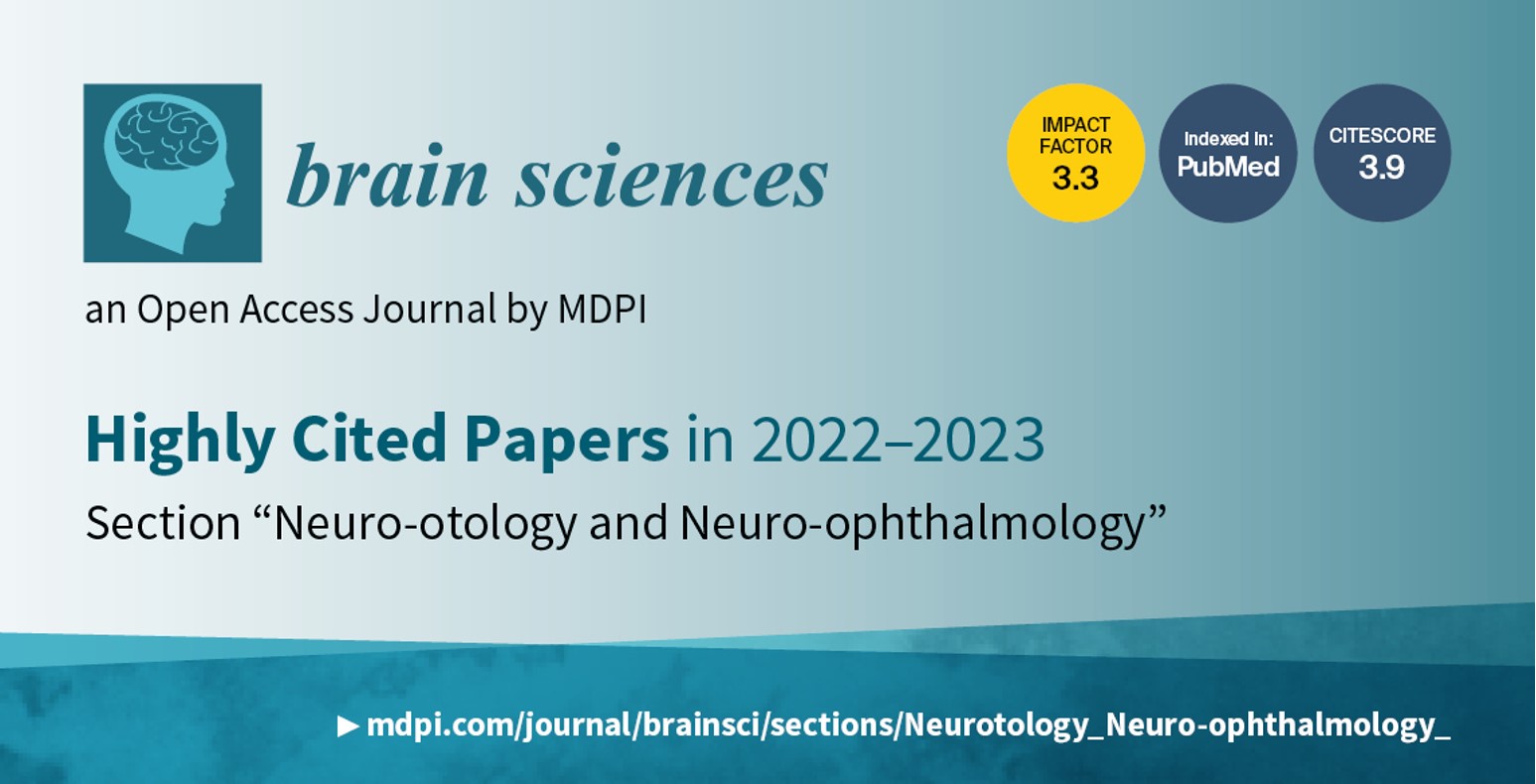
The “Neuro-otology and Neuro-ophthalmology” Section of Brain Sciences (ISSN: 2076-3425) aims to publish articles on neuro-ophthalmology, neuro-otology, vestibular disorders, vertigo, dizziness, visual system disorders, optic neuritis, optic neuropathy, papilledema, tinnitus and hearing impairment, etc.
All of the articles published in our journal are in an open access format, meaning that you have free and unlimited access to the full texts. We welcome you to read our most highly cited papers published in 2022 and 2023, listed below:
1. “Artificial Intelligence Frameworks to Detect and Investigate the Pathophysiology of Spaceflight Associated Neuro-Ocular Syndrome (SANS)”
by Joshua Ong, Ethan Waisberg, Mouayad Masalkhi, Sharif Amit Kamran, Kemper Lowry, Prithul Sarker, Nasif Zaman, Phani Paladugu, Alireza Tavakkoli and Andrew G. Lee
Brain Sci. 2023, 13(8), 1148; https://doi.org/10.3390/brainsci13081148
Available online: https://www.mdpi.com/2076-3425/13/8/1148
2. “Autoimmune Vestibulopathy—A Case Series”
by Surangi Mendis, Nicola Longley, Simon Morley, George Korres and Diego Kaski
Brain Sci. 2022, 12(3), 306; https://doi.org/10.3390/brainsci12030306
Available online: https://www.mdpi.com/2076-3425/12/3/306
3. “The Clinical Profile of Cat-Scratch Disease’s Neuro-Ophthalmological Effects”
by Sanda Jurja, Alina Zorina Stroe, Mihaela Butcaru Pundiche, Silviu Docu Axelerad, Garofita Mateescu, Alexandru Octavian Micu, Raducu Popescu, Antoanela Oltean and Any Docu Axelerad
Brain Sci. 2022, 12(2), 217; https://doi.org/10.3390/brainsci12020217
Available online: https://www.mdpi.com/2076-3425/12/2/217
4. “Optical Coherence Tomography in Chronic Relapsing Inflammatory Optic Neuropathy, Neuromyelitis Optica and Multiple Sclerosis: A Comparative Study”
by Maziar Eslami, Samuel Lichtman-Mikol, Sara Razmjou and Evanthia Bernitsas
Brain Sci. 2022, 12(9), 1140; https://doi.org/10.3390/brainsci12091140
Available online: https://www.mdpi.com/2076-3425/12/9/1140
5. “A Combined Image- and Coordinate-Based Meta-Analysis of Whole-Brain Voxel-Based Morphometry Studies Investigating Subjective Tinnitus”
by Punitkumar Makani, Marc Thioux, Sonja J. Pyott and Pim van Dijk
Brain Sci. 2022, 12(9), 1192; https://doi.org/10.3390/brainsci12091192
Available online: https://www.mdpi.com/2076-3425/12/9/1192
6. “Early Diagnosis of Central Disorders Mimicking Horizontal Canal Cupulolithiasis”
by Paula Peña Navarro, Sofía Pacheco López, Cristina Nicole Almeida Ayerve, Susana Marcos Alonso, José Manuel Serradilla López, Santiago Santa Cruz Ruiz, José Carlos Gómez Sánchez, Diego Kaski and Ángel Batuecas Caletrío
Brain Sci. 2023, 13(4), 562; https://doi.org/10.3390/brainsci13040562
Available online: https://www.mdpi.com/2076-3425/13/4/562
7. “Effects of Physical Interventions on Subjective Tinnitus, a Systematic Review and Meta-Analysis”
by Eric J. Bousema, Elouise A. Koops, Pim van Dijk and Pieter U. Dijkstra
Brain Sci. 2023, 13(2), 226; https://doi.org/10.3390/brainsci13020226
Available online: https://www.mdpi.com/2076-3425/13/2/226
8. “The Effects of Vibro-Tactile Biofeedback Balance Training on Balance Control and Dizziness in Patients with Persistent Postural-Perceptual Dizziness (PPPD)”
by Claudia Candreia, Heiko M. Rust, Flurin Honegger and John H. J. Allum
Brain Sci. 2023, 13(5), 782; https://doi.org/10.3390/brainsci13050782
Available online: https://www.mdpi.com/2076-3425/13/5/782
9. “Comparison of Active Bone Conduction Hearing Implant Systems in Unilateral and Bilateral Conductive or Mixed Hearing Loss”
by Andrea Canale, Anastasia Urbanelli, Maria Gragnano, Valerio Bordino and Andrea Albera
Brain Sci. 2023, 13(8), 1150; https://doi.org/10.3390/brainsci13081150
Available online: https://www.mdpi.com/2076-3425/13/8/1150
10. “Individualized Vibrotactile Neurofeedback Training in Patients with Chronic Bilateral Vestibulopathy”
by Dietmar Basta, Marcos Rossi-Izquierdo, Kai Wonneberger, Cibele Brugnera, Roseli Saraiva Moreira Bittar, Mário Edvin Greters, Arne Ernst and Andrés Soto-Varela
Brain Sci. 2023, 13(8), 1219; https://doi.org/10.3390/brainsci13081219
Available online: https://www.mdpi.com/2076-3425/13/8/1219
11 April 2024
Brain Sciences | Highly Cited Papers in 2022–2023 in the Section “Neuropsychology”
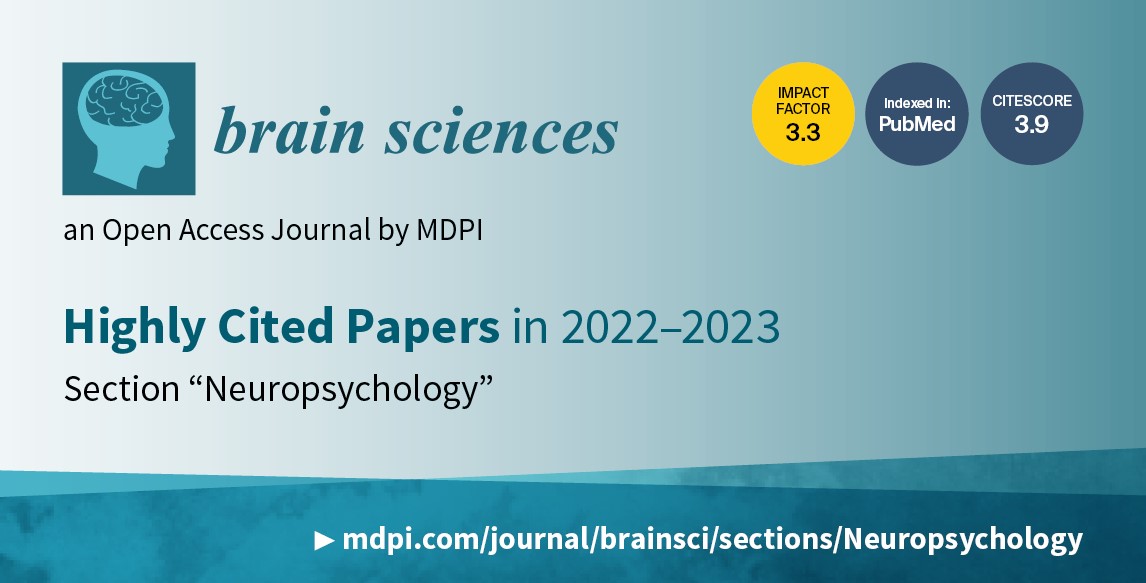
The “Neuropsychology” Section of Brain Sciences (ISSN: 2076-3425) aims to consolidate research on the relationship between the brain and human cognitive, emotional, and behavioral function. Neuropsychological testing typically evaluates individual functioning in a number of areas, including sensorimotor functions, perception, attention, spatial construction, intelligence, executive functions, memory, language, motivation, emotion, and quality of life.
As all articles published in our journal are open access, you have free and unlimited access to the full text. We welcome you to read our most highly cited papers published in 2022 and 2023, as listed below:
1. “Validation of a Light EEG-Based Measure for Real-Time Stress Monitoring during Realistic Driving”
by Nicolina Sciaraffa, Gianluca Di Flumeri, Daniele Germano, Andrea Giorgi, Antonio Di Florio, Gianluca Borghini, Alessia Vozzi, Vincenzo Ronca, Rodrigo Varga, Marteyn van Gasteren et al.
Brain Sci. 2022, 12(3), 304; https://doi.org/10.3390/brainsci12030304
Available online: https://www.mdpi.com/2076-3425/12/3/304
2. “Evidence from ERP and Eye Movements as Markers of Language Dysfunction in Dyslexia”
by Aikaterini Premeti, Maria Pia Bucci and Frédéric Isel
Brain Sci. 2022, 12(1), 73; https://doi.org/10.3390/brainsci12010073
Available online: https://www.mdpi.com/2076-3425/12/1/73
3. “Clinical Manifestations of Body Memories: The Impact of Past Bodily Experiences on Mental Health”
by Antje Gentsch and Esther Kuehn
Brain Sci. 2022, 12(5), 594; https://doi.org/10.3390/brainsci12050594
Available online: https://www.mdpi.com/2076-3425/12/5/594
4. “Automaticity and Executive Abilities in Developmental Dyslexia: A Theoretical Review”
by James H. Smith-Spark and Rebecca Gordon
Brain Sci. 2022, 12(4), 446; https://doi.org/10.3390/brainsci12040446
Available online: https://www.mdpi.com/2076-3425/12/4/446
5. “A Systematic Review of Structural and Functional MRI Studies Investigating Social Networking Site Use”
by Michael Wadsley and Niklas Ihssen
Brain Sci. 2023, 13(5), 787; https://doi.org/10.3390/brainsci13050787
Available online: https://www.mdpi.com/2076-3425/13/5/787
6. “Toxicity of Synthetic Cannabinoids in K2/Spice: A Systematic Review”
by Mariana Campello de Oliveira, Mariana Capelo Vides, Dângela Layne Silva Lassi, Julio Torales, Antonio Ventriglio, Henrique Silva Bombana, Vilma Leyton, Cintia de Azevedo-Marques Périco, André Brooking Negrão, André Malbergier et al.
Brain Sci. 2023, 13(7), 990; https://doi.org/10.3390/brainsci13070990
Available online: https://www.mdpi.com/2076-3425/13/7/990
7. “The Relationship between Short- and Long-Term Memory Is Preserved across the Age Range”
by Giedrė Čepukaitytė, Jude L. Thom, Melvin Kallmayer, Anna C. Nobre and Nahid Zokaei
Brain Sci. 2023, 13(1), 106; https://doi.org/10.3390/brainsci13010106
Available online: https://www.mdpi.com/2076-3425/13/1/106
8. “Neurocognitive Deficits in First-Episode and Chronic Psychotic Disorders: A Systematic Review from 2009 to 2022”
by Nadja Tschentscher, Christian F. J. Woll, Julia C. Tafelmaier, Dominik Kriesche, Julia C. Bucher, Rolf R. Engel and Susanne Karch
Brain Sci. 2023, 13(2), 299; https://doi.org/10.3390/brainsci13020299
Available online: https://www.mdpi.com/2076-3425/13/2/299
9. “Brain Correlates of Eating Disorders in Response to Food Visual Stimuli: A Systematic Narrative Review of FMRI Studies”
by Alessia Celeghin, Sara Palermo, Rebecca Giampaolo, Giulia Di Fini, Gabriella Gandino and Cristina Civilotti
Brain Sci. 2023, 13(3), 465; https://doi.org/10.3390/brainsci13030465
Available online: https://www.mdpi.com/2076-3425/13/3/465
10. “Neurological Consequences of COVID-19: A Systematic Review of the Pandemic’s Impact on Neurology Training”
by Tommaso Ercoli, Francesco Barbato, Alessandro Bombaci, Luca Cuffaro, Francesco Di Lorenzo, Francesco Iodice, Michele Romoli, Paolo Solla and Giovanni Defazio
Brain Sci. 2023, 13(8), 1188; https://doi.org/10.3390/brainsci13081188
Available online: https://www.mdpi.com/2076-3425/13/8/1188
9 April 2024
Brain Sciences | Highly Cited Papers in 2022–2023 in the Section “Social Cognitive and Affective Neuroscience”
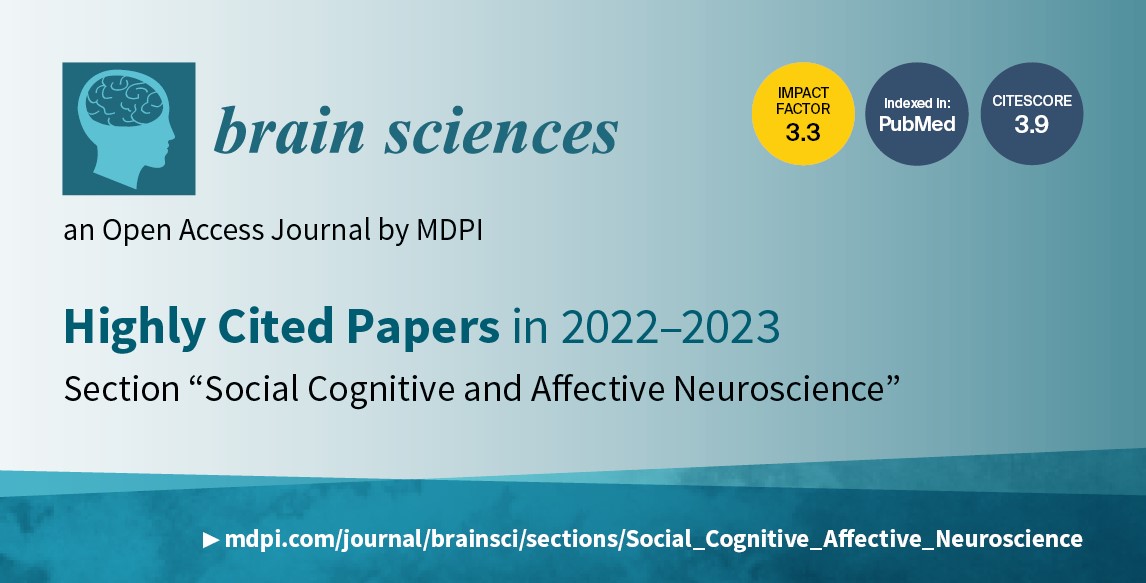
The “Social Cognitive and Affective Neuroscience” Section of Brain Sciences (ISSN: 2076-3425) aims to publish articles on social perception, cognition, emotion, and their practical applications at the behavioral, system, neural circuit, single cell, cellular, and genetic levels.
As all of the articles published in our journal are of an open access format, you have free and unlimited access to the full text. We welcome you to read our most highly cited papers published in 2022 and 2023.
1. “Attachment, Mentalizing and Trauma: Then (1992) and Now (2022)”
by Peter Fonagy, Chloe Campbell and Patrick Luyten
Brain Sci. 2023, 13(3), 459; https://doi.org/10.3390/brainsci13030459
Available online: https://www.mdpi.com/2076-3425/13/3/459
2. “Impact of Physical Exercise Alone or in Combination with Cognitive Remediation on Cognitive Functions in People with Schizophrenia: A Qualitative Critical Review”
by Giacomo Deste, Daniele Corbo, Gabriele Nibbio, Mauro Italia, Dario Dell’Ovo, Irene Calzavara-Pinton, Jacopo Lisoni, Stefano Barlati, Roberto Gasparotti and Antonio Vita
Brain Sci. 2023, 13(2), 320; https://doi.org/10.3390/brainsci13020320Available online: https://www.mdpi.com/2076-3425/13/2/320
3. “Cognition, Behavior, Sexuality, and Autonomic Responses of Women with Hypothalamic Amenorrhea”
by Carlo Pruneti and Sara Guidotti
Brain Sci. 2022, 12(11), 1448; https://doi.org/10.3390/brainsci12111448
Available online: https://www.mdpi.com/2076-3425/12/11/1448
4. “Wearing a Mask Shapes Interpersonal Space during COVID-19 Pandemic”
by Monica Biggio, Ambra Bisio, Valentina Bruno, Francesca Garbarini and Marco Bove
Brain Sci. 2022, 12(5), 682; https://doi.org/10.3390/brainsci12050682
Available online: https://www.mdpi.com/2076-3425/12/5/682
5. “The Shape of the Olfactory Bulb Predicts Olfactory Function”
by Xiaoguang Yan, Akshita Joshi, Yunpeng Zang, Francisca Assunção, Henrique M. Fernandes and Thomas Hummel
Brain Sci. 2022, 12(2), 128; https://doi.org/10.3390/brainsci12020128
Available online: https://www.mdpi.com/2076-3425/12/2/128
6. “Play Smart, Be Smart? Effect of Cognitively Engaging Physical Activity Interventions on Executive Function among Children 4~12 Years Old: A Systematic Review and Meta-Analysis”
by Wenjing Song, Leyi Feng, Junwei Wang, Feifei Ma, Jiebo Chen, Sha Qu and Dongmei Luo
Brain Sci. 2022, 12(6), 762; https://doi.org/10.3390/brainsci12060762
Available online: https://www.mdpi.com/2076-3425/12/6/762
7. “Preventive Strategies for Cognitive Decline and Dementia: Benefits of Aerobic Physical Activity, Especially Open-Skill Exercise”
by Takao Yamasaki
Brain Sci. 2023, 13(3), 521; https://doi.org/10.3390/brainsci13030521
Available online: https://www.mdpi.com/2076-3425/13/3/521
8. “Verification of the Four-Stage Model of Humor Processing: Evidence from an fMRI Study by Three-Element Verbal Jokes”
by Chia-Yueh Chang, Yu-Chen Chan and Hsueh-Chih Chen
Brain Sci. 2023, 13(3), 417; https://doi.org/10.3390/brainsci13030417
Available online: https://www.mdpi.com/2076-3425/13/3/417
9. “Parkinson’s Disease, SARS-CoV-2, and Frailty: Is There a Vicious Cycle Related to Hypovitaminosis D?”
by Sara Palermo, Mario Stanziano Anna Nigri, Cristina Civilotti and Alessia Celeghin
Brain Sci. 2023, 13(4), 528; https://doi.org/10.3390/brainsci13040528
Available online: https://www.mdpi.com/2076-3425/13/4/528
10. “The Creative Drummer: An EEG-Based Pilot Study on the Correlates of Emotions and Creative Drum Playing”
by Rafael Ramirez-Melendez and Xavier Reija
Brain Sci. 2023, 13(1), 88; https://doi.org/10.3390/brainsci13010088
Available online: https://www.mdpi.com/2076-3425/13/1/88
7 April 2024
Brain Sciences | Highly Cited Papers in 2022–2023 in the Section “Systems Neuroscience”
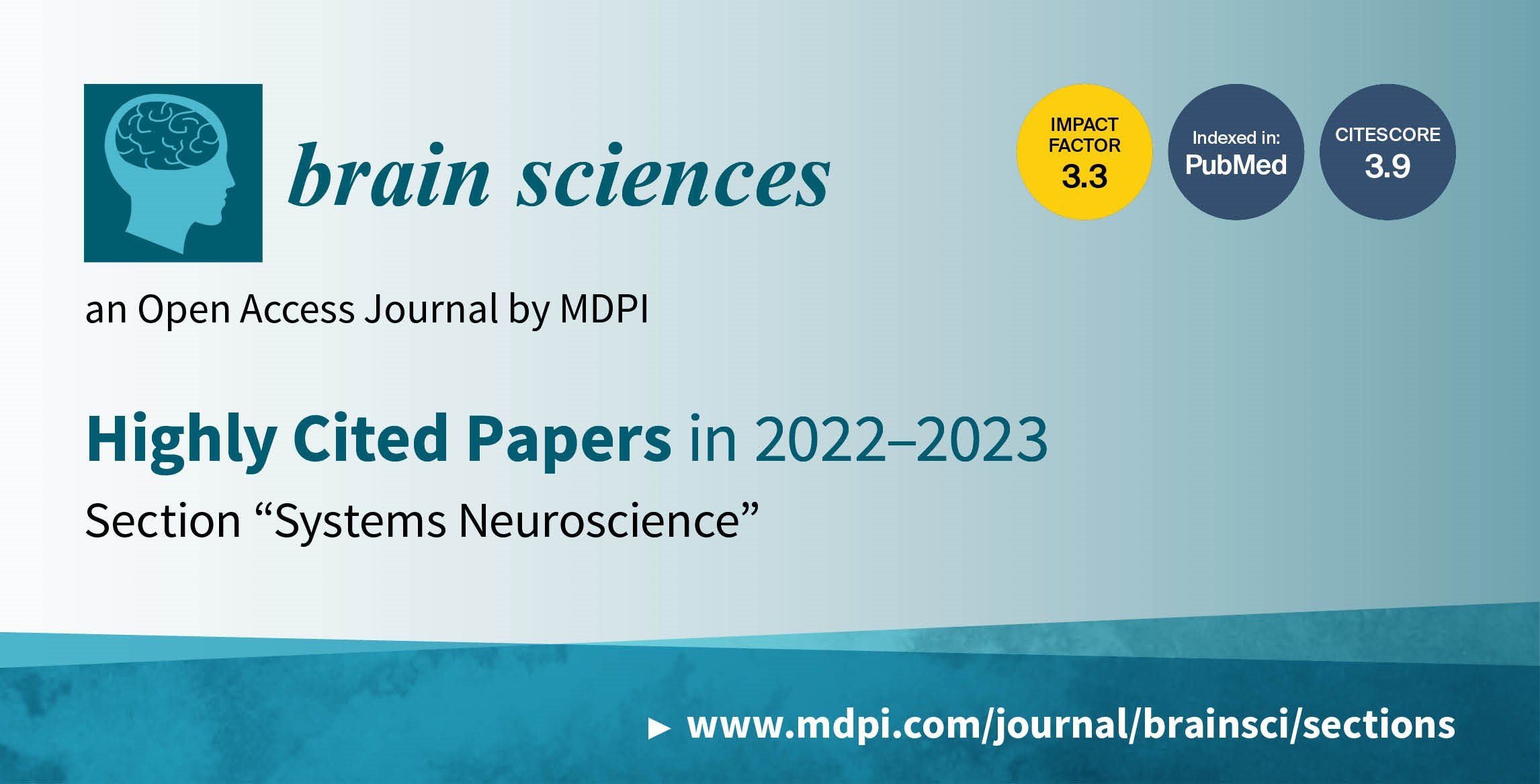
The “Systems Neuroscience” Section is dedicated to the research and exploration of multifactorial and multidimensional processes, such as normal and pathological aspects of sensory and motor functions; the activity of limbic and cognitive systems; and cerebral control of homeostasis, locomotion, reproduction, etc. By building a bridge between various theoretical concepts, basic science research, and clinical medicine applications, the “Systems Neuroscience” Section of the journal provides an in-depth analysis of the intricate workings of the nervous system. The focus of this Section goes beyond isolated aspects of neuroscience research and dedicates itself to a more comprehensive view of neural mechanisms and functionality.
As all of the articles published in our journal are of an open access format, you have free and unlimited access to the full texts. We welcome you to read our most highly cited papers published in 2022 and 2023 listed below.
1. “Innovative Technologies in the Neurorehabilitation of Traumatic Brain Injury: A Systematic Review”
by Mirjam Bonanno, Rosaria De Luca, Alessandro Marco De Nunzio, Angelo Quartarone and Rocco Salvatore Calabrò
Brain Sci. 2022, 12(12), 1678; https://doi.org/10.3390/brainsci12121678
Available online: https://www.mdpi.com/2076-3425/12/12/1678
2. “Serum Mature BDNF Level Is Associated with Remission Following ECT in Treatment-Resistant Depression”
by Marion Psomiades, Marine Mondino, Filipe Galvão, Nathalie Mandairon, Mikail Nourredine, Marie-Françoise Suaud-Chagny and Jérôme Brunelin
Brain Sci. 2022, 12(2), 126; https://doi.org/10.3390/brainsci12020126
Available online: https://www.mdpi.com/2076-3425/12/2/126
3. “Changes in the Intranetwork and Internetwork Connectivity of the Default Mode Network and Olfactory Network in Patients with COVID-19 and Olfactory Dysfunction”
by Hui Zhang, Tom Wai-Hin Chung, Fergus Kai-Chuen Wong, Ivan Fan-Ngai Hung and Henry Ka-Fung Mak
Brain Sci. 2022, 12(4), 511; https://doi.org/10.3390/brainsci12040511
Available online: https://www.mdpi.com/2076-3425/12/4/511
4. “It Takes Two: Interpersonal Neural Synchrony Is Increased after Musical Interaction”
by Alexander Khalil, Gabriella Musacchia and John Rehner Iversen
Brain Sci. 2022, 12(3), 409; https://doi.org/10.3390/brainsci12030409
Available online: https://www.mdpi.com/2076-3425/12/3/409
5. “Determining the Effects of Transcranial Direct Current Stimulation on Tinnitus, Depression, and Anxiety: A Systematic Review”
by Bas Labree, Derek J. Hoare, Lauren E. Gascoyne, Polly Scutt, Cinzia Del Giovane and Magdalena Sereda
Brain Sci. 2022, 12(4), 484; https://doi.org/10.3390/brainsci12040484
Available online: https://www.mdpi.com/2076-3425/12/4/484
6. “Neurological Prognostic Factors in Hospitalized Patients with COVID-19”
by Leszek Drabik, Justyna Derbisz, Zaneta Chatys-Bogacka, Iwona Mazurkiewicz, Katarzyna Sawczynska, Tomasz Kesek, Jacek Czepiel, Pawel Wrona, Joanna Szaleniec, Malgorzata Wojcik-Bugajska et al.
Brain Sci. 2022, 12(2), 193; https://doi.org/10.3390/brainsci12020193
Available online: https://www.mdpi.com/2076-3425/12/2/193
7. “Using Inhibitory DREADDs to Silence LC Neurons in Monkeys”
by Pauline Perez, Estelle Chavret-Reculon, Philippe Ravassard and Sebastien Bouret
Brain Sci. 2022, 12(2), 206; https://doi.org/10.3390/brainsci12020206
Available online: https://www.mdpi.com/2076-3425/12/2/206
8. “Dopamine Function and Hypothalamic-Pituitary-Thyroid Axis Activity in Major Depressed Patients with Suicidal Behavior”
by Fabrice Duval, Marie-Claude Mokrani, Vlad Danila, Alexis Erb, Felix Gonzalez Lopera and Mihaela Tomsa
Brain Sci. 2022, 12(5), 621; https://doi.org/10.3390/brainsci12050621
Available online: https://www.mdpi.com/2076-3425/12/5/621
9. “Effects of Aerobic Training on Brain Plasticity in Patients with Mild Cognitive Impairment: A Systematic Review of Randomized Controlled Trials”
by Farid Farhani, Shahnaz Shahrbanian, Mohammad Auais, Amir Hossein Ahmadi Hekmatikar and Katsuhiko Suzuki
Brain Sci. 2022, 12(6), 732; https://doi.org/10.3390/brainsci12060732
Available online: https://www.mdpi.com/2076-3425/12/6/732
10. “Optimized Deep Brain Stimulation Surgery to Avoid Vascular Damage: A Single-Center Retrospective Analysis of Path Planning for Various Deep Targets by MRI Image Fusion”
by Xin Wang, Nan Li, Jiaming Li, Huijuan Kou, Jing Wang, Jiangpeng Jing, Mingming Su, Yang Li, Liang Qu and Xuelian Wang
Brain Sci. 2022, 12(8), 967; https://doi.org/10.3390/brainsci12080967
Available online: https://www.mdpi.com/2076-3425/12/8/967
11. “Sleep in Disorders of Consciousness: A Brief Overview on a Still under Investigated Issue”
by Loredana Raciti, Gianfranco Raciti, David Militi, Paolo Tonin, Angelo Quartarone and Rocco Salvatore Calabrò
Brain Sci. 2023, 13(2), 275; https://doi.org/10.3390/brainsci13020275
Available online: https://www.mdpi.com/2076-3425/13/2/275
12. “Multi-Frequency Electrocochleography and Electrode Scan to Identify Electrode Insertion Trauma during Cochlear Implantation”
by Aniket A. Saoji, Madison K. Graham, Weston J. Adkins, Kanthaiah Koka, Matthew L. Carlson, Brian A. Neff, Colin L. W. Driscoll and Douglas C. Fitzpatrick
Brain Sci. 2023, 13(2), 330; https://doi.org/10.3390/brainsci13020330
Available online: https://www.mdpi.com/2076-3425/13/2/330
13. “Sex Differences in Cognitive-Motor Dual-Task Training Effects and in Brain Processing of Semi-Elite Basketball Players”
by Stefania Lucia, Merve Aydin and Francesco Di Russo
Brain Sci. 2023, 13(3), 443; https://doi.org/10.3390/brainsci13030443
Available online: https://www.mdpi.com/2076-3425/13/3/443
14. “A Heterogeneous Sample of a Spanish Tinnitus Cohort”
by María Cuesta and Pedro Cobo
Brain Sci. 2023, 13(4), 652; https://doi.org/10.3390/brainsci13040652
Available online: https://www.mdpi.com/2076-3425/13/4/652
15. “The Use of Neurofeedback in Sports Training: Systematic Review”
by Łukasz Rydzik, Wojciech Wąsacz, Tadeusz Ambroży, Norollah Javdaneh, Karolina Brydak and Marta Kopańska
Brain Sci. 2023, 13(4), 660; https://doi.org/10.3390/brainsci13040660
Available online: https://www.mdpi.com/2076-3425/13/4/660
16. “Betting on Non-Invasive Brain Stimulation to Treat Gambling Disorder: A Systematic Review and Meta-Analysis”
by Lilia Del Mauro, Alessandra Vergallito, Gaia Gattavara, Lucrezia Juris, Alessia Gallucci, Anna Vedani, Laura Cappelletti, Pietro Maria Farneti and Leonor J. Romero Lauro
Brain Sci. 2023, 13(4), 698; https://doi.org/10.3390/brainsci13040698
Available online: https://www.mdpi.com/2076-3425/13/4/698
17. “The Olfactory Bulb in Companion Animals—Anatomy, Physiology, and Clinical Importance”
by Rui Alvites, Abby Caine, Giunio Bruto Cherubini, Justina Prada, Artur Severo P. Varejão and Ana Colette Maurício
Brain Sci. 2023, 13(5), 713; https://doi.org/10.3390/brainsci13050713
Available online: https://www.mdpi.com/2076-3425/13/5/713
18. “Excitatory Dorsal Lateral Prefrontal Cortex Transcranial Magnetic Stimulation Increases Social Anxiety”
by Anthony Minervini, Adriana LaVarco, Samantha Zorns, Ruth Propper, Christos Suriano and Julian Paul Keenan
Brain Sci. 2023, 13(7), 989; https://doi.org/10.3390/brainsci13070989
Available online: https://www.mdpi.com/2076-3425/13/7/989
19. “The Brain’s Glymphatic System: Drawing New Perspectives in Neuroscience”
by Alexandru Vlad Ciurea, Aurel George Mohan, Razvan-Adrian Covache-Busuioc, Horia Petre Costin and Vicentiu Mircea Saceleanu
Brain Sci. 2023, 13(7), 1005; https://doi.org/10.3390/brainsci13071005
Available online: https://www.mdpi.com/2076-3425/13/7/1005
20. “Repetitive, but Not Single, Mild Blast TBI Causes Persistent Neurological Impairments and Selective Cortical Neuronal Loss in Rats”
by Rita Campos-Pires, Bee Eng Ong, Mariia Koziakova, Eszter Ujvari, Isobel Fuller, Charlotte Boyles, Valerie Sun, Andy Ko, Daniel Pap, Matthew Lee et al.
Brain Sci. 2023, 13(9), 1298; https://doi.org/10.3390/brainsci13091298
Available online: https://www.mdpi.com/2076-3425/13/9/1298
2 April 2024
MDPI Insights: The CEO's Letter #10 - South Korea, IWD, U2A, Japan

Welcome to the MDPI Insights: The CEO's Letter.
In these monthly letters, I will showcase two key aspects of our work at MDPI: our commitment to empowering researchers and our determination to facilitating open scientific exchange.
Opening Thoughts

Left to right: Dr. Jisuk Kang (Scientific Officer, MDPI), Stefan Tochev (CEO, MDPI), and Dr. Giulia Stefenelli (Chair of Scientific Office Board, MDPI), during media meetings at Prain Agency office in Seoul, South Korea.
Visit to Seoul, South Korea
During my recent visit to South Korea, I had the privilege of meeting various stakeholders, including representatives of government, research institutions, and academia, to understand their needs and communicate MDPI’s commitment to accessible science. Accompanied by my colleagues Dr. Giulia Stefenelli and Dr. Jisuk Kang, I engaged with the Korean scientific community, which is increasingly embracing open access (OA).
As the leading OA publisher in South Korea, MDPI is trusted by local authors and in 2023 enjoyed an approximately 30% share of the OA market. South Korea ranks sixth globally for MDPI in terms of research papers submitted and published.
MDPI and South Korea by Numbers
As at 30 March, over 76,000 MDPI articles have been authored by individuals affiliated with Korean institutions. We have over 1,800 active editorial board members (EBMs) from South Korea, with more than 880 EBMs having an H-index between 26 and 50, including 10 serving as Chief Editors.
“South Korea is the sixth-largest contributor to our total publications”
Over the past five years (2019–2023), nearly 120,000 authors affiliated with South Korean institutes have published with MDPI. Specifically in 2023, we received approximately 25,000 submissions from South Korean authors, publishing close to 13,000 articles, resulting in a rejection rate of 47.4%, which is not far below MDPI’s overall rejection rate of 56.4% in 2023.
Institutional Partnerships with South Korea
I am pleased to share that MDPI has more than 825 institutional partnerships worldwide, with 12 in South Korea, including Kyunghee University, Chung-Ang University, and Inha University, among others.

Left to right: Dr. Jisuk Kang (Scientific Officer, MDPI), Dr. Giulia Stefenelli (Chair of Scientific Office Board, MDPI), and Stefan Tochev (CEO, MDPI) fielding media questions at Prain PR Agency office in Seoul, South Korea.
Over the past three years (2021–2023), we have had some of the most prestigious academic universities ranked among the top 10 Korean institutions publishing with MDPI. Seoul National University had the highest number of publications with MDPI during those three years, publishing nearly 6,000 papers. Universities such as Korea University and Yonsei University also rank among the top 10 Korean institutions publishing with MDPI.
MDPI Hosts Seminar for Academia and Media
As the world’s leading OA publisher, MDPI is actively democratizing science. This is reflected in the seminars we hosted on 21 March to address questions about our editorial processes and ethical standards. The visit garnered media coverage, reflecting our mission to providing high-quality services and fostering open dialogue in the community.
“MDPI is actively democratizing science”
MDPI in the News

Stefan Tochev (CEO, MDPI) leading a seminar on OA and MDPI at Prain PR Agency office in Seoul, South Korea.
Media coverage generated by our visit to Seoul included the following stories:
“Open access is an unstoppable trend…it will lead the development of the knowledge ecosystem.”
I greatly appreciate the contributions of everyone who took the time to meet with us, share their stories, and hold us accountable for continuing to provide high-quality publishing services while identifying areas for improvement. I am also excited to announce that we have opened an MDPI office in Seoul and will release a press release on MDPI.com, with details, by the end April 2024. The purpose of the office is to establish a local presence to connect with and support the South Korean academic community through institutional partnerships, conferences, author workshops, stakeholder communications, and more.
Impactful Research

Featured Articles on Women’s Leadership and Healthcare
In celebration of International Women’s Day (8 March 2024), MDPI curated a collection of research articles on various topics, including women’s leadership, reproductive health, preventive healthcare, and a selection of articles from our journal Women.
Women’s Leadership
- Women Entrepreneurship and Sustainable Development: Bibliometric Analysis and Emerging Research Trends
Sustainability 2022, 14, 9160. https://doi.org/10.3390/su14159160 - Refugee Women Business Mentors: New Evidence for Women’s Empowerment
Sustainability 2022, 14, 9154. https://doi.org/10.3390/su14159154 - Women and Leadership in Higher Education: A Systematic Review
Soc. Sci. 2023, 12, 555. https://doi.org/10.3390/socsci12100555 - Understanding Needs and Potentials for Gender-Balanced Empowerment and Leadership in Climate Change Adaptation and Mitigation in Africa
Sustainability 2022, 14, 9410. https://doi.org/10.3390/su14159410 - Challenges Women Experience in Leadership Careers: An Integrative Review
Merits 2023, 3, 366-389. https://doi.org/10.3390/merits3020021
Women’s Reproductive Health
- Recreational Female Athletes’ Understanding of and Perceived Impact of the Menstrual Cycle on Physical Performance, Mood, and Sleeping Behaviour
Women 2023, 3, 445-456. https://doi.org/10.3390/women3030034 - Difficulties in Adaptation of the Mother and Newborn via Cesarean Section versus Natural Birth—A Narrative Review
Life 2023, 13, 300. https://doi.org/10.3390/life13020300 - The Main Theories on the Pathogenesis of Endometriosis
Int. J. Mol. Sci. 2023, 24, 4254. https://doi.org/10.3390/ijms24054254
Women’s Preventive Healthcare
- Insulin Metabolism in Polycystic Ovary Syndrome: Secretion, Signaling, and Clearance
Int. J. Mol. Sci. 2023, 24, 3140. https://doi.org/10.3390/ijms24043140 - Assessing Barriers Encountered by Women in Cervical Cancer Screening and Follow-Up Care in Urban Bolivia, Cochabamba
Healthcare 2022, 10, 1604. https://doi.org/10.3390/healthcare10091604 - Updates on HPV Vaccination
Diagnostics 2023, 13, 243. https://doi.org/10.3390/diagnostics13020243
Featured Articles in MDPI Journal Women
Below are a few articles from Women, our journal focused on women’s health, the social determinants of health, and the healthcare system that serves women. The aim of Women is to encourage academics to publish their experimental and theoretical results in detail, to aid reproducibility, and in an engaging style, to aid comprehensibility.
- Premenstrual Syndrome and Exercise: A Narrative Review
Women 2023, 3, 348-364. https://doi.org/10.3390/women3020026 - Increasing Awareness of the Human Papillomavirus (HPV) Vaccine for Women 18–45 Years of Age
Women 2023, 3, 365-373. https://doi.org/10.3390/women3030027 - Addressing Women’s Needs with Human Immunodeficiency Virus (HIV) and Enhancing the Visibility of Pharmacists in the Public Health Arena
Women 2022, 2, 346-352. https://doi.org/10.3390/women2040032
Inside MDPI

Championing Women’s Healthcare and Access to Healthcare Information
MDPI colleagues from our offices joined in celebrating #IWD2024. In doing so, we emphasized key missions that encompass:
- Empowering women to assume leadership and decision-making roles in both business and science.
- Helping women and girls make informed decisions about their health.
- Recruiting and developing female talent and fostering inclusive workplace environments.
“We are thrilled to recognize the accomplishments of women scientists”
I am proud to see our colleagues enthusiastically supporting the International Women’s Day call to ‘Inspire Inclusion!’ The heart-hands in the collage below symbolize our appreciation of the achievements of women researchers and the recognition of the trailblazers who have courageously made a mark on societies past and present.

We are thrilled to recognize the accomplishments of women scientists through our many MDPI awards and by highlighting success stories. As inspirational figures, female scientists are paving the way for the next generation of women aspiring to pursue careers in engineering, life sciences, computing, and various other STEM fields.
“I consider myself lucky because I work with incredibly talented women who inspire me every day.”
– Dr. Alessandra Pasut, Winner of MDPI's ‘Biology 2023 Young Investigator Award’
“It’s really important to find a supportive and enabling environment in which to do your science; it would have a big impact on you as a person and on your scientific outputs.”
– Dr. Rhea Longley, Winner of the ‘Pathogens 2023 Young Investigator Award’
Open-access publishing, in particular, allows early-career women researchers to share their work more widely, potentially attracting mentorship opportunities and collaborations. This support is crucial for career development and advancement.
Coming Together for Science

MDPI Joins United2Act in Collective Fight to Stop Paper Mills
In my February 2024 CEO Letter, I highlighted some of our recent initiatives aimed at bolstering our commitment to research integrity, including joining the STM Integrity Hub and expanding our Research Integrity and Publication Ethics team (RIPE). Continuing our efforts in coming together for science, I am pleased to share our participation in the United2Act initiative.
The text below is taken from our official announcement:
United2Act represents an international group of stakeholders in the publishing industry committed to addressing the collective challenge posed to research integrity by paper mills.
Scientists and academic publishers have increasingly noted the alarming proliferation of paper mills, recognized as fraudulent entities seeking to manipulate the publication process for financial profit. These entities engage in fraudulent practices such as falsifying or fabricating data, selling co-authorship of fake papers, manipulating peer review, and including inappropriate citations. These actions pose a significant threat to the integrity of the scholarly record, prompting widespread concern among those involved in the academic community.
MDPI has been actively contributing to combat the undermining of the scientific record. Our editors employ a set of tools to detect potential ethical breaches within a manuscript and to tackle the issue of fake papers.
United2Act’s consensus statement is the outcome of a virtual summit held in May 2023. It involved the participation of research bodies, publishers, researchers/sleuths, universities, and publishing infrastructure from 15 countries and resulted in a Consensus Statement outlining five key areas of action for all stakeholders:
- Education and awareness
- Improve post-publication corrections
- Facilitate and organise research on paper mills
- Enable the development of trust markers
- Facilitate dialogue between stakeholders
MDPI is committed to promoting transparency and integrity in scholarly publishing and is continuing to work closely with the scientific community toward this goal.
Closing Thoughts

Left to right: Ryo Hirayama (Marketing Specialist, MDPI), Takashi Sasabe (Marketing Specialist, MDPI), Dr. Giulia Stefenelli (Chair of Scientific Office Board, MDPI), Dr. Izumi Yamamoto (Marketing Manager, MDPI), and Stefan Tochev (CEO, MDPI), at MDPI’s office in Tokyo, Japan.
Visit to Tokyo and Kyoto, Japan
In March, I had the opportunity to visit our Tokyo office and engage with stakeholders in Tokyo and Kyoto. During the visit, I also recorded a video message to welcome Japanese scholars working with MDPI and to highlight our operations in Japan.
We held meetings with Editors-in-Chief, librarians, scholars, and external consultants to gather feedback on our efforts to enhance our reputation and explore additional steps we can take in that direction. Japan's rich cultural heritage, characterized by tradition, respect, and formality, provided valuable insights into meeting the publishing needs specific to Japan.
Japan’s Open Access statistics
Over the years, we have seen a shift from subscription-only to gold OA publishing in Japan, despite the lack of an official mandate. Here are some statistics:
- 2012: 68% of articles were subscription-only, 6% were green Open Access, and 8% were gold Open Access.
- 2016: 55% of articles were subscription-only, 6% were green Open Access, and 20% were gold Open Access.
- 2022: 43% of articles were subscription-only, 7% were green Open Access, and 39% were gold Open Access.
To learn more about the history of OA in Japan as well as about future trends, please read this blog post.
“Japan is the ninth-largest contributor to our total publications”

Left to right: Stefan Tochev (CEO, MDPI), Dr. Izumi Yamamoto (Marketing Manager, MDPI), and Dr. Giulia Stefenelli (Chair of Scientific Office Board, MDPI) visiting Kyoto University in Kyoto, Japan.
MDPI and Japan by Numbers
As at 1 April, over 50,000 MDPI articles have been authored by scholars affiliated with Japanese institutions, making the country the ninth-largest contributor to our total publications. Over the past three years (2020–2023), nearly 90,000 authors affiliated with Japanese institutes have published with MDPI, and we have collaborated with over 4,600 Guest Editors from Japan.
In 2023, we published over 8,200 papers from authors associated with Japanese institutions. MDPI collaborates with 41 institutional partnerships in Japan, including the University of Tokyo, Hokkaido University, and Nagoya University. We have over 2,100 active EBMs from Japan, more than 1,050 EBMs having an H-index between 26 and 50, including 13 serving as Editors-in-Chief.
General Feedback – a side note
A general takeaway from our discussions with stakeholders from around the world is that negative perceptions of MDPI often stem from misinformation, misconceptions, or misunderstandings about MDPI and our practices. While we acknowledge our mistakes and work diligently to address them, maintaining a strong editorial procedure and robust peer-review process, I find that educating stakeholders about our how we do what we do and our ongoing improvements tends to help shift opinions.
That said, we recognize the importance of addressing individual concerns. We take feedback seriously and are continuously working to get better while not compromising the core principles that millions of authors appreciate about MDPI.
Chief Executive Officer
MDPI AG
1 April 2024
Brain Sciences | Highly Cited Papers in 2022–2023 in the Section “Neuromuscular and Movement Disorders”
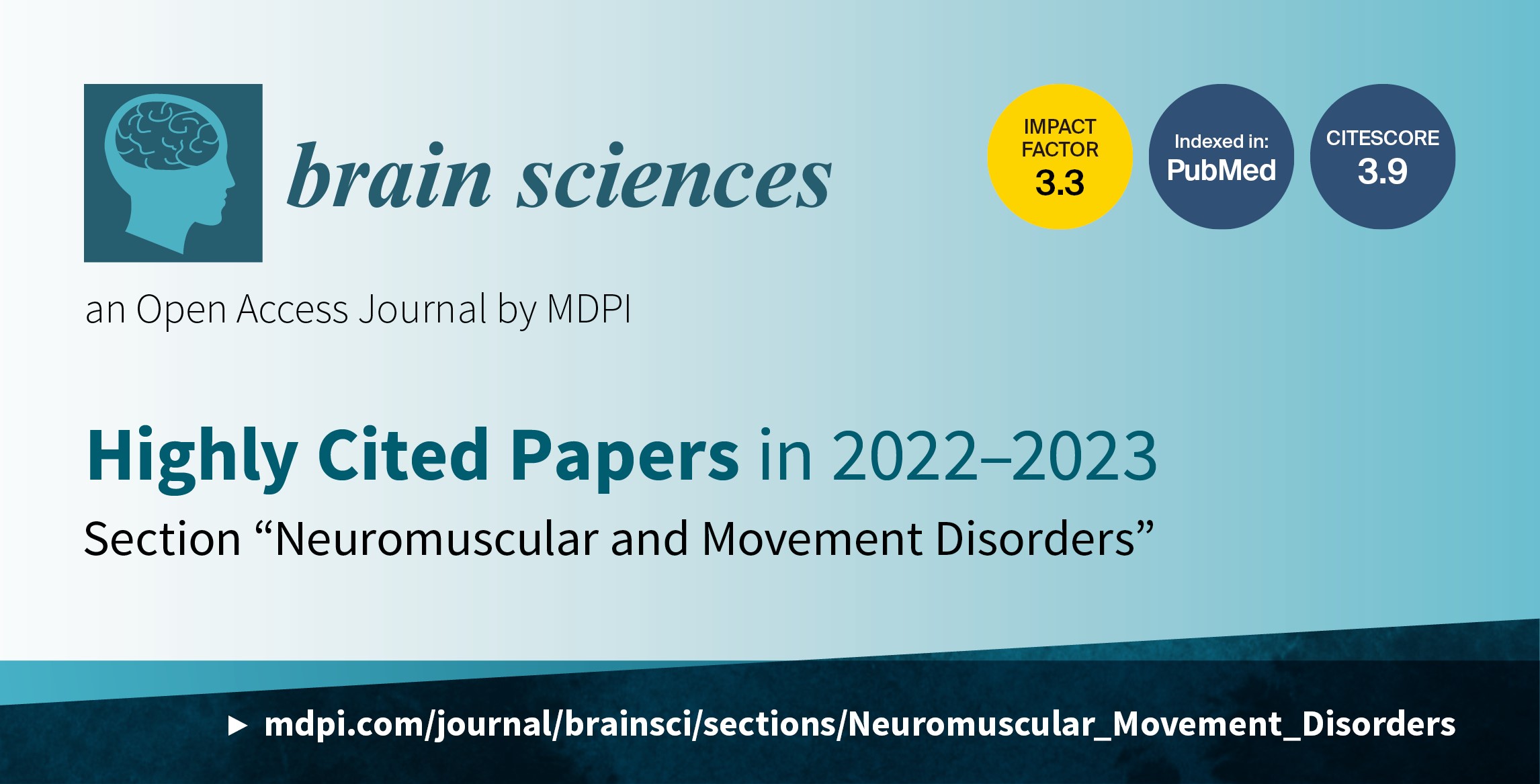
The Section “Neuromuscular and Movement Disorders” of Brain Sciences (ISSN: 2076-3425) aims to publish cutting-edge original research and critical reviews on basic science, translational research and clinical medicine that will substantially move our understanding on these disorders forward and improve the treatment of neuromuscular disease and movement disorders. The Section is international and multidisciplinary and aims to promote progress in epidemiology, etiology, genetics, and molecular and cellular biology using in vitro and in vivo models aiming to shed light on pathophysiology and pathogenesis, neuroimaging (using MRI, SPECT, PET, etc.) and other biomarkers, neuropsychology, neurophysiology, pharmacology, diagnosis, and treatment of these disorders, including neuromodulation.
As all of the articles published in our journal are of an open access format, you have free and unlimited access to the full text. We welcome you to read our most highly cited papers published in 2022 and 2023 listed below:
1. “Diagnosis and Management of Seronegative Myasthenia Gravis: Lights and Shadows”
by Claudia Vinciguerra, Liliana Bevilacqua, Antonino Lupica, Federica Ginanneschi, Giuseppe Piscosquito, Nicasio Rini, Alessandro Rossi, Paolo Barone, Filippo Brighina and Vincenzo Di Stefano
Brain Sci. 2023, 13(9), 1286; https://doi.org/10.3390/brainsci13091286
Available online: https://www.mdpi.com/2076-3425/13/9/1286
2. “Machine Learning for Early Diagnosis of ATTRv Amyloidosis in Non-Endemic Areas: A Multicenter Study from Italy”
by Vincenzo Di Stefano, Francesco Prinzi, Marco Luigetti, Massimo Russo, Stefano Tozza, Paolo Alonge, Angela Romano, Maria Ausilia Sciarrone, Francesca Vitali, Anna Mazzeo et al.
Brain Sci. 2023, 13(5), 805; https://doi.org/10.3390/brainsci13050805
Available online: https://www.mdpi.com/2076-3425/13/5/805
3. “Auditory–Perceptual and Auditory–Motor Timing Abilities in Children with Developmental Coordination Disorder: A Scoping Review”
by Marija Pranjić, Niloufaralsadat Hashemi, Anne B. Arnett and Michael H. Thaut
Brain Sci. 2023, 13(5), 729; https://doi.org/10.3390/brainsci13050729
Available online: https://www.mdpi.com/2076-3425/13/5/729
4. “Association between Antiepileptic Drugs and Incident Parkinson’s Disease among Patients Followed in German Primary Care Practices”
by Karel Kostev, Corinna Doege, Louis Jacob, Lee Smith, Ai Koyanagi, Celina Gollop and Anette Schrag
Brain Sci. 2023, 13(3), 450; https://doi.org/10.3390/brainsci13030450
Available online: https://www.mdpi.com/2076-3425/13/3/450
5. “Health-Related Quality of Life in Spinal Muscular Atrophy Patients and Their Caregivers—A Prospective, Cross-Sectional, Multi-Center Analysis”
by Camilla Wohnrade, Ann-Kathrin Velling, Lucas Mix, Claudia D. Wurster, Isabell Cordts, Benjamin Stolte, Daniel Zeller, Zeljko Uzelac, Sophia Platen, Tim Hagenacker et al.
Brain Sci. 2023, 13(1), 110; https://doi.org/10.3390/brainsci13010110
Available online: https://www.mdpi.com/2076-3425/13/1/110
6. “Frequency and Correlates of Mild Cognitive Impairment in Myasthenia Gravis”
by Salvatore Iacono, Vincenzo Di Stefano, Vanessa Costa, Giuseppe Schirò, Antonino Lupica, Bruna Maggio, Davide Norata, Antonia Pignolo, Filippo Brighina and Roberto Monastero
Brain Sci. 2023, 13(2), 170; https://doi.org/10.3390/brainsci13020170
Available online: https://www.mdpi.com/2076-3425/13/2/170
7. “Precision Medicine in Parkinson’s Disease: From Genetic Risk Signals to Personalized Therapy”
by Giulia Straccia, Fabiana Colucci, Roberto Eleopra and Roberto Cilia
Brain Sci. 2022, 12(10), 1308; https://doi.org/10.3390/brainsci12101308
Available online: https://www.mdpi.com/2076-3425/12/10/1308
8. “Imaging the Limbic System in Parkinson’s Disease—A Review of Limbic Pathology and Clinical Symptoms”
by Magdalena Banwinkler, Hendrik Theis, Stéphane Prange and Thilo van Eimeren
Brain Sci. 2022, 12(9), 1248; https://doi.org/10.3390/brainsci12091248
Available online: https://www.mdpi.com/2076-3425/12/9/1248
9. “Sensory Modulation in Children with Developmental Coordination Disorder Compared to Autism Spectrum Disorder and Typically Developing Children”
by Sofronia M Ringold, Riley W McGuire, Aditya Jayashankar, Emily Kilroy, Christiana D Butera, Laura Harrison, Sharon A Cermak and Lisa Aziz-Zadeh
Brain Sci. 2022, 12(9), 1171; https://doi.org/10.3390/brainsci12091171
Available online: https://www.mdpi.com/2076-3425/12/9/1171
10. “Magnetic Resonance Planimetry in the Differential Diagnosis between Parkinson’s Disease and Progressive Supranuclear Palsy”
by Andrea Quattrone, Maurizio Morelli, Maria G. Bianco, Jolanda Buonocore, Alessia Sarica, Maria Eugenia Caligiuri, Federica Aracri, Camilla Calomino, Marida De Maria, Maria Grazia Vaccaro et al.
Brain Sci. 2022, 12(7), 949; https://doi.org/10.3390/brainsci12070949
Available online: https://www.mdpi.com/2076-3425/12/7/949
28 March 2024
Brain Sciences | Highly Cited Papers in 2022–2023 in the Section “Behavioral Neuroscience”
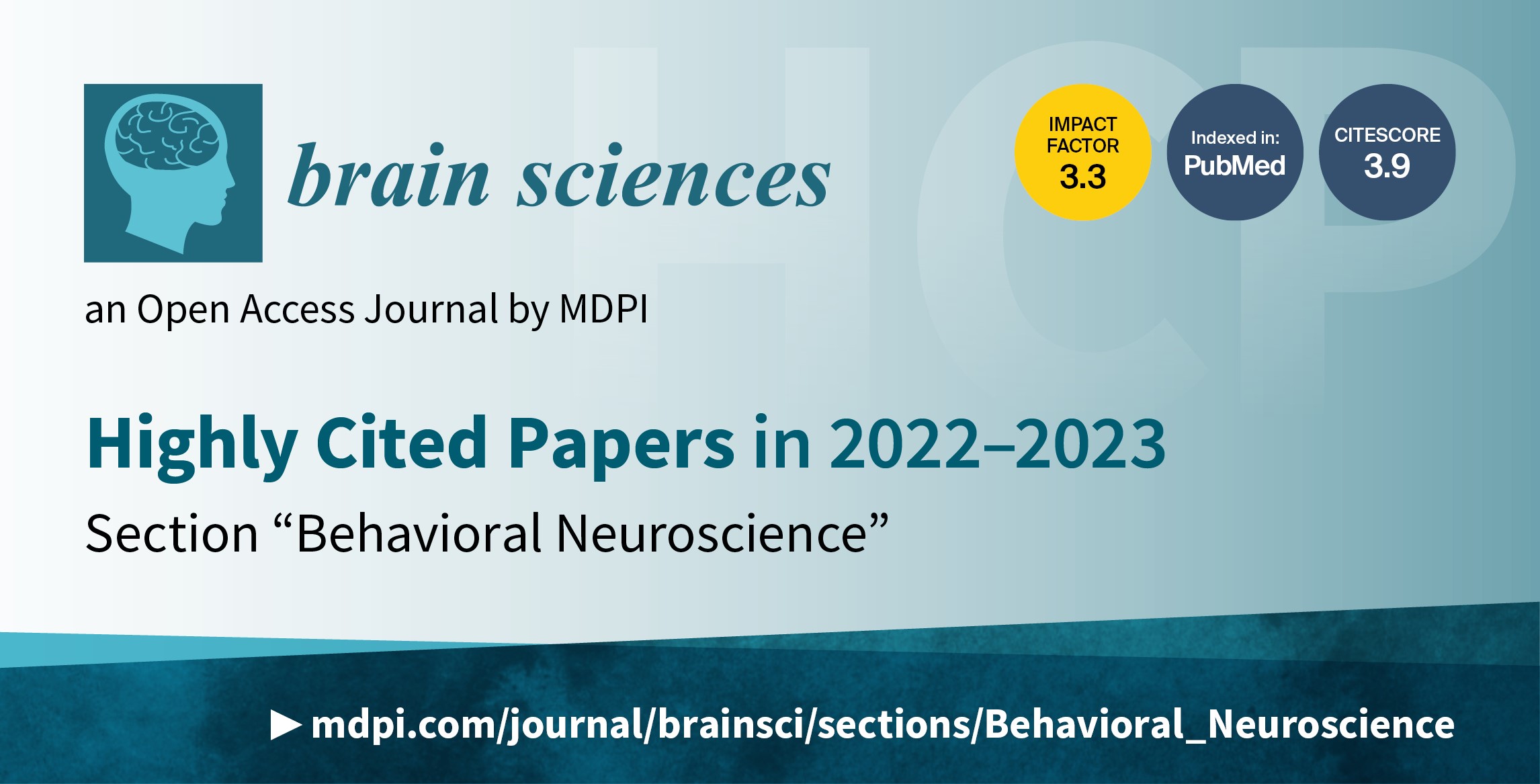
The “Behavioral Neuroscience” Section of the journal Brain Sciences (ISSN: 2076-3425) aims to publish articles on topics such as behavioral neurology, neuropsychology, learning and memory, motivation and reward, and sensory processes, among others.
As all the articles published in our journal are open access, you have free and unlimited access to the full text. We welcome you to read our most highly cited papers published in 2022 and 2023, listed below.
1. “Ultrasonic Deep Brain Neuromodulation in Acute Disorders of Consciousness: A Proof-of-Concept”
by Josh A. Cain, Norman M. Spivak, Norman M. Spivak, Julia S. Crone, Micah A. Johnson, Evan S. Lutkenhoff, Courtney Real, Manuel Buitrago-Blanco, Paul M. Vespa, Caroline Schnakers et al.
Brain Sci. 2022, 12(4), 428; https://doi.org/3390/brainsci12040428
Available online: https://www.mdpi.com/2076-3425/12/4/428
2. “Magnetic Resonance Imaging Confirmed Olfactory Bulb Reduction in Long COVID-19: Literature Review and Case Series”
by Andrea Frosolini, Daniela Parrino, Cristoforo Fabbris, Francesco Fantin, Ingrid Inches, Sara Invitto, Giacomo Spinato and Cosimo De Filippis
Brain Sci. 2022, 12(4), 430; https://doi.org/10.3390/brainsci12040430
Available online: https://doi.org/10.3390/brainsci12040430
3. “Association between Sleep Quality and Mental Health among Patients at a Post-COVID-19 Recovery Clinic”
by Sara Nowakowski, Manasa Kokonda, Rizwana Sultana, Brittany B. Duong, Sarah E. Nagy, Mohammed F. Zaidan, Mirza M. Baig, Bryan V. Grigg, Justin Seashore and Rachel R. Deer
Brain Sci. 2022, 12(5), 586; https://doi.org/10.3390/brainsci12050586
Available online: https://www.mdpi.com/2076-3425/12/5/586
4. “The Role of Stress and Cognitive Absorption in Predicting Social Network Addiction”
by Loreta Cannito, Eugenia Annunzi, Caterina Viganò, Bernardo Dell’Osso, Matteo Vismara, Pier Luigi Sacco, Riccardo Palumbo and Claudio D’Addario
Brain Sci. 2022, 12(5), 643; https://doi.org/10.3390/brainsci12050643
Available online: https://www.mdpi.com/2076-3425/12/5/643
5. “Cognitive Performance in Short Sleep Young Adults with Different Physical Activity Levels: A Cross-Sectional fNIRS Study”
by Yanwei You, Jianxiu Liu, Dizhi Wang, Yingyao Fu, Ruidong Liu and Xindong Ma
Brain Sci. 2023, 13(2), 171; https://doi.org/10.3390/brainsci13020171
Available online: https://www.mdpi.com/2076-3425/13/2/171
6.“The Role of Serotonin in Fear Learning and Memory: A Systematic Review of Human Studies”
by Francesco Tortora, Abed L. Hadipour, Simone Battaglia, Alessandra Falzone, Alessio Avenanti and Carmelo M. Vicario
Brain Sci. 2023, 13(8), 1197; https://doi.org/10.3390/brainsci13081197
Available online: https://www.mdpi.com/2076-3425/13/8/1197
7. “Erectile Dysfunction: Treatments, Advances and New Therapeutic Strategies”
by Antonio Argiolas, Francesco Mario Argiolas, Giacomo Argiolas and Maria Rosaria Melis
Brain Sci. 2023, 13(5), 802; https://doi.org/10.3390/brainsci13050802
Available online: https://www.mdpi.com/2076-3425/13/5/802
8. “Exploring the Social Determinants of Health and Health Disparities in Traumatic Brain Injury: A Scoping Review”
by Leslie W. Johnson and Isabella Diaz
Brain Sci. 2023, 13(5), 707; https://doi.org/10.3390/brainsci13050707
Available online: https://www.mdpi.com/2076-3425/13/5/707
9. “Sleep Deprivation and Insomnia in Adolescence: Implications for Mental Health”
by Sara Uccella, Ramona Cordani, Federico Salfi, Maurizio Gorgoni, Serena Scarpelli, Angelo Gemignani, Pierre Alexis Geoffroy, Luigi De Gennaro, Laura Palagini, Michele Ferrara et al.
Brain Sci. 2023, 13(4), 569; https://doi.org/10.3390/brainsci13040569
Available online: https://www.mdpi.com/2076-3425/13/4/569
10. “Optimizing the Effect of tDCS on Motor Sequence Learning in the Elderly”
by Ensiyeh Ghasemian-Shirvan, Ruxandra Ungureanu, Lorena Melo, Kim van Dun, Min-Fang Kuo, Michael A. Nitsche and Raf L. J. Meesen
Brain Sci. 2023, 13(1), 137; https://doi.org/10.3390/brainsci13010137
Available online: https://www.mdpi.com/2076-3425/13/1/137
4 March 2024
MDPI Insights: The CEO's Letter #9 - Romania, Research Integrity, Viruses

Welcome to the MDPI Insights: The CEO's Letter.
In these monthly letters, I will showcase two key aspects of our work at MDPI: our commitment to empowering researchers and our determination to facilitating open scientific exchange.
Opening Thoughts

Reka Kovacs (Deputy Office Manager, MDPI), Stefan Tochev (CEO, MDPI), and Sandra Ana Spatariu (Office Manager, MDPI) at the MDPI office in Cluj, Romania.
MDPI’s Impact on Romania
In February, I visited our office in Cluj, Romania. I worked closely with our senior office managers and various teams, including the departments of training, marketing and conferences, as well as our journal relationship specialists, reviewing our service to the local scholarly community. During the visit, I also met with representatives from Babes-Bolyai University and the Technical University of Cluj-Napoca. Our multifunctional Romanian office plays an important role in supporting our collaborations with the local market as well as helping to meet MDPI’s overall business needs.

Feedback and strategy meeting with a group of MDPI’s Journal Relationship Specialists at the MDPI office in Cluj, Romania.
With 22,436 articles, Romania ranks as a top 20 contributing country to MDPI’s total number of papers published as at 28 February 2024. This highlights the importance of our collaboration with Romanian-affiliated authors and the growing opportunity to support their publishing needs. MDPI is one of the few academic publishers with a significant presence in Romania, boasting over 360 colleagues across our offices in Bucharest and Cluj. We are also proud to hire colleagues from local institutions to launch their careers within publishing.
Romania ranks as a top 20 contributing country.
The Numbers: 2019–2023
MDPI has seen a healthy increase in submissions from Romanian authors over the past three years, from 8,439 in 2021 to 11,866 by end of 2023, with most submissions going to journals such as Sustainability, Medicina, Diagnostics, IJMS, Applied Sciences, and JCM. From 2019 to 2023, MDPI published articles from 32,145 authors affiliated with Romanian institutions. Over those years, we have worked with Romanian Guest Editors on nearly 3,000 occasions to support their Special Issue and Topical collections.
With more than 300 Editorial Board Members from Romania, 34 appear on the board of Mathematics, 27 on Materials, 19 on Polymers, 18 on Coatings, and 16 on Molecules, while three serve as Section Editors-in-Chief (SEiC) on our journals Coatings (3.4 IF, 4.6 Citescore), Magnetochemistry (2.7 IF, 3.5 Citescore), and Chemosensors (4.2 IF, 3.9 Citescore).
Institutional Open Access Programs
Our commitment to working with institutions is evident in Romania, where we have established eight Institutional Open Access Programs (IOAP) with esteemed institutions such as the University of Bucharest, the University of Medicine and Pharmacy Cluj-Napoca, and most recently the National Institute for Laser, Plasma and Radiation Physics.
Our growth and presence in Romania are a true testament.
We also have IOAP agreements with Babes-Bolyai University and the Technical University of Cluj-Napoca, where I had the opportunity to meet senior stakeholders during my visit. Below are a few photos capturing our meeting with Prof. Radu Silaghi-Dumitrescu (Head of Faculty of Chemistry, Babes-Bolyai University) at the MDPI office in Cluj, Romania, along with a photo from our meeting with Vice Deans Nicoleta Cobarzan, Nicoleta Ilies, and Hoda Gavril, from the faculty of Civil Engineering at the Technical University of Cluj, Romania.


Our growth and presence in Romania are a true testament to the service we provide to the scholarly community and the relationships we foster in that region. We look forward to continuing to support Romanian scholars and institutions by providing a valuable and trusted experience with MDPI, the leader in open access publishing.
Impactful Research

MDPI Joins the STM Integrity Hub
MDPI has long been a supporter and partner of STM, with our involvement ranging from sponsoring and attending events to helping organize event programs. By joining the STM Integrity Hub, we aim to further our commitment to STM initiatives aimed at safeguarding the integrity of science.
“We are pleased to welcome MDPI as the 35th organisation participating in the Hub. This expansion is critical, as every new member enhances our capacity to prevent fraudulent submissions from entering the academic record.”
Joris van Rossum, Director of Research Integrity, STM
MDPI operates in full alignment with STM Integrity Hub's values of shared data and experiences. We strongly believe in collaboration and open exchange for the purposes of creating a holistic approach to support research integrity at MDPI itself and across the entire academic publishing industry. The Integrity Hub is an excellent example of how publishers can come together to jointly address industry-wide challenges related to research integrity, such as manuscripts that breach research integrity standards and paper-mills.
I look forward to our Research Integrity and Publication Ethics Team (RIPE) team immersing themselves in this initiative, exchanging information, best practices, and tools for the benefit of the entire scholarly ecosystem. We believe that ethical publishing standards should be implemented across the board, and we aim to be rigorous in our approach, addressing research integrity issues and improving the impact of published research.
Inside MDPI

MDPI Expands Research Integrity and Publication Ethics Team (RIPE)
In addition to external collaborations and joint initiatives aimed at further strengthening our commitment to research integrity, we are also enhancing our internal efforts. This includes improving our processes and guidelines and expanding our teams and departments to ensure quality assurance throughout our publishing process.
We are pleased to announce the expansion of our Research Integrity and Publication Ethics Team (RIPE) at MDPI. The RIPE team has recently welcomed new colleagues, each bringing unique skills and a personal commitment to prioritize ethical considerations in all our work.
The demand for research integrity and high ethical standards in academic publishing is steadily rising across our industry. Our expanded RIPE team will work to enhance and align our practices with industry best practices, ensuring excellence in research integrity and publication ethics.

Stefan Tochev (CEO, MDPI) introduces Dr. Tim Tait-Jamieson (Research Integrity Lead, MDPI) for his presentation on MDPI’s Retraction and Approval Process to a group of Journal Relationship Specialists at the MDPI office in Cluj, Romania: “The demand for research integrity and publication ethics is steadily rising across our industry.”
Introducing our Research Integrity and Publication Ethics Team
Led by Dr. Tim Tait-Jamieson (Research Integrity Lead), the RIPE team comprises Dr. Ivana Resanovic (Research Integrity Manager), Dr. Lavinia Rogojina (Research Integrity Manager), Ms. Diana Apodaritei (Research Integrity Specialist), Dr. Zoltan Mihaly (Research Integrity Specialist), Mr. Aleksandar Đukić (Research Integrity Specialist), Ms. Ana Stankovic (Research Integrity Specialist), and Ms. Anna Pena (Publication Ethics Assistant).
Please click here to access everything that you need to know about MDPI’s Research and Publication Ethics.
With this span of complementary roles, the RIPE team collaborates directly with journal editorial teams and works closely with various departments, including our Scientific Office Board and our Journal Relationship Specialists. The team’s primary objectives are to help prevent issues regarding research integrity and publication ethics during peer review, uphold MDPI’s ethics policies, adhere to industry standards, and resolve publication ethics and research integrity issues and complaints.
Quality Updates to Special Issues Oversight
At MDPI, we are committed to reviewing policies pertaining to the quality of research. In this blog post, Shaheena Patel (Communications Associate, MDPI), outlines two recent updates to MDPI journal processes. These updates pertain to Special Issue (SI) quality guidelines, in line with criteria provided by COPE and DOAJ. Alongside the SI updates, details regarding the new minor corrections policy introduced in 2024 are provided in the blog.
The two updates we implemented include greater oversight and the verification of Guest Editor credentials. These guidelines require that Editors-in-Chief (EiCs) and Editorial Board Members (EBMs) take responsibility for overseeing SIs.
PS. Thank you, James Butcher, for featuring this up in your 67th issue of the Journalogy newsletter.
Read more:
Coming Together for Science

Viruses 2024 – A World of Viruses
I am pleased to share the success of our MDPI conference Viruses 2024 – A World of Viruses, held 14-16 February, in Barcelona. With 240 registrations, this event brought together top scientists, researchers, and industry experts from 40 countries to share their findings on the latest developments in viral pathogenesis and immune responses.
Attendees gathered for the 5th edition of the Viruses’ conference, where we hosted influential keynote speeches from Nobel Prize laureate Dr. Charles M. Rice and ‘Distinguished Senior Virologist’ Prof. Luis Enjuanes, along with 14 invited speakers, 47 selected speakers, and nine flash poster presenters, to discuss the most significant issues in virology today.
Recap on the #Viruses2024 Conference
Take a look at the key moments from MDPI’s Viruses event and please join us in commemorating a gathering for global knowledge and cooperation. A heartfelt thank-you to all attendees; their passion and engagement played a crucial role in making this event an engaging success!
Below are calls to action from the keynote speakers encouraging collaboration and communication:
“There’s never been a better time than now to really take the power that we have both in terms of basic research and also in biotech and pharma to develop antiviral agents.” - Dr. Charles M. Rice, The Rockefeller University, New York, USA
“The collaboration between labs is absolutely essential. Improving initial detection and improving communication is a must for all of us working in science.” - Prof. Dr. Luis Enjuanes, National Center of Biotechnology (CNB-CSIC), Madrid, Spain

Our thanks go to our sponsors and partnering societies, our Viruses journal and editorial team, our Barcelona colleagues, and the social media, conference and other MDPI teams for making this event a memorable occasion. View the event gallery here.
Upcoming In-Person Event

24–26 April, 2024
4th MMCS – Harnessing the Power of New Drug Modalities
Location: Barcelona, Spain
Esteemed speakers at MMCS 2024 include Prof. Arun K. Ghosh, the mind behind the Darunavir molecule, and Prof. Paul Brennan, CSO of Alzheimer's Research UK Oxford Drug Discovery Institute.
Find more upcoming MDPI events here.
Organize Your Event with MDPI’s Sciforum
Sciforum is MDPI’s platform dedicated to the organization of scientific events. In line with our mission to promote science, Sciforum supports scholars, societies, research networks, and universities at all stages of organizing in-person events, virtual events and webinars. Our platforms are efficient, user-friendly, and cost-effective. We handle all steps related to event management. Contact us for details.
Closing Thoughts

Researcher to Reader (R2R) Conference
From 20–21 February 2024, I had the pleasure of attending the Researcher to Reader (R2R) conference in London, which MDPI has proudly sponsored over the years. The conference programme offered a variety of session formats, including workshops, panel discussions, debates, interviews, presentations, and lightning talks, with opportunities to discuss relevant topics.
We take pride in supporting the scientific community, bringing researchers across the world together to network, exchange ideas and share the latest in science and publishing. In 2023, MDPI invested close to 2 million CHF in sponsoring over 2,000 scientific and publishing-related conferences worldwide.
R2R Peer Review Innovations Workshop
I found the R2R conference to be engaging, with the workshops being particularly enjoyable. My colleague Giulia Stefenelli (Chair of Scientific Office Board) and I participated in the “Peer Review Innovations” workshop, which spanned four sessions over the two days. These sessions explored the future of peer review and how we can improve the peer review process for everyone involved. Notably, the large majority of attendees expressed their opinion that peer review, as currently practiced, requires significant improvement. Together, we collaborated on potential immediate and long-term improvements and innovative processes, aiming to create an ecosystem beneficial to all stakeholders by strengthening submission systems with the aim of reducing threats and making authors more responsible for their work. We also discussed the opportunity for academic institutions to better scrutinize the quality of the work produced and submitted to journals.
Our group comprised publishers, software providers, librarians, and more, bringing diverse perspectives to the discussions. These interactions were relevant to MDPI’s ongoing conversations, providing insights to our efforts. The session also made me appreciate that MDPI is doing well, as the group discussions included the subject of various quality checks that we have already embedded in our processes, ensuring that we keep abreast of industry standards.
The need for an optimized system to incentivize the activities of editors and reviewers was also a focus of discussion, as well as the support that reviewers need from publishers via the provision of strong reports through fixed forms, questionnaires and training.
At MDPI, we are currently auditing our reviewer program to improve reviewer recognition, guidelines, and methods for identifying suitable reviewers, while maintaining our commitment to quality and timeliness.
Congratulations to Mark Carden, Conference Director, and the R2R team for organizing a productive and successful event. PS: The break times were greatly appreciated as well!
Chief Executive Officer
MDPI AG
31 January 2024
MDPI Insights: The CEO's Letter #8 - Altmetric and Flat Fee Agreement

Welcome to the MDPI Insights: The CEO's Letter.
In these monthly letters, I will showcase two key aspects of our work at MDPI: our commitment to empowering researchers and our determination to facilitating open scientific exchange.
Opening Thoughts

MDPI and Digital Science Meeting
At MDPI, we are committed to providing our authors with the essential tools to publish, promote, and track their research. In line with this commitment, we have established a longstanding collaboration with Digital Science, a company specializing in research data and analytical insights for the research community. Our collaboration integrates their Altmetric tool, offering us and our authors the ability to track a variety of sources that monitor and report attention surrounding publications.
As part of our collaboration, we recently hosted Cathy Holland, Director of Global Publisher Business Development, and Helen Cooke, Managing Director of Publisher Sales, from Digital Science, at our MDPI headquarters in Basel, Switzerland.
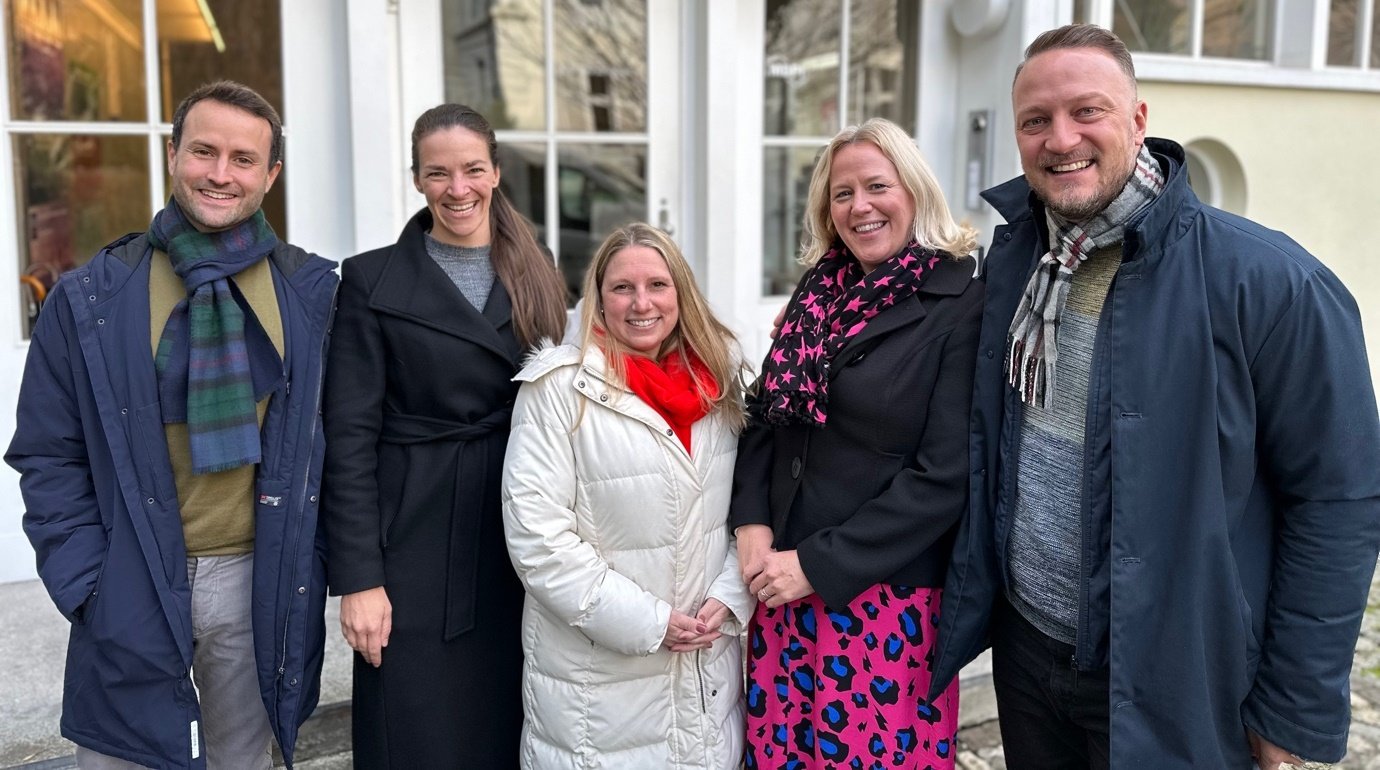
Left to right: Facundo Santomé (Senior Marketing Manager, MDPI), Constanze Shelhorn (Indexing Manager, MDPI), Cathy Holland (Director of Global Publisher Business Development, Digital Science), Helen Cooke (Managing Director of Publisher Sales, Digital Science), and Stefan Tochev (CEO, MDPI) in front of MDPI headquarters in Basel, Switzerland.
During our meeting, we discussed MDPI’s publishing philosophy and explored further avenues for collaboration. We look forward to continuing our partnership with Digital Science, aiming to improve our services yet further and meet the needs of our authors more closely than ever.
What is Altmetric?
You will notice that MDPI articles feature an Altmetric score, a colourful doughnut capturing the score in the upper right corner of the article page. This score represents ‘alternative metrics,’ as distinct from traditional metrics such as Impact Factor, CiteScore, and Scimago Journal Rank.
Altmetrics complement traditional citation-based metrics by capturing online discussions related to a specific research topic. By analyzing both sets of data, we can obtain a comprehensive understanding of the attention a particular research output receives and the sources in which it is mentioned.
“Almetric provides visual insights into where research is being discussed”
Sources Tracked by Altmetric
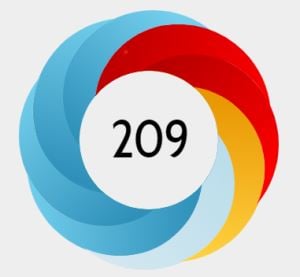
Altmetric badge showing the Altmetric score and colour-coded mention sources.
Altmetric monitors various sources, categorizing them into segments such as policy documents, peer reviews, Wikipedia, news and blogs, and social media, among other sources. Each category is identifiable by a specific colour.
The Altmetric badge provides visual insights into where the research is being discussed. A more colourful badge indicates broader mentions across multiple platforms. Such tracking enables us to gauge the extent of an article’s online dissemination, noting that increased visibility may correlate with higher citation rates.
Read more:
Impactful Research

Ten High-Altmetric Articles Published by MDPI
As at 30 January 2024, Altmetric has tracked 670,500 MDPI research outputs from MDPI, resulting in over 4.3 million mentions. This includes over 71,894 mentions in policy and patents and 294,714 mentions in news and blogs, with some achieving an Altmetric score as high as 28,754.
So, what is a good Altmetric score? There are various ways to put this score into context. You can find out more about the score in context and how to evaluate your work by this means.
Here are ten MDPI papers ranking in the top 5% of all research outputs scored by Altmetric.
|
|
“Accuracy in Wrist-Worn, Sensor-Based Measurements of Heart Rate and Energy Expenditure in a Diverse Cohort” J. Pers. Med. 2017, 7(2), 3; https://doi.org/10.3390/jpm7020003 Altmetric page: https://mdpi.altmetric.com/details/20477344 Altmetric shows that this article appeared in 253 news stories from 209 outlets including Forbes, BBC, and Fox News. |
|
|
“Daylight Saving Time and Acute Myocardial Infarction: A Meta-Analysis” J. Clin. Med. 2019, 8(3), 404; https://doi.org/10.3390/jcm8030404 Altmetric page: https://mdpi.altmetric.com/details/57654628 Altmetric shows that this article appeared in 295 news stories from 207 outlets including Forbes, The Atlantic, and New York Times. |
|
|
“The Preliminary Analysis of Cave Lion Cubs Panthera spelaea (Goldfuss, 1810) from the Permafrost of Siberia” Quaternary 2021, 4(3), 24; https://doi.org/10.3390/quat4030024 Altmetric page: https://mdpi.altmetric.com/details/111086701 Altmetric shows that this article appeared in 182 news stories from 134 outlets including CBC News, CNN, and National Geographic. |
|
|
“Not the Cat’s Meow? The Impact of Posing with Cats on Female Perceptions of Male Dateability” Animals 2020, 10(6), 1007; https://doi.org/10.3390/ani10061007 Altmetric page: https://mdpi.altmetric.com/details/83796184 Altmetric shows that this article appeared in 124 news stories from 98 outlets including VICE, CNN and The Guardian. |
|
|
“Behaviour and Welfare Impacts of Releasing Elephants from Overnight Tethers: A Zimbabwean Case Study” Animals 2022, 12(15), 1933; https://doi.org/10.3390/ani12151933 Altmetric page: https://mdpi.altmetric.com/details/133463915 Altmetric shows that this article appeared in 192 news stories from 186 outlets. |
How do I use altmetrics?
Altmetric Explorer provides a detailed step-by-step guide and instruction video for first-time users of the tool. The guide includes useful diagrams that make it easy to get started.
Sharing Research Online
For research to be tracked across different sources, Altmetric needs a research output with a persistent identifier: a DOI, ISBN, PubMed ID, handle ID, etc. When sharing research, it is important to include a link to the original research output.
|
|
“An Update on Eukaryotic Viruses Revived from Ancient Permafrost” Viruses 2023, 15(2), 564; https://doi.org/10.3390/v15020564 Altmetric page: https://mdpi.altmetric.com/details/142929875 Altmetric shows that this article appeared in 250 news stories from 180 outlets including CTV, Fox News, and CNN. |
|
|
“The Global Problem of Insufficient Sleep and Its Serious Public Health Implications” Healthcare 2019, 7(1), 1; https://doi.org/10.3390/healthcare7010001 Altmetric page: https://mdpi.altmetric.com/details/53406248 Altmetric shows that this article appeared in 252 news stories from 168 outlets including BBC, Harvard Business Review, and Forbes. |
|
|
“A Detailed Review Study on Potential Effects of Microplastics and Additives of Concern on Human Health” Int. J. Environ. Res. Public Health 2020, 17(4), 1212; https://doi.org/10.3390/ijerph17041212 Altmetric page: https://mdpi.altmetric.com/details/86529137 Altmetric shows that this article appeared in 197 news stories from 150 outlets including BBC, The Tribune, and World Economic Forum. |
|
|
“An Empirical Study of Chronic Diseases in the United States: A Visual Analytics Approach to Public Health” Int. J. Environ. Res. Public Health 2018, 15(3), 431; https://doi.org/10.3390/ijerph15030431 Altmetric page: https://mdpi.altmetric.com/details/34714141 Altmetric shows that this article appeared in 232 news stories from 149 outlets including Forbes, New York Times, and Harvard Business Review. |
|
|
“Garden Scraps: Agonistic Interactions between Hedgehogs and Sympatric Mammals in Urban Gardens” Animals 2023, 13(4), 590; https://doi.org/10.3390/ani13040590 Altmetric page: https://mdpi.altmetric.com/details/142934305 Altmetric shows that this article appeared in 172 news stories from 168 outlets including BBC. |
Inside MDPI

MDPI Annual Meeting Celebrations in China
On Thursday 25 January, over 1,300 MDPI colleagues from our two offices in Beijing gathered to kick off MDPI’s traditional ‘Annual Meetings.’ These celebrations take place in MDPI’s offices across China, including Dalian, Tianjin, Wuhan, and Nanjing.
The evenings include performances, informative talks and presentations, awards, and entertainment, providing an ideal platform to recognize our colleagues, celebrate their achievements, and set our sights on the future.
“It is essential that we stay connected and share best practices”

I sent a video congratulating everyone on their work and sharing our vision of building MDPI into the most trusted OA publisher, highlighting the roles each of us has to play in achieving that goal.
Unfortunately I could not join in person, but you may recall my recent trip, when I visited our offices in Beijing and Wuhan, which I look forward to visiting again this year.
Although our headquarters are in Basel, Switzerland, and we are expanding throughout Europe and North America, the majority of MDPI’s workforce is in China and throughout the Asia-Pacific region, including offices in Singapore, Thailand, Japan, and newly opened office in South Korea. It is essential that as a global organization, we stay connected and share best practices in order to grow collectively and continue providing the exceptional service to our authors.
The Annual Meeting is a moment to reflect and enjoy the year’s hard work and dedication.

I extend our best wishes to all for the Chinese New Year (Xīnnián kuàilè)!
Coming Together for Science
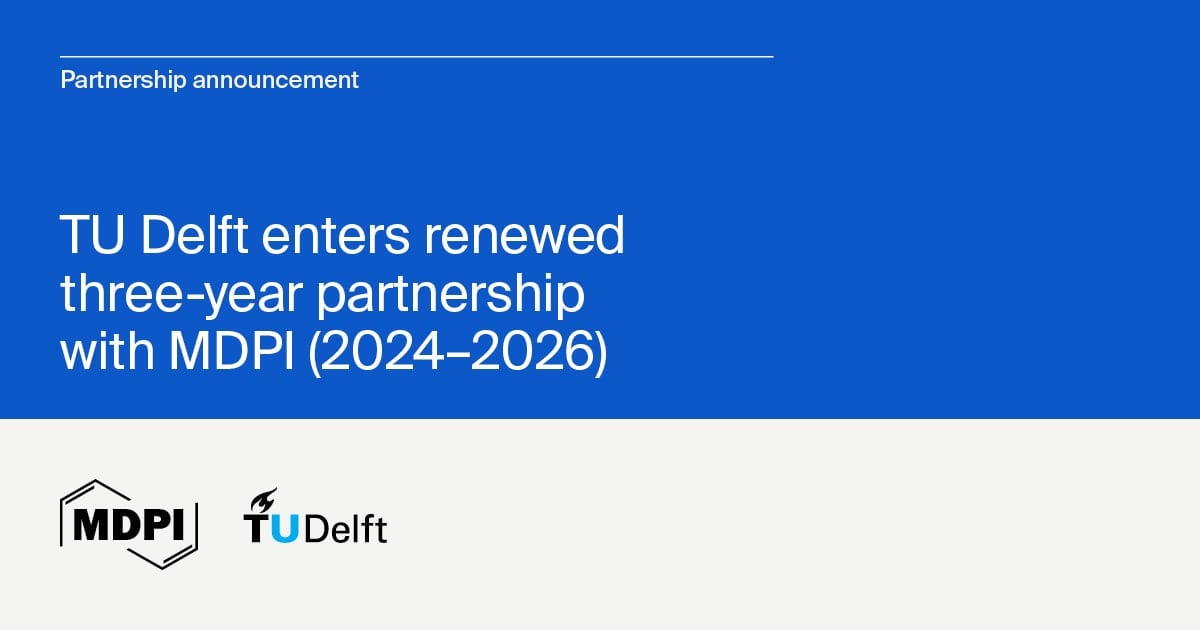
MDPI and TU Delft Adopt Flat Fee Model in Extended Partnership
We are excited to announce a renewed three-year partnership with Delft University of Technology (TU Delft) in the Netherlands. This collaboration introduces a fixed lump-sum fee, covering publishing costs from 2024 to 2026.
“This initiative reflects our dedication to transparent and inclusive publishing”
TU Delft-affiliated authors will enjoy cost-free publishing in any MDPI journal during this period, aligning with our commitment to removing barriers for open access publishing. The agreement supports Plan S compliance and facilitates a seamless publishing process for TU Delft corresponding authors. This initiative reflects our dedication to transparent and inclusive publishing, providing stability and predictability both for authors and for institutions.
For further details on our Institutional Open Access Program (IOAP), please contact us.
Benefits to MDPI’s IOAP
At MDPI we have a long tradition of partnerships, including our Institutional Open Access Program (IOAP). IOAP supports institutions through simplification, access, transparency, APC discounts, and institutional repository deposits. The program simplifies administrative processes, offers central payment, and allows easy opting in and out. Participants gain free access to Susy, MDPI’s online submission system, with extensive article metadata and exportable data. APC discounts and Book Processing Charge discounts are available for affiliated authors. Automated deposits to institutional repositories and streamlined matching of papers to IOAP participants enhance the overall experience.
For further information, see our IOAP FAQ.
Closing Thoughts

Reflections on the 2024 APE Conference
MDPI was proud to co-sponsor the Academic Publishing in Europe (APE) 2024 Conference that took place in Berlin, Germany, from 9–10 January 2024.
The conference theme, ‘Keep the Conversation Going!’, explored the evolving landscape of scholarly communication. APE is one of the key conferences I make a point to attend each year. January offers a valuable opportunity to engage with new contacts, reconnect with familiar faces, and participate in impactful discussions and presentations among professionals, scholars, and practitioners in the field.
“It's fascinating to see how other publishers are leveraging AI”
Highlights
Some of the standout panels for me include: the role of the UN Sustainable Development Goals (SDGs) within the publishing industry. It was encouraging to hear the current status quo, though I was eager also to learn about the exciting projects planned for 2024 and beyond. These will allow us to track progress in subsequent years. At MDPI, we remain committed to promoting Open–Access (OA) content on SDGs through scientific articles and books. Furthermore, we extend our commitment to sustainability by financially supporting researchers through initiatives such as the World Sustainability Award and the Emerging Sustainability Leader Award, as well as waiving the APC for feature papers on each SDG.
In recent years, discussions on AI have become increasingly prominent at such conferences. It’s fascinating to see how other publishers are leveraging AI to meet the evolving needs of their audiences while at the same time using it to safeguard the scientific process. Other engaging panels that I enjoyed included updates on transformation beyond transformative agreements, the principles of lean change, incentive structures related to research integrity, and the panel on reviewer incentives.
“We can share best practices and lessons learned”
Incorporating MDPI’s Insights into Conferences
I must confess that I sometimes feel overlooked when MDPI is not invited to participate in crucial industry discussions. As the leading open access publisher and the third-largest publisher overall, we possess extensive experience in many of these areas and can offer valuable contributions to these discussions. We can share best practices, lessons learned, and our thinking about future trajectories. For instance, in panels discussing reviewer incentives, at MDPI we offer a discount voucher to reviewers for future submissions, reflecting our commitment to fostering a robust peer review process. In 2022 alone, MDPI collected over 1.4 million peer review reports, informing the decision-making processes of our editors. Given our expertise in these areas, it would be natural to include MDPI in such discussions. I therefore extend an invitation to future conference organizers to consider MDPI for speaking engagements and collaborative opportunities.
Chief Executive Officer
MDPI AG
24 January 2024
Acknowledgment of the Reviewers of Brain Sciences in 2023
In recognizing the exceptional efforts of our reviewers in 2023, we express our sincere gratitude for upholding the high standards of Brain Sciences. Their commitment ensured the rigorous peer review that is integral to quality academic publishing.
In 2023, Brain Sciences received 5551 review reports, from 3326 reviewers. This past year, we worked with reviewers from 87 countries and regions, reflecting the diversity in our collaboration with research communities. Their dedication shapes scholarly discourse and advances global research. The editorial team expresses gratitude for the vital role played by each reviewer in the Brain Sciences family throughout 2023, and we look forward to their continued support in 2024.
The following are the reviewers who have consented to show their names:
| A. N. M. Mamun-Or-Rashid | Kenneth Chua |
| Aaron Manzanares | Kentaro Okamoto |
| Aarti Nagayach | Keun-Yeong Jeong |
| Abbas F. Almulla | Khadim Hussain |
| Abbas Malandish | Khurshid Ahmad |
| Abeir Osman Dabbous | Kijoon Lee |
| Abel Lerma | Kimbra Kenney |
| Abhishek Anant Kulkarni | Kira Bailey |
| Abhishek Jha | Klaas Bombeke |
| Abraham Rudnick | Koichi Hiraoka |
| Abul Bashar | Kokkinos Vasileios |
| Achmad Rizal | Konosuke Nakaji |
| Adam Wichniak | Konstantin Belosludtsev |
| Addisson Salazar | Konstantin Kozlov |
| Adela Badau | Konstantinos Drosos |
| Adelina Vlad | Kornelia Kreiser |
| Adina Roceanu | Krista Wartchow |
| Aditya Singh | Kristina Daunoravičienė |
| Adonis Yiannakas | Kristina Grabušić |
| Agbangla Nounagnon Frutueux | Krzysztof Skrzypkowski |
| Ahmad Salti | Kwon-Duk Seo |
| Ahmed Arafa | Kwun Kei Ng |
| Aikaterini Theodorou | Laikang Yu |
| Aili Wang | Lan Lin |
| Aiqing Nie | Laura Hatz |
| Ajinkya Pawar | Laureline Berthelot |
| Akhtar Akhtar | Leela Paladugu |
| Alberto D’Amico | Leigh Biagio-De Jager |
| Alejandro Botero Carvajal | Leire Pedrosa |
| Aleksandar Miladinovic | Leonardo Maria Savoia |
| Aleksandr N. Kornev | Leonardo Ranaldi |
| Alena Lochmannova | Leonardo Tariciotti |
| Alena Zolotareva | Leslie Hamilton |
| Alessandra Fioretti | Leticia Neira-Tovar |
| Alessandro O. Caffò | Li Fu |
| Alessandro Pedicelli | Lidia Perenc |
| Alessandro Quaglieri | Lifu Sheng |
| Alessio Facchin | Liliana Ibeth Barbosa-Santillan |
| Alexander Lykov | Liliana Pitacho |
| Alexander Nikolaev | Lipaz Shamoa-Nir |
| Alexander Robitzsch | Liudmila Gerasimova-Meigal |
| Alexandre Hudon | Livio Tarchi |
| Alexandrina Nikova | Livius D'Uscio |
| Alexandros Brotis | Lluïsa Quevedo |
| Alexis Murillo Carrasco | Lorena Sordo |
| Alfonso Mastropietro | Lorenzo Brognara |
| Alfredo Bellon | Lorenzo Faggioni |
| Ali Sadeghi Habibabad | Lorenzo Magrassi |
| Alice Witney | Lorenzo Nanetti |
| Alina Zorina Stuparu Stroe | Lorna Wales |
| Alison Anderson | Luca Bruschini |
| Alkinoos Athanasiou | Luca Flesia |
| Alma Delia Roman-Gutierrez | Luca Giacomelli |
| Almos Klekner | Luca Giovanni Locatello |
| Alwin Poulose | Lucia Carboni |
| Alyx Taylor | Lucia Načinović Prskalo |
| Amalia Cornea | Lúcio Ferreira |
| Amaranta De Miguel-Rubio | Luigi De Gennaro |
| Amelia Rizzo | Luigi La Via |
| Amin Mansoori | Luigi Tinella |
| Amin Nakhostin-Ansari | Luis Ibarra |
| Amine Khaldi | Luis Leitão |
| Amir Benzaoui | Luis Soto-Rojas |
| Amir Hosein Oveis | Luis Villalobos-Gallegos |
| Amirhesam Babajani | Luisa Faria |
| Amirmasoud Ahmadi | Lukasz Antkowiak |
| Amjad Elmashala | Luminita Nicolescu |
| Amjad Hussain | Lut Tamam |
| Amy Shapiro-Rosenbaum | M. C. Chinnaiah |
| Ana B. Ramos Hryb | M. Hunter Martaindale |
| Ana Leticia Fornari Caprara | Mabliny Thuany |
| Ana Paula Rodrigues | Maciej Skotak |
| Ana Sofia Vallés | Maciej Zdun |
| Anabela Correia | Magdalena Mackiewicz-Milewska |
| Anahi Chavarría | Mahmoud Abdallah |
| Anastasia Atabekova | Mahmoud Y. Elzanaty |
| Anastasia Raymer | Mahrous Abdelbasset Ibrahim |
| Anastasia Stoops | Małgorzata Chojak |
| Anastasiia Kotliarova | Małgorzata Matysek |
| Anastasiia Shkodina | Małgorzata Stachoń |
| Anastasios Giannopoulos | Man Qu |
| Anastasiya Kazantseva | Manikandan Samidurai |
| Anastassia Zabrodskaja | Manish Dhawan |
| Anca-Adriana Arbune | Manish Moghe |
| András Molnár | Manpreet Singh |
| Andre Luiz Costa | Manuel Vilar |
| Andrea Albonico | Marc Wittmann |
| Andrea Bianconi | Marcelo Arbo |
| Andrea Carai | Marcelo Coertjens |
| Andrea Frosolini | Marcelo Nascimento |
| Andrea Harrer | Marcin Moskalewicz |
| Andrea Mastinu | Marco Carli |
| Andrea Quattrone | Marco Cavallo |
| Andrea Scatena | Marco Fabbri |
| Andrea Tigrini | Marco Invernizzi |
| Andree Hartanto | Marcos Brioschi |
| Andrej Savic | Margherita Neri |
| Andres Calvillo | Margie Patrick |
| Andrés Godoy | Maria Addolorata Mariggiò |
| Andrew Geronimo | Maria Belén Alonso Ortiz |
| Andrew Huang | Maria Boboshko |
| Andrew Hulton | Maria Giovanna Bianco |
| Andrew J | Maria Korozi |
| Andrey Dubovoy | Maria Mola |
| Andrey Nasledov | Maria Sofologi |
| Ángel Becerra-Bolaños | Maria Strenacikova |
| Ángel Canal-Alonso | Maria-Jimena Mucino-Bermejo |
| Angelo Rega | Marialuisa Zedde |
| Angelo Torrente | Mariana Melo |
| Angelos Papadopoulos | Marina Kopaeva |
| Aniello Maiese | Marina Quartu |
| Aniruddha Das | Mario Acuña |
| Anja Leue | Marion Ferren |
| Ankit Tomar | Mariusz Dzieńkowski |
| Ann Dowker | Mariusz Hartman |
| Anna Castelnovo | Mariusz Siemiński |
| Anna Kabłak-Ziembicka | Mariya Smetanina |
| Anna Paradowska-Stolarz | Mark Greenlee |
| Anna_Antsiferova Antsiferova | Mark Reybrouck |
| Anna-Maria Barciszewska | Mark Wallace |
| Annibale Antonioni | Markus Aswendt |
| Anoop Rawat | Markus Fendt |
| Anson Kai Chun Chau | Marta Sylvia Del-Rio-Guerra |
| Anton Kiselev | Martin Klietz |
| Antón L. Martínez | Martina Donadoni |
| Antonio De Iure | Martina Ozbič |
| Antreas Kantaros | Marvin Soriano-Ursua |
| Anupa Ambili Vijayakumari | Maryam Bemanalizadeh |
| Anupama Gupta | Masahito Fushimi |
| Ao Shi | Masaru Tanaka |
| Arboix Adrià | Masoud Sadeghi |
| Archana Rajagopalan | Mateusz Piwowarski |
| Argyro Pachi | Matteo Bologna |
| Ariel Teles | Matteo Bradicich |
| Aron Tendler | Matteo Cotta Ramusino |
| Artur Słomka | Matthew Hiskens |
| Arunee Promsri | Matthew Hoptman |
| Arup Acharjee | Matthew O'Brien |
| Asra Al Fauzi | Matthias Boentert |
| Ateke Goshvarpour | Mattias Nilsson |
| Athanassios Tselebis | Maura Pilotti |
| Atukuri Dorababu | Mauricio Ramírez-Moreno |
| Atul Daiwile | Maurizio Marchesini |
| Aurelio Luna | Maxim Karagyaur |
| Aynur Aliyeva | Maximilian Scheer |
| Bahadar Srichawla | Mayur Doke |
| Barbara De Filippis | Meerambika Mishra |
| Baris Ozoner | Mehmet Baysal |
| Bartłomiej Gmaj | Mehran Emadi Andani |
| Bartłomiej Henryk Noszczyk | Mehran Shayganfard |
| Beatrice Adriana Balgiu | Mehrnaz Shoushtarian |
| Beatrice Ferrari | Melissa Derby |
| Beatrice Paradiso | Michael Craven |
| Bei Zhang | Michał Krakowiak |
| Bela Balint | Michal Ordak |
| Benjamin Villasana-Salazar | Michel Roethlisberger |
| Benjamin Voellger | Michela Maria Dimuccio |
| Berenice Fernández-Rojas | Michele Rizzi |
| Berrin Tunca | Mieszko Wieckiewicz |
| Bhanu Tewari | Miguel Angel Alcántara Ortigoza |
| Bhaswati Bhattacharya | Miguel Angel Lopez Gonzalez |
| Bhupinder Kumar | Mihael Tsalta-Mladenov |
| Bingren Zhang | Mihaela-Simona Subtirelu |
| Biswajit Karan | Mihai Dumitru |
| Boel de Paepe | Mikhail Bochkarev |
| Bogart Yail Marquez | Mi-Kyoung Cho |
| Bogdan Iliescu | Milan Toma |
| Boon Seng Liew | Milena Tomanic |
| Božena Ćurko-Cofek | Milija Mijajlovic |
| Bridget Bax | Miloš Mitić |
| Buong-O Chun | Minseon Park |
| Camil Mirestean | Miren Altuna |
| Caner Günaydın | Miriam Hickey |
| Carla Masala | Mirjana Čolović |
| Carla Mucignat | Mititelu Magdalena |
| Carlos López-De-Celis | Mitsuhiro Nito |
| Carlos Trenado | Mi-Yeon Eun |
| Carmen Gallardo-Montes | Mohammad Al-Wardat |
| Catarina Tomás | Mohammad Elmorsy |
| Caterina Piazza | Mohammad Etoom |
| Chandra Mishra | Mohammad Khan |
| Chandra Prakash | Mohammad Mofatteh |
| Changquan Zhang | Mohammad Qneibi |
| Chantal Delon-Martin | Mohammad Reza Khodaei Ardakani |
| Chao Ma | Mohammad Rostampour |
| Chen Xie | Mohammad Safari |
| Chenghao Chen | Mohammad Shahbakhti |
| Chengwei Huang | Mohammadreza Shalbafan |
| Cheryl Jones | Mohammed Mechee |
| Cherylea Browne | Mohammed Salah Al-Radhi |
| Chiara Cantiani | Mohammed Sallah |
| Chiara Pazzagli | Mohd Ismail Ibrahim |
| Chiara Saracini | Mohsen Soltanifar |
| Chih-Wei Zeng | Monia Vagni |
| Ching Sin Siau | Monika Zawadka-Kunikowska |
| Chin-Ting Liu | Montserrat Durán-Bouza |
| Chitra Rawat | Moon Fai Chan |
| Christian Barbato | Morteza Taheri |
| Christine Gross | Moumita Datta |
| Christine King | Muayad Albadrani |
| Christopher Bagley | Muhammad Alkasaby |
| Christopher E. Bauer | Muhammad Kamran Jamil |
| Christopher Hawk | Muhammad Yasir |
| Christopher Wilcox | Muhammet Baykara |
| Chuanlin Zhu | Mumtaz Begum Mustafa |
| Claire Jean-Quartier | Murat Ozgoren |
| Claudia Ferraris | Mustafa Al-Zamil |
| Claudia Marzi | Mustafa Kursat Sahin |
| Claudio Lucchiari | N. Scott Litofsky |
| Concepción Soto-Vidal | Nadia Ayub |
| Concetta Pirrone | Nadia Najafi |
| Constantin Munteanu | Nadia Rivero |
| Corinna Preusse | Naman Vatsa |
| Cristian Scheau | Nan Miao |
| Cristina Elena Horhogea | Naresh Poondla |
| Dae-Wui Yoon | Natalia Shnayder |
| Daisuke Matsushita | Nathan K. Evanson |
| Dalius Jatuzis | Nathaniel Szewczyk |
| Dan-Alexandru Szabo | Naveen Sendhilnathan |
| Daniel Griffiths-King | Nejc Kozar |
| Daniel Hier | Neluwa-Liyanage Indika |
| Daniel Ortuño-Sahagún | Nemat Ali |
| Daniel Ruivo Marques | Nevena Todorović Vukotić |
| Daniel San Juan Orta | Nicholas Catasso |
| Daniel Van Wamelen | Nico Golfrè Andreasi |
| Daniela Bulgarelli | Nicolas Perez-Fernandez |
| Daniela Dumitru | Nicoleta Anton |
| Daniele Corbo | Nicoletta Cera |
| Danijela Laketa | Nikola Hadzi-Petrushev |
| Danuta Jantas | Nikolaos Kakaletsis |
| Dario Calafiore | Nitika Kumari |
| Dario Siniscalco | Numan Ali |
| Dariusz Krok | Nuno Miguel Fonseca Ferreira |
| David Bar-Or | Octavian Vasiliu |
| David Catela | Olga Anatskaya |
| David Rodríguez | Olga Andrianova |
| Davide Marangon | Olga Shchagina |
| Debashis Dutta | Olga Sysoeva |
| Deborah Thorpe | Olga Valentim |
| Deepa Madathil | Olimpia Pino |
| Degaulle Chigbu | Oliver Toskovic |
| De-Li Shi | Oliwia Gawlik-Kotelnicka |
| Dènahin Toffa | Omar Cauli |
| Denis Silachev | Orhan Selcuk Guven |
| Deokjong Lee | Oriol Abellan-Aynes |
| Despina A. Tata | Orjena Žaja |
| Deyong Jia | Pablo Sanchez-Quinteiro |
| Deyu Li | Panagiotis Tsaklis |
| Dimitrios Panagopoulos | Paola Palumbo |
| Dinesh Verma | Paolo Antonino Grasso |
| Dinora Gonzalez Esquivel | Paolo Benna |
| Dionysios Tafiadis | Paolo Meneguzzo |
| Dmitry Gryadunov | Parastou Kordestani-Moghadam |
| Dmitry Sergeev | Paris Binos |
| Dmitry Zorov | Parisa Gazerani |
| Dmytro Chumachenko | Pascale Voelker |
| Domonkos Varga | Pasqualino Sirignano |
| Donal Sinex | Patrícia Pires |
| Dongdong Qin | Paul Tucan |
| Donghwan Park | Paulo Ricardo Gazzola Zen |
| Dora Luz Almanza Ojeda | Pawel Kiper |
| Dora Pinho | Payam Dibaj |
| Dorotea Kovačević | Pedro Gil-Madrona |
| Dragan Jankovic | Pei Huang Diao |
| Dragica Selakovic | Pekcan Ungan |
| Dragos Catalin Jianu | Pengyu Zong |
| Drozdstoy Stoyanov | Petar Brlek |
| Dushad Ram | Peter Liddle |
| Eberhard Uhl | Peter Rogelj |
| Ebubekir Kaya | Péter Ujma |
| Edgar G. Ordóñez-Rubiano | Petra Lenártová |
| Edoardo Pasqui | Phakkharawat Sittiprapaporn |
| Eduardo Enrique Sandoval Obando | Philip J. Young |
| Eduardo Gutiérrez-Abejón | Pier Nicola Sergi |
| Eduardo Rivadeneyra Domínguez | Pietro Cacialli |
| Eiichi Kumamoto | Pietro Scicchitano |
| Ekaterina A. Narodova | Pietro Spennato |
| Ekaterina Glebova | Placido Bruzzaniti |
| Ekaterina Yurchenko | Polina Pchelina |
| Eleanor Dommett | Prakash Babu Phanithi |
| Eleftherios Paraskevopoulos | Pranav Prabhakar |
| Elena Kremneva | Premranjan Kumar |
| Elena Murugova | Pushpa Joshi |
| Elena Vorobyeva | Puttipong Ponkhamhak |
| Elenko Popov | Qian Chen |
| Eleonóra Spekker | Qingqing Xiao |
| Eleuterio A. Sánchez Romero | Qing-Wei Chen |
| Elham Faghihzadeh | Qixiang Lin |
| Elisa Cairrao | Rabbani Syed |
| Eman Mehanna | Rafael Torres-Rosas |
| Emanuela Mari | Raghunadharao Digumarti |
| Emilia Iannilli | Rahul K. Kher |
| Emiliano Tesoro-Cruz | Rajat Emanuel Singh |
| Emmanouil Dermitzakis | Rajesh Kar |
| Enrico Apa | Rakesh Chandra Joshi |
| Enrique Estudillo | Rakesh Patel |
| Erdogan Bulut | Rakshit Shah |
| Eréndira Rendón-Lara | Ram Krishn Mishra |
| Ericka Rechy-Ramirez | Ram Sagar |
| Erik Behringer | Ramakanta Lamichhane |
| Esmaeel Saemi | Ramesa Bhat |
| Estefania Nuñez | Ramesh Kumar Paidi |
| Étienne Labyt | Ramkumar Kunka Mohanram |
| Eugene Postnikov | Rania Christoforou |
| Evangelia Antoniou | Raúl Quevedo-Blasco |
| Evangelia Maria Tsapakis | Raul Ruiz-Cecilia |
| Evgenia Sitnikova | Raywat Noiphithak |
| Ewa Krawczyk | Recep Gorgulu |
| Ewa Tomaszewska | Reinhold Feldmann |
| Fabio Santacaterina | Remington L. Nevin |
| Fabrizia Festante | Renata Novak Kujundžić |
| Faheem Shehjar | Renata Škrbić |
| Fang Tong | Renato Galzio |
| Fareeha Saadi | Renato Melo |
| Farhan Ali | Renshi Xu |
| Farshad Mirzavi | Renske Lok |
| Farzad Taghizadeh-Hesary | Renu Khasa |
| Fatma Kolsi | Reza Zolfaghari Emameh |
| Federica Fogacci | Riadul Islam |
| Fenglei Li | Richard Kruk |
| Fernanda Gentil | Rob Donovan |
| Fernando Cardona | Robert Emmett Kelly |
| Fernando Muñoz-Hernández | Robert Hoerr |
| Fernando Suparregui Dias | Robert L. Meisel |
| Fiorenzo Moscatelli | Robert Prentner |
| Flavio Kock | Roberta Messina |
| Florian Schmitz | Roberto Sanchez-Cabrero |
| Forogh Soltaninejad | Robin Cooper |
| Fouzia Munir | Rocío Llamas-Ramos |
| Franca Guerini | Rodrigo Herrera-Molina |
| Francesc Graus | Rohan Nagare |
| Francesca Conte | Rosa Purgatorio |
| Francesca Felicia Operto | Rosario Sarabia |
| Francesca Luisa Conforti | Roslyn Livingstone |
| Francesca Magnani | Rowena Ng |
| Francesca Mazzoli | Roxana Liana Lucaciu |
| Francesca Pisano | Ruben Antonio Vazquez-Roque |
| Francesco Crenna | Rubén Arroyo Fernández |
| Francesco Perono Cacciafoco | Rubén San-Segundo |
| Francesk Mulita | Rui Milton Da Silva-Jr |
| Francisco Guillen-Grima | Rui Vilarinho |
| Francisco Lázaro-Diéguez | Rui Vitorino |
| Francisco Nieto Escámez | Ruijie Wang |
| Francisco Paulo Magalhães Simões | Rupal Mehta |
| Francisco Sandro Menezes-Rodrigues | Rupesh Kumar Chikara |
| François Jamar | S. M. Yasir Arafat |
| Frank Hall | S. Ramkumar |
| Frédéric Isel | Saber Saedmocheshi |
| Fredrik Nylén | Sabya Sachi Das |
| Frigyes Racz | Salar Vaseghi |
| Gabriela Dumitru | Samar Tharwat |
| Gabriele Melegari | Sandeep Kumar Mishra |
| Gabriella Panuccio | Sandrine Basaglia-Pappas |
| Gador Canton | Sanjid Shahriar |
| Gang Li | Sanjin Kovacevic |
| George Imataka | Sara Andreetta |
| George Paraskevas | Sara Invitto |
| George Stoyanov | Sarawut Lapmanee |
| Georges Dumas | Sarika Gopalakrishnan |
| Georgi Panov | Satwant Kumar |
| Georgia Angelopoulou | Sayyed Ali Samadi |
| Georgios Georgiou | Scott Sinnett |
| Gerald Lushington | Sean Meehan |
| Gerardo Guinto | Semer Maksoud |
| Gerardo Marín | Şenay Mihçin |
| Gessica Sala | Seong-Eun Kim |
| Ghasem Farahmand | Serena Dattola |
| Ghassan Sulaiman | Sergei Gaidin |
| Giacinto Barresi | Sergei Grishin |
| Giacomo Tondo | Sergey Lytaev |
| Gian Mario Migliaccio | Sergey Okovityi |
| Gilbert Sterling Octavius | Sergio Da Silva |
| Giorgia Sollai | Sergio Iglesias-Parro |
| Giorgio Treglia | Sergio Serrada-Tejeda |
| Giorgos Dritsakis | Seyed Ahmad Naseri Alavi |
| Giovanna Gambarotta | Seyed Khosrow Tayebati |
| Giovanni Mirabella | Shadma Wahab |
| Giovanni Pennisi | Shai Factor |
| Giulia Berzero | Shalini Dogra |
| Giuseppe Broggi | Shambaditya Das |
| Giuseppe Varone | Shao-Ming Wang |
| Glòria Reig-Garcia | Sharad Gupta |
| Gniewko Wieckiewicz | Shastri Motilal |
| Gonzalo Aranda-Abreu | Sheila Veronese |
| Gourav Chandan | Shenghong He |
| Graeme Bolger | Sherief Ghozy |
| Gregory Deangelis | Shiek Ahmed |
| Grigol Keshelava | Shilpa Sonti |
| Grigorios Dimas | Shirley Russ |
| Grzegorz Zieliński | Shiva Hemmati |
| Guangyan Wu | Shu Zhang |
| Guglielmo Lucchese | Shubin Shahab |
| Guilherme Montes | Silvia Leoncini |
| Gülay Taşcı | Silvia Palma |
| Gustavo Christofoletti | Simone Barreto |
| Gyanesh Kumar Tiwari | Siniša Đurašević |
| Györgyi Műzes | Sirous Naeimi |
| Hadeel Halaweh | Sirvan Najafi |
| Haijun Duan | Sławomir Mitrus |
| Hajar Mehdizadeh | Sofya Kulikova |
| Hamoon Zohdi | Sohail Mumtaz |
| Hamzeh Baharlouei | Soheil Abbaspour-Ravasjani |
| Han Hou | Soledad Ballesteros Jimenez |
| Han Naung Tun | Song Wang |
| Hang Zeng | Sonia Aroni |
| Hantai Kim | Sonia Brito-Costa |
| Hanvedes Daovisan | Sotiria Vrouva |
| Hao Xu | Sounak Bagchi |
| Harikesh Dubey | Sourav Patnaik |
| Hasan Al-Nashash | Sousana Papadopoulou |
| Hassan Banaruee | Souvagya Panigrahi |
| Hassan Khajehpour | Srimant Tripathy |
| Hassan Mirzaei | Stanislav Naryzhny |
| Hatem El-Shanti | Stefan Linsler |
| He Sun | Stefanie Flunkert |
| Heather Leduc-Pessah | Stefano Eleuteri |
| Helen Cohen | Stefano Pieretti |
| Helena Reis | Stefano Priola |
| Henk Maria Koning | Steffi Urbschat |
| Hernan Peraza-Vazquez | Stela Dragomanova |
| Hipolito Nzwalo | Stephan Becker |
| Hiroaki Neki | Stylianos Tomaras |
| Hisham M. Khudhur | Subbarao Madhunapantula |
| Hong Cheng | Sudarsan Jayasingh |
| Honghe Liu | Sulin Zhang |
| Hsi-Lung Hsieh | Suman Chowdhury |
| Hui Liu | Sun Park |
| Huiyin Tu | Suraj Mali |
| Humaira Nisar | Surej Mouli |
| Idit Maharshak | Surya Nirmal |
| Igor Iskusnykh | Susana Silva |
| Igor Vujović | Suzanne De La Monte |
| Iker Madinabeitia | Syed Mohd Faisal |
| Ilaria Dettori | Syed Muhammad Usman |
| Ilias Kazanis | Sylvère Störmann |
| Ilze Beitane | Tamara (Ceranic) Skoric |
| Iman Tavassoly | Tamás Major |
| Indranath Chatterjee | Tariq Alalwan |
| Ines Elbini | Tatiana Moshonkina |
| Ines Kozuh | Tatsuya Igawa |
| Inés Llamas-Ramos | Tatyana Baltina |
| Ioannis Kansizoglou | Telma Almeida |
| Ioannis Stavropoulos | Teru Kamogashira |
| Irfan Ullah | Thayne Kowalski |
| Irina Novikova | Theng Choon Ooi |
| Irini Patsaki | Theocharis Tsironis |
| Irshad Ahmad | Theofanis Vavilis |
| Isabel Escobio Prieto | Thomas Mayers |
| Isac Sebastian | Thomas Van Groen |
| Isaías Martín-Ruiz | Tiago Santos |
| Isain Zapata | Tibor Guzsvinecz |
| Israel Miguel Andres | Tin-Tin Win-Shwe |
| Issa Atoum | Tito Brambullo |
| Ivan Cuk | To-Jung Tseng |
| Iván Padrón | Tomasz Frączyk |
| Ivana Guševac Stojanović | Tommaso Ercoli |
| Ivano Caselli | Tomohiro Torii |
| Ivelina Stoyanova | Torbjörn Ledin |
| Ivo Bozovic | Toshihiro Nomura |
| J. D. Benítez Sillero | Toshikazu Kimura |
| Jacopo Garzonio | Triantafyllos Didangelos |
| Jacopo Junio Valerio Branca | Tuane Sampaio |
| Jacopo Lamanna | Tunde Csepany |
| Jacopo Lisoni | Ufuk Erginoglu |
| Jacqueline M. Bentel | Usman Ghafoor |
| Jad El Masri | Uwe Ilg |
| Jae Kyu Ryu | Vaitsa Giannouli |
| Jaime Devine | Valentina Simonova |
| Jakub Kufel | Valeria Saccà |
| Jakub Słupski | Valeriia Demareva |
| Jalal Uddin | Vanessa Arán Filippetti |
| James Brasic | Vanja Kopilaš |
| James Roberts | Vanner Boere |
| Jamir Pitton Rissardo | Vasiliki Zarokanellou |
| Janitschke Daniel | Vassiliy Tsytsarev |
| Jared Ahrendsen | Veria Vacchiano |
| Jarosław Zubrzycki | Veronique Billat |
| Javier Merino-Andres | Vicki Butenschoen |
| Jeffrey Bakken | Vijaya Anand Arumugam |
| Jelena Ban | Vinay Vakharia |
| Jennie Sotelo-Orozco | Vincenzo Ronca |
| Jérôme Coste | Vinod Nadella |
| Jia Wen Li | Viral Tejani |
| Jinming Han | Vishwanath Prabhu |
| Joana Damásio | Vitalie Lisnic |
| Joanna Kossewska | Vitor Parola |
| Joanna Solich | Vivek Kumar |
| Joao Carmo | Vjekoslav Peitl |
| João Gama Marques | Vlad Dima |
| Johannes Wach | Vladimir Pisarev |
| John A. St.Cyr | Wai San Cheang |
| John Dirk Vestergaard Nieland | Wajdy Al-Awaida |
| John Executive Director/Professor | Wan-Ju Annabelle Lee |
| John Oas | Warawoot Chuangchai |
| John Shelley-Tremblay | Wedad Sarawi |
| John Stanford | Wei Huang |
| Jolanta Orzelska-Gorka | Wei Xu |
| Jonathan Young | Wen-Chih Liu |
| Jorge Manzo | Wladimir Bocca Vieira de Rezende Pinto |
| Jorge Márquez | Władysława Daniel |
| Jorge Sánchez-Infante | Wojciech Skrobot |
| José López Castro | Wolfgang Trapp |
| Jose Luis Perez-Lasierra | Woon‑Man Kung |
| José Manuel Otero-López | Xiao Jian Tan |
| Jose Manuel Saiz-Alvarez | Xiaochen Zhang |
| Jose Paulo Marques Dos Santos | Xiaoguang Liu |
| José Pedraza-Chaverri | Xin Tong |
| Josep Clua-Espuny | Xin Wang |
| Josep Demestre | Xin Xu |
| Joško Šoda | Xinhong Chen |
| Joydeep Chakraborty | Xuan Ma |
| Jože Guna | Yahya Ahmadipour |
| Juan Pablo Damián | Yan Zhan |
| Juan Pablo De Rivero Vaccari | Yang Zhang |
| Julie Liss | Yanmei Tie |
| Julieta Domínguez-Soberanes | Yaoli Mao |
| Juliusz Huber | Yasin Hasan Balcioglu |
| Jun Wang | Yavuz Samanci |
| Junchao Tong | Yavuz Taspinar |
| Junxiang Chen | Yike Yang |
| Juvenal Rodriguez | Yin Li |
| Kabirullah Lutfy | Yinglei Song |
| Kacper Nijakowski | Yiwen Meng |
| Kaila Stipancic | Youngbeom Seo |
| Kalyani Chaubey | Yu Huang |
| Kamil Koszela | Yuchen Zhou |
| Kanon Jatuworapruk | Yue Hui Lau |
| Karel Kostev | Yuen Gao |
| Karel Van Den Bosch | Yufeng Zhou |
| Karolina A. Wojtunik-Kulesza | Yuko Nakamura |
| Katarzyna Bobrowicz | Zaid Alyasseri |
| Katarzyna Nowakowska-Domagała | Zenon Pogorelić |
| Katarzyna Zaborowska-Sapeta | Zhengwu Peng |
| Kazuhiro Tsuchiya | Zhifeng Chen |
| Kazuki Tokumasu | Zhiyuan Xu |
2 January 2024
MDPI Insights: The CEO’s Letter #7 - Nobel Laureates Entrust MDPI with Their Research

Welcome to the MDPI Insights: The CEO's Letter.
In these monthly letters, I will showcase two key aspects of our work at MDPI: our commitment to empowering researchers and our determination to facilitating open scientific exchange.
Opening Thoughts

Nobel Prize Laureates Entrust MDPI with Their Research
The Nobel Prize stands as a hallmark of distinction, honouring ground-breaking research across disciplines. Annually, the Nobel Prizes are awarded in six categories: Physics, Chemistry, Medicine or Physiology, Literature, Peace, and Economic Sciences.
Through the years, renowned scholars have entrusted MDPI with their work. As at December 2023, 26 Nobel laureates have contributed to more than 75 articles across 25 MDPI journals, including: Antibiotics, Applied Sciences, Biology, Biomedicines, Cancers, Catalysts, Cells, Crystals, Entropy, Games, IJMS, Life, Materials, Micromachines, Molecules, Pharmaceuticals, Pharmaceutics, Photonics, Quantum Beam Science, Remote Sensing, Sensors, Solids, Universe, Vaccines, and Viruses.
The best of the best trust us with their work.
Nobel Prize Laureates Who Have Published with MDPI
We are proud to list the names of Pierre Agostini, Hiroshi Amano, Werner Arber, Aaron Ciechanover, Robert H. Grubbs, Oliver Hart, Gerard ‘t Hooft, Michael Houghton, Harald zur Hausen, Katalin Karikó, Jean-Marie Lehn, Gérard Mourou, Ferid Murad, Shuji Nakamura, William Nordhaus, Kostya S. Novoselov, Giorgio Parisi, Charles M. Rice, Alvin E. Roth, Donna Strickland, K. Barry Sharpless, George F. Smoot, Anne L’Huillier, Drew Weissman, Kurt Wüthrich, Ada Yonath.
The privilege of hosting such contributors resonates deeply with our editorial teams. For instance, in this interview, the Editor-in-Chief (EiC) of Universe speaks on the significance of publishing a paper by Nobel laureate Gerard ’t Hooft within the journal.
2023 Nobel Prize Winners Published by MDPI

Nobel Prize Winners, 2023: Katalin Karikó, Drew Weissman, Anne L’Huillier (Ill. Niklas Elmehed © Nobel Prize Outreach)
Three laureates from the 2023 Nobel Prize cohort have trusted MDPI as their publishing platform. Notably, in a 2022 Pharmaceutics paper, molecular biologist Katalin Karikó and her team presented a methodology for evaluating mRNA capping efficiency, pivotal for therapeutic applications. Pharmaceutics had previously dedicated a Special Issue to “mRNA Therapeutics: A Themed Issue in Honor of Professor Katalin Karikó”, spotlighting ten articles from August 2021 to February 2022.
In the journal Vaccines, Professor Drew Weissman, collaborating with scholars from Pennsylvania University and George Mason University, contributed an influential review titled “Nanomaterial Delivery Systems for mRNA Vaccines”. His collaborative efforts spanned five papers across MDPI journals between 2021 and 2023.
Furthermore, Anne L'Huillier of Lund University, only the fifth female recipient of the Physics Prize, co-authored an article in Applied Sciences focusing on "Advanced EUV and X-Ray Optics". Similarly, Pierre Agostini, an Emeritus Professor from Ohio State University, co-authored an article featured in the special issue "Attosecond Science and Technology: Principles and Applications".
We extend heartfelt congratulations to all Nobel Prize laureates and express sincere gratitude for their confidence in MDPI as a platform for their scholarly contributions.
Read more:
Impactful Research

MDPI Journals Newly Indexed in 2023
The aim of indexing is to enhance the quality and credibility of published research, ensuring that researchers access the most credible resources available. While the principle behind citation indexing is straightforward, it remains one of the most dependable methods for tracking an idea's evolution across various scientific disciplines.
Throughout the year, MDPI works to expand the reach of our publications across premier multidisciplinary databases like Web of Science, Scopus, EBSCO, and ProQuest. This initiative is spearheaded by MDPI's Indexing team, under the leadership of Dr. Constanze Schelhorn.
In 2023, MDPI achieved 54 new acceptances in Scopus, 29 in Web of Science, 52 in EBSCO, and 83 in DOAJ: Directory of Open Access Journals.
The team prioritizes ensuring that our journals feature in numerous specialized databases, including PMC, PubMed, MEDLINE, Inspec, CAS, and FSTA, among others. Currently, MDPI collaborates with over 65 renowned international databases, consistently enhancing our database affiliations annually.
MDPI’s journals are indexed in all major global databases.
Furthermore, we collaborate with universities and government organizations to list our journals in country-specific ranking lists and relevant institutional repositories. This ensures compliance with requirements often set by funders or institutions for authors to publish in specific journals.
Web of Science Adds 24 MDPI Journals to Emerging Sources Citation Index (ESCI)
Clarivate recently analysed MDPI’s new journals, resulting in 24 journals, mainly established in 2020, being added to the ESCI in November and December 2023. Additionally, five journals passed this assessment earlier in the year. For a complete list of our journals in Web of Science, refer here. Journals in the ESCI meet 24 quality criteria, ensuring editorial rigor. They may be considered for inclusion in broader indices like the Science Citation Index Expanded (SCIE), the Social Sciences Citation Index (SSCI), or the Arts and Humanities Citation Index (AHCI), based on four impact criteria.
Read more:
Inside MDPI

MDPI Appoints New Chief Operating Officer (COO)

Alistair Freeland returned to MDPI and assumed the role of Chief Operating Officer in November 2023, a position he previously held from 2013 to 2019. He succeeds Dr. Yu Lin, who will remain a member of MDPI’s Board of Directors, overseeing significant financial decisions for the company. I would like to express my sincere thanks to Dr. Yu Lin for his service as COO.
Alistair brings extensive experience not only in scholarly publishing but also in technology and business management. Prior to rejoining MDPI, he was associated with SIX Group, the entity responsible for Switzerland's financial market infrastructure. There, he played a pivotal role in developing the blockchain-based platform SDX (SIX Digital Exchange), which has gained traction among major Swiss banks and the Swiss National Bank.
As COO, Alistair will collaborate with the MDPI management team to improve the practices and services we offer to scholarly communities. I am pleased to welcome Alistair back to MDPI and look forward to his contributions going forward.
Coming Together for Science

MDPI’s 2024 In-Person Academic Events Schedule
MDPI's Conference Team is dedicated to organizing and hosting in-person academic events across Europe, Asia-Pacific, and North America. We recognize conferences as invaluable platforms for scientific collaboration, scholarly exchange, discussions on contemporary topics, networking, and forging collaborations.
Here's a glimpse of the notable events we currently have scheduled for 2024:
|
|
14–16 February, 2024 |
|
|
24–26 April, 2024 |
|
|
28–31 May, 2024 |
|
|
1–4 August, 2024 |
Upcoming events with details to be announced:
- September 2024, Materials 2024 – Basel, Switzerland
- 19–21 September 2024, International Conference on Nanomaterials Sciences 2024 – Beijing, China
- October 2024, ncRNA 2024 – Basel, Switzerland
- November 2024, Pharmaceuticals 2024 – Barcelona, Spain
- 22–26 November 2024, International Conference on Science of Electronics – Wuhan, China
- Stay tuned for more details on the Sustainable Publishing Forum 2024.
Click here for all upcoming MDPI events.
Organize Your Event with MDPI’s Sciforum
Sciforum is MDPI’s platform dedicated to the organization of scientific events. In line with our mission to promote science, Sciforum supports scholars, societies, research networks, and universities at all stages of organizing in-person events, virtual events and webinars. Our platforms are efficient, user-friendly, and cost-effective. We handle all steps related to event management. Contact us for details.
Closing Thoughts

Reflecting on 2023 and Looking Ahead to 2024
As we approach 2024, I reflect on the incredible journey we’ve had together at MDPI this year. The past 12 months have been marked by ambitious projects and initiatives to improve our internal processes, and a commitment to continue delivering top-notch services to our stakeholders. I’d like to thank each and every one of our staff members for contributing to the positive experiences our stakeholders have reported in our surveys. Your dedication to speed, efficiency, and effective communication with our stakeholders is very much recognized and appreciated.
Becoming a stronger organisation
While we have encountered challenges in 2023, it’s important to understand that these are a part of our growth process. Difficulties provide us with opportunities to reflect, address problems at their roots, and ultimately evolve into a stronger organization. Our stakeholders expect us to overcome tough times, and it’s an expectation that we have for ourselves.
I extend my sincere appreciation to every MDPI employee, from our editorial office and IT department to marketing, indexing, IOAP, societies, Scientific Office board, products, production, conferences, finance, operations, admin, and beyond. To our newest team members, a warm welcome; to our longstanding colleagues, your dedication is invaluable.
“I am committed to taking MDPI to a new level of excellence.”
Interacting with many of you during my visits to our offices and representing MDPI at external events has been a personal highlight. I am deeply grateful to Dr. Lin for entrusting me with the role of CEO of MDPI. Looking forward, I am committed to working closely with our management team to lead MDPI and take it to a new level of excellence, aiming to establish it as the most trusted publisher in open access worldwide. This is a collective endeavour, with each of us shaping MDPI’s reputation. I therefore encourage us to take pride in our work, as it represents not only our craft but also MDPI as a whole.
Accountability and communication
As we look forward to 2024, there’s a lot to be excited about. Together, we’ll navigate challenges, seize growth opportunities, and refine our practices. To solidify MDPI’s position as the premier open access publisher globally, we must bolster accountability, improve stakeholder communication, share MDPI’s best practices, champion the open access philosophy, and educate stakeholders about our mission, methodologies, and motivations.
Thank you for engaging with the CEO Letter over the past six months of 2023. I will continue to release this newsletter as a method of sharing the great work being done at MDPI. Please feel free to connect directly with any insights or questions.
Here’s to a joyous and prosperous 2024!
Chief Executive Officer
MDPI AG
30 November 2023
MDPI Insights: The CEO’s Letter #6 - MDPI Spain Summit and ResearchGate

Welcome to the MDPI Insights: The CEO's Letter.
In these monthly letters, I will showcase two key aspects of our work at MDPI: our commitment to empowering researchers and our determination to facilitating open scientific exchange.
Opening Thoughts

MDPI Spain Summit

Stefan Tochev (CEO, MDPI) gives the opening speech at the MDPI Spain Summit.
On Friday 10 November 2023 I was in Barcelona, Spain, to deliver the opening presentation and participate in a panel at MDPI’s Spain Summit, a two-day event, inspired by our salon events in China.
With 16 Editors-in-Chief (EiCs) and 20 Editorial Board Members (EBMs) in attendance, the event, organized by our conference team and Barcelona office, featured presentations on open access (OA), MDPI, and publishing market trends in Spain.
The event provided a great opportunity to engage with stakeholders from various MDPI journals, including Nutrients, Vaccines, Buildings, IJMS, and others. We were able to gather feedback and have open conversations around manuscript quality, the peer-review process, and journal development, as well as accreditation agencies.
The main objective of this Summit was to bring together Editors representing MDPI journals across various disciplines within Spanish universities and research centers, primarily from the Barcelona area. The aim was to facilitate an open and fruitful discussion regarding the development of their journals, the future of OA in Spain, and to provide meaningful interactions and networking opportunities.
Connecting with Editorial Board Members

Stefan Tochev in conversation with Summit participants: "Our EBMs are passionate about the journals they serve."
Interacting with our EBMs in person provides a valuable opportunity to show how important it is to us to connect with them, hear their perspectives on their journals and learn more about their own experience collaborating with MDPI.
From my conversations, it was clear that our EBMs are passionate about the journals they serve. I know the advice they provide may sometimes involve just small tweaks, but these can lead to important improvements. As the saying goes, small hinges swing open big doors.
As at November 2023, MDPI has over 6,300 EBMs affiliated with Spanish institutions, with more than 30 of them serving as EiCs or section EiCs. Furthermore, over 68,000 Spanish scholars have contributed as reviewers in MDPI journals.
Open Access in Spain
In 2023, Spain implemented legislation mandating immediate OA for all publicly funded research, aligning with the EU’s Plan S initiative to expedite the transition to OA. The Spanish government also approved a four-year, €23.8 million annual budget for the first national OA strategy, aiming to make publicly funded research freely accessible upon publication. This strategy aims to strengthen the quality and transparency of research in Spain, and to help promote movement towards a digital, low-carbon economy.
For further details of Spain's OA policy and the history of government mandates, click here.
Spain has already seen a notable decline in subscription-only articles, decreasing by 62% over a 10-year period, while gold OA increased by 42%. Green OA slightly decreased, suggesting a shift towards publishing in gold OA journals rather than traditional subscription-based ones. Here are some statistics from Scopus.
A big thank-you to the various MDPI teams, including our conference team and the Barcelona office, for organizing this very successful event!

MDPI colleagues from various offices gathered to host and support the first MDPI Spain Summit, in Barcelona, Spain.
I think this type of gathering has the potential to become an annual event in various locations. For example, Manchester could be an option, as we have over 30 EiCs and over 3,000 EBMs in the UK, a top market for MDPI that publishes high-quality research.
Impactful Research

769 Editorial Board Members of MDPI Journals Recognized as Highly Cited Researchers in 2023
Congratulations to our 769 Editorial Board Members from 40 countries/territories who have been awarded Highly Cited Researcher status for 2023 by Clarivate. This recognition is based on their outstanding scientific research contributions and significant influence in various fields, as evidenced by Web of Science data.
Click here to view the full list of 769 Editorial Board Members.
Clarivate's Highly Cited ResearchersTM list identifies individuals with exceptional impact in scientific and social science domains over the past decade. Their papers rank in the top 1% of citations in 21 fields analysed in ‘Essential Science Indicators,’ showcasing their substantial influence.
This year, 7,125 Highly Cited Researcher 2023 designations were issued to 6,849 individuals from 67 countries, representing just 1 in 1,000 researchers worldwide.
These researchers demonstrate exceptional influence, representing a small fraction of contributors pushing the boundaries of knowledge, contributing to global well-being, sustainability, and security.
Congratulations to these scholars for their remarkable achievement: we are honoured to have them on board with our journals!
Inside MDPI

Corporate Marketing and Communications Strategy Session

Members of MDPI’s Corporate Marketing & Communications team.
For the past few years, I have led the Corporate Marketing & Communications department in our annual strategy session.
This typically involves 2–3 days of focused sessions covering key topics including budgeting, hiring targets, campaign reviews, and planning for the upcoming year, department strategy, and structure.
We are constantly exploring ways to optimize the Corporate Marketing & Communications department to support MDPI’s primary objectives and better convey the MDPI story while serving the scholarly community.
The strategy session also serves as a team-building activity, during which the team voted on bowling!
Strategy Session
In this strategy session, we looked at how to align our teams in order to better streamline our content with our campaigns, build a dedicated marketing team to strategically support our core MDPI products, expand our communications teams and functionalities to focus on company-critical campaigns and press releases, align our new brand design system with our marketing initiatives, set up a community and engagement team to support various teams with their outreach and communication efforts, and increase our use of data in the evaluation of campaign performance.
To grow in these areas, we will be hiring for various positions, including those of Public Relations Manager, Communications Manager, Internal Communications Manager, Campaign Manager, Marketing Associate, and Editorial Engagement Manager.
I am grateful for the way our Corporate Marketing & Communications department has grown and gelled over the years, and I look forward to supporting the department teams and their ideas for the future.
Coming Together for Science

ResearchGate and MDPI Partner to Boost the Visibility of Open Access Content through Journal Home

Stefan Tochev (CEO, MDPI) and Sören Hofmayer (Co-Founder and Chief Strategy Officer, ResearchGate) meet in Berlin, Germany to take their ongoing discussion further.
When I assumed the role of CEO at MDPI, my primary focus was to initiate the building of essential partnerships and collaborations within our industry. After all, I am a firm believer in achieving our goals by helping others achieve theirs and focusing on co-opetition wherever there is an opportunity. I first touched on the notion of co-opetition in MDPI Insights: The CEO's Letter #3, particularly when discussing collaborations with Elsevier.
In light of this, Sören Hofmayer (Co-Founder and Chief Strategy Officer at ResearchGate) and I connected recently to continue a discussion that had been ongoing for months. I was quickly brought up to speed and felt there was an opportunity for MDPI journals to pilot the Journal Home service that ResearchGate had launched. This would provide a new way for MDPI to engage with authors and readers and amplify the visibility of our journals.
While I receive many offers and opportunities for discussions with vendors, I am a firm believer that timing is everything, and in this case, the time for us is now. Sören and I met in person during my recent visit to Berlin and decided to proceed with piloting ten MDPI journals with the Journal Home service.
The press release below provides further details.
Press Release: Berlin (Germany) and Basel (Switzerland), 15 November 2023
ResearchGate, the professional network for researchers, and MDPI, the largest open access publisher in the world and a pioneer in open access publishing, today announced a partnership that will see ten of MDPI’s open access journals benefit from an enhanced presence on ResearchGate through its innovative Journal Home offering.
This new partnership will expand the reach and visibility of MDPI’s participating flagship journals with ResearchGate’s highly relevant community of more than 25 million researchers globally.
Around 210,000 version-of-record articles from these 10 titles will be readily available on ResearchGate, including the full archive material and all new articles as they are published. These journals also benefit from enhanced brand visibility, with dedicated journal profiles, prominent representation on all associated article pages and all relevant touchpoints across the ResearchGate network – keeping the journals top-of-mind with their reader and author audiences. All articles covered by the new partnership will automatically be added to the authors’ publication records in ResearchGate. This not only reduces MDPI authors’ needs for direct management but also offers them valuable insights into the impact of their work, including data about readership and citations.
Closing Thoughts

November is Men’s Health Awareness Month

Stefan Tochev (CEO, MDPI) listening to music as he writes at a coffee shop in Basel, Switzerland.
November is dedicated to raising awareness of various men’s health issues. I have been fortunate to have positive male role models in my life, and I strive to share my experiences with others.
I used to take part in Movember, growing my moustache throughout November to raise awareness and funds and to help “change the face of men’s health.” With male family and friends impacted by physical and mental health issues, I have recently become more interested in men’s overall well-being.
Men often face stigma involving the perceived need always to be strong and have things figured out. Recently, I’ve had meaningful conversations with male friends and colleagues about issues we rarely discuss, and it was a positive experience.
Various factors impact men’s health and well-being, all too easily leading to risky health behaviours including a lack of health awareness, poor health education, and negative, culturally induced, behaviour patterns in our work and personal lives. I hope we can break down these barriers in our work environment.
Healthy men help build healthy families and a healthy society
Men are less likely than women to seek help with their physical and mental health struggles. This is a reminder to prioritize your overall well-being. I hope that as men, we will continue to open up to one another, becoming vulnerable in order to share what we are going through. By sharing and by supporting each other, we can learn and grow together. You are not alone, and when you fall, you can still get up and stand tall.
From one broski to another, you are loved and appreciated. I hope this mindset carries into December and beyond.
Mindfulness
Our content team recently released a handful of articles on mindfulness, a practice that I believe provides a good opportunity for stress release and self-reflection:
Chief Executive Officer
MDPI AG
21 November 2023
769 Editorial Board Members of MDPI Journals Achieve Highly Cited Researcher Recognition in 2023

We extend our sincere congratulations to the 769 Editorial Board Members of our journals – from 40 different countries/territories – who have been recognized as Highly Cited Researchers for the year 2023 by Clarivate. They are being recognized for their high-quality scientific research achievements and outstanding contributions to their professional fields, as indicated by Web of Science data.
Clarivate's annual list of Highly Cited ResearchersTM identifies the most highly cited scientists for the past decade who stand out for their significant and broad influence in various scientific and social science domains. Their impactful papers are among the top 1 per cent in the citation distribution of one or more of 21 fields analyzed in the "Essential Science Indicators", distinguishing them as hugely influential among their peers.
This year, 7,125 Highly Cited Researcher 2023 designations were issued to 6,849 individuals from 67 countries, representing just 1 in 1,000 researchers worldwide.
This means that these researchers have demonstrated an incredible level of significant and broad influence in their chosen field or fields over the last decade. They represent a small fraction of the researcher population whose contributions disproportionately push the boundaries of knowledge, enhancing global well-being, sustainability, and security.
Congratulations to the scholars for their noteworthy achievement – we are honored to have them on board with our journals!
|
Abate, Antonio |
Jaiswal, Amit K. |
Shen, Zexiang |
1 November 2023
MDPI Insights: The CEO’s Letter #5 - OA Week, UK, and Strategy

Welcome to the MDPI Insights: The CEO's Letter.
In these monthly letters, I will showcase two key aspects of our work at MDPI: our commitment to empowering researchers and our determination to facilitating open scientific exchange.
Opening Thoughts

Open Access Week 2023 – the Global Drive to Open Continues
As the world's largest open-access (OA) publisher, we believe that unrestricted access to research findings is the cornerstone of transparency, efficiency, and quality control across scientific disciplines. At MDPI, we provide free, immediate access to scientific papers, empowering scientists to examine, validate, replicate, and build upon existing results. This minimizes redundancy, optimizes resources, and fosters innovative approaches.
International OA Week, held from 23 to 29 October 2023, provided a unique opportunity to link the global movement toward open sharing and open science with the progress of policy changes at the local level. Our mission, during OA Week and all the year round, is to offer educational resources highlighting the benefits of open-access publishing. The MDPI Blog is a valuable resource for information on open access and open science.
Core principles of OA publishing
Accessibility, transparency, and collaboration are core principles of OA publishing. OA aims to break down barriers that have traditionally restricted research access, ensuring that knowledge is available to all, regardless of financial situation or institutional affiliations. Our commitment to diverse pathways for OA publishing worldwide includes discounts for researchers. You can learn more about how MDPI supports scientific communities here.
One of the key strengths of OA publishing is its ability to facilitate interdisciplinary research. By removing paywalls and promoting knowledge-sharing across disciplines, OA encourages collaboration and innovation. Researchers from various fields can access and build upon each others’ work, fostering a holistic approach to addressing complex global challenges.
OA holds the potential to democratize knowledge, advance science, and drive positive societal change.
Policy driving change
Governments, institutions, and funding agencies have recognized the transformative potential of OA and have implemented policies to promote it. These policies often require publicly funded research to be made openly accessible, accelerating the growth of OA repositories and journals. Check out our spotlights on OA policies in the US, EU and China.
OA publishing is continuously evolving, with community-driven models and technologies shaping its future. Initiatives such as “Plan S” and “cOAlition S” promote OA publishing from the perspective of national funders, requiring grantees to publish their research openly. A new policy announced by the US administration last year mandates that, with effect from January 2026, all US federally funded research should be freely and immediately available after publication.
Additionally, preprint servers such as MDPI's Preprints.org, which allow researchers to share their findings before formal peer review, have gained popularity, enhancing the speed at which new knowledge is disseminated. The rise of blockchain technology is also being explored to ensure transparency and authenticity in scholarly publishing.
For more than two decades, OA publishing has been revolutionizing academic publishing by promoting accessibility, transparency, and collaboration. Its support for interdisciplinary research, evolving policies, and innovative practices all contribute to its growing influence in the global research community. As OA continues to expand, it holds the potential to democratize knowledge, advance science, and drive positive societal change.
MDPI is proud to lead the transition to open access.
Read more:
Impactful Research

Spotlight on Smart Cities
Smart cities will serve as a cornerstone for future human development. Their implementation will help us tackle many of the significant challenges we are facing – climate change, ageing populations, waste management, public safety, travel, and so on. Recognising the importance of this multifaceted field, MDPI launched the inaugural issue of Smart Cities in 2018 to provide an advanced forum for research into smart technology and society. Here we take a look at how this journal has developed, and its impact in this exciting field.
As at 30 October, 2023, Smart Cities has published 421 papers and has an Impact Factor of 6.4. It also has a CiteScore of 8.5, and more than one quarter of its published papers – 124 – have been cited 10 times or more.
Highly cited papers in Smart Cities
Below are several highly cited papers recently published in Smart Cities. Citation metrics are current as at 31 October 2023.
1. “Introducing the “15-Minute City”: Sustainability, Resilience and Place Identity in Future Post-Pandemic Cities”
Authors: Carlos Moreno, Zaheer Allam, Didier Chabaud, Catherine Gall and Florent Pratlong
Smart Cities 2021, 4(1), 93-111; https://doi.org/10.3390/smartcities4010006
Citations: Crossref (338), Scopus (366), Web of Science (270), Google Scholar (710)
The paper discusses the socio-economic impacts of the COVID-19 on cities, including increasing inequalities and rising unemployment. It introduces the concept of the "15-Minute City," a form of "chrono-urbanism," as a response to the challenges posed by the pandemic.
2. “A Review on Electric Vehicles: Technologies and Challenges”
Authors: Julio A. Sanguesa, Vicente Torres-Sanz, Piedad Garrido, Francisco J. Martinez and Johann M. Marquez-Barja
Smart Cities 2021, 4(1), 372-404; https://doi.org/10.3390/smartcities4010022
Citations: Crossref (359), Scopus (363), Web of Science (268), Google Scholar (558)
This paper provides an overview of the progress in Electric Vehicles (EVs), focusing on battery technology, charging methods, and emerging research challenges. It also analyzes the global EV market and its future outlook.
3. “IoT in Smart Cities: A Survey of Technologies, Practices and Challenges”
Authors: Abbas Shah Syed, Daniel Sierra-Sosa, Anup Kumar and Adel Elmaghraby
Smart Cities 2021, 4(2), 429-475; https://doi.org/10.3390/smartcities4020024
Citations: Crossref (121), Scopus (151), Web of Science (91), Google Scholar (215)
This paper gives an overview of the Internet of Things (IoT) in the context of Smart Cities, discussing the fundamental components, technologies, architectures, networking technologies, and artificial algorithms that underpin IoT-based Smart City systems.
4. “Artificial Intelligence Techniques in Smart Grid: A Survey”
Authors: Olufemi A. Omitaomu and Haoran Niu
Smart Cities 2021, 4(2), 548-568; https://doi.org/10.3390/smartcities4020029
Citations: Crossref (76), Scopus (94), Web of Science (57), Google Scholar (120)
This survey paper reviews the utilization of artificial intelligence (AI) techniques in the context of the smart grid. It covers various applications of AI in load forecasting, power grid stability assessment, fault detection, and security issues in the smart grid and power systems.
5. “The Metaverse as a Virtual Form of Smart Cities: Opportunities and Challenges for Environmental, Economic, and Social Sustainability in Urban Futures”
Authors: Zaheer Allam, Ayyoob Sharifi, Simon Elias Bibri, David Sydney Jones and John Krogstie
Smart Cities 2022, 5(3), 771-801; https://doi.org/10.3390/smartcities5030040
Citations: Crossref (72), Scopus (75), Web of Science (43), Google Scholar (176)
This paper discusses the concept of the Metaverse, a virtual world introduced by Meta (formerly Facebook), and its potential impact on urban life. It explores how emerging technologies such as AI, Big Data, IoT, and Digital Twins could reshape urban design and services in the context of the Metaverse.
Testimonial
“It was indeed a great and pleasant experience with MDPI regarding our recent publication. The submission process was very straightforward and less time-consuming than the norm. The review process was very fast compared to many other open access journals, which is praiseworthy. The support from the Editorial Office during the revision process was highly useful as well. We look forward to publishing with MDPI in the future, and I will most definitely recommend MDPI to my colleagues and collaborators.” – Dr. Luís Rosa, University of Minho
Article in Smart Cities: Mobile Networks and Internet of Things Infrastructures to Characterize Smart Human Mobility
Inside MDPI

MDPI Manchester office, UK Visit

Allie Shi (Editorial Director, MDPI), Stefan Tochev (CEO, MDPI), Jamie Anderson (Manchester Office Manager, MDPI), Michael O’Sullivan (Senior Scientific Officer, MDPI), Hushneara Akhtar, and Becky Castellon (IOAP Team Lead, MDPI), dining out in Manchester, UK.
In October, I visited MDPI’s new office in Manchester. During the visit, I connected with our English Editing (EE) managers, Scientific Officer, members of the Editorial team, the Marketing team, and IOAP Team Lead.
Our Manchester office focuses primarily on EE services and provides local support for the UK market. Additionally, we regularly visit Editorial Board members and participate in local conferences.
I would like to thank Jamie Anderson, Manchester Office Manager, and her team, for their deep commitment to our Manchester staff and to MDPI’s impact on the UK market.
The UK by numbers
The UK is a hub for the world’s top universities, making it a key market for MDPI and the publishing world in general. It is home to two of the top-five-ranked universities globally, 11 in the top 100, and 15 in the top 200.
As a result, the UK plays a key role in MDPI’s global market. As at October 2023, it ranks as the seventh-largest contributor to the total number of papers published by MDPI. We have 3,500 Editorial Board members affiliated with UK institutions, including 34 serving as Editors-in-Chief (EiCs). Our commitment to collaboration with institutions is evident in the UK, where we have successfully established some 60 Institutional Open Access Program (IOAP) agreements with esteemed institutions, such as the University of Oxford, the University of Cambridge, Imperial College London, the University of Edinburgh, and more.
According to InCites Dataset + ESCI for the period 2018–2022, as at October 2023, nearly 65% of UK papers are now published as OA. Just over 10% of total OA publications are by UK authors. UK papers are known for their high quality, with an average of 11 citations per paper. Furthermore, 2.16% of UK papers are in the top 1% of cited papers, and 14.61% are in the top 10% of cited papers, showcasing their impact.
We are currently hiring EEs in various locations worldwide.
English Editing at MDPI
Our English Editing (EE) department consists of two main branches, Quality Control and Learning and Development, reflecting our priorities. We are continuously enhancing the quality of our English Editing services and have raised the relevant standards, which now extend to company-wide communications. English editors participate in international interviews, conduct English assessments, and provide colleagues with presentations on ways to improve their use of written and spoken English.
While expanding, the EE department has proactively refocused its efforts on the quality of our work and how the English Editing department can benefit the company more broadly. We currently have approximately 140 full-time English Editors based across five offices worldwide, supplemented by over 700 freelance English editors.
Our Manchester office serves as the hub for the EE Department, with EE Managers situated there, except for Kurtis Jackson, who serves as the Head of EE and is located in our Basel office. Manchester EEs play a critical role in establishing and developing EE teams in our other offices, overseeing management and recruitment. The EE department plays a vital role in MDPI’s operations, as it is the department that touches every published paper. If this work interests you, I encourage you to explore our available EE positions, whether you are seeking full-time or freelance opportunities.
Testimonials
“MDPI provides an excellent service compared to any other previously used services. It delivers fast and high-quality results but at an affordable price.” – Ardha Apriyanto, University of Potsdam
“In my role as a professor, I consider that MDPI Author Services offer an excellent quality in the editing of Western academic writing while maintaining the required standards of clarity, precision and rigor. Additionally, delivery times are fast compared to other available services.” – Jesus Insuasti, University of Nariño
Read more:
Coming Together for Science

STM and Frankfurt Book Fair
Attending STM
MDPI has been a proud sponsor of the STM Conference for several years. The STM Conference is a dynamic event featuring interactive sessions, expert panellists, idea-sharing, and ample networking opportunities. On 16 October, the event kicked off with arrival drinks, sponsored by MDPI, followed by a welcoming dinner, providing a great chance to connect and network with industry professionals. The following day was filled with speakers, sessions, and further opportunities to connect. STM exemplifies the collaborative spirit of the scientific community, with session topics including achieving open, visible, and impactful research at scale; maintaining research integrity in a rapidly changing world; and exploring the impact of ever-evolving technology in the scholarly community.
Meeting with Web of Science
On a personal note, one of the highlights of STM was a candid and productive conversation with Nandita Quaderi, Editor-in-Chief and SVP at Web of Science. During our discussion, we talked about MDPI, Web of Science, the IJERPH delisting, and ways of moving forward. This open conversation aimed at fostering better collaboration for the future.
“We discussed ways to improve our communication and collaboration.”
I appreciated our frank discussion and felt that Nandita wholeheartedly supports open access. She also expressed her appreciation for the monthly CEO Letter, which she sees as a way to add personality to the MDPI brand and provide insight into the great work we do at MDPI. While we highlighted the positives, we also discussed ways to improve our communication and collaboration moving forward. This meeting alone made the trip worthwhile, and I hope Nandita doesn’t mind my sharing that she found our chat to be “the most honest and constructive discussion” she’s had with someone from MDPI in recent years.
75th Frankfurt Book Fair

Jelena Milojevic (Book Editor, MDPI), Jovana Dubajic (Book Editor, MDPI), Evan Escamilla (Project Manager, MDPI), Laura Wagner (Head of Books, MDPI), and Jenny Knowles (Commissioning Editor, MDPI), at the Frankfurt Book Fair in Frankfurt am Main, Germany.
For the 75th time, the Frankfurter Buchmesse opened its doors in October to celebrate exciting stories and their authors. If you haven’t yet had the chance to visit the Frankfurt Book Fair, I highly recommend it. It’s the largest book fair in the world, attracting thousands of visitors from around the globe. This is the place to gain valuable industry insights from top-class publishing professionals, connect with publishers directly, and learn about the latest trends in publishing.
MDPI Books
Our Books team was also present at the Frankfurt Book Fair, networking and learning from various panels. Did you know that our MDPI Books department publishes OA Books?
The book publishing program includes monographs, book series, edited books and reprints of special issues and topical collections, among other book types.
If you have a book proposal you would like to discuss, please feel free to contact our Books team to understand the benefits and methods of publishing your next book with the OA model.
Closing Thoughts

MDPI Strategy Meeting
As the newly appointed CEO, this is my first year leading the MDPI Senior Management Strategy session. I saw it as an opportunity to explore what MDPI has the potential to become in the next five years. Guided by the vision of its founder and President, Dr. Shu-kun Lin, the company has accomplished remarkable feats over the past 27 years and currently holds the position as the world’s third-largest academic publisher, following Springer Nature and Elsevier.
Our primary objective is to build upon the milestones of the past decades and consolidate MDPI’s position as well-established publishing brand. The two-day meeting emphasized the importance of communicating MDPI’s values more actively via its brand and adopting a straightforward yet impactful approach to managing MDPI as a mature academic publisher.
“Our primary objective is to consolidate MDPI’s position as well-established publishing brand”
As the world’s number one open-access publisher, MDPI has long been a game-changer in the scholarly community, serving millions of authors. The challenge in being a trailblazer is the need to continuously improve and at the same time explore the next blue-ocean strategy, while also maintaining the smooth operation of the business. Our collection model, featuring guest-curated thematic topics in the form of Special Issues, has disrupted the industry. Other publishers closely study us and attempt to replicate our models. The future of this collection model is something we are actively addressing – while, of course, looking ahead to what comes next!
Chief Executive Officer
MDPI AG
19 October 2023
Open Access Week 2023 – the Global Drive to Open Continues

MDPI has been a strong proponent of the open access publishing model right from the beginning. As one of the pioneering fully open access publishers, we firmly believe that unrestricted access to research findings forms the foundation for better transparency, efficiency, and quality control across all scientific disciplines.
In December 2022, we reached a significant milestone by surpassing one million articles published. That is one million articles freely available to all, to circulate and build upon!
Offering free and immediate access to scientific papers empowers scientists to examine, validate, replicate, and expand upon existing results. This not only helps prevent redundancy and optimizes how resources are used but also paves the way for innovative new approaches.
The International Open Access Week takes place from 23 to 29 October 2023, providing a unique opportunity to connect the global movement towards open sharing and open science with the progress of policy transformations at the local level.
Our goal, during Open Access Week as well as throughout the year, is to offer resources for educating people about the benefits of open access publishing. The MDPI Blog offers a wealth of information around open access and open science.
Promoting the values of accessibility, transparency, and collaboration
Open access publishing embodies the fundamental values of democratizing knowledge and fostering global accessibility. It aims to break down barriers that have traditionally limited access to scholarly work, ensuring that knowledge is available to all, regardless of their financial or institutional affiliations.
Discounts are part of our commitment to ensuring there are diverse pathways to Open Access publishing for researchers worldwide. MDPI supports scientific communities in several different ways.
One of the key strengths of open access publishing lies in its ability to facilitate interdisciplinary research. By removing paywalls and promoting the sharing of knowledge across disciplines, OA encourages collaboration and innovation. Researchers from diverse fields can access and build upon each other's work, fostering a holistic approach to addressing complex global challenges.
Funders' policies are getting aligned with open science
Governments, institutions, and funding agencies have recognized the transformative potential of open access and have implemented policies to promote it. These policies often mandate that publicly funded research should be made openly accessible. Such initiatives have accelerated the growth of open access repositories and journals, reinforcing the commitment to open access principles. Check our spotlights on OA policies in the US, EU and China.
Open access publishing is continually evolving, with innovative and community-driven models and technologies shaping its future. Initiatives like "Plan S" and "cOAlition S" promote the adoption of OA publishing from the national funders’ perspective by requiring grantees to publish their research openly. A new policy announced by the US administration last year requires that, as of January 2026, all US federally funded research be made freely and immediately available after publication.
Additionally, preprint servers such as MDPI's Preprints.org, which allow researchers to share their findings before formal peer review, have gained popularity, enhancing the speed at which new knowledge is disseminated. The rise of blockchain technology is also being explored to ensure transparency and authenticity in scholarly publishing.
For more than twenty years, open access scholarly publishing has been revolutionizing academia by promoting the values of accessibility, transparency, and collaboration. Its support for interdisciplinary research, evolving policies, and innovative practices all contribute to its growing influence in the global research community. As open access continues to expand, it holds the potential to democratize knowledge, advance science, and drive positive societal change.
MDPI is proud to be a leader in the transition to open access.
18 October 2023
Meet Us at Neuroscience 2023, 11–15 November 2023, Washington, DC, USA
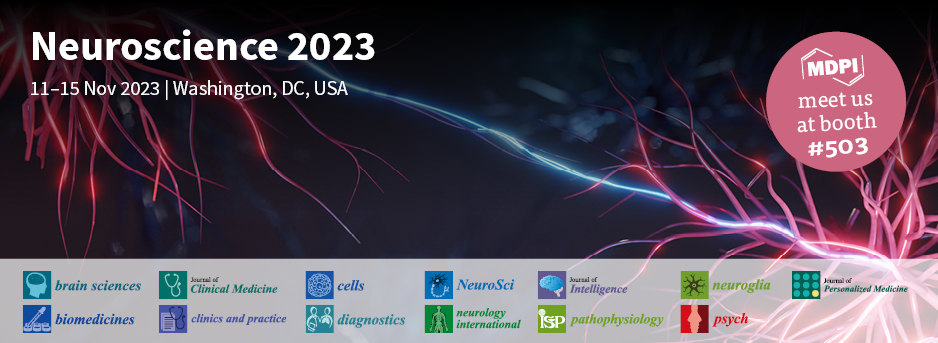
Neuroscience 2023 will be held from 11 to 15 November 2023 in Washington, DC, USA. The conference is organized by the Society for Neuroscience.
The conference will gather scientists, clinicians, and decision makers from around the world, creating a platform for the communication of knowledge and the sharing of groundbreaking research on the brain as well as nervous system. As stated in the introduction to the conference, you can “Present new research. Exchange ideas. Expand collaborations. Strengthen your career.”
As one of the exhibitors of Neuroscience 2022 last year, MDPI will be a part of Neuroscience 2023 this year, and looks forward to meeting our scholars as well as new friends, hoping to impress you with our open access publishing model face-to-face.
The following MDPI journals will be represented:
- Brain Sciences.
- JCM.
- Cells.
- NeuroSci.
- J. Intell.
- Neuroglia.
- JPM.
- Biomedicines.
- Clinics and Practice.
- Diagnostics.
- Neurology International.
- Pathophysiology.
- Psych.
If you are attending this conference, please feel free to start an online conversation with us. Our delegates look forward to meeting you in person at the booth and answering any questions that you may have. For more information about the conference, please visit the following link: https://www.sfn.org/meetings/neuroscience-2023.
17 October 2023
Brain Sciences | Highly Cited Papers in 2021–2022 in the Section “Neurorehabilitation”
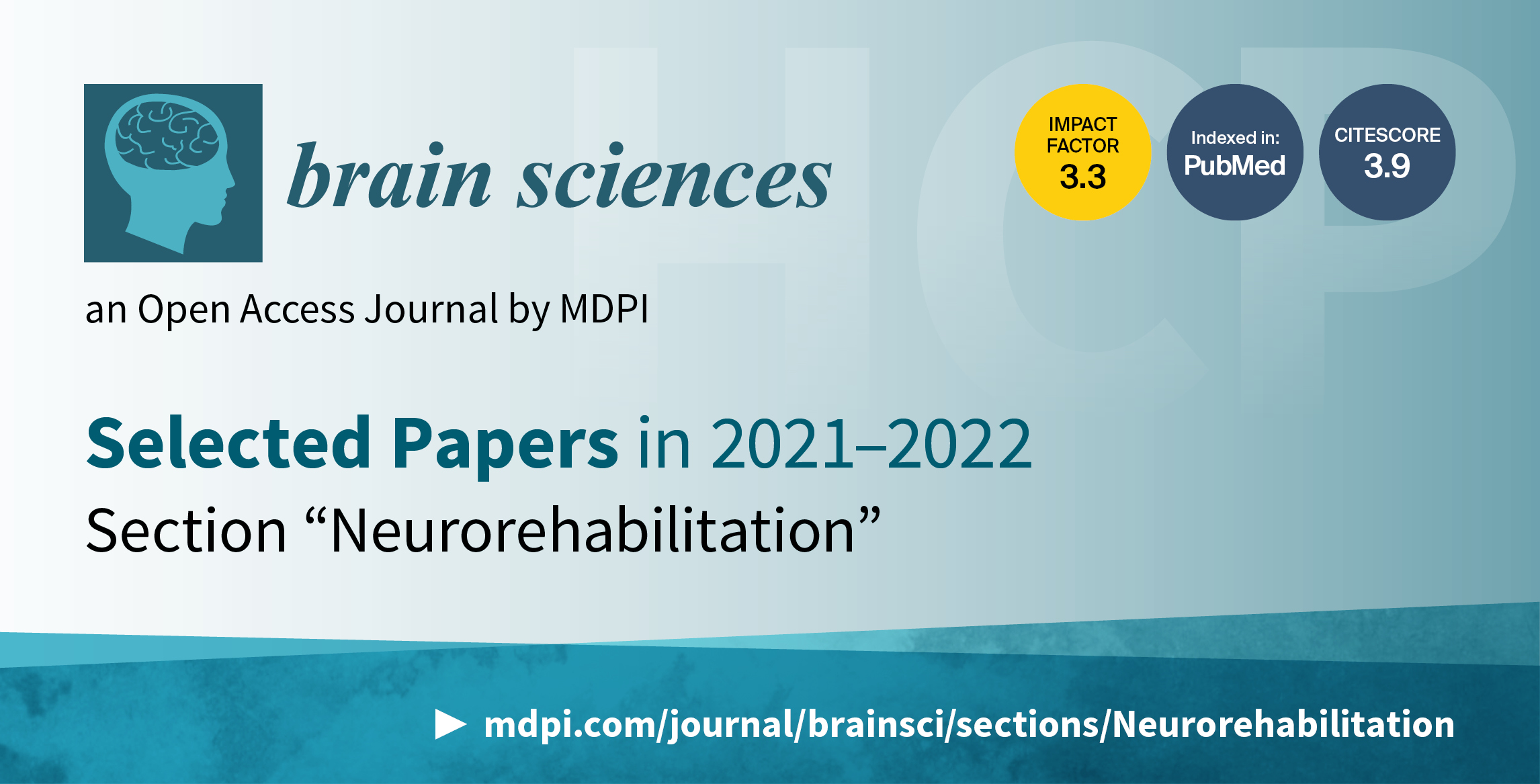
As all of the articles published in our journal are of an open access format, you have free and unlimited access to the full text. We welcome you to read our most highly cited papers published in 2021 and 2022 listed below:
1. “Gait Recovery with an Overground Powered Exoskeleton: A Randomized Controlled Trial on Subacute Stroke Subjects”
by Franco Molteni, Eleonora Guanziroli, Michela Goffredo, Rocco Salvatore Calabrò, Sanaz Pournajaf, Marina Gaffuri, Giulio Gasperini, Serena Filoni, Silvano Baratta, Daniele Galafate et al.
Brain Sci. 2021, 11(1), 104; https://doi.org/10.3390/brainsci11010104
Available online: https://www.mdpi.com/2076-3425/11/1/104
2. “Neuropsychological Profile, Emotional/Behavioral Problems, and Parental Stress in Children with Neurodevelopmental Disorders”
by Francesca Felicia Operto, Daniela Smirni, Chiara Scuoppo, Chiara Padovano, Valentina Vivenzio, Giuseppe Quatrosi, Marco Carotenuto, Francesco Precenzano and Grazia Maria Giovanna Pastorino
Brain Sci. 2021, 11(5), 584; https://doi.org/10.3390/brainsci11050584
Available online: https://www.mdpi.com/2076-3425/11/5/584
3. “Electronic Health Interventions in the Case of Multiple Sclerosis: From Theory to Practice”
by Maria Scholz, Rocco Haase, Dirk Schriefer, Isabel Voigt and Tjalf Ziemssen
Brain Sci. 2021, 11(2), 180; https://doi.org/10.3390/brainsci11020180
Available online: https://www.mdpi.com/2076-3425/11/2/180
4. “Digital Biomarkers in Multiple Sclerosis”
by Anja Dillenseger, Marie Luise Weidemann, Katrin Trentzsch, Hernan Inojosa, Rocco Haase, Dirk Schriefer, Isabel Voigt, Maria Scholz, Katja Akgün and Tjalf Ziemssen
Brain Sci. 2021, 11(11), 1519; https://doi.org/10.3390/brainsci11111519
Available online: https://www.mdpi.com/2076-3425/11/11/1519
5. “COVID-19 Neuromuscular Involvement in Post-Acute Rehabilitation”
by Sergio Bagnato, Manfredi Ferraro, Cristina Boccagni, Gianluca Battaglia, Tiziana D’Agostino, Caterina Prestandrea, Marina Angela Bellavia and Francesca Rubino
Brain Sci. 2021, 11(12), 1611; https://doi.org/10.3390/brainsci11121611
Available online: https://www.mdpi.com/2076-3425/11/12/1611
6. “One-Year Follow-Up Diagnostic Stability of Autism Spectrum Disorder Diagnosis in a Clinical Sample of Children and Toddlers”
by Loredana Benedetto, Francesca Cucinotta, Roberta Maggio, Eva Germanò, Roberta De Raco, Ausilia Alquino, Caterina Impallomeni, Rosamaria Siracusano, Luigi Vetri, Michele Roccella et al.
Brain Sci. 2021, 11(1), 37; https://doi.org/10.3390/brainsci11010037
Available online: https://www.mdpi.com/2076-3425/11/1/37
7. “Probing the Brain–Body Connection Using Transcranial Magnetic Stimulation (TMS): Validating a Promising Tool to Provide Biomarkers of Neuroplasticity and Central Nervous System Function”
by Arthur R. Chaves, Nicholas J. Snow, Lynsey R. Alcock and Michelle Ploughman
Brain Sci. 2021, 11(3), 384; https://doi.org/10.3390/brainsci11030384
Available online: https://www.mdpi.com/2076-3425/11/3/384
8. “Relationship between Sensory Alterations and Repetitive Behaviours in Children with Autism Spectrum Disorders: A Parents’ Questionnaire Based Study”
by Anna Fetta, Elisa Carati, Laura Moneti, Veronica Pignataro, Marida Angotti, Maria Chiara Bardasi, Duccio Maria Cordelli, Emilio Franzoni and Antonia Parmeggiani
Brain Sci. 2021, 11(4), 484; https://doi.org/10.3390/brainsci11040484
Available online: https://www.mdpi.com/2076-3425/11/4/484
9. “Hypertensive Crisis in Acute Cerebrovascular Diseases Presenting at the Emergency Department: A Narrative Review”
by Mariagiovanna Cantone, Giuseppe Lanza, Valentina Puglisi, Luisa Vinciguerra, Jaime Mandelli, Francesco Fisicaro, Manuela Pennisi, Rita Bella, Rosella Ciurleo and Alessia Bramanti
Brain Sci. 2021, 11(1), 70; https://doi.org/10.3390/brainsci11010070
Available online: https://www.mdpi.com/2076-3425/11/1/70
10. “Effects of Exercise Training on Neurotrophic Factors and Subsequent Neuroprotection in Persons with Multiple Sclerosis—A Systematic Review and Meta-Analysis”
by Mette D. Diechmann, Evan Campbell, Elaine Coulter, Lorna Paul, Ulrik Dalgas and Lars G. Hvid
Brain Sci. 2021, 11(11), 1499; https://doi.org/10.3390/brainsci11111499
Available online: https://www.mdpi.com/2076-3425/11/11/1499
11. “Update on Domestic Violence and Traumatic Brain Injury: A Narrative Review”
by Kellianne Costello and Brian D. Greenwald
Brain Sci. 2022, 12(1), 122; https://doi.org/10.3390/brainsci12010122
Available online: https://www.mdpi.com/2076-3425/12/1/122
12. “Correlation between Mild Traumatic Brain Injury-Induced Inflammatory Cytokines and Emotional Symptom Traits: A Systematic Review”
by Shazia Malik, Omar Alnaji, Mahnoor Malik, Teresa Gambale and Michel Piers Rathbone
Brain Sci. 2022, 12(1), 102; https://doi.org/10.3390/brainsci12010102
Available online: https://www.mdpi.com/2076-3425/12/1/102
13. “Effect of Dual-Task Motor-Cognitive Training in Preventing Falls in Vulnerable Elderly Cerebrovascular Patients: A Pilot Study”
by Barbara Spanò, Maria G. Lombardi, Massimo De Tollis, Maria A. Szczepanska, Claudia Ricci, Alice Manzo, Simone Giuli, Lorenzo Polidori, Ivo A. Griffini, Fulvia Adriano et al.
Brain Sci. 2022, 12(2), 168; https://doi.org/10.3390/brainsci12020168
Available online: https://www.mdpi.com/2076-3425/12/2/168
14. “Music Interventions and Delirium in Adults: A Systematic Literature Review and Meta-Analysis”
by Jelena Golubovic, Bjørn Erik Neerl and Dagfinn Aune and Felicity A. Baker
Brain Sci. 2022, 12(5), 568; https://doi.org/10.3390/brainsci12050568
Available online: https://www.mdpi.com/2076-3425/12/5/568
15. “Efficacy of Overground Robotic Gait Training on Balance in Stroke Survivors: A Systematic Review and Meta-Analysis”
by Matteo Lorusso, Marco Tramontano, Matteo Casciello, Andrea Pece, Nicola Smania, Giovanni Morone and Federica Tamburella
Brain Sci. 2022, 12(6), 713; https://doi.org/10.3390/brainsci12060713
Available online: https://www.mdpi.com/2076-3425/12/6/713
16. “Robotic Verticalization plus Music Therapy in Chronic Disorders of Consciousness: Promising Results from a Pilot Study”
by Rosaria De Luca, Mirjam Bonanno, Giuliana Vermiglio, Giovanni Trombetta, Ersilia Andidero, Angelo Caminiti, Patrizia Pollicino, Carmela Rifici and Rocco Salvatore Calabrò
Brain Sci. 2022, 12(8), 1045; https://doi.org/10.3390/brainsci12081045
Available online: https://www.mdpi.com/2076-3425/12/8/1045
17. “EMG-Triggered Pedaling Training on Muscle Activation, Gait, and Motor Function for Stroke Patients”
by Kyeongjin Lee
Brain Sci. 2022, 12(1), 76; https://doi.org/10.3390/brainsci12010076
Available online: https://www.mdpi.com/2076-3425/12/1/76
18. “Clinical Cognitive Motor Dissociation: A Case Report Showing How Pitfalls Can Hinder Early Clinical Detection of Awareness”
by Jane Jöhr, Viviana Aureli, Ivo Meyer, Giulia Cossu and Karin Diserens
Brain Sci. 2022, 12(2), 157; https://doi.org/10.3390/brainsci12020157
Available online: https://www.mdpi.com/2076-3425/12/2/157
19. “Effects of Vibrotactile Biofeedback Providing Real-Time Pressure Information on Static Balance Ability and Weight Distribution Symmetry Index in Patients with Chronic Stroke”
by Ho Kim, Hongjun Kim and Won-Seob Shin
Brain Sci. 2022, 12(3), 358; https://doi.org/10.3390/brainsci12030358
Available online: https://www.mdpi.com/2076-3425/12/3/358
20. “When Two Is Better Than One: A Pilot Study on Transcranial Magnetic Stimulation Plus Muscle Vibration in Treating Chronic Pelvic Pain in Women”
by Rocco Salvatore Calabrò, Luana Billeri, Bruno Porcari, Loris Pignolo and Antonino Naro
Brain Sci. 2022, 12(3), 396; https://doi.org/10.3390/brainsci12030396
Available online: https://www.mdpi.com/2076-3425/12/3/396
13 October 2023
Brain Sciences | Highly Cited Papers in 2021–2022 in the Section “Neurosurgery and Neuroanatomy”
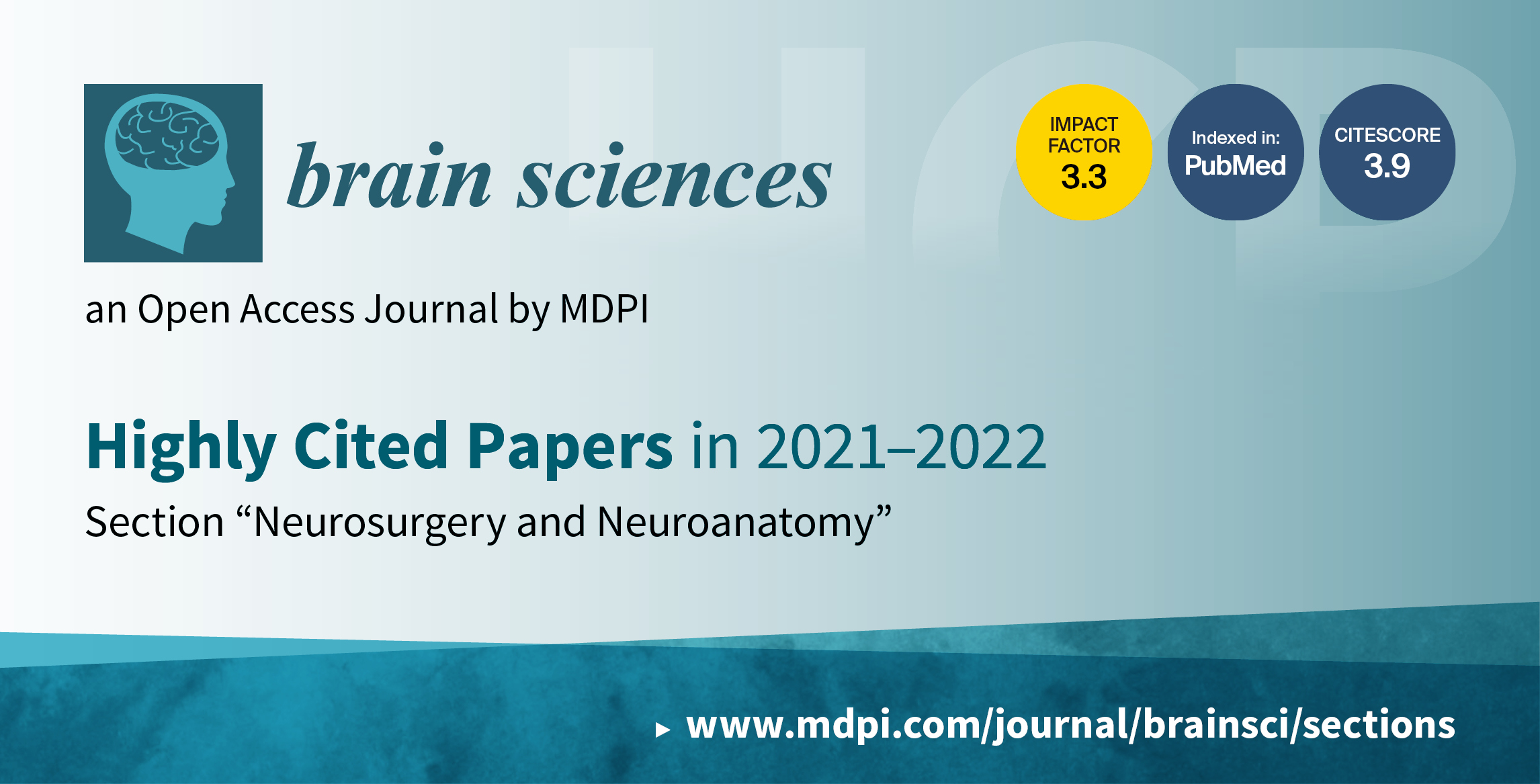
The aim of the “Neurosurgery and Neuroanatomy” Section of Brain Sciences (ISSN: 2076-3425) is to publish articles that integrate research, patient care, and education, and can connect neuroscientists, clinicians, and neuroanatomists to each other. The scope of this Section includes descriptive neurosurgical anatomy, human neuroscientific molecular anatomy, minimally invasive surgical techniques, neuroimaging studies, neuropathology, intraoperative visualization technologies, functional neurosurgical procedures, human clinical research studies, and literature reviews.
As all of the articles published in our journal are of an open access format, you have free and unlimited access to the full text. We welcome you to read our most highly cited papers published in 2021 and 2022, which are listed below:
1. “Focused Ultrasound in Neuroscience. State of the Art and Future Perspectives”
by Giuseppe Roberto Giammalva, Cesare Gagliardo, Salvatore Marrone, Federica Paolini, Rosa Maria Gerardi, Giuseppe Emmanuele Umana, Kaan Yağmurlu, Bipin Chaurasia, Gianluca Scalia, Federico Midiri et al.
Brain Sci. 2021, 11(1), 84; https://doi.org/10.3390/brainsci11010084
Available online: https://www.mdpi.com/2076-3425/11/1/84
2. “Microsurgical Anatomy of the Inferomedial Paraclival Triangle: Contents, Topographical Relationships and Anatomical Variations”
by Grzegorz Wysiadecki, Maciej Radek, R. Shane Tubbs, Joe Iwanaga, Jerzy Walocha, Piotr Brzeziński and Michał Polguj
Brain Sci. 2021, 11(5), 596; https://doi.org/10.3390/brainsci11050596
Available online: https://www.mdpi.com/2076-3425/11/5/596
3. “Neurosurgical Management and Outcome Parameters in 237 Patients with Spondylodiscitis”
by Mirza Pojskić, Barbara Carl, Vincent Schmöckel, Benjamin Völlger, Christopher Nimsky and Benjamin Saβ
Brain Sci. 2021, 11(8), 1019; https://doi.org/10.3390/brainsci11081019
Available online: https://www.mdpi.com/2076-3425/11/8/1019
4. “Diagnostic, Surgical, and Technical Considerations for Lumbar Interbody Fusion in Patients with Osteopenia and Osteoporosis: A Systematic Review”
by Sauson Soldozy, Samuel R. Montgomery, Jr., Danyas Sarathy, Steven Young, Anthony Skaff, Bhargav Desai, Jennifer D. Sokolowski, Faheem A. Sandhu, Jean-Marc Voyadzis, Kaan Yağmurlu et al.
Brain Sci. 2021, 11(2), 241; https://doi.org/10.3390/brainsci11020241
Available online: https://www.mdpi.com/2076-3425/11/2/241
5. “Intraoperative Computed Tomography-Based Navigation with Augmented Reality for Lateral Approaches to the Spine”
by Mirza Pojskić, Miriam Bopp, Benjamin Saß, Andreas Kirschbaum, Christopher Nimsky and Barbara Carl
Brain Sci. 2021, 11(5), 646; https://doi.org/10.3390/brainsci11050646
Available online: https://www.mdpi.com/2076-3425/11/5/646
6. “The Role of KRAS Mutations in Cortical Malformation and Epilepsy Surgery: A Novel Report of Nevus Sebaceous Syndrome and Review of the Literature”
by Chiara Pepi, Luca de Palma, Marina Trivisano, Nicola Pietrafusa, Francesca Romana Lepri, Andrea Diociaiuti, Francesca Diomedi Camassei, Giusy Carfi-Pavia, Alessandro De Benedictis, Camilla Rossi-Espagnet et al.
Brain Sci. 2021, 11(6), 793; https://doi.org/10.3390/brainsci11060793
Available online: https://www.mdpi.com/2076-3425/11/6/793
7. “Surgical Aspects of Corpus Callosotomy”
by Takehiro Uda, Noritsugu Kunihiro, Ryoko Umaba, Saya Koh, Toshiyuki Kawashima, Shohei Ikeda, Kotaro Ishimoto and Takeo Goto
Brain Sci. 2021, 11(12), 1608; https://doi.org/10.3390/brainsci11121608
Available online: https://www.mdpi.com/2076-3425/11/12/1608
8. “Corpus Callosotomy in 3 Cavalier King Charles Spaniel Dogs with Drug-Resistant Epilepsy”
by Rikako Asada, Satoshi Mizuno, Yoshihiko Yu, Yuji Hamamoto, Tetsuya Anazawa, Daisuke Ito, Masato Kitagawa and Daisuke Hasegawa
Brain Sci. 2021, 11(11), 1462; https://doi.org/10.3390/brainsci11111462
Available online: https://www.mdpi.com/2076-3425/11/11/1462
9. “Endoscopic Bilateral Optic Nerve Decompression for Treatment of Idiopathic Intracranial Hypertension”
by Ethem Göksu, Baran Bozkurt, Deniz İlhan, Ahmet Özak, Musa Çırak and Kaan Yağmurlu
Brain Sci. 2021, 11(3), 324; https://doi.org/10.3390/brainsci11030324
Available online: https://www.mdpi.com/2076-3425/11/3/324
10. “Psoas Major Muscle Volume Does Not Affect the Postoperative Thigh Symptoms in XLIF Surgery”
by Wicharn Yingsakmongkol, Waranyoo Wathanavasin, Khanathip Jitpakdee, Weerasak Singhatanadgige, Worawat Limthongkul and Vit Kotheeranurak
Brain Sci. 2021, 11(3), 357; https://doi.org/10.3390/brainsci11030357
Available online: https://www.mdpi.com/2076-3425/11/3/357
11. “The Effect of Severity of Obstructive Sleep Apnea on Sleep Bruxism in Respiratory Polygraphy Study”
by Klaudia Kazubowska-Machnowska, Anna Jodkowska, Monika Michalek-Zrabkowska, Mieszko Wieckiewicz, Rafal Poreba, Marzena Dominiak, Pawel Gac, Grzegorz Mazur, Justyna Kanclerska and Helena Martynowicz
Brain Sci. 2022, 12(7), 828; https://doi.org/10.3390/brainsci12070828
Available online: https://www.mdpi.com/2076-3425/12/9/1183
12. “Management of Cavernous Carotid Artery Aneurysms: A Retrospective Single-Center Experience”
by Michael Karl Fehrenbach, Eric Dietel, Tim Wende, Johannes Kasper, Caroline Sander, Florian Wilhelmy, Ulf Quaeschling, Juergen Meixensberger and Ulf Nestler
Brain Sci. 2022, 12(3), 330; https://doi.org/10.3390/brainsci12030330
Available online: https://www.mdpi.com/2076-3425/12/3/330
13. “Dissection of Mouse Hippocampus with Its Dorsal, Intermediate and Ventral Subdivisions Combined with Molecular Validation”
by Aneta Jaszczyk, Adrian M. Stankiewicz and Grzegorz R. Juszczak
Brain Sci. 2022, 12(6), 799; https://doi.org/10.3390/brainsci12060799
Available online: https://www.mdpi.com/2076-3425/12/6/799
14. “Wilhelm von Waldeyer: Important Steps in Neural Theory, Anatomy and Citology”
by Vicentiu Mircea Saceleanu, Aurel George Mohan, Razvan Adrian Covache-Busuioc, Horia Petre Costin and Alexandru Vlad Ciurea
Brain Sci. 2022, 12(2), 224; https://doi.org/10.3390/brainsci12020224
Available online: https://www.mdpi.com/2076-3425/12/2/224
15. “Outcomes after Flow Diverter Treatment in Subarachnoid Hemorrhage: A Meta-Analysis and Development of a Clinical Prediction Model (OUTFLOW)”
by Michelle F. M. ten Brinck, Viktoria E. Shimanskaya, René Aquarius, Ronald H. M. A. Bartels, Frederick J. A. Meijer, Petra C. Koopmans, Guido de Jong, Ajay K. Wakhloo, Joost de Vries and Hieronymus D. Boogaarts
Brain Sci. 2022, 12(3), 394; https://doi.org/10.3390/brainsci12030394
Available online: https://www.mdpi.com/2076-3425/12/3/394
16. “Cranio-Orbito-Zygomatic Approach: Core Techniques for Tailoring Target Exposure and Surgical Freedom”
by Sabino Luzzi, Alice Giotta Lucifero, Alfio Spina, Matías Baldoncini, Alvaro Campero, Samer K. Elbabaa and Renato Galzio
Brain Sci. 2022, 12(3), 405; https://doi.org/10.3390/brainsci12030405
Available online: https://www.mdpi.com/2076-3425/12/3/405
17. “Effects of Sound Interventions on the Permeability of the Blood–Brain Barrier and Meningeal Lymphatic Clearance”
by Sean Sachdeva, Sushmita Persaud, Milani Patel, Peyton Popard, Aaron Colverson and Sylvain Doré
Brain Sci. 2022, 12(6), 742; https://doi.org/10.3390/brainsci12060742
Available online: https://www.mdpi.com/2076-3425/12/6/742
18. “Intrasaccular Flow Disruptor-Assisted Coiling of Intracranial Aneurysms Using the Novel Contour Neurovascular Systems and NEQSTENT: A Single-Center Safety and Feasibility Study”
by Francesco Diana, Marta de Dios Lascuevas, Simone Peschillo, Eytan Raz, Shinichi Yoshimura, Manuel Requena Ruiz, David Hernández Morales and Alejandro Tomasello
Brain Sci. 2022, 12(8), 991; https://doi.org/10.3390/brainsci12080991
Available online: https://www.mdpi.com/2076-3425/12/8/991
19. “Brain Tissue Oxygenation-Guided Therapy and Outcome in Traumatic Brain Injury: A Single-Center Matched Cohort Study”
by Sami Barrit, Mejdeddine Al Barajraji, Salim El Hadweh, Olivier Dewitte, Nathan Torcida, Joachim Andre, Fabio Silvio Taccone, Sophie Schuind and Elisa Gouvêa Bogossian
Brain Sci. 2022, 12(7), 887; https://doi.org/10.3390/brainsci12070887
Available online: https://www.mdpi.com/2076-3425/12/7/887
20. “Tailored Approach and Multimodal Intraoperative Neuromonitoring in Cerebellopontine Angle Surgery”
by Alessandro Izzo, Vito Stifano, Giuseppe Maria Della Pepa, Michele Di Domenico, Quintino Giorgio D'Alessandris, Grazia Menna, Manuela D'Ercole, Liverana Lauretti, Alessandro Olivi and Nicola Montano
Brain Sci. 2022, 12(9), 1167; https://doi.org/10.3390/brainsci12091167
Available online: https://www.mdpi.com/2076-3425/12/9/1167
10 October 2023
Brain Sciences | Highly Cited Papers in 2021–2022 in the Section “Neurodegenerative Diseases”
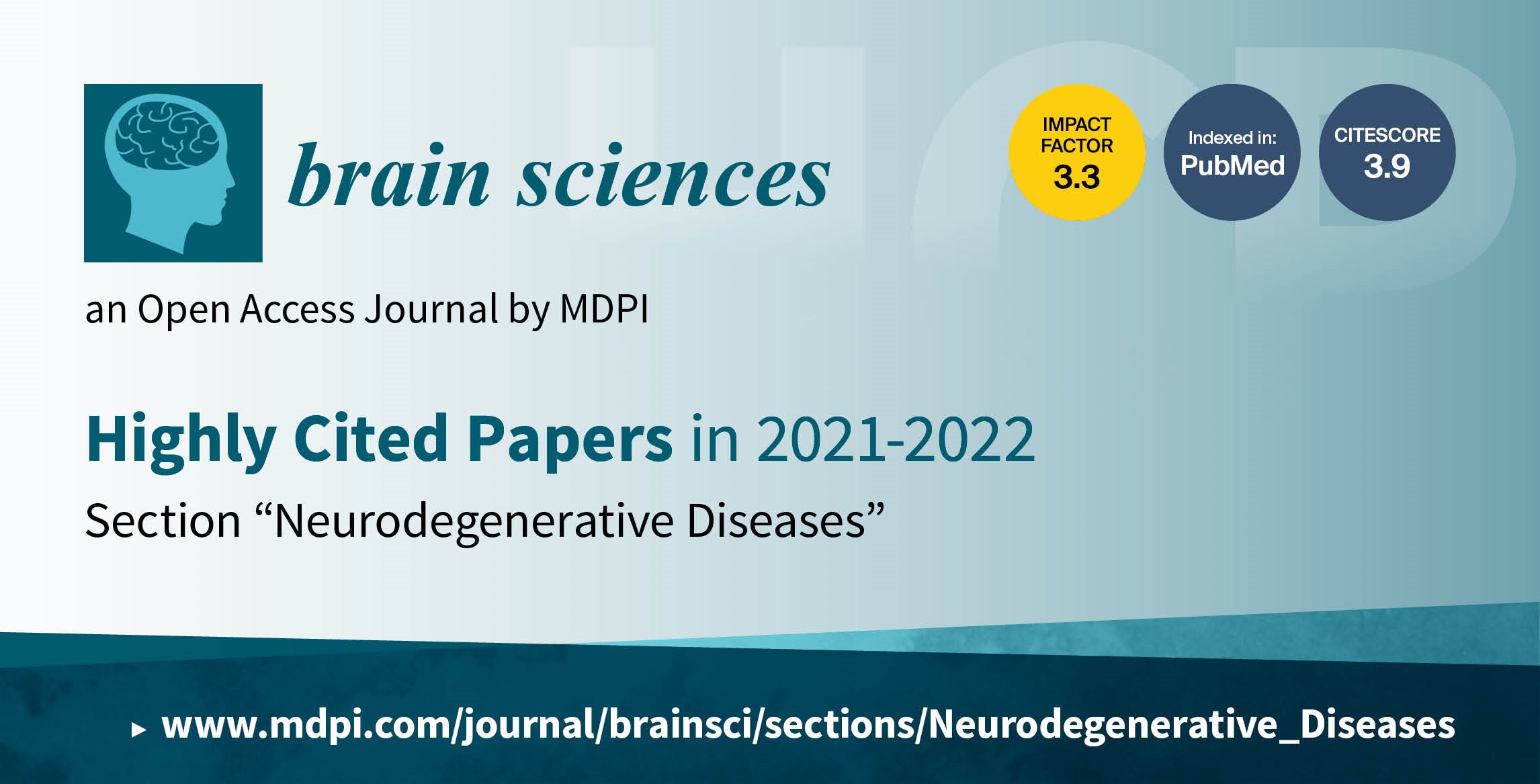
The “Neurodegenerative Diseases” Section of Brain Sciences (ISSN: 2076-3425) aims to publish articles on amyotrophic lateral sclerosis, multiple sclerosis, Parkinson's disease, Alzheimer's disease, Huntington's disease, multiple system atrophy, prion diseases, etc.
As all the articles published in our journal are of an open access format, you have free and unlimited access to the full texts. We welcome you to read our most highly cited papers from 2021 and 2022, listed below:
1. “Frequency and Determinants of Olfactory Hallucinations in Parkinson’s Disease Patients”
by Paolo Solla, Carla Masala, Ilenia Pinna, Tommaso Ercoli, Francesco Loy, Gianni Orofino, Laura Fadda and Giovanni Defazio
Brain Sci. 2021, 11(7), 841; https://doi.org/10.3390/brainsci11070841
Available online: https://www.mdpi.com/2076-3425/11/7/841
2. “Improved Transfer-Learning-Based Facial Recognition Framework to Detect Autistic Children at an Early Stage”
by Tania Akter, Mohammad Hanif Ali, Md. Imran Khan, Md. Shahriare Satu, Md. Jamal Uddin, Salem A. Alyami, Sarwar Aliand, AKM Azad and Mohammad Ali Moni
Brain Sci. 2021, 11(6), 734; https://doi.org/10.3390/brainsci11060734
Available online: https://www.mdpi.com/2076-3425/11/6/734
3. “Gender Differences in Misdiagnosis and Delayed Diagnosis among Adults with Autism Spectrum Disorder with No Language or Intellectual Disability”
by Camilla Gesi, Giovanni Migliarese, Sara Torriero, Martina Capellazzi, Anna Caterina Omboni, Giancarlo Cerveri and Claudio Mencacci
Brain Sci. 2021, 11(7), 912; https://doi.org/10.3390/brainsci11070912
Available online: https://www.mdpi.com/2076-3425/11/7/912
4. “Investigating the Relationship between Autistic Traits, Ruminative Thinking, and Suicidality in a Clinical Sample of Subjects with Bipolar Disorder and Borderline Personality Disorder”
by Liliana Dell’Osso, Ivan Mirko Cremone, Giulia Amatori, Andrea Cappelli, Alessandro Cuomo, Stefano Barlati, Gabriele Massimetti, Antonio Vita, Andrea Fagiolini, Claudia Carmassi et al.
Brain Sci. 2021, 11(5), 621; https://doi.org/10.3390/brainsci11050621
Available online: https://www.mdpi.com/2076-3425/11/5/621
5. “Autistic Traits and Attention-Deficit Hyperactivity Disorder Symptoms Predict the Severity of Internet Gaming Disorder in an Italian Adult Population”
by Carmen Concerto, Alessandro Rodolico, Chiara Avanzato, Laura Fusar-Poli, Maria Salvina Signorelli, Fortunato Battaglia and Eugenio Aguglia
Brain Sci. 2021, 11(6), 774; https://doi.org/10.3390/brainsci11060774
Available online: https://www.mdpi.com/2076-3425/11/6/774
6. “Gastroparesis in Parkinson Disease: Pathophysiology, and Clinical Management”
by Heithem Soliman, Benoit Coffin and Guillaume Gourcerol
Brain Sci. 2021, 11(7), 831; https://doi.org/10.3390/brainsci11070831
Available online: https://www.mdpi.com/2076-3425/11/7/831
7. “Psychometric Evaluation of Social Cognition and Behavior Measures in Children and Adolescents with Down Syndrome”
by Emily K. Schworer, Emily K. Hoffman and Anna J. Esbensen
Brain Sci. 2021, 11(7), 836; https://doi.org/10.3390/brainsci11070836
Available online: https://www.mdpi.com/2076-3425/11/7/836
8. “Pomegranate Juice Ameliorates Dopamine Release and Behavioral Deficits in a Rat Model of Parkinson’s Disease”
by Małgorzata Kujawska, Michael Jourdes, Łukasz Witucki, Marta Karaźniewicz-Łada, Michał Szulc, Agata Górska, Przemysław Ł. Mikołajczak, Pierre-Louis Teissedre and Jadwiga Jodynis-Liebert
Brain Sci. 2021, 11(9), 1127; https://doi.org/10.3390/brainsci11091127
Available online: https://www.mdpi.com/2076-3425/11/9/1127
9. “Neuropsychiatric Symptoms in Parkinson’s Disease Patients Are Associated with Reduced Health-Related Quality of Life and Increased Caregiver Burden”
by Hannah von Eichel, Johanne Heine, Florian Wegner, Sophia Rogozinski, Stephanie Stiel, Adrian Groh, Lea Krey, Günter U. Höglinger and Martin Klietz
Brain Sci. 2022, 12(1), 89; https://doi.org/10.3390/brainsci12010089
Available online: https://www.mdpi.com/2076-3425/12/1/89
10. “Caregiver Burden and Quality of Life in Late Stage Parkinson’s Disease”
by Kristina Rosqvist, Anette Schrag, Per Odin and the CLaSP Consortium
Brain Sci. 2022, 12(1), 111; https://doi.org/10.3390/brainsci12010111
Available online: https://www.mdpi.com/2076-3425/12/1/111
11. “A Peek into Pandora’s Box: COVID-19 and Neurodegeneration”
by Abhishek Chandra and Ashu Johri
Brain Sci. 2022, 12(2), 190; https://doi.org/10.3390/brainsci12020190
Available online: https://www.mdpi.com/2076-3425/12/2/190
12. “Opicapone Improves Global Non-Motor Symptoms Burden in Parkinson’s Disease: An Open-Label Prospective Study”
by Diego Santos García, Gustavo Fernández Pajarín, Juan Manuel Oropesa-Ruiz, Francisco Escamilla Sevilla, Raúl Rashid Abdul Rahim López and José Guillermo Muñoz Enríquez
Brain Sci. 2022, 12(3), 383; https://doi.org/10.3390/brainsci12030383
Available online: https://www.mdpi.com/2076-3425/12/3/383
13. “Understanding the Burdens Associated with Huntington’s Disease in Manifest Patients and Care Partners–Comparing to Parkinson’s Disease and the General Population”
by Alex Exuzides, Joana E. Matos, Anisha M. Patel, Ashley A. Martin, Bryan Ricker and Danny Bega
Brain Sci. 2022, 12(2), 161; https://doi.org/10.3390/brainsci12020161
Available online: https://www.mdpi.com/2076-3425/12/2/161
14. “Olfactory Impairment in Parkinson’s Disease Patients with Tremor Dominant Subtype Compared to Those with Akinetic Rigid Dominant Subtype: A Pilot Study”
by Paolo Solla, Carla Masala, Tommaso Ercoli, Gianni Orofino, Francesco Loy, Ilenia Pinna, Laura Fadda and Giovanni Defazio.
Brain Sci. 2022, 12(2), 196; https://doi.org/10.3390/brainsci12020196
Available online: https://www.mdpi.com/2076-3425/12/2/196
15. “Caregiver Burden in Partners of Parkinsonian Patients with Deep Brain Stimulation”
by Eileen Gülke and Monika Pötter-Nerger
Brain Sci. 2022, 12(2), 238; https://doi.org/10.3390/brainsci12020238
Available online: https://www.mdpi.com/2076-3425/12/2/238
16. “Cognitive and Affective Theory of Mind across Adulthood”
by Simona Raimo, Maria Cropano, María Dolores Roldán-Tapia, Lidia Ammendola, Daniela Malangone and Gabriella Santangelo
Brain Sci. 2022, 12(7), 899; https://doi.org/10.3390/brainsci12070899
Available online: https://www.mdpi.com/2076-3425/12/7/899
17. “Resilience in People with Lewy Body Disorders and Their Care Partners: Association with Mental Health, Relationship Satisfaction, and Care Burden”
by Sabina Vatter and Iracema Leroi
Brain Sci. 2022, 12(2), 148; https://doi.org/10.3390/brainsci12020148
Available online: https://www.mdpi.com/2076-3425/12/2/148
18. “Sexual Dysfunctions in Parkinson’s Disease and Their Influence on Partnership—Data of the PRISM Study”
by Thomas Kinateder, Daniela Marinho, Doreen Gruber, Laura Hatzler, Georg Ebersbach and Florin Gandor
Brain Sci. 2022, 12(2), 159; https://doi.org/10.3390/brainsci12020159
Available online: https://www.mdpi.com/2076-3425/12/2/159
19. “Gender Differences in Demographic and Pharmacological Factors in Patients Diagnosed with Late-Onset of Alzheimer’s Disease”
by Melissa J. Bailey-Taylor, Nicolas Poupore, Laurie Theriot Roley, Richard L. Goodwin, Brooks Mcphail and Thomas I. Nathaniel
Brain Sci. 2022, 12(2), 160; https://doi.org/10.3390/brainsci12020160
Available online: https://www.mdpi.com/2076-3425/12/2/160
20. “Characterization of Ex Vivo and In Vitro Wnt Transcriptome Induced by Spinal Cord Injury in Rat Microglial Cells”
by Carlos González-Fernández, Pau González, Francisco González-Pérez and Francisco Javier Rodríguez
Brain Sci. 2022, 12(6), 708; https://doi.org/10.3390/brainsci12060708
Available online: https://www.mdpi.com/2076-3425/12/6/708
8 October 2023
Brain Sciences | Highly Cited Papers in 2021–2022 in the Section “Social Cognitive and Affective Neuroscience”
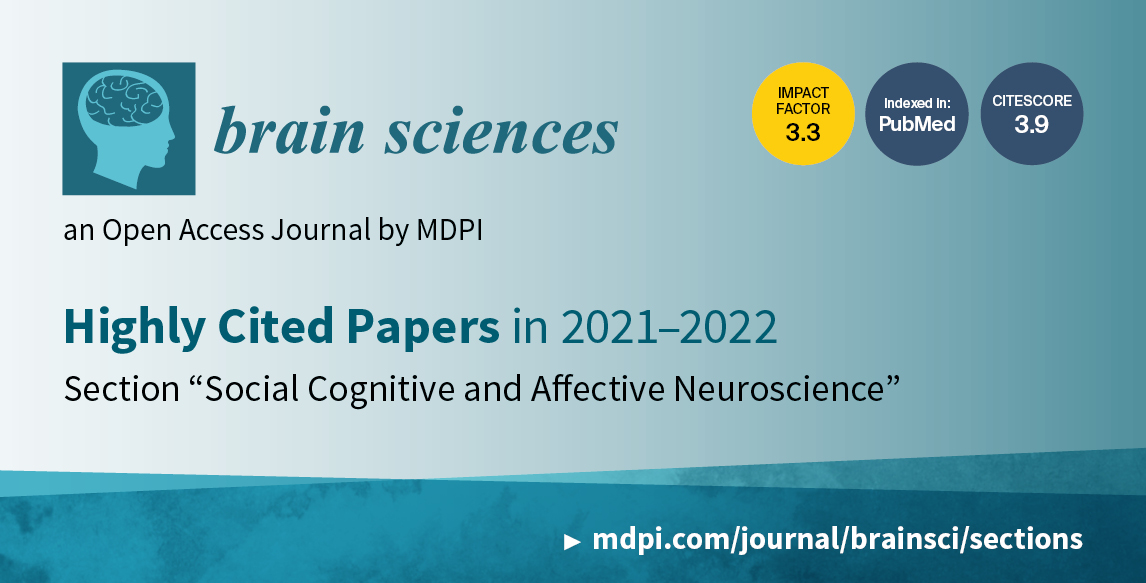
The “Social Cognitive and Affective Neuroscience” Section of Brain Sciences (ISSN: 2076-3425) aims to publish articles on social perception, cognition, emotion, and their practical applications at the behavioral, system, neural circuit, single cell, cellular, and genetic levels.
As all of the articles published in our journal are of an open access format, you have free and unlimited access to the full text. We welcome you to read our most highly cited papers published in 2021 and 2022.
1. “Early Right Motor Cortex Response to Happy and Fearful Facial Expressions: A TMS Motor-Evoked Potential Study”
by Sara Borgomaneri, Francesca Vitale, Simone Battaglia and Alessio Avenanti
Brain Sci. 2021, 11(9), 1203; https://doi.org/10.3390/brainsci11091203
Available online: https://www.mdpi.com/2076-3425/11/9/1203
2. “Stay at Home” in Italy during the COVID-19 Outbreak: A Longitudinal Study on Individual Well-Being among Different Age Groups”
by Alessandro Quaglieri, Giulia Lausi, Angelo Fraschetti, Jessica Burrai, Benedetta Barchielli, Alessandra Pizzo, Pierluigi Cordellieri, Luigi De Gennaro, Maurizio Gorgoni, Fabio Ferlazzo et al.
Brain Sci. 2021, 11(8), 993; https://doi.org/10.3390/brainsci11080993
Available online: https://www.mdpi.com/2076-3425/11/8/993
3. “Endogenous Oxytocin Levels in Autism—A Meta-Analysis”
by Matthijs Moerkerke, Mathieu Peeters, Lyssa de Vries, Nicky Daniels, Jean Steyaert, Kaat Alaerts and Bart Boets
Brain Sci. 2021, 11(11), 1545; https://doi.org/10.3390/brainsci11111545
Available online: https://www.mdpi.com/2076-3425/11/11/1545
4. “Self-Positivity or Self-Negativity as a Function of the Medial Prefrontal Cortex”
by Alla Yankouskaya and Jie Sui
Brain Sci. 2021, 11(2), 264; https://doi.org/10.3390/brainsci11020264
Available online: https://www.mdpi.com/2076-3425/11/2/264
5. “A Scientometric Approach to Review the Role of the Medial Preoptic Area (MPOA) in Parental Behavior”
by Alessandro Carollo, Jan Paolo Macapinlac Balagtas, Michelle Jin-Yee Neoh and Gianluca Esposito
Brain Sci. 2021, 11(3), 393; https://doi.org/10.3390/brainsci11030393
Available online: https://www.mdpi.com/2076-3425/11/3/393
6. “Self-Boundary Dissolution in Meditation: A Phenomenological Investigation”
by Ohad Nave, Fynn-Mathis Trautwein, Yochai Ataria, Yair Dor-Ziderman, Yoav Schweitzer, Stephen Fulder and Aviva Berkovich-Ohana
Brain Sci. 2021, 11(6), 819; https://doi.org/10.3390/brainsci11060819
Available online: https://www.mdpi.com/2076-3425/11/6/819
7. “Oxidative and Nitrosative Stress in Major Depressive Disorder: A Case Control Study”
by Aditya Somani, Abhishek Kumar Singh, Bandna Gupta, Sheela Nagarkoti, Pronob Kumar Dalal and Madhu Dikshit
Brain Sci. 2022, 12(2), 144; https://doi.org/10.3390/brainsci12020144
Available online: https://www.mdpi.com/2076-3425/12/2/144
8. “Personal and Environmental Predictors of Aggression in Adolescence”
by Claudia A. Robles-Haydar, Marina B. Martínez-González, Yuliana A. Flórez-Niño, Luz M. Ibáñez-Navarro and José J. Amar-Amar
Brain Sci. 2021, 11(7), 933; https://doi.org/10.3390/brainsci11070933
Available online: https://www.mdpi.com/2076-3425/11/7/933
9. “Gender, Anxiety, and Legitimation of Violence in Adolescents Facing Simulated Physical Aggression at School”
by Marina B. Martínez-González, Yamile Turizo-Palencia, Claudia Arenas-Rivera, Mónica Acuña-Rodríguez, Yeferson Gómez-López and Vicente J. Clemente-Suárez
Brain Sci. 2021, 11(4), 458; https://doi.org/10.3390/brainsci11040458
Available online: https://www.mdpi.com/2076-3425/11/4/458
10. “Evidence for the Concreteness of Abstract Language: A Meta-Analysis of Neuroimaging Studies”
by Nicola Del Maschio, Davide Fedeli, Gioacchino Garofalo and Giovanni Buccino
Brain Sci. 2022, 12(1), 32; https://doi.org/10.3390/brainsci12010032
Available online: https://www.mdpi.com/2076-3425/12/1/32
11. “Inflammatory Stress Induced by Intraperitoneal Injection of LPS Increases Phoenixin Expression and Activity in Distinct Rat Brain Nuclei”
by Tiemo Friedrich, Martha Anna Schalla, Miriam Goebel-Stengel, Peter Kobelt, Matthias Rose and Andreas Stenge
Brain Sci. 2022, 12(2), 135; https://doi.org/10.3390/brainsci12020135
Available online: https://www.mdpi.com/2076-3425/12/2/135
12. “A Pilot Feasibility Study of Reconnecting to Internal Sensations and Experiences (RISE), a Mindfulness-Informed Intervention to Reduce Interoceptive Dysfunction and Suicidal Ideation, among University Students in India”
by April R. Smith, Shruti Kinkel-Ram, William Grunwald, Tony Sam George and Vaishali Raval
Brain Sci. 2022, 12(2), 237; https://doi.org/10.3390/brainsci12020237
Available online: https://www.mdpi.com/2076-3425/12/2/237
13. “Interoceptive Attentiveness Induces Significantly More PFC Activation during a Synchronized Linguistic Task Compared to a Motor Task as Revealed by Functional Near-Infrared Spectroscopy”
by Michela Balconi and Laura Angioletti
Brain Sci. 2022, 12(3), 301; https://doi.org/10.3390/brainsci12030301
Available online: https://www.mdpi.com/2076-3425/12/3/301
14. “The Neurobiological Basis of Love: A Meta-Analysis of Human Functional Neuroimaging Studies of Maternal and Passionate Love”
by Hsuan-Chu Shih, Mu-En Kuo, Changwei W. Wu, Yi-Ping Chao, Hsu-Wen Huang and Chih-Mao Huang
Brain Sci. 2022, 12(7), 830; https://doi.org/10.3390/brainsci12070830
Available online: https://www.mdpi.com/2076-3425/12/7/830
15. “COVID-19 Long-Term Effects: Is There an Impact on the Simple Reaction Time and Alternative-Forced Choice on Recovered Patients?”
by Mauro Santoyo-Mora, Carlos Villaseñor-Mora, Luz M. Cardona-Torres, Juan J. Martínez-Nolasco, Alejandro I. Barranco-Gutiérrez, José A. Padilla-Medina and Micael Gerardo Bravo-Sánchez
Brain Sci. 2022, 12(9), 1258; https://doi.org/10.3390/brainsci12091258
Available online: https://www.mdpi.com/2076-3425/12/9/1258
16. “Correlations between Persistent Olfactory and Semantic Memory Disorders after SARS-CoV-2 Infection”
by Julie Fiorentino, Magali Payne, Elisa Cancian, Alexandra Plonka, Louise-Émilie Dumas, David Chirio, Élisa Demonchy, Karine Risso, Florence Askenazy-Gittard, Nicolas Guevara et al.
Brain Sci. 2022, 12(6), 714; https://doi.org/10.3390/brainsci12060714
Available online: https://www.mdpi.com/2076-3425/12/6/714
17. “Interhemispheric Facilitatory Effect of High-Frequency rTMS: Perspective from Intracortical Facilitation and Inhibition”
by Dongting Tian and Shin-Ichi Izumi
Brain Sci. 2022, 12(8), 970; https://doi.org/10.3390/brainsci12080970
Available online: https://www.mdpi.com/2076-3425/12/8/970
18. “Mindfulness-Based Interventions for the Treatment of Aberrant Interoceptive Processing in Substance Use Disorders”
by April C. May, Chrysantha Davis, Namik Kirlic and Jennifer L. Stewart
Brain Sci. 2022, 12(2), 279; https://doi.org/10.3390/brainsci12020279
Available online: https://www.mdpi.com/2076-3425/12/2/279
19. “Mindfulness-Based Interventions and Body Awareness”
by Marbella Pérez-Peña, Jessica Notermans, Olivier Desmedt, Katleen Van der Gucht and Pierre Philippot
Brain Sci. 2022, 12(2), 285; https://doi.org/10.3390/brainsci12020285
Available online: https://www.mdpi.com/2076-3425/12/2/285
20. “Neurofeedback-Augmented Mindfulness Training Elicits Distinct Responses in the Subregions of the Insular Cortex in Healthy Adolescents”
by Xiaoqian Yu, Zsofia P. Cohen, Aki Tsuchiyagaito, Gabriella Cochran, Robin L. Aupperle, Jennifer L. Stewart, Manpreet K. Singh, Masaya Misaki, Jerzy Bodurka, Martin P. Paulus et al.
Brain Sci. 2022, 12(3), 363; https://doi.org/10.3390/brainsci12030363
Available online: https://www.mdpi.com/2076-3425/12/3/363
2 October 2023
MDPI Insights: The CEO’s Letter #4 - MDPI Presence in China

Welcome to the MDPI Insights: The CEO's Letter.
In these monthly letters, I will showcase two key aspects of our work at MDPI: our commitment to empowering researchers and our determination to facilitating open scientific exchange.
Opening Thoughts

Open Access in China
It is Saturday, 23 September, and I have just returned from an unforgettable 12-day trip to China, visiting our main offices in Beijing and Wuhan. In the wake of a packed and very enjoyable agenda of internal and external meetings, I would like to use this edition of the CEO Letter to showcase how MDPI supports the scholarly community in China.
Coincidentally, Jack McKenna, Communications Associate from MDPI’s corporate content team, has just released a blog article discussing China’s open access (OA) policy. It is a timely read, providing a concise overview of the development of the OA movement in China and reflecting on its future. I shall draw some content from Jack’s piece and use this edition of the CEO Letter to highlight the various ways in which MDPI is involved in this market. And it would be remiss of me not to include some pictures and highlights from my travels!
Open Access Policy in China
As per Jack’s post, in 2020, China became the world’s leading producer of research articles. Today, China is experiencing a “substantial growth rate in OA [Open Access] publication”. This growth is supported by the State’s commitment to research & development and its policy “requiring the promotion of open science”.
Over the past two decades, there have been gradual developments in China’s OA framework, with repositories and platforms being developed in a consistent manner. Currently, key institutions across China – including the National Science Library, the National Science and Technology Library, and the Natural Science Foundation of China – support OA. The State aims to establish consistent policies across government agencies – a framework for a more encompassing embrace of OA across institutions.
In China, the number of subscription-only articles decreased by nearly 30% over the 10-year period of 2011–2021, while gold OA increased by 22%. Between 2017 and 2020 alone, China published 800,921 academic papers in an OA format.
In 2023, as the leading publisher of academic research, China is pursuing “self-reliance”. Therefore, the State will be establishing consistent policies across government agencies, including those related to OA. Additionally, it will want to ensure that Chinese people can access the research that is supported by Chinese funding and produced by Chinese academics. For this reason, “Open Access is a matter of priority in China”.
MDPI Offices in China
While the history of MDPI begins in Basel, Switzerland, the story of MDPI’s founder is very much rooted in China. Dr. Shu-kun Lin, Founder and President of MDPI, graduated with a BSc from Wuhan University in 1982. He also studied physical chemistry at the Lanzhou Institute of Chemical Physics, Chinese Academy of Sciences (1982–1986; MSc in 1985), and at the University of Louisville, USA (1987–1989). Dr. Lin completed his doctorate in organic chemistry at the Swiss Federal Institute of Technology (ETH-Zürich) in 1992.

Stefan Tochev (CEO, MDPI) at MDPI’s Wuhan office.
In 2002, MDPI’s Basel headquarters moved to Matthäusstrasse 11, 4052 Basel, and Dr. Lin opened an editorial office in Qingdao, China, which launched the journal Marine Drugs in the following year. Below is a list of MDPI’s current offices in China and their respective dates of inauguration:
- 2008: Beijing (Tongzhou, Haidian)
- 2013: Wuhan (Hankou, Guanggu)
- 2019: Tianjin
- 2021: Dalian
- 2021: Nanjing
Our Strength is in Our People
With over 6,000 MDPI staff, across 20 offices in 11 countries, MDPI is able to offer authors responsive and efficient round-the-clock support, enabling a rapid publication process.
In my experience, stakeholders are genuinely surprised when they realize the extent of our global operations. My response is to reiterate that our people are our strength. This is why we have fast and efficient processes and top-notch responsiveness. Our global presence ensures that your manuscript is constantly attended to, rather than sitting on someone’s desk. We prioritize our authors’ needs and act quickly to move things through the various stages of publication. MDPI is built on speed, convenience, and competence, which I believe are core pillars for success in any industry. We continually strive to improve our systems and processes on the basis of these core strengths. We literally have over 6,000 staff worldwide dedicated to serving your needs. It’s not magic: it’s people; it’s real.
Impactful Research

MDPI Awards
To support the academic community, and especially young researchers, and also to enhance communication among scientists, MDPI journals offer various awards in specific fields. We serve the scientific community by funding research to facilitate the development of sustainable global solutions through our annual World Sustainability Award and Emerging Sustainability Leader Award.
In 2022, MDPI made awards totalling over US$1 million in recognition and support of researchers worldwide.
Across our journal catalogue, we have granted over 2,000 awards to recognize and support researchers from all disciplines. Since 2016, these awards have served as a source of recognition, acknowledging the impact of research by heightening the influence of talented individuals. The award types mainly include the Young Investigator Award, the Best PhD Thesis Award, the Best Paper Award, and the Outstanding Reviewer Award.
To learn more about MDPI Awards and to find out which are currently available, please click here.
MDPI Awards to Scholars from China
Since 2021, there have been 23 Best Paper Awards granted to authors affiliated with Chinese institutions, identifying their papers as having high-quality scientific impact. A total of 45 Chinese scholars have received awards such as the Young Investigator Award, the Best PhD Thesis Award, the Outstanding Reviewer Award, and the Tu Youyou Award, among others. Prizes for these awards include MDPI grants for paid publications, totalling over CHF 70,000 for scholars affiliated with Chinese institutions.
MDPI’s Tu Youyou Award

Prof. Tu Youyou (left), Dr. Shu-Kun Lin (President, MDPI).
In 2015, Professor Tu Youyou was awarded the Nobel Prize in Physiology or Medicine “for her discoveries concerning a novel therapy against Malaria.” In order to commemorate Professor Tu’s contributions to human health and to promote the passion and spirit conveyed by her experiences, MDPI in 2016 established the ‘Tu Youyou Award’, which runs biennially to recognize outstanding scholars dedicated to the research of natural products and medicinal chemistry.
The 2022 Tu Youyou Award was granted to Prof. Dr. Xiaoguang Lei of Peking University. Click here to access the interview with the winner.
2015 Nobel Prize for Medicine Awarded to Professor Youyou Tu
Professor Tu’s work was celebrated in a Special Issue from Molecules on the occasion of her 80th birthday. The Special Issue: 'Artemisinin (Qinghaosu): Commemorative Issue in Honor of Professor Youyou Tu on the Occasion of her 80th Anniversary” was created five years before she won the Nobel Prize, highlighting the visibility MDPI provides researchers and their work.
Highly Cited Articles by Chinese Scholars Published in MDPI
Click here to access the most cited MDPI papers published by scholars affiliated with Chinese institutions. This list presents the most influential research from the more than 287,000 MDPI papers published by Chinese scholars. With over 9 million total citations, I encourage you to maximize your visibility and impact by publishing with MDPI, the number one most cited open access publisher.
Read more:
- Tu Youyou Award
- World Sustainability Awards
- Available Awards
Inside MDPI
 Stefan Tochev (CEO, MDPI) with the Beijing Marketing team.
Stefan Tochev (CEO, MDPI) with the Beijing Marketing team.
Marketing Department in China
During my visit to our offices in Beijing and Wuhan, I had the opportunity to meet with, and to present to, our local marketing teams. These teams are responsible for various journal-related and corporate promotional activities, including newsletters, conferences, seminars, author training, journal awards, content creation, digital marketing, and social media.
I was pleased by the ambition and curiosity of our marketing colleagues. They showed a strong desire to collaborate and acquire knowledge and tactics to effectively market and promote MDPI-journal-related activities. I presented some of the principles and objectives that we apply in the Corporate Marketing and Communications department, and used the opportunity to strengthen our collaborative communications across offices.
 Stefan Tochev (CEO, MDPI) with the Wuhan Marketing team.
Stefan Tochev (CEO, MDPI) with the Wuhan Marketing team.
Coming Together for Science

Collaborations, Scholarships and Meetings
MDPI maintains partnerships with nearly 190 learned societies and over 800 institutions and consortia, helping to facilitate the transition to OA publishing. Our commitment to working with institutions is evident in China, where we have successfully established over 35 Institutional Open Access Programs (IOAP) with esteemed institutions such as the Tsinghua University, Huazhong University of Science and Technology, and Shanghai Jiao Tong University.
Our institutional partnerships, waiver programs, and article processing cost discounts create diverse pathways to OA publishing for researchers worldwide.
Scholarships in China
Since 2021, several MDPI journals (Sensors, Photonics, Coatings, Materials, Energies, and Journal of Fungi) have funded full scholarships for four Master’s and five Ph.D. projects in China. These scholarships align with Tianjin University, Wuhan University of Technology, Central South University, the Chinese Academy of Sciences, and the China University of Petroleum (Beijing).
Meeting with the Society of Chinese University Journals (CUJS)

Prof. Tieming Zhang (President of CUJS, centre) and MDPI colleagues at CUJS office.
I am pleased to have participated in some highly productive meetings during my visit to China, including one with the Society of Chinese University Journals (CUJS). The meeting involved Prof. Tieming Zhang (President of CUJS), Assoc. Prof. Xin Zhang (Vice President and Secretary General), and Dr. Fei Gao (Executive Member of CUJS). Alongside my colleagues Dr. Guoshi Liu, Dr. Giulia Stefenelli, and Anita Sun, I represented MDPI and held an open discussion to address any questions regarding OA and MDPI.
We discussed several methods for collaboration, including a workshop on the future of peer review, MDPI sponsoring a funding grant for early-career researchers, and transitioning journals from diamond to gold OA. I am thankful for the opportunity to have met our colleagues at CUJS in person and feel very confident about our future collaborations in support of OA publishing in China.
MDPI hosts free academic seminars, author training sessions, and academic conferences as part of its commitment to enrich and support the scholarly community. CUJS often stages academic events (e.g., conferences, editor training, and editor competitions), and I believe there are great opportunities for CUJS and MDPI to collaborate accordingly.
Meeting with National Science Library, Chinese Academy of Sciences (NSLC)

Stefan Tochev (CEO, MDPI), Dr. Giulia Stefenelli (Chair of Scientific Officers, MDPI), Anita Sun (PR Manager, MDPI) and Dr. Guoshi Liu (Managing Director, MDPI) at the National Science Library, Chinese Academy of Sciences.
We also visited the NSLC Director, Xiwen Liu, and colleagues Ying Jin, Zhesi Shen, and Sichao Tong. Following our introductions, we gave a presentation on the history and editorial process at MDPI, discussing specific details related to MDPI’s business and data. We highlighted the status of our IOAP collaborations in China and the makeup of our author base, specifically in China, and drew attention to the fact that MDPI has published research by authors from every country in the world. We then discussed the design indicators, calculation methods and implementation purposes of the ‘Early Warning Journal List’ and how we can have open communication to provide any data regarding MDPI journals. I am pleased to report that we reached a consensus on future communications, and am grateful to NSLC for hosting us in their offices.
In-person meetings with stakeholders provide an invaluable opportunity to communicate what MDPI is about and the various ways in which we serve the scholarly community. While digital marketing and online communication are essential, they are no replacement for the understanding and trust that come about through in-person interactions.
The Numbers
As at September 2023, China holds the largest position in MDPI’s global market, ranking as the largest contributor to the total number of papers published by MDPI.
At this point in time, there were more than 847,000 China mainland scholars who have published with MDPI, 51 of whom are Section-Editors-in-Chief (SEiC) of MDPI journals, with seven serving as Editors-in-Chief (EiCs) for journals such as Air, Big Data and Cognitive Computing, Blockchains, Future, Nanoenergy Advances, and Targets.
Our growth and presence in China are a true testament to the service we provide to the scholarly community, and to the relationships we foster through collaborative activities. We look forward to continuing to support the growth of the scholarly community in China, providing a valuable and trusted experience with MDPI.
Closing Thoughts
Final Reflections on our MDPI Offices in Beijing and Wuhan

Stefan Tochev (CEO, MDPI), Dr. Constanze Schelhorn (Indexing Manager, MDPI), Jiale Shang (Admin, Tongzhou, MDPI) at Beijing Capital International Airport, Beijing.
I spent approximately two weeks visiting some of our offices in China, and the first word that comes to mind when describing my experience is ‘hospitality.’ My colleagues and I were met with enthusiasm and delight at the airport by the Tongzhou Admin team (thank you, Jiale Shang, and thank you, Eric Wang, for keeping us organized on this trip!) and were taken care of with great attention. From hotels to transportation, dinners, and meetings, our stay was catered for perfectly.
Perhaps this is where MDPI’s focus on customers and service originates. At our core, we are a service company that provides a publishing platform for its authors. It’s therefore no surprise that authors consistently rate their experience with MDPI very highly.
95% of submitting authors rate their overall experience with the MDPI publication process as Excellent or Good (Springer Nature report 90%).
91% of submitting authors rate their overall experience with the MDPI peer review process as Excellent or Good.
Speed/Efficiency and Editorial Relationship are two key reasons underlying this high satisfaction score. ‘Editorial Relationship’ can be further explored, but in the past month, the most commonly noted aspects were the professionalism, kindness, availability, communicativeness, and personalized assistance provided by our editorial staff throughout the process. These attributes are at the core of our work across all our offices and continents.
Hospitality and Service
Just as our Chinese colleagues strove to keep us engaged by showing us the city sights (thank you, Thea Pan, and Jason Wu from the Wuhan Marketing team!) and sharing a variety of wonderful meals, our editorial staff are committed to serving our authors throughout their publishing journey. Our aim is to place the author at the centre of everything we do, eager to welcome our ‘guests’ and provide them with a pleasant publishing experience.
I asked my colleague Francis Wu (Senior Publisher, Wuhan office) where this hospitality originates. He responded that it is part of Chinese culture. I reflected long and deep on this answer. China is a vast country, and when visitors arrive, hosts want to ensure they feel welcomed and taken care of in order to maximize their time and visit. I can’t think of a better analogy for how I would want our authors to feel when they visit MDPI for their publishing needs. A company culture that prioritizes service, something that goes beyond products and productivity, and focuses on the overall experience. Over 6,000 people, across all MDPI offices, are ready, willing and able to go the extra mile for their colleagues and their customers. This is something I am truly proud of.
Chief Executive Officer
MDPI AG
26 September 2023
Brain Sciences | Highly Cited Papers in 2021–2022 in the Section “Computational Neuroscience and Neuroinformatics”
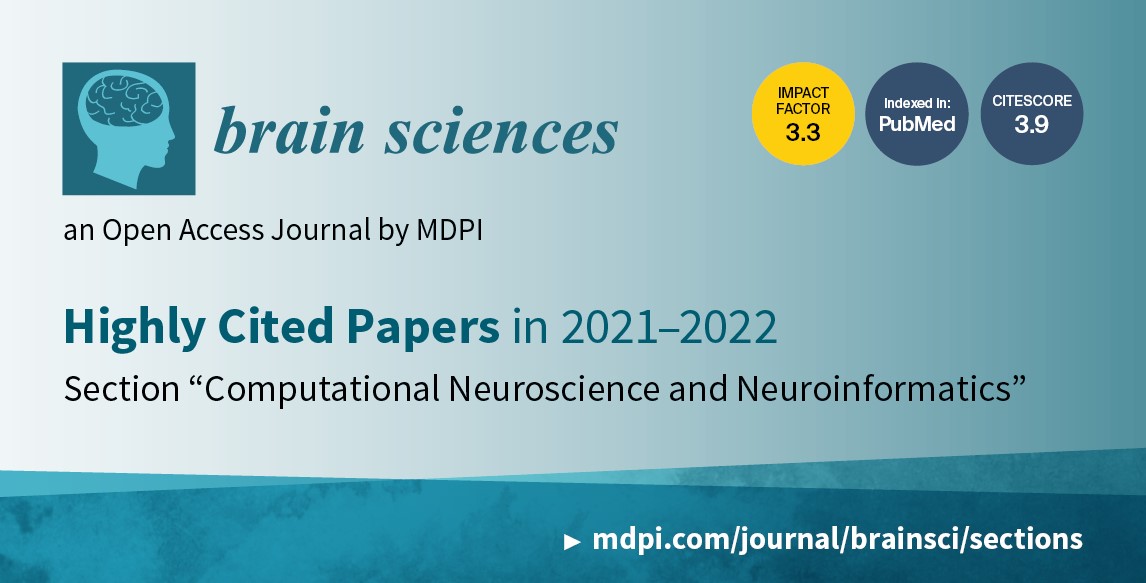
Improving our understanding of brain function requires interdisciplinary collaborations between theoretical, computational, and experimental disciplines and approaches. The Section “Computational Neuroscience and Neuroinformatics” of Brain Sciences (ISSN: 2076-3425) fosters multidisciplinary interactions between theoretical, computational, and experimental work in the field of neuroscience.
We invite original contributions on a wide range of topics that promote theoretical modeling focused on understanding neural function at the molecular, cellular, and circuit levels via computational and model-based approaches that are experimentally testable. While the Section primarily focuses on theoretical and computational research, it welcomes experimental studies that validate and test theoretical conclusions. Primarily theoretical manuscripts should be highly relevant to the neural mechanisms of the neural function, while primarily experimental manuscripts should have implications for the computational analysis of nervous system function.
Manuscripts investigating physiological mechanisms underlying neuropathologies by combining theoretical and experimental approaches are highly encouraged. Similarly, manuscripts describing novel technological advances in data analysis techniques to further insights into the function of the nervous system are also highly encouraged. Modeling approaches at all levels, from biophysically motivated realistic simulations of neurons and synapses to high-level behavioral models of inference and decision-making, are also welcome.
As all of the articles published in our journal are in an open access format, you have free and unlimited access to the full text. We welcome you to read our most highly cited papers published in 2021 and 2022 listed below:
1. “Pain-Related Brain Connectivity Changes in Migraine: A Narrative Review and Proof of Concept about Possible Novel Treatments Interference”
by Marina de Tommaso, Eleonora Vecchio, Silvia Giovanna Quitadamo, Gianluca Coppola, Antonio Di Renzo, Vincenzo Parisi, Marcello Silvestro, Antonio Russo and Gioacchino Tedeschi
Brain Sci. 2021, 11(2), 234; https://doi.org/10.3390/brainsci11020234
Available online: https://www.mdpi.com/2076-3425/11/2/234
2. “Brain Image Segmentation in Recent Years: A Narrative Review”
by Ali Fawzi, Anusha Achuthan and Bahari Belaton
Brain Sci. 2021, 11(8), 1055; https://doi.org/10.3390/brainsci11081055
Available online: https://www.mdpi.com/2076-3425/11/8/1055
3. “The Directionality of Fronto-Posterior Brain Connectivity Is Associated with the Degree of Individual Autistic Traits”
by Luca Tarasi, Elisa Magosso, Giulia Ricci, Mauro Ursino and Vincenzo Romei
Brain Sci. 2021, 11(11), 1443; https://doi.org/10.3390/brainsci11111443
Available online: https://www.mdpi.com/2076-3425/11/11/1443
4. “Thalamocortical Connectivity in Experimentally-Induced Migraine Attacks: A Pilot Study”
by Daniele Martinelli, Gloria Castellazzi, Roberto De Icco, Ana Bacila, Marta Allena, Arianna Faggioli, Grazia Sances, Anna Pichiecchio, David Borsook, Claudia A. M. Gandini Wheeler-Kingshott et al.
Brain Sci. 2021, 11(2), 165; https://doi.org/10.3390/brainsci11020165
Available online: https://www.mdpi.com/2076-3425/11/2/165
5. “Detection of Resting-State Functional Connectivity from High-Density Electroencephalography Data: Impact of Head Modeling Strategies”
by Gaia Amaranta Taberna, Jessica Samogin, Jessica Samogin and Dante Mantini
Brain Sci. 2021, 11(6), 741; https://doi.org/10.3390/brainsci11060741
Available online: https://www.mdpi.com/2076-3425/11/6/741
6. “Changes in Default Mode Network Connectivity in Resting-State fMRI in People with Mild Dementia Receiving Cognitive Stimulation Therapy”
by Tianyin Liu, Aimee Spector, Daniel C. Mograbi, Gary Cheung and Gloria H. Y. Wong
Brain Sci. 2021, 11(9), 1137; https://doi.org/10.3390/brainsci11091137
Available online: https://www.mdpi.com/2076-3425/11/9/1137
7. “The Relationship between Oscillations in Brain Regions and Functional Connectivity: A Critical Analysis with the Aid of Neural Mass Models”
by Giulia Ricci, Elisa Magosso and Mauro Ursino
Brain Sci. 2021, 11(4), 487; https://doi.org/10.3390/brainsci11040487
Available online: https://www.mdpi.com/2076-3425/11/4/487
8. “Time-Frequency Characterization of Resting Brain in Bipolar Disorder during Euthymia—A Preliminary Study”
by Adrian Andrzej Chrobak, Bartosz Bohaterewicz, Anna Maria Sobczak, Magdalena Marszał-Wiśniewska, Anna Tereszko, Anna Krupa, Anna Ceglarek, Magdalena Fafrowicz, Amira Bryll, Tadeusz Marek et al.
Brain Sci. 2021, 11(5), 599; https://doi.org/10.3390/brainsci11050599
Available online: https://www.mdpi.com/2076-3425/11/5/599
9. “Assessing Multi-Site rs-fMRI-Based Connectomic Harmonization Using Information Theory”
by Facundo Roffet, Claudio Delrieux and Gustavo Patow
Brain Sci. 2022, 12(9), 1219; https://doi.org/10.3390/brainsci12091219
Available online: https://www.mdpi.com/2076-3425/12/9/1219
10. “The Asymmetric Laplace Gaussian (ALG) Distribution as the Descriptive Model for the Internal Proactive Inhibition in the Standard Stop Signal Task”
by Mohsen Soltanifar, Michael Escobar, Annie Dupuis, Andre Chevrier and Russell Schachar
Brain Sci. 2022, 12(6), 730; https://doi.org/10.3390/brainsci12060730
Available online: https://www.mdpi.com/2076-3425/12/6/730
11. “Structural MRI-Based Schizophrenia Classification Using Autoencoders and 3D Convolutional Neural Networks in Combination with Various Pre-Processing Techniques”
by Roman Vyškovský, Daniel Schwarz, Vendula Churová and Tomáš Kašpárek
Brain Sci. 2022, 12(5), 615; https://doi.org/10.3390/brainsci12050615
Available online: https://www.mdpi.com/2076-3425/12/5/615
12. “Artificial Visual System for Orientation Detection Based on Hubel–Wiesel Model”
by Bin Li, Yuki Todo and Zheng Tang
Brain Sci. 2022, 12(4), 470; https://doi.org/10.3390/brainsci12040470
Available online: https://www.mdpi.com/2076-3425/12/4/470
13. “Optimal Scaling Approaches for Perfusion MRI with Distorted Arterial Input Function (AIF) in Patients with Ischemic Stroke”
by Sukhdeep Singh Bal, Fan Pei Gloria Yang, Yueh-Feng Sung, Ke Chen, Jiu-Haw Yin and Giia-Sheun Peng
Brain Sci. 2022, 12(1), 77; https://doi.org/10.3390/brainsci12010077
Available online: https://www.mdpi.com/2076-3425/12/1/77
14. “Bayesian Optimization of Machine Learning Classification of Resting-State EEG Microstates in Schizophrenia: A Proof-of-Concept Preliminary Study Based on Secondary Analysis”
by Ahmadreza Keihani, Seyed Saman Sajadi, Mahsa Hasani and Fabio Ferrarelli
Brain Sci. 2022, 12(11), 1497; https://doi.org/10.3390/brainsci12111497
Available online: https://www.mdpi.com/2076-3425/12/11/1497
15. “Modeling Cognitive Load as a Self-Supervised Brain Rate with Electroencephalography and Deep Learning”
by Luca Longo
Brain Sci. 2022, 12(10), 1416; https://doi.org/10.3390/brainsci12101416
Available online: https://www.mdpi.com/2076-3425/12/10/1416
16. “Inhibitory Control and Brain–Heart Interaction: An HRV-EEG Study”
Maria Daniela Cortese, Martina Vatrano, Paolo Tonin, Antonio Cerasa and Francesco Riganello
Brain Sci. 2022, 12(6), 740; https://doi.org/10.3390/brainsci12060740
Available online: https://www.mdpi.com/2076-3425/12/6/740
22 September 2023
Brain Sciences | Highly Cited Papers in 2021–2022 in the Section “Neurotechnology and Neuroimaging”
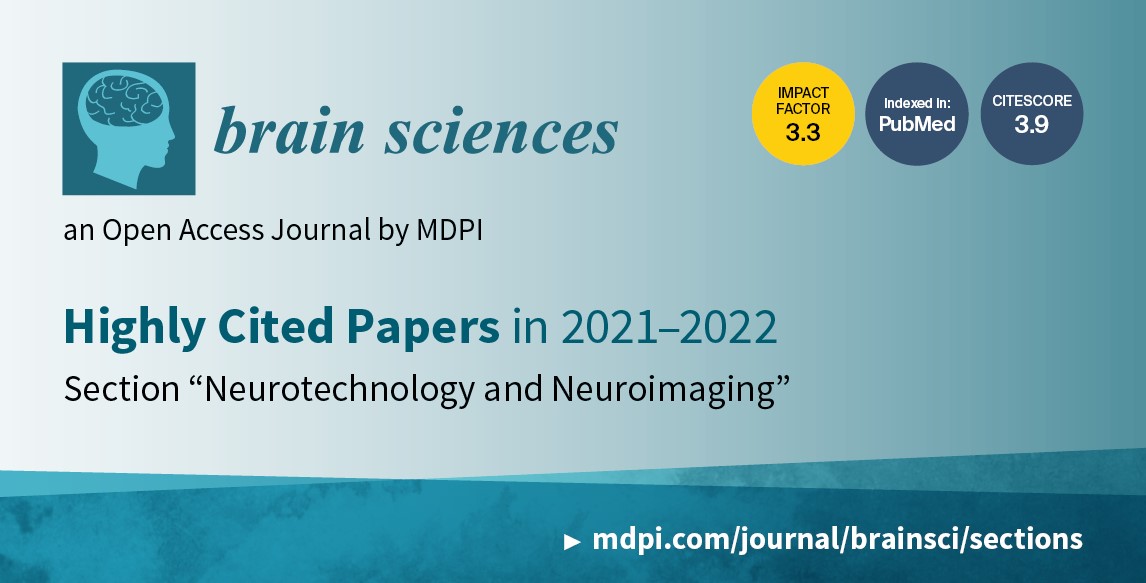
The mission of the “Neurotechnology and Neuroimaging” Section of Brain Sciences (ISSN: 2076-3425) is to publish original observations and critical reviews on conventional and advanced bio-imaging, functional MRI, OCT, PET and other novel, technology-based diagnostic and therapeutic approaches. In recent years, neurotechnology has emerged as a fast-developing, exciting and promising new field with the potential to change our existing approach to the diagnosis and treatment of neurological disorders. Our scope is to understand the biology, degeneration, regeneration, and organization of neural circuits in disabling neurological diseases. Manuscripts on neuroplasticity, synaptic connectivity, in vivo imaging and imaging biomarkers, optogenetics and different forms of neuromodulation are particularly welcome.
As all of the articles published in our journal are of an open access format, you will have free and unlimited access to the full text. We welcome you to read our most highly cited papers published in 2021 and 2022, listed below:
1. “Corticospinal Tract and Related Grey Matter Morphometric Shape Analysis in ALS Phenotypes: A Fractal Dimension Study”
by Venkateswaran Rajagopalan and Erik P. Pioro
Brain Sci. 2021, 11(3), 371; https://doi.org/10.3390/brainsci11030371
Available online: https://www.mdpi.com/2076-3425/11/3/371
2. “Individual Differences in Hemodynamic Responses Measured on the Head Due to a Long-Term Stimulation Involving Colored Light Exposure and a Cognitive Task: A SPA-fNIRS Study”
by Hamoon Zohdi, Felix Scholkmann and Ursula Wolf
Brain Sci. 2021, 11(1), 54; https://doi.org/10.3390/brainsci11010054
Available online: https://www.mdpi.com/2076-3425/11/1/54
3. “The Role of Expectation and Beliefs on the Effects of Non-Invasive Brain Stimulation”
by Miriam Braga, Diletta Barbiani, Mehran Emadi Andani, Bernardo Villa-Sánchez, Michele Tinazzi and Mirta Fiorio
Brain Sci. 2021, 11(11), 1526; https://doi.org/10.3390/brainsci11111526
Available online: https://www.mdpi.com/2076-3425/11/11/1526
4. “EEG-Based Tool for Prediction of University Students’ Cognitive Performance in the Classroom”
by Mauricio A. Ramírez-Moreno, Mariana Díaz-Padilla, Karla D. Valenzuela-Gómez, Adriana Vargas-Martínez, Juan C. Tudón-Martínez, Rubén Morales-Menendez, Ricardo A. Ramírez-Mendoza, Blas L. Pérez-Henríquez and Jorge de J. Lozoya-Santos
Brain Sci. 2021, 11(6), 698; https://doi.org/10.3390/brainsci11060698
Available online: https://www.mdpi.com/2076-3425/11/6/698
5. “Investigating Brain Microstructural Alterations in Type 1 and Type 2 Diabetes Using Diffusion Tensor Imaging: A Systematic Review”
by Abdulmajeed Alotaibi, Christopher Tench, Rebecca Stevenson, Ghadah Felmban, Amjad Altokhis, Ali Aldhebaib, Rob A. Dineen and Cris S. Constantinescu
Brain Sci. 2021, 11(2), 140; https://doi.org/10.3390/brainsci11020140
Available online: https://www.mdpi.com/2076-3425/11/2/140
6. “Peripheral Nerve Impairment in a Mouse Model of Alzheimer’s Disease”
by Alessio Torcinaro, Valentina Ricci, Georgios Strimpakos, Francesca De Santa and Silvia Middei
Brain Sci. 2021, 11(9), 1245; https://doi.org/10.3390/brainsci11091245
Available online: https://www.mdpi.com/2076-3425/11/9/1245
7. “Single-Trial Recognition of Video Gamer’s Expertise from Brain Haemodynamic and Facial Emotion Responses”
by Ana R. Andreu-Perez, Mehrin Kiani, Javier Andreu-Perez, Pratusha Reddy, Jaime Andreu-Abela, Maria Pinto and Kurtulus Izzetoglu
Brain Sci. 2021, 1(1), 106; https://doi.org/10.3390/brainsci11010106
Available online: https://www.mdpi.com/2076-3425/11/1/106
8. “Data Processing in Functional Near-Infrared Spectroscopy (fNIRS) Motor Control Research”
by Patrick W. Dans, Stevie D. Foglia and Aimee J. Nelson
Brain Sci. 2021, 11(5), 606; https://doi.org/10.3390/brainsci11050606
Available online: https://www.mdpi.com/2076-3425/11/5/606
9. “Human-in-the-Loop Optimization of Transcranial Electrical Stimulation at the Point of Care: A Computational Perspective ”
by Yashika Arora and Anirban Dutta
Brain Sci. 2022, 12(10), 1294; https://doi.org/10.3390/brainsci12101294
Available online: https://www.mdpi.com/2076-3425/12/10/1294
10. “The Functional Interactions between Cortical Regions through Theta-Gamma Coupling during Resting-State and a Visual Working Memory Task”
by Ji Seon Ahn, Jaeseok Heo, Jooyoung Oh, Deokjong Lee, Kyungun Jhung, Jae-Jin Kim and Jin Young Park
Brain Sci. 2022, 12(2), 274; https://doi.org/10.3390/brainsci12020274
Available online: https://www.mdpi.com/2076-3425/12/2/274
11. “An EEG-Based Investigation of the Effect of Perceived Observation on Visual Memory in Virtual Environments”
by Michael Darfler, Jesus G. Cruz-Garza and Saleh Kalantari
Brain Sci. 2022, 12(2), 269; https://doi.org/10.3390/brainsci12020269
Available online: https://www.mdpi.com/2076-3425/12/2/269
12. “Blinding in tDCS Studies: Correct End-of-Study Guess Does Not Moderate the Effects on Associative and Working Memory”
by Marija Stanković, Marko Živanović, Jovana Bjekić and Saša R. Filipović
Brain Sci. 2022, 12(1), 58; https://doi.org/10.3390/brainsci12010058
Available online: https://www.mdpi.com/2076-3425/12/1/58
13. “Clinical Implications of Prominent Cortical Vessels on Susceptibility-Weighted Imaging in Acute Ischemic Stroke Patients Treated with Recanalization Therapy”
by Misun Oh and Minwoo Lee
Brain Sci. 2022, 12(2), 184; https://doi.org/10.3390/brainsci12020184
Available online: https://www.mdpi.com/2076-3425/12/2/184
14. “Neurological Pupil Index for the Early Prediction of Outcome in Severe Acute Brain Injury Patients”
by Federico Romagnosi, Federico Romagnosi, Filippo Bongiovanni, Carolina Iaquaniello, John-Paul Miroz, Giuseppe Citerio, Fabio Silvio Taccone and Mauro Oddo
Brain Sci. 2022, 12(5), 609; https://doi.org/10.3390/brainsci12050609
Available online: https://www.mdpi.com/2076-3425/12/5/609
15. “Inter-Individual Variability in tDCS Effects: A Narrative Review on the Contribution of Stable, Variable, and Contextual Factors”
by Alessandra Vergallito, Sarah Feroldi, Sarah Feroldi, Alberto Pisoni and Leonor J. Romero Lauro
Brain Sci. 2022, 12(5), 522; https://doi.org/10.3390/brainsci12050522
Available online: https://www.mdpi.com/2076-3425/12/5/522
16. “Association of Alcohol Types, Coffee, and Tea Intake with Risk of Dementia: Prospective Cohort Study of UK Biobank Participants”
by Sylva Mareike Schaefer, Anna Kaiser, Inken Behrendt, Gerrit Eichner and Mathias Fasshauer
Brain Sci. 2022, 12(3), 360; https://doi.org/10.3390/brainsci12030360
Available online: https://www.mdpi.com/2076-3425/12/3/360
17. “Integrative Hedonic and Homeostatic Food Intake Regulation by the Central Nervous System: Insights from Neuroimaging”
by Alejandro Campos, John D. Port and Andres Acosta
Brain Sci. 2022, 12(4), 431; https://doi.org/10.3390/brainsci12040431
Available online: https://www.mdpi.com/2076-3425/12/4/431
18. “Molecular Imaging of Central Dopamine in Obesity: A Qualitative Review across Substrates and Radiotracers”
by Lieneke Katharina Janssen and Annette Horstmann
Brain Sci. 2022, 12(4), 486; https://doi.org/10.3390/brainsci12040486
Available online: https://www.mdpi.com/2076-3425/12/4/486
19. “Age-Related Alterations in EEG Network Connectivity in Healthy Aging”
by Hamad Javaid, Ekkasit Kumarnsit and Surapong Chatpun
Brain Sci. 2022, 12(2), 218; https://doi.org/10.3390/brainsci12020218
Available online: https://www.mdpi.com/2076-3425/12/2/218
20. “Validating EEG, MEG and Combined MEG and EEG Beamforming for an Estimation of the Epileptogenic Zone in Focal Cortical Dysplasia”
by Frank Neugebauer, Marios Antonakakis, Kanjana Unnwongse, Yaroslav Parpaley, Jörg Wellmer, Stefan Rampp and Carsten H. Wolters
Brain Sci. 2022, 12(1), 114; https://doi.org/10.3390/brainsci12010114
Available online: https://www.mdpi.com/2076-3425/12/1/114
19 September 2023
Brain Sciences | Highly Cited Papers in 2021–2022 in the Section “Neuromuscular and Movement Disorders”
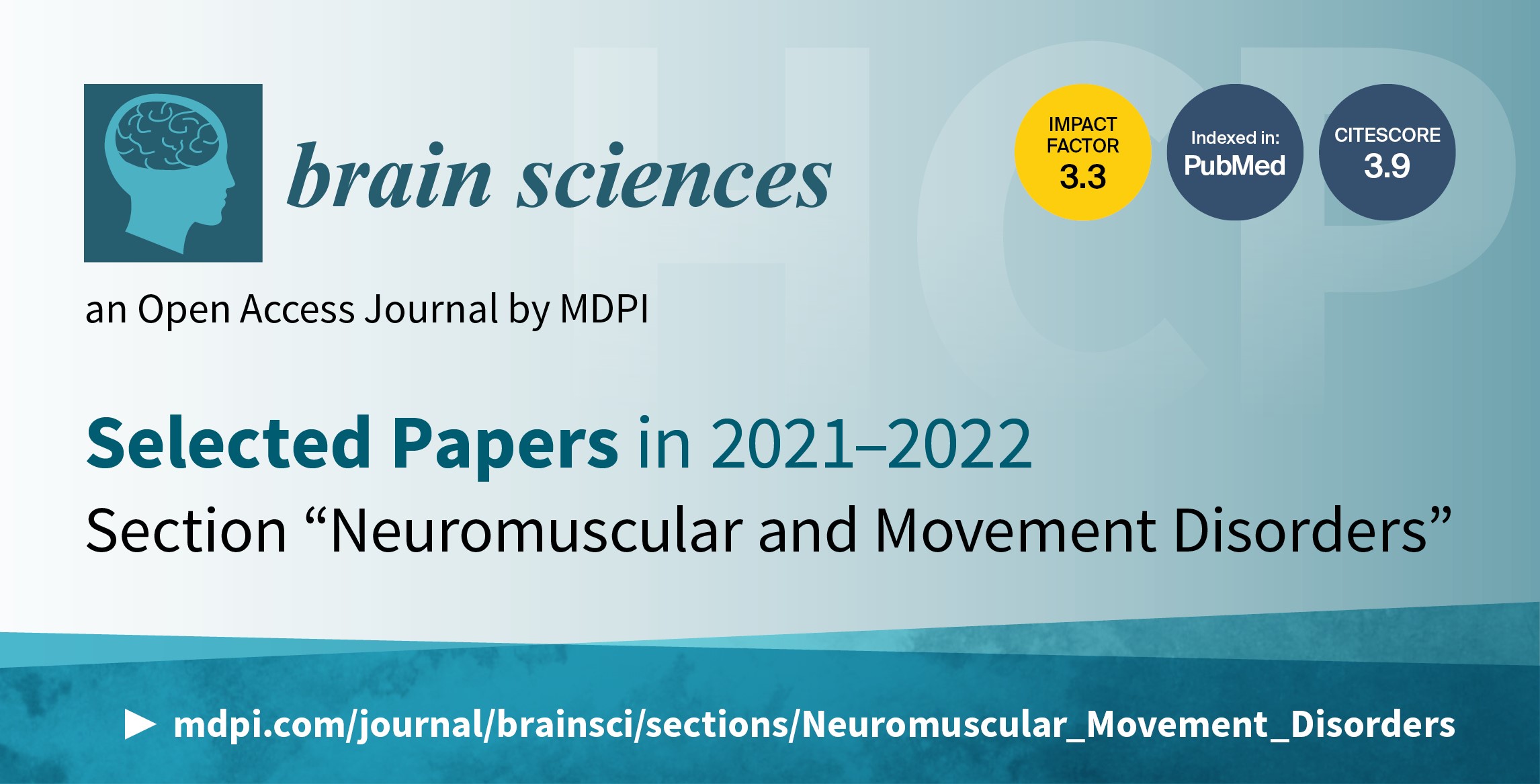
As all of the articles published in Brain Sciences (ISSN: 2076-3425) are of an open access format, you have free and unlimited access to the full text. We welcome you to read our most highly cited papers published in 2021 and 2022 listed below:
1. “Renal Involvement in Hereditary Transthyretin Amyloidosis: An Italian Single-Centre Experience”
by Pietro Manuel Ferraro, Viola D’Ambrosio, Andrea Di Paolantonio, Valeria Guglielmino, Paolo Calabresi, Mario Sabatelli and Marco Luigetti
Brain Sci. 2021, 11(8), 980; https://doi.org/10.3390/brainsci11080980
Available online: https://www.mdpi.com/2076-3425/11/8/980
2. “Blood Serum Cytokines in Patients with Subacute Spinal Cord Injury: A Pilot Study to Search for Biomarkers of Injury Severity”
by Sergei Ogurcov, Iliya Shulman, Ekaterina Garanina, Davran Sabirov, Irina Baichurina, Maxim Kuznetcov, Galina Masgutova, Alexander Kostennikov, Albert Rizvanov, Victoria James et al.
Brain Sci. 2021, 11(3), 322; https://doi.org/10.3390/brainsci11030322
Available online: https://www.mdpi.com/2076-3425/11/3/322
3. “Transcutaneous Spinal Cord Stimulation Enhances Walking Performance and Reduces Spasticity in Individuals with Multiple Sclerosis”
by Ursula S. Hofstoetter, Brigitta Freundl, Peter Lackner and Heinrich Binder
Brain Sci. 2021, 11(4), 472; https://doi.org/10.3390/brainsci11040472
Available online: https://www.mdpi.com/2076-3425/11/4/472
4. “Challenges in Treating Charcot-Marie-Tooth Disease and Related Neuropathies: Current Management and Future Perspectives”
by Chiara Pisciotta, Paola Saveri and Davide Pareyson
Brain Sci. 2021, 11(11), 1447; https://doi.org/10.3390/brainsci11111447
Available online: https://www.mdpi.com/2076-3425/11/11/1447
5. “Using Machine Learning Algorithms for Identifying Gait Parameters Suitable to Evaluate Subtle Changes in Gait in People with Multiple Sclerosis”
by Katrin Trentzsch, Paula Schumann, Grzegorz Śliwiński, Paul Bartscht, Rocco Haase, Dirk Schriefer, Andreas Zink, Andreas Heinke, Thurid Jochim, Hagen Malberg et al.
Brain Sci. 2021, 11(8), 1049; https://doi.org/10.3390/brainsci11081049
Available online: https://www.mdpi.com/2076-3425/11/8/1049
6. “Use of Drugs for ATTRv Amyloidosis in the Real World: How Therapy Is Changing Survival in a Non-Endemic Area”
by Massimo Russo, Luca Gentile, Vincenzo Di Stefano, Gianluca Di Bella, Fabio Minutoli, Antonio Toscano, Filippo Brighina, Giuseppe Vita and Anna Mazzeo
Brain Sci. 2021, 11(5), 545; https://doi.org/10.3390/brainsci11050545
Available online: https://www.mdpi.com/2076-3425/11/5/545
7. “Intensive Care Unit-Acquired Weakness and Positioning-Related Peripheral Nerve Injuries in COVID-19: A Case Series of Three Patients and the Latest Literature Review”
by Keiichi Hokkoku, Carmen Erra, Cristina Cuccagna, Daniele Coraci, Dario Mattia Gatto, Davide Glorioso and Luca Padua
Brain Sci. 2021, 11(9), 1177; https://doi.org/10.3390/brainsci11091177
Available online: https://www.mdpi.com/2076-3425/11/9/1177
8. “Improving Digital Patient Care: Lessons Learned from Patient-Reported and Expert-Reported Experience Measures for the Clinical Practice of Multidimensional Walking Assessment”
by Maria Scholz, Rocco Haase, Katrin Trentzsch, Heidi Stölzer-Hutsch and Tjalf Ziemssen
Brain Sci. 2021, 11(6), 786; https://doi.org/10.3390/brainsci11060786
Available online: https://www.mdpi.com/2076-3425/11/6/786
9. “Restless Legs Syndrome: Known Knowns and Known Unknowns”
by Elena Antelmi, Lorenzo Rocchi, Anna Latorre, Daniele Belvisi, Francesca Magrinelli, Kailash P. Bhatia and Michele Tinazzi
Brain Sci. 2022, 12(1), 118; https://doi.org/10.3390/brainsci12010118
Available online: https://www.mdpi.com/2076-3425/12/1/118
10. “Sex Differences in Parkinson’s Disease: From Bench to Bedside”
by Maria Claudia Russillo, Valentina Andreozzi, Roberto Erro, Marina Picillo, Marianna Amboni, Sofia Cuoco, Paolo Barone and Maria Teresa Pellecchia
Brain Sci. 2022, 12(7), 917; https://doi.org/10.3390/brainsci12070917
Available online: https://www.mdpi.com/2076-3425/12/7/917
11. “Vitamin D Status and Parkinson’s Disease”
by Michela Barichella, Federica Garrì, Serena Caronni, Carlotta Bolliri, Luciano Zocchi, Maria Carmela Macchione, Valentina Ferri, Daniela Calandrella and Gianni Pezzoli
Brain Sci. 2022, 12(6), 790; https://doi.org/10.3390/brainsci12060790
Available online: https://www.mdpi.com/2076-3425/12/6/790
12. “Tics and Emotions”
by Gerry Leisman and Dana Sheldon
Brain Sci. 2022, 12(2), 242; https://doi.org/10.3390/brainsci12020242
Available online: https://www.mdpi.com/2076-3425/12/2/242
13. “Epidemiology of Progressive Supranuclear Palsy: Real World Data from the Second Largest Health Plan in Israel”
by Yael Barer, Gabriel Chodick, Raanan Cohen, Meital Grabarnik-John, Xiaolan Ye, Jorge Zamudio and Tanya Gurevich
Brain Sci. 2022, 12(9), 1126; https://doi.org/10.3390/brainsci12091126
Available online: https://www.mdpi.com/2076-3425/12/9/1126
14. “Molecular Imaging in Parkinsonian Disorders—What’s New and Hot?”
by Stéphane Prange, Hendrik Theis, Magdalena Banwinkler and Thilo van Eimeren
Brain Sci. 2022, 12(9), 1146; https://doi.org/10.3390/brainsci12091146
Available online: https://www.mdpi.com/2076-3425/12/9/1146
15. “Pimavanserin and Parkinson’s Disease Psychosis: A Narrative Review”
by Jamir Pitton Rissardo, Ícaro Durante, Idan Sharon and Ana Letícia Fornari Caprara
Brain Sci. 2022, 12(10), 1286; https://doi.org/10.3390/brainsci12101286
Available online: https://www.mdpi.com/2076-3425/12/10/1286
16. “EEG Correlates of Active Stopping and Preparation for Stopping in Chronic Tic Disorder”
by Alonso Zea Vera, Ernest V. Pedapati, Travis R. Larsh, Kevin Kohmescher, Makoto Miyakoshi, David A. Huddleston, Hannah S. Jackson, Donald L. Gilbert, Paul S. Horn and Steve W. Wu
Brain Sci. 2022, 12(2), 151; https://doi.org/10.3390/brainsci12020151
Available online: https://www.mdpi.com/2076-3425/12/2/151
17. “A Novel SETX Mutation in a Taiwanese Patient with Autosomal Recessive Cerebellar Ataxia Detected by Targeted Next-Generation Sequencing, and a Literature Review”
by Ping-I Chiang, Ting-Wei Liao and Chiung-Mei Chen
Brain Sci. 2022, 12(2), 173; https://doi.org/10.3390/brainsci12020173
Available online: https://www.mdpi.com/2076-3425/12/2/173
18. “Rasagiline Withdrawal Syndrome in Parkinson’s Disease”
by Paolo Solla, Tommaso Ercoli, Carla Masala, Gianni Orofino, Laura Fadda, Davide Giacomo Corda, Ignazio Roberto Zarbo, Mario Meloni, Elia Sechi, Caterina Francesca Bagella et al.
Brain Sci. 2022, 12(2), 219; https://doi.org/10.3390/brainsci12020219
Available online: https://www.mdpi.com/2076-3425/12/2/219
19. “Exercise Effects on Motor Skill Consolidation and Intermuscular Coherence Depend on Practice Schedule”
by Ali Khan, Jyotpal Singh, J. Patrick Neary and Cameron S. Mang
Brain Sci. 2022, 12(4), 436; https://doi.org/10.3390/brainsci12040436
Available online: https://www.mdpi.com/2076-3425/12/4/436
20. “Association between General Movements Assessment and Later Motor Delay (excluding Cerebral Palsy) in Low-Birth-Weight Infants”
by Hirotaka Gima and Tomohiko Nakamura
Brain Sci. 2022, 12(6), 686; https://doi.org/10.3390/brainsci12060686
Available online: https://www.mdpi.com/2076-3425/12/6/686
18 September 2023
Meet Us at the 82nd Annual Meeting of the Japan Neurosurgical Society, 25–27 October 2023, Tokyo, Japan
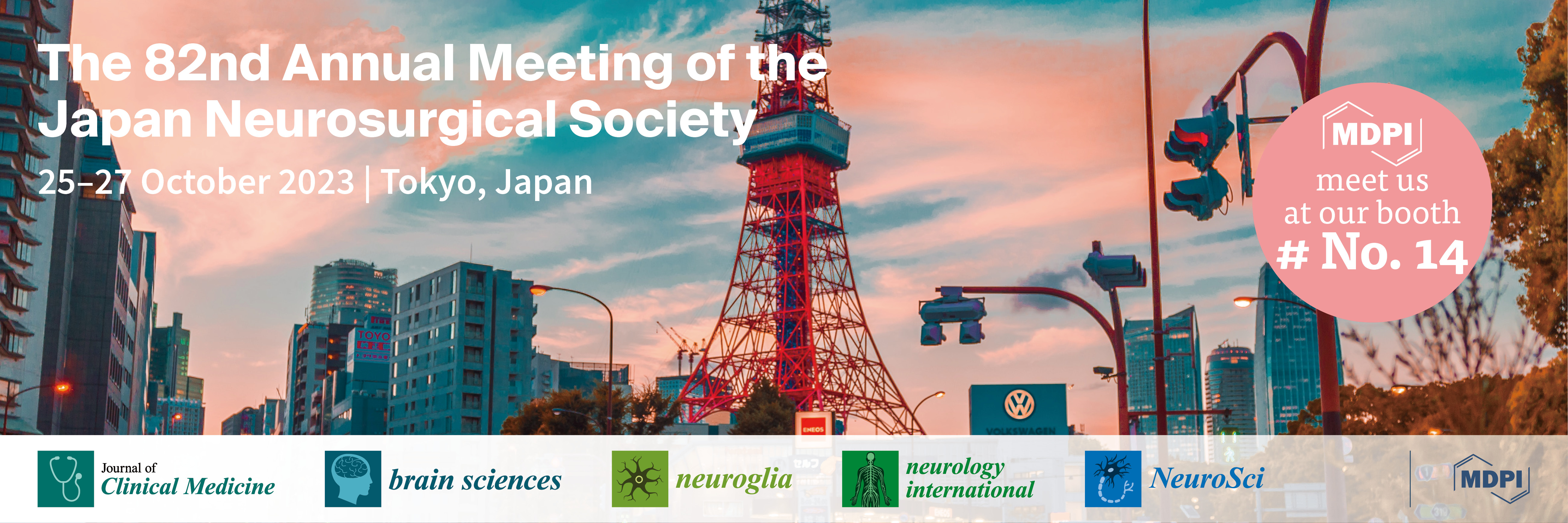
The 82nd Annual Meeting of the Japan Neurosurgical Society will be held from 25 to 27 October 2023 in Tokyo, Japan. The conference is organized by the Department of Neurosurgery, University of Tokyo.
The areas of interest include the following:
- Vascular disorders;
- Brain tumor;
- Spine and the spinal cord;
- Function;
- Pediatric;
- Neurotrauma;
- Education and society.
The following MDPI journals will be represented:
- Clinical Medicine;
- Brain Sciences;
- Neuroglia;
- Neurology International;
- NeuroSci.
If you are attending this conference, please talk to us online. Our delegates look forward to meeting you in person at booth #No. 14 and answering any questions that you may have. For more information about the conference, please visit the following link: http://jns2023.umin.jp/index.html.
12 September 2023
Brain Sciences| Highly Cited Papers in 2021–2022 in the Section “Developmental Neuroscience”

The aim of the “Developmental Neuroscience” Section of Brain Sciences (ISSN: 2076-3425) is to publish articles that identify the mechanisms of both normal neurodevelopmental processes and those that cause aberrant development leading to neurological disorders, from gestation through to adolescence, which sets the foundation of adult configurations. The scope of this Section includes a broad multidisciplinary approach to understanding the clinical and basic aspects of neurodevelopment. As such, behavioral, cognitive, molecular, genetic, epigenetic and imaging studies are particularly welcome.
As all of the articles published in our journal are of an open access format, you have free and unlimited access to the full text. We welcome you to read our most highly cited papers published in 2021 and 2022, which are listed below:
1. “Action Video Games Enhance Attentional Control and Phonological Decoding in Children with Developmental Dyslexia”
by Sara Bertoni, Sandro Franceschini, Giovanna Puccio, Martina Mancarella, Simone Gori and Andrea Facoetti
Brain Sci. 2021, 11(2), 171; https://doi.org/10.3390/brainsci11020171
Available online: https://www.mdpi.com/2076-3425/11/2/171
2. “Behavior Testing in Rodents: Highlighting Potential Confounds Affecting Variability and Reproducibility”
by Rachel Michelle Saré, Abigail Lemons and Carolyn Beebe Smith
Brain Sci. 2021, 11(4), 522; https://doi.org/10.3390/brainsci11040522
Available online: https://www.mdpi.com/2076-3425/11/4/522
3. “Effects of COVID-19 Lockdown on the Emotional and Behavioral Profiles of Preschool Italian Children with and without Familial Risk for Neurodevelopmental Disorders”
by Chiara Cantiani, Chiara Dondena, Elena Capelli, Elena M. Riboldi, Massimo Molteni and Valentina Riva
Brain Sci. 2021, 11(4), 477; https://doi.org/10.3390/brainsci11040477
Available online: https://www.mdpi.com/2076-3425/11/4/477
4. “Evolution of the Autism Literature and the Influence of Parents: A Scientific Mapping in Web of Science”
by Noemí Carmona-Serrano, Antonio-José Moreno-Guerrero, José-Antonio Marín-Marín and Jesús López-Belmonte
Brain Sci. 2021, 11(1), 74; https://doi.org/10.3390/brainsci11010074
Available online: https://www.mdpi.com/2076-3425/11/1/74
5. “Exome Sequencing in 200 Intellectual Disability/Autistic Patients: New Candidates and Atypical Presentations”
by Floriana Valentino, Lucia Pia Bruno, Gabriella Doddato, Annarita Giliberti, Rossella Tita, Sara Resciniti, Chiara Fallerini, Mirella Bruttini, Caterina Lo Rizzo, Maria Antonietta Mencarelli et al.
Brain Sci. 2021, 11(7), 936; https://doi.org/10.3390/brainsci11070936
Available online: https://www.mdpi.com/2076-3425/11/7/936
6. “Outcome of Community-Based Early Intervention and Rehabilitation for Children with Cerebral Palsy in Rural Bangladesh: A Quasi-Experimental Study”
by Tasneem Karim, Mohammad Muhit, Israt Jahan, Claire Galea, Catherine Morgan, Hayley Smithers-Sheedy, Nadia Badawi and Gulam Khandaker
Brain Sci. 2021, 11(9), 1189; https://doi.org/10.3390/brainsci11091189
Available online: https://www.mdpi.com/2076-3425/11/9/1189
7. “Sleep Abnormalities in the Synaptopathies—SYNGAP1-Related Intellectual Disability and Phelan–McDermid Syndrome”
by Constance Smith-Hicks, Damien Wright, Aisling Kenny, Robert C. Stowe, Maria McCormack, Andrew C. Stanfield and J. Lloyd Holder, Jr.
Brain Sci. 2021, 11(9), 1229; https://doi.org/10.3390/brainsci11091229
Available online: https://www.mdpi.com/2076-3425/11/9/1229
8. “The Impact of X-Chromosome Inactivation on Phenotypic Expression of X-Linked Neurodevelopmental Disorders”
by Boudewien A Brand, Alyssa E Blesson and Constance L. Smith-Hicks
Brain Sci. 2021, 11(7), 904; https://doi.org/10.3390/brainsci11070904
Available online: https://www.mdpi.com/2076-3425/11/7/904
9. “Parenting Stress and Social Style in Mothers and Fathers of Children with Autism Spectrum Disorder: A Cross-Cultural Investigation in Italy and Japan”
by Michele Giannotti, Sophia Marlene Bonatti, Sanae Tanaka, Haruyuki Kojima and Simona de Falco
Brain Sci. 2021, 11(11), 904; https://doi.org/10.3390/brainsci11111419
Available online: https://www.mdpi.com/2076-3425/11/11/1419
10. “Predictors of Rehabilitation Service Utilisation among Children with Cerebral Palsy (CP) in Low- and Middle-Income Countries (LMIC): Findings from the Global LMIC CP Register”
by Mahmudul Hassan Al Imam, Israt Jahan, Mohammad Muhit, Denny Hardianto, Francis Laryea, Amir Banjara Chhetri, Hayley Smithers-Sheedy, Sarah McIntyre, Nadia Badawi and Gulam Khandaker
Brain Sci. 2021, 11(7), 904; https://doi.org/10.3390/brainsci11070848
Available online: https://www.mdpi.com/2076-3425/11/7/848
11. “The Burden of Respiratory Alterations during Sleep on Comorbidities in Obstructive Sleep Apnoea (OSA)”
by Pasquale Tondo, Francesco Fanfulla, Giulia Scioscia, Roberto Sabato, Michela Salvemini, Cosimo C. De Pace, Maria Pia Foschino Barbaro and Donato Lacedonia
Brain Sci. 2022, 12(10), 1359; https://doi.org/10.3390/brainsci12101359
Available online: https://www.mdpi.com/2076-3425/12/10/1359
12. “Sensory Processing Phenotypes in Phelan-McDermid Syndrome and SYNGAP1-Related Intellectual Disability”
by Ariel M. Lyons-Warren, Maria C. McCormack and Jimmy L. Holder, Jr.
Brain Sci. 2022, 12(2), 137; https://doi.org/10.3390/brainsci12020137
Available online: https://www.mdpi.com/2076-3425/12/2/137
13. “Musical Performance in Adolescents with ADHD, ADD and Dyslexia—Behavioral and Neurophysiological Aspects”
by Christine Groß, Bettina L. Serrallach, Eva Möhler, Jachin E. Pousson, Peter Schneider, Markus Christiner and Valdis Bernhofs
Brain Sci. 2022, 12(2), 127; https://doi.org/10.3390/brainsci12020127
Available online: https://www.mdpi.com/2076-3425/12/2/127
14. “Testing the Impact of Depressive and Anxiety Features on the Association between Attention-Deficit/Hyperactivity Disorder Symptoms and Academic Performance among University Students: A Mediation Analysis”
by Ilaria Riboldi, Cristina Crocamo, Tommaso Callovini, Chiara Alessandra Capogrosso, Susanna Piacenti, Angela Calabrese, Susanna Lucini Paioni, Federico Moretti, Francesco Bartoli and Giuseppe Carrà
Brain Sci. 2022, 12(9), 1155; https://doi.org/10.3390/brainsci12091155
Available online: https://www.mdpi.com/2076-3425/12/9/1155
15. “The Impact of Health and Social Services on the Quality of Life in Families of Adults with Autism Spectrum Disorder (ASD): A Focus Group Study”
by Cinzia Correale, Marta Borgi, Francesca Cirulli, Francesca Cirulli, Fiorenzo Laghi, Barbara Trimarco, Maurizio Ferraro and Aldina Venerosi
Brain Sci. 2022, 12(2), 177; https://doi.org/10.3390/brainsci12020177
Available online: https://www.mdpi.com/2076-3425/12/2/177
16. “Eye Tracking Research on the Influence of Spatial Frequency and Inversion Effect on Facial Expression Processing in Children with Autism Spectrum Disorder”
by Kun Zhang, Yishuang Yuan, Yishuang Yuan, Jingying Chen, Guangshuai Wang, Qian Chen and Meijuan Luo
Brain Sci. 2022, 12(2), 283; https://doi.org/10.3390/brainsci12020283
Available online: https://www.mdpi.com/2076-3425/12/2/283
17. “Pragmatic Profiles of Adults with Fragile X Syndrome and Williams Syndrome”
by Eliseo Diez-Itza, Aitana Viejo and Maite Fernández-Urquiza
Brain Sci. 2022, 12(3), 385; https://doi.org/10.3390/brainsci12030385
Available online: https://www.mdpi.com/2076-3425/12/3/385
18. “Assessing the Utility of Neonatal Screening Assessments in Early Diagnosis of Cerebral Palsy in Preterm Infants”
by Rebecca Connors, Vathana Sackett, Catherine Machipisa, Kenneth Tan, Pramod Pharande, Lindsay Zhou and Atul Malhotra
Brain Sci. 2022, 12(7), 847; https://doi.org/10.3390/brainsci12070847
Available online: https://www.mdpi.com/2076-3425/12/7/847
19. “Tolerance to Stimulant Medication for Attention Deficit Hyperactivity Disorder: Literature Review and Case Report”
by Kenneth Handelman and Fernando Sumiya
Brain Sci. 2022, 12(8), 959; https://doi.org/10.3390/brainsci12080959
Available online: https://www.mdpi.com/2076-3425/12/8/959
20. “Maternal Allergic Asthma Induces Prenatal Neuroinflammation”
by Juan M. Tamayo, Destanie Rose, Jamie S. Church, Jared J. Schwartzer and Paul Ashwood
Brain Sci. 2022, 12(8), 1041; https://doi.org/10.3390/brainsci12081041
Available online: https://www.mdpi.com/2076-3425/12/8/1041
6 September 2023
Recap of Awards Granted to Scholars in 2022

MDPI is committed to supporting the academic community, nurturing talent and advancing science. Awards are an important part of the research landscape and play a vital role in helping academics gain recognition, especially young researchers as they embark on new research avenues.
In 2022, our journals presented a total number of 394 Awards, including Travel Awards, Young Investigator Awards, Best PhD Thesis Awards, Best Paper Awards, and Outstanding Reviewer Awards, with several winners announced for some of the awards. The total prize sum amounted to just under 580,000 Swiss francs (CHF), or approximately 650,000 US dollars. Overall, more than 720 scholars were awarded.
The majority of the awards were dedicated to young researchers in relatively early stages of their careers. This encompassed 66 of the afore-mentioned Travel Awards, 60 Young Investigator Awards, supporting research projects and conference attendance, as well as 51 Best PhD Thesis Awards. Additionally, 113 Best Paper Awards were given by our journals. The selection committees were entrusted with identifying the most impactful and novel research and review articles published in their journal within a given year.
MDPI will continue its support and recognition for the academic community moving forward, sponsoring new awards across disciplines. To learn more about all the awardees and their research projects in your field of study, please visit the following pages:
To explore more MDPI awards, please click here.
6 September 2023
Brain Sciences | Highly Cited Papers in 2021–2022 in the Section “Neuroglia”
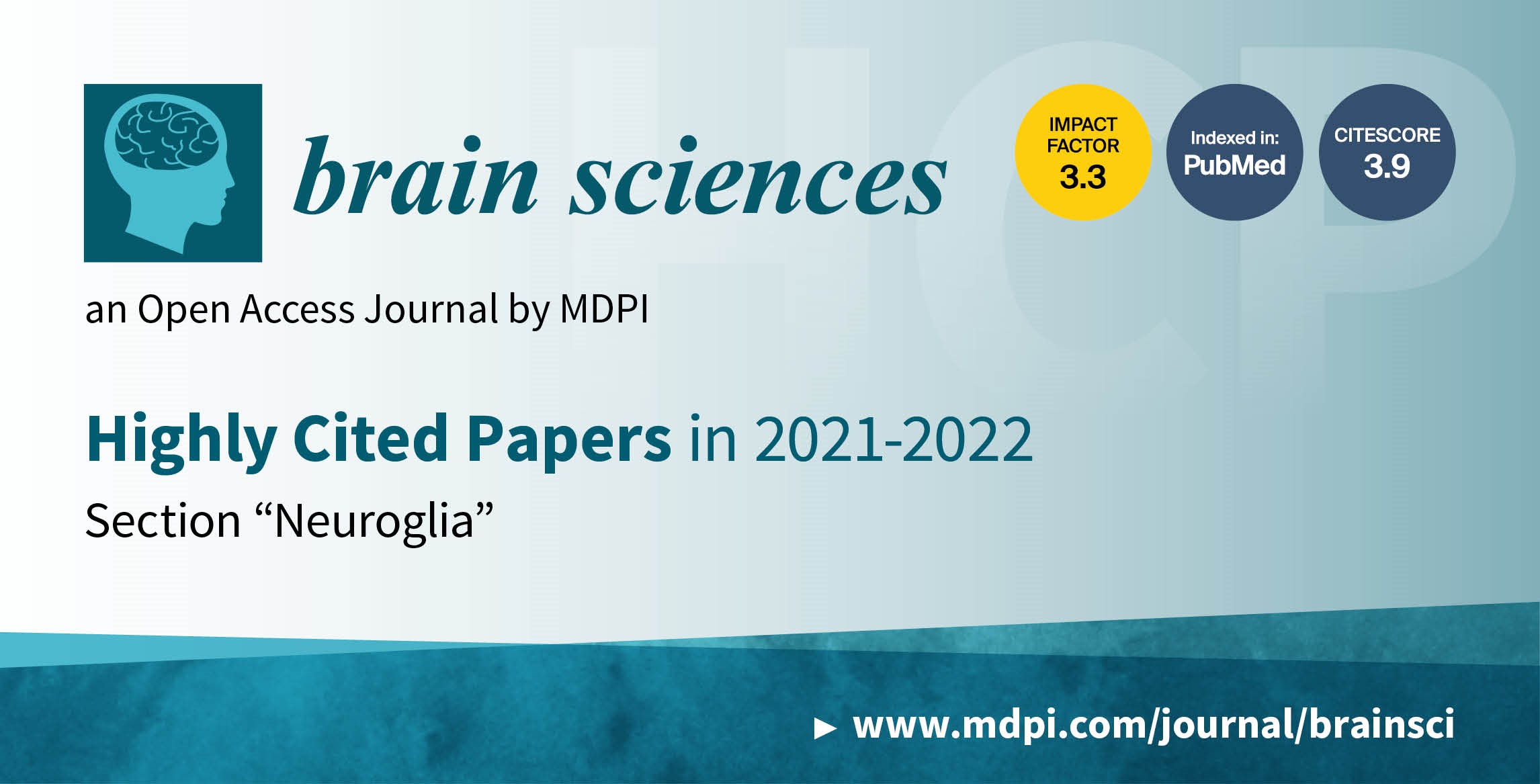
The mission of the “Neuroglia” Section of Brain Sciences (ISSN: 2076-3425) is to publicize research that focuses on all aspects of the “non-neuronal” brain, including functions of astrocytes, oligodendrocytes, microglia, pericytes, and their interplay with neurons and blood vessels in the brain. This includes studies of the fundamental mechanisms and technical reports, physiological and pathological processes, and presentations of novel models and tools for studies of glial and neuro-glial interactions. Priority will be given to multi-disciplinary studies and those linking molecular and genomic events with functions and phenotypes.
As all of the articles published in our journal are in an open access format, you have free and unlimited access to the full text. We welcome you to read our most highly cited papers published in 2021 and 2022 listed below:
1. “Peritumoral Microenvironment in High-Grade Gliomas: From FLAIRectomy to Microglia–Glioma Cross-Talk”
by Roberto Altieri, Davide Barbagallo, Francesco Certo, Giuseppe Broggi, Marco Ragusa, Cinzia Di Pietro, Rosario Caltabiano, Gaetano Magro, Simone Peschillo, Michele Purrellom et al.
Brain Sci. 2021, 11(2), 200; https://doi.org/10.3390/brainsci11020200
Available online: https://www.mdpi.com/2076-3425/11/2/200
2. “The Dying Forward Hypothesis of ALS: Tracing Its History”
by Andrew Eisen
Brain Sci. 2021, 11(3), 300; https://doi.org/10.3390/brainsci11030300
Available online: https://www.mdpi.com/2076-3425/11/3/300
3. “Hereditary Spastic Paraplegia: From Genes, Cells and Networks to Novel Pathways for Drug Discovery”
by Alan Mackay-Sim
Brain Sci. 2021, 11(3), 403; https://doi.org/10.3390/brainsci11030403
Available online: https://www.mdpi.com/2076-3425/11/3/403
4. “Immunomodulatory Effect of Microglia-Released Cytokines in Gliomas”
by Marika Lanza, Giovanna Casili, Michela Campolo, Irene Paterniti, Cristina Colarossi, Marzia Mare, Raffella Giuffrida, Maria Caffo, Emanuela Esposito and Salvatore Cuzzocrea
Brain Sci. 2021, 11(4), 466; https://doi.org/10.3390/brainsci11040466
Available online: https://www.mdpi.com/2076-3425/11/4/466
5. “Upper and Lower Motor Neuron Degenerations Are Somatotopically Related and Temporally Ordered in the Sod1 Mouse Model of Amyotrophic Lateral Sclerosis”
by Christine Marques, Thibaut Burg, Jelena Scekic-Zahirovic, Mathieu Fischer and Caroline Rouaux
Brain Sci. 2021, 11(3), 369; https://doi.org/10.3390/brainsci11030369
Available online: https://www.mdpi.com/2076-3425/11/3/369
6. “Differential Cytokine-Induced Responses of Polarized Microglia”
by Priyanka Chauhan, Wen S. Sheng, Shuxian Hu, Sujata Prasad and James R. Lokensgard
Brain Sci. 2021, 11(11), 1482; https://doi.org/10.3390/brainsci11111482
Available online: https://www.mdpi.com/2076-3425/11/11/1482
7. “The Cortical “Upper Motoneuron” in Health and Disease”
by Roger N. Lemon
Brain Sci. 2021, 11(5), 619; https://doi.org/10.3390/brainsci11050619
Available online:https://www.mdpi.com/2076-3425/11/5/619
8. “Neurophysiological Mechanisms Underlying Cortical Hyper-Excitability in Amyotrophic Lateral Sclerosis: A Review”
by Jonu Pradhan and Mark C. Bellingham
Brain Sci. 2021, 11(5), 549; https://doi.org/10.3390/brainsci11050549
Available online: https://www.mdpi.com/2076-3425/11/5/549
9. “The Dynamics of Tumor-Infiltrating Myeloid Cell Activation and the Cytokine Expression Profile in a Glioma Resection Site during the Post-Surgical Period in Mice”
by Jescelica Ortiz-Rivera, Alejandro Albors, Yuriy Kucheryavykh, Jeffrey K. Harrison and Lilia Kucheryavyk
Brain Sci. 2022, 12(7), 893; https://doi.org/10.3390/brainsci12070893
Available online: https://www.mdpi.com/2076-3425/12/7/893
10. “Role for Astrocytes in mGluR-Dependent LTD in the Neocortex and Hippocampus”
by Ulyana Lalo and Yuriy Pankrato
Brain Sci. 2022, 12(12), 1718; https://doi.org/10.3390/brainsci12121718
Available online: https://www.mdpi.com/2076-3425/12/12/1718
11. “Distribution and Morphological Characteristics of Oligodendrocytes in Selected Areas of the Brain of Male and Female Red Kangaroos (Macropus rufus)”
by Agata Wawrzyniak, Krzysztof Balawender, Roman Lalak, Maciej Przemysław Golan, Konrad Wróbel, Dariusz Boroń, Rafał Staszkiewicz and Beniamin Oskar Grabarek
Brain Sci. 2022, 12(8), 1035; https://doi.org/10.3390/brainsci12081035
Available online: https://www.mdpi.com/2076-3425/12/8/1035
12. “Cytoplasmic Human TDP-43 Mislocalization Induces Widespread Dendritic Spine Loss in Mouse Upper Motor Neurons”
by Marcus S. Dyer, Adele Woodhouse and Catherine A. Blizzard
Brain Sci. 2021, 11(7), 883; https://doi.org/10.3390/brainsci11070883
Available online: https://www.mdpi.com/2076-3425/11/7/883
13. “Neuronal Glial Crosstalk: Specific and Shared Mechanisms in Alzheimer’s Disease”
by Vishal Chavda, Kavita Singh, Vimal Patel, Meerambika Mishra and Awdhesh Kumar Mishra
Brain Sci. 2022, 12(1), 75; https://doi.org/10.3390/brainsci12010075
Available online: https://www.mdpi.com/2076-3425/12/1/75
14. “Final Exon Frameshift Biallelic PTPN23 Variants Are Associated with Microcephalic Complex Hereditary Spastic Paraplegia”
by Reham Khalaf-Nazzal, James Fasham, Nishanka Ubeyratna, David J. Evans, Joseph S. Leslie, Thomas T. Warner, Fida’ Al-Hijawi, Shurouq Alshaer, Wisam Baker, Peter D. Turnpenny et al.
Brain Sci. 2021, 11(5), 614; https://doi.org/10.3390/brainsci11050614
Available online: https://www.mdpi.com/2076-3425/11/5/614
15. “Upper Motor Neuron Disorders: Primary Lateral Sclerosis, Upper Motor Neuron Dominant Amyotrophic Lateral Sclerosis, and Hereditary Spastic Paraplegia”
by Timothy Fullam and Jeffrey Statland
Brain Sci. 2021, 11(5), 611; https://doi.org/10.3390/brainsci11050611
Available online: https://www.mdpi.com/2076-3425/11/5/611
16. “Utility of Transcranial Magnetic Simulation in Studying Upper Motor Neuron Dysfunction in Amyotrophic Lateral Sclerosis”
by Nimeshan Geevasinga, Mehdi Van den Bos, Parvathi Menon and Steve Vucic
Brain Sci. 2021, 11(7), 906; https://doi.org/10.3390/brainsci11070906
Available online: https://www.mdpi.com/2076-3425/11/7/906
17. “Therapeutic Strategies for Mutant SPAST-Based Hereditary Spastic Paraplegia”
by Neha Mohan, Liang Qiang, Gerardo Morfini and Peter W. Baas
Brain Sci. 2021, 11(8), 1081; https://doi.org/10.3390/brainsci11081081
Available online: https://www.mdpi.com/2076-3425/11/8/1081
18. “Cortical Excitability across the ALS Clinical Motor Phenotypes”
by Thanuja Dharmadasa
Brain Sci. 2021, 11(6), 715; https://doi.org/10.3390/brainsci11060715
Available online: https://www.mdpi.com/2076-3425/11/6/715
19. “The Upper Motor Neuron—Improved Knowledge from ALS and Related Clinical Disorders”
by Parvathi Menon and Steve Vucic
Brain Sci. 2021, 11(8), 958; https://doi.org/10.3390/brainsci11080958
Available online: https://www.mdpi.com/2076-3425/11/8/958
20. “Lysosome Function and Dysfunction in Hereditary Spastic Paraplegias”
by Daisy Edmison, Luyu Wang, and Swetha Gowrishankar
Brain Sci. 2021, 11(2), 152; https://doi.org/10.3390/brainsci11020152
Available online: https://www.mdpi.com/2076-3425/11/2/152
4 September 2023
Brain Sciences | Highly Cited Papers in 2021–2022 in the Section “Molecular and Cellular Neuroscience”
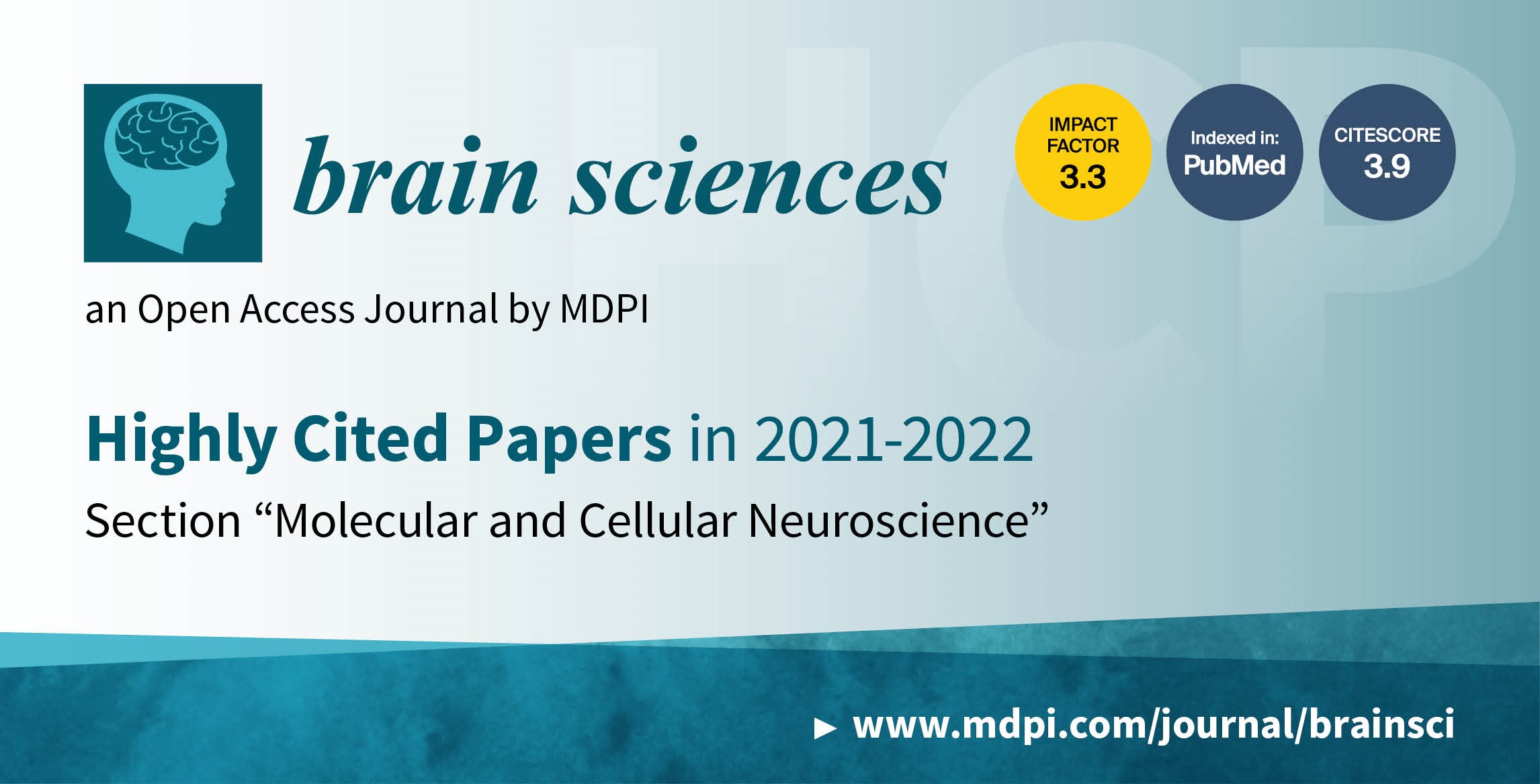
The mission of the “Molecular and Cellular Neuroscience” Section of Brain Sciences (ISSN: 2076-3425) is to publish cutting-edge original articles and critical reviews on the molecular and cellular basis of neurological disorders. In particular, Brain Sciences covers all aspects of molecular and cellular neuroscience, from genetic analyses of human populations to tissue culture and animal models of neurological disorders. Coverage includes experimental analyses of molecular and cellular events underpinning both developmental and adult plasticity mechanisms of the normal nervous system and occurring as a consequence of neurological dysfunction and in neuronal degeneration and repair.
As all the articles published in our journal are of an open access format, you have free and unlimited access to the full text. We welcome you to read our most highly cited papers published in 2021 and 2022 listed below:
1. “COVID-19 and Alzheimer’s Disease”
by Marcello Ciaccio, Bruna Lo Sasso, Concetta Scazzone, Caterina Maria Gambino, Anna Maria Ciaccio, Giulia Bivona, Tommaso Piccoli, Rosaria Vincenza Giglio and Luisa Agnello
Brain Sci. 2021, 11(3), 305; https://doi.org/10.3390/brainsci11030305
Available online: https://www.mdpi.com/2076-3425/11/3/305
2. “Environmental Impact on the Epigenetic Mechanisms Underlying Parkinson’s Disease Pathogenesis: A Narrative Review”
by Efthalia Angelopoulou, Yam Nath Paudel, Sokratis G. Papageorgiou and Christina Piperi
Brain Sci. 2022, 12(2), 175; https://doi.org/10.3390/brainsci12020175
Available online: https://www.mdpi.com/2076-3425/12/2/175
3. “Is L-Glutamate Toxic to Neurons and Thereby Contributes to Neuronal Loss and Neurodegeneration? A Systematic Review”
by Maryam N. AL-Nasser, Ian R. Mellor and Wayne G. Carter
Brain Sci. 2022, 12(5), 577; https://doi.org/10.3390/brainsci12050577
Available online: https://www.mdpi.com/2076-3425/12/5/577
4. “Homology Modelling, Molecular Docking and Molecular Dynamics Simulation Studies of CALMH1 against Secondary Metabolites of Bauhinia variegata to Treat Alzheimer’s Disease”
by Noopur Khare, Sanjiv Kumar Maheshwari, Syed Mohd Danish Rizvi, Hind Muteb Albadrani, Suliman A. Alsagaby, Wael Alturaiki, Danish Iqbal, Qamar Zia, Chiara Villa, Saurabh Kumar Jha et al.
Brain Sci. 2022, 12(6), 770; https://doi.org/10.3390/brainsci12060770
Available online: https://www.mdpi.com/2076-3425/12/6/770
5. “Influenza Vaccine Hesitancy in Patients with Multiple Sclerosis: A Monocentric Observational Study”
by Antonio Ziello, Cristina Scavone, Maria Elena Di Battista, Simona Salvatore, Daniele Di Giulio Cesare, Ornella Moreggia, Lia Allegorico, Anna Sagnelli, Stefano Barbato, Valentino Manzo et al.
Brain Sci. 2021, 11(7), 890; https://doi.org/10.3390/brainsci11070890
Available online: https://www.mdpi.com/2076-3425/11/7/890
6. “Plasticity in the Hippocampus, Neurogenesis and Drugs of Abuse”
by Yosef Avchalumov and Chitra D. Mandyam
Brain Sci. 2021, 11(3), 404; https://doi.org/10.3390/brainsci11030404
Available online: https://www.mdpi.com/2076-3425/11/3/404
7. “Smo-Shh Agonist Purmorphamine Prevents Neurobehavioral and Neurochemical Defects in 8-OH-DPAT-Induced Experimental Model of Obsessive-Compulsive Disorder”
by Ria Gupta, Sidharth Mehan, Pranshul Sethi, Aradhana Prajapati, Abdulrahman Alshammari, Metab Alharbi, Haneen A. Al-Mazroua and Acharan S. Narula
Brain Sci. 2022, 12(3), 342; https://doi.org/10.3390/brainsci12030342
Available online: https://www.mdpi.com/2076-3425/12/3/342
8. “Immediate Early Gene c-fos in the Brain: Focus on Glial Cells”
by Fernando Cruz-Mendoza, Fernando Jauregui-Huerta, Adriana Aguilar-Delgadillo, Joaquín García-Estrada and Sonia Luquin
Brain Sci. 2022, 12(6), 687; https://doi.org/10.3390/brainsci12060687
Available online: https://www.mdpi.com/2076-3425/12/6/687
9. “Cerebral Autoregulation in Ischemic Stroke: From Pathophysiology to Clinical Concepts”
by Ricardo C. Nogueira, Lucy Beishon, Edson Bor-Seng-Shu, Ronney B. Panerai and Thompson G. Robinson
Brain Sci. 2021, 11(4), 511; https://doi.org/10.3390/brainsci11040511
Available online: https://www.mdpi.com/2076-3425/11/4/511
10. “Imaging of Substantia Nigra in Parkinson’s Disease: A Narrative Review”
by Paola Feraco, Cesare Gagliardo, Giuseppe La Tona, Eleonora Bruno, Costanza D’angelo, Maurizio Marrale, Anna Del Poggio, Maria Chiara Malaguti, Laura Geraci, Roberta Baschi et al.
Brain Sci. 2021, 11(6), 769; https://doi.org/10.3390/brainsci11060769
Available online: https://www.mdpi.com/2076-3425/11/6/769
11. “Effect of Xenon Treatment on Gene Expression in Brain Tissue after Traumatic Brain Injury in Rats”
by Anton D. Filev, Denis N. Silachev, Ivan A. Ryzhkov, Konstantin N. Lapin, Anastasiya S. Babkina, Oleg A. Grebenchikov and Vladimir M. Pisarev
Brain Sci. 2021, 11(7), 889; https://doi.org/10.3390/brainsci11070889
Available online: https://www.mdpi.com/2076-3425/11/7/889
12. “Brain–Immune Interactions as the Basis of Gulf War Illness: Clinical Assessment and Deployment Profile of 1990–1991 Gulf War Veterans in the Gulf War Illness Consortium (GWIC) Multisite Case-Control Study”
by Lea Steele, Nancy Klimas, Maxine Krengel, Emily Quinn, Rosemary Toomey, Deborah Little, Maria Abreu, Kristina Aenlle, Ronald Killiany, Bang-Bon Koo et al.
Brain Sci. 2021, 11(9), 1132; https://doi.org/10.3390/brainsci11091132
Available online: https://www.mdpi.com/2076-3425/11/9/1132
13. “TLR-Mediated Signal Transduction and Neurodegenerative Disorders”
by Shashank Vishwanath Adhikarla, Niraj Kumar Jha, Vineet Kumar Goswami, Ankur Sharma, Anuradha Bhardwaj, Abhijit Dey, Chiara Villa, Yatender Kumar and Saurabh Kumar Jha
Brain Sci. 2021, 11(11), 1373; https://doi.org/10.3390/brainsci11111373
Available online: https://www.mdpi.com/2076-3425/11/11/1373
14. “Brain Connectivity and Graph Theory Analysis in Alzheimer’s and Parkinson’s Disease: The Contribution of Electrophysiological Techniques”
by Francesca Miraglia, Fabrizio Vecchio, Chiara Pappalettera, Lorenzo Nucci, Maria Cotelli, Elda Judica, Florinda Ferreri and Paolo Maria Rossini
Brain Sci. 2022, 12(3), 402; https://doi.org/10.3390/brainsci12030402
Available online: https://www.mdpi.com/2076-3425/12/3/402
15. “Andrographolide Attenuates Gut-Brain-Axis Associated Pathology in Gulf War Illness by Modulating Bacteriome-Virome Associated Inflammation and Microglia-Neuron Proinflammatory Crosstalk”
by Punnag Saha, Peter T. Skidmore, LaRinda A. Holland, Ayan Mondal, Dipro Bose, Ratanesh K. Seth, Kimberly Sullivan, Patricia A. Janulewicz, Ronnie Horner, Nancy Klimas et al.
Brain Sci. 2021, 11(7), 905; https://doi.org/10.3390/brainsci11070905
Available online: https://www.mdpi.com/2076-3425/11/7/905
16. “Shared Genetic Background between Parkinson’s Disease and Schizophrenia: A Two-Sample Mendelian Randomization Study”
by Kiwon Kim, Soyeon Kim, Woojae Myung, Injeong Shim, Hyewon Lee, Beomsu Kim, Sung Kweon Cho, Joohyun Yoon, Doh Kwan Kim and Hong-Hee Won
Brain Sci. 2021, 11(8), 1042; https://doi.org/10.3390/brainsci11081042
Available online: https://www.mdpi.com/2076-3425/11/8/1042
17. “The Genetics of Sleep Disorders in Children: A Narrative Review”
by Greta Mainieri, Angelica Montini, Antonio Nicotera, Gabriella Di Rosa, Federica Provini and Giuseppe Loddo
Brain Sci. 2021, 11(10), 1259; https://doi.org/10.3390/brainsci11101259
Available online: https://www.mdpi.com/2076-3425/11/10/1259
18. “Potential Effects of Poloxamer 188 on Rat Isolated Brain Mitochondria after Oxidative Stress In Vivo and In Vitro”
by Johannes A. Pille and Matthias L. Riess
Brain Sci. 2021, 11(1), 122; https://doi.org/10.3390/brainsci11010122
Available online: https://www.mdpi.com/2076-3425/11/1/122
19. “Focused Ultrasound Stimulation as a Neuromodulatory Tool for Parkinson’s Disease: A Scoping Review”
by Keng Siang Lee, Benjamin Clennell, Tom G. J. Steward, Andriana Gialeli, Oscar Cordero-Llana and Daniel J. Whitcomb
Brain Sci. 2022, 12(2), 289; https://doi.org/10.3390/brainsci12020289
Available online: https://www.mdpi.com/2076-3425/12/2/289
20. “Regulation of Voluntary Physical Activity Behavior: A Review of Evidence Involving Dopaminergic Pathways in the Brain”
by Anaissa Ruiz-Tejada, Janet Neisewander and Christos S. Katsanos
Brain Sci. 2022, 12(3), 333; https://doi.org/10.3390/brainsci12030333
Available online: https://www.mdpi.com/2076-3425/12/3/333
30 August 2023
MDPI Insights: The CEO’s Letter #3 - Sustainability and Co-opetition

Welcome to the MDPI Insights: The CEO's Letter.
In these monthly letters, I will showcase two key aspects of our work at MDPI: our commitment to empowering researchers and our determination to facilitating open scientific exchange.
Opening Thoughts

Our Commitment to Sustainability
As a pioneer in academic open access publishing since 1996, MDPI has always been dedicated to facilitating scientific exchange across all disciplines. Our approach to open science is guided by principles such as Open Access (OA), Timeliness and Efficiency, Simplicity, High-Quality Service, Flexibility, and a commitment to Sustainability. This commitment involves preserving published papers for the long term and supporting the future of science through partnerships, sponsorships, and awards.
In this edition of the CEO Letter, I will delve into MDPI’s various sustainability initiatives. As a leader in OA publishing, we are able to provide the public with a significant amount of environment-related content at no cost.
MDPI and the Sustainable Development Goals (SDGs)
In 2020, the SDG Publishers Compact was launched to accelerate implementation of the SDGs by promoting content that informs, develops, and inspires action. MDPI joined this initiative in 2021 and subsequently launched the MDPI SDG Hub in 2022, offering free access to recent research within the scope of each of the 17 SDGs. We also support authors from underrepresented communities by waiving publication charges for selected SDG-related papers. Detailed sustainability practices and supported publications are available in the report under each Goal page.
“More than 80% of MDPI articles and reviews published in 2022 relate to the Sustainable Development Goals.” [source: InCites, Accessed on 21.08.2023]
As at August 2023, MDPI boasts 14 journals dedicated to sustainability-related topics. Our first journal in this area, Sustainability, has published over 29,000 articles on the SDGs, accumulating over 240,000 citations (source: InCites, as at 1 January 2023). These journals serve as vital platforms for researchers to share insights and address environmental challenges. In addition:
MDPI journals specializing in sustainability-related topics:
- 2009: Sustainability
- 2012: Resources
- 2013: Climate
- 2014: Environments
- 2016: Recycling
- 2019: Clean Technologies
- 2020: Sustainable Chemistry
- 2021: Wind, Biomass, Conservation, Pollutants, Solar
- 2022: Waste, Microplastics
Read more:
Impactful Research

Highly Cited Articles in Sustainability
In 2022, content published in Sustainability and indexed in Journal Citation Reports (JCR) received nearly 190,000 citations. This highlights the fact that Sustainability publishes highly cited research articles related to environmental sciences and SDG-related topics such as climate action.
We are pleased to share that Sustainability received a 2022 CiteScore of 5.8, marking a 16% increase from the 2021 metric. Specifically, the CiteScore positions Sustainability as follows: Q1 (27 out of 163) in the “Environmental Science (miscellaneous)” category, and Q1 (101 out of 779) in the “Geography Planning and Development” category. For additional journal statistics, please visit here.
“Sustainability received a 2022 CiteScore of 5.8”
While MDPI journals such as Climate and Atmosphere have a distinct focus on atmosphere pollution and its impact on climate processes, journals like Sustainability, Environments, Water, Remote Sensing, and IJERPH publish content related to climate change. These journals have published over 32,300 articles related to SDG 13: Climate Action.
Highly Cited Papers in Sustainability
Below are several highly cited papers published in Sustainability over the past three years. Citation metrics are current as at 15 August 2023.
1. “A Global Assessment: Can Renewable Energy Replace Fossil Fuels by 2050?”Authors: Jerry L. Holechek, Hatim M. E. Geli, Mohammed N. Sawalhah, and Raul Valdez
Sustainability 2022, 14(8), 4792; https://doi.org/10.3390/su14084792
Citations: Crossref (97), Scopus (91), Web of Science (82), Google Scholar (125)
This paper addresses one of the most significant challenges of climate change – achieving Net Zero Carbon by 2050. The meta-analysis suggests that while difficult, this transition is possible through the concerted application of pathways, lifestyle changes, and global cooperation.
2. “Anxiety and the Ecological Crisis: An Analysis of Eco-Anxiety and Climate Anxiety”Author: Panu Pihkala
Sustainability 2020, 12(19), 7836; https://doi.org/10.3390/su12197836
Citations: Crossref (144), Scopus (121), Web of Science (159), Google Scholar (382)
This paper has received substantial media attention, including coverage by The Guardian, BBC, Vice, and CNBC. An interview with Dr. Panu Pihkala, a leading interdisciplinary researcher on the topic, can be found on MDPI’s podcast: Insight Faster, Episode 1.
3. “Impact of Climate Change on Agriculture and Its Mitigation Strategies: A Review”Authors: Gurdeep Singh Malhi, Manpreet Kaur, and Prashant Kaushik
Sustainability 2021, 13(3), 1318; https://doi.org/10.3390/su13031318
Citations: Crossref (207), Scopus (221), Web of Science (186), Google Scholar (355)
This paper reviews literature on climate change, addressing its causes, future projections, impact on agriculture, including plant physiology, growth, productivity, pest infestation, and the economic implications of mitigation strategies.
4. “Impacts of Plastic Pollution on Ecosystem Services, Sustainable Development Goals, and Need to Focus on Circular Economy and Policy Interventions”Authors: Rakesh Kumar, Anurag Verma, Arkajyoti Shome, Rama Sinha, Srishti Sinha, Prakash Kumar Jha, Ritesh Kumar, Pawan Kumar, Shubham, Shreyas Das, Prabhakar Sharma, and P. V. Vara Prasad
Sustainability 2021, 13(17), 9963; https://doi.org/10.3390/su13179963
Citations: Crossref (134), Scopus (136), Web of Science (113), Google Scholar (184)
This review aims to assess the adverse effects of plastic pollution on ecosystems, link the management of plastic with the SDGs, and propose policy measures using transdisciplinary approaches. Empowering communities to reduce plastic use is crucial. Addressing global plastic pollution is a priority.
Sustainability is an international, cross-disciplinary, open access journal that explores environmental, cultural, economic, and social sustainability of human beings. It provides a forward-looking platform for research on sustainability and sustainable development, and is published semi-monthly online by MDPI. Sustainability is affiliated with The Canadian Urban Transit Research & Innovation Consortium (CUTRIC) and The International Council for Research and Innovation in Building and Construction (CIB).
Read more:
- Testimonials: See what our editors and authors say about Sustainability.
Inside MDPI

President of Ireland Authors Editorial in MDPI Journal Sustainability
It’s a very special occasion when the president of a country takes the initiative to write an editorial for a journal. Michael D. Higgins, President of the Republic of Ireland, has contributed his insights to a forthcoming Special Issue in Sustainability:

This Special Issue, focusing on “making sustainable development happen” at grassroots levels, allows for perspectives from, and on, the major world faiths, exploring how challenges have been conceptualised and addressed, in addition to case studies of faith-based sustainability initiatives in practice.
The experience of faith institutions and communities in translating theological and moral commitments to sustainable development into action is now a topic we must examine with urgency; one on which I am so glad this Special Issue focuses.
As President of Ireland, I very much support this Special Issue of Sustainability. It is my great hope that the contents of the papers contained herein will assist in making sustainable development happen at grassroots levels across the world so that we can cooperate together, people of faith and of none, to ensure a just, inclusive and sustainable future for all on our fragile planet.
Read the completed editorial here:
Special Issue “Faith and Sustainable Development: Exploring Practice, Progress and Challenges among Faith Communities and Institutions”: Foreword by the President of Ireland
Author: Michael D. Higgins
Sustainability 2023, 15(12), 9683; https://doi.org/10.3390/su15129683
Coming Together for Science

The World Sustainability Forum 2023
The World Sustainability Forum (WSF) is a biennial MDPI event focused on sustainability. WSF 2023 marks the tenth anniversary of the conference series, taking place on 14 September. For the first time, the event will be hosted as a 24-hour conference across three locations – Singapore, Basel in Switzerland, and Toronto in Canada – alongside virtual streaming.
This unique format allows us to span three time zones, providing live coverage of critical sustainability-related topics throughout the day:
- The Singapore Hub, chaired by Professor Horn Mun Cheah and Associate Professor Renee Tan, will explore “Sustainability for Social and Community Impact”.
- The Basel Hub, chaired by Prof. Dr. Anet Režek Jambrak and Dr. Lela Mélon, will delve into “Sustainability in the industry, and at university and corporate settings”.
- The Toronto Hub, led by Dr. Umberto Berardi, will discuss “The Sustainable Built Environment”.
MDPI Sustainability Foundation: Recognizing Excellence in Sustainability Research
The MDPI Sustainability Foundation supports researchers through two sustainability-focused awards:
- The World Sustainability Award, amounting to USD 100,000, is given to senior researchers.
- The Emerging Sustainability Leader Award, valued at USD 20,000, sponsored by the journal Sustainability, is presented to early-career researchers.
The winners of the Sustainability Foundation will be formally awarded during the WSF2023 on 14 September. Interviews with the award winners and finalists are available below.
2023 World Sustainability Award Winners
Interviews with 2023 Emerging Sustainability Leader Award Finalists
- Dr. Bahareh Kamranzad
- Dr. Youjin Kim
- Dr. Julia Lohmann
As a hybrid event, WSF23 provides scholars with the option to attend in person at one of the conference sites or, for a more sustainable approach, virtually. All sessions will be recorded and archived for future access. Registration is open until 3 September 2023, with in-person and virtual tickets available here.
Read more:
Closing Thoughts
“Co-opetition”: Collaboration Plus Healthy Competition – A Visit to Elsevier
I firmly believe in fostering collaboration and at the same time promoting healthy competition within the academic publishing industry. The market offers ample room for publishers and related companies to provide valuable services and products that enrich the academic community. While MDPI is recognized for its efficient and streamlined processes –thanks to our over 6,000 colleagues, in-house tools, and initiatives that support the author journey – our ethos has always involved learning from and collaborating with other organizations.
MDPI’s Interaction with Elsevier
In January 2023, I had a brief conversation with Judy Verses, President of Global Academic and Government Markets at Elsevier, following her participation in a panel discussion at the Academic Publishers Europe event in Berlin. One of the highlights for me was Judy’s insight into the impact of research, particularly her emphasis on the role of collaboration, including policy and showing the impact of research to influence on funding decisions.
“Such collaborations drive forward-looking strategies to elevate our support for the scholarly community”

Judy and I resumed our discussion in August, when I visited Elsevier's office to review current projects, such as our recent agreement with Science Direct and the continued indexing of MDPI journals in Scopus (indexing database owned by Elsevier). We also explored possible opportunities for the future, including a potential collaboration to expand MDPI’s Scilit data infrastructure. This endeavour aims to aggregate and provide access to scholarly metadata encompassing journal articles, conference papers, books, preprints, and more. While these discussions are ongoing, the underlying principle remains that such collaborations drive forward-looking strategies to elevate our services and support for the scholarly community.
It was great that Judy and I acknowledged the merits of 'co-opetition,' a concept based of the belief that fostering cooperation alongside healthy competition can lead to shared advancements for both individual companies and the industry at large.
‘Fully OA’ Organizations Dedicated to Open Access

MDPI proudly aligns with the ‘Fully OA’ group, a collaborative initiative comprising nine organizations dedicated to Open Access. Our monthly meetings, including an OASPA representative, serve as platforms to share non-confidential information, resources, and projects. These gatherings also facilitate discussions on topics relevant to fully OA organizations. Occasionally, joint actions spring from these interactions, such as collaborative blog posts on pertinent subjects and joint statements, such as a recent response to the House Appropriations Committee.
This display of cooperation among competing entities forms a strategic alliance focused on nurturing the best interests of the OA publishing model.
As I wrap up this third edition of the CEO Letter, I encourage you to seize opportunities for collaboration and contribute to advancing our shared academic culture. As the African proverb has it, “If you want to go fast, go alone; if you want to go far, go together.”
Chief Executive Officer
MDPI AG
29 August 2023
Brain Sciences | Highly Cited Papers in 2021–2022 in the Section “Sensory and Motor Neuroscience”
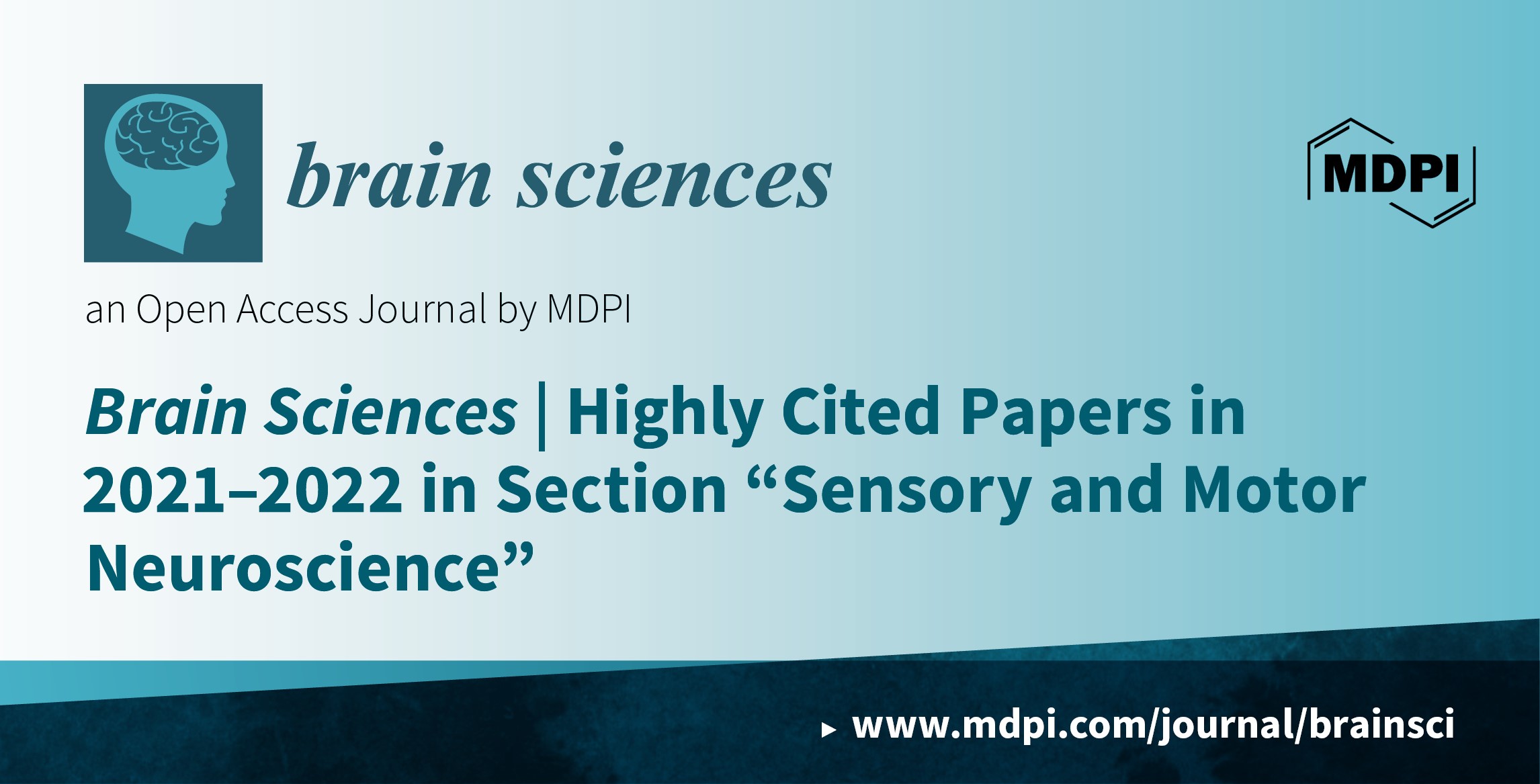
The “Sensory and Motor Neuroscience” Section of Brain Sciences (ISSN: 2076-3425) aims to publish articles on sensorimotor transformation and the modulation of sensory and motor function, among other topics.
As all of the articles published in our journal are of an open access format, you have free and unlimited access to the full text. We welcome you to read our most highly cited papers published in 2021 and 2022, listed below:
1. “Active School Breaks and Students’ Attention: A Systematic Review with Meta-Analysis”
by Álvaro Infantes-Paniagua, Ana Filipa Silva, Rodrigo Ramirez-Campillo, Hugo Sarmento, Francisco Tomás González-Fernández, Sixto González-Víllora and Filipe Manuel Clemente
Brain Sci. 2021, 11(6), 675; https://doi.org/10.3390/brainsci11060675
Available online: https://www.mdpi.com/2076-3425/11/6/675
2. “Mapping of Motor Function with Neuronavigated Transcranial Magnetic Stimulation: A Review on Clinical Application in Brain Tumors and Methods for Ensuring Feasible Accuracy”
by Nico Sollmann, Sandro M. Krieg, Laura Säisänen and Petro Julkunen
Brain Sci. 2021, 11(7), 897; https://doi.org/10.3390/brainsci11070897
Available online: https://www.mdpi.com/2076-3425/11/7/897
3. “The Role of Mental Imagery in Parkinson’s Disease Rehabilitation”
by Amit Abraham, Ryan P. Duncan and Gammon M. Earhart
Brain Sci. 2021, 11(2), 185; https://doi.org/10.3390/brainsci11020185
Available online: https://www.mdpi.com/2076-3425/11/2/185
4. “Physical Activity and Inhibitory Control: The Mediating Role of Sleep Quality and Sleep Efficiency”
by Lin Li, Qian Yu, Wenrui Zhao, Fabian Herold, Boris Cheval, Zhaowei Kong, Jinming Li, Notger Mueller, Arthur F. Kramer, Jie Cui et al.
Brain Sci. 2021, 11(5), 664; https://doi.org/10.3390/brainsci11050664
Available online: https://www.mdpi.com/2076-3425/11/5/664
5. “Single Word Intelligibility of Individuals with Parkinson’s Disease in Noise: Pre-Specified Secondary Outcome Variables from a Randomized Control Trial (RCT) Comparing Two Intensive Speech Treatments (LSVT LOUD vs. LSVT ARTIC)”
by Geralyn Schulz, Angela Halpern, Jennifer Spielman, Lorraine Ramig, Ira Panzer, Alan Sharpley and Katherine Freeman
Brain Sci. 2021, 11(7), 857; https://doi.org/10.3390/brainsci11070857
Available online: https://www.mdpi.com/2076-3425/11/7/857
6. “The Effect of Acute Aerobic Exercise on Divergent and Convergent Thinking and Its Influence by Mood”
by Kohei Aga, Masato Inamura, Chong Chen, Kosuke Hagiwara, Rikuto Yamashita, Masako Hirotsu, Tomoe Seki, Akiyo Takao, Yuko Fujii, Toshio Matsubara et al.
Brain Sci. 2021, 11(5), 546; https://doi.org/10.3390/brainsci11050546
Available online: https://www.mdpi.com/2076-3425/11/5/546
7. “Downregulation of CD73/A2AR-Mediated Adenosine Signaling as a Potential Mechanism of Neuroprotective Effects of Theta-Burst Transcranial Magnetic Stimulation in Acute Experimental Autoimmune Encephalomyelitis”
by Milorad Dragić, Milica Zeljković, Ivana Stevanović, Marija Adžić, Andjela Stekić, Katarina Mihajlović, Ivana Grković, Nela Ilić, Tihomir V. Ilić, Nadežda Nedeljković et al.
Brain Sci. 2021, 11(6), 736; https://doi.org/10.3390/brainsci11060736
Available online: https://www.mdpi.com/2076-3425/11/6/736
8. “Facial Signals and Social Actions in Multimodal Face-to-Face Interaction”
by Naomi Nota, James P. Trujillo and Judith Holler
Brain Sci. 2021, 11(8), 1017; https://doi.org/10.3390/brainsci11081017
Available online: https://www.mdpi.com/2076-3425/11/8/1017
9. “Acute Effect of a Simultaneous Exercise and Cognitive Task on Executive Functions and Prefrontal Cortex Oxygenation in Healthy Older Adults”
by Manon Pellegrini-Laplagne, Olivier Dupuy, Philippe Sosner and Laurent Bosquet
Brain Sci. 2022, 12(4), 455; https://doi.org/10.3390/brainsci12040455
Available online: https://www.mdpi.com/2076-3425/12/4/455
10. “Motoric Cognitive Risk Syndrome, Subtypes and 8-Year All-Cause Mortality in Aging Phenotypes: The Salus in Apulia Study”
by Ilaria Bortone, Roberta Zupo, Fabio Castellana, Simona Aresta, Luisa Lampignano, Sabrina Sciarra, Chiara Griseta, Tommaso Antonio Stallone, Giancarlo Sborgia, Madia Lozupone et al.
Brain Sci. 2022, 12(7), 861; https://doi.org/10.3390/brainsci12070861
Available online: https://www.mdpi.com/2076-3425/12/7/861
11. “Cerebellum-Cortical Interaction in Spatial Navigation and Its Alteration in Dementias”
by Pierandrea Mirino, Anna Pecchinenda, Maddalena Boccia, Adriano Capirchio, Fabrizia D’Antonio and Cecilia Guariglia
Brain Sci. 2022, 12(5), 523; https://doi.org/10.3390/brainsci12050523
Available online: https://www.mdpi.com/2076-3425/12/5/523
12. “Case Study: Intra- and Interpersonal Coherence of Muscle and Brain Activity of Two Coupled Persons during Pushing and Holding Isometric Muscle Action”
by Laura V. Schaefer and Frank N. Bittmann
Brain Sci. 2022, 12(6), 703; https://doi.org/10.3390/brainsci12060703
Available online: https://www.mdpi.com/2076-3425/12/6/703
13. “Comparing the Effects of Exoskeletal-Type Robot-Assisted Gait Training on Patients with Ataxic or Hemiplegic Stroke”
by Sungsik Son, Kil-Byung Lim, Jiyong Kim, Changhun Lee, Sung II Cho and Jeehyun Yoo
Brain Sci. 2022, 12(9), 1261; https://doi.org/10.3390/brainsci12091261
Available online: https://www.mdpi.com/2076-3425/12/9/1261
14. “Functional Connectivity States of Alpha Rhythm Sources in the Human Cortex at Rest: Implications for Real-Time Brain State Dependent EEG-TMS”
by Davide Tabarelli, Arianna Brancaccio, Christoph Zrenner and Paolo Belardinelli
Brain Sci. 2022, 12(3), 348; https://doi.org/10.3390/brainsci12030348
Available online: https://www.mdpi.com/2076-3425/12/3/348
15. “Indexes for the E-Baking Tray Task: A Look on Laterality, Verticality and Quality of Exploration”
by Antonietta Argiuolo, Federica Somma, Paolo Bartolomeo, Onofrio Gigliotta and Michela Ponticorvo
Brain Sci. 2022, 12(3), 401; https://doi.org/10.3390/brainsci12030401
Available online: https://www.mdpi.com/2076-3425/12/3/401
16. “The Role of Systemic Physiology in Individual Hemodynamic Responses Measured on the Head Due to Long-Term Stimulation Involving Colored Light Exposure and a Cognitive Task: An SPA-fNIRS Study”
by Felix Scholkmann, Hamoon Zohdi and Ursula Wolf
Brain Sci. 2022, 12(5), 597; https://doi.org/10.3390/brainsci12050597
Available online: https://www.mdpi.com/2076-3425/12/5/597
17. “Behavioral and Immunohistochemical Evidence for Suppressive Effects of Goshajinkigan on Salicylate-Induced Tinnitus in Rats”
by Koichi Kitano, Akinori Yamashita, Taketoshi Sugimura, Tadao Okayasu, Masaharu Sakagami, Daisuke Osaki, Tadashi Kitahara and Yasuhiko Saito
Brain Sci. 2022, 12(5), 587; https://doi.org/10.3390/brainsci12050587
Available online: https://www.mdpi.com/2076-3425/12/5/587
18. “Uric Acid and Cortisol Levels in Plasma Correlate with Pre-Competition Anxiety in Novice Athletes of Combat Sports”
by Luis Fernando Garcia de Oliveira, Tácito Pessoa Souza-Junior, Juliane Jellmayer Fechio, José Alberto Fernandes Gomes-Santos, Ricardo Camões Sampaio, Cristina Vasconcelos Vardaris, Rafael Herling Lambertucci and Marcelo Paes de Barros
Brain Sci. 2022, 12(6), 712; https://doi.org/10.3390/brainsci12060712
Available online: https://www.mdpi.com/2076-3425/12/6/712
19. “Inattention, Impulsivity, and Hyperactivity among Individuals with Self-Reported Impaired Wound Healing”
by Jessica Balikji, Maarten M. Hoogbergen, Johan Garssen and Joris C. Verster
Brain Sci. 2022, 12(8), 961; https://doi.org/10.3390/brainsci12080961
Available online: https://www.mdpi.com/2076-3425/12/8/961
20. “Changing the Tendency to Integrate the Senses”
by Saul I. Quintero, Ladan Shams and Kimia Kamal
Brain Sci. 2022, 12(10), 1384; https://doi.org/10.3390/brainsci12101384
Available online: https://www.mdpi.com/2076-3425/12/10/1384
25 August 2023
Brain Sciences | High Cited Papers in 2021–2022 in the Section “Psychiatric Diseases”
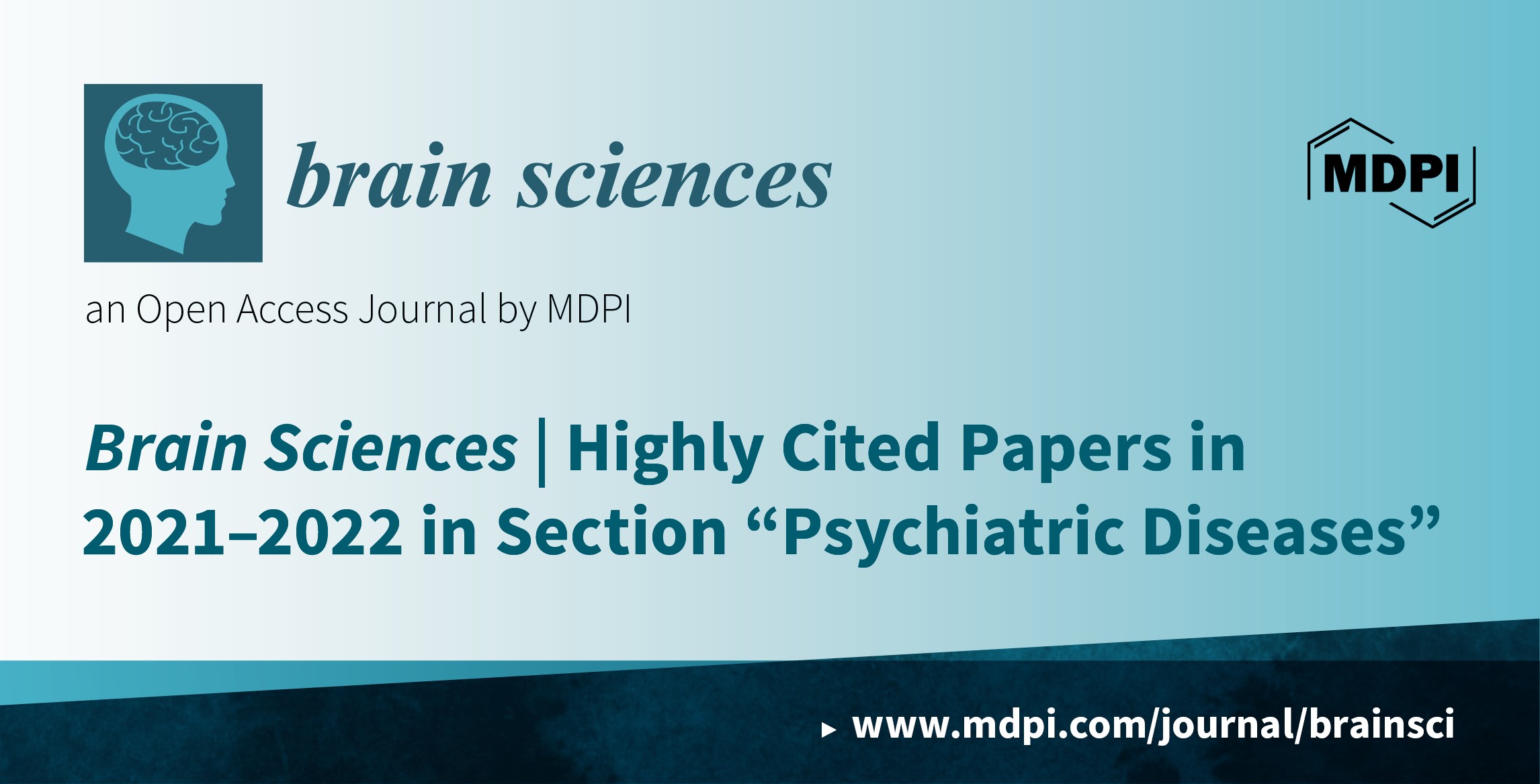
The “Psychiatric Diseases” Section the journal Brain Sciences (ISSN: 2076-3425) gathers the best available scientific evidence to guide clinical practice in the treatment of psychiatric illnesses. Original articles and reviews that advance our understanding of the etiology, course, and treatment of psychiatric illnesses are welcome. Papers reporting sound evidence-based practices that provide safeguards against reporting bias and promote the reproducibility of study procedures and the replicability of results, for example through the preregistration of study hypotheses, will also be highly valued.
As all of the articles published in our journal are of an open access format, you have free and unlimited access to the full texts. We welcome you to read our most highly cited papers published in 2021 and 2022 listed below:
1. “What Is the Role of Resilience and Coping Strategies on the Mental Health of the General Population during the COVID-19 Pandemic? Results from the Italian Multicentric COMET Study”
by Gaia Sampogna, Valeria Del Vecchio, Vincenzo Giallonardo, Mario Luciano, Umberto Albert, Claudia Carmassi, Giuseppe Carrà, Francesca Cirulli, Bernardo Dell’Osso, Giulia Menculini et al.
Brain Sci. 2021, 11(9), 1231; https://doi.org/10.3390/brainsci11091231
Available online: https://www.mdpi.com/2076-3425/11/9/1231
2. “Therapeutic Potentials of Ketamine and Esketamine in Obsessive–Compulsive Disorder (OCD), Substance Use Disorders (SUD) and Eating Disorders (ED): A Review of the Current Literature”
by Giovanni Martinotti, Stefania Chiappini, Mauro Pettorruso, Alessio Mosca, Andrea Miuli, Francesco Di Carlo, Giacomo D’Andrea, Roberta Collevecchio, Ilenia Di Muzio, Stefano L. Sensi et al.
Brain Sci. 2021, 11(7), 856; https://doi.org/10.3390/brainsci11070856
Available online: https://www.mdpi.com/2076-3425/11/7/856
3. “Access to Mental Health Care during the First Wave of the COVID-19 Pandemic in Italy: Results from the COMET Multicentric Study”
by Giulia Menculini, Alfonso Tortorella, Umberto Albert, Claudia Carmassi, Giuseppe Carrà, Francesca Cirulli, Bernardo Dell’Osso, Mario Luciano, Maria Giulia Nanni, Maurizio Pompili et al.
Brain Sci. 2021, 11(11), 1413; https://doi.org/10.3390/brainsci11111413
Available online: https://www.mdpi.com/2076-3425/11/11/1413
4. “The Importance of Type D Personality in the Development of Temporomandibular Disorders (TMDs) and Depression in Students during the COVID-19 Pandemic”
by Magdalena Gębska, Bartosz Dalewski, Łukasz Pałka, Łukasz Kołodziej and Ewa Sobolewska
Brain Sci. 2022, 12(1), 28; https://doi.org/10.3390/brainsci12010028
Available online: https://www.mdpi.com/2076-3425/12/1/28
5. “Therapeutic Neurostimulation in Obsessive-Compulsive and Related Disorders: A Systematic Review”
by Nicola Acevedo, Peter Bosanac, Toni Pikoos, Susan Rossell and David Castle
Brain Sci. 2021, 11(7), 948; https://doi.org/10.3390/brainsci11070948
Available online: https://www.mdpi.com/2076-3425/11/7/948
6. “Prevalence of Individuals at Clinical High-Risk of Psychosis in the General Population and Clinical Samples: Systematic Review and Meta-Analysis”
by Gonzalo Salazar de Pablo, Scott W. Woods, Georgia Drymonitou, Héctor de Diego and Paolo Fusar-Poli
Brain Sci. 2021, 11(11), 1544; https://doi.org/10.3390/brainsci11111544
Available online: https://www.mdpi.com/2076-3425/11/11/1544
7. “Coping Strategies and Stress Related Disorders in Patients with COVID-19”
by Liana Dehelean, Ion Papava, Madalina Iuliana Musat, Mariana Bondrescu, Felix Bratosin, Bianca Oana Bucatos, Ana-Maria Cristina Bortun, Daniela Violeta Mager, Radu Stefan Romosan, Ana-Maria Romosan et al.
Brain Sci. 2021, 11(10), 1287; https://doi.org/10.3390/brainsci11101287
Available online: https://www.mdpi.com/2076-3425/11/10/1287
8. “Social Isolation, Loneliness and Generalized Anxiety: Implications and Associations during the COVID-19 Quarantine”
by Linas Wilkialis, Nelson B. Rodrigues, Danielle S. Cha, Ashley Siegel, Amna Majeed, Leanna M. W. Lui, Jocelyn K. Tamura, Barjot Gill, Kayla Teopiz and Roger S. McIntyre
Brain Sci. 2021, 11(12), 1620; https://doi.org/10.3390/brainsci11121620
Available online: https://www.mdpi.com/2076-3425/11/12/1620
9. “The Elephant in the Room: A Cross-Sectional Study on the Stressful Psychological Effects of the COVID-19 Pandemic in Mental Healthcare Workers”
by Alessandra Minelli, Rosana Carvalho Silva, Stefano Barlati, Marika Vezzoli, Sara Carletto, Cinzia Isabello, Marco Bortolomasi, Gabriele Nibbio, Jacopo Lisoni, Valentina Menesello et al.
Brain Sci. 2022, 12(3), 408; https://doi.org/10.3390/brainsci12030408
Available online: https://www.mdpi.com/2076-3425/12/3/408
10. “Substance Use in the Transgender Population: A Meta-Analysis”
by Miriam Cotaina, Marc Peraire, Mireia Boscá, Iván Echeverria, Ana Benit and Gonzalo Haro
Brain Sci. 2022, 12(3), 366; https://doi.org/10.3390/brainsci12030366
Available online: https://www.mdpi.com/2076-3425/12/3/366
11. “Cytokines and Neurodegeneration in Epileptogenesis”
by Pawel Wolinski, Dominika Ksiazek-Winiarek and Andrzej Glabinski
Brain Sci. 2022, 12(3), 380; https://doi.org/10.3390/brainsci12030380
Available online: https://www.mdpi.com/2076-3425/12/3/380
12. “Neurobiology of the Orexin System and Its Potential Role in the Regulation of Hedonic Tone”
by Martin A. Katzman and Matthew P. Katzman
Brain Sci. 2022, 12(2), 150; https://doi.org/10.3390/brainsci12020150
Available online: https://www.mdpi.com/2076-3425/12/2/150
13. “Ketamine as a Novel Psychopharmacotherapy for Eating Disorders: Evidence and Future Directions”
by Anya Ragnhildstveit, Matthew Slayton, Laura Kate Jackson, Madeline Brendle, Sachin Ahuja, Willis Holle, Claire Moore, Kellie Sollars, Paul Seli and Reid Robison
Brain Sci. 2022, 12(3), 382; https://doi.org/10.3390/brainsci12030382
Available online: https://www.mdpi.com/2076-3425/12/3/382
14. “Neutrophil-to-Lymphocyte, Monocyte-to-Lymphocyte, Platelet-to-Lymphocyte Ratio and Systemic Immune-Inflammatory Index in Different States of Bipolar Disorder”
by Katerina Dadouli, Michel B. Janho, Apostolia Hatziefthimiou, Ioanna Voulgaridi, Konstantina Piaha, Lemonia Anagnostopoulos, Panagiotis Ntellas, Varvara A. Mouchtouri, Konstantinos Bonotis, Nikolaos Christodoulou et al.
Brain Sci. 2022, 12(8), 1034; https://doi.org/10.3390/brainsci12081034
Available online: https://www.mdpi.com/2076-3425/12/8/1034
15. “Utilizing Cognitive Training to Improve Working Memory, Attention, and Impulsivity in School-Aged Children with ADHD and SLD”
by Grahamm M. Wiest, Kevin P. Rosales, Lisa Looney, Eugene H. Wong and Dudley J. Wiest
Brain Sci. 2022, 12(2), 141; https://doi.org/10.3390/brainsci12020141
Available online: https://www.mdpi.com/2076-3425/12/2/141
16. “COVID-19 Infection among Family and Friends: The Psychological Impact on Non-Infected Persons”
by Jagdish Khubchandani, Sushil Sharma, Fern J. Webb, Michael J. Wiblishauser and Manoj Sharma
Brain Sci. 2022, 12(9), 1123; https://doi.org/10.3390/brainsci12091123
Available online: https://www.mdpi.com/2076-3425/12/9/1123
17. “Revisiting Hemispheric Asymmetry in Mood Regulation: Implications for rTMS for Major Depressive Disorder”
by Benjamin C. Gibson, Andrei Vakhtin, Vincent P. Clark, Christopher C. Abbott and Davin K. Quinn
Brain Sci. 2022, 12(1), 112; https://doi.org/10.3390/brainsci12010112
Available online: https://www.mdpi.com/2076-3425/12/1/112
18. “Examining First Night Effect on Sleep Parameters with hd-EEG in Healthy Individuals”
by Ahmad Mayeli, Sabine A. Janssen, Kamakashi Sharma and Fabio Ferrarelli
Brain Sci. 2022, 12(2), 233; https://doi.org/10.3390/brainsci12020233
Available online: https://www.mdpi.com/2076-3425/12/2/233
19. “COVID-19 Vaccination and Mental Disorders, What Has Been Accomplished and Future Direction”
by Gianluca Pandolfo, Giovanni Genovese, Fiammetta Iannuzzo, Antonio Bruno, Giovanni Pioggia and Sebastiano Gangemi
Brain Sci. 2022, 12(2), 292; https://doi.org/10.3390/brainsci12020292
Available online: https://www.mdpi.com/2076-3425/12/2/292
20. “Motion, Relation, and Passion in Brain Physiological and Cognitive Aging”
by Hermundur Sigmundsson, Benjamin H. Dybendal and Simone Grassini
Brain Sci. 2022, 12(9), 1122; https://doi.org/10.3390/brainsci12091122
Available online: https://www.mdpi.com/2076-3425/12/9/1122
24 August 2023
Meet Us at the ASHG Annual Meeting 2023, 1–5 November 2023, Washington D.C., USA

MDPI will attend the ASHG Annual Meeting 2023, held in Washington, D.C., USA, from 1 to 5 November 2023.
The ASHG Annual Meeting is the largest human genetics and genomics meeting and exposition in the world. Held in the fall, it provides a forum for the presentation and discussion of cutting-edge science in all areas of human genetics. Highlights include invited symposia; abstract-driven plenary, platform, and poster sessions; education/trainee workshops; and career opportunities and networking events.
The following MDPI journals will be represented:
- Genes;
- JPM;
- Biomolecules;
- Medicina;
- Diagnostics;
- Cancers;
- Biomedicines;
- Humans;
- Applied Biosciences;
- DNA;
- IJMS;
- Brain Sciences;
- Cardiogenetics;
- Vaccines;
- Life;
- Epigenomes;
- BioTech;
- Biology;
- CIMB;
- Biomedinformatics.
If you plan on attending this conference, please stop by our booth and speak with us. Our delegates look forward to meeting you in person and answering any questions that you may have.
For more information about the conference, please visit https://www.ashg.org/meetings/.
23 August 2023
Brain Sciences | Highly Cited Papers in 2021–2022 in the Section “Neural Engineering, Neuroergonomics and Neurorobotics”
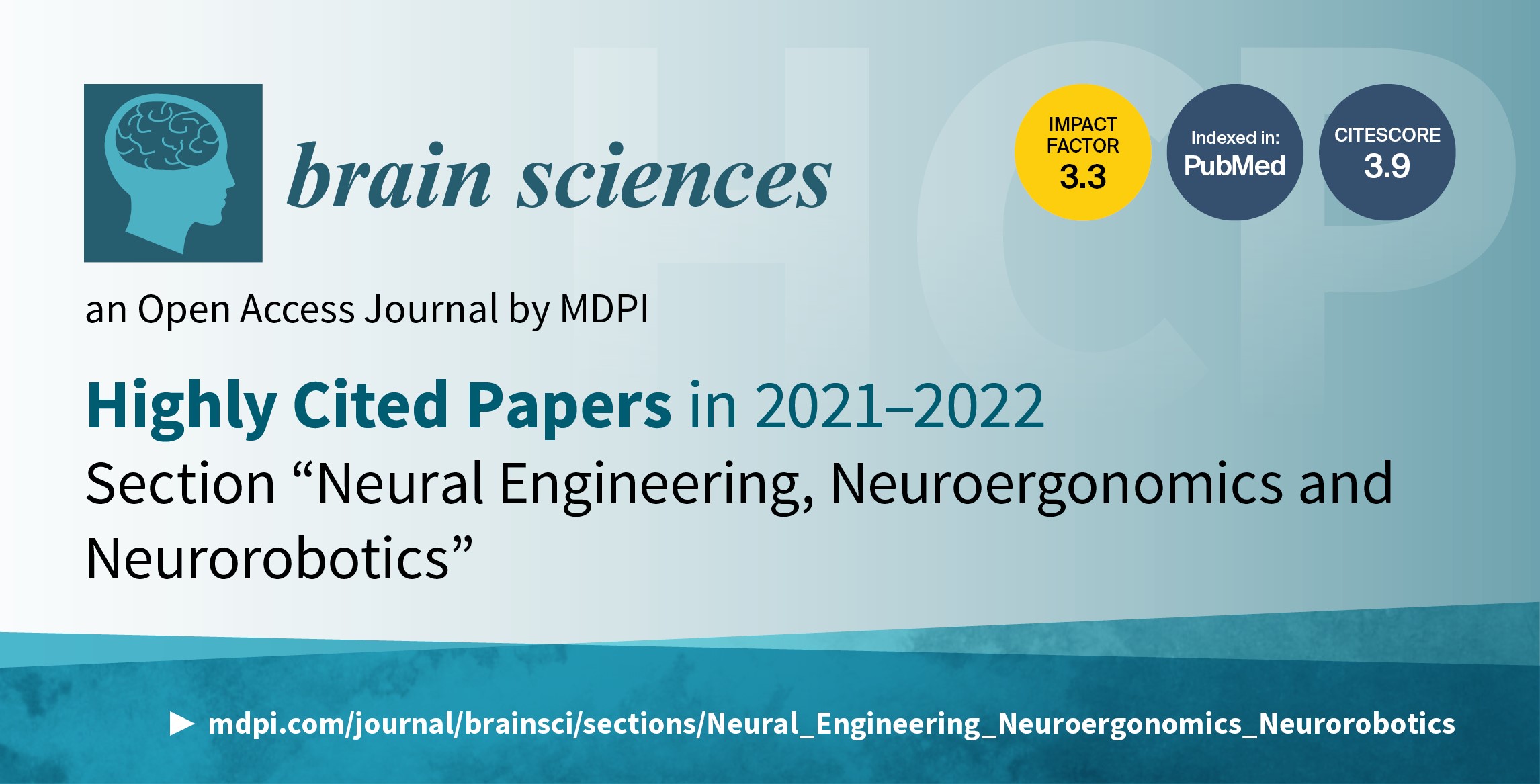
The “Neural Engineering, Neuroergonomics and Neurorobotics” Section of the journal Brain Sciences (ISSN: 2076-3425) aims to publish original contributions on a wide range of topics, including (but not limited to) brain–machine interfaces, neuregonomics, neural interfaces, nanotechnology, circuits and materials, neural prostheses, neurorehabilitation, neural decoding and encoding algorithms, neural computation and modeling, neural imaging, and neuroethics.
As all of the articles published in our journal are of an open access format, you have free and unlimited access to the full text. We welcome you to read our most highly cited papers published in 2021 and 2022 listed below:
1. “Differential Deep Convolutional Neural Network Model for Brain Tumor Classification”
by Isselmou Abd El Kader, Guizhi Xu, Zhang Shuai, Sani Saminu and Isah Salim Ahmad
Brain Sci. 2021, 11(3), 352; https://doi.org/10.3390/brainsci11030352
Available online: https://www.mdpi.com/2076-3425/11/3/352
2. “A Framework for Instantaneous Driver Drowsiness Detection Based on Improved HOG Features and Naïve Bayesian Classification”
by Samy Bakheet and Ayoub Al-Hamadi
Brain Sci. 2021, 11(2), 240; https://doi.org/10.3390/brainsci11020240
Available online: https://www.mdpi.com/2076-3425/11/2/240
3. “Spiking Neural Networks and Their Applications: A Review”
by Kashu Yamazaki, Viet-Khoa Vo-Ho, Darshan Bulsara and Ngan Le
Brain Sci. 2022, 12(7), 863; https://doi.org/10.3390/brainsci12070863
Available online: https://www.mdpi.com/2076-3425/12/7/863
4. “The Actuation System of the Ankle Exoskeleton T-FLEX: First Use Experimental Validation in People with Stroke”
by Daniel Gomez-Vargas, Felipe Ballen-Moreno, Patricio Barria, Rolando Aguilar, José M. Azorín, Marcela Munera and Carlos A. Cifuentes
Brain Sci. 2021, 11(4), 412; https://doi.org/10.3390/brainsci11040412
Available online: https://www.mdpi.com/2076-3425/11/4/412
5. “A Densely Connected Multi-Branch 3D Convolutional Neural Network for Motor Imagery EEG Decoding”
by Tianjun Liu and Deling Yang
Brain Sci. 2021, 11(2), 197; https://doi.org/10.3390/brainsci11020197
Available online: https://www.mdpi.com/2076-3425/11/2/197
6. “BCI Training Effects on Chronic Stroke Correlate with Functional Reorganization in Motor-Related Regions: A Concurrent EEG and fMRI Study”
by Kai Yuan, Cheng Chen, Xin Wang, Winnie Chiu-wing Chu and Raymond Kai-yu Tong
Brain Sci. 2021, 11(1), 56; https://doi.org/10.3390/brainsci11010056
Available online: https://www.mdpi.com/2076-3425/11/1/56
7. “Low-Intensity Focused Ultrasound-Mediated Attenuation of Acute Seizure Activity Based on EEG Brain Functional Connectivity”
by Minjian Zhang, Bo Li, Xiaodong Lv, Sican Liu, Yafei Liu, Rongyu Tang, Yiran Lang, Qiang Huang and Jiping He
Brain Sci. 2021, 11(6), 711; https://doi.org/10.3390/brainsci11060711
Available online: https://www.mdpi.com/2076-3425/11/6/711
8. “Preconditioning Stimulus Intensity Alters Paired-Pulse TMS Evoked Potentials”
by Vishal Rawji, Isabella Kaczmarczyk, Lorenzo Rocchi, Po-Yu Fong, John C. Rothwell and Nikhil Sharma
Brain Sci. 2021, 11(3), 326; https://doi.org/10.3390/brainsci11030326
Available online: https://www.mdpi.com/2076-3425/11/3/326
9. “Get Your Guidance Going: Investigating the Activation of Spatial Priors for Efficient Search in Virtual Reality”
by Julia Beitner, Jason Helbing, Dejan Draschkow and Melissa L.-H. Võ
Brain Sci. 2021, 11(1), 44; https://doi.org/10.3390/brainsci11010044
Available online: https://www.mdpi.com/2076-3425/11/1/44
10. “Influence of Brain-Derived Neurotrophic Factor Genotype on Short-Latency Afferent Inhibition and Motor Cortex Metabolites”
by Ryoki Sasaki, Naofumi Otsuru, Shota Miyaguchi, Sho Kojima, Hiraku Watanabe, Ken Ohno, Noriko Sakurai, Naoki Kodama, Daisuke Sato and Hideaki Onishi
Brain Sci. 2021, 11(3), 395; https://doi.org/10.3390/brainsci11030395
Available online: https://www.mdpi.com/2076-3425/11/3/395
11. “Effects of Motor Imagery Tasks on Brain Functional Networks Based on EEG Mu/Beta Rhythm”
by Hongli Yu, Sidi Ba, Yuxue Guo, Lei Guo and Guizhi Xu
Brain Sci. 2022, 12(2), 194; https://doi.org/10.3390/brainsci12020194
Available online: https://www.mdpi.com/2076-3425/12/2/194
12. “Phase-Dependent Deep Brain Stimulation: A Review”
by Lekshmy Sudha Kumari and Abbas Z. Kouzani
Brain Sci. 2021, 11(4), 414; https://doi.org/10.3390/brainsci11040414
Available online: https://www.mdpi.com/2076-3425/11/4/414
13. “A Survey on Socially Assistive Robotics: Clinicians’ and Patients’ Perception of a Social Robot within Gait Rehabilitation Therapies”
by Denniss Raigoso, Nathalia Céspedes, Carlos A. Cifuentes, Antonio J. del-Ama and Marcela Múnera
Brain Sci. 2021, 11(6), 738; https://doi.org/10.3390/brainsci11060738
Available online: https://www.mdpi.com/2076-3425/11/6/738
14. “Genomics of Gulf War Illness in U.S. Veterans Who Served during the 1990–1991 Persian Gulf War: Methods and Rationale for Veterans Affairs Cooperative Study #2006”
by Krishnan Radhakrishnan, Elizabeth R. Hauser, Renato Polimanti, Drew A. Helmer, Dawn Provenzale, Rebecca B. McNeil, Alysia Maffucci, Rachel Quaden, Hongyu Zhao, Stacey B. Whitbourne et al.
Brain Sci. 2021, 11(7), 845; https://doi.org/10.3390/brainsci11070845
Available online: https://www.mdpi.com/2076-3425/11/7/845
15. “Modulation of Motor Cortex Plasticity by Repetitive Paired-Pulse TMS at Late I-Wave Intervals Is Influenced by Intracortical Excitability”
by George M. Opie, Ryoki Sasaki, Brodie J. Hand and John G. Semmler
Brain Sci. 2021, 11(1), 121; https://doi.org/10.3390/brainsci11010121
Available online: https://www.mdpi.com/2076-3425/11/1/121
16. “Brain Plasticity Mechanisms Underlying Motor Control Reorganization: Pilot Longitudinal Study on Post-Stroke Subjects”
by Marta Gandolla, Lorenzo Niero, Franco Molteni, Elenora Guanziroli, Nick S. Ward and Alessandra Pedrocchi
Brain Sci. 2021, 11(3), 329; https://doi.org/10.3390/brainsci11030329
Available online: https://www.mdpi.com/2076-3425/11/3/329
17. “Sequence-to-Sequence Voice Reconstruction for Silent Speech in a Tonal Language”
by Huiyan Li, Haohong Lin, You Wang, Hengyang Wang, Ming Zhang, Han Gao, Qing Ai, Zhiyuan Luo and Guang Li
Brain Sci. 2022, 12(7), 818; https://doi.org/10.3390/brainsci12070818
Available online: https://www.mdpi.com/2076-3425/12/7/818
18. “Review of tDCS Configurations for Stimulation of the Lower-Limb Area of Motor Cortex and Cerebellum”
by Vicente Quiles, Laura Ferrero, Eduardo Iáñez, Mario Ortiz and José M. Azorín
Brain Sci. 2022, 12(2), 248; https://doi.org/10.3390/brainsci12020248
Available online: https://www.mdpi.com/2076-3425/12/2/248
19. “Optimizing Motor Imagery Parameters for Robotic Arm Control by Brain-Computer Interface”
by Ünal Hayta, Danut Constantin Irimia, Christoph Guger, İbrahim Erkutlu and İbrahim Halil Güzelbey
Brain Sci. 2022, 12(7), 833; https://doi.org/10.3390/brainsci12070833
Available online: https://www.mdpi.com/2076-3425/12/7/833
20. “Neuromorphic-Based Neuroprostheses for Brain Rewiring: State-of-the-Art and Perspectives in Neuroengineering”
by Michela Chiappalone, Vinicius R. Cota, Marta Carè, Mattia Di Florio, Romain Beaubois, Stefano Buccelli, Federico Barban, Martina Brofiga, Alberto Averna, Francesco Bonacini et al.
Brain Sci. 2022, 12(11), 1578; https://doi.org/10.3390/brainsci12111578
Available online: https://www.mdpi.com/2076-3425/12/11/1578
18 August 2023
Brain Sciences | Highly Cited Papers in 2021–2022 in the Section “Neurotology and Neuro-ophthalmology”
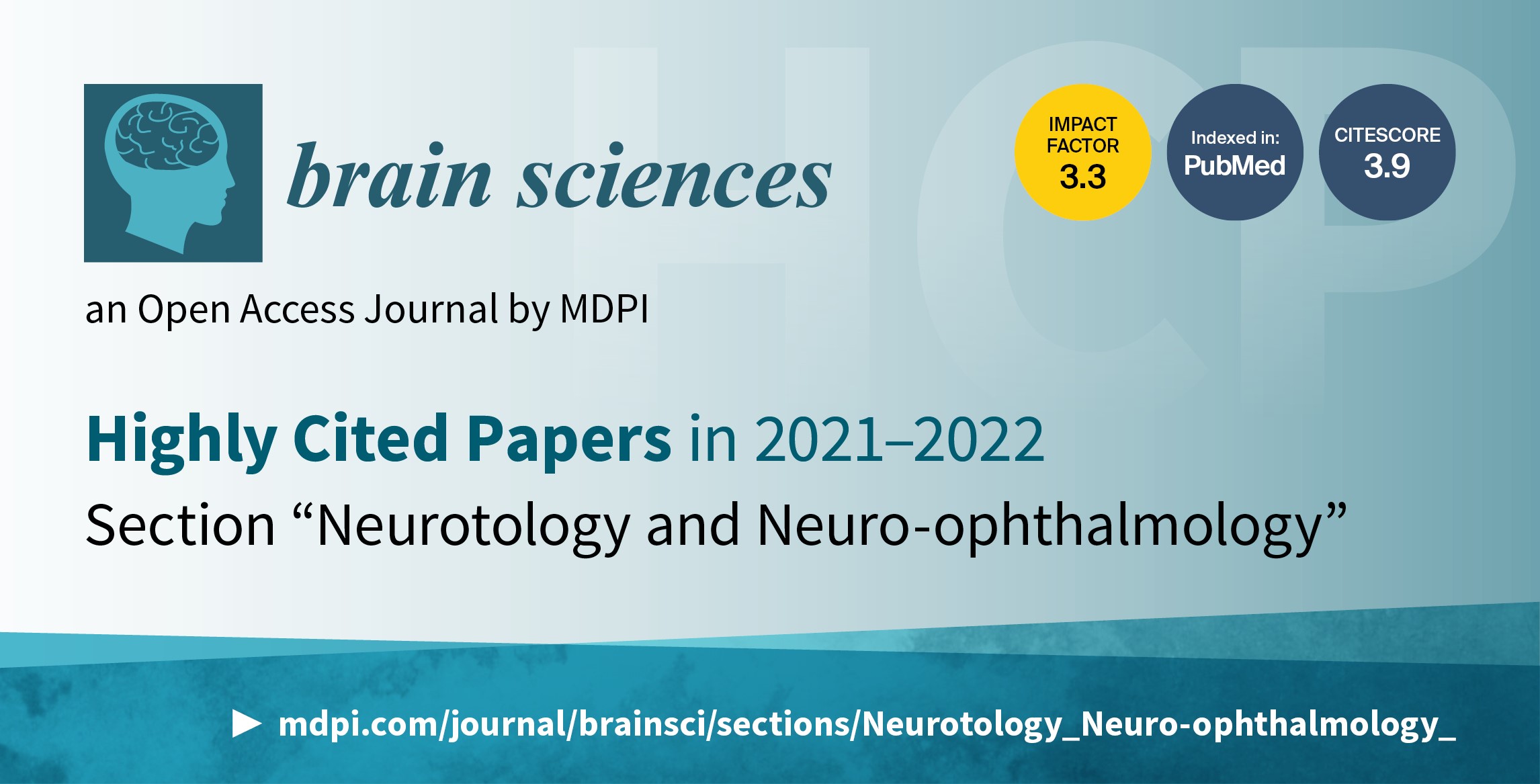
The “Neurotology and Neuro-ophthalmology” Section of Brain Sciences (ISSN: 2076-3425) aims to publish articles on neuro-ophthalmology, neuro-otology, vestibular disorders, vertigo, dizziness, visual system disorders, optic neuritis, optic neuropathy, papilledema, tinnitus and hearing impairment, etc.
As all of the articles published in our journal are in an open access format, meaning you have free and unlimited access to the full text. We welcome you to read our most highly cited papers published in 2021 and 2022 listed below:
1. “The Organ of Vision and the Stomatognathic System—Review of Association Studies and Evidence-Based Discussion”
by Grzegorz Zieliński, Zuzanna Filipiak, Michał Ginszt, Anna Matysik-Woźniak, Robert Rejdak and Piotr Gawda
Brain Sci. 2022, 12(1), 14; https://doi.org/10.3390/brainsci12010014
Available online: https://www.mdpi.com/2076-3425/12/1/14
2. “A Performance-Based Teleintervention for Adults in the Chronic Stage after Acquired Brain Injury: An Exploratory Pilot Randomized Controlled Crossover Study”
by Aviva Beit Yosef, Jeremy Michael Jacobs, Jeffrey Shames, Isabella Schwartz and Yafit Gilboa
Brain Sci. 2022, 12(2), 213; https://doi.org/10.3390/brainsci12020213
Available online: https://www.mdpi.com/2076-3425/12/2/213
3. “Societal Cost of Ischemic Stroke in Romania: Results from a Retrospective County-Level Study”
by Stefan Strilciuc, Diana Alecsandra Grad, Vlad Mixich, Adina Stan, Anca Dana Buzoianu, Cristian Vladescu and Mihaela Adela Vintan
Brain Sci. 2021, 11(6), 689; https://doi.org/10.3390/brainsci11060689
Available online: https://www.mdpi.com/2076-3425/11/6/689
4. “Patient Experience of Flunarizine for Vestibular Migraine: Single Centre Observational Study”
by Sk Mamun Ur Rashid, Sheetal Sumaria, Nehzat Koohi, Qadeer Arshad and Diego Kaski
Brain Sci. 2022, 12(4), 415; https://doi.org/10.3390/brainsci12040415
Available online: https://www.mdpi.com/2076-3425/12/4/415
5. “The Prevalence of Dizziness and Vertigo in COVID-19 Patients: A Systematic Review”
by George Korres, Dimitrios K. Kitsos, Diego Kaski, Anthi Tsogka, Sotirios Giannopoulos, Vasileios Giannopapas, Giorgos Sideris, Giorgos Tyrellis and Konstantine Voumvourakis
Brain Sci. 2022, 12(7), 948; https://doi.org/10.3390/brainsci12070948
Available online: https://www.mdpi.com/2076-3425/12/7/948
6. “Is It Time to Test the Antiseizure Potential of Palmitoylethanolamide in Human Studies? A Systematic Review of Preclinical Evidence”
by Riccardo Bortoletto, Matteo Balestrieri, Sagnik Bhattacharyya and Marco Colizzi
Brain Sci. 2022, 12(1), 101; https://doi.org/10.3390/brainsci12010101
Available online: https://www.mdpi.com/2076-3425/12/1/101
7. “Autoimmune Vestibulopathy—A Case Series”
by Surangi Mendis, Nicola Longley, Simon Morley, George Korres and Diego Kaski
Brain Sci. 2022, 12(3), 306; https://doi.org/10.3390/brainsci12030306
Available online: https://www.mdpi.com/2076-3425/12/3/306
8. “Frequency Fitting Optimization Using Evolutionary Algorithm in Cochlear Implant Users with Bimodal Binaural Hearing”
by Alexis Saadoun, Antoine Schein, Vincent Péan, Pierrick Legrand, Ludwig Serge Aho Glélé and Alexis Bozorg Grayeli
Brain Sci. 2022, 12(2), 253; https://doi.org/10.3390/brainsci12020253
Available online: https://www.mdpi.com/2076-3425/12/2/253
9. “Persistent Postural-Perceptual Dizziness (PPPD) from Brain Imaging to Behaviour and Perception”
by Patricia Castro, Matthew J. Bancroft, Qadeer Arshad and Diego Kaski
Brain Sci. 2022, 12(6), 753; https://doi.org/10.3390/brainsci12060753
Available online: https://www.mdpi.com/2076-3425/12/6/753
10. “Predictive Value of Cough Frequency in Addition to Aspiration Risk for Increased Risk of Pneumonia in Dysphagic Stroke Survivors: A Clinical Pilot Study”
by Anna Maria Pekacka-Egli, Radoslaw Kazmierski, Dietmar Lutz, Stefan Tino Kulnik, Katarzyna Pekacka-Falkowska, Adam Maszczyk, Wolfram Windisch, Tobias Boeselt and Marc Spielmanns
Brain Sci. 2021, 11(7), 847; https://doi.org/10.3390/brainsci11070847
Available online: https://www.mdpi.com/2076-3425/11/7/847
11. “Can Incobotulinumtoxin-A Treatment Improve Quality of Life Better Than Conventional Therapy in Spastic Muscle Post-Stroke Patients? Results from a Pilot Study from a Single Center”
by Adina Turcu-Stiolica, Mihaela-Simona Subtirelu and Ana-Maria Bumbea
Brain Sci. 2021, 11(7), 934; https://doi.org/10.3390/brainsci11070934
Available online: https://www.mdpi.com/2076-3425/11/7/934
12. “Modulated Neuroprotection in Unresponsive Wakefulness Syndrome after Severe Traumatic Brain Injury”
by Cristina Daia, Cristian Scheau, Aura Spinu, Ioana Andone, Cristina Popescu, Corneliu Toader, Ana Maria Bumbea, Madalina Codruta Verenca and Gelu Onose
Brain Sci. 2021, 11(8), 1044; https://doi.org/10.3390/brainsci11081044
Available online: https://www.mdpi.com/2076-3425/11/8/1044
13. “Quality Control after Intracochlear Intralabyrinthine Schwannoma Resection and Cochlear Implantation”
by Holger Sudhoff, Lars Uwe Scholtz, Hans Björn Gehl and Ingo Todt
Brain Sci. 2021, 11(9), 1221; https://doi.org/10.3390/brainsci11091221
Available online: https://www.mdpi.com/2076-3425/11/9/1221
14. “Hearing Rehabilitation with Cochlear Implants after CyberKnife Radiosurgery of Vestibular Schwannoma: A Report Based on Four Clinical Cases”
by Sophia M. Häußler, Agnieszka J. Szczepek, Stefan Gräbel, Carolin Senger, Franziska Löbel, Markus Kufeld and Heidi Olze
Brain Sci. 2021, 11(12), 1646; https://doi.org/10.3390/brainsci11121646
Available online: https://www.mdpi.com/2076-3425/11/12/1646
15. “Comparison of Visual Fixation Trajectories in Toddlers with Autism Spectrum Disorder and Typical Development: A Markov Chain Model”
by Francesco Masedu, Roberto Vagnetti, Maria Chiara Pino, Marco Valenti and Monica Mazza
Brain Sci. 2022, 12(1), 10; https://doi.org/10.3390/brainsci12010010
Available online: https://www.mdpi.com/2076-3425/12/1/10
16. “Olfaction as a Marker for Psychiatric and Neurological Diseases”
by Wissam El-Hage
Brain Sci. 2022, 12(1), 23; https://doi.org/10.3390/brainsci12010023
Available online: https://www.mdpi.com/2076-3425/12/1/23
17. “Increased Threshold and Reduced Firing Rate of Auditory Cortex Neurons after Cochlear Implant Insertion”
by Elie Partouche, Victor Adenis, Dan Gnansia, Pierre Stahl and Jean-Marc Edeline
Brain Sci. 2022, 12(2), 205; https://doi.org/10.3390/brainsci12020205
Available online: https://www.mdpi.com/2076-3425/12/2/205
18. “Functional Reorganization of the Central Auditory System in Children with Single-Sided Deafness: A Protocol Using fNIRS”
by Marie-Noëlle Calmels, Yohan Gallois, Mathieu Marx, Olivier Deguine, Soumia Taoui, Emma Arnaud, Kuzma Strelnikov and Pascal Barone
Brain Sci. 2022, 12(4), 423; https://doi.org/10.3390/brainsci12040423
Available online: https://www.mdpi.com/2076-3425/12/4/423
19. “Hormones and Vestibular Disorders: The Quest for Biomarkers”
by Rhizlane El Khiati, Brahim Tighilet, Stephane Besnard and Christian Chabbert
Brain Sci. 2022, 12(5), 592; https://doi.org/10.3390/brainsci12050592
Available online: https://www.mdpi.com/2076-3425/12/5/592
20. “Development and Evaluation of Automated Tools for Auditory-Brainstem and Middle-Auditory Evoked Potentials Waves Detection and Annotation”
by Ourania Manta, Michail Sarafidis, Nikolaos Vasileiou, Winfried Schlee, Christos Consoulas, Dimitris Kikidis, Evgenia Vassou, George K. Matsopoulos and Dimitrios D. Koutsouris
Brain Sci. 2022, 12(12), 1675; https://doi.org/10.3390/brainsci12121675
Available online: https://www.mdpi.com/2076-3425/12/12/1675
16 August 2023
Brain Sciences | Highly Cited Papers in 2021 in the Section “Neuropsychology”
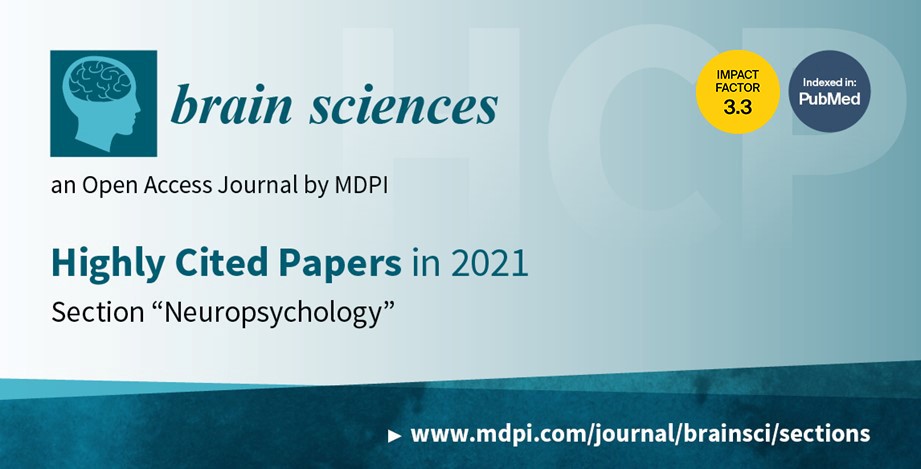
The “Neuropsychology” Section of Brain Sciences (ISSN: 2076-3425) aims to bring together research on the relationship between brain and human cognitive, emotional, and behavioral function. Neuropsychological testing typically evaluates individual functioning in a number of areas, including sensorimotor functions, perception, attention, spatial construction, intelligence, executive functions, memory, language, motivation, emotion and quality of life.
As all of the articles published in our journal are of an open access format, you have free and unlimited access to the full text. We welcome you to read our most highly cited papers published in 2021 listed below:
1. “Prevalence of Anxiety, Depression, and Stress among Teachers during the COVID-19 Pandemic: A Rapid Systematic Review with Meta-Analysis”
by Naiara Ozamiz-Etxebarria, Nahia Idoiaga Mondragon, Juan Bueno-Notivol, María Pérez-Moreno and Javier Santabárbara
Brain Sci. 2021, 11(9), 1172; https://doi.org/10.3390/brainsci11091172
Available online: https://www.mdpi.com/2076-3425/11/9/1172
2. “Emotion-Attention Interaction in the Right Hemisphere”
by Kaisa M. Hartikainen
Brain Sci. 2021, 11(8), 1006; https://doi.org/10.3390/brainsci11081006
Available online: https://www.mdpi.com/2076-3425/11/8/1006
3. “Neuroimaging Correlates of Cognitive Dysfunction in Adults with Multiple Sclerosis”
by Maria Petracca, Giuseppe Pontillo, Marcello Moccia, Antonio Carotenuto, Sirio Cocozza, Roberta Lanzillo, Arturo Brunetti and Vincenzo Brescia Morra
Brain Sci. 2021, 11(3), 346; https://doi.org/10.3390/brainsci11030346
Available online: https://www.mdpi.com/2076-3425/11/3/346
4. “Insights into Dyslexia Genetics Research from the Last Two Decades”
by Florina Erbeli, Marianne Rice and Silvia Paracchini
Brain Sci. 2021, 11(8), 1082; https://doi.org/10.3390/brainsci11081082
Available online: https://www.mdpi.com/2076-3425/11/8/1082
5. “The Neurological Basis of Developmental Dyslexia and Related Disorders: A Reappraisal of the Temporal Hypothesis, Twenty Years on”
by Michel Habib
Brain Sci. 2021, 11(6), 708; https://doi.org/10.3390/brainsci11060708
Available online: https://www.mdpi.com/2076-3425/11/6/708
6. “Neural Correlates of Letter and Semantic Fluency in Primary Progressive Aphasia”
by Marianna Riello, Constantine E. Frangakis, Bronte Ficek, Kimberly T. Webster, John E. Desmond, Andreia V. Faria, Argye E. Hillis and Kyrana Tsapkini
Brain Sci. 2022, 12(1), 1; https://doi.org/10.3390/brainsci12010001
Available online: https://www.mdpi.com/2076-3425/12/1/1
7. “Common Misconceptions about the Phonological Deficit Theory of Dyslexia”
by David L. Share
Brain Sci. 2021, 11(11), 1510; https://doi.org/10.3390/brainsci11111510
Available online: https://www.mdpi.com/2076-3425/11/11/1510
8. “Cognitive Efficiency and Fitness-to-Drive along the Lifespan: The Mediation Effect of Visuospatial Transformations”
by Luigi Tinella, Antonella Lopez, Alessandro Oronzo Caffò, Francesco Nardulli, Ignazio Grattagliano and Andrea Bosco
Brain Sci. 2021, 11(8), 1028; https://doi.org/10.3390/brainsci11081028
Available online: https://www.mdpi.com/2076-3425/11/8/1028
9. “Neural Mechanisms of Prism Adaptation in Healthy Adults and Individuals with Spatial Neglect after Unilateral Stroke: A Review of fMRI Studies”
by Olga Boukrina and Peii Chen
Brain Sci. 2021, 11(11), 1468; https://doi.org/10.3390/brainsci11111468
Available online: https://www.mdpi.com/2076-3425/11/11/1468
10. “Functional Cognitive Disorders (FCD): How Is Metacognition Involved?”
by Andrew J. Larner
Brain Sci. 2021, 11(8), 1082; https://doi.org/10.3390/brainsci11081082
Available online: https://www.mdpi.com/2076-3425/11/8/1082
11. “Anhedonia in Semantic Dementia—Exploring Right Hemispheric Contributions to the Loss of Pleasure”
by Siobhán R. Shaw, Hashim El-Omar, Siddharth Ramanan, Olivier Piguet, Rebekah M. Ahmed, Alexis E. Whitton and Muireann Irish
Brain Sci. 2021, 11(8), 998; https://doi.org/10.3390/brainsci11080998
Available online: https://www.mdpi.com/2076-3425/11/8/998
12. “Brain Abnormalities in Individuals with a Desire for a Healthy Limb Amputation: Somatosensory, Motoric or Both? A Task-Based fMRI Verdict”
by Martina Gandola, Laura Zapparoli, Gianluca Saetta, Carlo Reverberi, Gerardo Salvato, Silvia Amaryllis Claudia Squarza, Paola Invernizzi, Maurizio Sberna, Peter Brugger, Gabriella Bottini et al.
Brain Sci. 2021, 11(9), 1248; https://doi.org/10.3390/brainsci11091248
Available online: https://www.mdpi.com/2076-3425/11/9/1248
13. “The Potential of Naturalistic Eye Movement Tasks in the Diagnosis of Alzheimer’s Disease: A Review”
by Megan Rose Readman, Megan Polden, Melissa Chloe Gibbs, Lettie Wareing and Trevor J. Crawford
Brain Sci. 2021, 11(11), 1503; https://doi.org/10.3390/brainsci11111503
Available online: https://www.mdpi.com/2076-3425/11/11/1503
14. “Cognitive Training with Neurofeedback Using NIRS Improved Cognitive Functions in Young Adults: Evidence from a Randomized Controlled Trial”
by Rui Nouchi, Haruka Nouchi, Jerome Dinet and Ryuta Kawashima
Brain Sci. 2022, 12(1), 5; https://doi.org/10.3390/brainsci12010005
Available online: https://www.mdpi.com/2076-3425/12/1/5#
15. “Differentiating Functional Cognitive Disorder from Early Neurodegeneration: A Clinic-Based Study”
by Harriet A. Ball, Marta Swirski, Margaret Newson, Elizabeth J. Coulthard and Catherine M. Pennington
Brain Sci. 2021, 11(6), 800; https://doi.org/10.3390/brainsci11060800
Available online: https://www.mdpi.com/2076-3425/11/6/800
16. “Dyslexics’ Fragile Oculomotor Control Is Further Destabilized by Increased Text Difficulty”
by Lindsey M. Ward and Zoi Kapoula
Brain Sci. 2021, 11(8), 990; https://doi.org/10.3390/brainsci11080990
Available online: https://www.mdpi.com/2076-3425/11/8/990
17. “Differential Hemispheric Lateralization of Emotions and Related Display Behaviors: Emotion-Type Hypothesis”
by Elliott D. Ross
Brain Sci. 2021, 11(8), 1034; https://doi.org/10.3390/brainsci11081034
Available online: https://www.mdpi.com/2076-3425/11/8/1034
18. “Neuroplasticity within and between Functional Brain Networks in Mental Training Based on Long-Term Meditation”
by Roberto Guidotti, Cosimo Del Gratta, Mauro Gianni Perrucci, Gian Luca Romani and Antonino Raffone
Brain Sci. 2021, 11(8), 1086; https://doi.org/10.3390/brainsci11081086
Available online: https://www.mdpi.com/2076-3425/11/8/1086
19. “Spatial Navigation and Visuospatial Strategies in Typical and Atypical Aging”
by Martina Laczó, Jan M. Wiener, Jana Kalinova, Veronika Matuskova, Martin Vyhnalek, Jakub Hort and Jan Laczó
Brain Sci. 2021, 11(11), 1421; https://doi.org/10.3390/brainsci11111421
Available online: https://www.mdpi.com/2076-3425/11/11/1421#
20. “Gray Matter Morphometry Correlates with Attentional Efficiency in Young-Adult Multiple Sclerosis”
by Sindhuja T. Govindarajan, Ruiqi Pan, Lauren Krupp, Leigh Charvet and Tim Q. Duong
Brain Sci. 2021, 11(1), 80; https://doi.org/10.3390/brainsci11010080
Available online: https://www.mdpi.com/2076-3425/11/1/80
14 August 2023
MDPI’s 2022 Young Investigator Awards in Biology and Life Sciences—Winners Announced
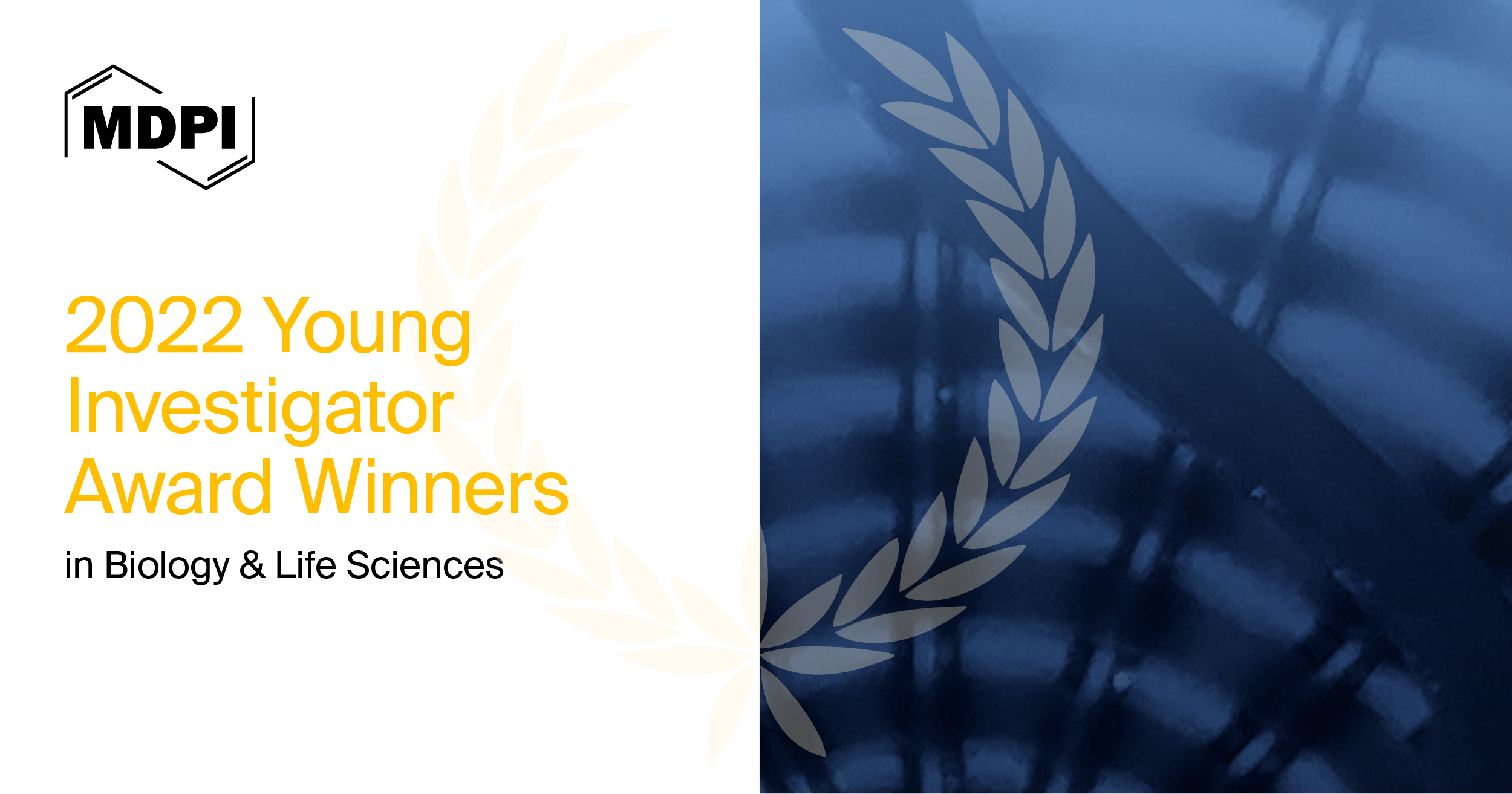
MDPI’s Young Investigator Awards recognize promising junior researchers, acknowledge their contributions, and enhance communication among scientists. We are proud to present the winners for the year 2022 in biology and life sciences. The winners were selected by the journals’ Award Evaluation Committee.
We warmly congratulate the awarded young investigators for their outstanding contributions. MDPI will continue to provide support and recognition to the academic community.
- Thomas Hartinger, University of Veterinary Medicine Vienna, Austria
- Leontina Lipan, Universidad Miguel Hernández, Spain
- Daniel Stec, Polish Academy of Sciences, Poland
- Dibyadeep Datta, Yale Medical School, USA
- Giacomo Valle, ETH Zurich, Switzerland
- Morgan H. James, Rutgers University, USA
- Xiaonan Lu, McGill University, Canada
- Alfredo Iacoangeli, King's College London, UK
- Elisa De Franco, University of Exeter, UK
- Riccardo Pecori, German Cancer Research Center, Germany
- Vanessa Silva, University of Trás-os-Montes and Alto Douro, Portugal
- Massimiliano Renna, University of Bari Aldo Moro at Bari, Italy
- Adam G. Dolezal, University of Illinois Urbana-Champaign, United States
- Carla Rodrigues, Institut Pasteur, France
- Lorena Rodriguez-Rubio, University of Barcelona, Spain
- Kevin Solomon, University of Delaware, USA
- Colleen Deane, University of Southampton, UK
- Paz Otero Fuertes, University of Vigo, Spain
- Marta Giovanetti, National Reference Laboratory of Flavivirus in the Oswaldo Cruz Foundation, Brazil
- Carrie M. Long, National Institute of Allergy and Infectious Diseases (NIAID), USA
- Carina Joe, University of Oxford, UK
About MDPI Awards:
In order to reward the academic community, especially young researchers and enhance communication among scientists, MDPI journals regularly offer various awards to researchers in specific fields. These awards, serving as a source of inspiration and recognition, help raise the influence of talented individuals who have been credited with outstanding achievements and are making a significant contribution to the advancement of their fields.
To explore more MDPI awards, please click here.
14 August 2023
MDPI’s 2022 Travel Awards in Biology and Life Sciences—Winners Announced

We are proud to recognize the winners of MDPI’s 2022 Travel Awards in biology and life sciences for their outstanding presentations.
MDPI journals regularly offer travel awards to encourage junior scientists to present their latest research at academic conferences in specific fields, which helps to increase their influence.
The winners mentioned below were carefully selected by the journal editors based on an outline of their research and the work to be presented at an academic conference.
We would like to warmly congratulate the winners of the 2022 Travel Awards and wish them the greatest success in their future research endeavors. MDPI will continue to enhance communication among scientists.
- Liloia Donato, University of Turin, Italy
- Roberta Bettoni, University of Milano Bicocca, Italy
- Vanessa Silva, University of Trás-os-Montes and Alto Douro, Portugal
- Carlo Matera, University of Milan, Italy
- Elisabetta Coppi, University of Florence, Italy
- Ilaria Tonazzini, Nanoscience Institute—National Research Council (CNR) @ NEST in Pisa, Italy
- Pere Catala, University Eye Clinic Maastricht, Maastricht University Medical Center, the Netherlands
- Angela Blasimann, University of Antwerp, Belgium
- Angelo Sabag, Western Sydney University, Australia
About MDPI Awards:
In order to reward the academic community, especially young researchers and enhance communication among scientists, MDPI journals regularly offer various awards to researchers in specific fields. These awards, serving as a source of inspiration and recognition, help raise the influence of talented individuals who have been credited with outstanding achievements and are making a significant contribution to the advancement of their fields.
To explore more MDPI awards, please click here.
14 August 2023
MDPI’s 2022 Outstanding Reviewer Awards in Biology and Life Sciences—Winners Announced
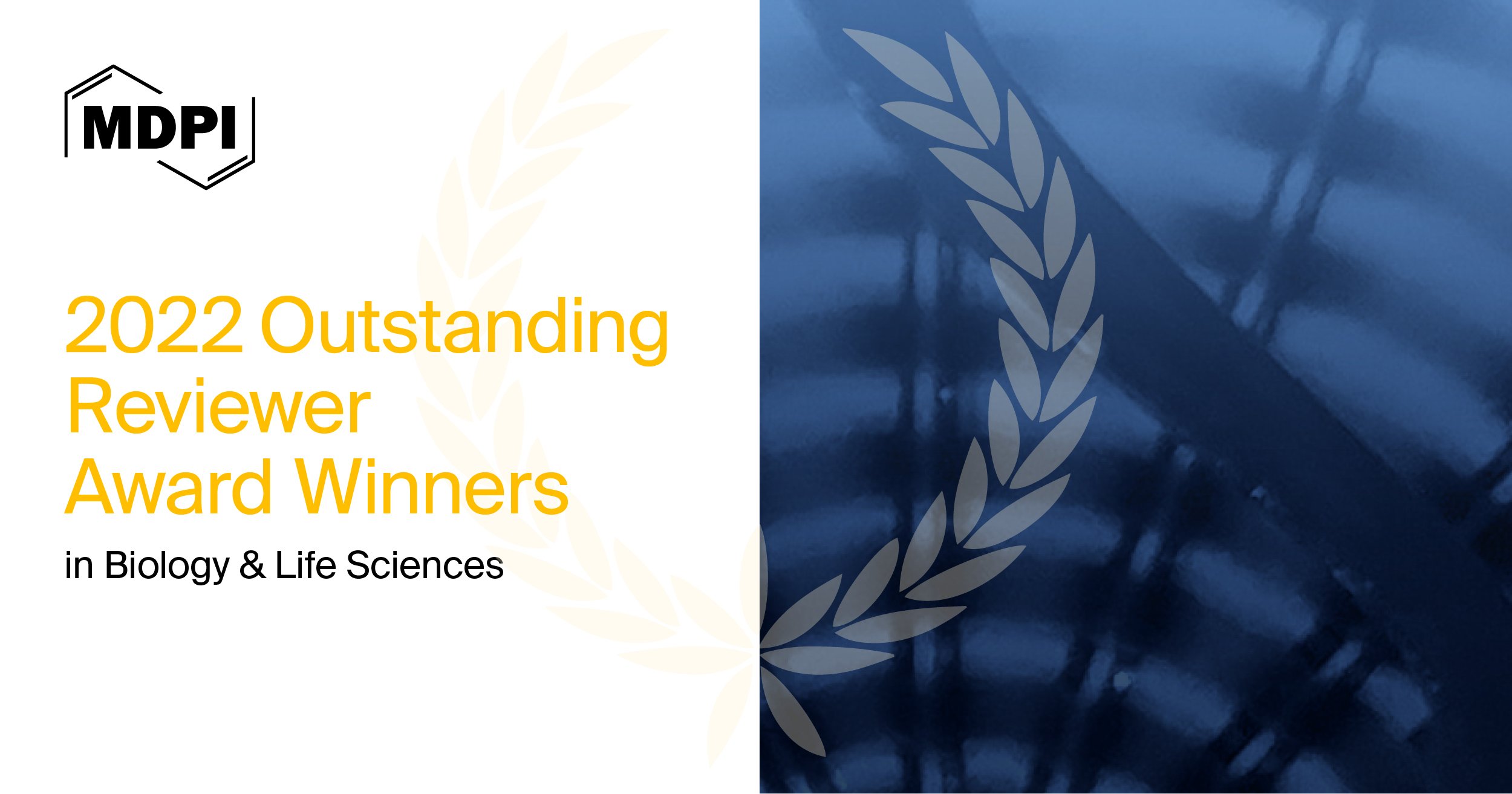
In order to acknowledge our reviewers, who demonstrate diligence, professionalism, and timeliness when generously dedicating their time to reviewing manuscripts, MDPI journals regularly offer outstanding reviewer awards to scholars who participate in the peer review process.
We are proud to recognize the winners for the year 2022 in biology and life sciences for their outstanding contributions, among extensive competition, by presenting them with an Outstanding Reviewer Award.
We would like to take this opportunity to congratulate all of the winners on their achievements. MDPI will continue to provide support and recognition to the academic community.
- Ewa Ropelewska, The National Institute of Horticultural Research, Poland
- Marek Rašovský, Slovak University of Agriculture in Nitra, Slovakia
- Prakash Jha, Kansas State University, USA
- Vasileios Greveniotis, Institute of Industrial and Forage Crops, Greece
- Alberto Collareta, University of Pisa, Italy
- Francisco Curate, University of Coimbra, Portugal
- Gianpiero Greco, University of Study of Bari, Italy
- Luca Poli, University of Study of Bari, Italy
- Shaohua Chen, South China Agricultural University, China
- Chong Chen, Yamaguchi University Graduate School of Medicine, Japan
- Marco Sapienza, University of Catania, Italy
- Sabina Barrios-Fernández, University of Extremadura, Spain
- Corrado Battisti, Torre Flavia LTER (Long Term Ecological Research) Station, Italy
- Daniel Stec, Institute of Systematics and Evolution of Animals of the Polish Academy of Sciences, Poland
- Emilia Grzędzicka, Institute of Systematics and Evolution of Animals of the Polish Academy of Sciences, Poland
- Igor Zelnik, University of Ljubljana, Slovenia
- Eva S. Liu, 1Harvard Medical School, USA 2Brigham and Women’s Hospital, USA
- Aleksandra Szydlowska, Warsaw University of Life Sciences (WULS), Poland
- Mohamed Ali Abdel-Rahman, Al-Azhar University, Egypt
- Andrew G. Jeffs, University of Auckland, New Zealand
- Mohamed Samy-Kamal, Universitat d'Alacant, Spain
- Baskaran Stephen Inbaraj, Fu Jen Catholic University, Taiwan
- Marzena Włodarczyk-Stasiak, University of Life Sciences in Lublin, Poland
- Minaxi Sharma, Haute Ecole Provinciale de Hainaut-Condorcet, Belgium
- Viviani Ruffo de Oliveira, Federal University of Rio Grande do Sul (UFRGS), Brazil
- Federico Manuel Giorgi, University of Bologna, Italy
- Jan Bocianowski, Poznań University of Life Sciences, Poland
- Magdalena Mroczek, Center for Cardiovascular Genetics and Gene Diagnostics, Switzerland
- Keigi Fujiwara, University of Texas MD Anderson Cancer Center, USA
- Tomasz W. Kaminski, University of Pittsburgh, USA
- Takujiro Homma, Yamagata University, Japan
- William Bryan Terzaghi, Wilkes University, United States
- Zong-jie Cui, Beijing Normal University, China
- Abraão Almeida Santos, University of Florida, USA
- Agata Kaczmarek, Polish Academy of Sciences, Poland
- Miguel A. García-Martínez, Universidad Veracruzana, Mexico
- Andrei S. Rodin, Diabetes and Metabolism Research Institute, USA
- Kazuhiko Kotani, Jichi Medical University, Japan
- Jianing Mi, King Abdullah University of Science and Technology, Saudi Arabia
- Nguyen Phuoc Long, Inje University College of Medicine, Republic of Korea
- Xian Luo, University of Alberta, Canada
- Guillaume Fiches, Ohio State University, USA
- Jianxuan Wu, Gilead Sciences, USA
- Tomasz M. Karpiński, Poznań University of Medical Sciences, Poland
- Alicia Ayerdi Gotor, Institut Polytechnique UniLaSalle, France
- Andrea Mastinu, University of Brescia, Italy
- Edyta Paczos-Grzeda, University of Life Sciences in Lublin, Poland
- Narayan Bhusal, Seoul National University, Republic of Korea
- Mohsen Hesami, University of Guelph, Canada
- Christian Müller, University of Greifswald, Germany
- Margarita Fernández-Tejedor, IRTA, Spain
- Christian Napoli, “Sapienza” University of Rome, Italy
- Federico Marchesi, University of Parma, Italy
- Roger E. Thomas, University of Calgary, Canada
- Fun-In Wang, National Taiwan University, Taiwan
- Valeria Grieco, University of Milan, Italy
About MDPI Awards:
In order to reward the academic community, especially young researchers and enhance communication among scientists, MDPI journals regularly offer various awards to researchers in specific fields. These awards, serving as a source of inspiration and recognition, help raise the influence of talented individuals who have been credited with outstanding achievements and are making a significant contribution to the advancement of their fields.
To explore more MDPI awards, please click here.
14 August 2023
MDPI’s 2022 Best PhD Thesis Awards in Biology and Life Sciences—Winners Announced

MDPI’s Best PhD Thesis Awards are presented to recognize the young scholars who are judged to have completed the most outstanding PhD thesis in their field of research and to encourage them to continue their outstanding work and further contributions to their field.
We would like to warmly congratulate the winners of the 2022 Best PhD Thesis Awards and wish them success in their future research endeavors. MDPI will continue to enhance communication among scientists.
- “CYP2D in the Brain Alters Response to Drugs and Neurotoxins”
by Marlaina R. Stocco, University of California, USA - “Neural Encoding of Prior Experience in Sensorimotor Behavior”
by Nicolas Meirhaeghe, Institut de Neurosciences de la Timone, France
- “Perinatal Stem Cell: Epigenetic, Biological and Differentiative Characteristics”
by Giulia Gaggi, University "G.D'Annunzio" of Chieti-Pescara, Italy
- “Uncovering the Genetic Variation Involved in Asthma Exacerbations through Multiple Genomic Approaches”
by Esther Herrera Luis, Universidad de La Laguna, Spain
- “Development of Novel Tools for Monitoring Antimicrobial Resistance in Complex Microbial Communities and Their Application to Improving Our Stewardship of Antimicrobials in Livestock”
by Ashenafi Feyisa Beyi, Iowa State University, United States
About MDPI Awards:
In order to reward the academic community, especially young researchers and enhance communication among scientists, MDPI journals regularly offer various awards to researchers in specific fields. These awards, serving as a source of inspiration and recognition, help raise the of talented individuals who have been credited with outstanding achievements and are making a significant contribution to the advancement of their fields.
To explore more MDPI awards, please click here.
14 August 2023
MDPI’s Best Paper Awards in Biology and Life Sciences—Winners Announced in 2022

The purpose of our Best Paper Awards is to promote and recognize the most impactful contributions published within MDPI journals.
The editors of each journal carefully selected reviews and research papers through a rigorous judging process based on criteria such as scientific merit, overall impact, and the quality of presentation.
We are honored to present the winners for the year 2022 in biology and life sciences, who were selected amongst extensive competition, and congratulate the authors for their outstanding scientific publications. MDPI will continue to provide support and recognition to the academic community.
- “From Smart Farming towards Agriculture 5.0: A Review on Crop Data Management”
by Verónica Saiz-Rubio and Francisco Rovira-Más
Agronomy 2020, 10(2), 207; https://doi.org/10.3390/agronomy10020207
- “Comparison of Biochemical, Anatomical, Morphological, and Physiological Responses to Salinity Stress in Wheat and Barley Genotypes Deferring in Salinity Tolerance”
by Muhammad Zeeshan, Meiqin Lu, Shafaque Sehar, Paul Holford and Feibo Wu
Agronomy 2020, 10(1), 127; https://doi.org/10.3390/agronomy10010127
- “The Use of a Plant-Based Biostimulant Improves Plant Performances and Fruit Quality in Tomato Plants Grown at Elevated Temperatures”
by Silvana Francesca Carmen Arena, Bruno Hay Mele, Carlo Schettini, Patrizia Ambrosino, Amalia Barone and Maria Manuela Rigano
Agronomy 2020, 10(3), https://doi.org/10.3390/agronomy10030363
- “The Management of Agricultural Waste Biomass in the Framework of Circular Economy and Bioeconomy: An Opportunity for Greenhouse Agriculture in Southeast Spain”
by Mónica Duque-Acevedo, Luis J. Belmonte-Ureña, José A. Plaza-Úbeda and Francisco Camacho-Ferre
Agronomy 2020, 10(4), 489; https://doi.org/10.3390/agronomy10040489
- “Apoptotic Bodies: Particular Extracellular Vesicles Involved in Intercellular Communication”
by Michela Battistelli and Elisabetta Falcieri
Biology 2020, 9(1), 21; https://doi.org/10.3390/biology9010021
- “Vegetation and Environmental Changes on Non-Reclaimed Spoil Heaps in Southern Poland”
by Oimahmad Rahmonov, Robert Krzysztofik, Dorota Środek and Justyna Smolarek-Lach
Biology 2020, 9(7), 164; https://doi.org/10.3390/biology9070164
- “Formyl Peptide Receptor 1 Signaling in Acute Inflammation and Neural Differentiation Induced by Traumatic Brain Injury”
by Roberta Fusco, Enrico Gugliandolo, Rosalba Siracusa, Maria Scuto, Marika Cordaro, Ramona D’Amico, Maurizio Evangelista, Angelo Peli, Alessio Filippo Peritore, Daniela Impellizzeri et al.
Biology 2020, 9(9), 238; https://doi.org/10.3390/biology9090238
- “Cholesterol and Alzheimer’s Disease Risk: A Meta-Meta-Analysis”
by Olalla Sáiz-Vazquez, Alicia Puente-Martínez, Silvia Ubillos-Landa, Joaquín Pacheco-Bonrostro and Javier Santabárbara
Brain Sci. 2020, 10(6), 386; https://doi.org/10.3390/brainsci10060386
- “Psychosocial and Behavioral Impact of COVID-19 in Autism Spectrum Disorder: An Online Parent Survey”
by Marco Colizzi, Elena Sironi, Federico Antonini, Marco Luigi Ciceri, Chiara Bovo and Leonardo Zoccante
Brain Sci. 2020, 10(6), 341; https://doi.org/10.3390/brainsci10060341
- “More Than a Functional Group: Diversity within the Legume–Rhizobia Mutualism and Its Relationship with Ecosystem Function”
by Benton N. Taylor, Ellen L. Simms and Kimberly J. Komatsu
Diversity 2020, 12(2), 50; https://doi.org/10.3390/d12020050
- “A Common Approach to the Conservation of Threatened Island Vascular Plants: First Results in the Mediterranean Basin”
by Giuseppe Fenu, Gianluigi Bacchetta, Charalambos S. Christodoulou, Donatella Cogoni, Christini Fournaraki, Giusso del Galdo Gian Pietro, Panagiota Gotsiou, Angelos Kyratzis, Carole Piazza, Magdalena Vicens et al.
Diversity 2020, 12(4), 157; https://doi.org/10.3390/d12040157
- “Plant Diversity Patterns and Conservation Implications under Climate-Change Scenarios in the Mediterranean: The Case of Crete (Aegean, Greece)”
by Konstantinos Kougioumoutzis, Ioannis P. Kokkoris, Maria Panitsa, Panayiotis Trigas, Arne Strid and Panayotis Dimopoulos
Diversity 2020, 12(7), 270; https://doi.org/10.3390/d12070270
- “Conserving the Diversity of Ecological Interactions: The Role of Two Threatened Macaw Species as Legitimate Dispersers of ‘Megafaunal’ Fruits”
by José L. Tella, Fernando Hiraldo, Erica Pacífico, José A. Díaz-Luque, Francisco V. Dénes, Fernanda M. Fontoura, Neiva Guedes and Guillermo Blanco
Diversity 2020, 12(2), 45; https://doi.org/10.3390/d12020045
- “Genomics in Bacterial Taxonomy: Impact on the Genus Pseudomonas”
by Jorge Lalucat, Magdalena Mulet, Margarita Gomila and Elena García-Valdés
Genes 2020, 11(2), 139; https://doi.org/10.3390/genes11020139
- “Histone Deacetylases (HDACs): Evolution, Specificity, Role in Transcriptional Complexes, and Pharmacological Actionability”
by Giorgio Milazzo, Daniele Mercatelli, Giulia Di Muzio, Luca Triboli, Piergiuseppe De Rosa, Giovanni Perini and Federico M. Giorgi
Genes 2020, 11(5), 556; https://doi.org/10.3390/genes11050556
- “COVID-19 and Genetic Variants of Protein Involved in the SARS-CoV-2 Entry into the Host Cells”
by Andrea Latini, Emanuele Agolini, Antonio Novelli, Paola Borgiani, Rosalinda Giannini, Paolo Gravina, Andrea Smarrazzo, Mario Dauri, Massimo Andreoni, Paola Rogliani et al.
Genes 2020, 11(9), 1010; https://doi.org/10.3390/genes11091010
- “Clustered DNA Double-Strand Breaks: Biological Effects and Relevance to Cancer Radiotherapy”
by Jac A. Nickoloff, Neelam Sharma and Lynn Taylor
Genes 2020, 11(1), 99; https://doi.org/10.3390/genes11010099
- “Inhibition of Angiotensin-Converting Enzyme Ameliorates Renal Fibrosis by Mitigating DPP-4 Level and Restoring Antifibrotic MicroRNAs”
by Swayam Prakash Srivastava, Julie E. Goodwin, Keizo Kanasaki and Daisuke Koya
Genes 2020, 11(2), 211; https://doi.org/10.3390/genes11020211
- “Regulation of Ergosterol Biosynthesis in Saccharomyces cerevisiae”
by Tania Jordá and Sergi Puig
Genes 2020, 11(7), 795; https://doi.org/10.3390/genes11070795
- “Laccase Properties, Physiological Functions, and Evolution”
by Grzegorz Janusz, Anna Pawlik, Urszula Świderska-Burek, Jolanta Polak, Justyna Sulej, Anna Jarosz-Wilkołazka and Andrzej Paszczyński
Int. J. Mol. Sci. 2020, 21(3), 966; https://doi.org/10.3390/ijms21030966
- “Lysosomal Exocytosis, Exosome Release and Secretory Autophagy: The Autophagic- and Endo-Lysosomal Systems Go Extracellular”
by Sandra Buratta, Brunella Tancini, Krizia Sagini, Federica Delo, Elisabetta Chiaradia, Lorena Urbanelli and Carla Emiliani
Int. J. Mol. Sci. 2020, 21(7), 2576; https://doi.org/10.3390/ijms21072576
- “Recent Advances in Lipopolysaccharide Recognition Systems”
by Lalita Mazgaeen and Prajwal Gurung
Int. J. Mol. Sci. 2020, 21(2), 379; https://doi.org/10.3390/ijms21020379
- “Redox Interactions of Vitamin C and Iron: Inhibition of the Pro-Oxidant Activity by Deferiprone”
by Viktor A. Timoshnikov, Tatyana V. Kobzeva, Nikolay E. Polyakov and George J. Kontoghiorghes
Int. J. Mol. Sci. 2020, 21(11), 3967; https://doi.org/10.3390/ijms21113967
- “Modulation of Pro-Oxidant and Pro-Inflammatory Activities of M1 Macrophages by the Natural Dipeptide Carnosine”
by Claudia G. Fresta, Annamaria Fidilio, Giacomo Lazzarino, Nicolò Musso, Margherita Grasso, Sara Merlo, Angela M. Amorini, Claudio Bucolo, Barbara Tavazzi, Giuseppe Lazzarino et al.
Int. J. Mol. Sci. 2020, 21(3), 776; https://doi.org/10.3390/ijms21030776
- “SAAMBE-3D: Predicting Effect of Mutations on Protein–Protein Interactions”
by Swagata Pahari, Gen Li, Adithya Krishna Murthy, Siqi Liang, Robert Fragoza, Haiyuan Yu and Emil Alexov
Int. J. Mol. Sci. 2020, 21(7), 2563; https://doi.org/10.3390/ijms21072563
- “Diversity and Global Distribution of Viruses of the Western Honey Bee, Apis mellifera”
by Alexis Beaurepaire, Niels Piot, Vincent Doublet, Karina Antunez, Ewan Campbell, Panuwan Chantawannakul, Nor Chejanovsky, Anna Gajda, Matthew Heerman and Delphine Panziera
Insects 2020, 11(4), 239; https://doi.org/10.3390/insects11040239
- “Soil Health and Arthropods: From Complex System to Worthwhile Investigation”
by Cristina Menta and Sara Remelli
Insects 2020, 11(1), 54; https://doi.org/10.3390/insects11010054
- “Influence of Temperature on Age-Stage, Two-Sex Life Tables for a Minnesota-Acclimated Population of the Brown Marmorated Stink Bug (Halyomorpha halys)”
by Byju N. Govindan and William D. Hutchison
Insects 2020, 11(2), 108; https://doi.org/10.3390/insects11020108
- “Characterization of Resistance in Gram-Negative Urinary Isolates Using Existing and Novel Indicators of Clinical Relevance: A 10-Year Data Analysis”
by Márió Gajdács, Zoltán Bátori, Marianna Ábrók, Andrea Lázár and Katalin Burián
Life 2020, 10(2), 16; https://doi.org/10.3390/life10020016
- “Neuroprotection or Neurotoxicity of Illicit Drugs on Parkinson’s Disease”
by Carla Ferreira, Catarina Almeida, Sandra Tenreiro and Alexandre Quintas
Life 2020, 10(6), 86; https://doi.org/10.3390/life10060086
- “Carbonic Anhydrase Inhibitors Targeting Metabolism and Tumor Microenvironment”
by Andrea Angeli, Fabrizio Carta, Alessio Nocentini, Jean-Yves Winum, Raivis Zalubovskis, Atilla Akdemir, Valentina Onnis, Wagdy M. Eldehna, Clemente Capasso, Giuseppina De Simone et al.
Metabolites 2020, 10(10), 412; https://doi.org/10.3390/metabo10100412
- “MetaboAnalystR 3.0: Toward an Optimized Workflow for Global Metabolomics”
by Zhiqiang Pang, Jasmine Chong, Shuzhao Li and Jianguo Xia
Metabolites 2020, 10(5), 186; https://doi.org/10.3390/metabo10050186
- “Tryptophan Metabolism, Inflammation, and Oxidative Stress in Patients with Neurovascular Disease”
by Martin Hajsl, Alzbeta Hlavackova, Karolina Broulikova, Martin Sramek, Martin Maly, Jan E. Dyr and Jiri Suttnar
Metabolites 2020, 10(5), 208; https://doi.org/10.3390/metabo10050208
- “Production and Purification of Artificial Circular RNA Sponges for Application in Molecular Biology and Medicine”
by Janina Breuer and Oliver Rossbach
Methods Protoc. 2020, 3(2), 42; https://doi.org/10.3390/mps3020042
- “Effectiveness of Chemical Compounds Used against African Swine Fever Virus in Commercial Available Disinfectants”
by Małgorzata Juszkiewicz, Marek Walczak, Natalia Mazur-Panasiuk and Grzegorz Woźniakowski
Pathogens 2020, 9(11), 878; https://doi.org/10.3390/pathogens9110878
- “Betanodavirus and VER Disease: A 30-year Research Review”
by Isabel Bandín and Sandra Souto
Pathogens 2020, 9(2), 106; https://doi.org/10.3390/pathogens9020106
- “The Bradyzoite: A Key Developmental Stage for the Persistence and Pathogenesis of Toxoplasmosis”
by Aude Cerutti, Nicolas Blanchard and Sébastien Besteiro
Pathogens 2020, 9(3), 234; https://doi.org/10.3390/pathogens9030234
- “Understanding Flavivirus Capsid Protein Functions: The Tip of the Iceberg”
by Stephanea Sotcheff and Andrew Routh
Pathogens 2020, 9(1), 42; https://doi.org/10.3390/pathogens9010042
- “Photosynthetic Metabolism under Stressful Growth Conditions as a Bases for Crop Breeding and Yield Improvement”
by Fermín Morales, María Ancín, Dorra Fakhet, Jon González-Torralba, Angie L. Gámez, Amaia Seminario, David Soba, Sinda Ben Mariem, Miguel Garriga and Iker Aranjuelo
Plants 2020, 9(1), 88; https://doi.org/10.3390/plants9010088
- “Plant Roots Release Small Extracellular Vesicles with Antifungal Activity”
by Monica De Palma, Alfredo Ambrosone, Antonietta Leone, Pasquale Del Gaudio, Michelina Ruocco, Lilla Turiák, Ramesh Bokka, Immacolata Fiume, Marina Tucci and Gabriella Pocsfalvi
Plants 2020, 9(12), 1777; https://doi.org/10.3390/plants9121777
- “Feeding Behavior and Virus-transmission Ability of Insect Vectors Exposed to Systemic Insecticides”
by Elisa Garzo, Aránzazu Moreno, María Plaza and Alberto Fereres
Plants 2020, 9(7), 895; https://doi.org/10.3390/plants9070895
- “Transcriptome Analyses and Antioxidant Activity Profiling Reveal the Role of a Lignin-Derived Biostimulant Seed Treatment in Enhancing Heat Stress Tolerance in Soybean”
by Cristina Campobenedetto, Giuseppe Mannino, Chiara Agliassa, Alberto Acquadro, Valeria Contartese, Christian Garabello and Cinzia Margherita Bertea
Plants 2020, 9(10), 1308; https://doi.org/10.3390/plants9101308
- “Aflatoxin Biosynthesis and Genetic Regulation: A Review”
by Isaura Caceres, Anthony Al Khoury, Rhoda El Khoury, Sophie Lorber, Isabelle P. Oswald, André El Khoury, Ali Atoui, Olivier Puel and Jean-Denis Bailly
Toxins 2020, 12(3), 150; https://doi.org/10.3390/toxins12030150
- “Diet Breadth Mediates the Prey Specificity of Venom Potency in Snakes”
by Keith Lyons, Michel M. Dugon and Kevin Healy
Toxins 2020, 12(2), 74; https://doi.org/10.3390/toxins12020074
- “Rapid Quantification of SARS-CoV-2-Neutralizing Antibodies Using Propagation-Defective Vesicular Stomatitis Virus Pseudotypes”
by Ferdinand Zettl, Toni Luise Meister, Tanja Vollmer, Bastian Fischer, Jörg Steinmann, Adalbert Krawczyk, Philip V’kovski, Daniel Todt, Eike Steinmann, Stephanie Pfaender et al.
Vaccines 2020, 8(3), 386; https://doi.org/10.3390/vaccines8030386
- “Influences on Attitudes Regarding Potential COVID-19 Vaccination in the United States”
by Kendall Pogue, Jamie L. Jensen, Carter K. Stancil, Daniel G. Ferguson, Savannah J. Hughes, Emily J. Mello, Ryan Burgess, Bradford K. Berges, Abraham Quaye and Brian D. Poole
Vaccines 2020, 8(4), 582; https://doi.org/10.3390/vaccines8040582
- “Recent Progress on the Versatility of Virus-Like Particles”
by Ciying Qian, Xinlin Liu, Qin Xu, Zhiping Wang, Jie Chen, Tingting Li, Qingbing Zheng, Hai Yu, Ying Gu, Shaowei Li et al.
Vaccines 2020, 8(1), 139; https://doi.org/10.3390/vaccines8010139
- “COVID-19: Mechanisms of Vaccination and Immunity”
by Daniel E. Speiser and Martin F. Bachmann
Vaccines 2020, 8(3), 404; https://doi.org/10.3390/vaccines8030404
- “Manure as a Potential Hotspot for Antibiotic Resistance Dissemination by Horizontal Gene Transfer Events”
by Tiago Lima, Sara Domingues and Gabriela Jorge Da Silva
Vet. Sci. 2020, 7(3), 110; https://doi.org/10.3390/vetsci7030110
- “Seasonality of Nosema ceranae Infections and Their Relationship with Honey Bee Populations, Food Stores, and Survivorship in a North American Region”
by Berna Emsen, Alvaro De la Mora, Brian Lacey, Les Eccles, Paul G. Kelly, Carlos A. Medina-Flores, Tatiana Petukhova, Nuria Morfin and Ernesto Guzman-Novoa
Vet. Sci. 2020, 7(3), 131; https://doi.org/10.3390/vetsci7030131
About MDPI Awards:
In order to reward the academic community, especially young researchers and enhance communication among scientists, MDPI journals regularly offer various awards to researchers in specific fields. These awards, serving as a source of inspiration and recognition, help raise the influence of talented individuals who have been credited with outstanding achievements and are making a significant contribution to the advancement of their fields.
To explore more MDPI awards, please click here.
11 August 2023
Brain Sciences | Highly Cited Papers in 2021–2022 in the Section “Neuro-oncology”
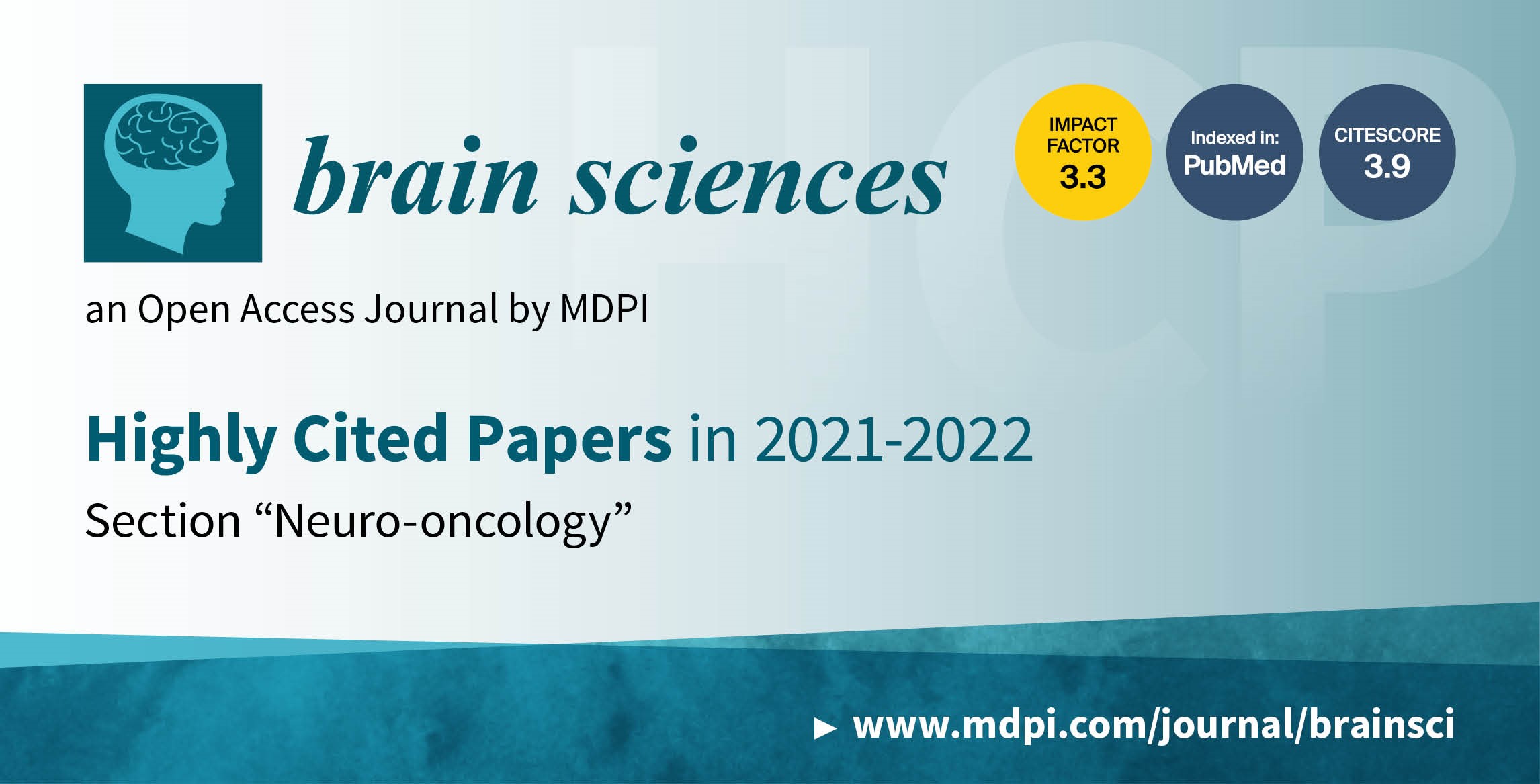
The “Neuro-oncology” Section of Brain Sciences (ISSN: 2076-3425) aims to publish articles on brain tumors, glioblastoma, low-grade glioma, meningioma, schwannoma, tumor angiogenesis, etc.
As all the articles published in our journal are of an open access format, you have free and unlimited access to the full text. We welcome you to read our most highly cited papers published in 2021 and 2022 listed below:
1. “Tumor Microenvironment in Glioma Invasion”
by Sho Tamai, Toshiya Ichinose, Taishi Tsutsui, Shingo Tanaka, Farida Garaeva, Hemragul Sabit and Mitsutoshi Nakada
Brain Sci. 2022, 12(4), 505; https://doi.org/10.3390/brainsci12040505
Available online: https://www.mdpi.com/2076-3425/12/4/505
2. “CT in the Differentiation of Gliomas from Brain Metastases: The Radiomics Analysis of the Peritumoral Zone”
by Lucian Mărginean, Paul Andrei Ștefan, Andrei Lebovici, Iulian Opincariu, Csaba Csutak, Roxana Adelina Lupean, Paul Alexandru Coroian and Bogdan Andrei Suciu
Brain Sci. 2022, 12(1), 109; https://doi.org/10.3390/brainsci12010109
Available online: https://www.mdpi.com/2076-3425/12/1/109
3. “FLAIRectomy: Resecting beyond the Contrast Margin for Glioblastoma”
by Alexander F. Haddad, Jacob S. Young,Ramin A. Morshed and Mitchel S. Berger
Brain Sci. 2022, 12(5), 544; https://doi.org/10.3390/brainsci12050544
Available online: https://www.mdpi.com/2076-3425/12/5/544
4. “The Concept of «Peritumoral Zone» in Diffuse Low-Grade Gliomas: Oncological and Functional Implications for a Connectome-Guided Therapeutic Attitude”
by Melissa Silva, Catalina Vivancos and Hugues Duffau
Brain Sci. 2022, 12(4), 504; https://doi.org/10.3390/brainsci12040504
Available online: https://www.mdpi.com/2076-3425/12/4/504
5. “Fluorescence-Guided Surgery in Glioblastoma: 5-ALA, SF or Both? Differences between Fluorescent Dyes in 99 Consecutive Cases”
by Pietro Zeppa, Raffaele De Marco, Matteo Monticelli, Armando Massara, Andrea Bianconi, Giuseppe Di Perna, Stefania Greco Crasto, Fabio Cofano, Antonio Melcarne, Michele Maria Lanotte et al.
Brain Sci. 2022, 12(5), 555; https://doi.org/10.3390/brainsci12050555
Available online: https://www.mdpi.com/2076-3425/12/5/555
6. “Supramarginal Resection for Glioblastoma: It Is Time to Set Boundaries! A Critical Review on a Hot Topic”
by Francesco Guerrini, Elena Roca and Giannantonio Spena
Brain Sci. 2022, 12(5), 652; https://doi.org/10.3390/brainsci12050652
Available online: https://www.mdpi.com/2076-3425/12/5/652
7. “Evidence of Reelin Signaling in GBM and Its Derived Cancer Stem Cells”
by Filippo Biamonte, Gigliola Sica, Antonio Filippini and Alessio D’Alessio
Brain Sci. 2021, 11(6), 745; https://www.mdpi.com/2076-3425/11/6/745
Available online: https://www.mdpi.com/2076-3425/11/6/745
8. “Oncolytic Virotherapy for Melanoma Brain Metastases, a Potential New Treatment Paradigm?”
by Sauson Soldozy, Kathleen M. Mulligan, David X. Zheng, Melissa A. Levoska, Christopher R. Cullison, Turki Elarjani, Daniel G. Eichberg, Leonel E. Ampie, Ashish H. Shah, Kaan Yağmurlu et al.
Brain Sci. 2021, 11(10), 1260; https://doi.org/10.3390/brainsci11101260
Available online: https://www.mdpi.com/2076-3425/11/10/1260
9. “A Tumor Suppressor Gene, N-myc Downstream-Regulated Gene 1 (NDRG1), in Gliomas and Glioblastomas”
by Yukiko Nakahara, Hiroshi Ito, Hiroki Namikawa, Takashi Furukawa, Fumitaka Yoshioka, Atsushi Ogata, Jun Masuoka and Tatsuya Abe
Brain Sci. 2022, 12(4), 473; https://doi.org/10.3390/brainsci12040473
Available online: https://www.mdpi.com/2076-3425/12/4/473
10. “Infratentorial Stereotactic Biopsy of Brainstem and Cerebellar Lesions”
by Jacek Furtak, Paulina Śledzińska, Marek G. Bebyn, Tadeusz Szylberg, Stanisław Krajewski, Marcin Birski and Marek Harat et al.
Brain Sci. 2021, 11(11), 1432; https://doi.org/10.3390/brainsci11111432
Available online: https://www.mdpi.com/2076-3425/11/11/1432
11. “Immune Landscape in PTEN-Related Glioma Microenvironment: A Bioinformatic Analysis”
by Alice Giotta Lucifero and Sabino Luzzi
Brain Sci. 2022, 12(4), 501; https://doi.org/10.3390/brainsci12040501
Available online: https://www.mdpi.com/2076-3425/12/4/501
12. “Elderly Gliobastoma Patients: The Impact of Surgery and Adjuvant Treatments on Survival: A Single Institution Experience”
by Francesco Bruno, Alessia Pellerino, Edoardo Pronello, Rosa Palmiero, Luca Bertero, Cristina Mantovani, Andrea Bianconi, Antonio Melcarne, Diego Garbossa and Roberta Rudà
Brain Sci. 2022, 12(5), 632; https://doi.org/10.3390/brainsci12050632
Available online: https://www.mdpi.com/2076-3425/12/5/632
13. “Glioma-Associated Microglia Characterization in the Glioblastoma Microenvironment through a ‘Seed-and Soil’ Approach: A Systematic Review”
by Grazia Menna, Pier Paolo Mattogno, Carlo Maria Donzelli, Lucia Lisi, Alessandro Olivi and Giuseppe Maria Della Pepa
Brain Sci. 2022, 12(6), 718; https://doi.org/10.3390/brainsci12060718
Available online: https://www.mdpi.com/2076-3425/12/6/718
14. “Single-Cell RNA Sequencing of Cerebrospinal Fluid as an Advanced Form of Liquid Biopsy for Neurological Disorders”
by Anudeep Yekula, Jovanna Tracz, Jordina Rincon-Torroella, Tej Azad and Chetan Bettegowda
Brain Sci. 2022, 12(7), 812; https://doi.org/10.3390/brainsci12070812
Available online: https://www.mdpi.com/2076-3425/12/7/812
15. “Resting-State Functional Magnetic Resonance Imaging for Surgical Neuro-Oncology Planning: Towards a Standardization in Clinical Settings”
by Gianvincenzo Sparacia, Giuseppe Parla, Giuseppe Mamone, Mariangela Caruso, Fabio Torregrossa and Giovanni Grasso
Brain Sci. 2021, 11(12), 1613; https://doi.org/10.3390/brainsci11121613
Available online: https://www.mdpi.com/2076-3425/11/12/1613
16. “Molecular Mechanisms and Clinical Challenges of Glioma Invasion”
by Tomoya Oishi, Shinichiro Koizumi and Kazuhiko Kurozumi
Brain Sci. 2022, 12(2), 291; https://doi.org/10.3390/brainsci12020291
Available online: https://www.mdpi.com/2076-3425/12/2/291
17. “Relapsing High—Grade Glioma from Peritumoral Zone: Critical Review of Radiotherapy Treatment Options”
by Maria Chiara Lo Greco, Roberto Milazzotto, Rocco Luca Emanuele Liardo, Grazia Acquaviva, Madalina La Rocca, Roberto Altieri, Francesco Certo, Giuseppe Maria Barbagallo, Antonio Basile, Pietro Valerio Foti et al.
Brain Sci. 2022, 12(4), 416; https://doi.org/10.3390/brainsci12040416
Available online: https://www.mdpi.com/2076-3425/12/4/416
18. “Circulating Exosomal-DNA in Glioma Patients: A Quantitative Study and Histopathological Correlations—A Preliminary Study”
by Amedeo Piazza, Paolo Rosa, Luca Ricciardi, Antonella Mangraviti, Luca Pacini, Antonella Calogero, Antonino Raco and Massimo Miscusi
Brain Sci. 2022, 12(4), 500; https://doi.org/10.3390/brainsci12040500
Available online: https://www.mdpi.com/2076-3425/12/4/500
19. “Is Interstitial Chemotherapy with Carmustine (BCNU) Wafers Effective against Local Recurrence of Glioblastoma? A Pharmacokinetic Study by Measurement of BCNU in the Tumor Resection Cavity”
by Takanori Ohnishi, Daisuke Yamashita, Akihiro Inoue, Satoshi Suehiro, Shiro Ohue and Takeharu Kunieda
Brain Sci. 2022, 12(5), 567; https://doi.org/10.3390/brainsci12050567
Available online: https://www.mdpi.com/2076-3425/12/5/567
20. “Brain Tsunamis in Human High-Grade Glioma: Preliminary Observations”
by Kayli Colpitts, Masoom J. Desai, Michael Kogan, C. William Shuttleworth and Andrew P. Carlson
Brain Sci. 2022, 12(6), 710; https://doi.org/10.3390/brainsci12060710
Available online: https://www.mdpi.com/2076-3425/12/6/710
8 August 2023
Brain Sciences | Highly Cited Papers in 2021–2022 in the Section “Neuropharmacology and Neuropathology”

The “Neuropharmacology and Neuropathology” Section of Brain Sciences (ISSN: 2076-3425) aims to publish articles on psychiatry, cognitive neuroscience, behavioral neuroscience, psychostimulants and other addictive drugs.
As all the articles published in our journal are of an open access format, you have free and unlimited access to the full text. We welcome you to read our most highly cited papers published in 2021 and 2022 listed below:
1. “COVID-19 Vaccination and Neurological Manifestations: A Review of Case Reports and Case Series”
by Shitiz Sriwastava, Kanika Sharma, Syed Hassan Khalid, Sakhi Bhansali, Ashish K. Shrestha, Mahmoud Elkhooly, Samiksha Srivastava, Erum Khan, Shruti Jaiswal and Sijin Wen
Brain Sci. 2022, 12(3), 407; https://doi.org/10.3390/brainsci12030407
Available online: https://www.mdpi.com/2076-3425/12/3/407
2. “A Recent Investigation on Detection and Classification of Epileptic Seizure Techniques Using EEG Signal”
by Sani Saminu, Guizhi Xu, Zhang Shuai, Isselmou Abd El Kader, Adamu Halilu Jabire, Yusuf Kola Ahmed, Ibrahim Abdullahi Karaye and Isah Salim Ahmad
Brain Sci. 2021, 11(5), 668; https://doi.org/10.3390/brainsci11050668
Available online: https://www.mdpi.com/2076-3425/11/5/668
3. “Statins Use in Alzheimer Disease: Bane or Boon from Frantic Search and Narrative Review”
by Nawal Alsubaie, Hayder M. Al-kuraishy, Ali I. Al-Gareeb, Bandar Alharbi, Michel De Waard, Jean-Marc Sabatier, Hebatallah M. Saad and Gaber El-Saber Batiha
Brain Sci. 2022, 12(10), 1290; https://doi.org/10.3390/brainsci12101290
Available online: https://www.mdpi.com/2076-3425/12/10/1290
4. “Update on Paraneoplastic Cerebellar Degeneration”
by Philipp Alexander Loehrer, Lara Zieger and Ole J. Simon
Brain Sci. 2021, 11(11), 1414; https://doi.org/10.3390/brainsci11111414
Available online: https://www.mdpi.com/2076-3425/11/11/1414
5. “Peripheral Neuropathies Seen by Ultrasound: A Literature Analysis through Lexical Evaluation, Geographical Assessment and Graph Theory”
by Daniele Coraci, Claudia Loreti, Augusto Fusco, Silvia Giovannini and Luca Padua
Brain Sci. 2021, 11(1), 113; https://doi.org/10.3390/brainsci11010113
Available online: https://www.mdpi.com/2076-3425/11/1/113
6. “Shaken Baby Syndrome: Magnetic Resonance Imaging Features in Abusive Head Trauma”
by Gaia Cartocci, Vittorio Fineschi, Martina Padovano, Matteo Scopetti, Maria Camilla Rossi-Espagnet and Costanza Giannì
Brain Sci. 2021, 11(2), 179; https://doi.org/10.3390/brainsci11020179
Available online: https://www.mdpi.com/2076-3425/11/2/179
7. “Disruptions in Effective Connectivity within and between Default Mode Network and Anterior Forebrain Mesocircuit in Prolonged Disorders of Consciousness”
by Sean Coulborn , Chris Taylor, Lorina Naci, Adrian M. Owen and Davinia Fernández-Espejo
Brain Sci. 2021, 11(6), 749; https://doi.org/10.3390/brainsci11060749
Available online: https://www.mdpi.com/2076-3425/11/6/749
8. “Biomarkers in Neuropsychiatric Systemic Lupus Erythematosus: A Systematic Literature Review of the Last Decade”
by y Julius Lindblom, Chandra Mohan and Ioannis Parodis
Brain Sci. 2022, 12(2), 192; https://doi.org/10.3390/brainsci12020192
Available online: https://www.mdpi.com/2076-3425/12/2/192
9. “Alzheimer’s Disease and Inflammaging”
by Anna Mikhailovna Kosyreva, Alexandra Vladislavovna Sentyabreva, Ivan Sergeevich Tsvetkov and Olga Vasilievna Makarova
Brain Sci. 2022, 12(9), 1237; https://doi.org/10.3390/brainsci12091237
Available online: https://www.mdpi.com/2076-3425/12/9/1237
10. “Mechanisms of Nerve Damage in Neuropathies Associated with Hematological Diseases: Lesson from Nerve Biopsies”
by Chiara Briani, Sergio Ferrari, Marta Campagnolo, Matteo Tagliapietra, Francesca Castellani, Alessandro Salvalaggio, Sara Mariotto, Andrea Visentin and Tiziana Cavallaro
Brain Sci. 2021, 11(2), 132; https://doi.org/10.3390/brainsci11020132
Available online: https://www.mdpi.com/2076-3425/11/2/132
11. “Keeping the Balance: GABAB Receptors in the Developing Brain and Beyond”
by Davide Bassetti
Brain Sci. 2022, 12(4), 419; https://doi.org/10.3390/brainsci12040419
Available online: https://www.mdpi.com/2076-3425/12/4/419
12. “One-Year Demographical and Clinical Indices of Patients with Chronic Disorders of Consciousness”
by Julia Nekrasova, Mikhail Kanarskii, Ilya Borisov, Pranil Pradhan, Denis Shunenkov, Alexey Vorobiev, Maria Smirnova, Vera Pasko, Marina V. Petrova and Elena Luginina
Brain Sci. 2021, 11(5), 651; https://doi.org/10.3390/brainsci11050651
Available online: https://www.mdpi.com/2076-3425/11/5/651
13. “Neuropsychiatric Manifestations of Antiphospholipid Syndrome—A Narrative Review”
by Yik Long Man and Giovanni Sanna
Brain Sci. 2022, 12(1), 91; https://doi.org/10.3390/brainsci12010091
Available online: https://www.mdpi.com/2076-3425/12/1/91
14. “What Accounts for the Factors of Psychopathology? An Investigation of the Neurocognitive Correlates of Internalising, Externalising, and the p-Factor”
by Darren Haywood, Frank D. Baughman, Barbara A. Mullan and Karen R. Heslop
Brain Sci. 2022, 12(4), 421; https://doi.org/10.3390/brainsci12040421
Available online: https://www.mdpi.com/2076-3425/12/4/421
15. “Kappa Free Light Chains in Cerebrospinal Fluid in Inflammatory and Non-Inflammatory Neurological Diseases”
by Franz Felix Konen, Philipp Schwenkenbecher, Konstantin Fritz Jendretzky, Stefan Gingele, Torsten Witte, Kurt-Wolfram Sühs, Matthias Grothe, Malte Johannes Hannich, Marie Süße and Thomas Skripuletz
Brain Sci. 2022, 12(4), 475; https://doi.org/10.3390/brainsci12040475
Available online: https://www.mdpi.com/2076-3425/12/4/475
16. “Inhibitors of Lipoxygenase and Cyclooxygenase-2 Attenuate Trimethyltin-Induced Neurotoxicity through Regulating Oxidative Stress and Pro-Inflammatory Cytokines in Human Neuroblastoma SH-SY5Y Cells”
by Woo-Ju Song, Jang-Hyuk Yun, Myeong-Seon Jeong, Kil-Nam Kim, Taekyun Shin, Hyoung-Chun Kim and Myung-Bok Wie
Brain Sci. 2021, 11(9), 1116; https://doi.org/10.3390/brainsci11091116
Available online: https://www.mdpi.com/2076-3425/11/9/1116
17. “Safety and Efficacy of Eculizumab Therapy in Multiple Sclerosis: A Case Series”
by Marco Allinovi, Angelo Bellinvia, Francesco Pesce, Sabrina Milan Manani, Lorenzo Razzolini, Brigida Brezzi, Paolo Protopapa, Vittorio Mantero, Leonardo Caroti, Calogero Lino Cirami et al.
Brain Sci. 2021, 11(10), 1341; https://doi.org/10.3390/brainsci11101341
Available online: https://www.mdpi.com/2076-3425/11/10/1341
18. “Addressing the Need of a Translational Approach in Peripheral Neuropathy Research: Morphology Meets Function”
by Laura Monza, Giulia Fumagalli, Alessia Chiorazzi and Paola Alberti
Brain Sci. 2021, 11(2), 139; https://doi.org/10.3390/brainsci11020139
Available online: https://www.mdpi.com/2076-3425/11/2/139
19. “The Timecourse of Electrophysiological Brain–Heart Interaction in DoC Patients”
by Francesco Riganello, Martina Vatrano, Simone Carozzo, Miriam Russo, Lucia Francesca Lucca, Maria Ursino, Valentina Ruggiero, Antonio Cerasa and Camillo Porcaro
Brain Sci. 2021, 11(6), 750; https://doi.org/10.3390/brainsci11060750
Available online: https://www.mdpi.com/2076-3425/11/6/750
20. “Effects of Integrated Violence Intervention on Alexithymia, Cognitive, and Neurocognitive Features of Violence in Schizophrenia: A Randomized Controlled Trial”
by Mei-Chi Hsu and Wen-Chen Ouyang
Brain Sci. 2021, 11(7), 837; https://doi.org/10.3390/brainsci11070837
Available online: https://www.mdpi.com/2076-3425/11/7/837
4 August 2023
Brain Sciences | Highly Cited Papers from 2021–2022 in the Section “Neurolinguistics”
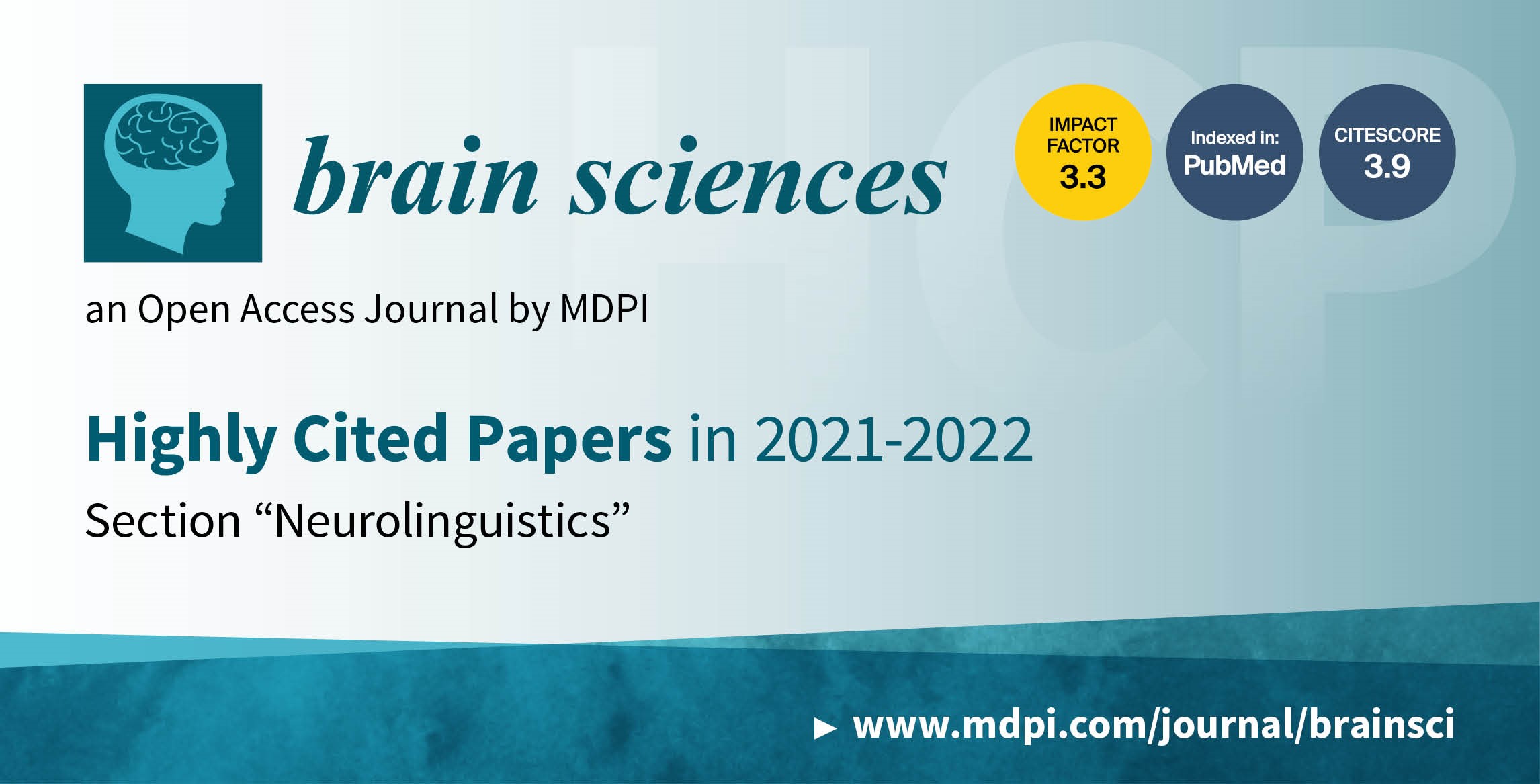
Neurolinguistics is the study of how the brain perceives, processes, and produces language. It is the study of the neural underpinnings and mechanisms that support our ability to perceive, produce, and understand words and sentences and learn our first, second, and subsequent languages, whose damage can result in disorders of speech, language, and reading.
As all the articles published in our journal are of an open access format, you have free and unlimited access to the full texts. We welcome you to read our most highly cited papers published in 2021 and 2022 listed below:
1. “Developmental Language Disorder: Early Predictors, Age for the Diagnosis, and Diagnostic Tools. A Scoping Review”
by Alessandra Sansavini, Maria Elena Favilla, Maria Teresa Guasti, Andrea Marini, Stefania Millepiedi, Maria Valeria Di Martino, Simona Vecchi, Nadia Battajon, Laura Bertolo, Olga Capirci et al.
Brain Sci. 2021, 11(5), 654; https://doi.org/10.3390/brainsci11050654
Available online: https://www.mdpi.com/2076-3425/11/5/654
2. “Efficacy of the Treatment of Developmental Language Disorder: A Systematic Review”
by Sara Rinaldi, Maria Cristina Caselli, Valentina Cofelice, Simonetta D’Amico, Anna Giulia De Cagno, Giuseppina Della Corte, Maria Valeria Di Martino, Brigida Di Costanzo, Maria Chiara Levorato, Roberta Penge et al.
Brain Sci. 2021, 11(3), 407; https://doi.org/10.3390/brainsci11030407
Available online: https://www.mdpi.com/2076-3425/11/3/407
3. “Adjunctive Approaches to Aphasia Rehabilitation: A Review on Efficacy and Safety”
by Chiara Picano, Agnese Quadrini, Francesca Pisano and Paola Marangolo
Brain Sci. 2021, 11(1), 41; https://doi.org/10.3390/brainsci11010041
Available online: https://www.mdpi.com/2076-3425/11/1/41
4. “Development of the Mechanisms Underlying Audiovisual Speech Perception Benefit”
by Kaylah Lalonde and Lynne A. Werner
Brain Sci. 2021, 11(1), 49; https://doi.org/10.3390/brainsci11010049
Available online: https://www.mdpi.com/2076-3425/11/1/49
5. “Creating a Theoretical Framework to Underpin Discourse Assessment and Intervention in Aphasia”
by Lucy Dipper, Jane Marshall, Mary Boyle, Deborah Hersh, Nicola Botting and Madeline Cruice
Brain Sci. 2021, 11(2), 183; https://doi.org/10.3390/brainsci11020183
Available online: https://www.mdpi.com/2076-3425/11/2/183
6. “Main Concept, Sequencing, and Story Grammar Analyses of Cinderella Narratives in a Large Sample of Persons with Aphasia”
by Jessica D. Richardson, Sarah Grace Dalton, Kathryn J. Greenslade, Adam Jacks, Katarina L. Haley and Janet Adams
Brain Sci. 2021, 11(1), 110; https://doi.org/10.3390/brainsci11010110
Available online: https://www.mdpi.com/2076-3425/11/1/110
7. “Exploring Affective Priming Effect of Emotion-Label Words and Emotion-Laden Words: An Event-Related Potential Study”
by Chenggang Wu, Juan Zhang and Zhen Yuan
Brain Sci. 2021, 11(5), 553; https://doi.org/10.3390/brainsci11050553
Available online: https://www.mdpi.com/2076-3425/11/5/553
8. “Effects of tDCS on Sound Duration in Patients with Apraxia of Speech in Primary Progressive Aphasia”
by Charalambos Themistocleous, Kimberly Webster and Kyrana Tsapkini
Brain Sci. 2021, 11(3), 335; https://doi.org/10.3390/brainsci11030335
Available online: https://www.mdpi.com/2076-3425/11/3/335
9. “Predictions about the Cognitive Consequences of Language Switching on Executive Functioning Inspired by the Adaptive Control Hypothesis Fail More Often than Not”
by Kenneth R. Paap, Lauren Mason and Regina Anders-Jefferson
Brain Sci. 2021, 11(9), 1217; https://doi.org/10.3390/brainsci11091217
Available online: https://www.mdpi.com/2076-3425/11/9/1217
10. “Perceptual Connectivity Influences Toddlers’ Attention to Known Objects and Subsequent Label Processing”
by Ryan E. Peters, Justin B. Kueser and Arielle Borovsky
Brain Sci. 2021, 11(2), 163; https://doi.org/10.3390/brainsci11020163
Available online: https://www.mdpi.com/2076-3425/11/2/163
11. “The Role of Audiovisual Speech in Fast-Mapping and Novel Word Retention in Monolingual and Bilingual 24-Month-Olds”
by Drew Weatherhead, Maria M. Arredondo, Loreto Nácar Garcia and Janet F. Werker
Brain Sci. 2021, 11(1), 114; https://doi.org/10.3390/brainsci11010114
Available online: https://www.mdpi.com/2076-3425/11/1/114
12. “A Network Analysis of the Relationship among Reading, Spelling and Maths Skills”
by Pierluigi Zoccolotti, Paola Angelelli, Chiara Valeria Marinelli and Daniele Luigi Romano
Brain Sci. 2021, 11(5), 656; https://doi.org/10.3390/brainsci11050656
Available online: https://www.mdpi.com/2076-3425/11/5/656
13. “Verbal Short-Term Memory Disturbance in the Primary Progressive Aphasias: Challenges and Distinctions in a Clinical Setting”
by David Foxe, Sau Chi Cheung, Nicholas J. Cordato, James R. Burrell, Rebekah M. Ahmed, Cathleen Taylor-Rubin, Muireann Irish and Olivier Piguet
Brain Sci. 2021, 11(8), 1060; https://doi.org/10.3390/brainsci11081060
Available online: https://www.mdpi.com/2076-3425/11/8/1060
14. “Breakdowns in Informativeness of Naturalistic Speech Production in Primary Progressive Aphasia”
by Jeanne Gallée, Claire Cordella, Evelina Fedorenko, Daisy Hochberg, Alexandra Touroutoglou, Megan Quimby and Bradford C. Dickerson
Brain Sci. 2021, 11(2), 130; https://doi.org/10.3390/brainsci11020130
Available online: https://www.mdpi.com/2076-3425/11/2/130
15. “Survival in the Three Common Variants of Primary Progressive Aphasia: A Retrospective Study in a Tertiary Memory Clinic”
by Maud Tastevin, Monica Lavoie, Justine de la Sablonnière, Julie Carrier-Auclair and Robert Laforce, Jr.
Brain Sci. 2021, 11(9), 1113; https://doi.org/10.3390/brainsci11091113
Available online: https://www.mdpi.com/2076-3425/11/9/1113
16. “Is There a Causal Link between the Left Lateralization of Language and Other Brain Asymmetries? A Review of Data Gathered in Patients with Focal Brain Lesions”
by Guido Gainotti
Brain Sci. 2021, 11(9), 1113; https://doi.org/10.3390/brainsci11091113
Available online: https://www.mdpi.com/2076-3425/11/9/1113
17. “Family-Based Whole-Exome Analysis of Specific Language Impairment (SLI) Identifies Rare Variants in BUD13, a Component of the Retention and Splicing (RES) Complex”
by Erin M. Andres, Kathleen Kelsey Earnest, Cuncong Zhong, Mabel L. Rice and Muhammad Hashim Raza
Brain Sci. 2022, 12(1), 47; https://doi.org/10.3390/brainsci12010047
Available online: https://www.mdpi.com/2076-3425/12/1/47
18. “Sentence Recall in Latent and Anomic Aphasia: An Exploratory Study of Semantics and Syntax”
by Christos Salis, Nadine Martin and Laura Reinert
Brain Sci. 2021, 11(2), 230; https://doi.org/10.3390/brainsci11020230
Available online: https://www.mdpi.com/2076-3425/11/2/230
19. “Longitudinal Changes in Cognition, Behaviours, and Functional Abilities in the Three Main Variants of Primary Progressive Aphasia: A Literature Review”
by Justine de la Sablonnière, Maud Tastevin, Monica Lavoie and Robert Laforce, Jr.
Brain Sci. 2021, 11(9), 1209; https://doi.org/10.3390/brainsci11091209
Available online: https://www.mdpi.com/2076-3425/11/9/1209
20. “Hard to Say, Hard to Understand, Hard to Live”: Possible Associations between Neurologic Language Impairments and Suicide Risk”
by Alessandra Costanza, Andrea Amerio, Andrea Aguglia, Luca Magnani, Gianluca Serafini, Mario Amore, Roberto Merli, Julia Ambrosetti, Guido Bondolfi, Lisa Marzano et al.
Brain Sci. 2021, 11(12), 1594; https://doi.org/10.3390/brainsci11121594
Available online: https://www.mdpi.com/2076-3425/11/12/1594
1 August 2023
Brain Sciences | Highly Cited Papers in 2021–2022 in the Section “Systems Neuroscience”
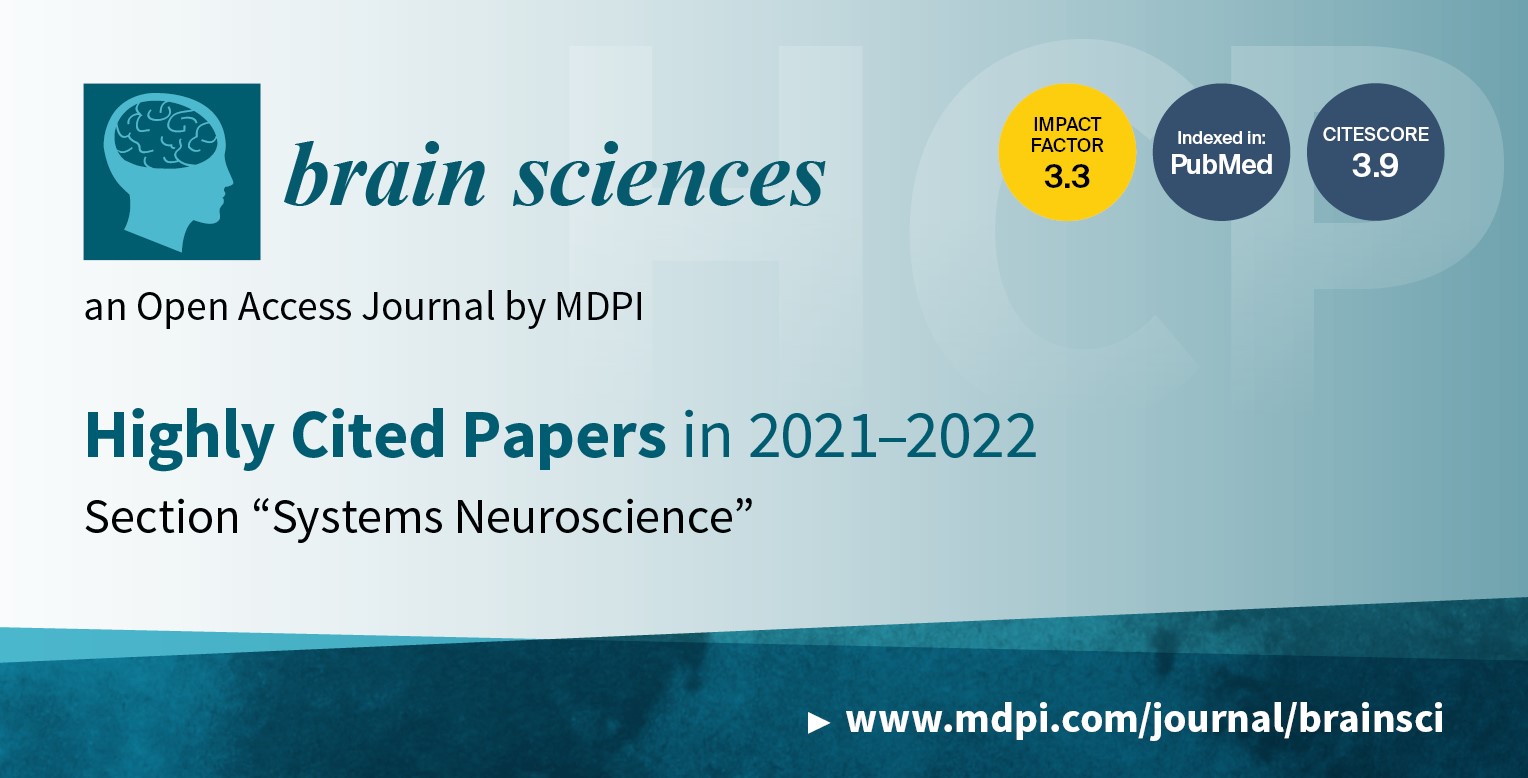
The “Systems Neuroscience” Section of Brain Sciences (ISSN: 2076-3425) is dedicated to the research and exploration of multifactorial and multidimensional processes, such as normal and pathological aspects of sensory and motor functions; the activity of limbic and cognitive systems; and cerebral control of homeostasis, locomotion, reproduction, etc. By building a bridge between various theoretical concepts, basic science research, and clinical medicine applications, this Section provides an in-depth analysis of the intricate workings of the nervous system. The focus of this Section goes beyond isolated aspects of neuroscience research and dedicates itself to a more comprehensive view of neural mechanisms and functionality.
As all of the articles published in our journal are of an open access format, you have free and unlimited access to the full text. We welcome you to read our most highly cited papers published in 2021 and 2022 listed below:
1. “Congenital Disorders of Glycosylation from a Neurological Perspective”
by Justyna Paprocka, Aleksandra Jezela-Stanek, Anna Tylki-Szymańska and Stephanie Grunewald
Brain Sci. 2021, 11(1), 88; https://doi.org/10.3390/brainsci11010088
Available online: https://www.mdpi.com/2076-3425/11/1/88
2. “Oxidative Dysregulation in Early Life Stress and Posttraumatic Stress Disorder: A Comprehensive Review”
by Evangelos Karanikas, Nikolaos P. Daskalakis and Agorastos Agorastos
Brain Sci. 2021, 11(6), 723; https://doi.org/10.3390/brainsci11060723
Available online: https://www.mdpi.com/2076-3425/11/6/723
3. “Obesity and Gray Matter Volume Assessed by Neuroimaging: A Systematic Review”
by Marina Fernández-Andújar, Ester Morales-García and Natalia García-Casares
Brain Sci. 2021, 11(8), 999; https://doi.org/10.3390/brainsci11080999
Available online: https://www.mdpi.com/2076-3425/11/8/999
4. “Use of Super Paramagnetic Iron Oxide Nanoparticles as Drug Carriers in Brain and Ear: State of the Art and Challenges”
by Caroline Guigou, Alain Lalande, Nadine Millot, Karim Belharet and Alexis Bozorg Grayeli
Brain Sci. 2021, 11(3), 358; https://doi.org/10.3390/brainsci11030358
Available online: https://www.mdpi.com/2076-3425/11/3/358
5. “Modulation of Synaptic Plasticity by Vibratory Training in Young and Old Mice”
by Ida Cariati, Roberto Bonanni, Gabriele Pallone, Giuseppe Annino, Virginia Tancredi and Giovanna D’Arcangelo
Brain Sci. 2021, 11(1), 82; https://doi.org/10.3390/brainsci11010082
Available online: https://www.mdpi.com/2076-3425/11/1/82
6. “Influence of Increasing Task Complexity and Use of Informational Assistance Systems on Mental Workload”
by Dominic Bläsing and Manfred Bornewasser
Brain Sci. 2021, 11(1), 102; https://doi.org/10.3390/brainsci11010102
Available online: https://www.mdpi.com/2076-3425/11/1/102
7. “Extremely Low-Frequency Magnetic Field as a Stress Factor—Really Detrimental?—Insight into Literature from the Last Decade”
by Angelika Klimek and Justyna Rogalska
Brain Sci. 2021, 11(2), 174; https://doi.org/10.3390/brainsci11020174
Available online: https://www.mdpi.com/2076-3425/11/2/174
8. “Melatonin: From Neurobiology to Treatment”
by Giovanni Biggio, Francesca Biggio, Giuseppe Talani, Maria Cristina Mostallino, Andrea Aguglia, Eugenio Aguglia and Laura Palagini
Brain Sci. 2021, 11(9), 1121; https://doi.org/10.3390/brainsci11091121
Available online: https://www.mdpi.com/2076-3425/11/9/1121
9. “Deep Brain Stimulation of the Posterior Insula in Chronic Pain: A Theoretical Framework”
by David Bergeron, Sami Obaid, Marie-Pierre Fournier-Gosselin, Alain Bouthillier and Dang Khoa Nguyen
Brain Sci. 2021, 11(5), 639; https://doi.org/10.3390/brainsci11050639
Available online: https://www.mdpi.com/2076-3425/11/5/639
10. “The Self and Its Right Insula—Differential Topography and Dynamic of Right vs. Left Insula”
by Andrea Scalabrini, Angelika Wolman and Georg Northoff
Brain Sci. 2021, 11(10), 1312; https://doi.org/10.3390/brainsci11101312
Available online: https://www.mdpi.com/2076-3425/11/10/1312
11. “Executive Functions in Overweight and Obese Treatment-Seeking Patients: Cross-Sectional Data and Longitudinal Perspectives”
by Marco La Marra, Ines Villano, Ciro Rosario Ilardi, Mario Carosella, Maria Staiano, Alessandro Iavarone, Sergio Chieffi, Giovanni Messina, Rita Polito, Chiara Porro et al.
Brain Sci. 2022, 12(6), 777; https://doi.org/10.3390/brainsci12060777
Available online: https://www.mdpi.com/2076-3425/12/6/777
12. “Dimensions of Tinnitus-Related Distress”
by Petra Brueggemann, Wilhelm Mebus, Benjamin Boecking, Nyamaa Amarjargal, Uli Niemann, Myra Spiliopoulou, Christian Dobel, Matthias Rose and Birgit Mazurek
Brain Sci. 2022, 12(2), 275; https://doi.org/10.3390/brainsci12020275
Available online: https://www.mdpi.com/2076-3425/12/2/275
13. “Neurological Manifestations in a Cohort of Egyptian Patients with COVID-19: A Prospective, Multicenter, Observational Study”
by Doaa A. Mekkawy, Sherif Hamdy, Maged Abdel-Naseer, Hatem S. Shehata, Ahmed Al Halfawy, Nevin M. Shalaby, Ghaydaa A. Shehata, Anwar M. Ali, Alaa Elmazny, Sandra M. Ahmed et al.
Brain Sci. 2022, 12(1), 74; https://doi.org/10.3390/brainsci12010074
Available online: https://www.mdpi.com/2076-3425/12/1/74
14. “Evidence of Neuroplastic Changes after Transcranial Magnetic, Electric, and Deep Brain Stimulation”
by Julius Kricheldorff, Katharina Göke, Maximilian Kiebs, Florian H. Kasten, Christoph S. Herrmann, Karsten Witt and Rene Hurlemann
Brain Sci. 2022, 12(7), 929; https://doi.org/10.3390/brainsci12070929
Available online: https://www.mdpi.com/2076-3425/12/7/929
15. “Effects of Stimulus Frequency, Intensity, and Sex on the Autonomic Response to Transcutaneous Vagus Nerve Stimulation”
by Hirotake Yokota, Mutsuaki Edama, Ryo Hirabayashi, Chie Sekine, Naofumi Otsuru, Kei Saito, Sho Kojima, Shota Miyaguchi and Hideaki Onishi
Brain Sci. 2022, 12(8), 1038; https://doi.org/10.3390/brainsci12081038
Available online: https://www.mdpi.com/2076-3425/12/8/1038
16. “Nonequivalent After-Effects of Alternating Current Stimulation on Motor Cortex Oscillation and Inhibition: Simulation and Experimental Study”
by Makoto Suzuki, Satoshi Tanaka, Jose Gomez-Tames, Takuhiro Okabe, Kilchoon Cho, Naoki Iso and Akimasa Hirata
Brain Sci. 2022, 12(2), 195; https://doi.org/10.3390/brainsci12020195
Available online: https://www.mdpi.com/2076-3425/12/2/195
17. “Efficacy of Sound Therapy for Tinnitus Using an Enriched Acoustic Environment with Hearing-Loss Matched Broadband Noise”
by María Cuesta, Christiam Garzón and Pedro Cobo
Brain Sci. 2022, 12(1), 82; https://doi.org/10.3390/brainsci12010082
Available online: https://www.mdpi.com/2076-3425/12/1/82
18. “Functional Changes in Brain Activity Using Hypnosis: A Systematic Review”
by Thomas Gerhard Wolf, Karin Anna Faerber, Christian Rummel, Ulrike Halsband and Guglielmo Campus
Brain Sci. 2022, 12(1), 108; https://doi.org/10.3390/brainsci12010108
Available online: https://www.mdpi.com/2076-3425/12/1/108
19. “Insular Involvement in Cases of Epilepsy Surgery Failure”
by Jimmy Li, Sandra Reiter-Campeau, Dina Namiranian, Dènahin Hinnoutondji Toffa, Alain Bouthillier, François Dubeau and Dang Khoa Nguyen
Brain Sci. 2022, 12(2), 125; https://doi.org/10.3390/brainsci12020125
Available online: https://www.mdpi.com/2076-3425/12/2/125
20. “Systematic Evaluation of the T30 Neurostimulator Treatment for Tinnitus: A Double-Blind Randomised Placebo-Controlled Trial with Open-Label Extension”
by Deborah Ann Hall, Robert Henryk Pierzycki, Holly Thomas, David Greenberg, Magdalena Sereda and Derek James Hoare
Brain Sci. 2022, 12(3), 317; https://doi.org/10.3390/brainsci12030317
Available online: https://www.mdpi.com/2076-3425/12/3/317
28 July 2023
Brain Sciences | Highly Cited Papers in 2021–2022 in the Section “Behavioral Neuroscience”
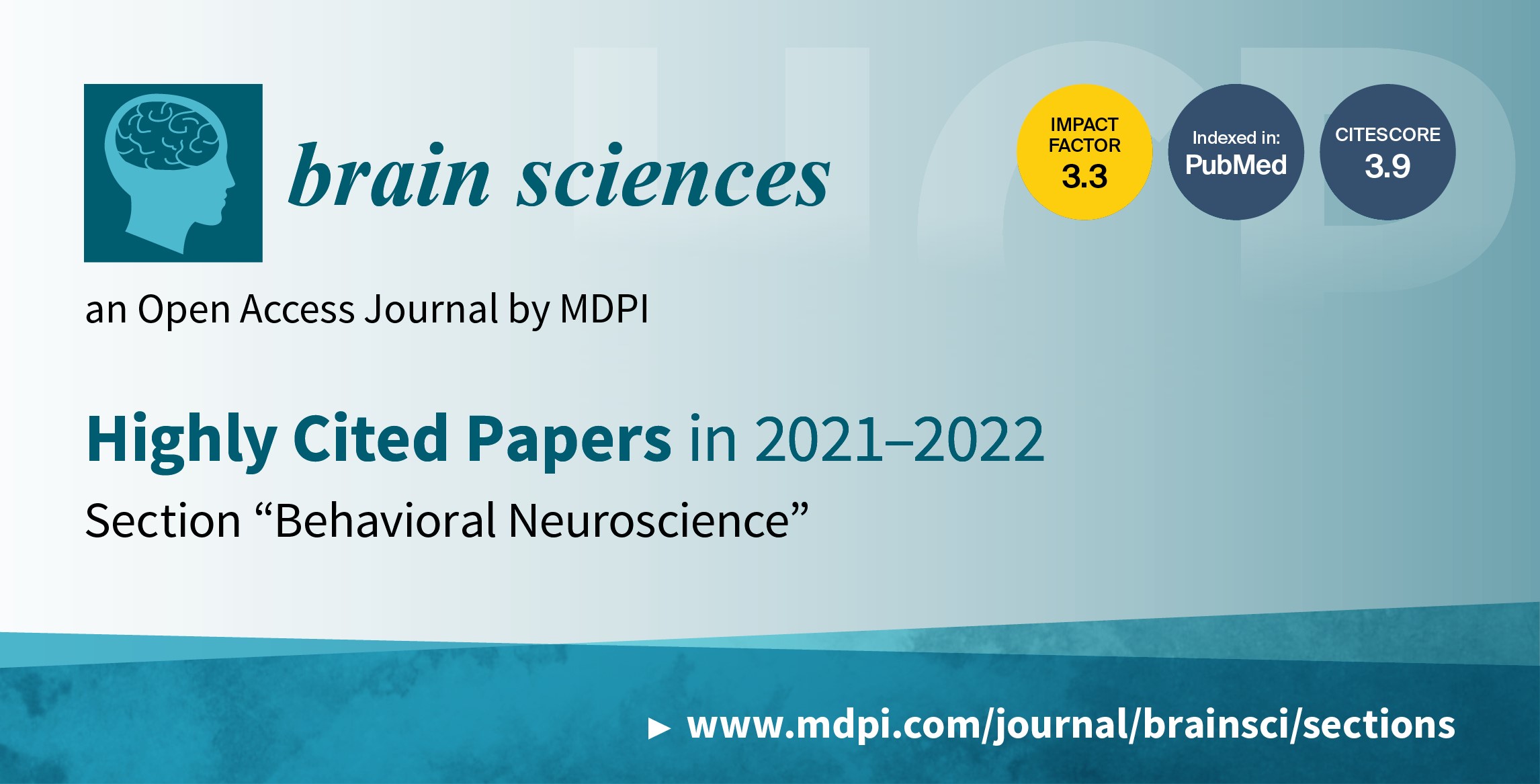
The “Behavioral Neuroscience” Section of the journal Brain Sciences (ISSN: 2076-3425) aims to publish articles on behavioral neurology, neuropsychology, learning and memory, motivation and reward, sensory processes, etc.
As all of the articles published in our journal are open access, you have free and unlimited access to the full text. We welcome you to read our most highly cited papers published in 2021 and 2022 listed below:
1. “Quantitative Evaluation of Task-Induced Neurological Outcome after Stroke”
by Iqram Hussain and Se-Jin Park
Brain Sci. 2021, 11(7), 900; https://doi.org/10.3390/brainsci11070900
Available online: https://www.mdpi.com/2076-3425/11/7/900
2. “The Differential Impact of COVID-19 Lockdown on Sleep Quality, Insomnia, Depression, Stress, and Anxiety among Late Adolescents and Elderly in Italy”
by Giulia Amicucci, Federico Salfi, Aurora D’Atri, Lorenzo Viselli and Michele Ferrara
Brain Sci. 2021, 11(10), 1336; https://doi.org/10.3390/brainsci11101336
Available online: https://www.mdpi.com/2076-3425/11/10/1336
3. “Biological Functions of Rat Ultrasonic Vocalizations, Arousal Mechanisms, and Call Initiation”
by Stefan M. Brudzynski
Brain Sci. 2021, 11(5), 605; https://doi.org/10.3390/brainsci11050605
Available online: https://www.mdpi.com/2076-3425/11/5/605
4. “Theoretical Models of Consciousness: A Scoping Review”
by Davide Sattin, Francesca Giulia Magnani, Laura Bartesaghi, Milena Caputo, Andrea Veronica Fittipaldo, Martina Cacciatore, Mario Picozzi and Matilde Leonardi
Brain Sci. 2021, 11(5), 535; https://doi.org/10.3390/brainsci11050535
Available online: https://www.mdpi.com/2076-3425/11/5/535
5. “Safinamide Improves Non-Motor Symptoms Burden in Parkinson’s Disease: An Open-Label Prospective Study”
by Diego Santos García, Carmen Labandeira Guerra, Rosa Yáñez Baña, Maria Icíar Cimas Hernando, Iria Cabo López, Jose Manuel Paz Gonález, Maria Gemma Alonso Losada, María José González Palmás and Cristina Martínez Miró
Brain Sci. 2021, 11(3), 316; https://doi.org/10.3390/brainsci11030316
Available online: https://www.mdpi.com/2076-3425/11/3/316
6. “Opposing Association of Situational and Chronic Loneliness with Interpersonal Distance”
by Nira Saporta, Dirk Scheele, Jana Lieberz, Fine Stuhr-Wulff, René Hurlemann and Simone G. Shamay-Tsoory
Brain Sci. 2021, 11(9), 1135; https://doi.org/10.3390/brainsci11091135
Available online: https://www.mdpi.com/2076-3425/11/9/1135
7. “Obstructive Sleep Apnea and Cognitive Decline: A Review of Potential Vulnerability and Protective Factors”
by Julie Legault, Cynthia Thompson, Marie-Ève Martineau-Dussault, Claire André, Andrée-Ann Baril, Guillermo Martinez Villar, Julie Carrier and Nadia Gosselin
Brain Sci. 2021, 11(6), 706; https://doi.org/10.3390/brainsci11060706
Available online: https://www.mdpi.com/2076-3425/11/6/706
8. “Design of Fear and Anxiety of COVID-19 Assessment Tool in Spanish Adult Population”
by Juan Gómez-Salgado, Juan Gómez-Salgado, Sara Domínguez-Salas, Sara Domínguez-Salas, Juan Jesús García-Iglesias, Valle Coronado-Vázquez and Carlos Ruiz-Frutos
Brain Sci. 2021, 11(3), 328; https://doi.org/10.3390/brainsci11030328
Available online: https://www.mdpi.com/2076-3425/11/3/328
9. “Insomnia, Anxiety, and Depression Symptoms during the COVID-19 Pandemic May Depend on the Pre-Existent Health Status Rather than the Profession”
by Paweł Wańkowicz, Aleksandra Szylińska and Iwona Rotter
Brain Sci. 2021, 11(8), 1001; https://doi.org/10.3390/brainsci11081001
Available online: https://www.mdpi.com/2076-3425/11/8/1001
10. “From Affordances to Abstract Words: The Flexibility of Sensorimotor Grounding”
by Claudia Mazzuca, Chiara Fini, Arthur Henri Michalland, Ilenia Falcinelli, Federico Da Rold, Luca Tummolini and Anna M. Borghi
Brain Sci. 2021, 11(10), 1304; https://doi.org/10.3390/brainsci11101304
Available online: https://www.mdpi.com/2076-3425/11/10/1304
11. “Verbal Lie Detection: Its Past, Present and Future”
by Aldert Vrij, Pär Anders Granhag, Tzachi Ashkenazi, Giorgio Ganis, Giorgio Ganis and Ronald P. Fisher
Brain Sci. 2022, 12(12), 1644; https://doi.org/10.3390/brainsci12121644
Available online: https://www.mdpi.com/2076-3425/12/12/1644
12. “Non-Invasive Transcutaneous Vagus Nerve Stimulation for the Treatment of Fibromyalgia Symptoms: A Study Protocol”
by Andrés Molero-Chamizo, Michael A. Nitsche, Armin Bolz, Rafael Tomás Andújar Barroso, José R. Alameda Bailén, Jesús Carlos García Palomeque and Guadalupe Nathzidy Rivera-Urbina
Brain Sci. 2022, 12(1), 95; https://doi.org/10.3390/brainsci12010095
Available online: https://www.mdpi.com/2076-3425/12/1/95
13. “Different Language Modalities Yet Similar Cognitive Processes in Arithmetic Fact Retrieval”
by Ilaria Berteletti, Sarah E. Kimbley, Sara Beth J. Sullivan, Lorna C. Quandt and Makoto Miyakoshi
Brain Sci. 2022, 12(2), 145; https://doi.org/10.3390/brainsci12020145
Available online: https://www.mdpi.com/2076-3425/12/2/145
14. “Modulating Behavioural and Self-Reported Aggression with Non-Invasive Brain Stimulation: A Literature Review”
by Ruben Knehans, Ruben Knehans, David Roef, Hans Nelen, Joost à Campo and Jill Lobbestael
Brain Sci. 2022, 12(2), 200; https://doi.org/10.3390/brainsci12020200
Available online: https://www.mdpi.com/2076-3425/12/2/200
15. “Does It Count? Pre-School Children’s Spontaneous Focusing on Numerosity and Their Development of Arithmetical Skills at School”
by Nadine Poltz, Sabine Quandte, Juliane Kohn, Karin Kucian, Anne Wyschkon, Michael von Aster and Günter Esser
Brain Sci. 2022, 12(3), 313; https://doi.org/10.3390/brainsci12030313
Available online: https://www.mdpi.com/2076-3425/12/3/313
16. “Ethical Considerations in Clinical Trials for Disorders of Consciousness”
by Michael J. Young, Yelena G. Bodien and Brian L. Edlow
Brain Sci. 2022, 12(2), 211; https://doi.org/10.3390/brainsci12020211
Available online: https://www.mdpi.com/2076-3425/12/2/211
17. “Olfactory Dysfunction, Headache, and Mental Clouding in Adults with Long-COVID-19: What Is the Link between Cognition and Olfaction? A Cross-Sectional Study”
by Arianna Di Stadio, Pietro De Luca, Maria Albanese, Luca D’Ascanio, Massimo Ralli, Dalila Roccamatisi, Cristina Cingolani, Federica Vitelli, Angelo Camaioni, Stefano Di Girolamo et al.
Brain Sci. 2022, 12(2), 154; https://doi.org/10.3390/brainsci12020154
Available online: https://www.mdpi.com/2076-3425/12/2/154
18. “Binge-like Prenatal Ethanol Exposure Causes Impaired Cellular Differentiation in the Embryonic Forebrain and Synaptic and Behavioral Defects in Adult Mice”
by Shivakumar Subbanna and Balapal S. Basavarajappa
Brain Sci. 2022, 12(6), 793; https://doi.org/10.3390/brainsci12060793
Available online: https://www.mdpi.com/2076-3425/12/6/793
19. “Psychological Impact of Parkinson Disease Delusions on Spouse Caregivers: A Qualitative Study”
by Christopher M. Driskill, Jessica E. Childs, Bemisal Itmer, Jai S. Rajput and Sven Kroener
Brain Sci. 2022, 12(9), 1137; https://doi.org/10.3390/brainsci12091137
Available online: https://www.mdpi.com/2076-3425/12/9/1137
20. “High-Intensity Interval Training-Induced Hippocampal Molecular Changes Associated with Improvement in Anxiety-like Behavior but Not Cognitive Function in Rats with Type 2 Diabetes”
by Amin Orumiyehei, Kayvan Khoramipour, Maryam Hossein Rezaei, Elham Madadizadeh, Manzumeh Shamsi Meymandi, Fatemeh Mohammadi, Mohsen Chamanara, Hamideh Bashiri and Hamideh Bashiri
Brain Sci. 2022, 12(10), 1280; https://doi.org/10.3390/brainsci12101280
Available online: https://www.mdpi.com/2076-3425/12/10/1280
27 July 2023
MDPI Insights: The CEO’s Letter #2 - Open Peer-Review and IJERPH

Welcome to the MDPI Insights: The CEO's Letter.
In these monthly letters, I will showcase two key aspects of our work at MDPI: our commitment to empowering researchers and our determination to facilitating open scientific exchange.
Opening Thoughts

Open Peer Review Reports
Continuing the topic of openness from my inaugural monthly CEO letter, in these Opening Thoughts, I highlight the growth and importance of open peer-review reports at MDPI. Open peer reports align with the principles of open science, making the publishing process more transparent and facilitating rigorous peer review.
MDPI journals operate an open peer-review option by default, allowing authors to publish review reports and author responses (often referred to as open reports) together with the published paper. Publishing the reviewer reports and author responses together with the article provides greater transparency and trust for readers, as this allows them to track the editorial decision-making process. Open peer-review also encourages reviewers and editors to provide high-quality comments, as these will be made public if the article is accepted for publication.
Start and Growth of Open Peer Review at MDPI
The MDPI journal Life was a pioneer in offering this opportunity to its authors in 2014. The first MDPI article with peer-review reports openly published was a review by the Nobel Laureate Werner Arber, in which the review reports were published as supplementary material. By 2018, open peer-review was available across all MDPI journals. As such, MDPI authors have embraced the open peer-review model, providing a steady increase in the number of MDPI articles. As of 2023, approximately one-third (34.0%) of MDPI articles were published with open review reports.
As at July 2023, the percentage of MDPI articles published with open peer review has increased to 36.2% of the total papers published in 2023 so far, indicating ongoing growth in adoption.
Open peer review continues to play a critical role in the assessment of the peer-review process in Life. For further insights, please see the recent editorial by Dr. Pabulo Henrique Rampelotto, the former Editor-in-Chief of Life, who spearheaded the implementation of the open peer-review process.
Benefits of Open Peer Review
The benefits of open peer review include increased transparency, trust and constructive feedback. To promote open communication further and increase the robustness of the peer-review process, we encourage reviewers to sign their reports so that their name appears on the review report (this process is referred to as open identity). The default option is for reviewers to remain anonymous; however, by signing the reports, reviewers receive direct credit for their contribution to the peer-review process and show their commitment towards open science.
As the leading open access publisher, MDPI remains committed to promoting open peer-review and encourages authors to choose this approach. Our goal is to provide a rigorous and transparent peer-review process that benefits the scientific community, and we believe that open peer-review is a vital step in fostering openness and collaboration in scientific communication.
Impactful Research

MDPI Papers Cited in the News – IJERPH edition
Every month, our corporate marketing team compiles data from Altmetrics to create a list of MDPI papers that have been cited in the news. This list continues to grow as renowned news outlets regularly reference research published by MDPI in their articles.
During 2022, a total of 111,965 MDPI research papers were mentioned in prominent news outlets such as National Geographic, The Washington Post, Forbes, The Guardian, the BBC, CNN, Time, and Harvard Business Review.
Highly Cited Journal Publications
IJERPH, known for publishing impactful research, received the most news mentions among all MDPI journals in 2022, based on Altmetrics data:
- International Journal of Environmental Research and Public Health: 3509 mentions
- Nutrients: 2698 mentions
- International Journal of Molecular Sciences: 1701 mentions
- Journal of Clinical Medicine: 1131 mentions
- Viruses: 1111 mentions
These numbers show the recognition and impact of the articles published in IJERPH. For a more detailed view of the journal’s most cited and viewed papers, you can visit here. In total, IJERPH has garnered over 28,000 mentions in prominent news outlets, and as at July 2023, an impressive count of over 17,000 papers cited 10 times or more. These figures highlight the impactful contribution of IJERPH publications to the scientific community.
Example of Recent Mentions
During May and June 2023, a noteworthy selection of articles from IJERPH was cited in news articles, including:
The Washington Post: “Bringing nature inside can improve your health. Here’s how to do it.”
IJERPH paper: “Physiological Benefits of Viewing Nature: A Systematic Review of Indoor Experiments”
Harvard Business Review: “How to Take Better Breaks at Work, According to Research”
IJERPH paper: “Canine-Assisted Therapy Improves Well-Being in Nurses”
National Geographic: “Lyme disease is spreading fast—but a vaccine may be on the way”
IJERPH paper: “Range Expansion of Tick Disease Vectors in North America: Implications for Spread of Tick-Borne Disease”
Inside MDPI

MDPI Develops an Artificial Intelligence Tool to Enhance the Peer-Review Process
At MDPI, we believe that rigorous peer-review is the corner-stone of high-quality academic publishing. We are grateful to the scholars who generously dedicate their time to peer-review articles submitted to MDPI journals. Their contributions are invaluable to the advancement of science.
Peer-review is a critical part of the publication process, ensuring that MDPI upholds the highest quality standards for the papers we publish. Every manuscript submitted to our journals undergoes a comprehensive peer-review process conducted by subject-matter experts.
To further enhance our peer-review process, our Data Analytics team has developed an Artificial Intelligence (AI) tool designed to support the selection of reviewers. This proprietary tool utilizes Natural Language Processing (NLP), a specially designed AI language model, to extract information from the title and abstract of submitted papers. It then searches our database for similar manuscripts and suggests potential reviewers based on this analysis. Integrated with MDPI's submission system (SuSy), the AI tool cross-references the suggested candidates with our reviewer database to verify their invitation status and availability.
The goal of this tool is to provide better targeted peer-review invitations, reducing the number of emails sent for each paper and increasing the efficiency of our editorial staff.
In the near future, our Data Analytics team plans to deploy similar AI projects to improve other critical aspects of our services, offering an enhanced experience to our authors and readers.
Click here to learn about MDPI’s review process, including procedures, responsibilities, and benefits.
Read more:
Coming Together for Science
The Future of IJERPH

On 5 July 2023, Prof. Dr. Paul B. Tchounwou, the founding Editor-in-Chief of IJERPH, along with five Section Editors in Chief (Prof. Dr. Germán Vicente-Rodríguez, Prof. Dr. Karl Goodkin, Prof. Dr. William A. Toscano, Prof. Dr. Jimmy T. Efird, and Prof. Dr. William Douglas Evans), gathered in Basel to discuss the future of the journal. The meeting provided an opportunity to address the recent decision by The Web of Science to delist IJERPH due to the journal failing the Content Relevance criterion, and propose best strategies that will ensure high scientific rigor as well as a clear scope and aim of IJERPH, going forward.
While the delisting is disappointing for IJERPH, as well as for our authors, academic editors, and the entire scientific community supporting our journal, we see it as an opportunity to reflect and prepare for the future direction of the journal.
Since its launch in 2004, IJERPH’s vision and mission have evolved to be more complete and comprehensive in engaging scientific communities. In light of this, we will refresh the journal’s aims and scope, ensuring they align with the organic expansion of IJERPH. Additionally, we will restructure the journal sections into broader categories, encouraging collaborative research and transdisciplinary approaches for authors. This is designed to foster collaboration and knowledge exchange among diverse fields, contributing to a holistic understanding of health promotion and disease prevention. We are confident that these next steps will enhance the scientific strength and societal impact of our journal.

Journal Achievements
In addition to the productive discussions, we took the time to celebrate some of the remarkable achievements of IJERPH, which I highlight below:
- Founded by Prof. Dr. Paul B. Tchounwou in 2004
- Indexed in PubMed in 2008
- Received its first Impact Factor in 2012
- Published its 5000th paper in 2017
- Over 60,000 papers published as at June 30, 2023
- 131,628,173 paper views in 2018–2022
- Over 28,000 mentions in prominent news outlets
- 17,000 papers cited 10 times or more as at June 30, 2023
- No.1 journal in the 2022 Google Scholar Metrics in the category of Public Health
- Awarded several editions of Young Investigator Awards, Travel Awards, and Outstanding Reviewer Awards since 2018.
These achievements showcase the journal’s significant contributions to the field and its impact on global health. We are proud of the exceptional work accomplished by the IJERPH team and look forward to building upon this success in the years to come.
Closing Thoughts
MDPI’s Impact in Spain

During the past month, I had the opportunity to visit our new office building in Barcelona, where I met with our local colleagues to discuss the ways we serve the scholarly community, particularly in Spain. The multi-functional office plays a vital role in supporting various business needs, including editorial, design, conference management, data analytics, journal relationship management, publishing partnerships, and collaborations with societies.
Spain holds a significant position in MDPI’s global market, ranking as the fourth-largest contributor to the total number of papers published by MDPI as at July 2023, ranking next to Italy, the USA, and China, with Germany completing the top five.
The Numbers
Out of the 1,680,000 total MDPI articles published as at 25 July, almost 80,000 articles are contributed by Spanish authors, representing nearly 40,000 unique authors affiliated with Spanish institutions. Remarkably, over 6,300 of these authors hold editorial board member (EBM) positions within MDPI journals, with 30 of them serving as Editors-in-Chief (EiCs).
Our commitment to working with institutions is very evident in Spain, where we have successfully established over 40 Institutional Open Access Programs (IOAP) with esteemed institutions such as the University of Barcelona, the Autonomous University of Barcelona, Pompeu Fabra University, the University of Navarre, and Complutense University of Madrid.
Over the past five years, we have successfully organized eight in-person conferences in Barcelona, attracting over 1,150 registrations, with two forthcoming events scheduled for 2024. Barcelona's excellent connectivity to international airports makes it easily accessible to participants from around the world. Its welcoming atmosphere provides us with the perfect environment for knowledge-sharing, networking, and contributing to the local economy.
Our growth and presence in Spain are a true testament to the incredible service we provide to the scholarly community and the relationships we foster through responsive and collaborative communication. We look forward to continuing to support Spanish scholars, providing them a valuable and trusted experience with MDPI, the leader in open access publishing.
Testimonials
I close this letter as I did in the first edition, by sharing testimonials from our stakeholders. Here are a few IJERPH testimonials from a Spanish guest editor and an author:
Guest Editor
“I want to thank the kindness, attention and professionalism of the MDPI team throughout the editorial process of the Special Issue. I believe that it is a very professional and quality editorial process.”
- Professor Víctor Arufe-Giráldez, University of A Coruña
Special Issue in International Journal of Environmental Research and Public Health: Physical Activity in Childhood and Adolescence
Special Issue in International Journal of Environmental Research and Public Health: Physical Education: Present and Future
__
Author
“I want to thank the rigor of the revisions made to the manuscripts to improve their quality, the support to the authors for the editor assignment system they have and the follow-up they carry out, for the speed in answering and in carrying out the entire process of the revision, and for doing all this at an affordable price.”
- Dr. María Paz García-Caro, University of Granada
Article in International Journal of Environmental Research and Public Health: Factors Associated with Suicide Attempts and Suicides in the General Population of Andalusia (Spain)
Chief Executive Officer
MDPI AG
11 July 2023
MDPI’s Newly Launched Journals in June 2023
With the first issue released in June 2023, five new MDPI journals disseminating multi-disciplinary science are due to launch, which will cover the subjects of medicine & pharmacology, biology and physical sciences.
The newly launched journals will be overseen by professional Editorial Board Members and Editors to ensure an accurate and rapid publication, rigorous peer review and broad visibility.
Please feel free to browse and discover more about the new journals below.
| Journal | Founding Editor-in-Chief | Journal topics (selected) |
| Prof. Dr. Jun Ma, Peking University, China| Editorial | view inaugural issue | growth and development; diet and nutrients; school health promotion policies and practices; child health and care; adolescent health and wellbeing | view journal scope | submit an article |
|
| Prof. Dr. Bernd Rehm, Griffith University, Australia | Editorial | view inaugural issue | DNA and gene synthesis; synthetic transcription factors; protein engineering; viral engineering; metabolic engineering | view journal scope | submit an article | |
| Prof. Dr. Varsha Gandhi, University of Texas MD Anderson Cancer Center, USA | Editorial | view inaugural issue | lymphatics; cancers associated with lymphocytes and lymphoblasts; lymphatic tissues; lymphoma; lymphoid leukemia | view journal scope | submit an article | |
| Dr. Bradley Turner, University of Melbourne, Australia | Editorial | view inaugural issue | multiple sclerosis; amyotrophic lateral sclerosis; primary lateral sclerosis; atherosclerosis; systemic sclerosis | view journal scope | submit an article | |
 |
Prof. Dr. Clemens Burda, Case Western Reserve University, USA | Editorial | view inaugural issue | Gamma ray, X-ray, and UV–Vis spectroscopies; NIR/mid-infrared/Raman spectroscopy; microwave and THz spectroscopy; high-resolution gas-phase atomic, molecular, and cluster spectroscopy; MS, NMR, and EPR spectroscopy | view journal scope | submit an article |
We wish to thank everyone who has supported the development of open access publishing. You are welcome to submit an application to the New Journal Committee (newjournal-committee@mdpi.com) if you would like to create more new journals.
3 July 2023
MDPI Insights: The CEO’s Letter #1 - Open Access and Impactful Research

Welcome to the MDPI Insights: The CEO's Letter.
In these monthly letters, I will showcase two key aspects of our work at MDPI: our commitment to empowering researchers and our determination to facilitating open scientific exchange.
Opening Thoughts
The Future is Open, and MDPI is Leading the Way
I strongly believe in a future that embraces openness, where open source, open information, and open access (OA) take center stage. This belief that led me to join MDPI in 2020, and I am honored to have recently been appointed as Chief Executive Officer (CEO). In this capacity, and operating in close liaison with Dr. Lin and MDPI’s senior management, I shall work to build on Dr. Lin’s achievements of the past quarter-century. In this role, I will focus on communication initiatives to promote MDPI's remarkable work and continue to build our company as a trusted leader in OA publishing. For over two decades, MDPI has been at the forefront of reshaping the academic publishing landscape, with OA surpassing subscription-based publishing in 2020. This trajectory is deeply rooted in our history and reflects our unwavering commitment and vision for an open future.
1 Million Published Articles
2023 began with a remarkable achievement for MDPI, as we became the first OA publisher to reach the milestone of 1 million published articles. This represents 2.7 million unique authors who have trusted us with their work, or about a third of all researchers worldwide. As the world's most cited OA publisher, we are proud in sharing these significant milestones.
Our mission remains unchanged: to make science open and accessible to all. We understand the importance of knowledge access, empowering researchers to stay at the forefront of a rapidly changing world. Our diverse range of journals covers a wide spectrum of disciplines, offering cutting-edge insights, trusted tools, and crucial knowledge to address global challenges.
Liberating Science
As the world’s leading OA publisher, MDPI is actively liberating science. We are committed to eliminating the frustrations researchers and the general public face when accessing information, ensuring it is not locked behind paywalls. We firmly believe that everyone has a right to information, and our commitment to open access publishing drives our work.
In this inaugural edition of Insights: The CEO's Letter, I draw inspiration from the upcoming 20th anniversary of the Berlin Declaration on Open Access. Its stated mission reminds us that true impact is achieved when knowledge is widely and readily available to society:
"Our mission of disseminating knowledge is only half complete if the information is not made widely and readily available to society”
Impactful Research

MDPI Publishes Impactful Research: Recognized by Leading Indexing Databases
MDPI journals are indexed in every single top database in the world.
As of June 2023, we have 214 journals indexed within Web of Science, 223 indexed within Scopus, 87 indexed within PubMed and PMC, and 17 indexed within MEDLINE, and these numbers increase every month. We constantly strive to expand the coverage of our journals within leading multi-disciplinary and scope-specific databases, resulting in an incredibly broad range of journals that are indexed within a variety of databases. MDPI has active relationships with approximately 65 well-known databases around the world, and we continue to expand our portfolio every year so that your work can be found, cited, and referenced with ease.
Continued Growth of MDPI Journals
The 2022 Scopus and Web of Science journal citation metrics were officially released in June, and I am pleased to report that 31 MDPI journals received their first CiteScore, taking the total number of journals with a CiteScore to 216. The number of MDPI journals receiving an Impact Factor (IF) also continues to grow with 111 receiving their first, by being covered in the ESCI, bringing our total number of journals with an IF to 208 of which 41 journals received an IF above 4.0. Looking at 2022 CiteScores in the Scopus database, 80% of MDPI journals have a score that ranks them in Q1 or Q2 in at least one subject category.
Publishing impactful science would not be possible without all of our authors, editors and reviewers. Thank you for your contribution and continued support! Together we share the latest scientific insights faster and ensure that your work is accessible to all.
Read more
Inside MDPI

Preprints.org: Clarivate adds the Preprint Citation Index to the Web of Science
At MDPI, we are dedicated to driving the advancement of science. Through our initiative, Preprints.org, researchers can publish their work and gain valuable feedback from the broader research community, ensuring rapid progress in their respective fields. This is particularly crucial during times of health and climate challenges, where timely dissemination of findings is essential.
Increased Visibility for Preprints
I am pleased to share that Clarivate recognizes the significance of preprints and has taken a crucial step to enhance their visibility. Clarivate has added the Preprint Citation Index to the Web of Science, encompassing preprints published not only on Preprints.org but also on other reputable repositories.
Looking ahead, the future of preprints appears promising, bolstered by the recent indexing announcement from the Web of Science. As a result, preprints will receive increased visibility, serving as a valuable resource for staying informed about the latest research developments.
Read more
What are Preprints?
The Pros and Cons of Preprints
Preprints and COVID-19
Preprints—The Future of Open Access Publishing?
Coming Together for Science

The First International Conference on Antioxidants: Sources, Methods, Health Benefits and Industrial Applications
In this edition of ‘Coming Together for Science,’ I am pleased to highlight the First International Conference on Antioxidants organized by our conference team in the beautiful city of Barcelona, Spain. The conference attracted over 130 attendees, who engaged in 42 talks, and 89 poster presentations spread across several sessions.
Working Together
Under the leadership of Prof. Dr. Alessandra Napolitano (Department of Chemical Sciences, University of Naples ‘Federico II’, Naples, Italy) and Prof. Dr. Rosa M. Lamuela Raventos (Department of Nutrition, Food Sciences and Gastronomy, University of Barcelona, Spain) as chairs, and supported by the committee members, 10 invited keynote speakers, poster presenters, and all the attendees, this dedicated group of academics came together to discuss the natural sources, methodologies, health benefits, and industrial applications of antioxidants.
Especially noteworthy is the positive feedback received from attendees, with 94% rating the overall organization of the conference as good or excellent. I particularly love the picture above, capturing the gathering of some of the participants. You can browse through more photos in the event gallery located here.
Managing Events With Sciforum
If you are considering hosting your own academic event, I highly recommend checking out Sciforum, MDPI's event management platform. Sciforum simplifies the entire process, making it easy to host your own event by allowing you to focus on what really matters: Science!
Read more
Closing Thoughts
 Stefan Tochev, Dr. Shu-Kun Lin, Dr. Eric O. Freed, Peter Roth, Wynne Wang, Allison Yang
Stefan Tochev, Dr. Shu-Kun Lin, Dr. Eric O. Freed, Peter Roth, Wynne Wang, Allison Yang
Viruses and Editorial Quality: Acknowledging the Dedication of our Viruses Journal Team
During a June meeting with Dr. Eric O. Freed, the founding and current Editor-in-Chief of our journal Viruses, I was reminded of the exceptional dedication of our editorial board. Meeting with Eric is a pleasure, as he has a strong commitment and clear vision for the journal. Over the course of two days, we gained a deep understanding of the journal’s expectations and focus on strategic growth, editorial board representation, and engagement.
I am pleased to share that Viruses holds a CiteScore of 7.1 (an increase of 7.57% versus the 2021 metric) and an Impact Factor of 4.7. You can view the journal statistics here. Viruses publishes highly cited papers, and is indexed in renowned databases such as Scopus, SCIE (Web of Science), PubMed, and others, and maintains affiliations with prestigious societies. Moreover, the Viruses team has recently announced an exciting upcoming event titled ‘Viruses 2024 – A World of Viruses,’ scheduled to take place in Barcelona, Spain, from 14–16 February 2024.
Testimonials
If you notice my enthusiasm regarding our editorial service, it’s because the surveys and testimonials we receive speak volumes about the experiences of our authors, reviewers, and guest editors who collaborate with MDPI. The purpose of these letters is to highlight the exceptional work that we do and the experiences we create for the scholars – thus, let me end with this testimonial from an author:
“It was a great pleasure to publish in Viruses Special Issue [Emerging Viruses in Aquaculture]. The submission process was easy. Guest editors were very helpful and provided all the guidance and support as needed. The handling of the manuscript by the Editorial Team was very fast, efficient, and professional. The reviewer’s comments were insightful, and the publication processes were remarkably rapid.”
– Ms. Magdalena Stachnik, Państwowy Instytut Weterynaryjny | PIWet
Article in Viruses: Emerging Viral Pathogens in Sturgeon Aquaculture in Poland: Focus on Herpesviruses and Mimivirus Detection
Chief Executive Officer
MDPI AG
28 June 2023
2022 Impact Factors for MDPI Journals
The 2022 citation metrics have been released in the Journal Citation Reports (JCR), and we’re pleased to announce the following results for MDPI journals:

We are thrilled to announce that 90% of our ranked MDPI journals, specifically 86 out of 96 (captured in the table below), are performing above average in Q1 or Q2. This year, Clarivate has expanded its Impact Factor (IF) awards to include journals in the Emerging Sources Citation Index (ESCI) and the Arts and Humanities Citation Index (AHCI), providing greater transparency for the full set of journals indexed in the Web of Science Core Collection. As a result, 111 of MDPI journals have received their first IF in 2023, with 37 journals surpassing an IF of 3.0. In total, 208 MDPI journals have been honored with an IF.
Clarivate explains that by "expanding the coverage but holding to highly selective standards, the [Impact Factor] is now a reliable indicator of trustworthiness, as well as a measure of scholarly impact, at the journal level."
Please visit our blog post where we discuss the release of the latest citation metrics with our Indexing Manager, Dr. Constanze Schelhorn, to find out what's different this time around and how to make use of different metrics available.
| Journal | Impact Factor | Rank Quartile | Category |
| Vaccines | 7.8 | Q1 | Immunology |
| Medicine, Research & Experimental | |||
| Antioxidants | 7.0 | Q1 | Food Science & Technology |
| Biochemistry & Molecular Biology | |||
| Chemistry, Medicinal | |||
| Cells | 6.0 | Q2 | Cell Biology |
| Nutrients | 5.9 | Q1 | Nutrition & Dietetics |
| International Journal of Molecular Sciences | 5.6 | Q1 | Biochemistry & Molecular Biology |
| Q2 | Chemistry, Multidisciplinary | ||
| Journal of Theoretical and Applied Electronic Commerce Research | 5.6 | Q2 | Business |
| Biomolecules | 5.5 | Q1 | Biochemistry & Molecular Biology |
| Biosensors | 5.4 | Q1 | Chemistry, Analytical |
| Instruments & Instrumentation | |||
| Q2 | Nanoscience & Nanotechnology | ||
| Fractal and Fractional | 5.4 | Q1 | Mathematics, Interdisciplinary Applications |
| Marine Drugs | 5.4 | Q1 | Chemistry, Medicinal |
| Pharmacology & Pharmacy | |||
| Pharmaceutics | 5.4 | Q1 | Pharmacology & Pharmacy |
| Nanomaterials | 5.3 | Q1 | Physics, Applied |
| Q2 | Chemistry, Multidisciplinary | ||
| Materials Science, Multidisciplinary | |||
| Nanoscience & Nanotechnology | |||
| Cancers | 5.2 | Q2 | Oncology |
| Foods | 5.2 | Q1 | Food Science & Technology |
| Polymers | 5.0 | Q1 | Polymer Science |
| Remote Sensing | 5.0 | Q1 | Geosciences, Multidisciplinary |
| Q2 | Remote Sensing | ||
| Imaging Science & Photographic Technology | |||
| Environmental Sciences | |||
| Antibiotics | 4.8 | Q1 | Pharmacology & Pharmacy |
| Q2 | Infectious Diseases | ||
| Drones | 4.8 | Q2 | Remote Sensing |
| Journal of Functional Biomaterials | 4.8 | Q2 | Engineering, Biomedical |
| Materials Science, Biomaterials | |||
| Biomedicines | 4.7 | Q1 | Pharmacology & Pharmacy |
| Q2 | Biochemistry & Molecular Biology | ||
| Medicine, Research & Experimental | |||
| Journal of Fungi | 4.7 | Q2 | Mycology |
| Microbiology | |||
| Viruses | 4.7 | Q2 | Virology |
| Bioengineering | 4.6 | Q2 | Engineering, Biomedical |
| Gels | 4.6 | Q1 | Polymer Science |
| Molecules | 4.6 | Q2 | Chemistry, Multidisciplinary |
| Biochemistry & Molecular Biology | |||
| Pharmaceuticals | 4.6 | Q2 | Pharmacology & Pharmacy |
| Chemistry, Medicinal | |||
| Toxics | 4.6 | Q1 | Toxicology |
| Q2 | Environmental Sciences | ||
| Biomimetics | 4.5 | Q1 | Engineering, Multidisciplinary |
| Q2 | Materials Science, Biomaterials | ||
| Microorganisms | 4.5 | Q2 | Microbiology |
| Plants | 4.5 | Q1 | Plant Sciences |
| Biology | 4.2 | Q2 | Biology |
| Chemosensors | 4.2 | Q2 | Instruments & Instrumentation |
| Chemistry, Analytical | |||
| Electrochemistry | |||
| Membranes | 4.2 | Q2 | Engineering, Chemical |
| Materials Science, Multidisciplinary | |||
| Chemistry, Physical | |||
| Polymer Science | |||
| Toxins | 4.2 | Q1 | Toxicology |
| Q2 | Food Science & Technology | ||
| Metabolites | 4.2 | Q2 | Biochemistry & Molecular Biology |
| Batteries | 4.0 | Q2 | Electrochemistry |
| Materials Science, Multidisciplinary | |||
| Q3 | Energy & Fuels | ||
| Catalysts | 3.9 | Q2 | Chemistry, Physical |
| Journal of Clinical Medicine | 3.9 | Q2 | Medicine, General & Internal |
| Land | 3.9 | Q2 | Environmental Studies |
| Sensors | 3.9 | Q2 | Instruments & Instrumentation |
| Chemistry, Analytical | |||
| Engineering, Electrical & Electronic | |||
| Sustainability | 3.9 | Q2 | Environmental Sciences (SCIE) |
| Environmental Studies (SSCI) | |||
| Q3 | Green & Sustainable Science & Technology (SCIE) | ||
| Green & Sustainable Science & Technology (SSCI) | |||
| Buildings | 3.8 | Q2 | Construction & Building Technology |
| Engineering, Civil | |||
| Agronomy | 3.7 | Q1 | Agronomy |
| Q2 | Plant Sciences | ||
| Fermentation | 3.7 | Q2 | Biotechnology & Applied Microbiology |
| Pathogens | 3.7 | Q2 | Microbiology |
| Agriculture | 3.6 | Q1 | Agronomy |
| Diagnostics | 3.6 | Q2 | Medicine, General & Internal |
| Genes | 3.5 | Q2 | Genetics & Heredity |
| Journal of Intelligence | 3.5 | Q2 | Psychology, Multidisciplinary |
| Lubricants | 3.5 | Q2 | Engineering, Mechanical |
| Processes | 3.5 | Q2 | Engineering, Chemical |
| Coatings | 3.4 | Q2 | Materials Science, Coatings & Films |
| Physics, Applied | |||
| Q3 | Materials Science, Multidisciplinary | ||
| ISPRS International Journal of Geo-Information | 3.4 | Q2 | Geography, Physical |
| Q3 | Computer Science, Information Systems | ||
| Remote Sensing | |||
| Materials | 3.4 | Q2 | Metallurgy & Metallurgical Engineering |
| Physics, Applied | |||
| Physics, Condensed Matter | |||
| Q3 | Materials Science, Multidisciplinary | ||
| Chemistry, Physical | |||
| Micromachines | 3.4 | Q2 | Instruments & Instrumentation |
| Physics, Applied | |||
| Chemistry, Analytical | |||
| Q3 | Nanoscience & Nanotechnology | ||
| Water | 3.4 | Q2 | Water Resources |
| Environmental Sciences | |||
| Brain Sciences | 3.3 | Q3 | Neurosciences |
| Energies | 3.2 | Q3 | Energy & Fuels |
| Fire | 3.2 | Q1 | Forestry |
| Q2 | Ecology | ||
| Life | 3.2 | Q2 | Biology |
| Current Issues in Molecular Biology | 3.1 | Q3 | Biochemistry & Molecular Biology |
| Horticulturae | 3.1 | Q1 | Horticulture |
| Animals | 3.0 | Q1 | Agriculture, Dairy & Animal Science |
| Veterinary Sciences | |||
| Insects | 3.0 | Q1 | Entomology |
| Atmosphere | 2.9 | Q3 | Meteorology & Atmospheric Sciences |
| Environmental Sciences | |||
| Electronics | 2.9 | Q2 | Engineering, Electrical & Electronic |
| Physics, Applied | |||
| Q3 | Computer Science, Information Systems | ||
| Forests | 2.9 | Q1 | Forestry |
| Inorganics | 2.9 | Q2 | Chemistry, Inorganic & Nuclear |
| Journal of Marine Science and Engineering | 2.9 | Q1 | Engineering, Marine |
| Q2 | Oceanography | ||
| Engineering, Ocean | |||
| Metals | 2.9 | Q2 | Metallurgy & Metallurgical Engineering |
| Q3 | Materials Science, Multidisciplinary | ||
| Tropical Medicine and Infectious Disease | 2.9 | Q2 | Tropical Medicine |
| Parasitology | |||
| Q3 | Infectious Diseases | ||
| Universe | 2.9 | Q2 | Astronomy & Astrophysics |
| Physics, Particles & Fields | |||
| Healthcare | 2.8 | Q2 | Health Policy & Services (SSCI) |
| Q3 | Health Care Sciences & Services (SCIE) | ||
| Applied Sciences | 2.7 | Q2 | Engineering, Multidisciplinary |
| Physics, Applied | |||
| Q3 | Chemistry, Multidisciplinary | ||
| Materials Science, Multidisciplinary | |||
| Crystals | 2.7 | Q2 | Crystallography |
| Q3 | Materials Science, Multidisciplinary | ||
| Entropy | 2.7 | Q2 | Physics, Multidisciplinary |
| Magnetochemistry | 2.7 | Q2 | Chemistry, Inorganic & Nuclear |
| Q3 | Chemistry, Physical | ||
| Materials Science, Multidisciplinary | |||
| Symmetry | 2.7 | Q2 | Multidisciplinary Sciences |
| Actuators | 2.6 | Q2 | Instruments & Instrumentation |
| Engineering, Mechanical | |||
| Aerospace | 2.6 | Q1 | Engineering, Aerospace |
| Behavioral Sciences | 2.6 | Q2 | Psychology, Multidisciplinary |
| Current Oncology | 2.6 | Q3 | Oncology |
| Machines | 2.6 | Q2 | Engineering, Mechanical |
| Q3 | Engineering, Electrical & Electronic | ||
| Medicina | 2.6 | Q3 | Medicine, General & Internal |
| Separations | 2.6 | Q3 | Chemistry, Analytical |
| Minerals | 2.5 | Q2 | Mining & Mineral Processing |
| Mineralogy | |||
| Geochemistry & Geophysics | |||
| Children | 2.4 | Q2 | Pediatrics |
| Diversity | 2.4 | Q2 | Biodiversity Conservation |
| Q3 | Ecology | ||
| Journal of Cardiovascular Development and Disease | 2.4 | Q3 | Cardiac & Cardiovascular Systems |
| Mathematics | 2.4 | Q1 | Mathematics |
| Photonics | 2.4 | Q3 | Optics |
| Veterinary Sciences | 2.4 | Q1 | Veterinary Sciences |
| Fishes | 2.3 | Q2 | Marine & Freshwater Biology |
| Fisheries | |||
| Axioms | 2.0 | Q2 | Mathematics, Applied |
| Systems | 1.9 | Q2 | Social Sciences, Interdisciplinary |
| Tomography | 1.9 | Q3 | Radiology, Nuclear Medicine & Medical Imaging |
Note: The Journal of Personalized Medicine's Impact Factor was omitted in the original release and will be assigned separately. Please find the data on the journal webpage in due course.
Source: 2022 Journal Impact Factors, Journal Citation Reports TM (Clarivate, 2023)
13 June 2023
Brain Sciences Receives an Increased CiteScore of 3.9
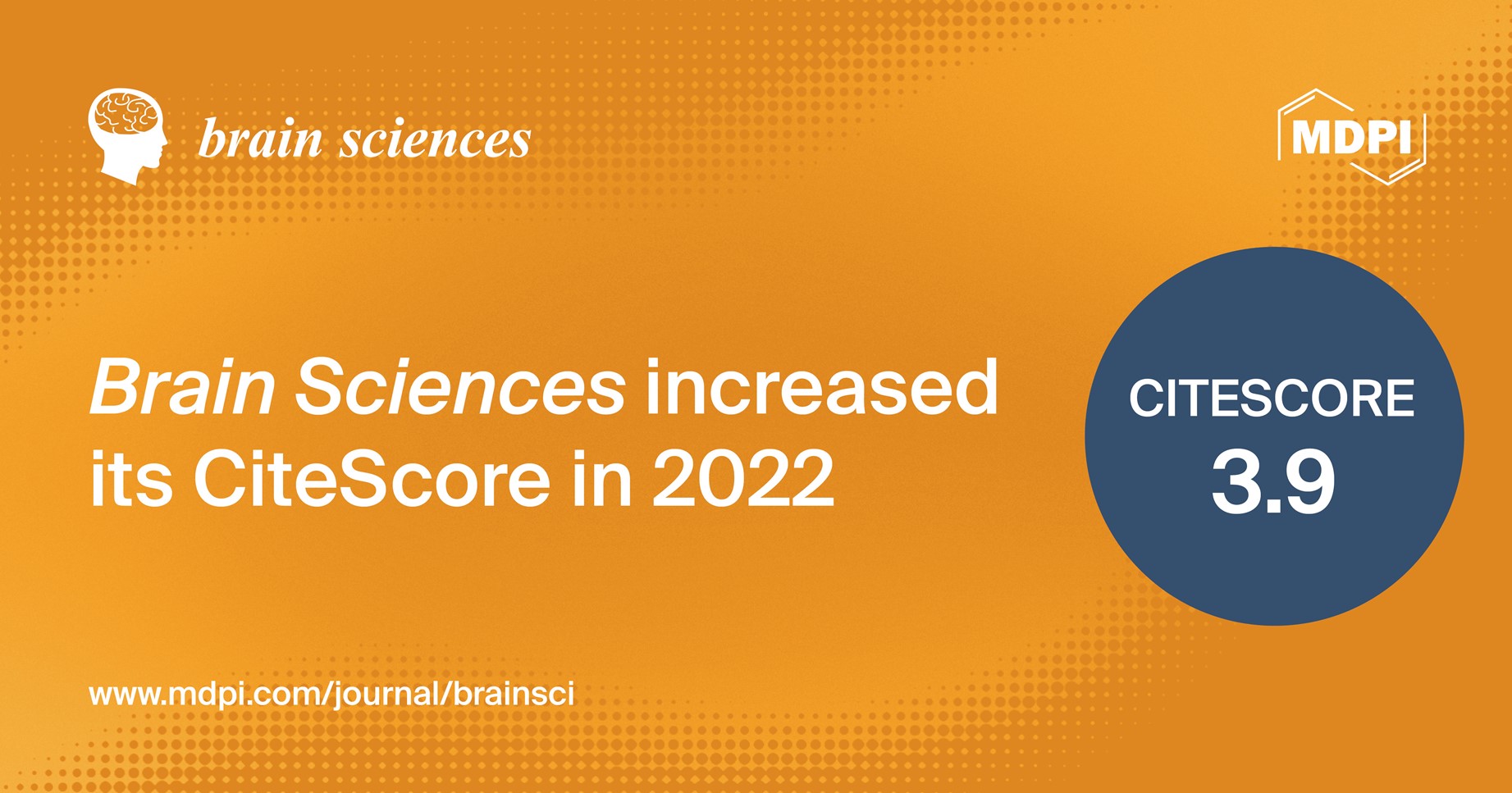
We are pleased to inform you that Brain Sciences (ISSN: 2076-3425) has received an updated CiteScore of 3.9, an increase of 26% compared with the 2021 metric. The 2022 CiteScore™ was released recently, making an assessment of the scientific influence of journals in the 2019 to 2022 period.
For more journal statistics, please visit https://www.mdpi.com/journal/brainsci/stats.
Excellent performance is inseparable from the support and dedication of all journal editors, reviewers, authors, and readers. We would like to take this opportunity to thank all of you who have contributed to the journal.
2 June 2023
Brain Sciences | Highly Cited Papers in 2021 in the Section “Neurodegenerative Diseases”
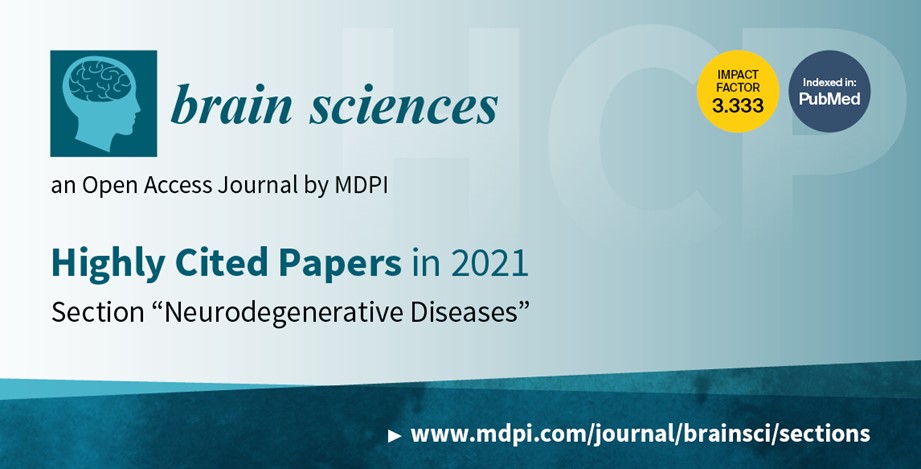
The “Neurodegenerative Diseases” Section aims to publish articles on amyotrophic lateral sclerosis, multiple sclerosis, Parkinson's disease, Alzheimer's disease, Huntington's disease, multiple system atrophy, prion diseases, etc.
As all of the articles published in our journal are of an open access format, you have free and unlimited access to the full text. We welcome you to read our most highly cited papers published in 2021 listed below:
1. “Cerebrospinal Fluid Biomarkers of Alzheimer’s Disease: Current Evidence and Future Perspectives”
by Donovan A. McGrowder, Fabian Miller, Kurt Vaz, Chukwuemeka Nwokocha, Cameil Wilson-Clarke, Melisa Anderson-Cross, Jabari Brown, Lennox Anderson-Jackson, Lowen Williams, Lyndon Latore et al.
Brain Sci. 2021, 11(2), 215; https://doi.org/10.3390/brainsci11020215
Available online: https://www.mdpi.com/2076-3425/11/2/215
2. “One Year Trajectory of Caregiver Burden in Parkinson’s Disease and Analysis of Gender-Specific Aspects”
by Martin Klietz, Hannah von Eichel, Theresa Schnur, Selma Staege, Günter U. Höglinger, Florian Wegner and Stephanie Stiel
Brain Sci. 2021, 11(3), 295; https://doi.org/10.3390/brainsci11030295
Available online: https://www.mdpi.com/2076-3425/11/3/295
3. “Informal Caregiving in Amyotrophic Lateral Sclerosis (ALS): A High Caregiver Burden and Drastic Consequences on Caregivers’ Lives”
by Pavel Schischlevskij, Isabell Cordts, René Günther, Benjamin Stolte, Daniel Zeller, Carsten Schröter, Ute Weyen, Martin Regensburger, Joachim Wolf, Ilka Schneider et al.
Brain Sci. 2021, 11(6), 748; https://doi.org/10.3390/brainsci11060748
Available online: https://www.mdpi.com/2076-3425/11/6/748
4. “Cerebrospinal Fluid α-Synuclein Species in Cognitive and Movements Disorders”
by Vasilios C. Constantinides, Nour K. Majbour, George P. Paraskevas, Ilham Abdi, Bared Safieh-Garabedian, Leonidas Stefanis, Omar M. El-Agnaf and Elisabeth Kapaki
Brain Sci. 2021, 11(1), 119; https://doi.org/10.3390/brainsci11010119
Available online: https://www.mdpi.com/2076-3425/11/1/119
5. “Blood Biomarkers in Frontotemporal Dementia: Review and Meta-Analysis”
by Sofia Ntymenou, Ioanna Tsantzali, Theodosis Kalamatianos, Konstantinos I. Voumvourakis, Elisabeth Kapaki, Georgios Tsivgoulis, George Stranjalis and George P. Paraskevas
Brain Sci. 2021, 11(2), 244; https://doi.org/10.3390/brainsci11020244
Available online: https://www.mdpi.com/2076-3425/11/2/244
6. “Proteomic Profile of Saliva in Parkinson’s Disease Patients: A Proof of Concept Study”
by Monika Figura, Ewa Sitkiewicz, Bianka Świderska, Łukasz Milanowski, Stanisław Szlufik, Dariusz Koziorowski and Andrzej Friedman
Brain Sci. 2021, 11(5), 661; https://doi.org/10.3390/brainsci11050661
Available online: https://www.mdpi.com/2076-3425/11/5/661
7. “Relationship Satisfaction in People with Parkinson’s Disease and Their Caregivers: A Cross-Sectional Observational Study”
by Johanne Heine, Hannah von Eichel, Selma Staege, Günter U. Höglinger, Florian Wegner and Martin Klietz
Brain Sci. 2021, 11(6), 822; https://doi.org/10.3390/brainsci11060822
Available online: https://www.mdpi.com/2076-3425/11/6/822
8. “Informal Caregivers in Amyotrophic Lateral Sclerosis: A Multi-Centre, Exploratory Study of Burden and Difficulties”
by Éilís Conroy, Polly Kennedy, Mark Heverin, Iracema Leroi, Emily Mayberry, Anita Beelen, Theocharis Stavroulakis, Leonard H. van den Berg, Christopher J. McDermott, Orla Hardiman et al.
Brain Sci. 2021, 11(8), 1094; https://doi.org/10.3390/brainsci11081094
Available online: https://www.mdpi.com/2076-3425/11/8/1094
9. “Understanding the Modulatory Effects of Cannabidiol on Alzheimer’s Disease”
by Yinyi Xiong and Chae-Seok Lim
Brain Sci. 2021, 11(9), 1211; https://doi.org/10.3390/brainsci11091211
Available online: https://www.mdpi.com/2076-3425/11/9/1211
10. “Analysis of Transition of Patients with Parkinson’s Disease into Institutional Care: A Retrospective Pilot Study”
by Ida Jensen, Emily Lescher, Stephanie Stiel, Florian Wegner, Günter Höglinger and Martin Klietz
Brain Sci. 2021, 11(11), 1470; https://doi.org/10.3390/brainsci11111470
Available online: https://www.mdpi.com/2076-3425/11/11/1470
11. “Connection Lost, MAM: Errors in ER–Mitochondria Connections in Neurodegenerative Diseases”
by Ashu Johri and Abhishek Chandra
Brain Sci. 2021, 11(11), 1437; https://doi.org/10.3390/brainsci11111437
Available online: https://www.mdpi.com/2076-3425/11/11/1437
12. “Another Perspective on Huntington’s Disease: Disease Burden in Family Members and Pre-Manifest HD When Compared to Genotype-Negative Participants from ENROLL-HD”
by Jannis Achenbach and Carsten Saft
Brain Sci. 2021, 11(12), 1621; https://doi.org/10.3390/brainsci11121621
Available online: https://www.mdpi.com/2076-3425/11/12/1621
13. “Predicting Conversion from MCI to AD Combining Multi-Modality Data and Based on Molecular Subtype”
by Hai-Tao Li, Shao-Xun Yuan, Jian-Sheng Wu, Yu Gu and Xiao Sun
Brain Sci. 2021, 11(6), 674; https://doi.org/10.3390/brainsci11060674
Available online: https://www.mdpi.com/2076-3425/11/6/674
14. “Non-Immersive Virtual Reality to Improve Balance and Reduce Risk of Falls in People Diagnosed with Parkinson’s Disease: A Systematic Review”
by Héctor García-López, Esteban Obrero-Gaitán, Adelaida María Castro-Sánchez, Inmaculada Carmen Lara-Palomo, Francisco Antonio Nieto-Escamez and Irene Cortés-Pérez
Brain Sci. 2021, 11(11), 1435; https://doi.org/10.3390/brainsci11111435
Available online: https://www.mdpi.com/2076-3425/11/11/1435
15. “A New NF-κB Inhibitor, MEDS-23, Reduces the Severity of Adverse Post-Ischemic Stroke Outcomes in Rats”
by Elina Rubin, Agnese C. Pippione, Matthew Boyko, Giacomo Einaudi, Stefano Sainas, Massimo Collino, Carlo Cifani, Marco L. Lolli, Naim Abu-Freha, Jacob Kaplanski et al.
Brain Sci. 2022, 12(1), 35; https://doi.org/10.3390/brainsci12010035
Available online: https://www.mdpi.com/2076-3425/12/1/35
16. “Genotyping and Plasma/Cerebrospinal Fluid Profiling of a Cohort of Frontotemporal Dementia–Amyotrophic Lateral Sclerosis Patients”
by Mara Bourbouli, George P. Paraskevas, Mihail Rentzos, Lambros Mathioudakis, Vasiliki Zouvelou, Anastasia Bougea, Athanasios Tychalas, Vasilios K. Kimiskidis, Vasilios Constantinides, Spiros Zafeiris et al.
Brain Sci. 2021, 11(9), 1239; https://doi.org/10.3390/brainsci11091239
Available online: https://www.mdpi.com/2076-3425/11/9/1239
17. “Caring for a Relative with Dementia: Determinants and Gender Differences of Caregiver Burden in the Rural Setting”
by Dagmar Schaffler-Schaden, Simon Krutter, Alexander Seymer, Roland Eßl-Maurer, Maria Flamm and Jürgen Osterbrink
Brain Sci. 2021, 11(11), 1511; https://doi.org/10.3390/brainsci11111511
Available online: https://www.mdpi.com/2076-3425/11/11/1511
18. “Unlike Brief Inhibition of Microglia Proliferation after Spinal Cord Injury, Long-Term Treatment Does Not Improve Motor Recovery”
by Gaëtan Poulen, Sylvain Bartolami, Harun N. Noristani, Florence E. Perrin and Yannick N. Gerber
Brain Sci. 2021, 11(12), 1643; https://doi.org/10.3390/brainsci11121643
Available online: https://www.mdpi.com/2076-3425/11/12/1643
19. “Psychological Impact of Parkinson Disease Delusions on Spouse Caregivers: A Qualitative Study”
by Caroline J. Deutsch, Noelle Robertson and Janis M. Miyasaki
Brain Sci. 2021, 11(7), 871; https://doi.org/10.3390/brainsci11070871
Available online: https://www.mdpi.com/2076-3425/11/7/871
20. “Early Spatial Memory Impairment in a Double Transgenic Model of Alzheimer’s Disease TgF-344 AD”
by Stephanie L. Proskauer Pena, Konstantinos Mallouppas, Andre M. G. Oliveira, Frantisek Zitricky, Athira Nataraj and Karel Jezek
Brain Sci. 2021, 11(10), 1300; https://doi.org/10.3390/brainsci11101300
Available online: https://www.mdpi.com/2076-3425/11/10/1300
18 May 2023
Brain Sciences | Highly Cited Papers in 2021 in the Section “Molecular and Cellular Neuroscience”
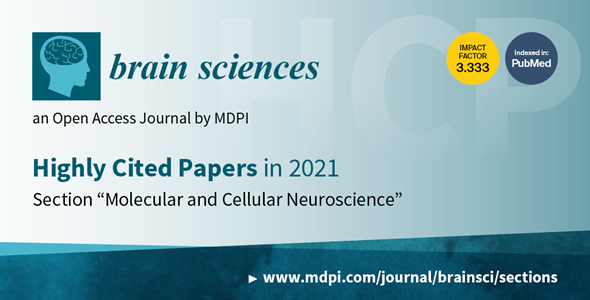
The mission of the “Molecular and Cellular Neuroscience” Section is to publish cutting-edge original articles and critical reviews on the molecular and cellular basis of neurological disorders. In particular, the journal covers all aspects of molecular and cellular neuroscience, from genetic analyses of human populations to tissue culture and animal models of neurological disorders. Coverage includes experimental analyses of molecular and cellular events underpinning both developmental and adult plasticity mechanisms of the normal nervous system and occurring as a consequence of neurological dysfunction and in neuronal degeneration and repair.
As all of the articles published in our journal are of an open access format, you have free and unlimited access to the full text. We welcome you to read our most highly cited papers published in 2021 listed below:
1. “The Participation of Microglia in Neurogenesis: A Review”
by Diego R. Pérez-Rodríguez, Idoia Blanco-Luquin and Maite Mendioroz
Brain Sci. 2021, 11(5), 658; https://doi.org/10.3390/brainsci11050658
Available online: https://www.mdpi.com/2076-3425/11/5/658
2. “Delayed Onset Muscle Soreness (DOMS): The Repeated Bout Effect and Chemotherapy-Induced Axonopathy May Help Explain the Dying-Back Mechanism in Amyotrophic Lateral Sclerosis and Other Neurodegenerative Diseases”
by Balázs Sonkodi
Brain Sci. 2021, 11(1), 108; https://doi.org/10.3390/brainsci11010108
Available online: https://www.mdpi.com/2076-3425/11/1/108
3. “Sex Differences in Dopamine Receptors and Relevance to Neuropsychiatric Disorders”
by Olivia O. F. Williams, Madeleine Coppolino, Susan R. George and Melissa L. Perreault
Brain Sci. 2021, 11(9), 1199; https://doi.org/10.3390/brainsci11091199
Available online: https://www.mdpi.com/2076-3425/11/9/1199
4. “TREM2 Regulates High Glucose-Induced Microglial Inflammation via the NLRP3 Signaling Pathway”
by Yuan Li, Weihong Long, Menghan Gao, Fangtai Jiao, Zecai Chen, Mingyuan Liu and Lu Yu
Brain Sci. 2021, 11(7), 896; https://doi.org/10.3390/brainsci11070896
Available online: https://www.mdpi.com/2076-3425/11/7/896
5. “5-Aminoisoquinolinone, a PARP-1 Inhibitor, Ameliorates Immune Abnormalities through Upregulation of Anti-Inflammatory and Downregulation of Inflammatory Parameters in T Cells of BTBR Mouse Model of Autism”
by Khaled Alhosaini, Mushtaq A. Ansari, Ahmed Nadeem, Saleh A. Bakheet, Sabry M. Attia, Khalid Alhazzani, Thamer H. Albekairi, Haneen A. Al-Mazroua, Hafiz M. Mahmood and Sheikh F. Ahmad
Brain Sci. 2021, 11(2), 249; https://doi.org/10.3390/brainsci11020249
Available online: https://www.mdpi.com/2076-3425/11/2/249
6. “The Current Role of Dexmedetomidine as Neuroprotective Agent: An Updated Review”
by Zaara Liaquat, Xiaoying Xu, Prince Last Mudenda Zilundu, Rao Fu and Lihua Zhou
Brain Sci. 2021, 11(7), 846; https://doi.org/10.3390/brainsci11070846
Available online: https://www.mdpi.com/2076-3425/11/7/846
7. “Modelling Parkinson’s Disease: iPSCs towards Better Understanding of Human Pathology”
by Sahar Avazzadeh, Jara Maria Baena, Cameron Keighron, Yajaira Feller-Sanchez and Leo R. Quinlan
Brain Sci. 2021, 11(3), 373; https://doi.org/10.3390/brainsci11030373
Available online: https://www.mdpi.com/2076-3425/11/3/373
8. “Coenzyme a Biochemistry: From Neurodevelopment to Neurodegeneration”
by Luca Mignani, Barbara Gnutti, Daniela Zizioli and Dario Finazzi
Brain Sci. 2021, 11(8), 1031; https://doi.org/10.3390/brainsci11081031
Available online: https://www.mdpi.com/2076-3425/11/8/1031
9. “Role of Vitamin E and the Orexin System in Neuroprotection”
by Maria Ester La Torre, Ines Villano, Marcellino Monda, Antonietta Messina, Giuseppe Cibelli, Anna Valenzano, Daniela Pisanelli, Maria Antonietta Panaro, Nicola Tartaglia, Antonio Ambrosi et al.
Brain Sci. 2021, 11(8), 1098; https://doi.org/10.3390/brainsci11081098
Available online: https://www.mdpi.com/2076-3425/11/8/1098
10. “Virtual Reality (VR)-Based Environmental Enrichment in Older Adults with Mild Cognitive Impairment (MCI) and Mild Dementia”
by Waleed Riaz, Zain Yar Khan, Ali Jawaid and Suleman Shahid
Brain Sci. 2021, 11(8), 1103; https://doi.org/10.3390/brainsci11081103
Available online: https://www.mdpi.com/2076-3425/11/8/1103
11. “Exosomes as Emerging Biomarker Tools in Neurodegenerative and Neuropsychiatric Disorders—A Proteomics Perspective”
by Boby Mathew, M. Shahid Mansuri, Kenneth R. Williams and Angus C. Nairn
Brain Sci. 2021, 11(2), 258; https://doi.org/10.3390/brainsci11020258
Available online: https://www.mdpi.com/2076-3425/11/2/258
12. “Oxidative Stress and Neurodevelopmental Outcomes in Rat Offspring with Intrauterine Growth Restriction Induced by Reduced Uterine Perfusion”
by Marcelo E. Rains, Colin B. Muncie, Yi Pang, Lir-Wan Fan, Lu-Tai Tien and Norma B. Ojeda
Brain Sci. 2021, 11(1), 78; https://doi.org/10.3390/brainsci11010078
Available online: https://www.mdpi.com/2076-3425/11/1/78
13. “CSF Secretion Is Not Altered by NKCC1 Nor TRPV4 Antagonism in Healthy Rats”
by Steven W. Bothwell, Daniel Omileke, Adjanie Patabendige and Neil J. Spratt
Brain Sci. 2021, 11(9), 1117; https://doi.org/10.3390/brainsci11091117
Available online: https://www.mdpi.com/2076-3425/11/9/1117
14. “Prominent and Regressive Brain Developmental Disorders Associated with Nance-Horan Syndrome”
by Celeste Casto, Valeria Dipasquale, Ida Ceravolo, Antonella Gambadauro, Emanuela Aliberto, Karol Galletta, Francesca Granata, Giorgia Ceravolo, Emanuela Falzia, Antonella Riva et al.
Brain Sci. 2021, 11(9), 1150; https://doi.org/10.3390/brainsci11091150
Available online: https://www.mdpi.com/2076-3425/11/9/1150
15. “Searching the Dark Genome for Alzheimer’s Disease Risk Variants”
by Rachel Raybould and Rebecca Sims
Brain Sci. 2021, 11(3), 332; https://doi.org/10.3390/brainsci11030332
Available online: https://www.mdpi.com/2076-3425/11/3/332
16. “Against the Resilience of High-Grade Gliomas: The Immunotherapeutic Approach (Part I)”
by Alice Giotta Lucifero and Sabino Luzzi
Brain Sci. 2021, 11(3), 386; https://doi.org/10.3390/brainsci11030386
Available online: https://www.mdpi.com/2076-3425/11/3/386
17. “Against the Resilience of High-Grade Gliomas: Gene Therapies (Part II)”
by Alice Giotta Lucifero and Sabino Luzzi
Brain Sci. 2021, 11(8), 976; https://doi.org/10.3390/brainsci11080976
Available online: https://www.mdpi.com/2076-3425/11/8/976
18. “Development and Validation of a Long-Term 3D Glioblastoma Cell Culture in Alginate Microfibers as a Novel Bio-Mimicking Model System for Preclinical Drug Testing”
by Miodrag Dragoj, Jasmina Stojkovska, Tijana Stanković, Jelena Dinić, Ana Podolski-Renić, Bojana Obradović and Milica Pešić
Brain Sci. 2021, 11(8), 1025; https://doi.org/10.3390/brainsci11081025
Available online: https://www.mdpi.com/2076-3425/11/8/1025
19. “Shared Genetic Background between Parkinson’s Disease and Schizophrenia: A Two-Sample Mendelian Randomization Study”
by Kiwon Kim, Soyeon Kim, Woojae Myung, Injeong Shim, Hyewon Lee, Beomsu Kim, Sung Kweon Cho, Joohyun Yoon, Doh Kwan Kim and Hong-Hee Won
Brain Sci. 2021, 11(8), 1042; https://doi.org/10.3390/brainsci11081042
Available online: https://www.mdpi.com/2076-3425/11/8/1042
20. “Neuroprotective Potential of Mild Uncoupling in Mitochondria. Pros and Cons”
by Dmitry B. Zorov, Nadezda V. Andrianova, Valentina A. Babenko, Irina B. Pevzner, Vasily A. Popkov, Savva D. Zorov, Ljubava D. Zorova, Egor Yu. Plotnikov, Gennady T. Sukhikh and Denis N. Silachev
Brain Sci. 2021, 11(8), 1050; https://doi.org/10.3390/brainsci11081050
Available online: https://www.mdpi.com/2076-3425/11/8/105
10 May 2023
Meet Us at the ATS (American Thoracic Society) Conference 2023, 21–23 May 2023, Washington DC, USA

Conference: ATS (American Thoracic Society) Conference 2023
Date: 21–23 May 2023
Location: Washington DC, USA
MDPI will be attending ATS 2023 as an exhibitor; we welcome researchers from different backgrounds to visit and share their latest ideas with us.
This conference has been organized by the American Thoracic Society, and it will showcase the latest advances and discoveries in respiratory science, patient care and global respiratory health. At the conference, specialists will share and discuss the latest research and its applications to clinical, basic, and translational science in pulmonary, critical care, and sleep medicine.
The following MDPI journals will be represented:
- JCM;
- Medicina;
- Clinics and Practice;
- JPM;
- Cancers;
- Medicines;
- Healthcare;
- Metabolites;
- Children;
- Brain Sciences.
If you are planning to attend this conference, please do not hesitate to talk with us online. Our delegates look forward to meeting you in person at booth #2606, and answering any questions that you may have. For more information about the conference, please visit the following website: https://conference.thoracic.org/.
9 May 2023
Brain Sciences | Highly Cited Papers in 2021 in the Section “Developmental Neuroscience”
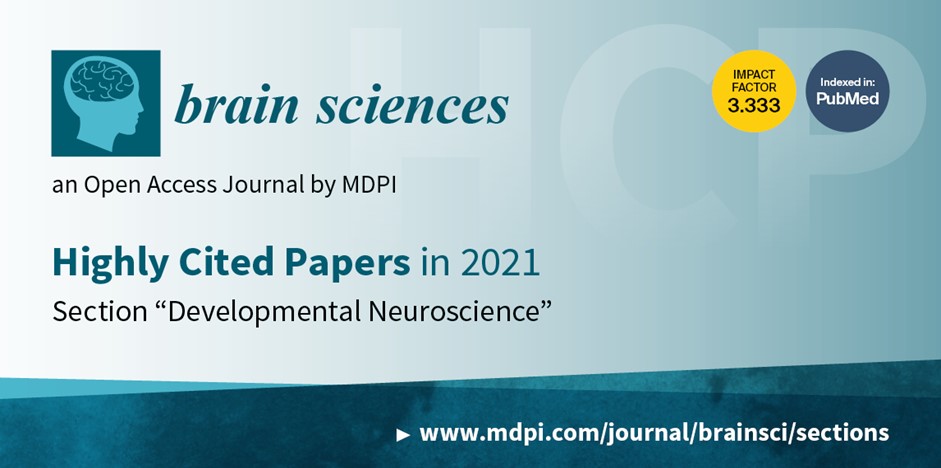
The “Developmental Neuroscience” Section aims to publish articles identifying the mechanisms of neurodevelopmental processes, both normal and causing aberrant development leading to neurological disorders, from gestation through adolescence that set the foundation of the adult configuration. The scope of this Section includes a broad multidisciplinary approach to understanding clinical and basic aspects of neurodevelopment; as such, behavioral, cognitive, molecular, genetic, epigenetic, and imaging studies are particularly welcome.
As all of the articles published in our journal are of an open access format, readers have free and unlimited access to the full text. We welcome you to read our most highly cited papers published in 2021, listed below:
1. “Psychological Impact of COVID-19 Outbreak on Families of Children with Autism Spectrum Disorder and Typically Developing Peers: An Online Survey”
by Annalisa Levante, Serena Petrocchi, Federica Bianco, Ilaria Castelli, Costanza Colombi, Roberto Keller, Antonio Narzisi, Gabriele Masi and Flavia Lecciso
Brain Sci. 2021, 11(6), 808; https://doi.org/10.3390/brainsci11070900
Available online: https://www.mdpi.com/2076-3425/11/6/808
2. “Effects of COVID-19 Lockdown on the Emotional and Behavioral Profiles of Preschool Italian Children with and without Familial Risk for Neurodevelopmental Disorders”
by Chiara Cantiani, Chiara Dondena, Elena Capelli, Elena M. Riboldi, Massimo Molteni and Valentina Riva
Brain Sci. 2021, 11(4), 477; https://doi.org/10.3390/brainsci11040477
Available online: https://www.mdpi.com/2076-3425/11/4/477
3. “A Neurodevelopment Approach for a Transitional Model of Early Onset Schizophrenia”
by Domenico De Berardis, Sergio De Filippis, Gabriele Masi, Stefano Vicari and Alessandro Zuddas
Brain Sci. 2021, 11(2), 275; https://doi.org/10.3390/brainsci11020275
Available online: https://www.mdpi.com/2076-3425/11/2/275
4. “Unveiling the Mysteries of Dyslexia—Lessons Learned from the Prospective Jyväskylä Longitudinal Study of Dyslexia”
by Kaisa Lohvansuu, Minna Torppa, Timo Ahonen, Kenneth Eklund, Jarmo A. Hämäläinen, Paavo H. T. Leppänen and Heikki Lyytinen
Brain Sci. 2021, 11(4), 427; https://doi.org/10.3390/brainsci11040427
Available online: https://www.mdpi.com/2076-3425/11/4/427
5. “Effects of Cognitive Training Programs on Executive Function in Children and Adolescents with Autism Spectrum Disorder: A Systematic Review”
by Angela Pasqualotto, Noemi Mazzoni, Arianna Bentenuto, Anna Mulè, Francesco Benso and Paola Venuti
Brain Sci. 2021, 11(10), 1280; https://doi.org/10.3390/brainsci11101280
Available online: https://www.mdpi.com/2076-3425/11/10/1280
6. “Molecular Genetics of Microcephaly Primary Hereditary: An Overview”
by Nikistratos Siskos, Electra Stylianopoulou, Georgios Skavdis and Maria E. Grigoriou
Brain Sci. 2021, 11(5), 581; https://doi.org/10.3390/brainsci11050581
Available online: https://www.mdpi.com/2076-3425/11/5/581
7. “Developmental Language Disorder and Autism: Commonalities and Differences on Language”
by Natasa Georgiou and George Spanoudis
Brain Sci. 2021, 11(5), 589; https://doi.org/10.3390/brainsci11050589
Available online: https://www.mdpi.com/2076-3425/11/5/589
8. “A Systematic Review on the Impact of the Social Confinement on People with Autism Spectrum Disorder and Their Caregivers during the COVID-19 Pandemic”
by Yurena Alonso-Esteban, María Fernanda López-Ramón, Verónica Moreno-Campos, Esperanza Navarro-Pardo and Francisco Alcantud-Marín
Brain Sci. 2021, 11(11), 1389; https://doi.org/10.3390/brainsci11111389
Available online: https://www.mdpi.com/2076-3425/11/11/1389
9. “Evolution of the Autism Literature and the Influence of Parents: A Scientific Mapping in Web of Science”
by Noemí Carmona-Serrano, Antonio-José Moreno-Guerrero, José-Antonio Marín-Marín and Jesús López-Belmonte
Brain Sci. 2021, 11(1), 74; https://doi.org/10.3390/brainsci11010074
Available online: https://www.mdpi.com/2076-3425/11/1/74
10. “Exome Sequencing in 200 Intellectual Disability/Autistic Patients: New Candidates and Atypical Presentations”
by Floriana Valentino, Lucia Pia Bruno, Gabriella Doddato, Annarita Giliberti, Rossella Tita, Sara Resciniti, Chiara Fallerini, Mirella Bruttini, Caterina Lo Rizzo, Maria Antonietta Mencarelli et al.
Brain Sci. 2021, 11(7), 936; https://doi.org/10.3390/brainsci11070936
Available online: https://www.mdpi.com/2076-3425/11/7/936
11. “Outcome of Community-Based Early Intervention and Rehabilitation for Children with Cerebral Palsy in Rural Bangladesh: A Quasi-Experimental Study”
by Tasneem Karim, Mohammad Muhit, Israt Jahan, Claire Galea, Catherine Morgan, Hayley Smithers-Sheedy, Nadia Badawi and Gulam Khandaker
Brain Sci. 2021, 11(9), 1189; https://doi.org/10.3390/brainsci11091189
Available online: https://www.mdpi.com/2076-3425/11/9/1189
12. “Parental Stress and Disability in Offspring: A Snapshot during the COVID-19 Pandemic”
by Martina Siracusano, Assia Riccioni, Leonardo Emberti Gialloreti, Eugenia Segatori, Lucrezia Arturi, Michelangelo Vasta, Maria Cristina Porfirio, Monica Terribili, Cinzia Galasso and Luigi Mazzone
Brain Sci. 2021, 11(8), 1040; https://doi.org/10.3390/brainsci11081040
Available online: https://www.mdpi.com/2076-3425/11/8/1040
13. “Predictors of Rehabilitation Service Utilisation among Children with Cerebral Palsy (CP) in Low- and Middle-Income Countries (LMIC): Findings from the Global LMIC CP Register”
by Mahmudul Hassan Al Imam, Israt Jahan, Mohammad Muhit, Denny Hardianto, Francis Laryea, Amir Banjara Chhetri, Hayley Smithers-Sheedy, Sarah McIntyre, Nadia Badawi and Gulam Khandaker
Brain Sci. 2021, 11(7), 848; https://doi.org/10.3390/brainsci11070848
Available online: https://www.mdpi.com/2076-3425/11/7/848
14. “Age of Diagnosis, Fidelity and Acceptability of an Early Diagnosis Clinic for Cerebral Palsy: A Single Site Implementation Study”
by Anna te Velde, Esther Tantsis, Iona Novak, Nadia Badawi, Jane Berry, Prue Golland, Johanna Korkalainen, Robyn McMurdo, Ronda Shehata and Catherine Morgan
Brain Sci. 2022, 11(8), 1074; https://doi.org/10.3390/brainsci11081074
Available online: https://www.mdpi.com/2076-3425/11/8/1074
15. “A Multidisciplinary Telerehabilitation Approach for Supporting Social Interaction in Autism Spectrum Disorder Families: An Italian Digital Platform in Response to COVID-19”
by Ersilia Vallefuoco, Giulia Purpura, Giovanna Gison, Andrea Bonifacio, Luca Tagliabue, Fiorenza Broggi, Goffredo Scuccimarra, Alessandro Pepino and Renata Nacinovich
Brain Sci. 2021, 11(11), 1404; https://doi.org/10.3390/brainsci11111404
Available online: https://www.mdpi.com/2076-3425/11/11/1404
16. “Parenting Stress and Social Style in Mothers and Fathers of Children with Autism Spectrum Disorder: A Cross-Cultural Investigation in Italy and Japan”
by Michele Giannotti, Sophia Marlene Bonatti, Sanae Tanaka, Haruyuki Kojima and Simona de Falco
Brain Sci. 2021, 11(11), 1419; https://doi.org/10.3390/brainsci11111419
Available online: https://www.mdpi.com/2076-3425/11/11/1419
17. “Dynamic Functional Network Connectivity Changes Associated with fMRI Neurofeedback of Right Premotor Cortex”
by Zhiying Long, Zhaoxi Guo, Zhitao Guo, Hang Zhang and Li Yao
Brain Sci. 2021, 11(5), 582; https://doi.org/10.3390/brainsci11050582
Available online: https://www.mdpi.com/2076-3425/11/5/582
18. “Executive Function, Working Memory, and Verbal Fluency in Relation to Non-Verbal Intelligence in Greek-Speaking School-Age Children with Developmental Language Disorder”
by Asimina M. Ralli, Elisavet Chrysochoou, Petros Roussos, Kleopatra Diakogiorgi, Panagiota Dimitropoulou and Diamanto Filippatou
Brain Sci. 2021, 11(5), 604; https://doi.org/10.3390/brainsci11050604
Available online: https://www.mdpi.com/2076-3425/11/5/604
19. “Savouring as an Intervention to Decrease Negative Affect in Anxious Mothers of Children with Autism and Neurotypical Children”
by Ariel S. Pereira, Atiqah Azhari, Chloe A. Hong, Gerin E. Gaskin, Jessica L. Borelli and Gianluca Esposito
Brain Sci. 2021, 11(5), 652; https://doi.org/10.3390/brainsci11050652
Available online: https://www.mdpi.com/2076-3425/11/5/652
20. “Caregivers’ Burden of School-Aged Children with Neurodevelopmental Disorders: Implications for Family-Centred Care”
by Giulia Purpura, Luca Tagliabue, Stefania Petri, Francesco Cerroni, Andrea Mazzarini and Renata Nacinovich
Brain Sci. 2021, 11(7), 875; https://doi.org/10.3390/brainsci11070875
Available online: https://www.mdpi.com/2076-3425/11/7/875
28 April 2023
Brain Sciences | High Cited Papers in 2021 in the Section “Behavioral Neuroscience”
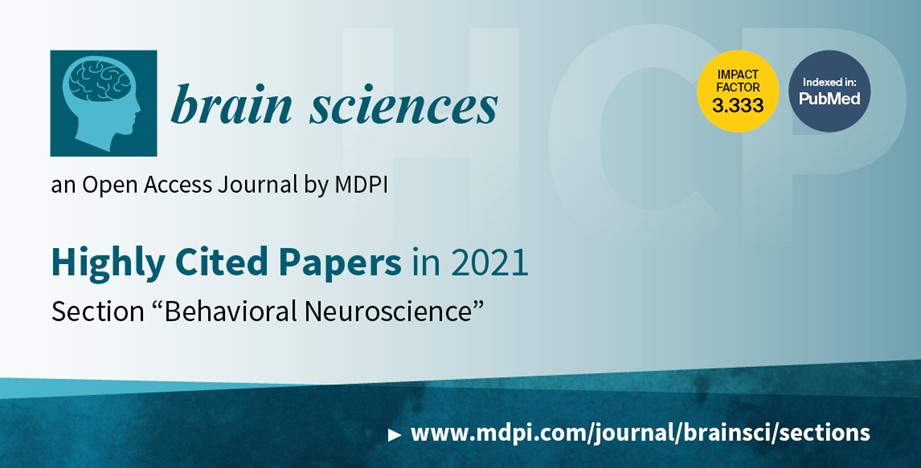
The “Behavioral Neuroscience” Section reports advances in our understanding of the neural mechanisms underlying behavior. This Section publishes articles with major insights into the neural mechanisms of animal and human behavior, from early development to senescence, and welcomes articles studying the interplay between behavior and its neurobiological basis, from behavioral to neurophysiological and neuroimaging studies.
As all of the articles published in our journal are of an open access format, you have free and unlimited access to the full text. We welcome you to read our most highly cited papers published in 2021 listed below:
1. “Quantitative Evaluation of Task-Induced Neurological Outcome after Stroke”
by Iqram Hussain and Se-Jin Park
Brain Sci. 2021, 11(7), 900; https://doi.org/10.3390/brainsci11070900
Available online: https://www.mdpi.com/2076-3425/11/7/900
2. “Biological Functions of Rat Ultrasonic Vocalizations, Arousal Mechanisms, and Call Initiation”
by Stefan M Brudzynski
Brain Sci. 2021, 11(5), 605; https://doi.org/10.3390/brainsci11050605
Available online: https://www.mdpi.com/2076-3425/11/5/605
3. “Theoretical Models of Consciousness: A Scoping Review”
by Davide Sattin, Francesca Giulia Magnani, Laura Bartesaghi, Milena Caputo, Andrea Veronica Fittipaldo, Martina Cacciatore, Mario Picozzi and Matilde Leonardi
Brain Sci. 2021, 11(5), 535; https://doi.org/10.3390/brainsci11050535
Available online: https://www.mdpi.com/2076-3425/11/5/535
4. “The Differential Impact of COVID-19 Lockdown on Sleep Quality, Insomnia, Depression, Stress, and Anxiety among Late Adolescents and Elderly in Italy”
by Giulia Amicucci, Federico Salfi, Aurora D’Atri, Lorenzo Viselli and Michele Ferrara
Brain Sci. 2021, 11(10), 1336; https://doi.org/10.3390/brainsci11101336
Available online: https://www.mdpi.com/2076-3425/11/10/1336
5. “Safinamide Improves Non-Motor Symptoms Burden in Parkinson’s Disease: An Open-Label Prospective Study”
by Diego Santos García, Carmen Labandeira Guerra, Rosa Yáñez Baña, Maria Icíar Cimas Hernando, Iria Cabo López, Jose Manuel Paz Gonález, Maria Gemma Alonso Losada, María José González Palmás and Cristina Martínez Miró
Brain Sci. 2021, 11(3), 316; https://doi.org/10.3390/brainsci11030316
Available online: https://www.mdpi.com/2076-3425/11/3/316
6. “Opposing Association of Situational and Chronic Loneliness with Interpersonal Distance”
by Nira Saporta, Dirk Scheele, Jana Lieberz, Fine Stuhr-Wulff, René Hurlemann and Simone G. Shamay-Tsoory
Brain Sci. 2021, 11(9), 1135; https://doi.org/10.3390/brainsci11091135
Available online: https://www.mdpi.com/2076-3425/11/9/1135
7. “From Affordances to Abstract Words: The Flexibility of Sensorimotor Grounding”
by Claudia Mazzuca, Chiara Fini, Arthur Henri Michalland, Ilenia Falcinelli, Federico Da Rold, Luca Tummolini and Anna M. Borghi
Brain Sci. 2021, 11(10), 1304; https://doi.org/10.3390/brainsci11101304
Available online: https://www.mdpi.com/2076-3425/11/10/1304
8. “Differential Alterations in Resting State Functional Connectivity Associated with Depressive Symptoms and Early Life Adversity”
by Eleonora Fadel, Heinz Boeker, Matti Gaertner, Andre Richter, Birgit Kleim, Erich Seifritz, Simone Grimm and Laura M. Wade-Bohleber
Brain Sci. 2021, 11(5), 591; https://doi.org/10.3390/brainsci11050591
Available online: https://www.mdpi.com/2076-3425/11/5/591
9. “Changes in Sleep Patterns and Disorders in Children and Adolescents with Attention Deficit Hyperactivity Disorders and Autism Spectrum Disorders during the COVID-19 Lockdown”
by Oliviero Bruni, Maria Breda, Raffaele Ferri and Maria Grazia Melegari
Brain Sci. 2021, 11(9), 1139; https://doi.org/10.3390/brainsci11091139
Available online: https://www.mdpi.com/2076-3425/11/9/1139
10. “Obstructive Sleep Apnea and Cognitive Decline: A Review of Potential Vulnerability and Protective Factors”
by Julie Legault, Cynthia Thompson, Marie-Ève Martineau-Dussault, Claire André, Andrée-Ann Baril, Guillermo Martinez Villar, Julie Carrier and Nadia Gosselin
Brain Sci. 2021, 11(6), 706; https://doi.org/10.3390/brainsci11060706
Available online: https://www.mdpi.com/2076-3425/11/6/706
11. “Neurophysiological Aspects of REM Sleep Behavior Disorder (RBD): A Narrative Review”
by Michela Figorilli, Giuseppe Lanza, Patrizia Congiu, Rosamaria Lecca, Elisa Casaglia, Maria P. Mogavero, Monica Puligheddu and Raffaele Ferri
Brain Sci. 2021, 11(12), 1588; https://doi.org/10.3390/brainsci11121588
Available online: https://www.mdpi.com/2076-3425/11/12/1588
12. “Spatiotemporal Dynamics of Covert Versus Overt Processing of Happy, Fearful and Sad Facial Expressions”
by Antonio Maffei, Jennifer Goertzen, Fern Jaspers-Fayer, Killian Kleffner, Paola Sessa and Mario Liotti
Brain Sci. 2021, 11(7), 942; https://doi.org/10.3390/brainsci11070942
Available online: https://www.mdpi.com/2076-3425/11/7/942
13. “Sleep in Normal Aging, Homeostatic and Circadian Regulation and Vulnerability to Sleep Deprivation”
by Jacques Taillard, Claude Gronfier, Stéphanie Bioulac, Pierre Philip and Patricia Sagaspe
Brain Sci. 2021, 11(8), 1003; https://doi.org/10.3390/brainsci11081003
Available online: https://www.mdpi.com/2076-3425/11/8/1003
14. “Biological and Acoustic Sex Differences in Rat Ultrasonic Vocalization”
by Charles Lenell, Courtney K. Broadfoot, Nicole E. Schaen-Heacock and Michelle R. Ciucci
Brain Sci. 2021, 11(4), 459; https://doi.org/10.3390/brainsci11040459
Available online: https://www.mdpi.com/2076-3425/11/4/459
15. “Effects of a Cognitive-Motor Training on Anticipatory Brain Functions and Sport Performance in Semi-Elite Basketball Players”
by Stefania Lucia, Valentina Bianco, Luca Boccacci and Francesco Di Russo
Brain Sci. 2022, 12(1), 68; https://doi.org/10.3390/brainsci12010068
Available online: https://www.mdpi.com/2076-3425/12/1/68
16. “Adjunctive Approaches to Aphasia Rehabilitation: A Review on Efficacy and Safety”
by Chiara Picano, Agnese Quadrini, Francesca Pisano and Paola Marangolo
Brain Sci. 2021, 11(1), 41; https://doi.org/10.3390/brainsci11010041
Available online: https://www.mdpi.com/2076-3425/11/1/41
17. “Persistence of the Effects of the COVID-19 Lockdown on Sleep: A Longitudinal Study”
by Maurizio Gorgoni, Serena Scarpelli, Anastasia Mangiaruga, Valentina Alfonsi, Maria R. Bonsignore, Francesco Fanfulla, Luigi Ferini-Strambi, Lino Nobili, Giuseppe Plazzi, Luigi De Gennaro et al.
Brain Sci. 2021, 11(11), 1520; https://doi.org/10.3390/brainsci11111520
Available online: https://www.mdpi.com/2076-3425/11/11/1520
18. “Creating a Theoretical Framework to Underpin Discourse Assessment and Intervention in Aphasia”
by Lucy Dipper, Jane Marshall, Mary Boyle, Deborah Hersh, Nicola Botting and Madeline Cruice
Brain Sci. 2021, 11(2), 183; https://doi.org/10.3390/brainsci11020183
Available online: https://www.mdpi.com/2076-3425/11/2/183
19. “Phytochemical Analysis, In Vitro Anticholinesterase, Antioxidant Activity and In Vivo Nootropic Effect of Ferula ammoniacum (Dorema ammoniacum) D. Don. in Scopolamine-Induced Memory Impairment in Mice”
by Nausheen Nazir, Mohammad Nisar, Muhammad Zahoor, Faheem Uddin, Saeed Ullah, Riaz Ullah, Siddique Akber Ansari, Hafiz Majid Mahmood, Ahmed Bari and Abdulrehman Alobaid
Brain Sci. 2021, 11(2), 259; https://doi.org/10.3390/brainsci11020259
Available online: https://www.mdpi.com/2076-3425/11/2/259
20. “The Effect of Maternal Immune Activation on Social Play-Induced Ultrasonic Vocalization in Rats”
by Kinga Gzielo, Agnieszka Potasiewicz, Ewa Litwa, Diana Piotrowska, Piotr Popik and Agnieszka Nikiforuk
Brain Sci. 2021, 11(3), 344; https://doi.org/10.3390/brainsci11030344
Available online: https://www.mdpi.com/2076-3425/11/3/344
7 April 2023
World Health Day–Health for All
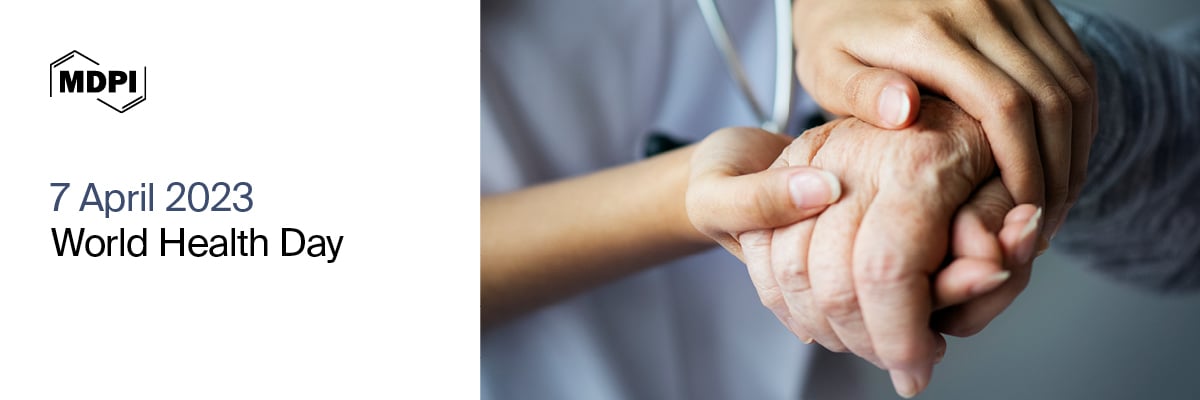
On 7 April 2023—World Health Day, the World Health Organization (WHO) will observe its 75th anniversary. In 1948, countries of the world came together and founded the WHO to promote health, keep the world safe, and serve the vulnerable, so that everyone, everywhere, can attain the highest level of health and well-being. The WHO’s 75th anniversary is an opportunity to look back at public health successes that have improved quality of life over the last seven decades. It is also an opportunity to motivate action to tackle the health challenges of today and tomorrow. In order to encourage everyone to understand health and pay attention to health, we have also curated a list of publications on topics related to universal health coverage, healthy diet, and mental health. We also want to remind everyone that all research published in MDPI journals is available in an open access format, allowing practitioners, policy makers, and people around the world to access the latest scientific knowledge to build upon and share. Although we still have a long way to go to achieve universal health, this day also provides an opportunity to celebrate the progress made and inspire further action toward a more just and equitable world. Join us on a journey at MDPI to achieve Health for All.
|
Journal Recommendation |
|||

- The Antioxidant Potential of the Mediterranean Diet as a Predictor of Weight Loss after a Very Low-Calorie Ketogenic Diet (VLCKD) in Women with Overweight and Obesity
Antioxidants 2023, 12(1), 18; https://doi.org/10.3390/antiox12010018
- Effectiveness of Non-Contact Dietary Coaching in Adults with Diabetes or Prediabetes Using a Continuous Glucose Monitoring Device: A Randomized Controlled Trial
Healthcare 2023, 11(2), 252; https://doi.org/10.3390/healthcare11020252
- The Association between Advanced Liver Fibrosis and Mortality Is Modified by Dietary Quality among Korean Adults: Results from the Korea National Health and Nutrition Examination Survey with Mortality Data
Nutrients 2023, 15(6), 1501; https://doi.org/10.3390/nu15061501
- Physical Exercise and Diet: Regulation of Gut Microbiota to Prevent and Treat Metabolic Disorders to Maintain Health
Nutrients 2023, 15(6), 1539; https://doi.org/10.3390/nu15061539
|
Section: Nutrition and Public Health |
Special Issue: Dietary Antioxidants and Cardiovascular Health |

- Modelling and Prediction of the Spread of COVID-19 in Cameroon and Assessing the Governmental Measures (March–September 2020)
COVID 2021, 1(3), 622-644; https://doi.org/10.3390/covid1030052
- SARS-CoV-2 Infection in Health Care Workers of Trieste (North-Eastern Italy), 1 October 2020–7 February 2022: Occupational Risk and the Impact of the Omicron Variant
Viruses 2022, 14(8), 1663; https://doi.org/10.3390/v14081663
- Vaccination Coverage during Childhood and Adolescence among Undergraduate Health Science Students in Greece
Children 2022, 9(10), 1553; https://doi.org/10.3390/children9101553
- Determinants of Equity in Coverage of Measles-Containing Vaccines in Wales, UK, during the Elimination Era
Vaccines 2023, 11(3), 680; https://doi.org/10.3390/vaccines11030680
|
Section: School Health |
Topical Collection: Poxviruses |

- Sex Differences in Substance Use, Prevalence, Pharmacological Therapy, and Mental Health in Adolescents with Attention-Deficit/Hyperactivity Disorder (ADHD)
Brain Sci. 2022, 12(5), 590; https://doi.org/10.3390/brainsci12050590
- Impact on Students of the Act–Belong–Commit Mentally Healthy Schools Framework
Children 2023, 10(3), 548; https://doi.org/10.3390/children10030548
- Psychological Health and Drugs: Data-Driven Discovery of Causes, Treatments, Effects, and Abuses
Toxics 2023, 11(3), 287; https://doi.org/10.3390/toxics11030287
- Characterizing Touch Discrimination Impairment from Pooled Stroke Samples Using the Tactile Discrimination Test: Updated Criteria for Interpretation and Brief Test Version for Use in Clinical Practice Settings
Brain Sci. 2023, 13(4), 533; https://doi.org/10.3390/brainsci13040533
|
Special Issue: Disruptive Behavior Disorders: Symptoms, Evaluation and Treatment |
Special Issue: Organophosphate-Induced Neurotoxicity: Countermeasures, Mechanisms, and Physiology |

29 March 2023
Meet Us at the MDPI World Autism Awareness Day Webinar 2023, 2 April 2023

In order to commemorate World Autism Awareness Day 2023, MDPI is launching a special webinar to encourage researchers to join together, take action, and highlight how the exchange of findings facilitates efforts to raise awareness about autism.
Over the past decade, major progress has been made towards increasing access to education generally, as well as for persons with autism specifically.
The webinar aims to encourage connections and collaboration among autism researchers and the international Open Access community to help improve the lives of those with autism.
We are very much looking forward to seeing you at the MDPI World Autism Awareness Day Webinar 2023.
Conference Secretariat: Ms. Shun Li
Date and time: 2 April 2023, 11:00 p.m. CEST
Register now for free:
This is a free webinar. After registering, you will receive a confirmation email containing information on how to join the webinar. Registrations with academic institutional email addresses will be prioritized.
Unable to attend? Register anyway and we will let you know when the recording is available to watch.
Webinar Chairs and Keynote Speakers:
- Dr. James Brasic, Section of High Resolution Brain Positron Emission Tomography Imaging, Division of Nuclear Medicine and Molecular Imaging, The Russell H. Morgan Department of Radiology and Radiological Science, The Johns Hopkins University School of Medicine, Baltimore, MD, USA, Section Board Member of Brain Sciences (ISSN: 2076-3425), Guest Editor of IJMS (ISSN: 1422-0067)
- Dr. Kazuhito Toyooka, Department of Neurobiology and Anatomy, Drexel University College of Medicine, 2900 Queen Lane, Philadelphia, PA 19129, USA, Section Board Member of Brain Sciences (ISSN: 2076-3425), Guest Editor of IJMS (ISSN: 1422-0067)
- Dr. Richard E. Frye, Autism Discovery and Treatment Foundation, Phoenix AZ, Editorial Board Member of JPM (ISSN: 2075-4426)
Program:
| Speaker/Presentation | Time in CEST |
| Introduction | 11:00 p.m.–11:10 p.m. |
| Dr. James Brasic Developing a relaxation response to catastrophes |
11.10 p.m.–11:40 p.m. |
| Dr. Kazuhito Toyooka ADNP, the gene responsible for autism and ADNP syndrome, regulates neuromorphogenesis, neural connectivity and activity during cortical development. |
11:40 p.m.–12:10 a.m. |
| Dr. Richard E. Frye The role of mitochondria and folate in prenatal health and offspring neurodevelopment |
12:10 a.m.–12:40 a.m. |
| Q&A Session | 12:40 a.m.–01:00 a.m. |
Relevant Special Issues:
Behavioral Sciences
"Training and Education in Children with Autism"
Edited by: Alessandro Frolli, Angelo Rega and Maria Carla Ricci
Submission deadline: 30 June 2023
Biomolecules
"Glutamate and Glutamate Receptors in Health and Diseases"
Edited by: Jolanta H. Kotlińska and Marta Marszalek-Grabska
Submission deadline: 30 September 2023
Brain Sciences
"Sexuality in Autism Spectrum Disorders: Past, Present and Innovative Perspectives"
Edited by: Rocco Salvatore Calabrò and Giovanni Pioggia
Submission deadline: 25 July 2023
Cells
"Molecular Genetics of Neuropsychiatric Diseases"
Edited by: Yingwei Mao and Xin Tang
Submission deadline: 8 March 2024
CIMB
"Neuropathology: From Molecular Mechanisms to Therapeutic Solutions"
Edited by: Wenqiang Fan and Xingping Qin
Submission deadline: 31 July 2023
Disabilities
"Technology for People with Disabilities: Opportunities and Challenges"
Edited by: Angelo Rega and Alessandro Frolli
Submission deadline: 30 June 2023
Genes
"Genes, Phenotypes and Molecular Mechanisms for Personalized Medicine in Autism"
Edited by: M. E. Suzanne Lewis
Submission deadline: 20 June 2023
IJERPH
"Research on Autism in Children"
Edited by: Andrey Vyshedskiy
Submission deadline: 31 August 2023
JPM
"A Personalized Medicine Approach to the Diagnosis and Management of Autism Spectrum Disorder: Beyond Genetic Syndromes"
Edited by: Richard E. Frye, Richard G. Boles, Daniel Rossignol and Shannon Rose
Submission deadline: 10 June 2023
Life
"Steroid Hormones, Oxidative Stress, Mitochondrial Dysfunction Unsolving the Enigma of Autism?"
Edited by: Benedikt Andreas Gasser and Markus G. Mohaupt
Submission deadline:31 July 2023
Medicina
"Atypical Autism: Causes, Diagnosis, and Current Treatment"
Edited by: Rekha Jagadapillai
Submission deadline: 15 October 2023
Molecules
"Bioactive Lipids and Cannabinoids, Key Players in Neuropsychiatric Disorders and Beyond"
Edited by: Giuseppe Di Giovanni and Mauro Maccarrone
Submission deadline: 31 August 2023
NeuroSci
"Disorders of Cognition and Behavior"
Edited by: Satwant Kumar
Submission deadline: 30 April 2023
Nutrients
"Effects of Polyunsaturated Fatty Acids on Brain Metabolism and Neurodevelopment"
Edited by: Dhavamani Sugasini
Submission deadline: 20 July 2023
Pathophysiology
"Neurodegenerative Diseases: Advances in Understanding Mechanisms and Development of Therapies"
Edited by: Shao-bin Wang and Zhongshan Cheng
Submission deadline: 30 June 2023
Pharmaceuticals
"Drug Treatment For Autism"
Edited by: Maryam Ardalan
Submission deadline: 31 May 2023
Sci
"Feature Papers—Multidisciplinary Sciences 2023"
Edited by: Claus Jacob and Ahmad Yaman Abdin
Submission deadline: 31 December 2023
Technologies
"Machine Learning Methods for Bio-Medical Image and Signal Processing: Recent Advances"
Edited by: Lipo Wang
Submission deadline: 15 November 2023
Toxics
"Association of Environmental Exposures with Mental and Cognitive Health"
Edited by: Hicran Altug, Tamara Schikowski and Rachel Tham
Submission deadline: 5 April 2023
24 March 2023
Brain Sciences | Issue Cover Articles in 2022
The articles below have been selected as 2022 Issue Cover papers by the Editorial Office of Brain Sciences (ISSN: 2076-3425). These articles came from multiple fields within neuroscience, including hypnosis, Multiple Sclerosis, space perception, empathy, migraine, inhibition response, Schizophrenia, artificial neural network model, Attention Deficit Hyperactivity Disorder (ADHD), Alzheimer’s Disease, aneurysms, depression. We hope these papers can provide insights and references for scholars in these fields.
|
|
1. “Functional Changes in Brain Activity Using Hypnosis: A Systematic Review” by Thomas Gerhard Wolf, Karin Anna Faerber, Christian Rummel, Ulrike Halsband and Guglielmo Campus Brain Sci. 2022, 12(1), 108; https://doi.org/10.3390/brainsci12010108 Available online: https://www.mdpi.com/2076-3425/12/1/108 |
|
|
2. “Cognitive Impairment in Secondary Progressive Multiple Sclerosis: Effect of Disease Duration, Age, and Progressive Phenotype” |
|
|
3. “Threat Detection in Nearby Space Mobilizes Human Ventral Premotor Cortex, Intraparietal Sulcus, and Amygdala” |
|
|
4. “Intrinsic Shapes of Empathy: Functional Brain Network Topology Encodes Intersubjective Experience and Awareness Traits” |
|
|
5. “Investigating the Migraine Cycle over 21 Consecutive Days Using Proton Magnetic Resonance Spectroscopy and Resting-State fMRI: A Pilot Study” |
|
|
6. “The Asymmetric Laplace Gaussian (ALG) Distribution as the Descriptive Model for the Internal Proactive Inhibition in the Standard Stop Signal Task” |
|
|
7. “Validation of the Glasgow Antipsychotic Side-Effect Scale (GASS) in an Italian Sample of Patients with Stable Schizophrenia and Bipolar Spectrum Disorders” |
|
|
8. “Neurocognitive Artificial Neural Network Models Are Superior to Linear Models at Accounting for Dimensional Psychopathology” |
|
|
9. “Sleep Fosters Odor Recognition in Children with Attention Deficit Hyperactivity Disorder but Not in Typically Developing Children” |
|
|
10. “Macrostructural and Microstructural White Matter Alterations Are Associated with Apathy across the Clinical Alzheimer’s Disease Spectrum” |
|
|
11. “Flow Diverter Devices in the Treatment of Anterior Communicating Artery Region Aneurysms: Would the Regional Anatomy and the Aneurysm Location Affect the Outcomes?” |
|
|
12. “Win and Loss Responses in the Monetary Incentive Delay Task Mediate the Link between Depression and Problem Drinking” |
21 March 2023
Brain Sciences | Issue Cover Articles in 2021
The articles below have been selected as the 2021 Issue Cover papers by the Editorial Office of Brain Sciences (ISSN: 2076-3425). These articles came from multiple fields within the scope of neurosciences, including multiple sclerosis, neurodegenerative biomarkers, post-stroke motor recovery, autism, nTMS application, nutrition and cognition, COVID-19 effect, attention-deficit/hyperactivity disorder (ADHD), muscle motor performance, and music’s effect on the brain. We hope they can provide insights and references for scholars in these fields.
|
|
1. “Gray Matter Morphometry Correlates with Attentional Efficiency in Young-Adult Multiple Sclerosis” by Sindhuja T. Govindarajan, Ruiqi Pan, Lauren Krupp, Leigh Charvet and Tim Q. Duong Brain Sci. 2021, 11(1), 80; https://doi.org/10.3390/brainsci11010080 Available online: https://www.mdpi.com/2076-3425/11/1/80 |
|
|
2. “Exosomes as Emerging Biomarker Tools in Neurodegenerative and Neuropsychiatric Disorders—A Proteomics Perspective” |
|
|
3. “Targeting GABAC Receptors Improves Post-Stroke Motor Recovery” |
|
|
4. “Brain Molecular Connectivity in Neurodegenerative Conditions” |
|
|
5. “The Lost Neural Hierarchy of the Autistic Self—Locked-Out of the Mental Self and Its Default-Mode Network” |
|
|
6. “The Effect of Depression on Health-Related Quality of Life Is Mediated by Fatigue in Persons with Multiple Sclerosis” |
|
|
7. “Mapping of Motor Function with Neuronavigated Transcranial Magnetic Stimulation: A Review on Clinical Application in Brain Tumors and Methods for Ensuring Feasible Accuracy” |
|
|
8. “Association between Visceral Fat and Brain Structural Changes or Cognitive Function” |
|
|
9. “Changes in Sleep Patterns and Disorders in Children and Adolescents with Attention Deficit Hyperactivity Disorders and Autism Spectrum Disorders during the COVID-19 Lockdown” |
|
|
10. “Perinatal Acetaminophen Exposure and Childhood Attention-Deficit/Hyperactivity Disorder (ADHD): Exploring the Role of Umbilical Cord Plasma Metabolites in Oxidative Stress Pathways” |
|
|
11. “Effect of Neck Muscle Fatigue on Hand Muscle Motor Performance and Early Somatosensory Evoked Potentials” |
|
|
12. “Neural Correlates of Music Listening: Does the Music Matter?” |
13 March 2023
MDPI’s Newly Launched Journals in December 2022
As a leading open access publisher, MDPI provides scholars with a high-quality and rich academic exchange platform by continuously expanding into new and exciting research areas.
In December 2022, MDPI launched five new journals, covering multiple subjects such as life sciences, biology, medicine and pharmacology, social sciences and humanities. These new journals are being edited by established scholars across the world.
|
Journal |
Founding Editor-in-Chief |
Journal Topics (Selected) |
|
Prof. Dr. Fabio Gresta, University of Messina, Italy| Editorial | view inaugural issue |
grass/forage/turf production; grassland management; pasture monitoring; grazing and livestock; grass agro-ecosystems| view journal scope | submit an article |
|
|
Prof. Dr. Christos G. Athanassiou, University of Thessaly, Greece| Editorial | view inaugural issue |
pesticides; fungicides; herbicides; fertilizers; soil conditioners| view journal scope | submit an article |
|
|
Prof. Dr. Stephen H. Safe, Texas A&M University, USA| Editorial | view inaugural issue |
receptor structure; receptor function; receptor signaling; receptor expression and regulation; receptor interactions with drugs| view journal scope | submit an article |
|
|
Dr. Jean Jacques Vanden Eynde, University of Mons-UMONS, Belgium| Editorial | view inaugural issue |
drug discovery; medicinal chemistry; preclinical and clinical research; marketed drugs; intellectual property and regulatory affairs| view journal scope | submit an article |
|
|
Prof. Dr. Heather Kanuka, University of Alberta, Canada| Editorial | view inaugural issue |
higher education; tertiary education; policy and practice in higher education; educational leadership in higher education; educational administration and management in higher education| view journal scope | submit an article |
If you are interested in creating more open access journals with us to publish cutting-edge research, please send your journal proposal application to newjournal-committee@mdpi.com.
7 March 2023
Displaying Co-Authors’ Email Addresses on the Webpage of Published Papers
MDPI is pleased to announce that we now display the co-authors’ email addresses in addition to the corresponding author’s email address on the webpage of published papers, protected by Captcha. For more information about this change, please visit the journal’s instructions for authors page.
We believe this change will facilitate academic discussions and advance our cause of open science and research. The corresponding authors are responsible for communicating with their co-authors and indicating in our system (https://susy.mdpi.com/) if co-authors would prefer for their email addresses not to be displayed.
16 February 2023
Increasing Visibility for Preprints.org – Clarivate adds the Preprint Citation Index to the Web of Science

On 9 February 2023, Clarivate, a global leader in providing trusted insights and analytics, added the Preprint Citation Index to the Web of Science platform, streamlining the research process by allowing researchers to locate and link to preprints alongside other trusted content in the database.
The Preprint Citation Index will act as a bridge to connect cutting-edge preprints with peer-reviewed journal articles published within the Web of Science Core Collection. Alerts can be easily set to monitor new research across several repositories and authors will also be able to include preprints on their Web of Science Research Profile to more accurately display their various research outputs.
As of its launch, the Preprint Citation Index will provide nearly two million preprints from various repositories, including MDPI’s own Preprints.org.
MDPI's Preprints Platform – Preprints.org
To advance Open Science and the fast dissemination of research, MDPI offers researchers a free multidisciplinary preprint platform. Preprints.org accepts submissions from all research areas and offers authors high visibility, permanent archiving, article-level Metrics and immediately citable content by assigning a Digital Object Identifier (DOI) to all preprints.
During submission to any MDPI journal, authors have the option to share their research as a preprint. After an initial screening, the manuscript is available online in 48 hours or less. Once online, preprints can be downloaded, shared, commented on, and cited, providing authors maximum visibility.
We invite you to join the ranks of the over 100k researchers using Preprints.org and share your research.
For more information, please visit Preprints.org.
11 January 2023
Brain Sciences | Issue Cover Papers in 2020
- “Current Therapeutic Strategies for Glioblastoma”
by Julien Rossignol, Bhairavi Srinageshwar and Gary L. Dunbar
Brain Sci. 2020, 10(1), 15; https://doi.org/10.3390/brainsci10010015
Available online: https://www.mdpi.com/2076-3425/10/1/15 - “Lemur Tyrosine Kinase 2 (LMTK2) Level Inversely Correlates with Phospho-Tau in Neuropathological Stages of Alzheimer’s Disease”
by János Bencze, Máté Szarka, Viktor Bencs, Renáta Nóra Szabó, László V. Módis, Dag Aarsland and Tibor Hortobágyi
Brain Sci. 2020, 10(2), 68; https://doi.org/10.3390/brainsci10020068
Available online: https://www.mdpi.com/2076-3425/10/2/68 - “Electroencephalogram (EEG) Alpha Power as a Marker of Visuospatial Attention Orienting and Suppression in Normoxia and Hypoxia. An Exploratory Study”
by Alberto Zani, Clara Tumminelli and Alice Mado Proverbio
Brain Sci. 2020, 10(3), 140; https://doi.org/10.3390/brainsci10030140
Available online: https://www.mdpi.com/2076-3425/10/3/140 - “Transcriptomic Analysis Reveals Abnormal Expression of Prion Disease Gene Pathway in Brains from Patients with Autism Spectrum Disorders”
by Salvo Danilo Lombardo, Giuseppe Battaglia, Maria Cristina Petralia, Katia Mangano, Maria Sofia Basile, Valeria Bruno, Paolo Fagone, Rita Bella, Ferdinando Nicoletti and Eugenio Cavalli
Brain Sci. 2020, 10(4), 200; https://doi.org/10.3390/brainsci10040200
Available online: https://www.mdpi.com/2076-3425/10/4/200 - “Effect of the Type and Number of Adverse Childhood Experiences and the Timing of Adverse Experiences on Clinical Outcomes in Individuals with Bipolar Disorder”
by Young-Min Park, Tatyana Shekhtman and John R. Kelsoe
Brain Sci. 2020, 10(5), 254; https://doi.org/10.3390/brainsci10050254
Available online: https://www.mdpi.com/2076-3425/10/5/254 - “Recent Advances in Antigen-Specific Immunotherapies for the Treatment of Multiple Sclerosis”
by Olga Kammona and Costas Kiparissides
Brain Sci. 2020, 10(6), 333; https://doi.org/10.3390/brainsci10060333
Available online: https://www.mdpi.com/2076-3425/10/6/333 - “Neurodevelopmental Consequences of Pediatric Cancer and Its Treatment: The Role of Sleep”
by Maria Paola Mogavero, Oliviero Bruni, Lourdes M. DelRosso and Raffaele Ferri
Brain Sci. 2020, 10(7), 411; https://doi.org/10.3390/brainsci10070411
Available online: https://www.mdpi.com/2076-3425/10/7/411 - “Grammatical Comprehension in Italian Children with Autism Spectrum Disorder”
by Jessica Barsotti, Gloria Mangani, Roberta Nencioli, Lucia Pfanner, Raffaella Tancredi, Angela Cosenza, Gianluca Sesso, Antonio Narzisi, Filippo Muratori, Paola Cipriani et al.
Brain Sci. 2020, 10(8), 510; https://doi.org/10.3390/brainsci10080510
Available online: https://www.mdpi.com/2076-3425/10/8/510 - “Using Plasma Autoantibodies of Central Nervous System Proteins to Distinguish Veterans with Gulf War Illness from Healthy and Symptomatic Controls”
by Mohamed B. Abou-Donia, Elizabeth S. Lapadula, Maxine H. Krengel, Emily Quinn, Jessica LeClair,
Joseph Massaro, Lisa A. Conboy, Efi Kokkotou, Maria Abreu, Nancy G. Klimas et al.
Brain Sci. 2020, 10(9), 610; https://doi.org/10.3390/brainsci10090610
Available online: https://www.mdpi.com/2076-3425/10/9/610 - “Cognitive Training Deep Dive: The Impact of Child, Training Behavior and Environmental Factors within a Controlled Trial of Cogmed for Fragile X Syndrome”
by Haleigh Scott, Danielle J. Harvey, Yueju Li, Yingratana A. McLennan, Cindy K. Johnston, Ryan Shickman, Joseph Piven, Julie B. Schweitzer and David Hessl
Brain Sci. 2020, 10(10), 671; https://doi.org/10.3390/brainsci10100671
Available online: https://www.mdpi.com/2076-3425/10/10/671 - “Pharmacological Modulators of Tau Aggregation and Spreading”
by Antonio Dominguez-Meijide, Eftychia Vasili and Tiago Fleming Outeiro
Brain Sci. 2020, 10(11), 858; https://doi.org/10.3390/brainsci10110858
Available online: https://www.mdpi.com/2076-3425/10/11/858 - “Dysregulated Wnt Signalling in the Alzheimer’s Brain”
by Nozie D. Aghaizu, Hanqing Jin and Paul J. Whiting
Brain Sci. 2020, 10(12), 902; https://doi.org/10.3390/brainsci10120902
Available online: https://www.mdpi.com/2076-3425/10/12/902
22 December 2022
Special Issue Mentor Program
We are pleased to announce the launch of a new initiative—the MDPI Special Issue Mentor Program.
This program will enable early career researchers (who must hold a Ph.D. in a related field) to experience editing a Special Issue in MDPI journals, under the mentorship of our experienced Editorial Board Members or other experienced scientists. The mentor program will provide an excellent opportunity for early career scientists to gain editorial experience, and to cultivate their ability to edit scientific research.
The mentee’s responsibilities include:
- Proposing a Special Issue title and assisting the mentor in preparing a summary (around 200–400 words) and 3–10 keywords describing the background, importance, and goal of the Issue;
- Writing a brief promotion plan for the Special Issue;
- Preparing a list of scholars who may be interested in the Issue and personally e-mailing invitations on behalf of Guest Editors;
- Writing an editorial for the online Special Issue together with the mentor.
The mentor’s responsibilities include:
- Conducting a final check before the Special Issue is published online;
- Performing editorial control of the Special Issue and quality control of the publications, both of which must be carried out in a timely manner;
- Providing suggestions to younger scholars if they have any doubts or concerns regarding submissions;
- Organizing video calls with young scholars and the Editorial Office regularly to discuss problems and improvement suggestions for the Special Issue;
- Making and submitting decisions regarding submissions with the assistance of mentees.
Certificates and awards:
After the Special Issue closes, the Editorial Office will provide official certificates for all the mentors and early career researchers.
If you are interested in this opportunity, please send your Special Issue proposal to the Editorial Office of a journal you choose, and we will discuss the process (i.e., mentor collaboration, Special Issue topic feasibility analysis, etc.) in further detail. The full list of MDPI journals is as follows: https://www.mdpi.com/about/journals.
In addition to the new Special Issue Mentor Program, we will continue to welcome all Special Issue proposals focusing on hot research topics.
14 December 2022
"Thanks a Million!" – One Million Articles Published in MDPI Journals
MDPI has just become the first open access (OA) publisher to reach the milestone of one million articles published. That is one million articles freely available to all, to circulate and build upon! We are proud to share this special moment with the global scientific community.
This landmark has been reached thanks to the immeasurable support of more than 600,000 expert reviewers, 66,000 editorial board members and 6700 hard-working colleagues across MDPI’s global offices.
Within more than 25 years of publishing, our journals received 2.1 million manuscripts and generated 4.6 million peer review reports to get to one million papers published.
Reaching the milestone of one million articles published reinforces our mission to remove any existing barriers and to make scientific research accessible to all. Since its inception, MDPI’s goal has been to create reliable processes to make science open. This is a path towards facilitating the dissemination of novel insights in scientific communities.
Regular feedback from authors and reviewers shows that our service is greatly appreciated and needed. At the same time, the feedback helps us identify areas for further improvement.
As it stands, a significant share of published research findings remain closed access. More than half of the content published with the most well-known legacy publishers stays behind a paywall, and that is not including articles published in hybrid OA journals, or made available months or years after publication.
A new policy announced by the US administration in August 2022 requires that, as of January 2026, all US federally funded research be made freely and immediately available after publication. While the new policy does not mandate articles be published under an open access license, it is aligned with the open access movement in removing all barriers to research. Similarly, some of the most advanced research institutions in the world intend to have all funded research articles published in open access by 2025.
MDPI is proud to be the leading agent of the transition to open access.
"Thanks a Million" to all the contributors!
12 December 2022
Recruiting Section Editors-in-Chief for Brain Sciences
Brain Sciences (ISSN: 2076-3425) is recruiting Editors-in-Chief for the following three Sections:
- “Neuroscience of Pain”;
- “Neuro-Oncology”;
- “Neurotology and Neuro-ophthalmology”.
As a Section Editor-in-Chief, you would have the following responsibilities:
- Making decisions on whether a manuscript can be accepted or not based on the reports that we collect;
- Checking and approving potential Special Issues in the Section, suggesting special topics or editing a Special Issue on a topic related to your research interests when it is convenient for you;
- Recommending Section Board Members to join and contribute to editorial work;
- Promoting the journal and increasing its visibility at related academic conferences;
- Advising on journal development.
If you are interested in becoming a Section Editor-in-Chief for one of the three Sections of Brain Sciences, please send us your full academic CV and a short cover letter detailing your interest in and suitability for the position. If you would like to recommend potential candidates or request further information, please contact the Brain Sciences Editorial Office at brainsci@mdpi.com. We look forward to working with you in the future.
8 December 2022
MDPI Sustainability Foundation: New Look and Nominations for the 2023 Sustainability Awards Now Open

We are pleased to announce that the website of the MDPI Sustainability Foundation has been revamped! For the past couple of months, our UX UI team and front-end developers have been working hard to launch the website in time for the opening of the Sustainability Awards nominations.
The website is not the only thing that has had a remodeling. Indeed, the format of the Emerging Sustainability Leader Award (ESLA) has been updated. ESLA is now a competition open to individual researchers or start-ups founded by researchers under the age of 35. Nominee applications will go through 2 rounds of selection until the final 3 are decided. The finalists will then be invited to give pitch presentations during the Award Ceremony to win either first place (10,000 USD) or runner-up (2 x 5000 USD).
The World Sustainability Award, on the other hand, remains the same: a total prize money of 100,000 USD is up for grabs by senior individual researchers or groups of researchers from the international research community.
Nominations for both the World Sustainability Award and the Emerging Sustainability Leader award are now open! Check out our new website for more information on how to nominate.
1 December 2022
Prof. Dr. Yang Zhang Appointed Section Editor-in-Chief of Section “Social Cognitive and Affective Neuroscience” in Brain Sciences
We are pleased to announce that Prof. Dr. Yang Zhang has been appointed Section Editor-in-Chief of the “Social Cognitive and Affective Neuroscience” Section in Brain Sciences (ISSN: 2076-3425).

Name: Prof. Dr. Yang Zhang
Email: zhanglab@umn.edu
Affiliation: Department of Speech-Language-Hearing Sciences & Masonic Institute for the Developing Brain, University of Minnesota, Minneapolis, MN, USA
Homepage: https://www.researchgate.net/profile/Yang-Zhang-57
Research keywords: auditory neuroscience; social neuroscience; speech and voice perception; music perception; neurolinguistics; computational modeling; hearing loss; autism spectrum disorder; schizophrenia
Prof. Dr. Yang Zhang is a full professor of the Department of Speech-Language-Hearing Sciences and Masonic Institute for the Developing Brain at the University of Minnesota, Twin Cities. He obtained his Ph.D. in speech and hearing sciences from the University of Washington, Seattle (advisor: Dr. Patricia K. Kuhl) and received training in electrophysiology and brain imaging research, including magnetoencephalography, at the Basic Research Laboratories of Nippon Telephone and Telegraph Corporation and Tokyo Denki University in Japan (team leader: Dr. Toshiaki Imada). He was awarded the Early Career Researcher Prize in 2010 by the Developmental Science journal and currently leads an international interdisciplinary team to study speech and language with an emphasis on the social, cognitive, and affective foundations that help build up the human mind and shape interpersonal communication.
The following is a short Q&A with Prof. Dr. Yang Zhang, who shared his vision for the journal with us, as well as his views of the research area and Open Access publishing:
- What appealed to you about the journal that made you want to take the role as its Section Editor-in-Chief?
Brain Sciences is one of the fastest-growing open access, international journals in neuroscience. It has repeatedly attracted emerging and influential scientists and scholars in related disciplines to publish their high-quality research articles. In my own experience as a contributor, reviewer, and editor, I found the editorial staff to be highly efficient, responsive, respectful, and professional. The peer reviews that I received for my manuscripts were fast, rigorous, and constructive. In return, I have served as a reviewer and handling editor—a position that recognizes the reviewers' and editors' time and effort by providing a discount voucher towards their submissions—for the journal dozens of times. Over the past decade, Brain Sciences has established itself as a high-quality SCI journal that is recognized by the Web of Science and is recommended by the popular free online journal selector website https://jane.biosemantics.org/. In comparison with many other journals that promised the time to first decision to be within a month but often failed to deliver, Brain Sciences has successfully developed a database of reliable peer reviewers and a conscientious editorial staff that take the timeline of the reviewing process very seriously. I am impressed by the journal's rising impact factor over the years and its broad coverage in basic, clinical, and translational neuroscience research, as well as its democratic openness to sharing the editorial responsibility with the scientific community and its diversity/inclusiveness of international authorship and readership. Ultimately, the responsibility for ensuring scientific rigor, accountability, and constructive criticism in the peer-review system comes down to the editors and the volunteer reviewers who care greatly about the substance and quality of the journal. In this regard, I am glad to accept the invitation to play an important role in strengthening and promoting the journal. - What is your vision for the Section?
The "Social Cognitive and Affective Neuroscience" Section is devoted to basic, clinical, and translational studies on all behavioral, system, neural circuit, single-cell, cellular, and genetic levels, including in animal models. Neuroimaging, pharmacological perturbation, and neuromodulation methods hold great promise to provide a better understanding of basic social, cognitive, and affective processes in terms of how these processes interact and develop in neurotypical individuals and how they may break down to account for the various mental and physical health problems in psychiatric disorders. The Section welcomes original and review submissions that identify biomarkers linking behavioral symptoms with anatomical and functional brain imaging results in conjunction with etiological, epidemiological, and clinical manifestations of psychiatric conditions such as autism, schizophrenia, depression, affective disorders, and Alzheimer's disease. - What does the future of this field of research look like?
As a researcher specializing in neurolinguistics in the field of speech, language, and hearing sciences, I have become increasingly aware of the limitations of the trichotomies of some influential theoretical frameworks that treat language, emotion, and cognition as independent modules without much attention to the social and cultural context of speech communication and human interaction. In the years to come, it will take multidisciplinary efforts to develop theories and models to guide our scientific neurobehavioral endeavors to further understand the connections and mutual influences of the cognitive, affective, and linguistic processes in the larger socio-cultural context of human communication and development. - What do you think of the development of Open Access in the publishing field?
Open Access journals have witnessed increasing success and influence in every academic field. More and more traditional subscription-based journals have started to accept and incorporate the Open Access model. Instead of asking the general public and any potential readers or their affiliated institutions to pay for access, the Open Access model eliminates this barrier to the dissemination of information and scientific discoveries. While challenges still remain in strengthening the administrative, financial, and ethical practices and standards of Open Access publishing, more and more governmental and private funding agencies are now supportive of publishing in Open Access journals. I believe the transitional efforts to open science and Open Access will ultimately prevail and become the dominant force in the publishing field.
We wish Prof. Dr. Yang Zhang every success in his new position, and we look forward to his contributions to the journal.
18 November 2022
Brain Sciences | Top 10 Cited Papers in 2021 in the Section “Systems Neuroscience”
- “Congenital Disorders of Glycosylation from a Neurological Perspective”
by Paprocka, J.; Jezela-Stanek, A.; Tylki-Szymańska, A. and Grunewald, S.
Brain Sci. 2021, 11(1), 88; https://doi.org/10.3390/brainsci11010088
Full text available online: https://www.mdpi.com/2076-3425/11/1/88 - “Extremely Low-Frequency Magnetic Field as a Stress Factor—Really Detrimental?—Insight into Literature from the Last Decade”
by Klimek, A. and Rogalska, J.
Brain Sci. 2021, 11(2), 174; https://doi.org/10.3390/brainsci11020174
Full text available online: https://www.mdpi.com/2076-3425/11/2/174 - “Oxidative Dysregulation in Early Life Stress and Posttraumatic Stress Disorder: A Comprehensive Review”
by Karanikas, E.; Daskalakis, N. P. and Agorastos, A.
Brain Sci. 2021, 11(6), 723; https://doi.org/10.3390/brainsci11060723
Full text available online: https://www.mdpi.com/2076-3425/11/6/723 - “Relationship between Cognitive Functions and Sport-Specific Physical Performance in Youth Volleyball Players”
by Trecroci, A.; Duca, M.; Cavaggioni, L.; Rossi, A.; Scurati, R.; Longo, S.; Merati, G.; Alberti, G. and Formenti, D.
Brain Sci. 2021, 11(2), 227; https://doi.org/10.3390/brainsci11020227
Full text available online: https://www.mdpi.com/2076-3425/11/2/227 - “Use of Super Paramagnetic Iron Oxide Nanoparticles as Drug Carriers in Brain and Ear: State of the Art and Challenges”
by Guigou, C.; Lalande, A.; Millot, N.; Belharet, K. and Bozorg Grayeli, A.
Brain Sci. 2021, 11(2), 227; https://doi.org/10.3390/brainsci11020227
Full text available online: https://www.mdpi.com/2076-3425/11/3/358 - “The Effects of 10 Hz and 20 Hz tACS in Network Integration and Segregation in Chronic Stroke: A Graph Theoretical fMRI Study”
by Chen, C.; Yuan, K.; Chu, W.C.-w. and Tong, R. K.-y.
Brain Sci. 2021, 11(3), 377; https://doi.org/10.3390/brainsci11030377
Full text available online: https://www.mdpi.com/2076-3425/11/3/377 - “Influence of Increasing Task Complexity and Use of Informational Assistance Systems on Mental Workload”
by Bläsing, D. and Bornewasser, M.
Brain Sci. 2021, 11(1), 102; https://doi.org/10.3390/brainsci11010102
Full text available online: https://www.mdpi.com/2076-3425/11/1/102 - “The Mammalian Locus Coeruleus Complex—Consistencies and Variances in Nuclear Organization”
by Manger, P. R. and Eschenko, O.
Brain Sci. 2021, 11(11), 1486; https://doi.org/10.3390/brainsci11111486
Full text available online: https://www.mdpi.com/2076-3425/11/11/1486 - “Modulation of Synaptic Plasticity by Vibratory Training in Young and Old Mice”
by Cariati, I.; Bonanni, R.; Pallone, G.; Annino, G.; Tancredi, V. and D’Arcangelo, G.
Brain Sci. 2021, 11(1), 82; https://doi.org/10.3390/brainsci11010082
Full text available online: https://www.mdpi.com/2076-3425/11/1/82 - “Melatonin: From Neurobiology to Treatment”
by Biggio, G.; Biggio, F.; Talani, G.; Mostallino, M. C.; Aguglia, A.; Aguglia, E. and Palagini, L.
Brain Sci. 2021, 11(9), 1121; https://doi.org/10.3390/brainsci11091121
Full text available online: https://www.mdpi.com/2076-3425/11/9/1121
11 November 2022
Brain Sciences | Top 10 Cited Papers in 2021
- “Long-Lasting Cognitive Abnormalities after COVID-19”
by Ferrucci, R.; Dini, M.; Groppo, E.; Rosci, C.; Reitano, M. R.; Bai, F.; Poletti, B.; Brugnera, A.; Silani, V.; D’Arminio Monforte, A. and Priori, A.
Brain Sci.2021, 11(2), 235; https://doi.org/10.3390/brainsci11020235
Full text available online: https://www.mdpi.com/2076-3425/11/2/235 - “Summary of over Fifty Years with Brain-Computer Interfaces—A Review”
by Kawala-Sterniuk, A.; Browarska, N.; Al-Bakri, A.; Pelc, M.; Zygarlicki, J.; Sidikova, M.; Martinek, R. and Gorzelanczyk, E. J.
Brain Sci.2021, 11(1), 43; https://doi.org/10.3390/brainsci11010043
Full text available online: https://www.mdpi.com/2076-3425/11/1/43 - “Post-Acute COVID-19 Symptoms, a Potential Link with Myalgic Encephalomyelitis/Chronic Fatigue Syndrome: A 6-Month Survey in a Mexican Cohort”
by González-Hermosillo, J. A.; Martínez-López, J. P.; Carrillo-Lampón, S. A.; Ruiz-Ojeda, D.; Herrera-Ramírez, S.; Amezcua-Guerra, L. M. and Martínez-Alvarado, M. d. R.
Brain Sci.2021, 11(6), 760; https://doi.org/10.3390/brainsci11060760
Full text available online: https://www.mdpi.com/2076-3425/11/6/760 - “Systemic Inflammatory Response Index and Futile Recanalization in Patients with Ischemic Stroke Undergoing Endovascular Treatment”
by Lattanzi, S.; Norata, D.; Divani, A. A.; Di Napoli, M.; Broggi, S.; Rocchi, C.; Ortega-Gutierrez, S.; Mansueto, G. and Silvestrini, M.
Brain Sci.2021, 11(9), 1164; https://doi.org/10.3390/brainsci11091164
Full text available online: https://www.mdpi.com/2076-3425/11/9/1164 - “Neutrophil-to-Lymphocyte, Platelet-to-Lymphocyte and Monocyte-to-Lymphocyte Ratio in Bipolar Disorder”
by Fusar-Poli, L.; Natale, A.; Amerio, A.; Cimpoesu, P.; Grimaldi Filioli, P.; Aguglia, E.; Amore, M.; Serafini, G. and Aguglia, A.
Brain Sci.2021, 11(1), 58; https://doi.org/10.3390/brainsci11010058
Full text available online: https://www.mdpi.com/2076-3425/11/1/58 - “Comparison of Brain Activation Patterns during Olfactory Stimuli between Recovered COVID-19 Patients and Healthy Controls: A Functional Near-Infrared Spectroscopy (fNIRS) Study”
by Ho, R. C.; Sharma, V. K.; Tan, B. Y. Q.; Ng, A. Y. Y.; Lui, Y.-S.; Husain, S. F.; Ho, C. S.; Tran, B. X.; Pham, Q.-H.; McIntyre, R. S. and Chan, A. C. Y.
Brain Sci.2021, 11(8), 968; https://doi.org/10.3390/brainsci11080968
Full text available online: https://www.mdpi.com/2076-3425/11/8/968 - “Psychological and Emotional Effects of Digital Technology on Children in COVID-19 Pandemic”
by Limone, P. and Toto, G. A.
Brain Sci.2021, 11(9), 1126; https://doi.org/10.3390/brainsci11091126
Full text available online: https://www.mdpi.com/2076-3425/11/9/1126 - “The Use and Impact of Cognitive Enhancers among University Students: A Systematic Review”
by Sharif, S.; Guirguis, A.; Fergus, S. and Schifano, F.
Brain Sci.2021, 11(3), 355; https://doi.org/10.3390/brainsci11030355
Full text available online: https://www.mdpi.com/2076-3425/11/3/355 - “Long-Term Brain Disorders in Post Covid-19 Neurological Syndrome (PCNS) Patient”
by Nuzzo, D.; Cambula, G.; Bacile, I.; Rizzo, M.; Galia, M.; Mangiapane, P.; Picone, P.; Giacomazza, D. and Scalisi, L.
Brain Sci.2021, 11(4), 454; https://doi.org/10.3390/brainsci11040454
Full text available online: https://www.mdpi.com/2076-3425/11/4/454 - “Fecal Transplant and Bifidobacterium Treatments Modulate Gut Clostridium Bacteria and Rescue Social Impairment and Hippocampal BDNF Expression in a Rodent Model of Autism”
by Abuaish, S.; Al-Otaibi, N. M.; Abujamel, T. S.; Alzahrani, S. A.; Alotaibi, S. M.; AlShawakir, Y. A.; Aabed, K. and El-Ansary, A.
Brain Sci.2021, 11(8), 1038; https://doi.org/10.3390/brainsci11081038
Full text available online: https://www.mdpi.com/2076-3425/11/8/1038
28 September 2022
Peer Review Week 2022 – Research Integrity: Creating and Supporting Trust in Research

Peer Review Week began 19 September 2022 under the theme of “Research Integrity: Creating and Supporting Trust in Research”. Through various blog articles, podcast, and webinar, we discussed this crucial subject throughout the week, celebrating the essential role peer review plays in maintaining research quality.
To begin, we held a Webinar on the topic. Professor Peter W. Choate and Dr. Emmanuel Obeng-Gyasi joined Dr. Ioana Craciun, one of MDPI’s scientific officers, for an in-depth discussion.
We invite you to view the event recording:
During the week, the MDPI Blog in a series articles highlighted how good Peer Review safeguards research integrity. The following topics were covered:
- Peer Review Week 2022
- Research Integrity
- What We’ve Learned About Peer Review Reports
- 4 Steps to the Perfect Peer Review Report
- How to Write the Perfect Peer Review Report: An Interview
- Inviting Great Peer Reviewers
In a new edition of Insight Faster, an MDPI podcast, we were delighted to talk to the co-chairs of the Peer Review Week committee, Jayashree Rajagopalan (Senior Manager of Global Community Engagement for CACTUS) and Danielle Padula (Head of Marketing and Community Development at Scholastica) to get their take on this year’s event and its related topics.
You can find the Podcast here.
We hope you enjoy the contents!
27 September 2022
Prof. Dr. Gerry Leisman Appointed Section Editor-in-Chief of Section “Educational Neuroscience” in Brain Sciences
We are pleased to announce that Prof. Dr. Gerry Leisman has been appointed Section Editor-in-Chief of the “Educational Neuroscience” Section in Brain Sciences (ISSN: 2076-3425).
Name: Prof. Dr. Gerry Leisman
Email: g.leisman@welfare.haifa.ac.il
Affiliations: 1. Movement and Cognition Laboratory, Faculty of Social Welfare and Health Sciences Haifa University, Haifa, Israel; 2. Department of Clinical Neurophysiology, Institute for Neurology and Neurosurgery, University of the Medical Sciences of Havana, Havana, Cuba
Homepage: https://orcid.org/0000-0002-9975-7331
Research keywords: developmental neuroscience; computational neuroscience; cognitive neuroscience; fetal cognition; neuroplasticity; consciousness; neuroeducation hunter
Prof. Dr. Gerry Leisman is a full professor and a research fellow at the University of Haifa in Israel and a professor of restorative neurology at the University of Medical Sciences in Havana, Cuba. He studies the relation between movement and cognition development, examining the mechanisms of self-organizing systems in the brain when applied to fetal, neonatal, infant, and childhood development of sensation/perception, memory, cognition, consciousness, death, autism, movement, and gait. He was one of the first to identify functional disconnectivities in the brain. He has been involved in the promotion of consciousness as a scientifically tractable problem since the early 1970s, and has been particularly influential in arguing that a fundamental understanding of consciousness can be approached using the modern tools of neurobiology and mechanisms of theoretical physics. Together with Dr. Paul Koch, he developed the biomedical applications of continuum theory. He is a Fellow of the Royal Society of Medicine (UK) and was elected Fellow of the Association for Psychological Sciences in 1990, a Senior Member of the IEEE Engineering in Medicine and Biology Society in 1986, and a Life Fellow of the International Association for Functional Neurology & Rehabilitation in 2010, in addition to receiving its Lifetime Achievement Award in 2011. He has published hundreds of papers and texts in the fields of neurosciences, developmental sciences, cognitive science, biomedical engineering, and in the systems sciences literature.
The following is a short Q&A with Prof. Dr. Gerry Leisman, who shared his vision for the journal with us, as well as his views of the research area and open access publishing:
1. What appealed to you about the journal that made you want to take the role as its Section Editor-in-Chief?
Brain Sciences is an open access journal that has been publishing high-standard research for about ten years. It is during this period of time that the journal has obtained high visibility through it being indexed in PubMed Scopus, Web of Sciences and other databases. The review processes are swift and effective. For example, in one paper that has been through the review process, the reviewer’s critique was significantly longer than the paper itself. It is for this and other reasons that the journal’s impact factor has steadily risen. Secondly, the diversity of the journal’s coverage is extensive. This is a factor important to me in particular as it is my intention to parlay the knowledge base in cognitive neuroscience, developmental cognitive neuroscience, human factors, experimental psychology, occupational and physical therapy, systems theory, neurology, rehabilitation sciences, industrial engineering, production management and operations research as well as many other not so obvious applications and to translate that knowledge base into practical translations in the education of neurotypical, impaired, aging and elderly learners. There is a saying, “The day is short and the work much.” So, another appeal of the Brain Sciences is its rapid publication coupled with its copious review process.
2. What is your vision for the Section?
It is astounding that the central model for knowledge acquisition within the educational system is, even today, the “talking head” while the student sits. What an embarrassment, given the huge literature in the cognitive neurosciences providing us with many alternatives. For example, we know that movement influences cognition and vice versa. Strong connections exist between movement, physical education, breaks, recess, energizing activities, and improved cognition. Movement can be an efficient cognitive approach to reinforce learning, improve memory and retrieval, and enhance learner motivation and morale.
Perhaps that is the reason that we have not effected change in public policy towards school-aged children, and why people are still required to retire in their sixties when we know that movement, social engagement and cognitive stimulation will reduce health care costs significantly in both the developing and developed world, is because we are busy doing what we have always done. We do not change when the data and evidence require it. There seems to be a disconnection between the world of science and public policy in this arena.
In times of shrinking financial resources, educators, health officials, government policymakers and employers must make difficult choices. In the school system, do dance, theater, recess, and physical education belong in the curriculum? Are they frills or fundamentals? What does brain research tell us about the relationship between the body and cognitive function? If movement and learning are connected, we should expect evidence to support the idea.
I see the Section “Educational Neurosciences” growing its board for inclusion of disciplines and research that directly or even indirectly affect the individual’s capacity to learn, retain, and apply what has been learned. I plan to develop Special Issues that focus on poorly understood application areas in educational neuroscience. I also see the Section “Educational Neurosciences” becoming the go-to interdisciplinary source for burgeoning theory and applications to the classroom and out-of-the-classroom learning and instructions. I plan for the journal to become integrally involved in university program development as well as form linkages with professional organizations pushing forward with the same vision and agenda.
3. What does the future of this field of research look like?
Cognitive neuroscience has made many strides over the past eighty years and the application to classroom-based instruction offers the possibility of a fundamental sea change in how the educational product is delivered and acquired. Recent advances in cognitive neuroscience have produced fundamental changes in how we understand nervous system structure and function as applied to thinking, cognition, memory, brain organization and behavior, and much more than previously thought. We now know that simplistic left-right differences and cerebral asymmetries are less important in understanding classroom learning but more multifaceted brain network, applications to instruction and external means of altering brain chemistry and neuroplasticity to facilitate learning have led to newly developed concepts and findings that have not found their way into the classroom, in teacher training and in educational policy.
We require the advancement of innovative models to better understand activities that can importantly affect motivation, learning, and memory as well as evaluation methodologies that can observe, study and assess these functions. We are slowly realizing that there exists a significant intersection between the problems of psychological, sociological, and educational processes and those of neurobiology, biochemistry, and neurophysiology, with the possibility of reciprocal assistance. Neuroscience has influenced school-based activity in various ways. For example, it has provided us with a better understanding of the nature of dyslexia and has offered insights into how diverse variables such as attention, sleep, relationships and anxiety can affect educational outcomes. Many difficulties exist in actualizing cognitive neuroscience applied to the classroom. Principally the various disciplines have different end goals such as prescriptive vs. descriptive or fact vs. solution oriented. Additionally, the neurosciences have been measuring effects in milliseconds to minutes whereas education has been more concerned with changes measured in days, weeks, and years. What is therefore necessary is the creation of a common language integrating what we know, what we have yet to learn, and mechanisms of translation to practice in the same way that the ancient Greeks required a common language for workers from various parts of the Greek world to understand each other in order to build “The Glory that was Greece and the grandeur that was Rome.” Plainly, we need to find a common language for education, learning, and study.
4. What do you think of the development of open access in the publishing field?
Science is paid for largely by governments and the results and applications of sciences, therefore, are owned by those who fund it – the people. Article 19 of the Declaration of human rights clearly states, “Everyone has the right to freedom of opinion and expression; this right includes freedom to hold opinions without interference and to seek, receive and impart information and ideas through any media and regardless of frontiers.” I think it is quite clear that the dissemination of information, including scientific ones, demands free access by the public and Creative Commons speaks directly to that. I see open access as a human right.
The editorial team warmly welcome Prof. Dr. Gerry Leisman in his role as Section Editor-in-Chief of the “Educational Neuroscience” Section, and we look forward to his leading Brain Sciences to achieve more milestones.
7 September 2022
Meet Us at the ASHG Annual Meeting 2022 (ASHG 2022), 25–29 October 2022, Los Angeles, USA

MDPI will be attending ASHG 2022, held in Los Angeles, USA, from 25 to 29 October 2022.
The following MDPI journals will be represented:
- Genes;
- JPM;
- Biomedicines;
- Biomolecules;
- Cardiogenetics;
- Cancers;
- Brain Science;
- Symmetry;
- Diagnostics;
- Metabolites;
- Cells;
- Biology;
- Humans;
- DNA.
If you plan on attending this conference, feel free to stop by our booth: #1844. Our delegates look forward to meeting you in person to answer any questions you may have.
For more information about the conference, please see the following link:
20 July 2022
Brain Sciences | Top 10 Cited Papers in 2020–2021
We are pleased to announce the list of the top 10 cited papers published in 2020 and 2021 in Brain Sciences (Brain Sci., ISSN: 2076-3425):
1. “Psychosocial and Behavioral Impact of COVID-19 in Autism Spectrum Disorder: An Online Parent Survey”
by Marco Colizzi, Elena Sironi, Federico Antonini, Marco Luigi Ciceri, Chiara Bovo and Leonardo Zoccante
Brain Sci. 2020, 10(6), 341; https://doi.org/10.3390/brainsci10060341
Available online: https://www.mdpi.com/2076-3425/10/6/341
2. “Epidemiology of Autism Spectrum Disorders: A Review of Worldwide Prevalence Estimates Since 2014”
by Flavia Chiarotti and Aldina Venerosi
Brain Sci. 2020, 10(5), 274; https://doi.org/10.3390/brainsci10050274
Available online: https://www.mdpi.com/2076-3425/10/5/274
3. “Long-Lasting Cognitive Abnormalities after COVID-19”
by Roberta Ferrucci, Michelangelo Dini, Elisabetta Groppo, Chiara Rosci, Maria Rita Reitano, Francesca Bai, Barbara Poletti, Agostino Brugnera, Vincenzo Silani, Antonella D’Arminio Monforte and Alberto Priori
Brain Sci. 2021, 11(2), 235; https://doi.org/10.3390/brainsci11020235
Available online: https://www.mdpi.com/2076-3425/11/2/235
4. “A Deep Siamese Convolution Neural Network for Multi-Class Classification of Alzheimer Disease”
by Atif Mehmood, Muazzam Maqsood, Muzaffar Bashir and Yang Shuyuan
Brain Sci. 2020, 10(2), 84; https://doi.org/10.3390/brainsci10020084
Available online: https://www.mdpi.com/2076-3425/10/2/84
5. “Management of Neuroinflammatory Responses to AAV-Mediated Gene Therapies for Neurodegenerative Diseases”
by Barbara A. Perez, Alison Shutterly, Ying Kai Chan, Barry J. Byrne and Manuela Corti
Brain Sci. 2020, 10(2), 119; https://doi.org/10.3390/brainsci10020119
Available online: https://www.mdpi.com/2076-3425/10/2/119
6. “The Effects of the Early Start Denver Model for Children with Autism Spectrum Disorder: A Meta-Analysis”
by Elizabeth A. Fuller, Kelsey Oliver, Sarah F. Vejnoska and Sally J. Rogers
Brain Sci. 2020, 10(6), 368; https://doi.org/10.3390/brainsci10060368
Available online: https://www.mdpi.com/2076-3425/10/6/368
7. “Probiotics Alleviate the Progressive Deterioration of Motor Functions in a Mouse Model of Parkinson’s Disease”
by Tsung-Hsun Hsieh, Chi-Wei Kuo, Kai-Hsuan Hsieh, Meng-Jyh Shieh, Chih-Wei Peng, Yen-Chien Chen, Ying-Ling Chang, Ying-Zu Huang, Chih-Chung Chen, Pi-Kai Chang, Kai-Yun Chen and Hsin-Yung Chen
Brain Sci. 2020, 10(4), 206; https://doi.org/10.3390/brainsci10040206
Available online: https://www.mdpi.com/2076-3425/10/4/206
8. “Neutrophil-to-Lymphocyte Ratio and Symptomatic Hemorrhagic Transformation in Ischemic Stroke Patients Undergoing Revascularization”
by Milena Świtońska, Natalia Piekuś-Słomka, Artur Słomka, Paweł Sokal, Ewa Żekanowska and Simona Lattanzi
Brain Sci. 2020, 10(11), 771; https://doi.org/10.3390/brainsci10110771
Available online: https://www.mdpi.com/2076-3425/10/11/771
9. “Cholesterol and Alzheimer’s Disease Risk: A Meta-Meta-Analysis”
by Olalla Sáiz-Vazquez, Alicia Puente-Martínez, Silvia Ubillos-Landa, Joaquín Pacheco-Bonrostro and Javier Santabárbara
Brain Sci. 2020, 10(6), 386; https://doi.org/10.3390/brainsci10060386
Available online: https://www.mdpi.com/2076-3425/10/6/386
10. “Do Post-Translational Modifications Influence Protein Aggregation in Neurodegenerative Diseases: A Systematic Review”
by Larissa-Nele Schaffert and Wayne G. Carter
Brain Sci. 2020, 10(4), 232; https://doi.org/10.3390/brainsci10040232
Available online: https://www.mdpi.com/2076-3425/10/4/232
Further details about the top 10 cited papers can be found at the following link:
https://www.mdpi.com/journal/brainsci/stats.
Brain Sciences Editorial Office
28 June 2022
2021 Impact Factors - Released
The 2021 citation metrics have been released in the Journal Citation Reports (JCR), and we’re pleased to announce the following results for MDPI journals:

| Journal | Impact Factor | Rank | Category |
| Antioxidants | 7.675 | Q1 | Food Science & Technology |
| Biochemistry & Molecular Biology | |||
| Chemistry, Medicinal | |||
| Cells | 7.666 | Q2 | Cell Biology |
| Nutrients | 6.706 | Q1 | Nutrition & Dietetics |
| Cancers | 6.575 | Q1 | Oncology |
| Pharmaceutics | 6.525 | Q1 | Pharmacology & Pharmacy |
| International Journal of Molecular Sciences | 6.208 | Q1 | Biochemistry & Molecular Biology |
| Q2 | Chemistry, Multidisciplinary | ||
| Marine Drugs | 6.085 | Q1 | Chemistry, Medicinal |
| Pharmacology & Pharmacy | |||
| Biomolecules | 6.064 | Q2 | Biochemistry & Molecular Biology |
| Batteries * | 5.938 | Q2 | Electrochemistry |
| Energy & Fuels | |||
| Materials Science, Multidisciplinary | |||
| Viruses | 5.818 | Q2 | Virology |
| Biosensors | 5.743 | Q1 | Chemistry, Analytical |
| Instruments & Instrumentation | |||
| Q2 | Nanoscience & Nanotechnology | ||
| Journal of Fungi | 5.724 | Q1 | Mycology |
| Q2 | Microbiology | ||
| Nanomaterials | 5.719 | Q1 | Physics, Applied |
| Q2 | Chemistry, Multidisciplinary | ||
| Materials Science, Multidisciplinary | |||
| Nanoscience & Nanotechnology | |||
| Metabolites | 5.581 | Q2 | Biochemistry & Molecular Biology |
| Foods | 5.561 | Q1 | Food Science & Technology |
| Drones * | 5.532 | Q2 | Remote Sensing |
| Remote Sensing | 5.349 | Q1 | Geosciences, Multidisciplinary |
| Imaging Science & Photographic Technology | |||
| Q2 | Remote Sensing | ||
| Environmental Sciences | |||
| Journal of Theoretical and Applied Electronic Commerce Research | 5.318 | Q2 | Business |
| Antibiotics | 5.222 | Q1 | Pharmacology & Pharmacy |
| Q2 | Infectious Diseases | ||
| Pharmaceuticals | 5.215 | Q1 | Pharmacology & Pharmacy |
| Q2 | Chemistry, Medicinal | ||
| Biology | 5.168 | Q1 | Biology |
| Fermentation | 5.123 | Q2 | Biotechnology & Applied Microbiology |
| Toxins | 5.075 | Q1 | Toxicology |
| Q2 | Food Science & Technology | ||
| Bioengineering * | 5.046 | Q2 | Engineering, Biomedical |
| Polymers | 4.967 | Q1 | Polymer Science |
| Journal of Clinical Medicine | 4.964 | Q2 | Medicine, General & Internal |
| Vaccines | 4.961 | Q2 | Immunology |
| Medicine, Research & Experimental | |||
| Molecules | 4.927 | Q2 | Chemistry, Multidisciplinary |
| Biochemistry & Molecular Biology | |||
| Microorganisms | 4.926 | Q2 | Microbiology |
| Journal of Functional Biomaterials * | 4.901 | Q2 | Engineering, Biomedical |
| Materials Science, Biomaterials | |||
| Biomedicines | 4.757 | Q2 | Medicine, Research & Experimental |
| Pharmacology & Pharmacy | |||
| Biochemistry & Molecular Biology | |||
| Plants | 4.658 | Q1 | Plant Sciences |
| International Journal of Environmental Research and Public Health | 4.614 | Q1 | Public, Environmental & Occupational Health (SSCI) |
| Q2 | Public, Environmental & Occupational Health (SCIE) | ||
| Environmental Sciences (SCIE) | |||
| Membranes | 4.562 | Q1 | Polymer Science |
| Q2 | Engineering, Chemical | ||
| Materials Science, Multidisciplinary | |||
| Chemistry, Physical | |||
| Pathogens | 4.531 | Q2 | Microbiology |
| Catalysts | 4.501 | Q2 | Chemistry, Physical |
| Toxics | 4.472 | Q2 | Toxicology |
| Environmental Sciences | |||
| Gels | 4.432 | Q1 | Polymer Science |
| Journal of Cardiovascular Development and Disease | 4.415 | Q2 | Cardiac & Cardiovascular Systems |
| Chemosensors | 4.229 | Q1 | Instruments & Instrumentation |
| Q2 | Chemistry, Analytical | ||
| Q3 | Electrochemistry | ||
| Genes | 4.141 | Q2 | Genetics & Heredity |
| Diagnostics | 3.992 | Q2 | Medicine, General & Internal |
| Agronomy | 3.949 | Q1 | Agronomy |
| Plant Sciences | |||
| Land | 3.905 | Q2 | Environmental Studies |
| Sustainability | 3.889 | Q2 | Environmental Sciences (SCIE) |
| Environmental Studies (SSCI) | |||
| Q3 | Green & Sustainable Science & Technology (SCIE) | ||
| Q4 | Green & Sustainable Science & Technology (SSCI) | ||
| Sensors | 3.847 | Q2 | Instruments & Instrumentation |
| Chemistry, Analytical | |||
| Engineering, Electrical & Electronic | |||
| Materials | 3.748 | Q1 | Metallurgy & Metallurgical Engineering |
| Q2 | Physics, Applied | ||
| Physics, Condensed Matter | |||
| Q3 | Materials Science, Multidisciplinary | ||
| Chemistry, Physical | |||
| Biomimetics * | 3.743 | Q2 | Engineering, Multidisciplinary |
| Q3 | Materials Science, Biomaterials | ||
| Tropical Medicine and Infectious Disease * | 3.711 | Q1 | Tropical Medicine |
| Q2 | Parasitology | ||
| Q3 | Infectious Diseases | ||
| Lubricants * | 3.584 | Q2 | Engineering, Mechanical |
| Fractal and Fractional | 3.577 | Q1 | Mathematics, Interdisciplinary Applications |
| Water | 3.530 | Q2 | Water Resources |
| Q3 | Environmental Sciences | ||
| Micromachines | 3.523 | Q2 | Instruments & Instrumentation |
| Physics, Applied | |||
| Chemistry, Analytical | |||
| Q3 | Nanoscience & Nanotechnology | ||
| Journal of Personalized Medicine | 3.508 | Q2 | Medicine, General & Internal |
| Health Care Sciences & Services | |||
| Agriculture | 3.408 | Q1 | Agronomy |
| Processes | 3.352 | Q2 | Engineering, Chemical |
| Separations | 3.344 | Q2 | Chemistry, Analytical |
| Magnetochemistry | 3.336 | Q2 | Chemistry, Inorganic & Nuclear |
| Q3 | Chemistry, Physical | ||
| Materials Science, Multidisciplinary | |||
| Brain Sciences | 3.333 | Q3 | Neurosciences |
| Buildings | 3.324 | Q2 | Construction & Building Technology |
| Engineering, Civil | |||
| Forests | 3.282 | Q1 | Forestry |
| Energies | 3.252 | Q3 | Energy & Fuels |
| Life | 3.251 | Q2 | Biology |
| Coatings | 3.236 | Q2 | Materials Science, Coatings & Films |
| Physics, Applied | |||
| Q3 | Materials Science, Multidisciplinary | ||
| Animals | 3.231 | Q1 | Agriculture, Dairy & Animal Science |
| Veterinary Sciences | |||
| Journal of Intelligence * | 3.176 | Q2 | Psychology, Multidisciplinary |
| Fishes | 3.170 | Q1 | Marine & Freshwater Biology |
| Q2 | Fisheries | ||
| Healthcare | 3.160 | Q2 | Health Policy & Services (SSCI) |
| Health Care Sciences & Services (SCIE) | |||
| Inorganics * | 3.149 | Q2 | Chemistry, Inorganic & Nuclear |
| Insects | 3.139 | Q1 | Entomology |
| Atmosphere | 3.110 | Q3 | Meteorology & Atmospheric Sciences |
| Environmental Sciences | |||
| Current Oncology | 3.109 | Q3 | Oncology |
| ISPRS International Journal of Geo-Information | 3.099 | Q2 | Geography, Physical |
| Q3 | Computer Science, Information Systems | ||
| Remote Sensing | |||
| Diversity | 3.029 | Q2 | Biodiversity Conservation |
| Ecology | |||
| Tomography | 3.000 | Q3 | Radiology, Nuclear Medicine & Medical Imaging |
| Current Issues in Molecular Biology | 2.976 | Q3 | Biochemistry & Molecular Biology |
| Medicina | 2.948 | Q3 | Medicine, General & Internal |
| Symmetry | 2.940 | Q2 | Multidisciplinary Sciences |
| Horticulturae | 2.923 | Q1 | Horticulture |
| Machines | 2.899 | Q2 | Engineering, Mechanical |
| Engineering, Electrical & Electronic | |||
| Systems * | 2.895 | Q2 | Social Sciences, Interdisciplinary |
| Applied Sciences | 2.838 | Q2 | Engineering, Multidisciplinary |
| Physics, Applied | |||
| Q3 | Chemistry, Multidisciplinary | ||
| Materials Science, Multidisciplinary | |||
| Children | 2.835 | Q2 | Pediatrics |
| Minerals | 2.818 | Q2 | Mining & Mineral Processing |
| Mineralogy | |||
| Geochemistry & Geophysics | |||
| Universe | 2.813 | Q2 | Astronomy & Astrophysics |
| Q3 | Physics, Particles & Fields | ||
| Journal of Marine Science and Engineering | 2.744 | Q1 | Engineering, Marine |
| Q2 | Oceanography | ||
| Engineering, Ocean | |||
| Entropy | 2.738 | Q2 | Physics, Multidisciplinary |
| Fire * | 2.726 | Q2 | Forestry |
| Q3 | Ecology | ||
| Metals | 2.695 | Q2 | Metallurgy & Metallurgical Engineering |
| Q3 | Materials Science, Multidisciplinary | ||
| Electronics | 2.690 | Q3 | Engineering, Electrical & Electronic |
| Computer Science, Information Systems | |||
| Physics, Applied | |||
| Crystals | 2.670 | Q2 | Crystallography |
| Q3 | Materials Science, Multidisciplinary | ||
| Aerospace | 2.660 | Q1 | Engineering, Aerospace |
| Mathematics | 2.592 | Q1 | Mathematics |
| Photonics | 2.536 | Q3 | Optics |
| Actuators | 2.523 | Q2 | Instruments & Instrumentation |
| Q3 | Engineering, Mechanical | ||
| Veterinary Sciences | 2.518 | Q2 | Veterinary Sciences |
| Behavioral Sciences * | 2.286 | Q3 | Psychology, Multidisciplinary |
| Axioms * | 1.824 | Q2 | Mathematics, Applied |
For more information on Impact Factors and what it means to index academic journals, please visit our related blog posts.
* Journals given their first Impact Factor in 2022
Source: 2021 Journal Impact Factors, Journal Citation Reports TM (Clarivate, 2022)
9 June 2022
2021 CiteScores - Released
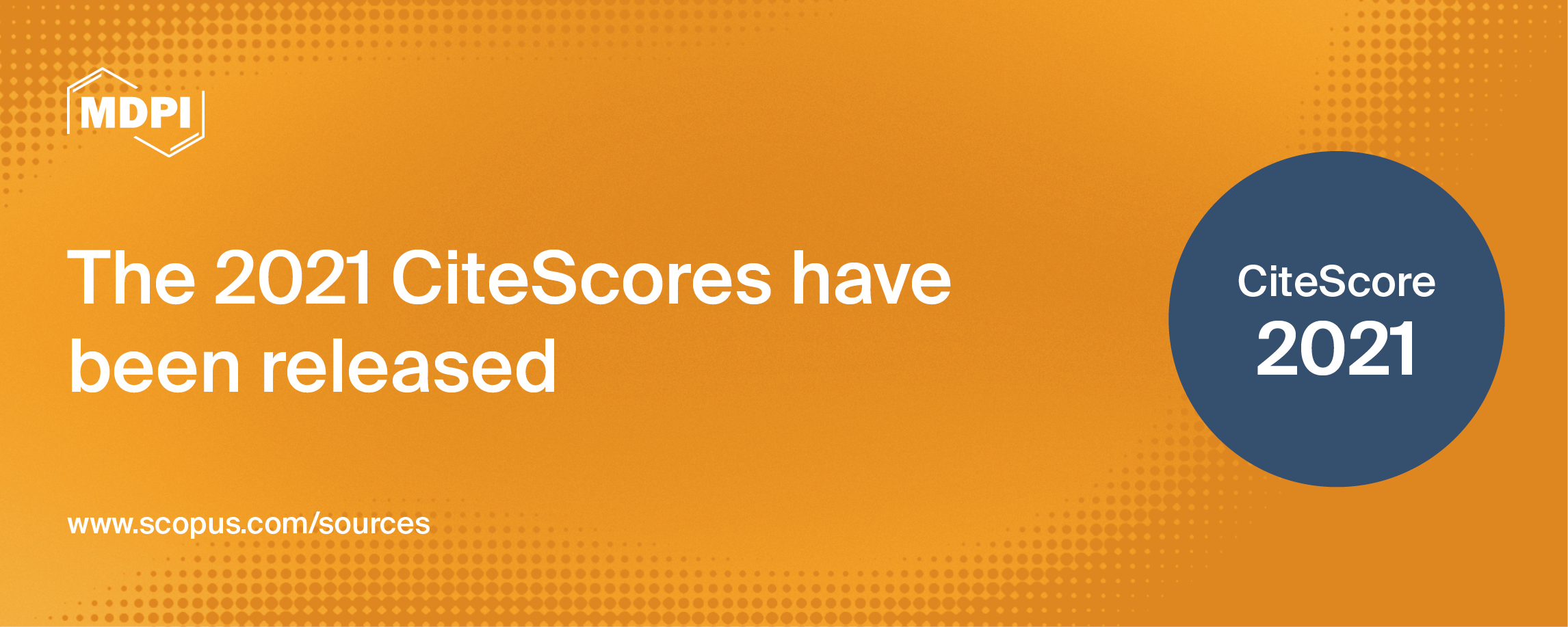
The 2021 citation metrics have been officially released in Scopus!
We are pleased to announce that 182 MDPI journals are included, of which:
● 21 journals received their first CiteScore.
● 85% of journals increased their CiteScore from 2020.
● 155 journals (85%) ranked above average, in at least one category.
The following 65 MDPI journals (36%) ranked among the top 25% of journals, in at least one category:
|
Journal |
CiteScore |
Quartile |
Category |
|
10.1 |
Q1 |
Genetics |
|
|
10.0 |
Q1 |
Biomedical Engineering |
|
|
8.1 |
Q1 |
Pharmacology, Toxicology and Pharmaceutics (miscellaneous) |
|
|
7.9 |
Q1 |
Electrical and Electronic Engineering |
|
|
7.9 |
Q1 |
Nutrition and Dietetics |
|
|
7.4 |
Q1 |
General Earth and Planetary Sciences |
|
|
7.2 |
Q1 |
Computer Science Applications |
|
|
6.9 |
Q1 |
Inorganic Chemistry |
|
|
6.9 |
Q1 |
Computer Networks and Communications |
|
|
6.7 |
Q1 |
General Biochemistry, Genetics and Molecular Biology |
|
|
6.6 |
Q1 |
General Chemical Engineering |
|
|
6.6 |
Q1 |
Health, Toxicology and Mutagenesis |
|
|
6.6 |
Q1 |
Infectious Diseases |
|
|
6.5 |
Q1 |
Food Science |
|
|
6.5 |
Q1 |
Civil and Structural Engineering |
|
|
6.4 |
Q1 |
Nature and Landscape Conservation |
|
|
6.4 |
Q1 |
Instrumentation |
|
|
6.1 |
Q1 |
Management Information Systems |
|
|
5.9 |
Q1 |
Chemistry (miscellaneous) |
|
|
5.7 |
Q1 |
Polymers and Plastics |
|
|
5.6 |
Q1 |
Engineering (miscellaneous) |
|
|
5.5 |
Q1 |
General Environmental Science |
|
|
5.5 |
Q1 |
Urban Studies |
|
|
5.4 |
Q2 |
Computer Networks and Communications |
|
|
5.3 |
Q1 |
Food Science |
|
|
5.3 |
Q1 |
Plant Science |
|
|
5.2 |
Q1 |
Ecology, Evolution, Behavior and Systematics |
|
|
5.2 |
Q1 |
General Engineering |
|
|
Journal of Open Innovation: Technology, Market, and Complexity |
5.1 |
Q1 |
Development |
|
5.0 |
Q1 |
Chemistry (miscellaneous) |
|
|
5.0 |
Q1 |
Control and Optimization |
|
|
5.0 |
Q1 |
Geography, Planning and Development |
|
|
5.0 |
Q1 |
Geography, Planning and Development |
|
|
4.9 |
Q1 |
Forestry |
|
|
4.9 |
Q1 |
Control and Optimization |
|
|
4.9 |
Q1 |
Soil Science |
|
|
4.8 |
Q1 |
General Earth and Planetary Sciences |
|
|
4.8 |
Q1 |
Mechanical Engineering |
|
|
4.8 |
Q1 |
Public Health, Environmental and Occupational Health |
|
|
4.8 |
Q1 |
Geography, Planning and Development |
|
|
International Journal of Environmental Research and Public Health |
4.5 |
Q1 |
Public Health, Environmental and Occupational Health |
|
4.5 |
Q1 |
Physical Therapy, Sports Therapy and Rehabilitation |
|
|
4.4 |
Q1 |
Mathematical Physics |
|
|
4.4 |
Q1 |
General Medicine |
|
|
4.3 |
Q1 |
General Mathematics |
|
|
4.2 |
Q1 |
Surgery |
|
|
4.1 |
Q1 |
Health Professions (miscellaneous) |
|
|
4.1 |
Q1 |
Plant Science |
|
|
4.0 |
Q1 |
General Engineering |
|
|
4.0 |
Q1 |
Forestry |
|
|
4.0 |
Q1 |
Education |
|
|
3.9 |
Q1 |
General Pharmacology, Toxicology and Pharmaceutics |
|
|
3.9 |
Q1 |
Applied Mathematics |
|
|
3.8 |
Q1 |
Development |
|
|
3.8 |
Q1 |
Architecture |
|
|
3.8 |
Q1 |
Metals and Alloys |
|
|
3.5 |
Q1 |
Communication |
|
|
3.4 |
Q1 |
General Social Sciences |
|
|
2.9 |
Q1 |
General Mathematics |
|
|
2.8 |
Q1 |
Analysis |
|
|
2.7 |
Q1 |
General Veterinary |
|
|
2.6 |
Q1 |
Algebra and Number Theory |
|
|
1.8 |
Q1 |
Conservation |
|
|
1.0 |
Q1 |
Religious Studies |
|
|
0.9 |
Q1 |
Philosophy |
Source: 2021 CiteScores™ (Elsevier)
2 June 2022
MDPI’s 2021 Outstanding Reviewer Awards in “Biology & Life Sciences”—Winners Announced
In order to acknowledge our reviewers, who so generously dedicate their time to reviewing papers and demonstrate diligence, professionalism, and timeliness when reviewing manuscripts, MDPI journals regularly offer outstanding reviewer awards to scholars who participate in the peer-review process.
We are proud to recognize winners for the year 2021 in the “Biology & Life Sciences” category for their outstanding contributions among extensive competition by presenting them with an Outstanding Reviewer Award.
We would like to take this opportunity to congratulate all the winners on their achievement.
MDPI will continue to provide support and recognition to the academic community.
- Enrico Vito Perrino, CIHEAM, Mediterranean Agronomic Institute of Bari, Italy
- Dhirendra Kumar, National Institute of Environmental Health Sciences, Research Triangle Park, USA
- Carlos A. Viegas, Univesity of Trás-os-Montes e Alto Douro, Portugal
- Yuri Shavrukov, Flinders University, Australia
- Bipin Gaihre, Mayo Clinic, USA
- Craig D. Workman, University of Iowa, USA
- Vivian Ciaramitaro, University of Massachusetts Boston, USA
- Yang Zhang, University of Minnesota, USA
- Bonam Srinivasa Reddy, Université de Paris, France
- Homma Takujiro, Yamagata University, Japan
- Hwang, In Koo, Seoul National University, South Korea
- Kobeissy Firas, University of Florida, USA
- Rebelo, Sandra, University of Aveiro, Portugal
- Günter Gollmann, University of Vienna, Austria
- Stephan Koblmüller, University of Graz, Austria
- Emiliano Mori, Istituto di Ricerca sugli Ecosistemi Terrestri, Italy
- Joshua D. Klein, Agricultural Research Organization—The Volcani Center, Israel
- Ana Cristina S Figueiredo, Faculdade de Ciências da Universidade de Lisboa, Portugal
- Carmelo Peter Bonsignore, Università Mediterranea di Reggio Calabria, Italy
- Klaus H. Hoffmann, University of Bayreuth, Germany
- Ivan Milosavljević, University of California, USA
- Remigiusz Bachor, University of Wrocław, Poland
- Nguyen Phuoc Long, Inje University College of Medicine, South Korea
- Chi Chen, University of Minnesota, USA
- Jadwiga Hamułka, Warsaw University of Life Sciences, Poland
- Grace Campbell, University of Sydney, Australia
- Nicholas Norwitz, Harvard Medical School, USA
- Stefan Kabisch, Charité University Hospital Berlin, Germany
- Luis Rodrigo, University of Oviedo, Spain
- Carlos Viegas, Univesity of Trás-os-Montes e Alto Douro, Portugal
- Arvind Sharma, The University of Queensland, Australia
2 June 2022
MDPI’s 2021 Young Investigator Awards in “Biology & Life Sciences”—Winners Announced
MDPI’s Young Investigator Awards recognize promising junior researchers, acknowledge their contributions, and enhance communication among scientists. We are proud to present the 2021 winners in the “Biology & Life Sciences” category. The winners were selected by the journals’ editors.
We warmly congratulate the awarded young investigators for their outstanding contributions.
MDPI will continue to provide support and recognition to the academic community.
- Carlos Guzmán, University of Cordoba, Spain
- Katharina Hohlbaum, Freie Universität Berlin, Germany
- Uri Ben-David, Tel Aviv University, Israel
- Enrico Lunghi, Institute of Zoology Chinese Academy of Sciences in Beijing, China
- Guodong Zhang, University of Massachusetts Amherst, USA
- Luke Bell, Temperate Horticulture, University of Reading, UK
International Journal of Molecular Sciences:
- Alessandro D’Urso, University of Catania, Italy.
- Apostolos Zaravinos, University of Cyprus, Cyprus
- Cesar de la Fuente-Nunez, University of Pennsylvania, USA
- Maria Teresa Caccamo, Messina University, Italy
- Tiziana Bonifacino, University of Genoa, Italy
- Federico Baltar, University of Vienna, Austria
- Rebecca Drummond, University of Birmingham, UK
- Miriam Oses-Ruiz, Public University of Navarre, Spain
Life:
- João Pedro da Silva Machado Lobo, University of Porto, Portugal
- Vincenzo Russo, University of Campania Luigi Vanvitelli, Italy
- Gabriele Rocchetti, Catholic University of Sacred Heart, Italy
- Fiona Lavelle, Queen's University Belfast, UK
- Matthew Snelson, Monash University, Australia
- Si Ming Man, Australian National University, Australia
- Jasper Fuk-Woo Chan, University of Hong Kong, China
- Stefania Sut, University of Padova, Italy
- Mohamed Ahmed El-Esawi, Tanta University, Tanta, Egypt
- Nicholas M. Provine, University of Oxford, UK
- Nicholas S. Heaton, Duke University, USA
2 June 2022
MDPI’s 2021 Travel Awards in “Biology & Life Sciences”—Winners Announced
We are proud to recognize the winners of MDPI’s 2021 Travel Awards in the “Biology & Life Sciences” category for their outstanding presentations and to present them with the prize.
MDPI journals regularly offer travel awards to encourage talented junior scientists to present their latest research at academic conferences in specific fields, which helps to increase their influence.
The winners mentioned below were carefully selected by the journal editors based on an outline of their research and the work to be presented at an academic conference.
We would like to warmly congratulate the winners of 2021 Travel Awards and wish them the greatest success with their future research endeavors. MDPI will continue to enhance communication among scientists.
- Zahra Bitarafan, Norwegian Institute of Bioeconomy Research (NIBIO), Norway
- Nikolaos Tsoulias, Leibniz Institute for Agricultural Engineering and Bioeconomy (ATB), Germany
- Michela Verni, University of Bari, Italy
- Philipp Demling, RWTH Aachen University, Germany
- Jagveer Singh, Punjab Agricultural University, India
- Ibrar Hussain, State University of Londrina, Brazil
- Francis Muchaamba, University of Zurich, Switzerland
- Tanja Eisemann, SBP Medical Discovery Institute, USA
- Mrinalini Dey, National Institute for Health Research, UK
- Ben Kirk, University of Melbourne, Australia
- Kirrilly Pursey, University of Newcastle, Australia
- Dieuwertje Kok, Wageningen University, the Netherlands
- Hanna Huber, University of Bonn, Germany
- Marlene Lages, University of Porto, Portugal
- Zohra S. Lassi, University of Adelaide, Australia
- Rik Olde Engberink, Amsterdam University Medicial Center, the Netherlands
- Sarah Warkentin, University of Porto (ISPUP), Portugal
- Álvaro Hernáez, Norwegian Institute of Public Health, Norway
- Leila Abdelhamid, Virginia-Maryland College of Veterinary Medicine, Virginia Tech, USA
- Maria Michela Cesare, University of Siena, Italy
- Kaisa Hiippala, University of Helsinki, Finland
- Vanessa Silva, University of Trás-os-Montes and Alto Douro, Portugal
- Hejun Liu, Scripps Research Institute, USA
- Tomokazu Tamura, Princeton University, USA
- Cecilie Knudsen, Technical University of Denmark, Denmark
- Laura Biessy, Cawthron Institute, New Zealand
- Marcelo Mendes Rabelo, University of Florida, USA
- Hee Chun Chung, Seoul National University, South Korea
- Alejandro Marin Lopez, Yale University, USA
2 June 2022
MDPI’s 2021 Best Paper Awards in “Biology & Life Sciences”—Winners Announced
The purpose of our Best Paper Awards is to promote and recognize the most impactful contributions published within MDPI journals.
The editors of each journal carefully selected reviews and research papers through a rigorous judging process based on criteria such as the scientific merit, overall impact, and the quality of presentation of the papers published in the journal last year.
We are honored to present the winners in the subject areas of “Biology & Life Sciences”, who were selected amongst extensive competition, and congratulate the authors for their outstanding scientific publications.
MDPI will continue to provide support and recognition to the academic community.
by Wenchao Liu, Yilin Yuan, Chenyu Sun, Balamuralikrishnan Balasubramanian, Zhihui Zhao and Lilong An
Animals 2019, 9(8), 506, doi 10.3390/ani9080506
by Peter Coals, Dawn Burnham, Andrew Loveridge, David W. Macdonald, Michael ’t Sas-Rolfes, Vivienne L. Williams and John A. Vucetich
Animals 2019, 9(2), 52; doi 10.3390/ani9020052
by Giovanni Sogari, Mario Amato, Ilaria Biasato, Silvana Chiesa and Laura Gasco
Animals 2019, 9(4), 119; doi 10.3390/ani9040119
by Mark L. Chiu; Dennis R. Goulet; Alexey Teplyakov and Gary L. Gilliland
Antibodies 2019, 8(4), 55; doi 10.3390/antib8040055
by Luca Frattaruolo, Gabriele Carullo, Matteo Brindisi, Sarah Mazzotta, Luca Bellissimo, Vittoria Rago, Rosita Curcio, Vincenza Dolce, Francesca Aiello and Anna Rita Cappello
Antioxidants 2019, 8(6), 186; doi 10.3390/antiox8060186
by Chunhe Gu, Kate Howell, Frank R. Dunshea and Hafiz A. R. Suleria
Antioxidants 2019, 8(9), 405; doi 10.3390/antiox8090405
by Spyridon A. Petropoulos, Ângela Fernandes, Maria Inês Dias, Ioannis B. Vasilakoglou, Konstantinos Petrotos, Lillian Barros and Isabel C. F. R. Ferreira
Antioxidants 2019, 8(8), 293; doi 10.3390/antiox8080293
by Rubén Domínguez, Mirian Pateiro, Mohammed Gagaoua, Francisco J. Barba, Wangang Zhang and José M. Lorenzo
Antioxidants 2019, 8(10), 429; doi 10.3390/antiox8100429
by Michael H. Hastings, Elizabeth S. Maywood and Marco Brancaccio
Biology 2019, 8(1), 13; doi 10.3390/biology8010013
by Gail D. Schwieterman, Daniel P. Crear, Brooke N. Anderson, Danielle R. Lavoie, James A. Sulikowski, Peter G. Bushnell and Richard W. Brill
Biology 2019, 8(3), 56; doi 10.3390/biology8030056
by Shuichi Nakamura and Tohru Minamino
Biomolecules 2019, 9(7), 279; doi 10.3390/biom9070279
by Dmitrii Usoltsev, Vera Sitnikovaandrey Kajava and Mayya Uspenskaya
Biomolecules 2019, 9(8), 359; doi 10.3390/biom9080359
by Gerhard Liebisch, Josef Ecker, Sebastian Roth, Sabine Schweizer, Veronika Öttl, Hans-Frieder Schött, Hongsup Yoon, Dirk Haller, Ernst Holler, Ralph Burkhardt and Silke Matysik
Biomolecules 2019, 9(4), 121; doi 10.3390/biom9040121
by Anna Janaszewska, Joanna Lazniewska, Przemysław Trzepiński, Monika Marcinkowska and Barbara Klajnert-Maculewicz
Biomolecules 2019, 9(8), 330; doi 10.3390/biom9080330
by Heng Sheng Sow, Jiang Ren, Marcel Camps, Ferry Ossendorp and Peter ten Dijke
Cells 2019, 8(4), 320; doi 10.3390/cells8040320
by Dinender K. Singla, Taylor A. Johnson and Zahra Tavakoli Dargani
Cells 2019, 8(10), 1224; doi 10.3390/cells8101224
by Laura M. Doyle and Michael Zhuo Wang
Cells 2019, 8(7), 727; doi 10.3390/cells8070727
by Yu Han, Xuezhou Li, Yanbo Zhang, Yuping Han, Fei Chang and Jianxun Ding
Cells 2019, 8(8), 886; doi 10.3390/cells8080886
by Sarah B. Kingan, Haynes Heaton, Juliana Cudini, Christine C. Lambert, Primo Baybayan, Brendan D. Galvin, Richard Durbin, Jonas Korlach and Mara K. N. Lawniczak
Genes 2019, 10(1), 62; doi 10.3390/genes10010062
by Katherine E Bohnsack, Claudia Höbartner and Markus T Bohnsack
Genes 2019, 10(2), 102; doi 10.3390/genes10020102
by Laura M. Boykin, Peter Sseruwagi, Titus Alicai, Elijah Ateka, Ibrahim Umar Mohammed, Jo-Ann L. Stanton, Charles Kayuki, Deogratius Mark, Tarcisius Fute, Joel Erasto, Hilda Bachwenkizi, Brenda Muga, Naomi Mumo, Jenniffer Mwangi, Phillip Abidrabo, Geoffrey Okao-Okuja, Geresemu Omuut, Jacinta Akol, Hellen B. Apio, Francis Osingada, Monica A. Kehoe, David Eccles, Anders Savill, Stephen Lamb, Tonny Kinene, Christopher B. Rawle, Abishek Muralidhar, Kirsty Mayall, Fred Tairo and Joseph Ndunguru
Genes 2019, 10(9), 632; doi 10.3390/genes10090632
by Elamin Hafiz Baillo, Roy Njoroge Kimotho, Zhengbin Zhang and Ping Xu
Genes 2019, 10(10), 771; doi 10.3390/genes10100771
by Lida Fuentes, Carlos R. Figueroa and Monika Valdenegro
Horticulturae 2019, 5(2), 45; doi 10.3390/horticulturae5020045
by Marta Guarise, Gigliola Borgonovo, Angela Bassoli and Antonio Ferrante
Horticulturae 2019, 5(1), 13; doi 10.3390/horticulturae5010013
by Rik Clymans, Vincent Van Kerckvoorde, Eva Bangels, Wannes Akkermans, Ammar Alhmedi, Patrick De Clercq, Tim Beliën and Dany bylemans
Insects 2019, 10(7), 200; doi 10.3390/insects10070200
by Marc Kenis, Hannalene du Plessis, Johnnie Van den Berg, Malick Niango Ba, Georg Goergen, Koffi Eric Kwadjo, Ibrahim Baoua, Tadele Tefera, Alan Buddie, Giovanni Cafà, Lisa Offord, Ivan Rwomushana and Andrew Polaszek
Insects 2019, 10(4), 92; doi 10.3390/insects10040092
by Rafael R. da Costa, Haofu Hu, Hongjie Li and Michael Poulsen
Insects 2019, 10(4), 87; doi 10.3390/insects10040087
International Journal of Molecular Sciences:
by Rüdiger Hardeland
Int. J. Mol. Sci. 2019, 20(5), 1223; doi 10.3390/ijms20051223
by Elise Lévy, Nadine El Banna, Dorothée Baïlle, Amélie Heneman-Masurel, Sandrine Truchet, Human Rezaei, Meng-Er Huang, Vincent Béringue, Davy Martin and Laurence Vernis
Int. J. Mol. Sci. 2019, 20(16), 3896; doi 10.3390/ijms20163896
by Beatriz Herrero-Fernandez, Raquel Gomez-Bris, Beatriz Somovilla-Crespo and Jose Maria Gonzalez-Granado
Int. J. Mol. Sci. 2019, 20(21), 5293; doi 10.3390/ijms20215293
by Claudia Beaurivage, Elena Naumovska, Yee Xiang Chang, Edo D. Elstak, Arnaud Nicolas, Heidi Wouters, Guido van Moolenbroek, Henriëtte L. Lanz, Sebastiaan J. Trietsch, Jos Joore, Paul Vulto, Richard A.J. Janssen, Kai S. Erdmann, Jan Stallen and Dorota Kurek
Int. J. Mol. Sci. 2019, 20(22), 5661; doi 10.3390/ijms20225661
by Maiko Okano, Masanori Oshi, Ali Linsk Butash, Eriko Katsuta, Kazunoshin Tachibana, Katsuharu Saito, Hirokazu Okayama, Xuan Peng, Li Yan, Koji Kono, Toru Ohtake and Kazuaki Takabe
Int. J. Mol. Sci. 2019, 20(17), 4197; doi 10.3390/ijms20174197
by Shaista Afroz, Rieko Arakaki, Takuma Iwasa, Masamitsu Oshima, Maki Hosoki, Miho Inoue, Otto Baba, Yoshihiro Okayama and Yoshizo Matsuka
Int. J. Mol. Sci. 2019, 20(3), 711; doi 10.3390/ijms20030711
Life:
by Márió Gajdács, Zoltán Bátori, Marianna Ábrók, Andrea Lázár and Katalin Burián
Life 2020, 10(2), 16; doi 10.3390/life10020016
by Carla Ferreira, Catarina Almeida, Sandra Tenreiro and Alexandre Quintas
Life 2020, 10(6), 86; doi 10.3390/life10060086
by Ronald D. Hills, Benjamin A. Pontefract, Hillary R. Mishcon, Cody A. Black, Steven C. Sutton and Cory R. Theberge
Nutrients 2019, 11(7), 1613; doi 10.3390/nu11071613
by Harri Hemilä and Elizabeth Chalker
Nutrients 2019, 11(4), 708; doi 10.3390/nu11040708
by Humaira Jamshed, Robbie A. Beyl, Deborah L. Della Manna, Eddy S. Yang, Eric Ravussin and Courtney M. Peterson
Nutrients 2019, 11(6), 1234; doi 10.3390/nu11061234
by Israr Kha, Naeem Ullah, Lajia Zha, Yanrui Bai, Ashiq Khan, Tang Zhao, Tuanjie Che and Chunjiang Zhang
Pathogens 2019, 8(3), 126; doi 10.3390/pathogens8030126
by Spyridoula-Angeliki Nikou,Nessim Kichik, Rhys Brown, Nicole O. Ponde, Jemima Ho, Julian R. Naglik and Jonathan P. Richardson
Pathogens 2019, 8(2), 53; doi 10.3390/pathogens8020053
by Steven Batinovic, Flavia Wassef, Sarah A. Knowler, Daniel T.F. Rice, Cassandra R. Stanton, Jayson Rose, Joseph Tucci, Tadashi Nittami, Antony Vinh, Grant R. Drummond, Christopher G. Sobey, Hiu Tat Chan, Robert J. Seviour, Steve Petrovski and Ashley E. Franks
Pathogens 2019, 8(3), 100; doi 10.3390/pathogens8030100
by Muhammad Hammad Saleem, Johan Potgieter and Khalid Mahmood Arif
Plants 2019, 8(11), 468; doi 10.3390/plants8110468
by Ida Linić, Dunja Šamec, Jiří Grúz, Valerija Vujčić Bok, Miroslav Strnad and Branka Salopek-Sondi
Plants 2019, 8(6), 155; doi 10.3390/plants8060155
by Marie Agatha Mohn, Besarta Thaqi and Katrin Fischer-Schrader
Plants 2019, 8(3), 67; doi 10.3390/plants8030067
by Chiara Biselliandrea Volante, Francesca Desiderio, Alessandro Tondelli, Alberto Gianinetti, Franca Finocchiaro, Federica Taddei, Laura Gazza, Daniela Sgrulletta, Luigi Cattivelli and Giampiero Valè
Plants 2019, 8(8), 292; doi 10.3390/plants8080292
25 March 2022
Brain Sciences | Call for Special Issue Proposals
Brain Sciences (ISSN: 2076-3425) is an international, peer-reviewed, open access journal on neuroscience. It has been covered by leading indexing services, including Scopus, SCIE (Web of Science), PubMed, PMC, etc. The 2020 Impact Factor was 3.394. The aims and scope of the journal can be found at the following link: https://www.mdpi.com/journal/brainsci/about.
The Brain Sciences editorial team is pleased to announce this open call for Special Issue proposals, which offers a group of authors the opportunity to work on an interconnected set of papers on an innovative topic. Special Issues are led by Guest Editors who are experts in the subject and oversee the editorial process for papers.
Proposals for Special Issues should be sent to the Editorial Office (brainsci@mdpi.com) or via the website: https://www.mdpi.com/journalproposal/sendproposalspecialissue/brainsci.
Information to be provided in a proposal:
- A 150–200-word summary that clearly states the significance, novelty, technical advancement, and adherence to the scope of the journal of the proposed topic;
- A list of 5–10 keywords on the topic;
- A brief resume of proposed Guest Editors, together with their information (title, name, email, affiliation, personal website, keywords of interests);
- A proposed submission deadline (a Special Issue will usually be open for submissions for 6–8 months);
- A list of at least 20 potential contributors or a list of 8 planned papers.
As a Guest Editor, you would be responsible for:
- Inviting papers from your peers to be published in your Special Issue;
- Checking the suitability of abstracts/manuscripts submitted to the Special Issue;
- Making pre-check decisions regarding whether to send a new submission to peer review;
- Making final decisions regarding whether to accept or reject a paper based on peer-review outcomes.
As a Guest Editor, you would have the following privileges:
- A recognition certificate as a Guest Editor of Brain Sciences;
- The opportunity to publish one paper free of charge in your Special Issue;
- The ability to invite high-quality papers to be published in your Special Issue free of charge or with certain discounts;
- A printed book version of your Special Issue if at least 10 accepted manuscripts are published after full peer review.
Editorial Office’s responsibility:
The Editorial Office will set up the Special Issue website, arrange promotional material, assist with paper invitations, and take care of the administrative tasks associated with peer review, including inviting reviewers, collecting reports, contacting authors, and arranging professional production before publication.
Please do not hesitate to contact the Editorial Office (brainsci@mdpi.com) if you are interested and would like further details and clarifications.
We look forward to receiving your proposals.
Brain Sciences Editorial Office
21 December 2021
Recruiting Section Editors-in-Chief for Brain Sciences
Brain Sciences (ISSN: 2076-3425) is recruiting Editors-in-Chief for the following fourteen Sections:
- “Sensory and Motor Neuroscience”;
- “Social Cognitive and Affective Neuroscience”;
- “Neurorehabilitation”;
- “Neurodegenerative Diseases”;
- “Educational Neuroscience”;
- “Neuropharmacology”;
- “Neuroscience of Pain”;
- “Neuro-oncology”;
- “Neurotology and Neuro-ophthalmology”;
- “Neural Control of Peripheral Function”;
- “Neuroenergetics Nutrition and Brain Health”;
- “Neurosurgery and Neuroanatomy”;
- “Neuropathology”;
- “Neurovirology”.
As a Section Editor-in-Chief, you would have the following responsibilities:
- Making decisions on whether a manuscript can be accepted or not based on the reports that we collect;
- Checking and approving potential Special Issues in the Section, suggesting special topics or editing a Special Issue on a topic related to your research interests when it is convenient for you;
- Recommending Section Board Members to join and contribute to editorial work;
- Promoting the journal and increasing its visibility at related academic conferences;
- Advising on journal development.
21 December 2021
Welcoming New Editorial Board Members of Brain Sciences
We are delighted to welcome the following recognized researchers, who recently joined the Editorial Board of Brain Sciences (ISSN: 2076-3425):
- Prof. Dr. Antoni Rodriguez-Fornells;
- Prof. Dr. Jaime Kulisevsky;
- Dr. Matthew J. Hoptman;
- Dr. Lijian Yang.
We wish them every success in developing the journal.
Further details concerning the Editorial Board can be found at: https://www.mdpi.com/journal/brainsci/editors.
22 November 2021
722 MDPI Editorial Board Members Receiving "2021 Highly Cited Researchers" Distinction
It is our great honor to congratulate the Editorial Board Members and Editors in MDPI's journals who have been distinguished as 2021 Highly Cited Researchers by Clarivate, according to Web of Science data. We herewith express our gratitude for the immense impact the named researchers continue to make on scientific progress and on our journals' development.
Clarivate's annual list of Highly Cited ResearchersTM identifies the most highly cited scientists for the past decade. Their impactful papers are among the top 1 per cent in the citation distribution of one or more of 22 fields analyzed in the "Essential Science Indicators", distinguishing them as hugely influential among their peers.
| Abate, Antonio Abatzoglou, John T. Abbaszadeh, Mostafa Acharya, U. Rajendra Acharya, Viral V. Agarwal, Ravi P. Ahn, Myung-Ju Airoldi, Laura Ali, Imran Allakhverdiev, Suleyman I. Aluko, Rotimi E. Anasori, Babak Andersson, Dan I. Andes, David Anker, Stefan D. Apergis, Nicholas Ariga, Katsuhiko Arqub, Omar Abu Aschner, Michael Assaraf, Yehuda G. Astruc, Didier Atala, Anthony Atanasov, Atanas G. Atangana, Abdon Bahram, Mohammad Bakris, George L. Balandin, Alexander A. Baleanu, Dumitru Balsamo, Gianpaolo Bando, Yoshio Banks, William A. Bansal-Travers, Maansi Barba, Francisco J. Barros, Lillian Basit, Abdul W. Baskonus, Haci Mehmet Bassetti, Matteo Battino, Maurizio Bell, Jordana T. Bellomo, Nicola Benediktsson, Jon Atli Benelli, Giovanni Benjakul, Soottawat Bhatnagar, Amit Biddle, Stuart J. H. Biondi, Antonio Biondi-Zoccai, Giuseppe Bjarnsholt, Thomas Blaabjerg, Frede Blaschke, Thomas Blay, Jean-Yves Blumwald, Eduardo Blunt, John W. Boffetta, Paolo Bogers, Marcel Bonomo, Robert A. Bowman, David M.J.S. Boyer, Cyrille Brestic, Marian Brevik, Eric C. Buhalis, Dimitrios Burdick, Jason A. Byrd, John C. Cabeza, Luisa F. Cai, Xingjuan Cai, Jianchao Calhoun, Vince D. Calin, George Cao, Jinde Cao, Guozhong Carvalho, Andre F. Castellanos-Gomez, Andres Cerqueira, Miguel Ângelo Parente Ribeiro Chang, Jo-Shu Chang, Chih-Hao Chastin, Sebastien Chau, Kwok-wing Chemat, Farid Chen, Xiaobo Chen, YangQuan Chen, Jianmin Chen, Chaoji Chen, Min Chen, Qi Chen, Jun Chen, Xi Chen, Peng Chen, Yulin Chen, Bo Chen, Chen Chen, Zhi-Gang Chen, Wei-Hsin Chen, Gang Chen, Yongsheng Chen, Xiang Chen, Yimin Chen, Runsheng Chen, Lidong Chen, Shaowei Chen, Qian Chen, Yu Chen, Shuangming Chiclana, Francisco Cho, Sun Young Choi, Wonyong Chowdhary, Anuradha Choyke, Peter L. Cichocki, Andrzej Corella, Dolores Corma, Avelino Cortes, Javier Cortes, Jorge Costanza, Robert Crommie, Michael F. Cui, Yi Cui, Haiying Cui, Qinghua Cummings, Kenneth Michael Dai, Shifeng Dai, Sheng Daiber, Andreas Davis, Steven J. Dawson, Ted M. de la Fuente-Nunez, Cesar Decker, Eric Andrew Dekel, Avishai Demaria, Marco Deng, Yong Deng, Xiangzheng DePinho, Ronald A. Desneux, Nicolas Dimopoulos, Meletios-Athanasios Ding, Aijun Dionysiou, Dionysios D. Dokmeci, Mehmet Remzi Dolgui, Alexandre Dong, Fan Dou, Shi Xue Dou, Letian Du, Qian Du, Bo Dube, Shanta Rishi Dufresne, Alain Dummer, Reinhard Dupont, Didier Edwards, David Elaissari, Abdelhamid Elhoseny, Mohamed Ellahi, Rahmat Ellis, Erle C. ElMasry, Gamal Esteller, Manel Estévez, Mario Fabbro, Doriano Facchetti, Antonio Fan, Zhanxi Fang, Chuanglin Fasano, Alessio Fečkan, Michal Felser, Claudia Feng, Liangzhu Fensholt, Rasmus Ferdinandy, Péter Fernandez-Lafuente, Roberto Ferreira, Isabel C. F. R. Filippi, Massimo Fisher, Helen Fortino, Giancarlo Fosso Wamba, Samuel Franceschi, Claudio Fujita, Hamido Fujita, Masayuki Gai, Francesco Gaisford, Simon Galanakis, Charis M. Galluzzi, Lorenzo Galvano, Fabio Gan, Ren-You Gan, Lihua Gandomi, Amir H. Gao, Bin Gao, Feng Gao, Minrui Gao, Huijun Gao, Wei Gao, Huile Garbe, Claus Garcia, Hermenegildo Gasbarrini, Antonio Gasco, Laura Gautret, Philippe Geng, Yong Gerdts, Gunnar Geschwind, Daniel H. Ghadimi, Noradin Ghaffari, Roozbeh Ghamisi, Pedram Giampieri, Francesca Glick, Bernard R. Gnant, Michael Goel, Ajay Gogotsi, Yury Goldewijk, Kees Klein Gong, Jinlong Gong, Yongji Govindan, Kannan Granato, Daniel Grancini, Giulia Green, Douglas R. Grosso, Giuseppe Gu, Ke Guan, Cao Guastella, Adam J. Guerrero, Josep M. Gui, Guan Guizani, Mohsen Guo, Zaiping Gupta, Rangan Gutzmer, Ralf Haase, Dagmar Habibi-Yangjeh, Aziz Hagemann, Stefan Hagger, Martin Hamblin, Michael R. Hammoudeh, Shawkat Han, Heesup Hanes, Justin Harrison, Roy M. Hartung, Hans-Peter Hasanuzzaman, Mirza He, Jr-Hau He, Hongwen He, Jiaqing He, Debiao Henseler, Jörg Herrera, Francisco Herrera-Viedma, Enrique Hetz, Claudio Ho Kim, Jung Holmes, Elaine Hossain, Ekram Hsueh, Po-Ren Hu, Xiaosong Hu, Wenbin Huang, Jianping Huang, Hongwei Huang, Yu Huang, Jianying Huang, Peng Huang, Baibiao Huang, Shaoming Hubacek, Klaus |
Iqbal, Hafiz M. N. |
Saad, Fred |
The full list of 2021 Highly Cited Researchers can be accessed at the following webpage in the Web of ScienceTM https://recognition.webofscience.com/awards/highly-cited/2021/.
--- Highly Cited Researchers (HCR) is a Clarivate product.
16 November 2021
Topical Advisory Panel Established to Support Editorial Board
Academic editors play a crucial role in leading our journals and ensuring that each article undergoes a robust and timely peer-review. With the launch of Topics this year and addition of Topic Editors to our family of academic editors, we decided it would be a good time to restructure our academic boards, thus providing more clarity and support for each role. MDPI is pleased to announce the launch of a new position—Topical Advisory Panel Member, that will replace the previous position of Topics Board Member. The Topical Advisory Panel will be comprised of early career researchers eager to gain experience in editorial work.
The main responsibility of the new members of the Topical Advisory Panel is to regularly provide support to Guest Editors, Topic Editors, and Section Board Members. The responsibilities of the Topical Advisory Panel are available here: https://www.mdpi.com/editors.
Each year, the members’ performances are evaluated, and outstanding members are promoted to the Editorial Board by the Editor-in-Chief.
To qualify as a Topical Advisory Panel Member, applicants must:
- Have expertise and experience in the field related to the journal;
- Have received a Ph.D. in the last 10 years, approximately;
- Have at least 6-8 published papers in the last 5 years as first author or corresponding author;
- Currently hold an independent research position in academia or a government institute.
If you are interested in this role, please contact the editorial office by email.
We look forward to hearing from you soon.
25 October 2021
Open Access Week 2021 | It Matters How We Open Knowledge: Building Structural Equity, 25–31 October

Founded in 1996, MDPI was one of the first fully Open Access publisher. Over 25 years MDPI has grown to become the largest Open Access publisher globally, publishing over 160,000 articles across more than 350 journals in 2020. At the core, MDPI was founded in response to a pressing need of fast publication and inclusion. The scholar was set at the centre of the publication process for the first time. Acting as a service provider, rather than a product provider, MDPI exists to help scientists achive their objective to disseminate research results. At MDPI, we believe scientists deserve a better service from the publishing world.
The International Open Access Week (Open Access Week), founded by the SPARC (the Scholarly Publishing and Academic Resources Coalition) Alliance and student partners in 2008, has been successfully running for 13 years. As an advocate and pioneer of open access publishing, MDPI actively responds to the call of International Open Access Week. This year’s theme of “It Matters How We Open Knowledge: Building Structural Equity” highlights the Recommendation’s call for equitable participation from all authors and readers.
For the last 25 years, MDPI has been committed to disseminating open research. Here is a video showing MDPI’s Commitment to Equity, Inclusion and Diversity for More than 25 Years.
International Open Access Week is an important opportunity to catalyze new conversations, create connections across and between communities that can facilitate this co-design, and advance progress in the building of more equitable foundations for opening knowledge—discussions and actions that need to be continued, year in and year out. MDPI has always aimed to provide professional and efficient publishing services to scholars around the world.
Our mission is to make scientific research accessible to everyone; this year, we interview and hold discussions with open science ambassadors on how to build an equal and inclusive environment for open science. Academic editors help us collaborate with more institutions to advocate for open access ideas.
Besides this, our scientific community is a key driver of our success and MDPI’s remarkable growth. Despite the pandemic, we have prepared online conferences and workshops to gather scholars from different communities.
The Basel Sustainable Publishing online forum provides an equal opportunity for stakeholders and researchers from multi-cultural environments to exchange ideas and eliminate barriers to participation.
Conference date: 25 October 2021, online
Conference website: https://bspf2021.sciforum.net/
Main topics: MDPI discusses the current dilemma of open access science from various perspectives such as governments, libraries, and publishers, and related measures on how to change the status quo of discrimination from a global perspective.
We aim to support equality, inclusion, diversity, and accessibility in scholarly communications. We collaborate with universities and key laboratories and have scholarly communications with researchers, teachers, and students on open access workshops.

- 25 October 2021
Energies journal and Institute of Mechanics, Chinese Academy of Sciences
- 28 October 2021
Machines journal and State Key Laboratory of Traction Power, Southwest Jiaotong University
- 29 October 2021
Processes journal and Beijing Institute of Technology
- 29 October 2021
Coatings journal and Wuhan University of Technology
MDPI is committed to providing open access and high-quality publishing services for scholars and promoting rapid dissemination of academic achievements. We hope to promote the practices and policies of open access publishing and diversify the dissemination of academic achievements.
23 September 2021
2020 MDPI Top Reviewer Award—Winners Announced

Rigorous peer-review is the cornerstone of high-quality academic publishing. Over 369,916 scholars served as reviewers for MDPI journals in 2020. We are extremely appreciative of all those who made a contribution to the editorial process in this capacity. At the beginning of every year, journal editorial offices publish a list of all reviewers’ names to express our gratitude. In addition, this year, the MDPI Top Reviewer Award was announced, to recognize the very best reviewers for their expertise and dedication, and their high-quality, and timely review reports. We are pleased to announce the following winners of the 2020 MDPI Top Reviewer Award:
- Adriana Burlea-Schiopoiu;
- Alban Kuriqi;
- Álvaro González-Vila;
- Alessandro Alaimo;
- Alexey Beskopylny;
- Alexander Yu Churyumov;
- Alberto Fernández-Isabel;
- Andrea Mastinu;
- Antonios N. Papadopoulos;
- Anton Rassõlkin;
- Antonio Humberto Hamad Minervino;
- Arkadiusz Matwijczuk;
- Artur Słomka;
- Baojie He;
- Bartłomiej Potaniec;
- Bojan Đurin;
- Camilo Arturo Rodriguez Diaz;
- Carmelo Maria Musarella;
- Chiachung Chen;
- Chiman Kwan;
- Cristian Busu;
- Danil Pimenov;
- Dan-Cristian Dabija;
- Delfín Ortega-Sánchez;
- Demetrio Antonio Zema;
- Denis Butusov;
- Elena Lucchi;
- Gaurab Dutta;
- Livia Anastasiu;
- M. R. Safaei.
For more information about how to become a reviewer of MDPI journals, please see: www.mdpi.com/reviewers.
22 September 2021
MDPI Joins SDG Publishers Compact

UN's 17 Sustainable Development Goals (SDGs) are the blueprint to achieve a better and more sustainable future for all. In 2020 the SDG Publishers Compact was launched, aimed to inspire publishers and accelerate progress to achieve the 17 goals by 2030. Members of the programme are committed to support the publication of materials that will promote and inspire actions towards SDGs.
MDPI is an eager advocate of SDGs and has already been supporting the programme by creating Special Issues and publishing a series of books on SDGs prior to joining the Compact in 2021. MDPI's Sustainability Foundation initiated the World Sustainability Awards in 2016. We fully support UN's goals to promote sustainable actions that make the world a better place for all and, as part of its commitment, we will focus our actions on SDG10: Reduced Inequalities whilst promoting all 17 SDGs. For more details, please visit the programme’s website: https://www.un.org/sustainabledevelopment/sdg-publishers-compact/.
Joining this initiative was a unanimous decision. MDPI has in its core values the dissemination of science for all, breaking the wall between research access and under-represented members of the scientific community and the general population. To support this initiative further and continue to support under-represented scientists, MDPI will take a series of actions that will be announced once ready.
The first action MDPI takes is to nominate Dr. Liliane Auwerter as the coordinator of the programme. Dr. Auwerter studied Environmental Process Technology (UTFPR, Brazil), obtained her MSc degree in Water and Environmental Engineering (University of Surrey, UK) and in 2020 completed her PhD in self-healing low-friction materials for water transport (Imperial College London, UK), always focusing on diverse scientific projects that would potentially bring sustainability to industrial processes. As a student in Brazil, she engaged in volunteering activities focused on environmental education and took part in the Millennial Development Goals meetings held at the university.
For more information, please contact:
Dr. Liliane Auwerter
Scientific Officer
liliane.auwerter@mdpi.com
3 August 2021
Announcement on Japanese Consumption Tax (JCT)
This serves to announce to our valued authors based in Japan that value-added tax, or consumption tax will now be imposed on article processing fees and other service fees for all papers submitted, or resubmitted (assigned new paper IDs), effective from 15 August 2021. The change is in accordance with the Japanese "Act for Partial Revision of the Income Tax Act and Other Acts" (Act No. 9 of 2015), which includes a revision of consumption taxation on cross-border supplies of services such as digital content distribution.
For additional information from the National Tax Agency please see here ("Cross-border supplies of electronic services").
Contact: Setsuko Nishihara, MDPI Tokyo
30 June 2021
2020 Impact Factors - Released
The 2020 citation metrics have been officially released in the Journal Citation Reports (JCR)!
We are pleased to announce that 85 MDPI journals are included, of which:
- 10 journals received their first impact factor
- 96% of journals increased their impact factor from 2019
- 32 journals (38%) ranked among the top 25% of journals, in at least one category
| Journal | Impact Factor | Rank | Category |
| Cancers | 6.639 | Q1 | • Oncology |
| Cells | 6.600 | Q2 | • Cell Biology |
| Pharmaceutics | 6.321 | Q1 | • Pharmacology & Pharmacy |
| Antioxidants | 6.313 | Q1 | • Food Science & Technology |
| • Biochemistry & Molecular Biology | |||
| • Chemistry, Medicinal | |||
| Biomedicines | 6.081 | Q1 | • Medicine, Research & Experimental |
| • Pharmacology & Pharmacy | |||
| • Biochemistry & Molecular Biology | |||
| International Journal of Molecular Sciences | 5.924 | Q1 | • Biochemistry & Molecular Biology |
| Q2 | • Chemistry, Multidisciplinary | ||
| Pharmaceuticals | 5.863 | Q1 | • Pharmacology & Pharmacy |
| • Chemistry, Medicinal | |||
| Journal of Fungi | 5.816 | Q1 | • Mycology |
| • Microbiology | |||
| Nutrients | 5.719 | Q1 | • Nutrition & Dietetics |
| Biosensors | 5.519 | Q1 | • Chemistry, Analytical |
| • Instruments & Instrumentation | |||
| Q2 | • Nanoscience & Nanotechnology | ||
| Marine Drugs | 5.118 | Q1 | • Chemistry, Medicinal |
| • Pharmacology & Pharmacy | |||
| Biology | 5.079 | Q1 | • Biology |
| Nanomaterials | 5.076 | Q1 | • Physics, Applied |
| Q2 | • Chemistry, Multidisciplinary | ||
| • Materials Science, Multidisciplinary | |||
| • Nanoscience & Nanotechnology | |||
| Viruses | 5.048 | Q2 | • Virology |
| Journal of Personalized Medicine | 4.945 | Q1 | • Medicine, General & Internal |
| • Health Care Sciences & Services | |||
| Metabolites | 4.932 | Q2 | • Biochemistry & Molecular Biology |
| Biomolecules | 4.879 | Q2 | • Biochemistry & Molecular Biology |
| Remote Sensing | 4.848 | Q1 | • Geosciences, Multidisciplinary |
| Q2 | • Remote Sensing | ||
| • Imaging Science & Photographic Technology | |||
| • Environmental Sciences | |||
| Gels * | 4.702 | Q1 | • Polymer Science |
| Antibiotics | 4.639 | Q2 | • Infectious Diseases |
| • Pharmacology & Pharmacy | |||
| Toxins | 4.546 | Q1 | • Toxicology |
| • Food Science & Technology | |||
| Vaccines | 4.422 | Q2 | • Immunology |
| • Medicine, Research & Experimental | |||
| Molecules | 4.412 | Q2 | • Chemistry, Multidisciplinary |
| • Biochemistry & Molecular Biology | |||
| Foods | 4.350 | Q2 | • Food Science & Technology |
| Polymers | 4.329 | Q1 | • Polymer Science |
| Journal of Clinical Medicine | 4.242 | Q1 | • Medicine, General & Internal |
| Toxics | 4.146 | Q2 | • Toxicology |
| • Environmental Sciences | |||
| Catalysts | 4.146 | Q2 | • Chemistry, Physical |
| Microorganisms | 4.128 | Q2 | • Microbiology |
| Membranes | 4.106 | Q1 | • Polymer Science |
| Q2 | • Engineering, Chemical | ||
| • Materials Science, Multidisciplinary | |||
| • Chemistry, Physical | |||
| Genes | 4.096 | Q2 | • Genetics & Heredity |
| Fermentation * | 3.975 | Q2 | • Biotechnology & Applied Microbiology |
| Journal of Cardiovascular Development and Disease * | 3.948 | Q2 | • Cardiac & Cardiovascular Systems |
| Plants | 3.935 | Q1 | • Plant Sciences |
| Life | 3.817 | Q2 | • Biology |
| Diagnostics | 3.706 | Q2 | • Medicine, General & Internal |
| Current Oncology | 3.677 | Q3 | • Oncology |
| Materials | 3.623 | Q1 | • Metallurgy & Metallurgical Engineering |
| Q2 | • Materials Science, Multidisciplinary | ||
| • Chemistry, Physical | |||
| • Physics, Applied | |||
| • Physics, Condensed Matter | |||
| Sensors | 3.576 | Q1 | • Instruments & Instrumentation |
| Q2 | • Chemistry, Analytical | ||
| • Engineering, Electrical & Electronic | |||
| Pathogens | 3.492 | Q2 | • Microbiology |
| Agronomy | 3.417 | Q1 | • Agronomy |
| • Plant Sciences | |||
| Chemosensors | 3.398 | Q2 | • Instruments & Instrumentation |
| • Chemistry, Analytical | |||
| Q3 | • Electrochemistry | ||
| Land | 3.398 | Q2 | • Environmental Studies |
| Brain Sciences | 3.394 | Q3 | • Neurosciences |
| International Journal of Environmental Research and Public Health | 3.390 | Q1 | • Public, Environmental & Occupational Health (SSCI) |
| Q2 | • Public, Environmental & Occupational Health (SCIE) | ||
| • Environmental Sciences (SCIE) | |||
| Tomography | 3.358 | Q2 | • Radiology, Nuclear Medicine & Medical Imaging |
| Fractal and Fractional * | 3.313 | Q1 | • Mathematics, Interdisciplinary Applications |
| Sustainability | 3.251 | Q2 | • Environmental Sciences (SCIE) |
| • Environmental Studies (SSCI) | |||
| Q3 | • Green & Sustainable Science & Technology (SCIE) | ||
| • Green & Sustainable Science & Technology (SSCI) | |||
| Water | 3.103 | Q2 | • Water Resources |
| • Environmental Sciences | |||
| Journal of Theoretical and Applied Electronic Commerce Research | 3.049 | Q3 | • Business |
| Energies | 3.004 | Q3 | • Energy & Fuels |
| Agriculture | 2.925 | Q1 | • Agronomy |
| ISPRS International Journal of Geo-Information | 2.899 | Q2 | • Geography, Physical |
| • Computer Science, Information Systems | |||
| Q3 | • Remote Sensing | ||
| Micromachines | 2.891 | Q2 | • Instruments & Instrumentation |
| • Physics, Applied | |||
| Q3 | • Chemistry, Analytical | ||
| • Nanoscience & Nanotechnology | |||
| Coatings | 2.881 | Q2 | • Materials Science, Coatings & Films |
| • Physics, Applied | |||
| Q3 | • Materials Science, Multidisciplinary | ||
| Children | 2.863 | Q2 | • Pediatrics |
| Processes | 2.847 | Q3 | • Engineering, Chemical |
| Separations | 2.777 | Q3 | • Chemistry, Analytical |
| Insects | 2.769 | Q1 | • Entomology |
| Animals | 2.752 | Q1 | • Agriculture, Dairy & Animal Science |
| • Veterinary Sciences | |||
| Symmetry | 2.713 | Q2 | • Multidisciplinary Sciences |
| Atmosphere | 2.686 | Q3 | • Meteorology & Atmospheric Sciences |
| • Environmental Sciences | |||
| Applied Sciences | 2.679 | Q2 | • Engineering, Multidisciplinary |
| • Physics, Applied | |||
| Q3 | • Chemistry, Multidisciplinary | ||
| • Materials Science, Multidisciplinary | |||
| Photonics | 2.676 | Q2 | • Optics |
| Buildings * | 2.648 | Q2 | • Construction & Building Technology |
| • Engineering, Civil | |||
| Healthcare | 2.645 | Q2 | • Health Policy & Services (SSCI) |
| Q3 | • Health Care Sciences & Services (SCIE) | ||
| Minerals | 2.644 | Q2 | • Mining & Mineral Processing |
| • Mineralogy | |||
| • Geochemistry & Geophysics | |||
| Forests | 2.634 | Q1 | • Forestry |
| Crystals | 2.589 | Q2 | • Crystallography |
| Q3 | • Materials Science, Multidisciplinary | ||
| Entropy | 2.524 | Q2 | • Physics, Multidisciplinary |
| Diversity | 2.465 | Q2 | • Biodiversity Conservation |
| Q3 | • Ecology | ||
| Journal of Marine Science and Engineering | 2.458 | Q2 | • Oceanography |
| • Engineering, Marine | |||
| • Engineering, Ocean | |||
| Medicina | 2.430 | Q2 | • Medicine, General & Internal |
| Machines * | 2.428 | Q2 | • Engineering, Mechanical |
| Q3 | • Engineering, Electrical & Electronic | ||
| Electronics | 2.397 | Q3 | • Engineering, Electrical & Electronic |
| • Computer Science, Information Systems | |||
| • Physics, Applied | |||
| Fishes * | 2.385 | Q2 | • Fisheries |
| • Marine & Freshwater Biology | |||
| Metals | 2.351 | Q2 | • Metallurgy & Metallurgical Engineering |
| Q3 | • Materials Science, Multidisciplinary | ||
| Horticulturae * | 2.331 | Q1 | • Horticulture |
| Veterinary Sciences * | 2.304 | Q1 | • Veterinary Sciences |
| Universe | 2.278 | Q3 | • Physics, Particles & Fields |
| • Astronomy & Astrophysics | |||
| Mathematics | 2.258 | Q1 | • Mathematics |
| Magnetochemistry | 2.193 | Q3 | • Chemistry, Inorganic & Nuclear |
| • Chemistry, Physical | |||
| • Materials Science, Multidisciplinary | |||
| Current Issues in Molecular Biology | 2.081 | Q4 | • Biochemistry & Molecular Biology |
| Actuators | 1.994 | Q3 | • Instruments & Instrumentation |
| • Engineering, Mechanical | |||
| Aerospace * | 1.659 | Q2 | • Engineering, Aerospace |
* Journals given their first Impact Factor in 2021
Source: 2020 Journal Impact Factors, Journal Citation Reports ® (Clarivate, 2021)
22 June 2021
Call for Volunteers for Brain Sciences
We hope to call upon your expertise as a reviewer to help maintain the quality and efficiency of Brain Sciences.
We are particularly interested in recruiting reviewers in the following fields covered by Brain Sciences. In recent decades, this area has attracted great research interest, and significant progress has been made. We welcome scholars with research experience in topics including but not limited to the following:
- neuropsychology, social cognitive, and affective neuroscience;
- neurodegenerative diseases, psychiatric diseases;
- neurorehabilitation, neuromuscular, and movement disorders;
- neurodevelopmental processes;
- synaptic maintenance, synaptic plasticity, synaptic de- and reorganization, neuron–glia communication, neurogenomics;
- central and peripheral neural interfaces, neural circuits;
- neural decoding and encoding algorithms;
- neural computation and modeling;
- brain–machine and brain–computer interfaces, nanotechnology, neuroprostheses;
- neural signal processing, neuroinformatics;
- neuroimaging;
- neurobiology of language, neurolinguistics.
We will extend the following benefits to reviewers:
- The Brain Sciences Editorial Board will acknowledge all reviewers in its annual reviewer list through a publication/announcement in the “Acknowledgement to Reviewers of Brain Sciences” editorial on the journal website.
- Reviewer members who provide prompt, thorough, rigorous peer review reports will receive a voucher that can be applied to reduce the cost of their next publication in an MDPI journal.
- We hold an Outstanding Reviewer Award each year to acknowledge our reviewers who so generously give their time to review papers for the journal. There would be a chance for you to receive this award. Please click here for more details: https://www.mdpi.com/journal/brainsci/awards.
- Reviewers may be presented with the option to join the Editorial Board of the journal (subject to the approval of the Editor-in-Chief).
If you are interested in this work, please contact Brain Sciences Editorial Office or directly submit your information at https://susy.mdpi.com/volunteer/profile/edit.
We would greatly appreciate your support and hope you are interested in joining our team of reviewers!
Brain Sciences Editorial Office
22 June 2021
Recruiting Editorial Board Members for New Sections of Brain Sciences
In order to better categorize the papers published in the journal, 15 new sections have recently been established, as listed below. We are now recruiting Editorial Board Members for new sections:
- Social Cognitive and Affective Neuroscience;
- Sensory and Motor Neuroscience;
- Neurodegenerative Diseases;
- Neuromuscular and Movement Disorders;
- Psychiatric Diseases;
- Neuropharmacology;
- Neural Control of Peripheral Function;
- Neuroenergetics Nutrition and Brain Health;
- Neuro-oncology;
- Neuropathology
- Neurorehabilitation;
- Neurosurgery and Neuroanatomy;
- Neuroscience of Pain;
- Neurotology and Neuro-Ophthalmology;
- Neurovirology.
If you are an active researcher in the field and are passionate about participating in the publication of cutting-edge research, please do not hesitate to contact us about joining the Editorial Board. As an Editorial Board Member, you would have the following responsibilities:
- Making decisions on whether a manuscript can be accepted or not based on the reports we collect;
- Serving as the Editor of a Special Issue on a topic related to your research interests when it is convenient for you;
- Reviewing a number of manuscripts in your area of interest when you are available;
- Recommending topics or appropriate conferences;
- Promoting Brain Sciences and increasing its visibility at related academic conferences.
Editorial Board Members are entitled to publish one paper free of charge in Brain Sciences each year and apply for additional discounts for papers invited by you.
Further information about the Editorial Board may be found at https://www.mdpi.com/editors.
If you are interested in becoming an Editorial Board Member, please contact Keer Wang (keer.wang@mdpi.com) at the Brain Sciences Editorial Office (brainsci@mdpi.com) and send us your full academic CV and a short cover letter that details your interest and enthusiasm for the position.
Brain Sciences Editorial Office
6 May 2021
Recruiting Editor-in-Chief for New Sections in Brain Sciences
Brain Sciences (ISSN 2076-3425; CODEN: BSRCCS) has announced 15 new sections, listed below. Therefore, new Editor-in-Chief positions for the respective sections are open for application:
- Social Cognitive and Affective Neuroscience;
- Sensory and Motor neuroscience;
- Neurodegenerative Diseases;
- Neuromuscular and Movement disorders;
- Psychiatric Diseases;
- Neuropharmacology;
- Neural Control of Peripheral Function;
- Neuroenergetics Nutrition and Brain Health;
- Neuro-oncology;
- Neuropathology;
- Neurorehabilitation;
- Neurosurgery and Neuroanatomy;
- Neuroscience of Pain;
- Neurotology and Neuro-ophthalmology;
- Neurovirology.
Brain Sciences (https://www.mdpi.com/journal/brainsci) is an international peer-reviewed open access journal on neuroscience published monthly online by MDPI, and led by Editor-in-Chief Prof. Dr. Stephen D. Meriney from University of Pittsburgh, USA.
Should you decide to serve in one of the these sections, you would be responsible for some of the following tasks:
- Make decisions on whether a manuscript can be accepted or not based on the reports that we collect;
- Check and approve the potential Special Issues in the section, suggest special topics or edit a Special Issue on a topic related to your research;
- Recommend the section board members to join and contribute to editorial work;
- Promote the journal and increase its visibility at related academic conferences;
- Advise on journal development.
If you are interested in this role or if you have any further inquiries, please feel free to contact us (brainsci@mdpi.com).
28 April 2021
Book Builder—Compile a Customized E-Book from Your Favorite MDPI Open Access Content
MDPI Books recently released Book Builder, a new online tool to conveniently arrange, design and produce an eBook from any content published in MDPI journals. Book Builder offers two functions: on the one hand (1) Selections, available to every registered user of MDPI; on the other hand (2) Special Issue Reprints, which can be used exclusively by Guest Editors of Special Issues.
Selections
In just a matter of a few clicks, all users are now able to assemble books from MDPI articles and receive instantaneous feedback in the form of a fully produced and compiled book (PDF), which can be downloaded or ordered as print copy. Selections can include any paper published with MDPI, picking and combining content from different journals and special issues.
This way, the user may for example choose to compile an ebook focusing around a particular topic, or assemble articles from a group of others.
We invite you to make yourself familiar with the new tool! The Book Builder can be found here: https://www.mdpi.com/books/book_builder.
Special Issue Reprints
The Book Builder allows Guest Editors of MDPI journals to create a reprint from a successfully completed Special Issue or Topical Collection in book format. If you are a Guest Editor for an MDPI journal, you can use the new tool to create an PDF document which includes all articles published in the Special Issue as well as a book cover and table of contents.
For Special Issues containing a minimum of 5 articles, the Guest Editor can request its publication on the MDPI Book platform. Published reprints are assigned an ISBN and DOI.
In addition to the PDF copy of the Reprint Book, as a token of our gratitude, MDPI offers every Guest Editor one (1) complimentary print copy (via print-on-demand). All contributors benefit from a discount on orders of any additional print copies, to share with colleagues or libraries or others.
In line with our organization's values, MDPI Books publishes all content in open access, promoting the exchange of ideas and knowledge in a globalized world. MDPI Books encompasses all the benefits of open access—high availability and visibility, as well as wide and rapid dissemination. MDPI Books are distributed under the terms and conditions of the Creative Commons Attribution License, meaning as an author you retain the copyright for your work. In addition, with MDPI Books you can complement the digital version of your work with a high-quality printed counterpart.
If you are interested in editing a book volume or series, or have a monograph manuscript to be considered for publication, please submit your proposal online and look at our Information for Authors.
Contact: Laura Wagner, MDPI Books Manager (email)
15 April 2021
MDPI Celebrates Company Milestone With 25th Anniversary Page
"We exist to help scientists achieve their own objectives"

In June of this year, MDPI will celebrate the 25th anniversary of its foundation. To mark this significant milestone, we have created a 25th Anniversary page on our website that evokes the development of our company over the past quarter-century.
MDPI has been a pioneer of Open Access publishing ever since the concept was first created.
In a wide-ranging interview, our CEO Delia Mihaila reflects on the company’s 25th anniversary and its contribution to the world of scientific publishing.
Delia considers how MDPI has evolved since starting life in 1996 as a visionary ‘project’ run out of an apartment in Basel, Switzerland, by Dr. Shu-Kun Lin. A chemist who was passionate about the long-term preservation of rare chemical sample, Dr. Lin was determined to help scholars publish their findings as quickly as possible and make their research results available to as wide a readership as possible worldwide. That determination remains unchanged 25 years later.
Today, MDPI is an international organization with over 4,000 employees based on three continents and in ten countries, and ranks among the world's top four academic publishers.
MDPI's mission is to accelerate access to new scientific research, delivering insight faster for researchers worldwide. Read more here about the company's remarkable success story and what the Open Access publishing model can offer the global scientific community.
10 March 2021
Journal Selector: Helping to Find the Right MDPI Journal for Your Article
At MDPI, we strive to make your online publication process seamless and efficient. To achieve this, our team is continuously developing tools and features to make the user experience useful and convenient.
As the number of academic papers continues to grow, so does the need to analyze and work with them on a large scale. This prompted us to design a new feature aimed at helping researchers find journals that are relevant to their publication by matching their abstract topic. In this regard, we designed a similarity model that automatically identifies the most suitable academic journals for your paper.
We are pleased to introduce Journal Selector, a new feature that measures similarity in academic contexts. By simply entering the title and/or abstract into our Journal Selector, the author will see a list of the most related scientific journals published by MDPI. This method helps authors select the correct journals for their papers, highlighting the time of publication and citability.
The methodology is known as representation learning, where words are represented as vectors in hyperspace. Representation helps us differentiate between different concepts within articles, and in turn, helps us identify similarities between them.
We used an advanced machine learning model to better capture the semantic meanings of words. This helps the algorithm make better predictions by leveraging scientific text representation. In turn, this ensures high precision, helping authors decide which journal they should submit their paper to.
The goal is to support authors to publish their work in the most suitable journal for their research, as fast as possible, accelerating their career progress.
Contact: Andrea Perlato, Head of Data Analytics, MDPI (email)
10 March 2021
The 2nd International Electronic Conference on Brain Sciences (IECBS 2021)

You are cordially invited to participate in the 2nd International Electronic Conference on Brain Sciences. This event aims to bring together researchers working in the field of neuroscience, to present and discuss their recent contributions, without the need for travel. During this e-conference, a live session will also be held on 15th of July 2021.
The field of neuroscience is one of the last frontiers in biomedical studies, as many of the details that control brain function are still not well understood. This makes the study of the nervous system very exciting and fast moving. This conference will address a variety of research topics, which reflect some of the current areas of focus. These are organized into seven sessions, and include:
- Clinical Neuroscience
- Cognitive Neuroscience
- Systems Neuroscience
- Molecular and Cellular Neuroscience
- Developmental Neuroscience
- Behavioral Neuroscience
- Environmental Neuroscience
Accepted abstract submissions will be published in the proceedings of the conference, and authors are invited to elaborate their abstracts into full manuscripts that will be considered for publication in Brain Sciences, with a 20% discount on the APC. Brain Sciences is an open access journal from MDPI, in the field of neuroscience. The journal is indexed in the Sciences Citation Indexing Expended (SCIE IF=3.332), Scopus, and other databases. Citations are available in PubMed; full-text archived in PubMed Central (PMC). Please visit the following website for more information.
https://www.mdpi.com/journal/brainsci
Important Dates
• Abstract Submission: 10 April 2021
• Notification of Acceptance: 20 April 2021
• Submission of Full Manuscript to Brain Sciences: 1 June 2021
• Conference Date: 15–30 July 2021
You are welcome both to upload and present your work and to attend the conference completely free of charge.
Please do not hesitate to contact us if you have questions.
We look forward to welcoming you at this exciting meeting online.
28 December 2020
Recruiting Editor-in-Chief for New Section “Educational Neuroscience” in Brain Sciences
Brain Sciences (ISSN 2076-3425; CODEN: BSRCCS) have announced new section “Educational Neuroscience”. Therefore, new postion of Editor-in-Chief is open for application.
Brain Sciences (https://www.mdpi.com/journal/brainsci) is an international peer-reviewed open access journal on neuroscience published monthly online by MDPI, and led by Editor-in-Chief Prof. Dr. Stephen D. Meriney from University of Pittsburgh, USA.
Should you decide to serve on this section, you would be responsible for some of the following tasks:
- Make decisions on whether a manuscript can be accepted or not based on the reports we collect;
- Check and approve the potential Special Issues in the section, suggest special topics or edit a Special Issue on a topic related to your research;
- Recommend the section board members to join and contribute to editorial work;
- Promote the journal and increase its visibility at related academic conferences;
- Advise on the journal development.
If you are interested in this role or if you have any further inquiries, please feel free to contact us (brainsci@mdpi.com).
15 December 2020
MDPI adopts C4DISC principles to improve diversity and inclusion in scholarly communications
MDPI is proud to adopt the principles of the Coalition for Diversity & Inclusion in Scholarly Communications (C4DISC) to support building equity, inclusion, diversity, and accessibility in scholarly communications.
The C4DISC represents organizations and individuals working in scholarly communications and is focused on addressing issues of diversity and inclusion within the publishing industry.
MDPI’s Managing Editors encourage the Editors-in-Chief and Associate Editors to appoint diverse expert Editorial Boards. This is also reflective in our multi-national and inclusive workplace. We are proud to create equal opportunities without regard to gender, ethnicity, geographic location, sexual orientation, age, disability, political beliefs, religion, or socio-economic status. There is no place for discrimination in our workplace and editors of MDPI journals are to uphold these principles in high regard.
Representatives from C4DISC meet monthly, and have started to implement initiatives to shed light and improve on the lack of diversity in scholarly communications. Some of the initiatives include developing a joint statement of principles; conducting market research; providing training resources, best practices, toolkits, and documentation for our collective memberships; and establishing outreach programs, curricula, events, and publications.
The Coalition is committed to:
- eliminating barriers to participation, extending equitable opportunities across all stakeholders, and ensuring that our practices and policies promote equitable treatment and do not allow, condone, or result in discrimination;
- creating and maintaining an environment that respects diverse traditions, heritages, and experiences;
- promoting diversity in all staff, volunteers, and audiences, including full participation in programs, policy formulation, and decision-making;
- raising awareness about career opportunities in our industries to groups who are currently underrepresented in the workforce;
- supporting our members in achieving diversity and inclusion within their organizations.
14 December 2020
Article Layout and Templates Revised for Future Volumes
At MDPI we have slightly revised the layout for articles to be published in the 2021 Volume, starting at the end of December 2020. As of today, the article templates available for download on ‘Instructions for Authors’ pages have been updated.
The most noticeable change can be found on the first page of the article, where a left-hand column has been created to include the following front matter elements: (i) the recommended citation style for the article, (ii) the publishing history, (iii) as well as the Creative Commons Attribution license used (iv) a standard note regarding affiliations. At the same time, the extra spacing on the left means the authors’ affiliations are now more clearly set apart than before. Other front matter key elements such as journal logo, article type, article title, authors, abstract and keywords remain unchanged.
The blank column on the left runs through all pages in an article; as a result, the main text is slightly more condensed, which improve reader friendliness for smaller screens. Small figures/tables are aligned on the left with standard indenture, while large figures/tables are centered and covering the full width of the page. The revised layout was applied in the article pictured below, to serve as an example:

1) Information is displayed in the left information bar.

2) In the main text, there is a blank column on the left.

3) Small tables/figures are aligned on the left, large tables/figures are centered.
11 December 2020
2020 "Highly Cited Researchers" on MDPI Journal's Editorial Boards
We are pleased to acknowledge that many academic editors who have made an impact on MDPI journals as editorial board members, editors-in-chief, or section editors, are recognized as 2020 Highly Cited Researchers by Clarivate.
Highly Cited Researchers highlights the top 1% of researchers, by citations, in one or more of the 22 fields used in Clarivate Analytics Essential Science Indicators. We offer our congratulations to 279 academic editors of MDPI journals who were recognized as the most influential scholars in their fields in 2020.
Adams, Dave Agarwal, Ravi P. Ahn, Choon Ki Ahn, Myung-Ju Albrecht, Randy A. Andersson, Dan I. Anker, Stefan D. Apergis, Nicholas Ariga, Katsuhiko Artaxo, Paulo Balsamo, Gianpaolo Barba, Francisco J. Benediktsson, Jon Atli Benelli, Giovanni Bhatnagar, Amit Bialystok, Ellen Blaabjerg, Frede Blay, Jean-Yves Bogers, Marcel Bolton, Declan J. Boyer, Cyrille Brocca, Luca Bruix, Jordi Buhalis, Dimitrios Burdick, Jason A. Byrd, John C. Cabeza, Luisa F. Cabrerizo-Lorite, Francisco Javier Cai, Jianchao Calhoun, Vince D. Cantu, Robert C. Cerqueira, Miguel Chang, Jo-Shu Chau, Kwok-wing Chemat, Farid Chen, Jianmin Chen, Jun Chen, Min Chen, Shaowei Chen, Wei Chen, Wei-Hsin Chen, Xiaofeng Chen, Yangkang Chen, Zhi-Gang Chiclana, Francisco Corella, Dolores Cortes, Javier Cortes, Jorge Cummings, Kenneth Michael Dai, Shifeng Decker, Eric A. DePinho, Ronald A. Dimopoulos, Meletios-Athanasios Dincer, Ibrahim Du, Yihong Dupont, Didier Edwards, David Ellahi, Rahmat Ellis, Erle C. ElMasry, Gamal Esteller, Manel Estruch, Ramón Fang, Chuanglin Fasano, Alessio Fernandez-Lafuente, Roberto Ferreira, Isabel Fortino, Giancarlo Galluzzi, Lorenzo Galvano, Fabio Gandomi, Amir H. Gandomi, Amir H. Gao, Bin Gao, Feng Gao, Wei Garbe, Claus García, Hermenegildo Geschwind, Daniel H. Giampieri, Francesca Giralt, Sergio A. Glanz, Karen Goldewijk, Kees Klein Gössling, Stefan Govindan, Kannan Granato, Daniel Grosso, Giuseppe Grosso, Giuseppe Guerrero, Josep M. Haase, Dagmar Hagger, Martin S. Hamblin, Michael R. Han, Heesup Jankovic, Joseph Janotti, Anderson |
Jiang, Hai-Long Kalaji, Hazem M. Kalantar-Zadeh, Kourosh Kaner, Richard B. Karimi, Hamid Reza Kataoka, Kazunori Keesstra, Saskia Kepp, Oliver Kerminen, Veli-Matti Keyzers, Robert A. Khademhosseini, Ali Khan, Nafees A. Kim, Ki-Hyun Klemeš, Jiří Jaromír Klenk, Hans-Peter Konopleva, Marina Y. Krammer, Florian Krebs, Frederik C. Kroemer, Guido Kudo, Masatoshi Kurths, Juergen Kurzrock, Razelle Kuznetsov, Nikolay V. Kyrpides, Nikos C. La Vecchia, Carlo Lai, Yuekun Lam, James Lancellotti, Patrizio Lee, Sangmoon Leung, Victor C. M. Li, Jinghong Li, Yurui Lindahl, José M. Merigó Lip, Gregory Y. H. Loh, Xian Jun Long, Hualou Lund, Henrik Luo, Jingshan Luque, Rafael Lyons, Timothy W. Ma, Jun Ma, Wen-Xiu Ma, Yanming Maeda, Keisuke Makarova, Kira Mantovani, Alberto Martín-Belloso, Olga Martinoia, Enrico Marzband, Mousa Masclaux-Daubresse, Celine Masson, Patrick Mateos, María Victoria Mathiesen, Brian Vad Matyjaszewski, Krzysztof McArthur, Grant A. McCauley, Darren Medlock, Jolyon M. Melero, Ignacio Mezzetti, Bruno Miroshnichenko, Andrey E. Moran, Daniel Mueller, Lukas A. Mueller-Roeber, Bernd Naushad, Mu Nemeroff, Charles B. Nieto, Juan J. O'Donnell, Colm Ogino, Shuji Olabi, Abdul-Ghani O'Regan, Donal Orsini, Nicola Oswald, Isabelle P. Ozcan, Aydogan Pahl-Wostl, Claudia Pang, Huan Payne, James E. Peng, Shushi Perc, Matjaz Perez-Alvarez, Jose Angel Piquero, Alex R. Ploss, Alexander Postolache, Mihai Pradhan, Biswajeet Prinsep, Michele R. Qian, Dong Qu, Xiaogang Reiter, Russel J. Riahi, Keywan Richter, Andreas Rignot, Eric Robert, Caroline Ros, Emilio Rosell, Rafael |
Rosen, Marc A. |
The full list of 2020 Highly Cited Researchers can be accessed on https://recognition.webofsciencegroup.com/awards/highly-cited/2020/
--- Highly Cited Researchers (HCR) is a Clarivate product.
6 November 2020
Brain Sciences Free Webinar: Advances in diagnosis and treatment in MS —10th November 2020
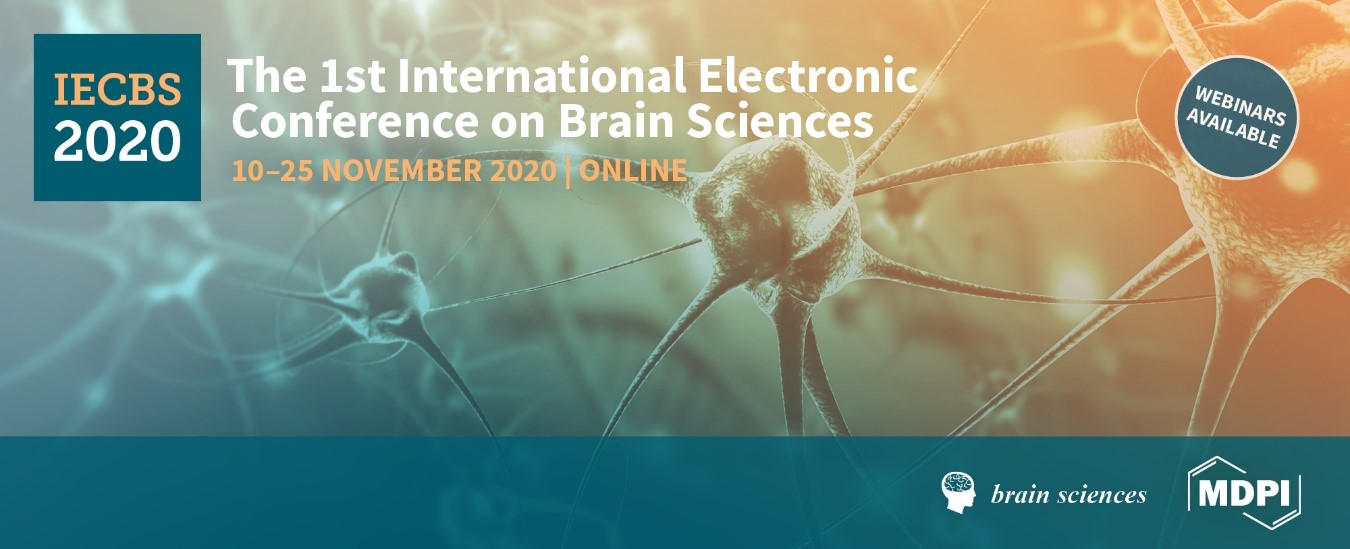
Webinar Date: 10 November 2020
Time: 9 -10:30 am (US Eastern time) | 15:00 p.m.-16:30 (CEST)
Webinar ID: 810 1943 7849
Register for Free Here (please seee Instructions for Authors ): https://iecbs.sciforum.net
Webinar Secretariat: iecbs2020@mdpi.com
It is well accepted that the last decade has been marked by enormous advances in the field of demyelinating diseases and more specifically multiple sclerosis. A lot of research occurred leading to early diagnosis and discovery of new biomarkers that help with treatment decisions. New therapies emerged and moved from the lab to human trials, to pharmacies and eventually to the patient’s home. Nowadays, diagnosis of MS is not a death sentence. It is viewed as chronic disease that can be managed very well and, given successful treatment, patients can enjoy a high quality of life.
During this webinar, we will focus on two fundamental areas of research in MS. The first presentation by Dr. Mark Haacke will discuss a new imaging method, the MICRO Imaging that can image very small vessels in the brain, including both arteries and veins, and subsequently classify vascular abnormalities, MS-specific.
The second presentation by Dr. Robert Lisak will discuss the role exosomes as mediators of immune regulation in MS and will review evidence about the toxicity of exosome- enriched fractions from B-lymphocytes on oligodendrocytes in people with MS.
For any questions about the webinar, please email iecbs2020@mdpi.com
10 July 2020
Meet Us at the Society for Neurosciences’ 50th Annual Meeting (Neuroscience 2020), Washington, USA, 24–28 October 2020
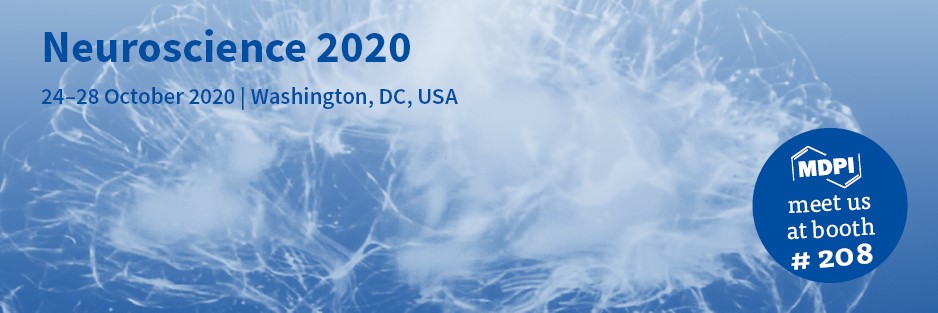
MDPI will be attending the conference Neuroscience 2020, which will be hosted in Washington, USA, 24–28 October 2020.
SfN’s 50th annual meeting is the premier venue for the presentation of emerging science in the field of neurosciences, where one can learn from experts, forge collaborations with peers, explore new tools and technologies, and advance their career.
The following MDPI journals will be represented:
- Brain Sciences (leading journal)
- JCM
- Medicina
- Genes
- Children
- Cancers
- Behavioral Sciences
- Cells
- IJERPH
- Disease
- Biomedicines
- JPM
- Pathogens
- Healthcare
- IJMS
- Psych
- Pharmaceuticals
- Clocks&Sleep
- Jounal of Intelligence
- Pharmaceutics
If you are attending this conference, please feel free to stop by our booth (Booth #208). Our delegates look forward to meeting you in person, to answer any questions you may have. For more information about the conference, please visit:
9 July 2020
Open Access Agreement Between Jisc Collections and MDPI
We are delighted to announce the establishment of our Open Access agreement with Jisc Collections, which will allow UK institutions to benefit from access to article processing charge (APC) discounts and streamlined payment workflows.
All institutions participating in the agreement will also gain access to the MDPI online submission system where they can find full article metadata and pricing information for easy identification and additional transparency.
Eligible authors affiliated with the participating institutions are prompted to choose the corresponding Institutional Open Access Program (IOAP) when they submit an article via our online submission system.
About Jisc
Jisc's vision is for the UK to be the most digitally advanced education and research nation in the world. At its heart is the super-fast national research and education network, Janet, with built-in cyber security protection. Jisc also provides technology solutions for its members (colleges, universities and research centres) and customers (public sector bodies), helps members save time and money by negotiating sector-wide deals and provides advice and practical assistance on digital technology. Jisc is funded by the UK higher and further education and research funding bodies and member institutions.
For more information, contact helen.dobson@jisc.ac.uk.
About MDPI
MDPI is a publisher of fully peer-reviewed, Open Access journals with a focus on thorough and rapid editorial processing. Its aim is to ensure that high-quality research is verified and made available to the research community as quickly as possible. MDPI stands at the forefront of the Open Access movement, having launched its first online journal Molecules in 1996. Today, MDPI is a leader in Open Access publishing with over 250 journals across all research disciplines, and all content published under a Creative Commons Attribution License (CC BY).
For any questions about this agreement, please contact the MDPI IOAP team at ioap@mdpi.com.
29 June 2020
Updated Impact Factors Released in the Journal Citation Reports (Clarivate)
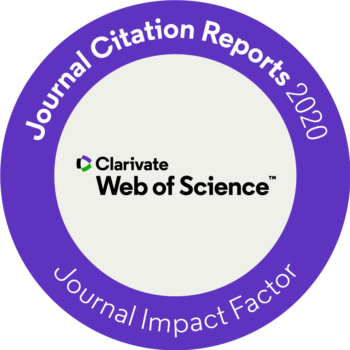
The updated citation metrics have been released in the Journal Citation Reports (JCR), published by Clarivate. The recent release of the JCR includes seventy-one MDPI titles. Out of these, 18 titles are newcomers, receiving a first Journal Impact Factor which is based on citation activity in 2019: Actuators, Agriculture, Biology, Biomedicines, Biosensors, Chemosensors, Children, Healthcare, Journal of Fungi, Journal of Personalized Medicine (JPM), Land, Life, Magnetochemistry, Membranes, Pharmaceuticals, Photonics, Separations and Toxics.
- Out of the previously listed journals, a total of 72 percent boast an increased Impact Factor.
- 25 journals are ranked among the top 25% of journals in at least one of the categories they are ranked for.
- Articles published in 2019 in MDPI journals account for approximately 17 percent of of articles published in gold Open Access journals covered in the Science Citation Index Expanded (SCIE) and Social Sciences Citation Index (SSCI).
First Impact Factors
| Journal | Impact Factor | Rank | Category | Details |
| Actuators | 1.957 | 31/64 (Q2) | • Instruments & Instrumentation | Link |
| Agriculture | 2.072 | 25/91 (Q2) | • Agronomy | Link |
| Biology | 3.796 | 19/93 (Q1) | • Biology | Link |
| Biomedicines | 4.717 | 30/138 (Q1) 36/270 (Q1) |
• Medicine, Research & Experimental • Pharmacology & Pharmacy |
Link |
| Biosensors | 3.240 | 24/86 (Q2) | • Chemistry, Analytical | Link |
| Chemosensors | 3.108 | 16/64 (Q1) 27/86 (Q2) 13/27 (Q2) |
• Instruments & Instrumentation • Chemistry, Analytical • Electrochemistry |
Link |
| Children | 2.078 | 50/128 (Q2) | • Pediatrics | Link |
| Healthcare | 1.916 | 62/102 (Q3) 45/87 (Q3) |
• Health Care Sciences & Services (SCIE) • Health Policy & Services (SSCI) |
Link |
| Journal of Fungi | 4.621 | 5/29 (Q1) 31/135 (Q1) |
• Mycology • Microbiology |
Link |
| Journal of Personalized Medicine | 4.433 | 24/165 (Q1) 10/102 (Q1) |
• Medicine, General & Internal • Health Care Sciences & Services |
Link |
| Land | 2.429 | 58/123 (Q2) | • Environmental Studies (SSCI) | Link |
| Life | 2.991 | 26/93 (Q2) 109/267 (Q2) |
• Biology • Microbiology |
Link |
| Magnetochemistry | 1.947 | 22/45 (Q2) 109/159 (Q3) 201/314 (Q3) |
• Chemistry, Inorganic & Nuclear • Chemistry, Physical • Materials Science, Multidisciplinary |
Link |
| Membranes | 3.094 | 53/143 (Q2) 129/314 (Q2) 23/89 (Q2) |
• Engineering, Chemical • Materials Science, Multidisciplinary • Polymer Science |
Link |
| Pharmaceuticals | 4.286 | 49/270 (Q1) | • Pharmacology & Pharmacy | Link |
| Photonics | 2.140 | 48/97 (Q2) | • Optics | Link |
| Separations | 1.900 | 53/86 (Q3) | • Chemistry, Analytical | Link |
| Toxics | 3.271 | 32/92 (Q2) 92/265 (Q2) |
• Toxicology • Environmental Sciences |
Link |
Updated Impact Factors
| Journal | Impact Factor | Rank | Category | Details |
| Agronomy | 2.603 | 18/91 (Q1) 65/234 (Q2) |
• Agronomy • Plant Sciences |
Link |
| Animals | 2.323 | 10/63 (Q1) 14/142 (Q1) |
• Agriculture, Dairy & Animal Science • Veterinary Sciences |
Link |
| Antibiotics | 3.893 | 23/93 (Q1) 64/270 (Q1) |
• Infectious Diseases • Pharmacology & Pharmacy |
Link |
| Antioxidants | 5.014 | 10/139 (Q1) 56/297 (Q1) 7/61 (Q1) |
• Food Science & Technology • Biochemistry & Molecular Biology • Chemistry, Medicinal |
Link |
| Applied Sciences | 2.474 | 161/314 (Q3) 32/91 (Q2) 88/177 (Q2) 62/154 (Q2) |
• Materials Science, Multidisciplinary • Engineering, Multidisciplinary • Chemistry, Multidisciplinary • Physics, Applied |
Link |
| Atmosphere | 2.397 | 48/93 (Q3) | • Meteorology & Atmospheric Sciences | Link |
| Biomolecules | 4.082 | 98/297 (Q2) | • Biochemistry & Molecular Biology | Link |
| Brain Sciences | 3.332 | 113/271 (Q2) | • Neurosciences | Link |
| Cancers | 6.126 | 37/244 (Q1) | • Oncology | Link |
| Catalysts | 3.520 | 65/159 (Q2) | • Chemistry, Physical | Link |
| Cells | 4.366 | 70/195 (Q2) | • Cell Biology | Link |
| Coatings | 2.436 | 10/21 (Q2) | • Materials Science, Coatings & Films | Link |
| Crystals | 2.404 | 10/26 (Q2) 165/314 (Q3) |
• Crystallography • Materials Science, Multidisciplinary |
Link |
| Diagnostics | 3.110 | 39/165 (Q1) | • Medicine, General & Internal | Link |
| Diversity | 1.402 | 119/168 (Q3) | • Ecology | Link |
| Electronics | 2.412 | 125/266 (Q2) | • Engineering, Electrical & Electronic | Link |
| Energies | 2.702 | 63/112 (Q3) | • Energy & Fuels | Link |
| Entropy | 2.494 | 33/85 (Q2) | • Physics, Multidisciplinary | Link |
| Foods | 4.092 | 27/139 (Q1) | • Food Science & Technology | Link |
| Forests | 2.221 | 17/68 (Q1) | • Forestry | Link |
| Genes | 3.759 | 53/177 (Q2) | • Genetics & Heredity | Link |
| Insects | 2.220 | 18/101 (Q1) | • Entomology | Link |
| International Journal of Environmental Research and Public Health (IJERPH) | 2.849 | 58/193 (Q2) 32/170 (Q1) 105/265 (Q2) |
• Public, Environmental & Occupational Health (SCIE) • Public, Environmental & Occupational Health (SSCI) • Environmental Sciences (SCIE) |
Link |
| International Journal of Molecular Sciences (IJMS) | 4.556 | 74/297 (Q1) 48/177 (Q2) |
• Biochemistry & Molecular Biology • Chemistry, Multidisciplinary |
Link |
| ISPRS International Journal of Geo-Information (IJGI) | 2.239 | 31/50 (Q3) 18/30 (Q3) |
• Geography, Physical • Remote Sensing |
Link |
| Journal of Clinical Medicine | 3.303 | 36/165 (Q1) | • Medicine, General & Internal | Link |
| Journal of Marine Science and Engineering | 2.033 | 31/66 (Q2) | • Oceanography | Link |
| Marine Drugs | 4.073 | 16/61 (Q2) | • Chemistry, Medicinal | Link |
| Materials | 3.057 | 132/314 (Q2) | • Materials Science, Multidisciplinary | Link |
| Mathematics | 1.747 | 28/324 (Q1) | • Mathematics | Link |
| Medicina | 1.205 | 107/165 (Q3) | • Medicine, General & Internal | Link |
| Metabolites | 4.097 | 95/297 (Q2) | • Biochemistry & Molecular Biology | Link |
| Metals | 2.117 | 18/79 (Q1) 185/314 (Q3) |
• Metallurgy & Metallurgical Engineering • Materials Science, Multidisciplinary |
Link |
| Micromachines | 2.523 | 56/92 (Q3) 23/64 (Q2) |
• Nanoscience & Nanotechnology • Instruments & Instrumentation |
Link |
| Microorganisms | 4.152 | 37/135 (Q2) | • Microbiology | Link |
| Minerals | 2.380 | 6/21 (Q2) 11/30 (Q2) |
• Mining & Mineral Processing • Mineralogy |
Link |
| Molecules | 3.267 | 70/177 (Q2) 141/297 (Q2) |
• Chemistry, Multidisciplinary • Biochemistry & Molecular Biology |
Link |
| Nanomaterials | 4.324 | 89/314 (Q2) 42/103 (Q2) |
• Materials Science, Multidisciplinary • Nanoscience & Nanotechnology |
Link |
| Nutrients | 4.546 | 17/89 (Q1) | • Nutrition & Dietetics | Link |
| Pathogens | 3.018 | 65/135 (Q2) | • Microbiology | Link |
| Pharmaceutics | 4.421 | 44/270 (Q1) | • Pharmacology & Pharmacy | Link |
| Plants | 2.762 | 58/234 (Q1) | • Plant Sciences | Link |
| Polymers | 3.426 | 16/89 (Q1) | • Polymer Science | Link |
| Processes | 2.753 | 59/143 (Q2) | • Engineering, Chemical | Link |
| Remote Sensing | 4.509 | 9/30 (Q2) | • Remote Sensing | Link |
| Sensors | 3.275 | 22/86 (Q2) 77/266 (Q2) 15/64 (Q1) |
• Chemistry, Analytical • Engineering, Electrical & Electronic • Instruments & Instrumentation |
Link |
| Sustainability | 2.576 | 120/265 (Q2) 26/41 (Q3) 53/123 (Q2) 6/8 (Q3) |
• Environmental Sciences (SCIE) • Green & Sustainable Science & Technology (SCIE) • Environmental Studies (SSCI) • Green & Sustainable Science & Technology (SSCI) |
Link |
| Symmetry | 2.645 | 29/71 (Q2) | • Multidisciplinary Sciences | Link |
| Toxins | 3.531 | 21/92 (Q1) 34/139 (Q1) |
• Toxicology • Food Science & Technology |
Link |
| Universe | 1.752 | 18/29 (Q3) 42/68 (Q3) |
• Physics, Particles & Fields • Astronomy & Astrophysics |
Link |
| Vaccines | 4.086 | 57/158 (Q2) 50/138 (Q2) |
• Immunology • Medicine, Research & Experimental |
Link |
| Viruses | 3.816 | 12/37 (Q2) | • Virology | Link |
| Water | 2.544 | 31/94 (Q2) | • Water Resources | Link |
Source: Clarivate 2020, InCites Journal Citation Reports®.
15 May 2020
Recruiting Topic Editors for Brain Sciences
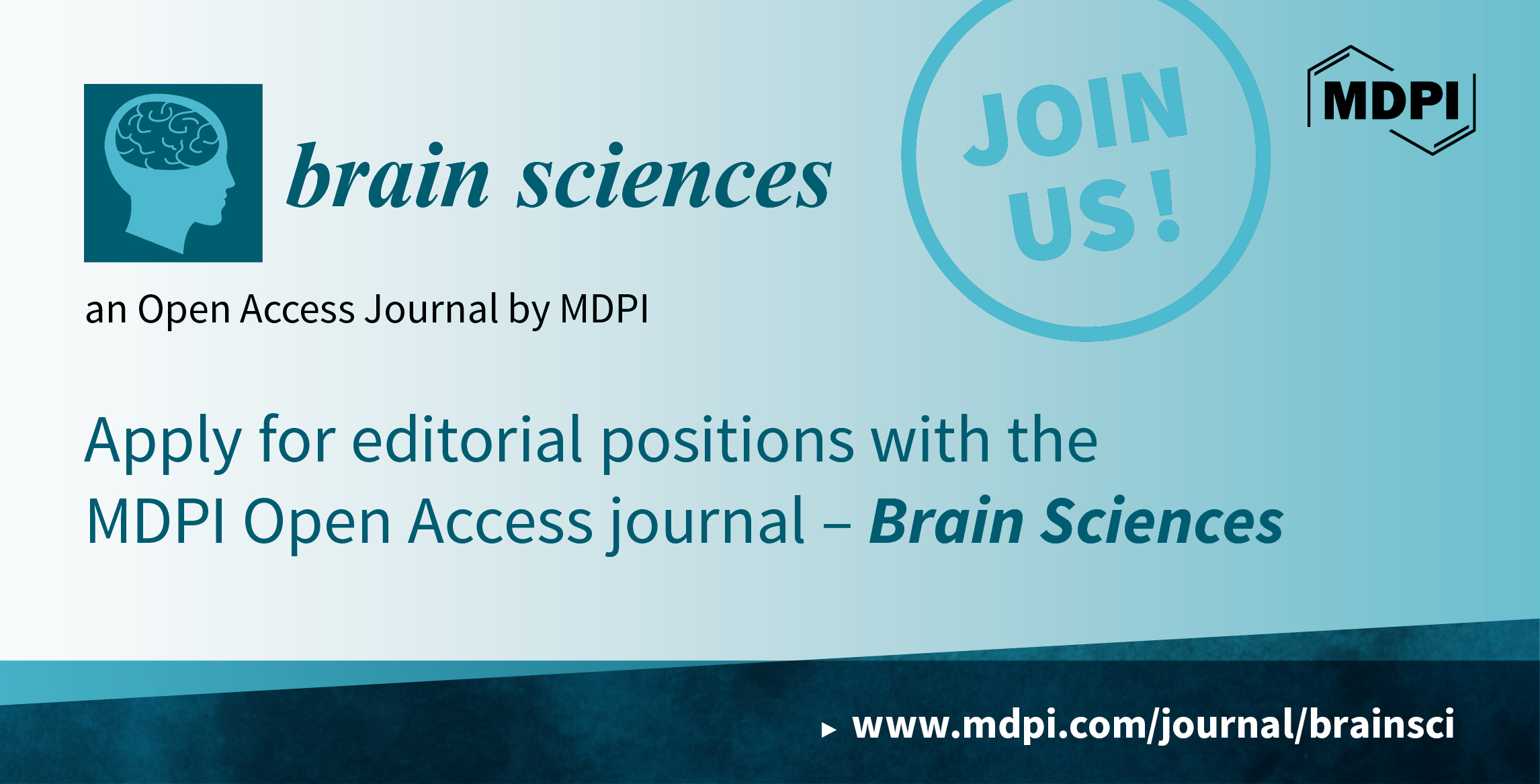
Brain Sciences (https://www.mdpi.com/journal/brainsci) is an international open-access journal led by Editor-in-Chief Prof. Dr. Stephen D. Meriney from University of Pittsburgh, USA. In an effort to expand our offerings to the systems sciences community, we are recruiting scientists to join the Topic Board.
Brain Sciences is dedicated to the quick global dissemination of the results of cutting-edge technology research in neuroscience. Brain Sciences is covered by leading indexing services, including Science Citation Indexed Expanded (SCIE, IF 2.786) in Web of Science, Scopus (Citescore 2.85), citations available in PubMed, full-text archived in PubMed Central, etc.
We encourage applications from researchers with a background in a range of subject areas. Should you decide to serve on the Topic Board, and depending on your availability, you would be responsible for some of the following tasks:
- Setting up at least one Special Issue (SI) over two years in the journal and proposing a detailed strategy plan for the SI (including soliciting papers and promoting the SI);
- Promoting the journal during conferences (adding 1–2 slides to your presentation, distributing flyers, recommending the journal to your colleagues, etc.);
- Providing support for the Special Issues on topics related to your expertise or when the Guest Editor(s) is/are not available, including SI promotion via social media, prechecking new submissions, making decisions, and providing advice on scientific cases.
Benefits: Topic Editors will be waived 500 CHF on the article processing charge (APC) per year, and offer special discounts (240 CHF) on any additional papers based on your invitation. You can find more about the APC at https://www.mdpi.com/journal/brainsci/apc.
If you are interested in this role or if you have any suggestions, please feel free to contact us (brainsci@mdpi.com).
For more information about Brain Sciences, please visit https://www.mdpi.com/journal/brainsci
13 May 2020
COVID-19 Academic Resources Center

Since 1996, MDPI has been committed to supporting the research community by providing the latest research freely available and making relevant and useful research available as quickly as possible. The world is current experiencing a pandemic of COVID-19, and researchers are working extremely hard to understand it and find a cure.
The values MDPI holds strongly are particularly important at the moment, and we will continue to publish relevant, peer-reviewed research as quickly as possible in open access format. This means that it will immediately be available for researchers, health professionals, and the general public to read, distribute, and reuse. We believe that scientific advancements will be crucial to overcoming this pandemic, and will do everything we can to support researchers working looking for solutions.
COVID-19 Academic Resources Center contains a variety of information related to COVID-19 available from MDPI, including journal articles, special issues, and preprints, among others.
For more information, please visit: https://www.mdpi.com/covid-19
12 May 2020
The 1st International Electronic Conference on Brain Sciences (IECBS 2020)

You are cordially invited to participate in the 1st International Electronic Conference on Brain Sciences. This event aims to bring together researchers working in the field of neuroscience, to present and discuss their recent contributions, without the need for travel. Also there is a webinar organized during this e-conference.
The field of neuroscience is one of the last frontiers in biomedical studies, as many of the details that control brain function are still not well understood. This makes the study of the nervous system very exciting and fast moving. This conference will address a variety of research topics, which reflect some of the current areas of focus. These are organized into seven sessions, and include:
- Clinical Neuroscience
- Cognitive Neuroscience
- Systems Neuroscience
- Molecular and Cellular Neuroscience
- Developmental Neuroscience
- Behavioral Neuroscience
- Environmental Neuroscience
Accepted abstract submissions will be published in the proceedings of the conference, and authors are invited to elaborate their abstracts into full manuscripts that will be considered for publication in Brain Sciences, with a 10% discount on the APC. Brain Sciences is an open access journal from MDPI, in the field of neuroscience. The journal is indexed in the Sciences Citation Indexing Expended (SCIE IF = 2.786), Scopus, and other databases. Citations are available in PubMed; full-text archived in PubMed Central (PMC). Please visit the following website for more information. https://www.mdpi.com/journal/brainsci
Important Dates
- Abstract Submission: 5 August, 2020
- Notification of Acceptance: 15 August, 2020
- Submission of Full Manuscript to Brain Sciences: 25 October, 2020
- Conference Date: 10–25 November, 2020
Please do not hesitate to contact us if you have questions.
We look forward to welcoming you at this exciting meeting online.
9 April 2020
Free Open Platforms to Support Academics During the COVID-19 Pandemic

As a leading Open Access publisher, MDPI is committed to fostering open scientific exchange in all forms across all disciplines. Due to the outbreak of COVID-19, many researchers have to stay at home and many academic conferences have been cancelled or postponed. In light of these changes, MDPI has adopted numerous initiatives that may help accelerate scientific exchange and provide support to the academics during this period.
Scholarly Community—Encyclopedia
Encyclopedia is an online reference created and curated by active scholars. It aims to highlight the latest research results as well as providing benchmark information for researchers and the general public interested in accurate and advanced knowledge on specific topics.
Comprehensive and Free Literature Database—Scilit
Scilit is a comprehensive, free database for scientists that uses a new method to collate data and index scientific material. Our crawlers extract the latest data from CrossRef and PubMed on a daily basis. This means that newly published articles are immediately added to Scilit.
Display Academic Achievements—SciProfiles
SciProfiles is an innovative social network for researchers and scholars that is developed by MDPI. In line with our broad mission, the purpose of SciProfiles is to accelerate discovery and innovation by facilitating immediate access to research results and providing opportunities for academic networking.
Organize and Participate in Conferences Online—Sciforum
Sciforum is an event planning platform that supports open science by offering the opportunity to host and participate in academic conferences. It provides an environment for scholarly exchange, discussion of topics of current interest, building of networks, and establishing collaborations.
Post Early Versions of Research Outputs—Preprints
Preprints is a platform dedicated to making early versions of research outputs permanently available and citable. We post original research articles and comprehensive reviews, and papers can be updated by authors at any time. Content on Preprints is not peer-reviewed, and feedback can be received from readers.
***
MDPI remains committed to open science and open data and has signed a statement, along with more than thirty scholarly publishers, showing our intention to facilitate sharing of new research findings as early on as possible. The initiative sees publishers collectively removing barriers to new research, in the face of a global healthcare crisis.
25 March 2020
MDPI Comment on the COVID-19 Virus
The world is currently suffering from a global pandemic of the corona virus COVID-19. MDPI expresses its sympathies for all of those affected by the virus and stands in solidarity with medical staff and researchers treating patients and searching for scientific solutions.
MDPI has previously published papers covering corona viruses in addition to new papers on the current outbreak, see all papers here. In particular, Viruses has published a number of Special Issues and papers on the topic (see here, here, and here) as well as a forthcoming Special Issue.
Alongside journal articles, MDPI has been a strong supporter of preprints, which are increasingly being used to rapidly disseminate the latest research, and we run the preprint server Preprints.org. Our database of research articles, Scilit, is free to use and covers all publishers including preprint servers. New papers are often in search results within hours of publication and users can set up alerts for new papers.
Our main priority during this period has been the health and safety of staff, and we continue to allow staff to work at home and closely monitor the situation in all locations in which we work. Despite the restrictions, we continue to provide a full publication service and, by close collaboration with our editorial boards and making use our in-house teams, ensure that there are no unnecessary delays in publishing vital research. Fast and open publication has always been at the core of MDPI values and is now more important than ever.
We hope that a solution to the current situation will emerge soon. In the meantime, we will do our best to continue communicating vital research in all fields.
20 March 2020
Meet us at the 43rd Annual Meeting of the Spanish Society of Biochemistry & Molecular Biology (SEBBM 2020) in Barcelona, Spain, 20–23 July 2020

MDPI will be attending SEBBM 2020, held in Barcelona, Spain, 20th–23rd July 2020.
La Sociedad Española de Bioquímica y Biología Molecular (SEBBM) is committed to promoting research links, encouraging years of study, promoting the dissemination of knowledge, improving teaching, and promoting young scientists among Spanish researchers for the international development of Spanish science and to contribute to scientific aspects of the public interest.
The following MDPI journals will be represented:
- Genes (Leading journal)
- Biomolecules (co-leading)
- Brain Sciences
- Biology
- IJMS
- Applied Sciences
- Antibiotics
- Cancers
- Cells
If you are also attending this conference, feel free to stop by our booth (Booth #17). Our delegates look forward to meeting you in person to answer any questions you may have. For more information about the conference, please see the following link:
https://www.sebbm.es/web/es/congresos/congresos-de-la-sebbm/3311-43-congreso-de-la-sebbm-barcelona-2020
18 March 2020
MDPI Co-Signed Position Statement on Transformative Agreements
The advantages of the open access model of scientific publishing are being increasingly recognized in the scientific community. It allows new scientific evidence to be accessed from the moment of publication for free by anyone around the globe, boosting the impact of new research. In response, many funders, libraries and universities have been adopting new principles to accelerate the transition to open access.
Recently, “transformative agreements” have been negotiated between traditional publishers and various institutions. While increasing the number of open access papers, these agreements lack binding commitments to a full transition to open access, their conditions vary across different regions, and access is still limited for many users.
MDPI is a co-signatory of the recent position statement raising concerns about potential downsides of transformative agreements and how they may delay a full transition to open access. The statement highlights that these models “risk perpetuating current limitations on access, transparency and market competitiveness, while simultaneously facilitating excessive charges on the public purse”.
As a pioneering open access journal publisher, MDPI is the first to promote the importance of science being made available to everyone. Our peer-reviewed journals, covering diverse academic disciplines, are fully accessible to the public free of charge under a Creative Commons Attribution License (CC BY). This is why, along with other open access publishers, MDPI is a proud signatory of the position paper and is committed to contributing to the replacement of weak transitional agreements with “agreements with publishers that are already fully committed to open science and who offer full, immediate and transparent Open Access”.
Read the position paper here
16 March 2020
Encyclopedia Outstanding Contributor Awards 2020 - Open for Application
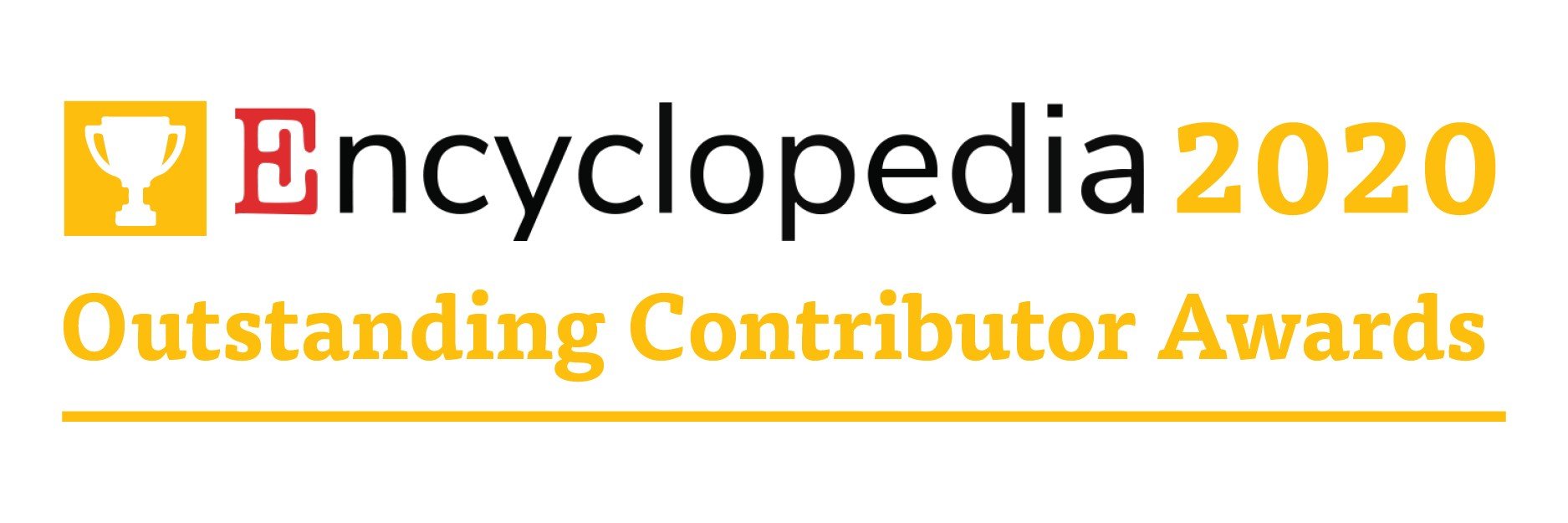
We are pleased to announce that Encyclopedia will be awarding five Outstanding Contributor Awards for researchers in 2020. The nominations and applications will be assessed by an Evaluation Committee consisting of senior scholars from the Encyclopedia Editorial Board.
Prize for Winners
- An official certificate;
- A cash award of 500 CHF or an MDPI discount voucher of 800 CHF.
Application Deadline
31 December, 2020 (Please send your application email with a list of all entries you contributed to our office before the deadline: office@encyclopedia.pub)
Candidate Requirements
- Have a Ph.D. degree;
- Have more than three qualified entries published in Encyclopedia in 2020.
Evaluation Standards
- Number of entries published in Encyclopedia in 2020;
- Quality of entries online (including length, figure quality, and novelty);
- Impact of entries (including the number of likes, discussion contents, views, and downloads).
If you are a researcher and have not yet contribute entries to Encyclopedia, please do not miss this chance to highlight your research results.
19 February 2020
Meet Us at American Thoracic Society (ATS) 2020 Congress in Philadelphia, PA, USA, 15–20 May 2020

MDPI will be attending the American Thoracic Society (ATS) 2020 Congress in Philadelphia, PA, USA, 15–20 May 2020.
The ATS International Conference is the home of pulmonary, critical care, and sleep professionals, from those in the earliest stages of their careers to those whose research or strides in clinical care has gained them international recognition. Each year, nearly 14,000 of these professionals choose to attend, present, and learn about the latest advances, meet with colleagues from around the world, and strike new collaborations. It is truly where today’s science meets tomorrow’s care.
This international conference is also multidisciplinary. Clinicians and researchers in many other fields attend the conference, thereby enriching conversations that lead to insights that ultimately improve patient care.
The following MDPI journals will be represented:
If you are also attending this conference, please feel free to stop by our booth (Booth 1101). Our delegates look forward to meeting you in person to answer any questions you may have. For more information about the conference, please visit: https://conference.thoracic.org.
14 February 2020
Meet Us at the Allied Genetics Conference (TAGC 2020) in Washington, DC, USA, 22–26 April 2020

MDPI will be attending the Allied Genetics Conference (TAGC 2020) in Washington, DC, USA, 22–26 April 2020.
TAGC is a unique conference organized by the Genetics Society of America that gives you both topic-driven and community-specific sessions to foster collaboration and inspire fresh thinking.
The following MDPI journals will be represented:
If you are also attending this conference, please feel free to stop by our booth (Booth 723). Our delegates look forward to meeting you in person to answer any questions you may have. For more information about the conference, please visit: https://genetics-gsa.org/tagc-2020/.
12 December 2019
Brain Sciences Reaches 1000 Articles Milestone
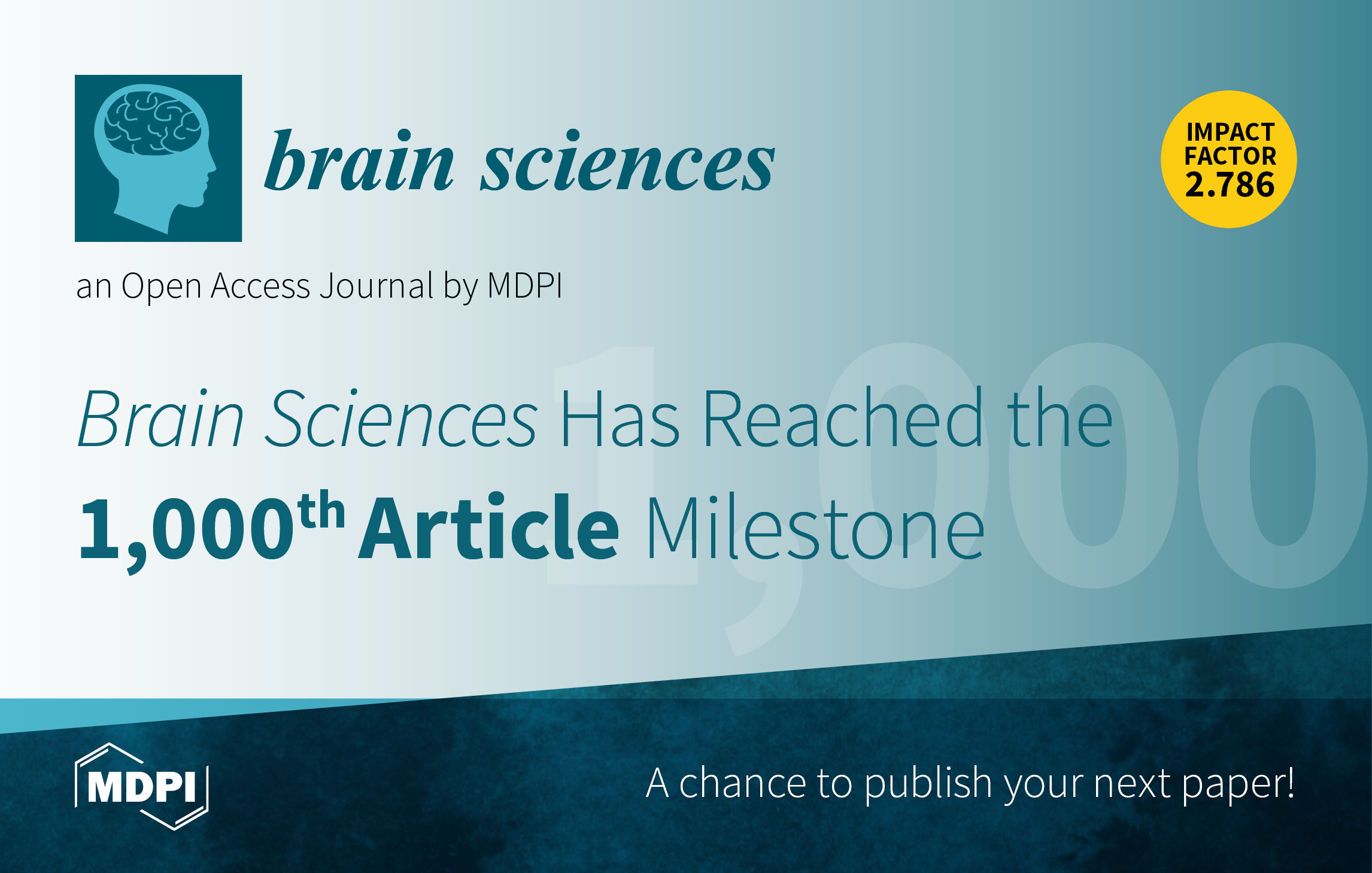
It is our pleasure to announce that Brain Sciences, MDPI’s open access neuroscience research journal, has officially published more than one thousand articles and reviews since its inception in 2011. Brain Sciences (ISSN 2076-3425) is now included in the Science Citation Index Expanded in the Web of Science and received an Impact Factor of 2.786 for 2018. Brain Sciences’ current CiteScore in Scopus is 2.85, which equals rank 47/111 (Q2) in ‘General Neuroscience’.
29 October 2019
Professor Stephen D. Meriney Appointed Editor-in-Chief of Brain Sciences
We are pleased to announce that Professor Stephen D. Meriney has been appointed as Editor-in-Chief of Brain Sciences (ISSN 2076-3425). His term started in October 2019.

Stephen D. Meriney received his PhD in physiology/neuroscience from the University of Connecticut in 1987. After postdoctoral training with Dr. Alan Grinnell at the UCLA Jerry Lewis Neuromuscular Research Center, Professor Meriney joined the faculty in the Neuroscience Department at the University of Pittsburgh in 1993 where he is now professor of Neuroscience and Psychiatry. His research program is focused on voltage-gated calcium channels, synaptic physiology and modulation, neuromuscular diseases, and the development of novel calcium channel gating modifiers as potential therapeutics for neuromuscular diseases. His research program has been continuously supported predominately by grants from the National Institutes of Health and the Muscular Dystrophy Association.
The editorial team warmly welcomes Professor Meriney as Editor-in-Chief and look forward to his contribution to the continued success of Brain Sciences. Professor Meriney is supported by a team of Section Editors-in-Chief: Professor Sergey Kasparov, Dr. Caterina Cinel, Professor Heather Bortfeld, Dr. Evanthia Bernitsas, Professor Pierluigi Zoccolotti, Dr. Jose Lujan, Professor Konstantin V. Slavin, Professor Jason Brandt, Dr. Andrew Clarkson and Dr. Mark Burke. For further information on the journal sections please see here.
At the same time, we would like to take the opportunity to express our sincere gratitude to the previous Editor-in-Chief, Prof. Dr. German Barrionuevo, for his invaluable contribution to the journal.
11 October 2019
Introducing SciProfiles, an Academic Social Network
MDPI is pleased to announce the release of SciProfiles, its social network platform for researchers and scholars.
The purpose of SciProfiles is aligned with MDPI’s broad mission to accelerate discovery and innovation by facilitating immediate access to research results and to serve scholars and communities by providing opportunities for academic networking.
SciProfiles also ambitions to serve as a sustainable, transparent and community-driven research evaluation system aligned with the DORA principles (https://sfdora.org/). Through their scientific profiles, academics can highlight their contribution to research communities, and measure their impact on their field, beyond publication numbers and impact factors. SciProfiles is currently a beta version and will enrich to give researchers the possibility to highlight all of their contributions to science and their scientific communities as authors, reviewers, editors, conference organizers, conference panelists, conference keynote speakers, or even as lecturers or student mentors at their University.
The classic components of popular community social networks, including follower/following, classical metrics, endorsements and recommendations (https://www.mdpi.com/about/announcements/1690), comments (https://www.mdpi.com/about/announcements/1397) are or will be very soon highlighted in SciProfiles as open science contributions.
To help increase the impact and visibility of articles and their authors to an appropriate audience, the platform offers a NewsFeed that includes recommendations of relevant content based on interests, publication history, saved searches or colleagues’ recommendations.
SciProfiles’ avatars are now being integrated on several MDPI platforms, meaning that you will directly access researchers’ profiles from any of the MDPI platforms:
MDPI's journal publishing website: www.mdpi.com
MDPI's conference hosting and management website: www.sciforum.net
MDPI's pre-print website : www.preprints.org
MDPI's knowledge sharing website : www.encyclopedia.pub
MDPI's books store: www.mdpi.com/books
MDPI's literature database : www.scilit.net
SciProfiles aims to serve scientific communities at large. It can be embedded into third-party websites and also welcomes integration of data from third-parties.
Dr. Shu-Kun Lin: https://sciprofiles.com/profile/2
Dr. Franck Vazquez: https://sciprofiles.com/profile/FranckVazquez
Dr. Martyn Rittman: https://sciprofiles.com/profile/martynrittman
2 October 2019
Winners of the 2019 MDPI Writing Prize
We are delighted to announce the winners of the 2019 MDPI Writing Prize. Entrants were asked to write on the theme "Judging research: How should research and researchers be evaluated and rewarded?" We received a large number of excellent essays from PhD students and postdocs, and the process of shortlisting and choosing winners was not an easy one. The winners demonstrated excellent writing skills alongside interesting and thought-provoking ideas.
As last year, we will begin the process of collating all entries into a book that will be available in open access format. Alongside promoting good writing skills, we see the prize as a way to promote the voices of early career researchers within broader debates and policy discussions.
Congratulations to all of the participants and especially the winners. The winners are:
1st Prize (500 CHF):
Albin Nilsson (National Centre for Nuclear Research, Warsaw, Poland)
[Read here]
2nd Prize (250 CHF):
Qi Zhang (Shandong University, Jinan, China)
[Read here]
Igor Ogashawara (Indiana University, Indianapolis, US)
[Read here]
3rd Prize (100 CHF):
Margaret Sivapragasam (Universiti Teknologi Petronas, Perak, Malaysia)
[Read here]
Arvind Sharma (The University of Queensland, Gatton, Australia)
[Read here]
Jose Flores-Guerrero (University Medical Center Groningen, Groningen, The Netherlands)
[Read here]
The MDPI Writing Prize is an annual award supported by MDPI Author Services, which provides services including language editing, reformatting, plagiarism checks, and image editing.
20 September 2019
MDPI Now Gives Scholars the Possibility to Endorse and Recommend Articles

MDPI is pleased to announce the release of a new functionality giving the possibility for researchers and scholars to endorse, and formally recommend articles to their colleagues.
MDPI was an early signatory of the San Francisco Declaration on Research Assessment (https://sfdora.org/read/) which calls for improvement in how quality and impact of scholarly research outputs are evaluated, especially in moving beyond journal-based citation metrics (journal Impact Factor, Scopus Citescore, etc.).
MDPI supports the establishment of article-level impact metrics, including citations, views, downloads, and Altmetric scores. These measures serve as an impact indicator for research articles on a case–by-case basis, assessing paper on its own merit. However, these metrics are also subjective and can give a biased picture of the article impact: they do not directly reflect the quality or the intrinsic scientific value of the article.
In our view, community engagement with publications based on community-driven metrics can help to overcome this limitation. We have therefore launched an option for scholars to endorse articles, indicating their own assessment of its content and making a recommendation to their community. This follows our implementation of the open source Hypothesis commenting tool, which has been available for all articles published by MDPI for over a year (https://www.mdpi.com/about/announcements/1397). Both endorsement and commenting are available for all previously published and forthcoming MDPI articles.
In addition to potentially serving as a sustainable solution to article assessment, endorsements will help scientific communities to identify the most relevant articles, independently of the journal in which it was published.
The code for the endorsing functionality, which relies on DOIs and ORCIDs, will be made available on GitHub with an open source license.
Dr. Shu-Kun Lin, President and Founder
Dr. Franck Vazquez, Chief Scientific Officer
Dr. Martyn Rittman, Publishing Director
11 September 2019
Meet Us at ASCB|EMBO 2019 in Washington DC, 7–11 December 2019

We are glad to inform you that MDPI will be attending the 2019 joint meeting of the American Society for Cell Biology (ASCB) and European Molecular Biology Organization (EMBO). The 2019 joint meeting of the American Society for Cell Biology (ASCB) and European Molecular Biology Organization (EMBO) will focus on cell biology as the fundamental basis of biology, and will offer sessions on emerging topics such as nontraditional model organisms, and the use of computational modeling and biophysics to "Build the Cell from the Ground Up".
Representatives of the following open-access journals will attend:
Biology
Biomolecules
Brain Sciences
Cancers
Cells
Genes
Healthcare
IJMS
Metabolites
Pathogens
Plants
Processes
Vaccines
If you are also attending this conference, please feel free to stop by our booth (Booth #132). Our delegates look forward to meeting you in person to answer any questions you may have.
11 September 2019
Create an Entry in Encyclopedia to Get a 100 CHF Voucher in Publishing in MDPI Journals
Encyclopedia is a free online reference created and curated by active scholars. It aims to highlight the latest research results as well as provide a comprehensive record of scientific development. If you have any suggestions or questions, please feel free to contact us via office@encyclopedia.pub.

6 August 2019
Preprints Reaches 10,000 Posted Articles Milestone
We are pleased to announce that Preprints has passed the milestone of 10,000 posted preprints. We are delighted to have reached this after just over three years of operation. Our congratulations and thanks go to our authors and advisory board who have supported growth of the platform and been crucial to its operation.
You can find further details at https://www.preprints.org/announcement/show/37.
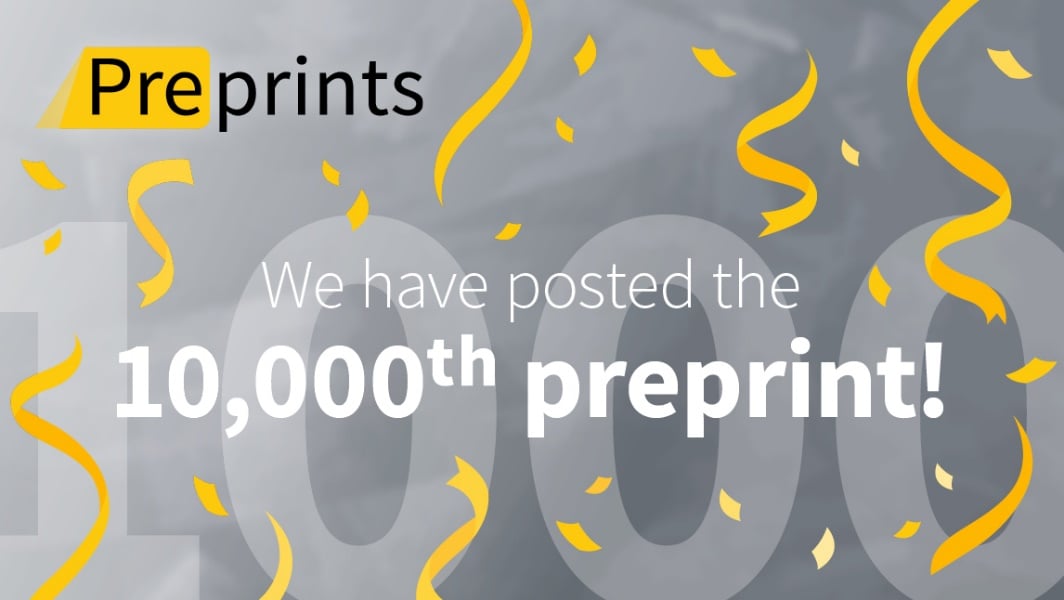
2 August 2019
DeepGreen Partnering with Publishers and Universities in Distributing Open Access Content to Institutional Repositories
Last week, the DeepGreen initiative in Germany started into an advanced test phase with the publishing partners S. Karger AG, SAGE Publishing, MDPI, Frontiers and De Gruyter, as well as 27 universities from all over Germany, from Hamburg University of Applied Sciences to University of Konstanz.
DeepGreen aims at lowering the barriers for open access publishing by automatically delivering metadata and full text publications from participating publishers to authorized repositories at German universities.
In preparation for a later live operation, the advanced test phase serves to gain experience with extensive data deliveries from publishers and also handling different repository software (including OPUS4, DSpace, EPrints, MyCoRe). DeepGreen thereby acts as a sophisticated platform, receiving articles published by authors affiliated with German universities and depositing these articles to respective university repositories, based on the affiliation metadata. For more information about DeepGreen: https://deepgreen.kobv.de
Karger AG has been a close cooperation partner of the DeepGreen consortium since 2016. S. Karger has more than 80 subscription-based and around 20 open access journals covering a wide spectrum in health science. DeepGreen will assign S. Karger articles to authorized institutions on the legal basis of German alliance and national licenses.
SAGE Publishing was founded by Sara Miller McCune in 1965 to support the dissemination of usable knowledge and educate a global community. SAGE publishes more than 1,000 journals and over 600 new books each year, spanning a wide range of subject areas. Our growing selection of library products includes archives, data, case studies and video. SAGE remains majority owned by our founder and after her lifetime will become owned by a charitable trust that secures the company’s continued independence. Principal offices are located in Los Angeles, London, New Delhi, Singapore, Washington DC and Melbourne. SAGE Publishing has been a close cooperation partner of DeepGreen since 2016.
MDPI is a scientific open access publisher and has been a partner of DeepGreen since 2017. MDPI comprises 205 peer-reviewed journals of various disciplines. All articles are published under a CC-BY license and are freely available without embargo period.
Frontiers is a scientific open access publisher with 61 journals of over 600 academic disciplines. All articles are peer-reviewed and published freely available under CC-BY license.
De Gruyter is an academic publisher with more than 700 subscription-based and open access journals of 29 disciplines. Articles provided by De Gruyter will be assigned to institutions with German alliance and national licenses.
There is promising communication with other publishers.
DeepGreen is funded by the German Research Foundation (DFG) and the consortium comprises six institutions: the Cooperative Library Network Berlin-Brandenburg, Bavarian State Library, Bavarian Library Network, University Library of the Technische Universität Berlin, University Library of Erlangen-Nuremberg and the Helmholtz Open Science Coordination Office at the GFZ German Research Centre for Geosciences.
If you would like to know in more detail which institutions take part in the advanced test phase of DeepGreen, you can find more information here.
17 July 2019
First Basel Sustainable Publishing Forum
The University of Basel and the MDPI Sustainability Foundation are organizing the First Basel Sustainable Publishing Forum on 9th September 2019.
The aim of this event is to provide background and perspectives on Plan S to Learned Societies, which have to make well-informed decisions to transition their journals to Open Access (OA).
The BSPF will bring together several representatives of Learned societies, Plan S architects as well as representatives from various publishers and publishing platforms. After getting the big picture from cOAlition S, panel discussions will allow to better understand the diverse challenges that Learned societies are facing to transition their journals to OA as well as to identify sustainable, implementable and scalable solutions for successful Open Access transition.
For program details and registration, please follow the link below:
https://sciforum.net/conference/SustainableSolutionsToOpenAccess
20 June 2019
Brain Sciences Receives First Journal Impact Factor of 2.786
We are pleased to announce that Brain Sciences has received a first Impact Factor in the latest Edition of the Journal Citation Reports®, published by Clarivate Analytics in June 2019.
Brain Sciences is covered in the Science Citation Index Expanded (SCIE) in Web of Science and received a first Impact Factor of 2.786. The journal ranks 142/267 (Q3) in the 'NEUROSCIENCES’ category.
The Journal Citation Reports®, 2019 release, is a Clarivate Analytics product.
19 June 2019
Meet Us at Neuroscience 2019 in Chicago, IL, USA, 19–23 October 2019

MDPI will be attending Neuroscience 2019, to be held at McCormick Place in Chicago, IL, USA, 19–23 October 2019.
Join 30,000 colleagues from more than 70 countries at the world’s largest marketplace of ideas and tools for global neuroscience.
The following MDPI journals will be represented:
- Brain Sciences
- Journal of Clinical Medicine
- Genes
- Cancers
- Diagnostics
- Pathogens
- Medicines
- International Journal of Molecular Sciences
- Healthcare
- Journal of Personalized Medicine
- Psych
- Cells
- Children
- Biomedicines
If you are also attending this conference, please feel free to stop by our booth (Booth #405). Our delegates look forward to meeting you in person to answer any questions you may have. For more information about the conference, please visit: https://www.sfn.org/Meetings/Neuroscience-2019.
20 March 2019
Fostering Open Access Publishing Worldwide: New IOAP Participants in February and March 2019
We are pleased to welcome more universities from Poland, Italy, Germany, Brazil and other parts of the world to MDPI's Institutional Open Access Program (IOAP). A warm welcome to the institutions listed below, who have joined the Program in February and March this year.
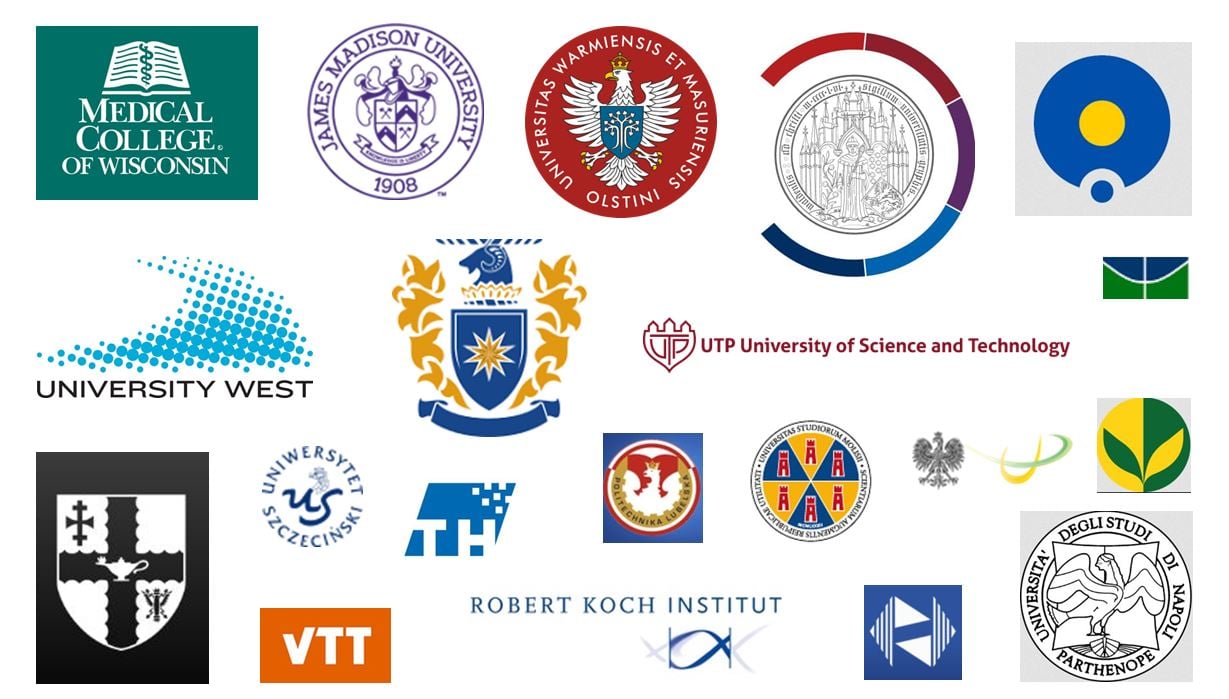
Authors affiliated with these institutions can now enjoy a discount on the APC for papers accepted for publication in any MDPI journal. If you would like to learn more about our program, please visit: https://www.mdpi.com/about/ioap or email us at ioap@mdpi.com.
5 March 2019
MDPI Joins Jisc’s Publications Router Service
We are delighted to announce our participation in Jisc’s Publication Router project, as of March 2019.
Publications Router is a Jisc service that automatically sends notifications about research articles to institutions' systems such as their repositories or CRISs, since May 2015. Through this agreement, MDPI will provide Jisc with daily feeds and information regarding published articles, which will be gathered by their system and delivered to institutions also registered to this service. Nearly all of our articles are published within 15 days of acceptance, so institutions will receive them quite promptly.
The feed will include the full text of the published version of record, with no embargo, so the articles can be exposed immediately for public view. They are accompanied by rich metadata, including confirmation of the immediate CC BY licence, minimising the need for any manual intervention or checking.
For more information about Publications Router, you may contact Jisc’s central helpdesk at help@jisc.ac.uk. For any queries about MDPI’s institutional agreements and collaborations, you may get in touch with MDPI’s Institutional Engagement team at ioap@mdpi.com, which would be very happy to hear from further UK institutions.
1 February 2019
2018 MDPI Top Reviewer Award—Winners Announced
Rigorous peer-review is the cornerstone of high quality academic publishing. Over 97,000 scholars served as reviewers for MDPI journals in 2018. We are extremely appreciative of all those who made a contribution to the editorial process in this capacity. At the beginning of every year, journal editorial offices publish a list all reviewers’ names to express our gratitude. In addition, this year the “MDPI Top Reviewer Awards” are announced, to recognize the very best reviewers for their expertise, dedication, high quality, and timely review reports. We are pleased to announce the following winners of the 2018 MDPI Top Reviewer Awards:
- Ali Behnood
- Andrea Pezzuolo
- Angela Gorgoglione
- Anna D'Auria
- Antonio D'Andrea
- Azhar Abbas
- Bogdan Zagajewski
- Chunhui Chen
- Dominika Głąbska
- Dominika Guzek
- Dragan Pamucar
- Francisco J. G. Silva
- Frank Li
- Gianluca Serafini
- Gyorgy Szekely
- Haozhi Pan
- Helvi Heinonen-Tanski
- José Manuel Gómez-Soberón
- Kathy Lewis
- Klara Kosova
- Luis N. López De Lacalle
- M. Z. Naser
- Malwina Tytła
- Masoume Amirkhani
- Matteo Ghidelli
- Moretti Laura
- Petra Schneider
- Roberto Cerchione
- Spyros Papaefthymiou
- Ştefan Cristian Gherghina
30 January 2019
Six Titles Added in SCIE: Antibiotics, Antioxidants, Brain Sciences, Diagnostics, Photonics and Universe
The six journals listed below have been added into the Science Citation Index Expanded (SCIE) in Web of Science. Antibiotics, Antioxidants, Brain Sciences, Diagnostics and Universe are due to receive first Journal Impact Factors in this year's release of the Journal Citation Reports (Clarivate Analytics), while Photonics is going to receive a first Impact Factor in 2020.
Thank you to the authors, editors and reviewers involved, for turning these journals into venues for publishing original, state-of-the-art research!
|
Journal |
Current Volume |
Scope |
|
microbiology; infectious diseases; antimicrobial agents | more | submit article |
||
|
antioxidant metabolism; natural and dietary antioxidants; pharmacodynamics and pharmacokinetics | more | submit article |
||
|
cognitive neuroscience; clinical neuroscience; developmental neuroscience; molecular and cellular neuroscience; neuroimaging; theoretical and computational neuroscience | more | submit article |
||
|
medical imaging; molecular diagnostics; nuclear medicine | more | submit article |
||
|
optics and optical materials; photonic materials and technology; fibre-optic communication; quantum optics | more | submit article |
||
|
quantum gravity; quantum mechanics and field theory; theoretical particle physics | |
24 January 2019
JAMS Journals: A Low-Cost Publishing Platform

Since 2010, MDPI has run its own online submission system. More recently, we have made the software, with accompanying publishing services, available to other publishers as JAMS (Journal and Article Management System). We are now delighted to announce the launch of JAMS Journals, a standardized platform for operating open access journals at low cost.
JAMS Journals provides a comprehensive service, including a shared submission website, journal websites hosted at a URL provided by the publisher, and a full production service. There is a small setup fee and the cost for each published paper is just a few hundred Swiss francs.
The platform demonstrates that running an open access journal can be straightforward and affordable. The JAMS Journals platform is suitable for
- small publishers or groups of scholars looking to launch their own journal;
- existing publishers or societies seeking to explore open access options;
- publishers looking to convert an existing subscription journal to open access.
JAMS journals launches with two journals from Canadian-based publisher Etcetera Publications:
- Canadian Journal of Pesticides & Pest Management (http://www.cjppm.ca)
- Nanotechnology in Agriculture, Food & Environment (http://www.nanoafe.ca)
Dr AJ Al-Rajab (President of Etcetera Publications) comments:
“In the past few months, we were working on our project to launch new open access scientific journals in the field of agricultural and environmental sciences. We decided to go with JAMS for this venture because of the high quality of their services, reasonable prices, professionalism and easy communication. Our portfolio is expected to grow rapidly during 2019 to include more titles covering different areas in agriculture and environment. MDPI earned already our complete satisfaction and we are looking for a long term cooperation.”
Alongside the new platform, we continue to provide flexible, tailored journal management solutions for existing publishers. For any questions or to request a quotation, contact Dr. Constanze Schelhorn (constanze.schelhorn@mdpi.com).
24 January 2019
Popularity of Preprints Continues to Grow

2018 was a great year for preprints, with increasing numbers of authors looking to make their papers available online before peer review. Along with other preprint servers, our platform Preprints.org saw an increase in the uptake from authors, and more than double the number of announced papers compared to 2017. In fact, we recently passed two important milestones: 8000 preprints online and 30,000 authors.
We believe that the whole research community has the opportunity to benefit from work being available online as early as possible. We thank and congratulate our authors for supporting us to make this goal a reality.
In 2019, we will be looking carefully at how to provide better value for authors, maintain efficiency while growing in size, and make sure we remain well-connected with the research community.
If you want to participate, you can consider screening preprints or joining our advisory board. And, of course, posting your own work.
9 January 2019
Open Access Agreement between the Austrian Academic Library Consortium (KEMÖ), the Austrian Science Fund (FWF), and MDPI

We are delighted to announce the establishment of our national Open Access agreement with the Austrian Academic Library Consortium (KEMÖ) and the Austrian Science Fund (FWF). Through this national agreement, the Austrian institutions listed below as well as FWF will cover the Article Processing Charges (APC) of manuscripts published by eligible corresponding or funded authors in MDPI journals as long as central funds are available.
All participating institutions have gained access to the MDPI online submission system where they can find full article metadata and pricing information as well as Funder and Grant ID details for easy identification and additional transparency. At the same time eligible authors are benefited from an APC discount which comes at no cost for the institutions.
Eligible corresponding authors affiliated with the participating institutions are prompted to choose the corresponding Institutional Open Access Program (IOAP) when they submit an article via our online submission system. The program will be selected automatically if authors submit their papers using their institutional email address. To claim their discount, FWF funded authors should choose the particular funder and add their Grant ID upon online submission of their manuscript. The institutions will then crosscheck the information and confirm the APC funding.
Eligible authors that have their APC covered by their institution or funder are advised to include the following sentence in their acknowledgments: "Open Access Funding by the [name of the institution/funder]".
The full text of the agreement is openly available online at: http://doi.org/10.5281/zenodo.2536007
For any questions about the agreement, please contact the KEMÖ Consortium at emedien@obvsg.at, FWF at Katharina.Rieck@fwf.ac.at, or the MDPI IOAP team at ioap@mdpi.com.
The Austrian institutions participating in this agreement are:
- Austrian Science Fund (FWF)
- University for Continuing Education Krems
- University of Applied Sciences BFI Vienna
- University of Applied Sciences Upper Austria
- University of Applied Sciences Technikum Wien
- Vorarlberg University of Applied Sciences
- International Institute for Applied Systems Analysis (IIASA)
- Institute of Science and Technology Austria
- MCI Management Center Innsbruck
- University of Graz
- University of Linz
- University of Salzburg
- Graz University of Technology
- TU Wien
- University of Veterinary Medicine Vienna
- University of Vienna
This is our first collective agreement with a national library consortium, while the individual institutions around the world participating in our IOAP are now more than 500 - see details here: https://www.mdpi.com/about/ioap. We would be mostly interested in discussing about possible collaborations with other consortia, funders, and institutions in our mutual efforts to accelerate Open Access.
2 January 2019
Encyclopedia—the Scholarly Community Encyclopedia

We are pleased to announce the new platform Encyclopedia, which is an online reference created and curated by active scholars. It aims to highlight the latest research results as well as providing benchmark information for researchers and the general public interested in accurate and advanced knowledge on specific topics.
We encourage authors of review articles to quote and adapt the content of their published papers to create Encyclopedia entries. You can create completely new entries on topics in which you have knowledge and expertise. There is no limit on the topics or research fields. All of science and the humanities are included. Each entry will be published directly after submission.
We also have prepared a DOI application function in Encyclopedia. Once a DOI application is approved, the entry website will announce the DOI number and a pdf version with DOI information will be automatically created.
We look forward to your contributions and hope you will make use of this service. Find more about the service at: https://encyclopedia.pub/
30 October 2018
Institutional Open Access Agreement between Bill and Melinda Gates Foundation and MDPI
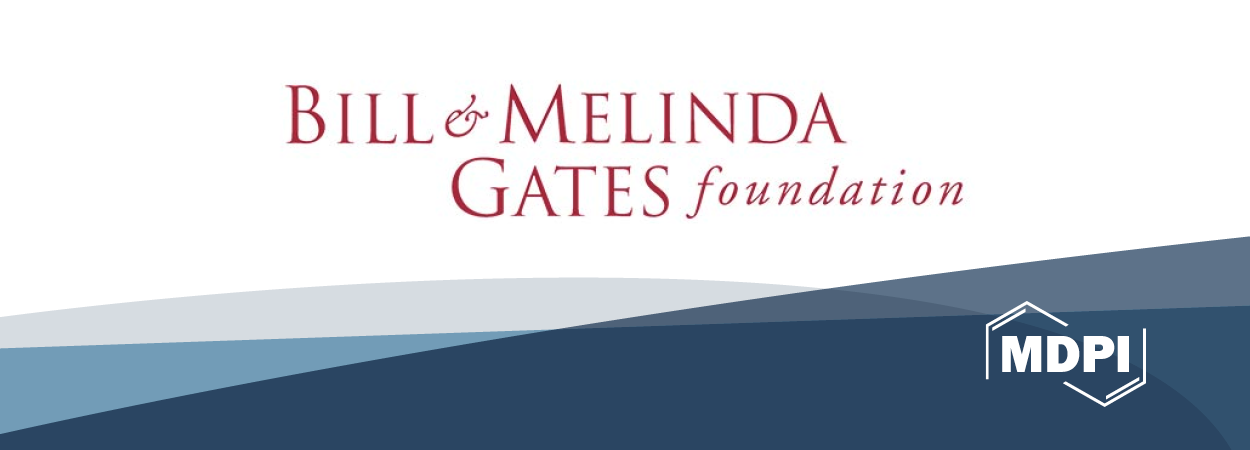
We are delighted to announce that the Bill and Melinda Gates Foundation (BMGF) is now a participant of our Institutional Open Access Program (IOAP). Authors funded by the BMGF can enjoy discounts on the APC, while the funder covers the costs of eligible articles centrally. BMGF also has access to the MDPI online submission system where they can find full article metadata and pricing information as well as Grant ID details for easy identification and additional transparency.
We hope that funded authors find the programme beneficial and we are happy to offer our IOAP to other funders that need a streamlined workflow of compliance checking and APC coverage.
To claim their discount, BMGF funded authors should choose the particular funder and add their Grant ID upon online submission of their manuscript.
For any questions about the BMGF agreement, please contact the funder at support@chronos-oa.com or the MDPI IOAP team at ioap@mdpi.com.
2 October 2018
MDPI Welcomes Plan S
Recently, it was announced that a group of European funders supported 10 principles that will help to expand open access, known as Plan S. MDPI warmly welcomes this move as a step towards achieving more open and accessible communication of research across all disciplines. Some aspects remain to be clarified, however the details given so far match the aims and values that MDPI has held over the past two decades.

We believe that open access publishers should be active participants in discussions around Plan S, particularly regarding potential new business models and practical aspects of implementation. MDPI supports APCs as a transparent unit of payment for article publishing, however we are committed to exploring other measures and recently signed the Jussieu Call. Sustainability is a key value for MDPI, and future funding models should have at their heart the sustainability of knowledge and research dissemination. Plan S provides an opportunity for funders and publishers to directly discuss funding of open access journals in ways that are beneficial to all parties involved.
30 August 2018
MDPI establishes Open Access agreement with Qatar National Library

We are happy to announce the establishment of an Open Access (OA) agreement with Qatar National Library (QNL). QNL is committed to supporting and helping Qatar authors publish OA at no cost. Through this national agreement, QNL will cover the Article Processing Charges (APC) of manuscripts published by Qatar-based corresponding authors in MDPI journals.
Eligible corresponding authors affiliated with Qatar research centers and universities are prompted to choose QNL as part of our Institutional Open Access Program (IOAP) when they submit an article via our online submission system. The program will be selected automatically if authors submit their papers using their institutional email and/or a computer registered with the institution’s IP range. QNL will then crosscheck the information and confirm the APC funding.
Qatar authors that have their APC covered by QNL are advised to include the following sentence in their acknowledgments: "The publication of this article was funded by Qatar National Library".
For more information, please visit Open Access at QNL or email the QNL Open Access team at openaccess@qnl.qa.
6 June 2018
Meet Us at the 18th World Congress of Basic and Clinical Pharmacology in Kyoto

We will be attending the 18th World Congress of Basic and Clinical Pharmacology, which will be held in Kyoto, Japan, 1–6 July 2018, and representing the following open access journals:
JCM
Pharmaceuticals
Biomedicines
Brain Sciences
Diseases
Pharmacy
Tropical Medicine and Infectious Disease
Cancers
Marine Drugs
Please come along to our booth (#3-6) to chat with our delegates about our journals. We'll gladly answer any questions about our journals and about open access publishing. We look forward to meeting you in person in Edmonton!
For more information on the conference, please visit:
http://www.wcp2018.org/
31 May 2018
Brain Sciences 2017 CiteScore™ Announced - 2.56
We are pleased to report Brain Sciences received a CiteScore of 2.56 for 2017. The metric reflects citation activity in 2017 in Scopus for papers published in the period 2014‒2016.
For the full details in the current CiteScore release, please see the journal's Source profile. To check the full list of MDPI journals receiving CiteScores, please see here.
31 May 2018
2017 CiteScore™ Metrics Released
The 2017 CiteScore™ data is available now, based on citation data in the Scopus® database. The current CiteScore reflects citation activity in 2017 for articles published in 2014‒2016. Please note that the list below includes journals assigned a CiteScore in this year’s release. For a full list of journals indexed in Scopus, please see our journal list.
Thirteen of our journals received a CiteScore which is in the top 10% of the distribution in at least one of the categories (marked with * in the table below), while a further 32 journals exhibit scores that are in the first quartile of the respective categories.
To access the full data for MDPI journals, please see here. More data can also be found in SJR Scimago Journal & Country Rank.
Unlike CiteScores and the widely used Journal Impact Factors, the Source Normalized Impact per Paper (SNIP) metrics are normalized in order to correct for differences in citation practices between scientific fields. Therefore, the SNIP allows direct comparison between journals specialized in different fields.
According to 2017 data, MDPI publishes six journals with an average citation impact, or SNIP, in excess of 1.500. These journals are Biomolecules, Cancers, Journal of Clinical Medicine (JCM), Marine Drugs, Remote Sensing and Sensors (see the last column in the table below).
CiteScore Data for MDPI Journals
| Journal | Rank (Quartile) |
Category | Link | CiteScore 2017 | 2016 |
2015 |
SNIP 2017 |
| Aerospace | 43/116 (Q2) | • Aerospace Engineering | Link | 1.23 | - | - | 1.152 |
| Agriculture | 69/309 (Q1) 91/398 (Q1) 78/255 (Q2) |
• Agronomy and Crop Science • Plant Science • Food Science |
Link | 1.93 | - | - | 1.133 |
| Agronomy | 46/309 (Q1) | • Agronomy and Crop Science | Link | 2.38 | - | - | 1.115 |
| Algorithms | 22/46 (Q2) 61/125 (Q2) 60/107 (Q3) 64/114 (Q3) |
• Numerical Analysis • Computational Mathematics • Computational Theory and Mathematics • Theoretical Computer Science |
Link | 1.03 | 1.15 | 1.07 | 0.749 |
| Animals | 12/154 (Q1) * 48/367 (Q1) |
• General Veterinary • Animal Science and Zoology |
Link | 2.02 | 1.46 | 1.66 | 1.099 |
| Antibiotics | 6/68 (Q1) * 62/263 (Q1) 55/230 (Q1) 31/108 (Q2) 47/134 (Q2) 139/398 (Q2) |
• General Pharmacology, Toxicology and Pharmaceutics • Infectious Diseases • Pharmacology (medical) • Microbiology (medical) • Microbiology • Biochemistry |
Link | 2.85 | 1.65 | - | 0.975 |
| Antibodies | 43/143 (Q2) 61/164 (Q2) 85/189 (Q2) |
• Drug Discovery • Immunology and Allergy • Immunology |
Link | 2.85 | - | - | 0.844 |
| Antioxidants | 23/119 (Q1) 35/169 (Q2) 100/398 (Q2) 119/367 (Q2) 102/264 (Q2) |
• Clinical Biochemistry • Physiology • Biochemistry • Molecular Biology • Cell Biology |
Link | 3.42 | - | - | 1.361 |
| Applied Sciences | 48/270 (Q1) 15/66 (Q1) 31/116 (Q2) 18/53 (Q2) 151/434 (Q2) 186/535 (Q2) |
• General Engineering • Fluid Flow and Transfer Processes • Instrumentation • Process Chemistry and Technology • General Materials Science • Computer Science Applications |
Link | 1.90 | - | - | 0.801 |
| Biology | 12/177 (Q1)* 32/186 (Q1) 10/40 (Q1) |
• General Agricultural and Biological Sciences • General Biochemistry, Genetics and Molecular Biology • General Immunology and Microbiology |
Link | 3.48 | 3.02 | 2.78 | 0.961 |
| Biomolecules | 31/398 (Q1) * 41/367 (Q1) |
• Biochemistry • Molecular Biology |
Link | 5.72 | 1.67 | 3.08 | 1.542 |
| Biosensors | 20/119 (Q1) | • Clinical Biochemistry | Link | 3.59 | 2.83 | 2.37 | 1.122 |
| Brain Sciences | 47/111 (Q2) | • General Neuroscience | Link | 2.56 | - | - | 0.695 |
| Cancers | 26/323 (Q1) * 23/191 (Q1) |
• Oncology • Cancer Research |
Link | 5.82 | 5.02 | 4.07 | 1.567 |
| Catalysts | 32/151 (Q1) 21/46 (Q2) |
• Physical and Theoretical Chemistry • Catalysis |
Link | 3.23 | 3.44 | 3.45 | 0.954 |
| Crystals | 76/272 (Q2) 140/434 (Q2) 127/398 (Q2) 26/64 (Q2) |
• General Chemical Engineering • General Materials Science • Condensed Matter Physics • Inorganic Chemistry |
Link | 1.97 | 1.89 | 1.47 | 0.745 |
| Diagnostics | 49/119 (Q2) | • Clinical Biochemistry | Link | 2.43 | - | - | 0.788 |
| Diversity | 30/124 (Q1) 14/52 (Q2) 83/306 (Q2) 11/29 (Q2) |
• Nature and Landscape Conservation • Agricultural and Biological Sciences (miscellaneous) • Ecology • Ecological Modelling |
Link | 2.15 | 2.03 | 1.96 | 1.300 |
| Electronics | 109/644 (Q1) 26/148 (Q1) 42/224 (Q1) 50/259 (Q1) 23/96 (Q1) |
• Electrical and Electronic Engineering • Hardware and Architecture • Control and Systems Engineering • Computer Networks and Communications • Signal Processing |
Link | 2.97 | - | - | 1.227 |
| Energies | 6/73 (Q1) * 31/192 (Q1) 103/644 (Q1) 4/16 (Q1) 47/140 (Q2) |
• Control and Optimization • Energy Engineering and Power Technology • Electrical and Electronic Engineering • Energy (miscellaneous) • Renewable Energy, Sustainability and the Environment |
Link | 3.11 | 2.50 | 2.87 | 1.340 |
| Entropy | 35/202 (Q1) | • General Physics and Astronomy | Link | 2.41 | 1.87 | 1.99 | 1.189 |
| Forests | 17/129 (Q1) | • Forestry | Link | 2.31 | 2.06 | 1.76 | 0.990 |
| Future Internet | 132/259 (Q3) | • Computer Networks and Communications | Link | 1.25 | - | - | - |
| Games | 132/187 (Q3) 78/110 (Q3) 305/418 (Q3) |
• Statistics and Probability • Statistics, Probability and Uncertainty • Applied Mathematics |
Link | 0.61 | 0.87 | 0.57 | 1.038 |
| Genes | 21/91 (Q1) 74/311 (Q1) |
• Genetics (clinical) • Genetics |
Link | 3.49 | 3.62 | 3.18 | 0.374 |
| Geosciences | 32/182 (Q1) |
• General Earth and Planetary Sciences | Link | 1.97 | 1.67 | 1.29 | 0.856 |
| Information | 143/251 (Q3) | • Information Systems | Link | 1.16 | 0.78 | 0.94 | 1.146 |
| Insects | 27/135 (Q1) | • Insect Science | Link | 1.85 | 1.81 | 1.38 | 0.719 |
| International Journal of Environmental Research and Public Health (IJERPH) | 80/478 (Q1) 34/106 (Q2) |
• Public Health, Environmental and Occupational Health • Health, Toxicology and Mutagenesis |
Link | 2.41 | 2.38 | 2.42 | 0.931 |
| International Journal of Molecular Sciences (IJMS) | 7/69 (Q1) * 61/535 (Q1) 20/163 (Q1) 9/64 (Q1) 26/151 (Q1) 89/367 (Q2) 17/46 (Q2) |
• Spectroscopy • Computer Science Applications • Organic Chemistry • Inorganic Chemistry • Physical and Theoretical Chemistry • Molecular Biology • Catalysis |
Link | 3.86 | 3.73 | 3.37 | 0.998 |
| ISPRS International Journal of Geo-Information (IJGI) | 79/605 (Q1) 22/82 (Q2) 13/36 (Q2) |
• Geography, Planning and Development • Earth and Planetary Sciences (miscellaneous) • Computers in Earth Sciences |
Link | 2.10 | 1.62 | 1.52 | 1.062 |
| Journal of Clinical Medicine (JCM) | 10/841 (Q1) * | • General Medicine | Link | 7.07 | - | - | 1.535 |
| Journal of Functional Biomaterials (JFB) | 43/199 (Q1) 23/77 (Q2) |
• Biomedical Engineering • Biomaterials |
Link | 3.47 | - | - | 1.344 |
| Journal of Low Po- wer Electronics and Applications (JLPEA) |
301/644 (Q2) | • Electrical and Electronic Engineering | Link | 1.12 | 0.98 | 0.83 | 0.367 |
| Journal of Personalized Medicine (JPM) | 54/189 (Q2) | • Medicine (miscellaneous) | Link | 2.61 | - | - | 0.944 |
| Land | 50/124 (Q2) 129/306 (Q2) 36/65 (Q3) |
• Nature and Landscape Conservation • Ecology • Global and Planetary Change |
Link | 1.44 | - | - | 0.658 |
| Life | 4/94 (Q1) * 70/561 (Q1) 40/186 (Q1) 20/80 (Q2) |
• Palaeontology • Ecology, Evolution, Behavior and Systematics • General Biochemistry, Genetics and Molecular Biology • Space and Planetary Science |
Link | 3.16 | 2.95 | 1.68 | 0.935 |
| Marine Drugs | 17/146 (Q1) | • Drug Discovery | Link | 4.58 | 3.83 | 3.66 | 1.537 |
| Materials | 83/434 (Q1) | • General Materials Science | Link | 3.02 | 3.26 | 3.11 | 1.285 |
| Membranes | 5/18 (Q2) 15/53 (Q2) 4/10 (Q2) |
• Chemical Engineering (miscellaneous) • Process Chemistry and Technology • Filtration and Separation |
Link | 2.69 | 2.19 | 2.95 | 0.880 |
| Metabolites | 47/209 (Q1) 103/398 (Q2) 127/367 (Q2) |
• Endocrinology, Diabetes and Metabolism • Biochemistry • Molecular Biology |
Link | 3.35 | - | - | 0.925 |
| Metals | 155/434 (Q2) | • General Materials Science | Link | 1.87 | - | - | 0.955 |
| Micromachines | 105/554 (Q1) 154/644 (Q1) 64/224 (Q2) |
• Mechanical Engineering • Electrical and Electronic Engineering • Control and Systems Engineering |
Link | 2.31 | 1.83 | 1.78 | 0.987 |
| Minerals | 33/175 (Q1) 45/208 (Q1) |
• Geotechnical Engineering and Engineering Geology • Geology |
Link | 2.21 | 2.13 | 1.77 | 1.149 |
| Molecules | 4/25 (Q1) 25/172 (Q1) 18/104 (Q1) 31/163 (Q1) 30/151 (Q1) 31/146 (Q1) 55/160 (Q2) |
• Chemistry (miscellaneous) • Pharmaceutical Science • Analytical Chemistry • Organic Chemistry • Physical and Theoretical Chemistry • Drug Discovery • Molecular Medicine |
Link | 3.27 | 3.09 | 2.65 | 1.146 |
| Nutrients | 11/255 (Q1) * 9/112 (Q1) * |
• Food Science • Nutrition and Dietetics |
Link | 4.35 | 4.29 | 4.07 | 1.403 |
| Pathogens | 38/263 (Q1) 20/108 (Q1) 9/40 (Q1) 40/164 (Q1) 110/367 (Q2) |
• Infectious Diseases • Microbiology (medical) • General Immunology and Microbiology • Immunology and Allergy • Molecular Biology |
Link | 3.52 | - | - | 1.166 |
| Pharmaceuticals | 14/172 (Q1) * 33/160 (Q1) |
• Pharmaceutical Science • Molecular Medicine |
Link | 4.12 | 4.90 | 3.64 | 1.370 |
| Pharmaceutics | 21/172 (Q1) | • Pharmaceutical Science | Link | 3.68 | 3.83 | 2.68 | 1.092 |
| Photonics | 30/116 (Q1) 80/270 (Q2) 53/160 (Q2) |
• Instrumentation • Radiology Nuclear Medicine and Imaging • Atomic and Molecular Physics, and Optics |
Link | 1.96 | - | - | 0.817 |
| Plants | 73/561 (Q1) 48/389 (Q1) 44/306 (Q1) |
• Ecology, Evolution, Behavior and Systematics • Plant Science • Ecology |
Link | 3.13 | - | - | 0.969 |
| Polymers | 17/142 (Q1) 63/359 (Q1) |
• Polymers and Plastics • General Chemistry |
Link | 3.30 | 3.74 | 3.37 | 1.213 |
| Religions | 26/389 (Q1) * | • Religious Studies | Link | 0.56 | - | - | 0.676 |
| Remote Sensing | 13/182 (Q1) * | • General Earth and Planetary Sciences | Link | 4.03 | 3.56 | 3.76 | 1.559 |
| Resources | 19/142 (Q1) 39/261 (Q1) |
• Nature and Landscape Conservation • Management, Monitoring, Policy and Law |
Link | 2.69 | - | - | 1.387 |
| Scientia Pharmaceutica | 92/172 (Q3) | • Pharmaceutical Science | Link | 0.86 | - | - | 0.513 |
| Sensors | 9/116 (Q1) * 25/160 (Q1) 100/644 (Q1) 19/104 (Q1) 113/398 (Q2) |
• Instrumentation • Atomic and Molecular Physics, and Optics • Electrical and Electronic Engineering • Analytical Chemistry • Biochemistry |
Link | 3.23 | 2.78 | 2.21 | 1.550 |
| Social Sciences | 81/213 (Q2) | • General Social Sciences | Link | 0.60 | - | - | 0.445 |
| Sustainability | 61/605 (Q1) * 55/261 (Q1) 60/140 (Q2) |
• Geography, Planning and Development • Management, Monitoring, Policy and Law • Renewable Energy, Sustainability and the Environment |
Link | 2.37 | 1.96 | 1.78 | 1.030 |
| Symmetry | 44/327 (Q1) 17/45 (Q2) 16/40 (Q2) 14/25 (Q2) |
• General Mathematics • Computer Science (miscellaneous) • Physics and Astronomy (miscellaneous) • Chemistry (miscellaneous) |
Link | 1.32 | 1.12 | 0.95 | 0.802 |
| Toxins | 18/106 (Q1) 21/111 (Q1) |
• Health, Toxicology and Mutagenesis • Toxicology |
Link | 3.32 | 3.34 | 3.76 | 1.136 |
| Vaccines | 5/230 (Q1) * 13/263 (Q1) * 18/302 (Q1) * 11/146 (Q1) * 32/189 (Q1) |
• Pharmacology (medical) • Infectious Diseases • Pharmacology • Drug Discovery • Immunology |
Link | 4.88 | 1.23 | 3.76 | 1.255 |
| Viruses | 29/263 (Q1) 16/68 (Q1) |
• Virology • Infectious Diseases |
Link | 3.88 | 3.60 | 3.74 | 1.130 |
| Water | 66/605 (Q1) 37/191 (Q1) 43/199 (Q1) 193/398 (Q2) |
• Geography, Planning and Development • Water Science and Technology • Aquatic Science • Biochemistry |
Link | 2.29 | 2.05 | 1.96 | 1.007 |
30 April 2018
Winners of the First MDPI Writing Prize
We are pleased to announce the results of the first MDPI Writing Prize. We received a large number of entries from across the globe on the theme of “The Global Benefits of Open Research”. It was a pleasure to read so many original, well-researched and well-presented ideas, and the final choice was not an easy one. We are pleased to announce that the winners are as follows:
1st prize (500 CHF, Swiss knife and certificate)
Edmond Sanganyado, Shantou University, China
2nd prizes (250 CHF, Swiss knife and certificate)
Kamala T. Rajahgopal, Asia e University, Malaysia
Yin Zhixuan, Qingdao University of Technology, China
3rd prizes (100 CHF, Swiss knife and certificate)
Alexandra Ticea, Carol Davila University of Medicine and Pharmacy, Romania
Ankur Sarker, University of Virginia, USA
Daniel Attoye, United Arab Emirates University, UAE
Congratulations to all of them! The winning entries can be downloaded by clicking on the names above. A compilation of all entries will soon be available as an open access book.
The writing prize is sponsored by the MDPI English editing service.
23 March 2018
Check for Updates: A New Function in the Article PDF Version

At MDPI, we always want to keep you up to date. Even for already published articles, some corrections or minor changes may occur. To prevent you from missing any updates, from now on you will be able to access the latest version of any manuscript by clicking on the “check for updates” logo that you can find in the PDF file, even if you have saved the file on your computer.
13 March 2018
MDPI Becoming a Member of UKSG
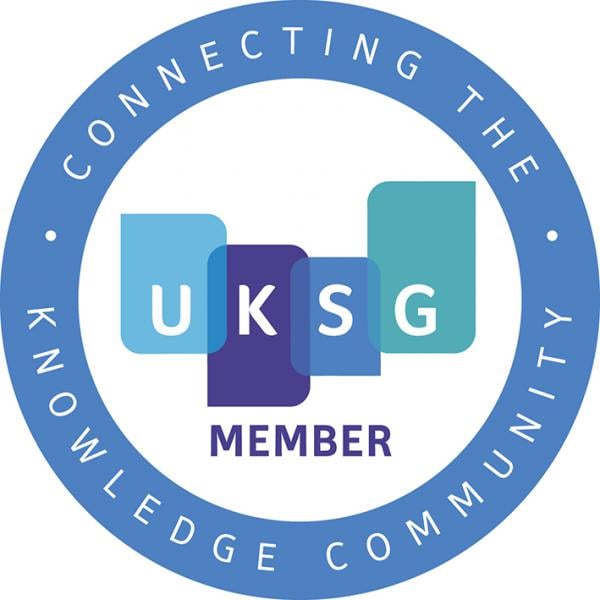
We are proud to announce that MDPI is now a member of UKSG, the UK´s largest scholarly communications community. Through UKSG, different stakeholders share their knowledge and experience in order to improve the knowledge and information environment for researchers. UKSG´s members include universities, publishers, content providers, intermediaries, and other similar organisations. Members participate in discussions and events on issues around scholarly communications.
The UKSG Annual Conference and Exhibition is a flagship initiative from the UKSG and one of the most stimulating events in the scholarly communications calendar. It is held annually and attracts a large number of delegates. More information is available at https://www.uksg.org/events/annualconference
MDPI is delighted to be a part of this active community and we look forward to making our own contribution. We will continue to support organisations and initiatives that boost collaboration and vision within scholarly communication.
More information about UKSG can be found at https://www.uksg.org/. The full membership list is available at: https://www.uksg.org/members.
1 February 2018
MDPI Signed the San Francisco Declaration on Research Assessment (DORA)

The DORA initiative addresses the need for advanced approaches in the evaluation and measurement of the quality of scientific research outputs. It is a worldwide initiative covering all scholarly disciplines. MDPI proudly joins a list of more than 400 organizations around the world which support DORA’s recommendations for improving the way the quality of research results is evaluated.
More info can be found at http://www.ascb.org/dora/
22 January 2018
Meet Us at the Experimental Biology 2018 (21–25 April 2018) in San Diego, CA, USA

MDPI will be attending the Experimental Biology 2018 annual meeting in San Diego, CA, USA from 21 to 25 April 2018, representing the following open access journals:
Antibiotics
Antioxidants
Behavioral Sciences
Bioengineering
Biology
Biomedicines
Brain Sciences
Cancers
Cells
Dentistry Journal
Diagnostics
Diseases
Epigenomes
Fermentation
Genes
High-Throughput
International Journal of Molecular Sciences (IJMS)
International Journal of Environmental Research and Public Health (IJERPH)
Journal of Clinical Medicine (JCM)
Journal of Developmental Biology (JDB)
Journal of Functional Morphology and Kinesiology (JFMK)
Metabolites
Methods and Protocols
Microorganisms
Non-Coding RNA
Nutrients
Pharmaceuticals
Pharmaceutics
Proteomes
Sports
Veterinary Sciences
Viruses
Experimental Biology is the annual meeting of five societies comprised of more than 14,000 scientists and 25 guest societies.
The areas of primary focus include anatomy; biochemistry and molecular biology; investigative pathology; nutrition; pharmacology; physiology. Attendees represent scientists from academic institutions, government agencies, non-profit organizations and industry.
Conference details:
San Diego Convention Center
San Diego CA
USA
21–25 April 2018
Do you want to learn more about MDPI open access journals? Don’t miss this opportunity to discuss them with our editors and MDPI delegates. If you are at Experimental Biology 2018, just come visit our booth for a moment to have a chat. We have some gifts for you to take home and will answer any questions that you have about the open access journal (booth # 1034).
For more information, please visit:
http://experimentalbiology.org/2018/Home.aspx
19 December 2017
Announcing the MDPI English Writing Prize
The competition is still open until end of March! Please check out the banner for more details: https://mdpi-res.com/data/english-prize.pdf
15 December 2017
UCL Press Adopts the MDPI Editorial Platform JAMS
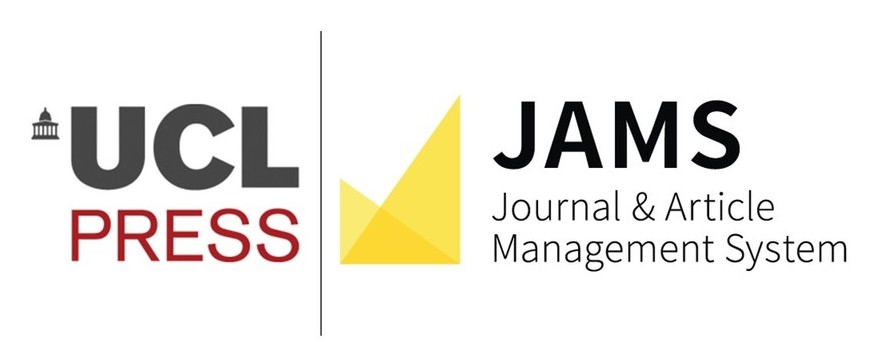
We are delighted to announce that UCL Press has adopted MDPI's Journal Article & Management System, JAMS, including production services. JAMS is a modular, integrated editorial platform for academic publishers. It offers flexibility, ease-of-use, and is a fully integrated solution for the end-to-end management of scholarly journals. JAMS is based on the software used to publish MDPI’s portfolio of journals.
Ian Caswell, UCL Press Journals Manager, says he is "excited to see UCL Press and MDPI partner together to implement the JAMS submission system for all UCL Press journals. The system offered a flexible, efficient and straightforward solution for our processes from author submission to ready for publication. I am grateful for the valuable experience and support MDPI have offered and look forward to developing our programme with an effective submission system in place.” Dr Martyn Rittman, MDPI’s Publishing Services Manager, adds, “We are proud to support one of the UK’s premier university presses in their publishing operation. This is an excellent way for us at MDPI to share our experience and knowledge, and benefit the research community beyond our own journals.”
JAMS combines services that are kept separate for many publishers. The entire editorial process, production and invoicing (e.g. for open access article processing charges) are fully integrated into a single platform. This allows for efficient, fast manuscript processing. For further information about JAMS, see https://www.mdpi.com/publishing_services.
23 November 2017
New Participants in the Institutional Open Access Program (IOAP)
We are pleased to welcome new participants to MDPI's Institutional Open Access Program (IOAP), designed to help institutions manage the transition to the Open Access publishing model. Researchers affiliated with participating universites benefit from a 10% discount on the Article Processing Charges (APC) for any paper published in an MDPI journal, while the participating library or university incurs no basic fee for participating in the program.
The IOAP set of free services, provided by MDPI to institutions that sign up, include:- No fee for participants and no obligation to prolong after the initial 12 months. The participants may withdraw from the programme at any time, and we will also keep it free for the library for as long as they continue in the programme.
- Authors affiliated with the university will receive a 10% discount on the APC.
- The institution is granted free access to the MDPI submission system and can receive free alerts of new submissions to our journals.
- By default, authors from the institution will continue to be invoiced directly unless the institution opts for central billing.
- Auto-archiving of papers into the institutions´ repository as long as it supports SWORD 1.3.
More details about the programme and a list of our current participant institutions can be found at: https://www.mdpi.com/about/ioap
Institutions which are interested to participate may do so online at: https://www.mdpi.com/ioap-form
The following North American universities have signed up to the IOAP program recently:
Connecticut College, USA
Emory University, USA
Florida International University, USA
Johns Hopkins University, USA
Mississippi State University, USA
Northeastern University, USA
Rice University, USA
University of Ontario Institute of Technology, Canada
University of Rhode Island, USA
University of Texas Southwestern Medical Center, USA
University of Toronto, Canada
University of Windsor, Canada
University of Wisconsin–Madison, USA
Wellesley College, USA
West Virginia University, USA
Many prestigious institutions from Europe and Asia have joined as well:
Asia Pacific University of Technology & Innovation, Malaysia
Czech Technical University in Prague, Czech Republic
Gdansk University of Technology, Poland
Martin-Luther-Universität Halle-Wittenberg, Germany
National Chung Hsing University, Taiwan
Newcastle University, UK
Northumbria University, UK
Southwest University, China
Technical University of Crete, Greece
University Malaya, Malaysia
University of Antwerp, Belgium
University of Cyprus, Cyprus
University of Manchester, UK
University of Reading, UK
University of Sussex, UK
University of Warwick, UK
West Pomeranian University of Technology Szczecin, Poland
We offer a warm welcome to the new participants!
10 November 2017
Available Journal Awards at MDPI
In order to reward the academic community, especially young researchers, and enhance communication among scientists, MDPI journals regularly offer various awards to researchers in specific fields, for example, Young Investigator Awards, Travel Awards, Best Paper Awards, and Best Poster Awards, etc. The awardees range from PhD students to junior scientists.
Currently, the following 44 awards given by MDPI journals are accepting applications. Please click on the award title below to check whether you are eligible for it and start the application process.
|
Subject |
Journal |
Award |
Intended Awardee |
|
Biology & Life Sciences |
Animals |
PhD students or postdoctoral researchers |
|
|
Antioxidants |
Postdoctoral researchers or PhD students |
||
|
Biology |
PhD or postdoctoral fellows |
||
|
Forests |
Postdocs or PhD students |
||
|
International Journal of Molecular Sciences (IJMS) |
Ground-breaking contribution in the fields of Molecular Biology, and Molecular Pathology |
||
|
Journal of Fungi (JoF) |
Travel Awards 2018 |
PhD graduate students, and postdoctoral fellows |
|
|
Life |
Travel Award 2018 |
PhD students or postdoctoral fellows |
|
|
Metabolites |
PhD students |
||
|
Pharmaceuticals |
PhD students |
||
|
Toxins |
Postdoctoral fellows |
||
|
Viruses |
Viruses 2018 participants |
||
|
Viruses |
Viruses 2018 participants |
||
|
Water |
2018 Young Investigator Award |
Young investigators |
|
|
Chemistry & Materials Science |
Biomimetics
|
Graduate Student or Postdoctoral Trainee / Research Associate |
|
|
Catalysts |
PhD students |
||
|
Chemosensors |
PhD or postdoctoral fellows |
||
|
Entropy |
Young investigators |
||
|
Fibers |
2018 Travel award |
Postdocs or PhD students |
|
|
Magnetochemistry |
Postdocs |
||
|
Materials |
PhD or postdoctoral fellows |
||
|
Metals |
PhD or postdoctoral fellows |
||
|
Minerals |
PhD or postdoctoral fellows |
||
|
Sensors |
Travel Award 2018 |
PhD or postdoctoral fellows |
|
|
Sensors |
Sensors' reviewers in 2017 |
||
|
Sensors |
Young investigators |
||
|
Technologies |
PhD students |
||
|
Computer Science & Mathematics |
Multimodal Technologies and Interaction (MTI) |
Postdoctoral researchers or PhD students |
|
|
ISPRS International Journal of Geo-Information(IJGI) |
Postdocs |
||
|
Journal of Sensor and Actuator Networks (JSAN) |
Postdoctoral fellows and PhD students |
||
|
Journal of Imaging |
Postdoctoral fellows and PhD students |
||
|
Engineering |
Actuators |
PhD or postdoctoral fellows |
|
|
Remote Sensing |
Authors |
||
|
Machines |
PhD or postdoctoral fellows |
||
|
Micromachines |
PhD or postdoctoral fellows |
||
|
Fluids |
Postdoctoral fellows and PhD students |
||
|
ChemEngineering |
Postdoctoral researchers and PhD students |
||
|
Environmental & Earth Sciences |
Diversity |
Travel Awards 2018 |
Postdoctoral fellows |
|
International Journal of Environmental Research and Public Health (IJERPH) |
Authors who submit from 1 Nov 2017 to 31 Oct 2018 |
||
|
Resources |
Postdocs or PhD students |
||
|
Geosciences |
Postdoctoral fellows and PhD students |
||
|
Physical Sciences & Astronomy |
Galaxies |
Ph.D. students, postdoctoral fellows, or lecturers in cosmology or galaxies physics |
|
|
Applied Science |
Postdocs |
||
|
Medicine & Pharmacology; Public Health & Healthcare |
Journal of Clinical Medicine (JCM) |
PhD or postdoctoral fellows |
|
|
Medicines |
Postdocs |
7 November 2017
MDPI has signed the Jussieu Call for Open Science and Bibliodiversity
The Jussieu Call aims to develop and implement alternative models to meet the aims of open science while promoting bibliodiversity. In particular it wishes to promote new business models for funding open access publication. It was drafted on the Jussieu campus in Paris by a group of French researchers and scientific publishing professionals.
MDPI supports scholarly communities and initiatives that innovate and further promote Open Access publishing. There is a need to explore different frameworks to fund open access in ways that ensure that excessive funds are not diverted from research towards publishing. Many fair funding models already exist, and they can be further developed and extended. These include institutional support, library contributions or subsidies, premium services, participatory funding, etc. For this reason, MDPI has signed up to the Jussieu call and welcomes its aims.
More information can be found at http://jussieucall.org/ (archived here)
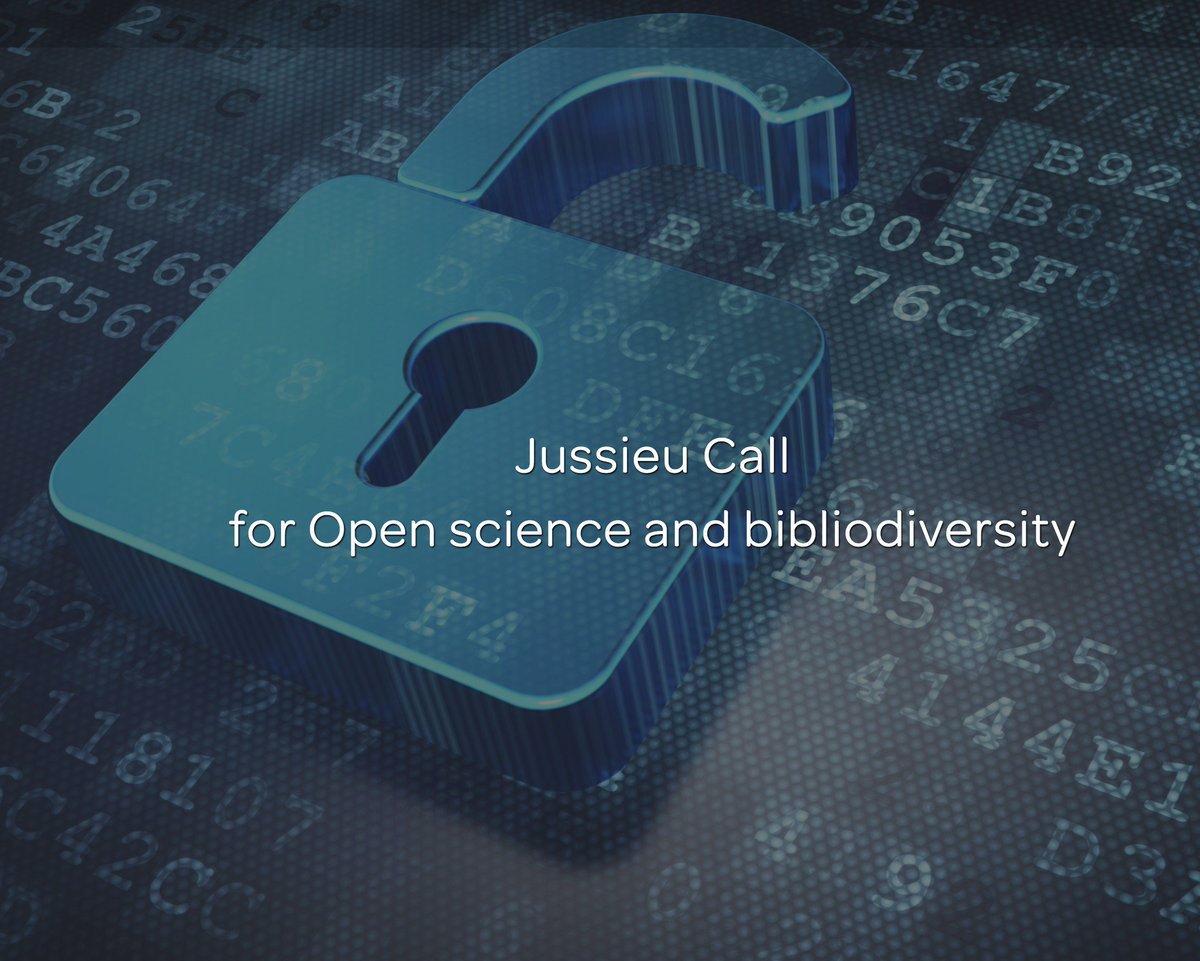
6 October 2017
Dr. Franck Vazquez, MDPI CEO, Interviewed by Scholarly Kitchen
The Society for Scholarly Publishing’s popular blog about topics in academic publishing, Scholarly Kitchen, recently interviewed MDPI’s CEO, Dr. Franck Vazquez. He shared some thoughts and information on the past and future of MDPI and open access publishing in general:
“In the long run, we aim to anchor MDPI in research communities. We recently developed and launched the preprint platform Preprints, revamped our free-to-use conference hosting platform Sciforum, and are working on other projects, such as Scilit, our bibliographic database.”
Read the full interview here.
3 October 2017
Meet Us at the 2017 NCRI Cancer Conference in Liverpool
We will be attending the 2017 NCRI Cancer Conference, which will be held in Liverpool, UK, 5–8 November 2017, representing the following open access journals:
Cancers
Genes
Antibodies
Brain Sciences
Journal of Clinical Medicine
Children
Vaccines
Please come along to our stand, No.22, to have a chat with our delegates about the journals, and information on online publishing as well as our editorial procedures. You may also learn more about the various awards offered by the journals, including the Best Reviewer Awards, the Young Investigator Awards, etc. Some useful handouts are also available. We look forward to meeting you in person to answer any questions you may have.
Conference address:
2017 NCRI Cancer Conference
BT Convention Centre, Liverpool, UK
Conference date:
5–8 November 2017
For more information on the conference, please visit:
http://conference.ncri.org.uk/
19 September 2017
A Warm Welcome to the New IOAP Participants
We are delighted to have welcomed 24 new participants to our Institutional Open Access Programme (IOAP) since the beginning of September this year. These are University libraries and Research Institutions located around the world; from the USA and Canada to the UK, and from Norway and Spain to Greece. Well respected Universities, such as the University of Denver, the University of Colorado Boulder, and the University of Arizona in the US, have signed up, while their researchers can now benefit from a 10% discount on the Article Processing Charges (APC) for any papers they publish in MDPI journals, at no cost for the library or the University.
We are more than happy to see the Open Access movement growing stronger and wider every day and we appreciate the vital role which librarians, repository managers, and other scholarly communications professionals play in the field. Our communication with and service to this community is, therefore, one of our principal priorities. The IOAP is our way to support academic and scientific Institutions as well as their scholars in managing, administrating, and publishing research in an Open Access world.
The IOAP set of free services, provided by MDPI to institutions that sign up, include:
- No fee for participants and no obligation to prolong after the initial 12 months. The participants may withdraw from the programme at any time, and we will also keep it free for the library for as long as they continue in the programme.
- Authors affiliated with the university will receive a discount on the article processing charge (APC).
- The institution is granted free access to the MDPI submission system and can receive free alerts of new submissions to our journals.
- By default, authors from the institution will continue to be invoiced directly unless the institution opts for central billing.
- Auto-archiving of papers into the institutions´ repository as long as it supports SWORD 1.3.
More details about the programme and a list of our current participant institutions can be found at: https://www.mdpi.com/about/ioap
Institutions which are interested to participate may do so online at: https://www.mdpi.com/ioap-form
The full list of the Institutions that signed up in September is as follows:
- University of Denver, USA
- University of Colorado Boulder, USA
- University of Arizona, USA
- Institute of Metrology of Bosnia and Herzegovina, Bosnia and Herzegovina
- Middlebury College, USA
- Touro College, USA
- University of New Orleans, USA
- University of Leicester, UK
- Indiana University-Purdue University Indianapolis, USA
- University of Strathclyde, UK
- Cranfield University, UK
- Hope College, USA
- Oregon State University, USA
- Drew University, USA
- Swansea University, UK
- University of South Florida, USA
- University of Georgia, USA
- Arizona State University, USA
- University of Southern Mississippi, USA
- Université du Québec à Chicoutimi, Canada
- Grinnell College, USA
- Norwegian University of Science and Technology, Norway
- University of Patras, Greece
- Public University of Navarre, Spain
23 June 2017
Congratulations for Publishing the 100,000th Peer-Reviewed Article
Congratulations to the authors Javier Monroy and Javier Gonzalez-Jimenez from Universidad de Malaga, Spain, Victor Hernandez-Bennets, Han Fan and Achim Lilienthal from Örebro University, Sweden for publishing the 100,000th peer-reviewed article.
The article is published in the Chemical Sensors section of Sensors.
GADEN: A 3D Gas Dispersion Simulator for Mobile Robot Olfaction in Realistic Environments
Evermore pressing environmental concerns have led global actors and decision-makers to search for stricter emission monitoring approaches. As part of novel monitoring systems, robots with gas and environmental sensors are a promising solution. However, validation of such robotic inspectors is expensive, time consuming, and plagued by repeatability issues. In this article, we present GADEN (the short form for Gas Dispersion Simulator for Mobile Robot Olfaction in Realistic Environments), which combines gas dispersion and robotics simulation in a common framework. Developed under the widely used Robot Operating System (ROS), GADEN enables validation of sensing strategies with gas dispersion being simulated using computational fluid dynamics and filament dispersion theory. GADEN allows simulating complex, realistic, 3D environments for reproducible testing of robotic gas sensing algorithms. Through qualitative and quantitative evaluations, we show that GADEN is a versatile and user-friendly evaluation tool and emphasize its enormous potential for the mobile robot olfaction community.
Read the full article here: https://www.mdpi.com/1424-8220/17/7/1479/htm
6 June 2017
CiteScore™ Metrics Released for Scopus Journals
The CiteScore, the new citation metric for journals covered in the Scopus® database, was released on 1 June 2017, reflecting the citation activity in 2016 for articles published during the three previous years. Please note that the list below does not contain all MDPI journals covered in Scopus. For the CiteScore to serve as a reliable metric at least three volumes of articles need to be indexed in Scopus; journals which have not met this criterion have been omitted here.
Ten MDPI journals received a CiteScore which is in the Top 10% of scores in at least one of the categories, while a further 21 journals exhibit scores that are in the first quartile of the respective categories.
CiteScore Data for MDPI Journals
| Journal | Rank | Category | Link | CiteScore 2016 | 2015 |
2014 |
| Algorithms | 44/112 (Q2) 49/111 (Q2) 19/42 (Q2) 52/113 (Q2) |
• Numerical Analysis • Computational Mathematics • Computational Theory and Mathematics • Theoretical Computer Science |
Link | 1.15 | 1.07 | 1.06 |
| Animals | 69/343 (Q1) 21/146 (Q1) |
• Animal Science and Zoology • General Veterinary |
Link | 1.46 | 1.66 | 0.74 |
| Biology | 13/92 (Q1) 34/81 (Q1) 10/75 (Q1) |
• General Agricultural and Biological Sciences • General Biochemistry, Gene- tics and Molecular Biology • General Immunology and Microbiology |
Link | 3.02 | 2.78 | 1.74 |
| Biomolecules | 234/382 (Q3) 260/353 (Q3) |
• Biochemistry • Molecular Biology |
Link | 1.67 | 3.08 | 1.00 |
| Biosensors | 36/118 (Q2) 209/2156 (Q1) |
• Clinical Biochemistry • General Medicine |
Link | 2.83 | 2.37 | 2.04 |
| Cancers | 29/196 (Q1) 27/321 (Q1) |
• Cancer Research • Oncology |
Link | 5.02 | 4.07 | 2.31 |
| Catalysts | 18/44 (Q2) 27/144 (Q1) |
• Catalysis • Physical and Theoretical Chemistry |
Link | 3.44 | 3.45 | 2.17 |
| Crystals | 70/270 (Q2) 25/64 (Q2) 118/398 (Q2) 131/424 (Q2) |
• General Chemical Engineering • Inorganic Chemistry • Condensed Matter Physics • General Materials Science |
Link | 1.89 | 1.47 | 1.03 |
| Diversity | 10/41 (Q1) 9/25 (Q2) 76/291 (Q2) 24/109 (Q1) |
• Agricultural and Biological Sciences (miscellaneous) • Ecological Modelling • Ecology • Nature and Landscape Conservation |
Link | 2.03 | 1.96 | 1.82 |
| Energies | - | - | Link | 2.50 | 2.87 | 2.66 |
| Entropy | 51/198 (Q2) | • General Physics and Astronomy | Link | 1.87 | 1.99 | 1.69 |
| Forests | 17/127 (Q1) | • Forestry | Link | 2.06 | 1.76 | 1.84 |
| Games | 204/398 (Q3) 83/181 (Q2) 48/105 (Q2) |
• Applied Mathematics • Statistics and Probability • Statistics, Probability and Uncertainty |
Link | 0.87 | 0.57 | 0.64 |
| Genes | 62/300 (Q1) 18/90 (Q1) |
• Genetics • Genetics (clinical) |
Link | 3.62 | 3.18 | 1.33 |
| Geosciences | 36/169 (Q1) |
• General Earth and Planetary Sciences | Link | 1.67 | 1.29 | 1.13 |
| Information | 156/237 (Q3) | • Information Systems | Link | 0.78 | 0.94 | 0.74 |
| Insects | 28/131 (Q1) | • Insect Science | Link | 1.81 | 1.38 | 1.23 |
| International Journal of Environmental Research and Public Health (IJERPH) | 67/446 (Q1) 31/102 (Q2) |
• Public Health, Environmental and Occupational Health • Health, Toxicology and Mutagenesis |
Link | 2.38 | 2.42 | 2.47 |
| International Journal of Molecular Sciences (IJMS) | 23/157 (Q1) 8/64 (Q1) 90/353 (Q1) 22/144 (Q1) 16/44 (Q1) 8/62 (Q1) |
• Organic Chemistry • Inorganic Chemistry • Molecular Biology • Physical and Theoretical Chemistry • Catalysis • Spectroscopy |
Link | 3.73 | 3.37 | 3.06 |
| ISPRS International Journal of Geo-Information | 12/29 (Q2) 28/79 (Q2) 96/587 (Q1) |
• Computers in Earth Sciences • Earth and Planetary Sciences (miscellaneous) • Geography, Planning and Development |
Link | 1.62 | 1.52 | - |
| Journal of Low Power Electronic Applications (JLPEA) | 301/645 (Q2) | • Electrical and Electronic Engineering | Link | 0.98 | 0.83 | 0.83 |
| Life | 65/525 (Q1) 36/186 (Q1) 5/92 (Q1) 20/80 (Q2) |
• Ecology, Evolution, Behavior and Systematics • General Biochemistry, Gene- tics and Molecular Biology • Palaeontology • Space and Planetary Science |
Link | 2.95 | 1.68 | 1.20 |
| Marine Drugs | 18/145 (Q1) | • Drug Discovery | Link | 3.83 | 3.66 | 3.59 |
| Materials | 63/424 (Q1) | • General Materials Science | Link | 3.26 | 3.11 | 2.69 |
| Membranes | 103/424 (Q1) | • Materials Science | Link | 2.19 | 2.95 | 2.42 |
| Micromachines | 173/645 (Q2) 69/211 (Q2) 113/526 (Q1) |
• Electrical and Electronic Engineering • Control and Systems Engineering • Mechanical Engineering |
Link | 1.83 | 1.78 | 2.10 |
| Minerals | 45/206 (Q1) 29/167 (Q1) |
• Geology • Geotechnical Engineering and Engineering Geology |
Link | 2.13 | 1.77 | - |
| Molecules | 32/157 (Q1) | • Organic Chemistry | Link | 3.09 | 2.65 | 2.62 |
| Nutrients | 12/247 (Q1) | • Food Science | Link | 4.29 | 4.07 | 3.78 |
| Pharmaceuticals | 8/168 (Q1) 21/158 (Q1) |
• Pharmaceutical Science • Molecular Medicine |
Link | 4.90 | 3.64 | 1.92 |
| Pharmaceutics | 19/168 (Q1) | • Pharmaceutical Science | Link | 3.83 | 2.68 | 2.46 |
| Polymers | 13/138 (Q1) 44/354 (Q1) |
• Polymers and Plastics • General Chemistry |
Link | 3.74 | 3.37 | 4.10 |
| Remote Sensing | 13/169 (Q1) | • General Earth and Planetary Sciences | Link | 3.56 | 3.76 | 3.23 |
| Sensors | 25/96 (Q2) 25/159 (Q1) 124/382 (Q2) 103/645 (Q1) |
• Analytical Chemistry • Atomic and Molecular Physics, and Optics • Biochemistry • Electrical and Electronic Engineering |
Link | 2.78 | 2.21 | 2.40 |
| Sustainability | 49/129 (Q2) 68/587 (Q1) 56/236 (Q1) |
• Renewable Energy, Sustai-nability and the Environment • Geography, Planning and Development • Management, Monitoring, Policy and Law |
Link | 1.96 | 1.78 | 1.52 |
| Symmetry | 17/42 (Q2) 49/111 (Q2) |
• Numerical Analysis • Computational Mathematics |
Link | 1.12 | 0.95 | 1.02 |
| Toxins | 16/102 (Q1) 16/108 (Q1) |
• Health, Toxicology and Mutagenesis • Toxicology |
Link | 3.34 | 3.76 | 2.85 |
| Vaccines | 146/184 (Q4) 151/250 (Q3) 93/145 (Q3) 186/299 (Q3) 130/232 (Q3) |
• Immunology • Infectious Diseases • Drug Discovery • Pharmacology • Pharmacology (medical) |
Link | 1.23 | 3.76 | 2.85 |
| Viruses | 15/68 (Q1) 34/250 (Q1) |
• Virology • Infectious Diseases |
Link | 3.60 | 3.74 | 3.80 |
| Water | 33/184 (Q1) 48/195 (Q1) 62/587 (Q1) 198/382 (Q3) |
• Water Science and Technology • Aquatic Science • Geography, Planning and Development • Biochemistry |
Link | 2.05 | 1.96 | 1.45 |
17 May 2017
Three New Institutional Memberships Established
We are pleased to announce that the Goethe University of Frankfurt, the Technical University of Hamburg (TU Hamburg-Harburg), as well as the Humboldt University of Berlin, in Germany, have joined MDPI's institutional membership program: Primary authors from these instititions will benefit from a 10% discount on the article processing charges.
Additional details can be found on our institutional membership page.
4 May 2017
MDPI Supports the Initiative for Open Citations (I4OC)
As an open access publisher, we are keen to support openness and transparency in the research process. Citation data is very important for assessing the value of individual papers and the contribution of researchers. As such, we support the recently launched Initiative for Open Citations (I4OC). The initiative recognizes that citations should be freely available and machine-readable. By doing so, authors gain the maximum benefit from having their work cited.
MDPI now uploads citation data with metadata uploaded to Crossref when registering digital object identifiers (DOIs) for published papers. We are delighted to take this step to support a truly open research environment.
2 May 2017
Publons Peer Review Academy Goes Live
Getting high quality review reports is critical for any journal’s editorial process. At MDPI we have put in place several measures to motivate reviewers and reward them for their work. We are proud of the quality of reviewer reports we receive and grateful for the hours put in by active researchers from across the globe.
Reviewers of MDPI’s largest journals can get recognition via Publons, a website dedicated to rewarding peer reviewers. They have now taken this one step further and launched the Publons Reviewer Academy to help train reviewers to provide useful feedback. Through the academy, researchers can be trained and tutored in various aspects of how to provide structured feedback that will be of genuine help to editors and authors. We support this initiative and recommend it to potential MDPI reviewers, especially early career researchers. See the Publons announcement for further information.
More information on reviewing for MDPI, including how to volunteer as a reviewer, can be found here.
24 April 2017
Two New Institutional Memberships Established
We are pleased to announce that the following universities have joined MDPI's institutional membership program: Trinity University, San Antonio, Texas, USA and the University of New South Wales (UNSW), Sydney, Australia. Primary authors from these instititions will benefit from a 10% discount on the article processing charges.
Additional details can be found on our institutional membership page.
30 March 2017
Credit for Preprints Comments via Publons
Preprints.org is a platform run by MDPI that allows authors to make early versions of manuscripts available before peer review has been completed.
One of the major benefits of putting a preprint online is to get feedback before journal submission. Until now, however, the feedback has been on a voluntary basis. Preprints is delighted to be the first preprint server to collaborate with Publons to acknowledge substantial comments as reviews and give commentators the opportunity to receive credit for their efforts.
When you add a comment to any article, there is a check box to click for it to appear on Publons. If you have already linked your account it will be passed on automatically. If you don't already have a Publons account, you will be contacted soon afterwards with instructions on how to create one.
We appreciate the enthusiasm and cooperation of Publons in this project and expect it to be of great benefit to authors and commenters alike.
20 March 2017
MDPI 2016 Annual Report Released
We are pleased to announce that our annual report for the year 2016 has now been published.
It contains information regarding company and journal performance, conferences and other publishing services that we provided throughout 2016.
To read the report in full or download a copy, please click here.
15 March 2017
Our 100,000th Article Could be Yours!
After the 20th anniversary of MDPI in 2016, we will reach another milestone this year and will publish the 100,000th peer-reviewed article in one of our 170+ open access journals.
We would like you to be part of this great achievement and so are offering to publish the 100,000th accepted paper free of charge.
To be in with a chance, select a journal in one of our 10 scientific subject areas and submit your paper.
Access the live tracker on published articles here.
![]()
3 March 2017
1000 Preprints Online
We are delighted that Preprints now has 1000 papers online since its launch on 3 May 2016.
For more information, see the editorial here.
9 February 2017
Minister and State Secretaries Visit MDPI Office at STP, Belgrade, Serbia
Earlier this week the Science Technology Park in Belgrade, Serbia was visited by Swiss Secretary of State Dr. Mauro Dell’Ambrogio, as well as Serbian Minister of Public Administration and Local Self-Government Ana Brnabic, State Secretary Dr. Vladimir Popovic and Mayor of Belgrade Mr. Siniša Mali.
During the visit to the STP they had a short presentation from MDPI’s CEO Dr. Franck Vazquez and IT Manager Mr. Miloš Čučulović, and further discussed important issues such as Open Access and Open education. Dr. Dell'Ambrogio said he was impressed with the potential for development and ideas for business.
For more information please see:
http://bit.ly/2kpIu7k and http://bit.ly/2kpUQfz
7 February 2017
The 6th World Sustainability Forum: Final Press Release
Basel, 29 January 2017
The 6th World Sustainability Forum #WSF2017SA: African universities critical to achieving the Sustainable Development Goals
Jeffrey and Sonia Sachs win first World Sustainability Award.
Universities need to take the lead in solving the greatest challenges the world faces today, particularly in Africa. They need to do this not only through education – teaching the next generation to think critically and creatively to find sustainable solutions – but also through research that cuts across a range of disciplines. To ensure these solutions are implemented, they need to partner with the private sector and with government.
This was the key message from the 6th World Sustainability Forum (WSF2017), which took place in Cape Town on 27 and 28 January 2017. Sponsored by MDPI and the journal Sustainability under the patronage of the Universities of the Western Cape (UWC), Cape Town (UCT), University of Basel and the National Research Foundation (NRF) of South Africa, the conference was attended by key national and international speakers, including world-leading economist Professor Jeffrey D. Sachs, senior United Nations (UN) advisor and director of the Earth Institute at Columbia University.
The WSF is an annual sustainability conference which addresses research in a range of areas related to sustainable development and sustainability globally. This was the first WSF to take place on the African continent. Discussions at the 2017 conference were driven by the 17 sustainable development goals (SDGs) adopted as part of the 2030 Agenda for Sustainable Development by the UN in September 2015.
Achieving the SDGs “is the moonshot for our generation,” said Sachs. “Like the moonshot [moon landing] of the 1960s, these are tough, bold and achievable objectives.”
“This is a nasty, tough world we live in, and our world agrees on very little. So when 193 governments agree on something, that is important. And when they agree on something as important as sustainable development, that is really something for us to grab hold of – that is a lifeline.”
There was agreement at the WSF that the SDGs are particularly important for Africa, and that African universities in particular have a role to play in achieving them.
Said Professor Tyrone Pretorius, vice-chancellor of UWC: “The quest for sustainable development can only be met through education. Universities today are the oil that fuels the knowledge economy.”
As part of the drive to develop academic capacity to provide the knowledge needed to meet the SDGs, WSF2017 was preceded by the 1st Postgraduate Forum on Sustainability. “A series of workshops for postgraduate education linked to WSF are important, in order to equip postgraduates with the skills necessary to promote sustainability,” said Professor Thandi Mgwebi, director for research at UWC. A second postgraduate forum will take place alongside the WSF2018 in Beijing.
This capacity development is particularly critical to Africa. Said Sachs: “African universities need to do research to find solutions to Africa’s development challenges, because no other university will.”
The UN set a target of achieving the SDGs by 2030: “I regard this as the breakthrough period to end extreme poverty on the continent,” said Sachs, “and for Africa to become one of the most dynamic centres of the world economy.”
It is a critical time for South African universities, said Professor Mamokgethi Phakeng, deputy vice-chancellor for research and internationalisation at UCT: “Higher education is at a crossroads, and there is much polarisation. We need to think carefully about how this sustainable development agenda is owned by all so that it is inclusionary.”
There was also strong emphasis on public–private partnerships – for universities, business and government to work together to achieve the goals.
Said Professor Francis Petersen, deputy vice-chancellor at UCT and vice-chancellor designate at the University of the Free State: “Business sustainability has become critical, because there is increasing demand and complexity of demand on business from the natural, social and economic environment. Sustainability cannot be a standalone issue, divorced from business as usual. Sustainability needs to be embedded into business.”
Environmental crises and climate change was also high on the WSF agenda. In his keynote address, Sachs noted the irreversibility of the climate- and environmental-related challenges.
“If we don’t get our act together, we lose the chance of safety,” he said.
Said Professor Mark New, pro vice-chancellor and director of the African Climate and Development Initiative at UCT: “We have a fundamental challenge in responding to climate change, and we must go further than just putting a plaster on a wound. We need to address the deep structural issues, to move from our current model of development into climate-compatible development.”
“This requires researchers to find the evidence for the correct development pathways to take, and then support the ability of policymakers at all levels to enable the shift to climate-compatible development planning.”
Said Dr. Aldo Stroebel, executive director of international relations and cooperation at the NRF, in closing: “We have seen over the past two days an urgency towards the next step of thinking, that critical type of framework that we all must engage with, not only from an academic perspective, but further up into the policy environment and into rural-based environments where one can clearly see the links and effectiveness of the work.”
World Sustainability Awards
The first World Sustainability Award and the first Emerging Sustainability Leader Awards were presented by Prof. Thandi Mgwebi, Director of Research at UWC, and Dr. Franck Vazquez, CEO of MDPI, during the ceremony on 27 January 2017 as part of the gala dinner of the 6th World Sustainability Forum in South Africa.after day one of proceedings of the 2017 World Sustainability Forum South Africa.
Professor Jeffrey D. Sachs and Dr. Sonia Ehrlich Sachs are the joint recipients of the first World Sustainability Award. Jeffrey Sachs is a world-renowned economist and senior United Nations (UN) advisor and director of the Earth Institute at Columbia University. Sonia Sachs is a paediatrician and public health specialist, and director of the Health Centre at the Centre for Sustainable Development, also at Columbia University.
The joint recipients of the first Emerging Sustainability Leader Award are Dr. Esther Ngumbi and Dr. Xiaosong Hu. Esther Ngumbi is a postdoctoral researcher at Auburn University in Alabama USA and serves as a 2015 Clinton Global University Mentor for agriculture. Xiaosong Hu is a professor at the Chongqing University in China and specialises in automotive control systems and mechanical engineering.
The World Sustainability Award and the Emerging Sustainability Leader Awards are funded to encourage new initiatives and developments in sustainability with the ultimate aim of fostering the transition to sustainable practices and societies.
The World Sustainability Award is funded by the MDPI Sustainability Foundation, and included a monetary prize of USD 100,000 to Jeffrey and Sonia Sachs. The Emerging Sustainability Leader Award is funded by the journal Sustainability, awarded to researchers under 40, and included a monetary prize of USD10,000.
Issued jointly by: UCT Global Strategy and Visibility, Research Office, UWC Communications & Media and MDPI AG
Conference photos are free available at: https://sciforum.net/conference/wsf-6/page/175 Photo credit: Matthias Burkhalter
|
Carla Bernardo |
Luthando Tyhalibongo |
Matthias Burkhalter |
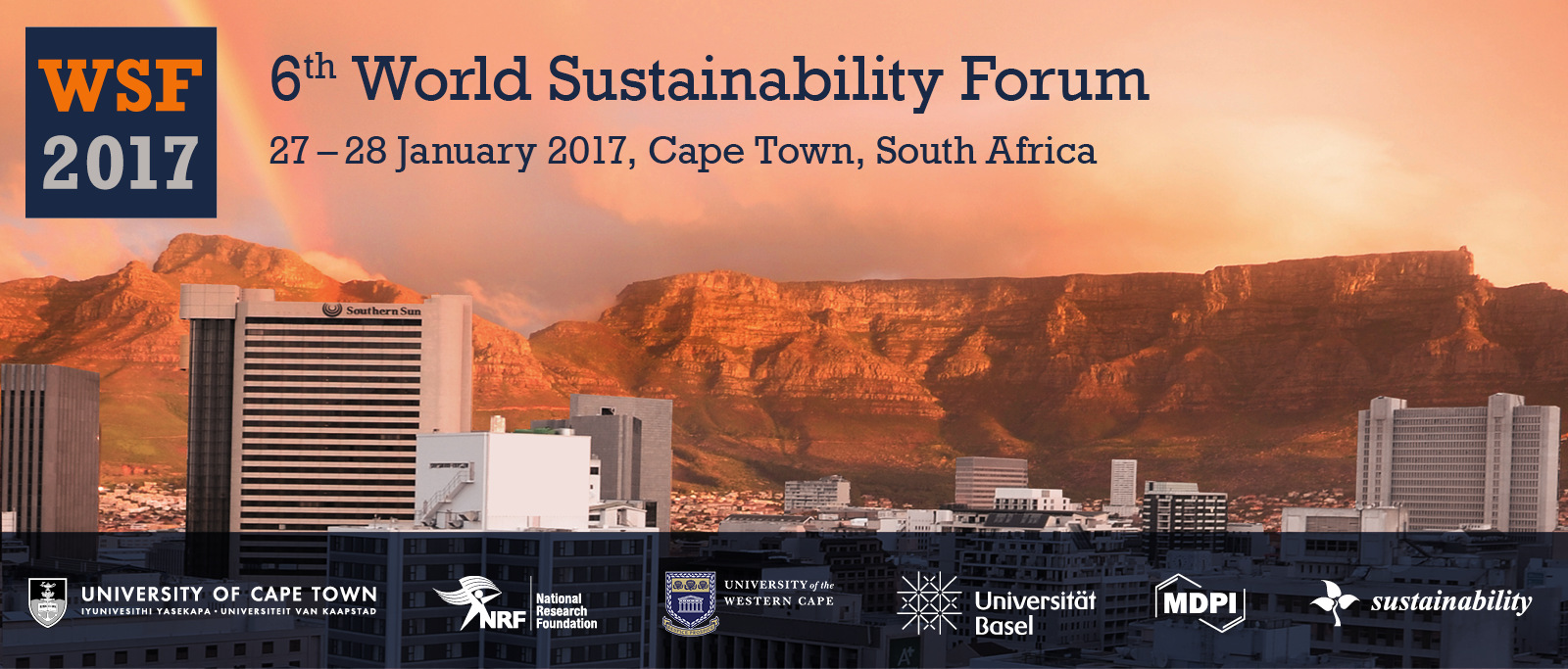
31 January 2017
Three New Institutional Memberships Established
We are pleased to announce that the Chalmers University of Technology, Sweden, the University of Manitoba, Canada and the Technical University of Cartagena, Spain, have joined MDPI's institutional membership program: Primary authors from these institutions will benefit from a 10% discount on the article processing charges.
Additional details can be found on our institutional membership page.
27 January 2017
6th World Sustainability Forum under way in South Africa
The 6th World Sustainability Forum is currently being held at the Cape Sun Hotel until 28 January 2017.
The Forum will showcase the work of internationally renowned researchers and include more than 150 presentations. During the conference dinner, the World Sustainability Award, associated with a US$ 100,000 prize, will be announced, as well as the Emerging Sustainability Leader Award, associated with a US$ 10,000 prize. The prizes are sponsored by the MDPI Sustainability Foundation and Sustainability, an academic open access journal by MDPI.
Here are some pictures from the forum so far:
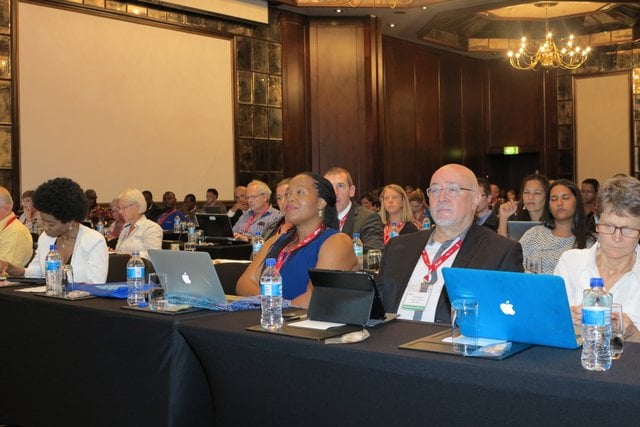

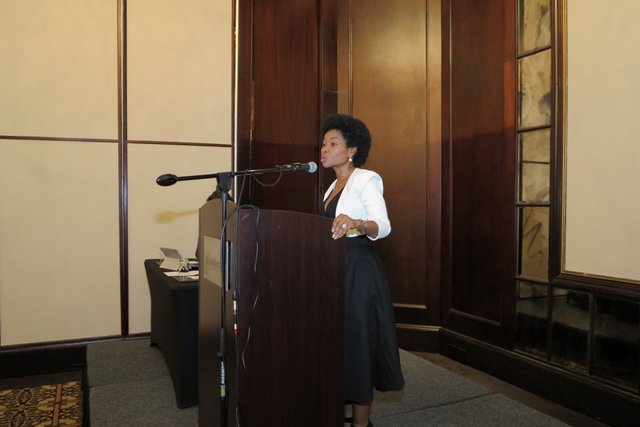
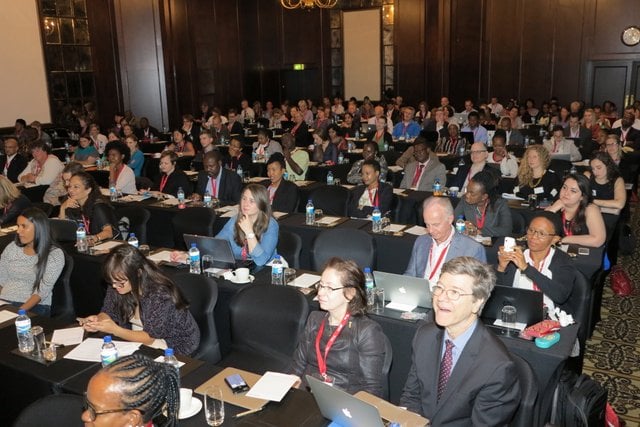
To see the full WSF2017 program and schedule, please see here: https://sciforum.net/conference/wsf-6/page/schedule
19 January 2017
Cape Town to Host the 6th World Sustainability Forum
Cape Town will host the 6th World Sustainability Forum at the Cape Sun Hotel on 27 and 28 January 2017. This prominent event, held for the first time in Africa, will include many illustrious South African and international experts, such as Her Excellency Graça Machel (Sustainable Development Advocate for the United Nations, Mozambique), Joyene Isaacs (HoD Agriculture Western Cape Government), Jeffrey Sachs (Columbia University, USA), Max Bergman (SRaM, University of Basel), Mark New (Pro Vice-Chancellor, University of Cape Town), Frans Swanepoel (FutureAfrica, University of Pretoria) and Francis Petersen (Vice-Chancellor-designate, University of the Free State). The Forum will provide a stage for national and international debates on sustainability in South Africa, the African continent, and about international perspectives on sustainability. It brings together researchers and representatives from government and the business sector to discuss a wide-ranging set of issues associated with sustainability, including food security, water and energy scarcity, mining, poverty reduction, climate change, and urbanisation.
The next few decades will be marked by profound changes in the relationships between global economics, national societies, and the environment. We have entered what some call the Anthropocene, an age in which human activity dominates the climate and the environment. These changes will have numerous consequences on societies around the globe. South Africa and Africa will play a central role, for better or worse, in creating opportunities and risks during these changing times as Africa is profoundly influencing and being influenced by global developments.
The adoption of the 17 United Nations Sustainable Development Goals and the 2030 Agenda for Sustainable Development in September 2015 was accompanied by what insiders considered an optimism they have not experienced in relation to UN resolutions before. The relative efficiency in the drafting, the lack of trenches between East and West, or between North and South, and the unanimity of support of the 193 countries speak volumes. In stark contrast, sustainability seems to go against a changing economic and political tide, where waves of nationalism and protectionism from some of the most powerful countries risk the wellbeing of the rest of the world. The 6th World Sustainability Forum will enable fruitful exchanges, which sensitise South African and international communities to the global urgency and specifics of sustainability.
The Forum will showcase the work of internationally renowned researchers and include more than 150 presentations. During the conference dinner, the World Sustainability Award, associated with a US$ 100 000 prize, will be announced, as well as the Emerging Sustainability Leader Award, associated with a US$ 10 000 prize. The prizes are sponsored by the MDPI Sustainability Foundation and Sustainability, an academic open access journal by MDPI. The World Sustainability Forum is preceded by the Postgraduate Forum on Sustainability, which will introduce more than 100 young scholars from South Africa and the African continent to sustainability research. Both events are organized and sponsored by the University of Cape Town, the University of the Western Cape, the University of Basel, MDPI, and by the National Research Foundation of South Africa.
Contacts:
Scientific Matters: Prof Manfred Max Bergman, Social Research and Methodology Group (SRaM), University of Basel, Switzerland; Email: max.bergman@unibas.ch
Press Accreditation and General Enquiries: Mr Matthias Burkhalter, MDPI AG, Basel, Switzerland; Email: burkhalter@mdpi.com; Tel. +41 61 683 77 34
Follow us on Twitter
#WSF2017SA
6 January 2017
MDPI Supports the OA2020 Initiative
MDPI is now a proud supporter of the OA2020 Initiative.
Open Access 2020 is an international initiative that aims to induce the swift, smooth and scholarly-oriented transformation of today’s scholarly journals from subscription to open access publishing.
MDPI is participating in the upcoming Berlin13 conference in March 2017, where we are contributing to the initiative by aiding in the design of the roadmap which will make OA the default publishing model.
For more information please see here.
5 January 2017
Three New Institutional Memberships Established
We are pleased to announce that the University of Texas at Arlington, USA, the Harbin Institute of Technology, China and TU Darmstadt, Germany, have joined MDPI's institutional membership program: Primary authors from these institutions will benefit from a 10% discount on the article processing charges.
Additional details can be found on our institutional membership page.
22 December 2016
Two New Institutional Memberships Established
We are pleased to announce that the Otto-von-Guericke-Universität Magdeburg, Germany and the University of California, Berkeley, USA, have joined MDPI's institutional membership program: Primary authors from these instititions will benefit from a 10% discount on the article processing charges.
Additional details can be found on our institutional membership page.
19 December 2016
MDPI and Wellcome Trust Compliance
The Wellcome Trust has, for a number of years, required that the results of its funded projects are published in open access format. Recently it announced criteria that publishers must fulfil for publication fees to be paid by the Trust. MDPI is pleased to have been added to the list of compliant publishers.
Only publishers who have confirmed their compliance by 16 December 2016 will be eligible to receive payment of APCs by the Wellcome Trust as of 1 April 2017. For more information on the criteria and a full list of publishers that meet them, see here.
13 December 2016
Meet MDPI at the 2016 AGU Fall Meeting
 MDPI is currently attending the 2016 AGU Fall Meeting (12–16 December, 2016)
MDPI is currently attending the 2016 AGU Fall Meeting (12–16 December, 2016)
If you are also attending the conference, please feel free to stop by our booth (Booth #1147) and meet the representative editors.
Conference details:
2016 AGU Fall Meeting
12–16 December 2016
Moscone Center
747 Howard St
San Francisco, CA 94103, USA
8 December 2016
Three New Institutional Memberships Established
We are pleased to announce that Purdue University, USA, the Universitat Politécnica de Valencia, Spain and the Queensland University of Technology, Australia, have joined MDPI's institutional membership program: Primary authors from these instititions will benefit from a 10% discount on the article processing charges.
Additional details can be found on our institutional membership page.
16 November 2016
World Sustainability Award - Final Extension
The deadline for the World Sustainability Award has been extended for one last time! You now have one more month to nominate an individual researcher, group or project! The final deadline for nominations will be December 15, 2016.
For full details, please visit here.
11 November 2016
Three New Institutional Memberships Established
We are pleased to announce that the University of Minnesota, USA, the Universidad Politécnica de Madrid, Spain and Shanghai Jiao Tong University, China, have joined MDPI's institutional membership program: Primary authors from these instititions will benefit from a 10% discount on the article processing charges.
Additional details can be found on our institutional membership page.
4 November 2016
MDPI Joins the United Nations Global Compact
MDPI has become a member of the United Nations Global Compact to support corporate sustainability and have committed ourselves to the ten principles associated with the Compact.
Sustainability has always been at the core of MDPI’s values, starting with the collection and preservation of rare chemical samples that started in 1996 and led to the first journal, Molecules. Sustainability has become one of our flagship journals and we have supported and organized several conferences and events based on Sustainability, including the upcoming 6th World Sustainability Forum. As a global enterprise, we see it as our duty to promote responsible practices that will ensure a bright future for our planet. Given this, the choice to join the Global Compact was an easy one and we will do our utmost to fully implement it.
3 November 2016
MDPI Now a Member of SPARC Europe
We are delighted to announce that MDPI has become a member of SPARC Europe, an organization that works for open scholarship in Europe, including support of open access publication.
As one of the few publishers to join SPARC Europe to date, MDPI looks forward to making a contribution that puts open scholarship on a positive and sustainable path. We fully support the goals of open scholarship that allow the largest number of people possible to benefit from work of researchers in all disciplines. We hope that our membership will enable us to work with other stakeholders to find the best possible solution.
2 November 2016
World Sustainability Award Deadline Extension
The deadline for the World Sustainability Award has been extended! You now have until November 15, 2016 to nominate an individual researcher, group or project!
For full details, please visit here.
26 October 2016
Four New Institutional Memberships Established
We are pleased to announce that the Wuppertal Institut, Germany, the University of Girona, Spain and Central South University and Huazhong University of Science and Technology, China, have joined MDPI's institutional membership program: Primary authors from these instititions will benefit from a 10% discount on the article processing charges.
Additional details can be found on our institutional membership page.
24 October 2016
International Open Access Week 2016
Meet us during International Open Access Week 2016! We will be presenting at various locations in Europe and China.
To get involved and for full details see the complete list of events organised by MDPI here.
18 October 2016
Institutional Membership established with Universitat Pompeu Fabra, Spain and Aalto University, Finland
We are pleased to announce that the Universitat Pompeu Fabra, Spain and Aalto University, Finland, have joined MDPI's institutional membership program: Primary authors from these universities will benefit from a 10% discount on the article processing charges.
Additional details can be found on our institutional membership page.
12 October 2016
Institutional Membership Established with Iowa State University and the University of North Texas, USA
We are pleased to announce that the Iowa State University and the University of North Texas, USA, have joined MDPI's institutional membership program: Primary authors from these universities will benefit from a 10% discount on the article processing charges.
Additional details can be found on our institutional membership page.
7 October 2016
MDPI at Open Access Days in Munich, 10-11 October 2016
Meet MDPI during the Open Access Days held from 10-11 October 2016 at Ludwig Maximilian University of Munich, Germany.
The two-day event will feature experts from the open access sector, scientists from all disciplines, publishing representatives and supporters of scientific research and communication from libraries as well as research institutes and funding institutions. Join us!
For more information about the event and to see the program, visit the event webpage.
7 October 2016
Institutional Membership Established with the University of Sevilla and the University of Alicante, Spain
We are pleased to announce that the University of Sevilla and the University of Alicante, Spain have joined MDPI's institutional membership program: Primary authors from these universities will benefit from a 10% discount on the article processing charges.
Additional details can be found on our institutional membership page.
29 September 2016
Institutional Membership Established with the University of Delaware
We are pleased to announce that the University of Delaware, USA, has joined MDPI's institutional membership program: Primary authors from this university will benefit from a 10% discount on the article processing charges.
Additional details can be found on our institutional membership page.
19 September 2016
Peer Review Week 2016
As an open access publisher indebted to the work of our peer reviewers, we are proud to support Peer Review Week 2016. As part of the week's activities and to celebrate this year's theme "Recognition for Review", MDPI will host two webinars that anyone can join.
These webinars will explore the role and value of reviewers and the recognition they receive from a publishers perspective, with examples from MDPI's experience in publishing nearly 80,000 peer reviewed papers, along with evidence from reviewer surveys. It will also touch upon potential changes in how review is carried out and tips for early career researchers who want to be involved in the review process.
Details and links to join can be found below:
Wednesday September 21, 08:00 (CEST)
Friday September 23, 16:00 (CEST)
For more information about all the activites taking place, please visit the Peer Review Week website.
6 September 2016
Institutional Membership established with Kansas State University and Northwestern University, USA
We are pleased to announce that Kansas State University and Northwestern Universty, USE, have joined MDPI's institutional membership program: Primary authors from these universities will benefit from a 10% discount on the article processing charges.
Additional details can be found on our institutional membership page.
5 September 2016
Institutional Membership Established with University College Cork
We are pleased to announce that University College Cork, Ireland, has joined MDPI's institutional membership program: Primary authors from this university will benefit from a 10% discount on the article processing charges.
Additional details can be found on our institutional membership page.
22 August 2016
MDPI New Office Location
We are pleased to announce that MDPI has now moved to a new permanent address:
MDPI AG
St. Alban Anlage 66
CH-4052 Basel
Postfach, CH-4020 Basel
Switzerland
Telephone and fax numbers remain unchanged.
18 August 2016
Antibiotics, Biomolecules and Brain Sciences Accepted for Coverage in Scopus
We are pleased to announce that the journals Antibiotics (ISSN 2079-6382), Biomolecules (ISSN 2218-273X) and Brain Sciences (ISSN 2076-3425) were recently selected to be included in Scopus. Citations are expected to be available in Scopus soon.
Scopus is the largest abstract and citation database of peer-reviewed literature and is published by Elsevier B.V. This means that the research you publish with Antiobiotics, Biomolecules and Brain Sciences will be more visible than ever.



10 August 2016
Institutional Membership established with the University of Texas at Austin, USA, the Wroclaw University of Science and Technology, Poland and the University of Granada and the Compultense University of Madrid, Spain
We are pleased to announce that the following institutions have joined MDPI's institutional membership program in August 2016:
- University of Texas at Austin, USA
- Wroclaw University of Science and Technology, Poland
- University of Granada, Spain
- Compultense University of Madrid, Spain
Authors affiliated with these institutions will benefit from a 10% discount on the article processing charges.
Additional details can be found on our institutional membership page.
18 July 2016
Institutional Membership established with Louisiana State University and Florida State University, USA, Royal College of Surgeons, Ireland, University of Rostock, Germany, AGH University of Science and Technology, Poland and Southeast University, China
We are pleased to announce that the following institutions have joined MDPI's institutional membership program in July 2016:
- Louisiana State University, USA
- Florida State University, USA
- Royal College of Surgeons, Ireland
- University of Rostock, Germany
- AGH University of Science and Technology, Poland
- Southeast University, China
Authors affiliated with these institutions will benefit from a 10% discount on the article processing charges.
Additional details can be found on our institutional membership page.
12 July 2016
MDPI Moving to New Office Location in Basel (Switzerland) in August 2016
As of 20 August 2016, MDPI's new address in Basel will be:
MDPI AG
St. Alban-Anlage 66
CH-4052 Basel
Switzerland
Telephone and fax numbers remain unchanged.
St. Alban-Anlage 66 was built from 1947 to 1948 and initially the home of the "Bühler AG", a book printing business.


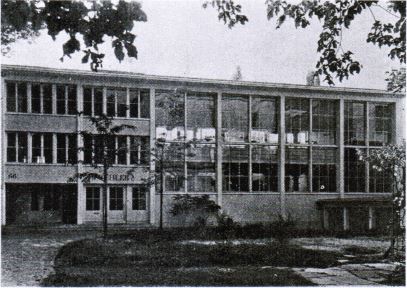

For more information about this building, see: https://www.mdpi.com/about/headquarters
21 June 2016
"Behind the Scenes of Academic Publishing—A Publisher's Perspective" - MDPI's Lecture at the University of Basel
From the 15-16 September, 2016, MDPI will run a course on Academic Publishing at the University of Basel.
In this two day workshop, MDPI will look in detail at the role performed by academic journal publishers and how they interact with academics. Ethical dimensions, what happens when problems occur and how the publisher coordinates all aspects of the submission process will also be covered.
For more detailed information about the program, trainers and registration please visit the course webpage.
14 June 2016
2015 Impact Factors Released
We are pleased to report the 2015 Journal Impact Factors in the latest Journal Citation Reports® Science Edition, published by Thomson Reuters in June 2016. Twenty out of 25 journals have seen an increase in their Impact Factor and two journals (Crystals and IJGI) received a first Impact Factor. Coatings was recently added to SCIE and will receive its first Impact Factor in next year’s JCR.
Updated Impact Factors for Journals in the Science Citation Index Expanded (SCIE)
| Journal | 2015 Impact Factor | Details | Category Rank |
| Applied Sciences | 1.726 | Link | 83/163 (Q3) in ‘Chemistry, Multidisciplinary’; 129/271 (Q2) in ‘Materials Science, Multidisciplinary’; 64/145 (Q2) in ‘Physics, Applied’ |
| Atmosphere | 1.221 | Link | 66/84 (Q4) in ‘Meteorology & Atmospheric Sciences’ |
| Catalysts | 2.964 | Link | 53/144 (Q2) in ‘Chemistry, Physical’ |
| Energies | 2.077 | Link | 43/88 (Q2) in ‘Energy & Fuels’ |
| Entropy | 1.743 | Link | 25/79 (Q2) in ‘Physics, Multidisciplinary’ |
| Forests | 1.583 | Link | 19/66 (Q2) in ‘Forestry’ |
| Genes | 3.242 | Link | 60/165 (Q2) in ‘Genetics & Heredity’ |
| International Journal of Environmental Research and Public Health (IJERPH) | 2.035 | Link | 101/225 (Q2) in ‘Environmental Sciences’ |
| International Journal of Molecular Sciences (IJMS) | 3.257 | Link | 110/289 (Q2) in ‘Biochemistry & Molecular Biology’; 51/163 (Q2) in ‘Chemistry, Multidisciplinary’ |
| Marine Drugs | 3.345 | Link | 13/59 (Q1) in ‘Chemistry, Medicinal’ |
| Materials | 2.728 | Link | 63/271 (Q1) in ‘Materials Science, Multidisciplinary’ |
| Metals | 1.574 | Link | 18/73 (Q1) in ‘Metallurgy & Metallurgical Engineering’; 145/271 (Q3) in ‘Materials Science, Multidisciplinary’ |
| Micromachines | 1.295 | Link | 30/56 (Q3) in ‘Instruments & Instrumentation’ 63/83 (Q4) in ‘Nanoscience & Nanotechnology’ |
| Minerals | 1.468 | Link | 9/21 (Q2) in ‘Mining & Mineral Processing; 14/29 (Q2) in ‘Mineralogy’ |
| Molecules | 2.465 | Link | 24/59 (Q2) in ‘Chemistry, Organic’ |
| Nanomaterials | 2.690 | Link | 64/271 (Q1) in ‘Materials Science, Multidisciplinary’; 36/83 (Q2) in ‘Nanoscience & Nanotechnology’ |
| Nutrients | 3.759 | Link | 16/78 (Q1) in ‘Nutrition & Dietetics’ |
| Polymers | 2.944 | Link | 20/85 (Q1) in ‘Polymer Science’ |
| Remote Sensing | 3.036 | Link | 5/28 (Q1) in ‘Remote Sensing’ |
| Sensors | 2.033 | Link | 36/75 (Q2) in ‘Chemistry, Analytical’; 16/27 (Q3) in ‘Electrochemistry’; 12/56 (Q1) in ‘Instruments & Instrumentation’ |
| Sustainability | 1.343 | Link | 146/225 (Q3) in ‘Environmental Sciences’; 22/29 (Q4) in ‘Green & Sustainable Science & Technology’ |
| Symmetry | 0.841 | Link | 31/63 (Q2) in ‘Multidisciplinary Sciences’ |
| Toxins | 3.571 | Link | 16/89 (Q1) in ‘Toxicology’ |
| Viruses | 3.042 | Link | 14/33 (Q2) in ‘Virology’ |
| Water | 1.687 | Link | 33/85 (Q2) in ‘Water Resources’ |
Journals with First Impact Factors
| Journal | 2015 Impact Factor | Details | Category Rank |
| Crystals | 2.075 | Link | 13/26 (Q2) in ‘Crystallography’ |
| ISPRS International Journal of Geo-Information | 0.651 | Link | 45/49 (Q4) in ‘Geography, Physical’; 26/28 (Q4) in ‘Remote Sensing’. |
26 May 2016
Institutional Membership established with University of Bremen, Germany, Koç University, Turkey, IIASA, Austria and Jilin University and Kunming Institute of Botany, CAS, China
We are pleased to announce that the following institutions have joined MDPI's institutional membership program in May 2016:
- Unversity of Bremen, Germany
- Koç University, Turkey
- International Institute for Applied Systems Analysis (IIASA), Austria
- Jilin University, China
- Kunming Institute of Botany, Chinese Academy of Sciences, China
Authors affiliated with these institutions will benefit from a 10% discount on the article processing charges.
Additional details can be found on our institutional membership page.
23 May 2016
Institutional Membership Established with the KTH Royal Institute of Technology, Sweden and the South China University of Technology, Beijing University of Technology and Southern Medical University, China
We are pleased to announce that the following institutions have joined MDPI's institutional membership program in April and May 2016:
- KTH Royal Institute of Technology, Sweden
- South China University of Technology, China
- Beijing University of Technology, China
- Southern Medical University, China
Authors affiliated with these institutions will benefit from a 10% discount on the article processing charges.
Additional details can be found on our institutional membership page.
26 April 2016
New Section on www.mdpi.com - Latest Books
You may have noticed a new section that is now visible on our home page. This section is called "Latest Books" and showcases recent publications from MDPI Books, our book publishing service.
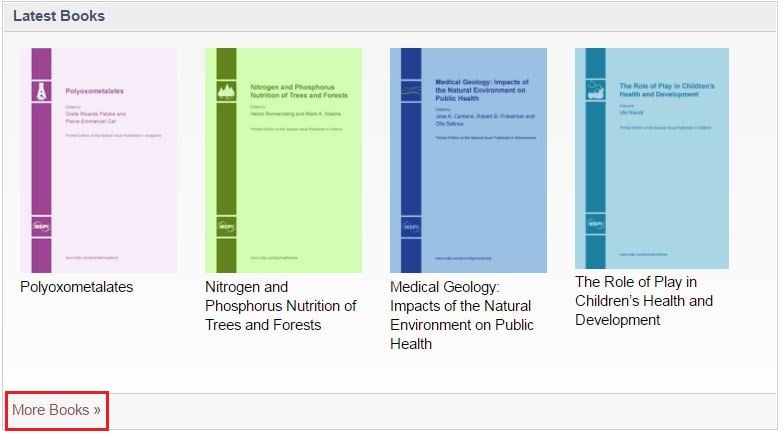
By clicking on the hyperlink "More Books" you will be taken to the MDPI Books Home Page. There you will find more information about the service, as well as the "Recent Publications" list.
Clicking on any of the book images in this list will take you to detailed information about that book (shown below). Here you can also download a PDF version of the book, or order a hardcover printed copy.
For further information about the MDPI Books service, please visit the webpage or contact books@mdpi.com.
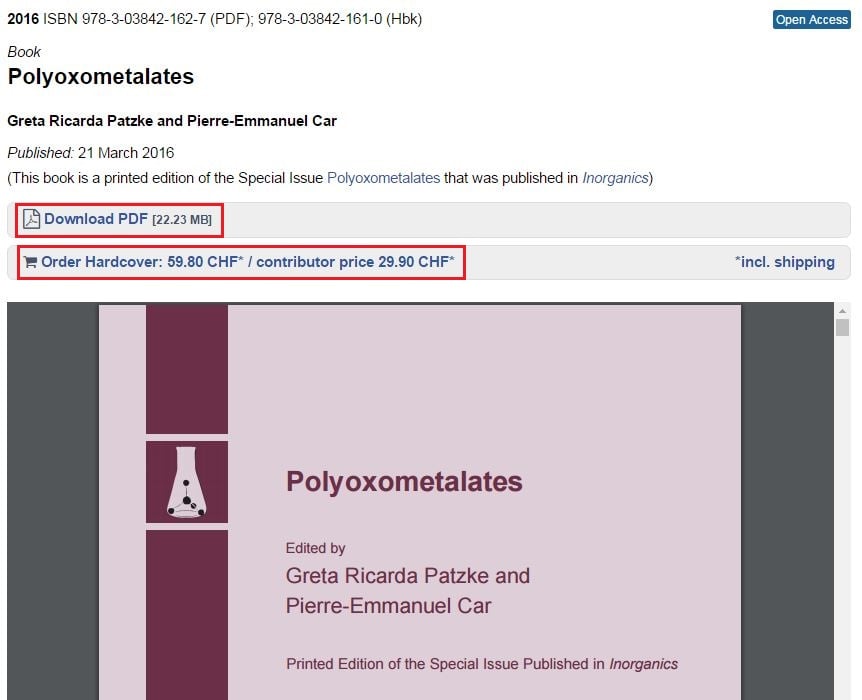
31 March 2016
Axioms, Behavioral Sciences, Photonics, Separations and Toxics added to the Emerging Sources Citation Index in Web of Science
We are pleased to announce that the journals Axioms, Behavioral Sciences, Photonics, Separations and Toxics were recently accepted for inclusion in the newly launched Emerging Sources Citation Index (ESCI) in Web of Science.
ESCI serves to highlight promising journals which are still under consideration for the Science Citation Index Expanded (SCIE) or the Social Sciences Citation Index (SSCI).
The Emerging Sources Citation Index (ESCI), Science Citation Index Expanded (SCIE), Social Sciences Citation Index
(SSCI), and Web of Science™ (WoS) are Thomson Reuters products.
30 March 2016
Institutional Membership established with the University of Winchester, UK, Silesian University of Technology, Poland and Beijing Jiaotong University and Zhejiang University, China
We are pleased to announce that the University of Winchester, UK, the Silesian University of Technology, Poland and Beijing Jiaotong University and Zhejiang University, China, have joined our Institutional Membership program. Primary authors from these universities will benefit from a 10% discount on article processing charges.
Additional details can be found on our institutional membership page.
24 March 2016
New Editorial Office in Barcelona, Spain
We are excited to announce the opening of our new editorial office in Barcelona, Spain. The launch team is led by a Senior Editor and comprises further staff holding doctoral degrees with several years of research experience. The new editorial team will help us to get closer to European research communities and progress Sciforum, the platform to support the scientific community via conference hosting and other functions. They will also help spread the word about Open Access and meet academics at scientific events.
We are in the process of hiring more doctoral and masters graduates to join the editorial team and welcome applications via jobs@mdpi.com. For contact details about the office, see our contact page.

22 February 2016
Membership Established with the Max Planck Society
We are pleased to announce that the Max Planck Digital Library (MPDL) has signed an agreement with MDPI to support authors associated with the Max Planck Society (Max-Planck-Gesellschaft). As of 22 February 2016, corresponding authors will receive full funding from the MPDL for articles published in MDPI journals, with a 10% discount applied to the Article Processing Charges. Additional details can be found at our institutional membership page.
Founded in 1948, The Max Planck Society is one of Germany’s leading research organizations, and is currently made up of 83 institutes conducting basic research in natural sciences, life sciences, social sciences and humanities. 18 Nobel laureates have emerged from its ranks of scientists and the society has more than 15,000 publications in scientific journals each year.
5 February 2016
Institutional Membership Extension: Wageningen University, CSIC, University of Zürich, ETH Zürich, University of Tübingen and Osnabrück University
We are pleased to announce that Wageningen University, the Netherlands, the Spanish National Research Council (CSIC), Spain, the University of Zürich and ETH Zürich, Switzerland, and the University of Tübingen and Osnabrück University, Germany, have not only renewed their institutional memberships with MDPI after two years of successful cooperation, but have also increased the reduction of the article processing charges (APCs) for affiliated authors to 25%.
Additional details can be found on our institutional membership page.
5 February 2016
Institutional Membership established with Brock University, Canada and the University of Pisa, Italy
We are pleased to announce that Brock University, Cananda, and the University of Pisa, Italy, have joined MDPI's institutional membership program: Primary authors from these universities will benefit from a 10% discount on the article processing charges as of 01 February 2016.
Additional details can be found on our institutional membership page.
25 January 2016
MDPI Sponsors diss:kurs with the University of Basel
MDPI is pleased to announce its newly established sponsorship of diss:kurs, an event coordinated by the University of Basel to support their doctorate program. For more information about the event and how to register, please visit the diss:kurs webpage.
7 January 2016
New Institutional Memberships Established with Tsinghua University, the Chinese Society of Micro-Nano Technology, Ruhr University Bochum and the University of Ulm
We are pleased to announce that the following institutions have joined MDPI's institutional membership program as of 1 January 2016:
- Tsinghua University, China
- Chinese Society of Micro-Nano Technology (CSMNT)
- Ruhr University Bochum, Germany
- University of Ulm, Germany
Authors affiliated with these institutions will benefit from a 10% discount on the article processing charges.
Additional details can be found on our institutional membership page.
5 January 2016
Safety, Fermentation, C-Journal of Carbon Research, Magnetochemistry, Batteries and Horticulturae Released Their First Issue in December 2015
We are pleased to announce that MDPI's open access journals Safety, Journal of Imaging, Fermentation, C-Journal of Carbon Research, Magnetochemistry, Batteries and Horticulturae released their first issue at the end of December 2015.
17 December 2015
Institutional Membership Extension: University of Bern, Switzerland
We are pleased to announce that the University of Bern, Switzerland has not only renewed their institutional membership with MDPI after two years of successful cooperation, but also increased the reduction of the article processing charges (APCs) for affiliated authors to 25%.
17 December 2015
Institutional Membership with the University of Ulm and Helmholtz Zentrum Munich
We are pleased to announce that University of Ulm, Germany and Helmholtz Zentrum Munich, Germany has joined MDPI's institutional membership program:
Primary authors from the University of Ulm and Helmholtz Zentrum Munich will benefit from a 10% discount on the article processing charges as of 1 January 2016. Additional details can be found on our institutional membership page.
9 December 2015
Membership Established with the Virginia Polytechnic Institute and State University (Virginia Tech)
We are pleased to announce that Virginia Tech has joined MDPI's institutional membership program. Authors from Virginia Tech will benefit from a 10% discount on the article processing charges as of 1 December 2015. Additional details can be found on our institutional membership page.
1 December 2015
Membership Established with the Technical University of Denmark and the University of North Florida
We are pleased to announce that the following universities have joined MDPI's institutional membership program:
- Technical University of Denmark (as of 1 November 2015)
- University of North Florida, USA (as of 15 November 2015)
Primary authors from the Technical University of Denmark and the University of North Florida will benefit from a 10% discount on the article processing charges.
Additional details can be found on our institutional membership page.
16 November 2015
Emerging Sources Citation Index (ESCI) Launched in Web of Science™
The Emerging Sources Citation Index (ESCI) has been launched by Thomson Reuters as a new index in Web of Science™ alongside the established Science Citation Index Expanded (SCIE) and Social Sciences Citation Index (SSCI). Web of Science™ thereby continues to reflect the growing importance of Open Access scholarly literature as nearly half of the newly incorporated journals are Open Access journals.
We are pleased to announce that 32 journals published by MDPI were selected for inclusion in the Emerging Sources Citation Index (ESCI). Articles published after 1 January 2015 now appear in ESCI and Web of Science™. This will bring higher visibility to the published research, while they will continue to be under evaluation for SCIE or SSCI.
The following MDPI journals are covered by ESCI:
| Journal Title |
Established | About the Journal |
| Algorithms | 2008 | Link |
| Agriculture | 2011 | Link |
| Agronomy | 2011 | Link |
| Biomolecules | 2011 | Link |
| Brain Sciences | 2011 | Link |
| Diagnostics | 2011 | Link |
| Membranes | 2011 | Link |
| Metabolites | 2011 | Link |
| Antibiotics | 2012 | Link |
| Antibodies | 2012 | Link |
| Antioxidants | 2012 | Link |
| Arts | 2012 | Link |
| Computers | 2012 | Link |
| Electronics | 2012 | Link |
| Foods | 2012 | Link |
| Journal of Clinical Medicine | 2012 | Link |
| Pathogens | 2012 | Link |
| Plants | 2012 | Link |
| Atoms | 2013 | Link |
| Chemosensors | 2013 | Link |
| Climate | 2013 | Link |
| Computation | 2013 | Link |
| Economies | 2013 | Link |
| Fibers | 2013 | Link |
| International Journal of Financial Studies | 2013 | Link |
| Journal of Developmental Biology | 2013 | Link |
| Mathematics | 2013 | Link |
| Processes | 2013 | Link |
| Publications | 2013 | Link |
| Risks | 2013 | Link |
| Systems | 2013 | Link |
| Vaccines | 2013 | Link |
The Emerging Sources Citation Index (ESCI), Science Citation Index Expanded (SCIE), Social Sciences Citation Index (SSCI), and Web of Science™ (WoS) are Thomson Reuters products.
2 October 2015
Membership Established with the University of Freiburg and the University of Regensburg
We are pleased to announce that the following universities have joined MDPI's institutional membership program:
University of Freiburg, Germany
University of Regensburg, Germany
Primary authors from the University of Freiburg and the University of Regensburg will benefit from a 10% discount on the article processing charges as of 1 October 2015 and 1 November 2015.
Additional details can be found on our institutional membership page.
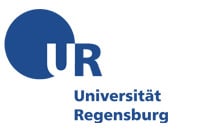







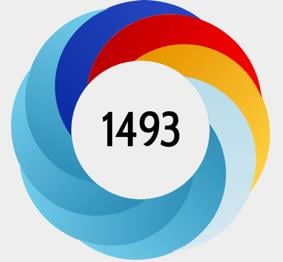
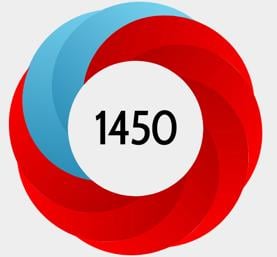
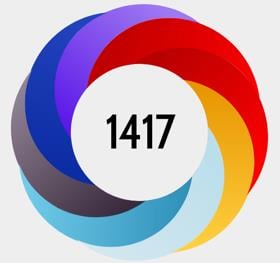

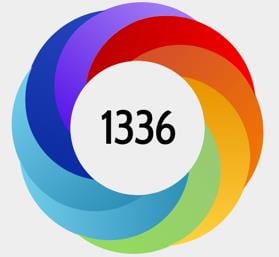

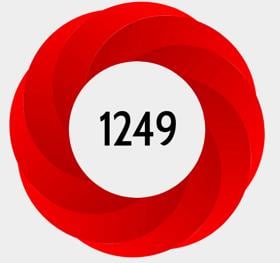

















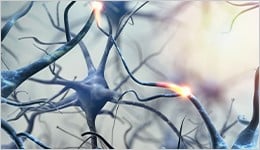

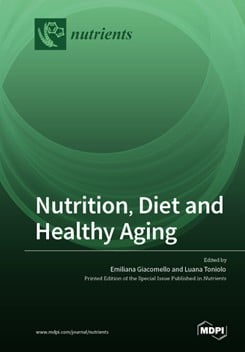

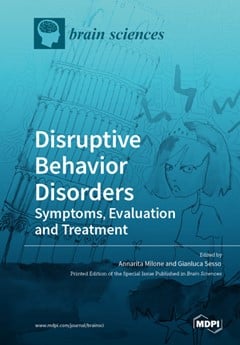
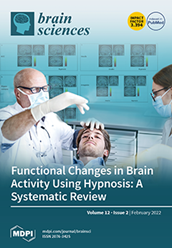
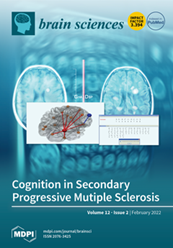
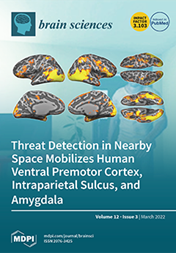
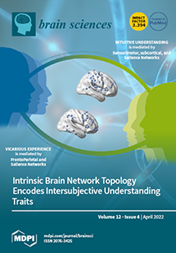
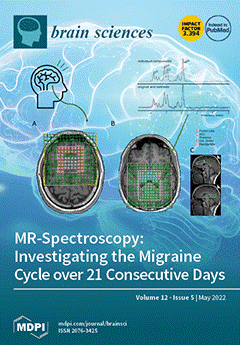
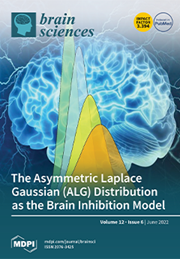
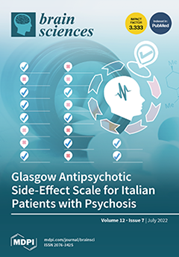
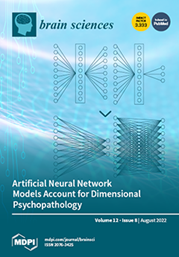
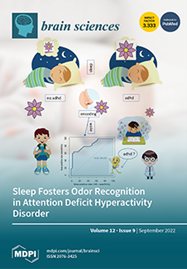
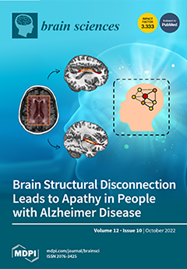

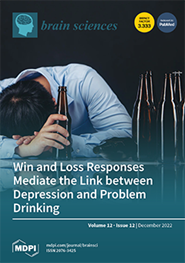
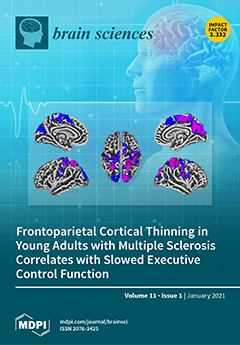

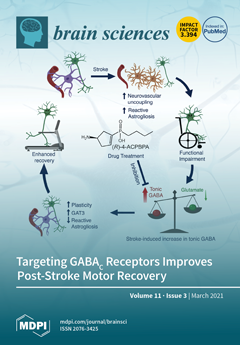
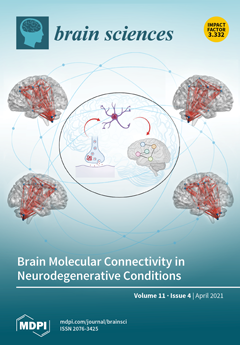
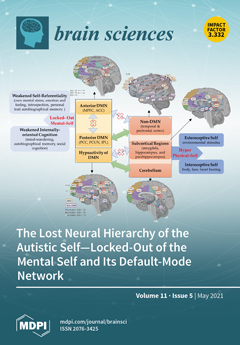
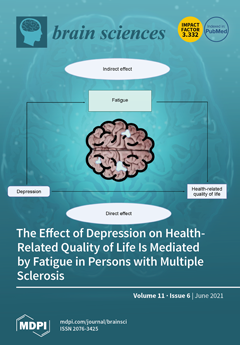
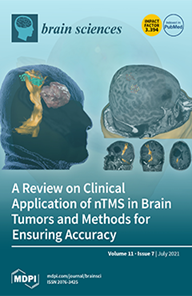
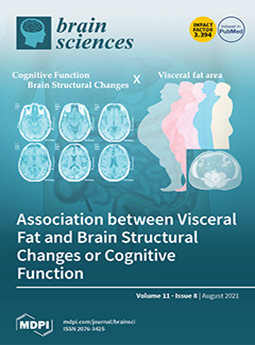
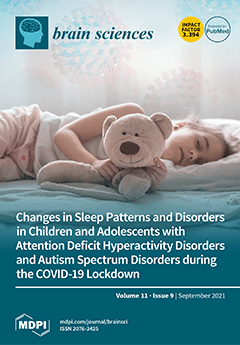

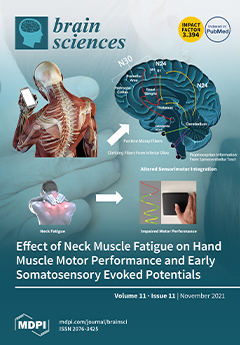
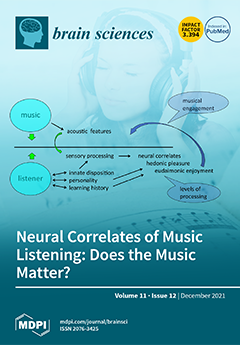





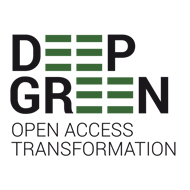





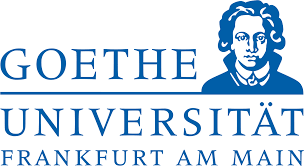





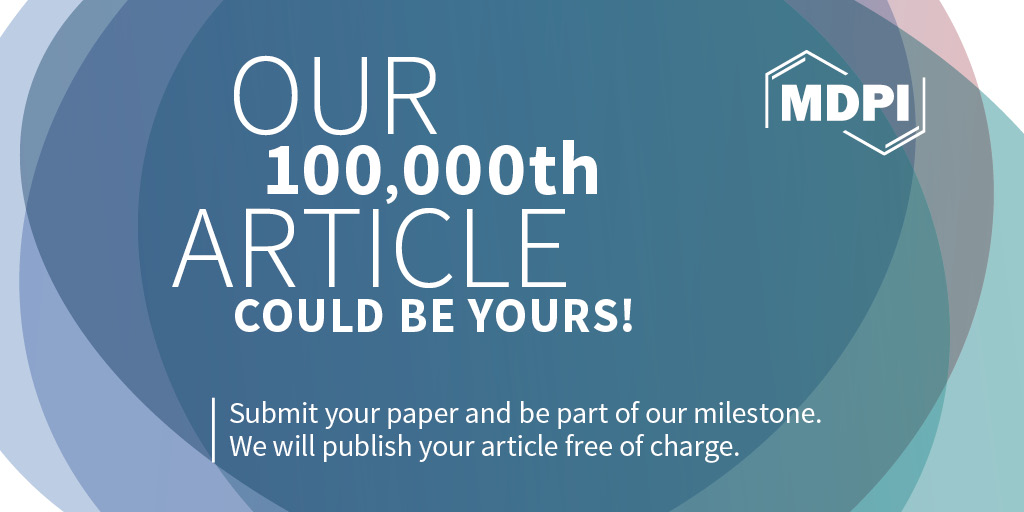



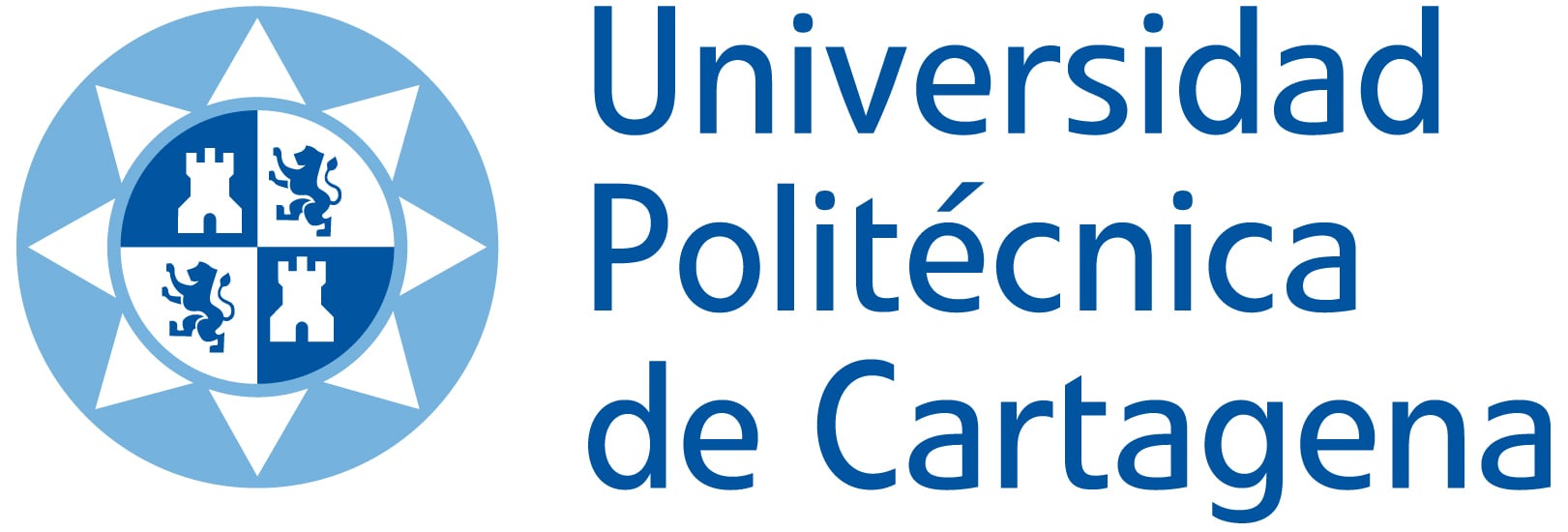
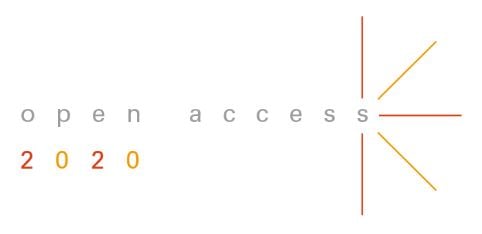



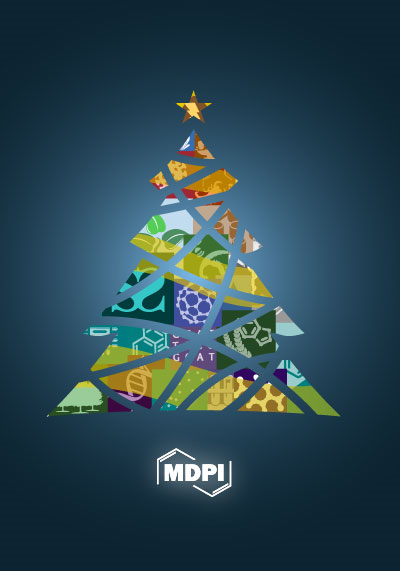





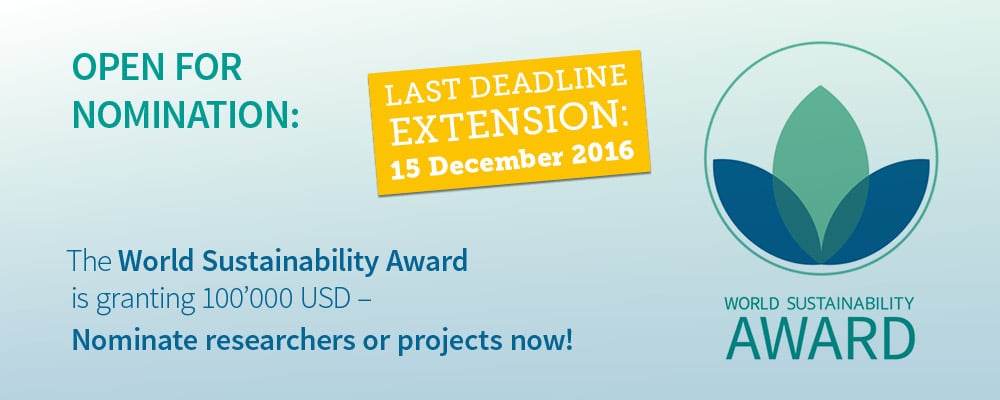



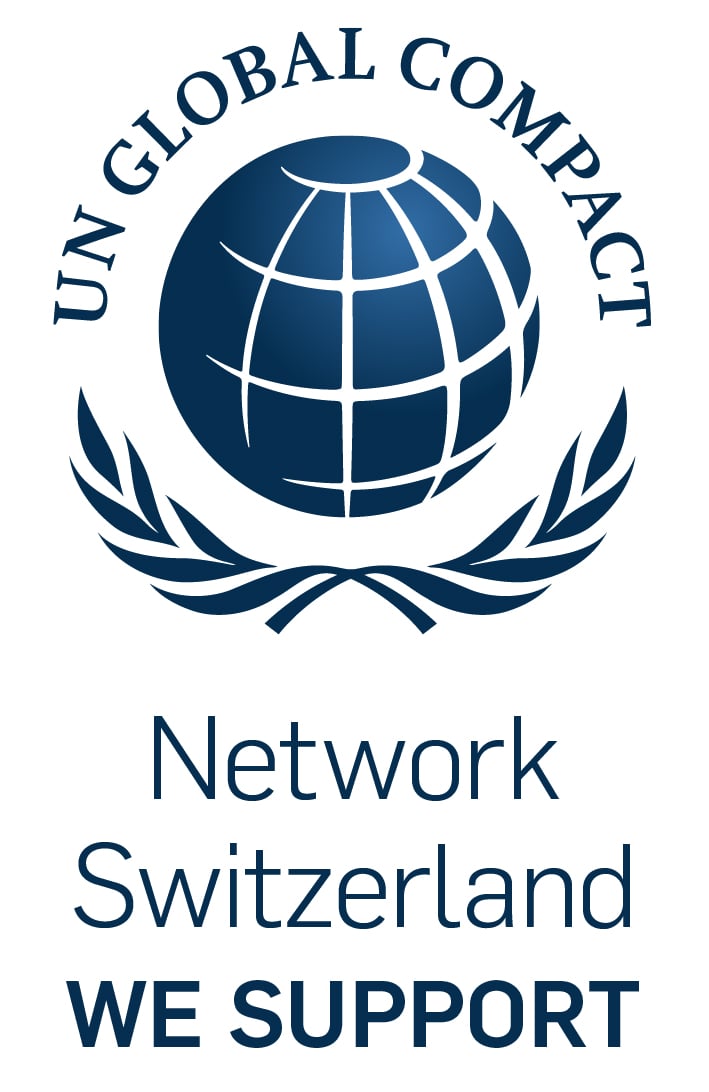
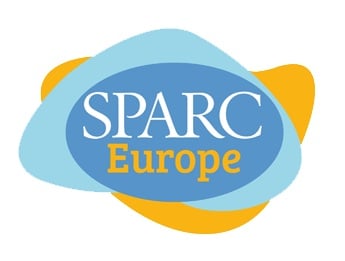
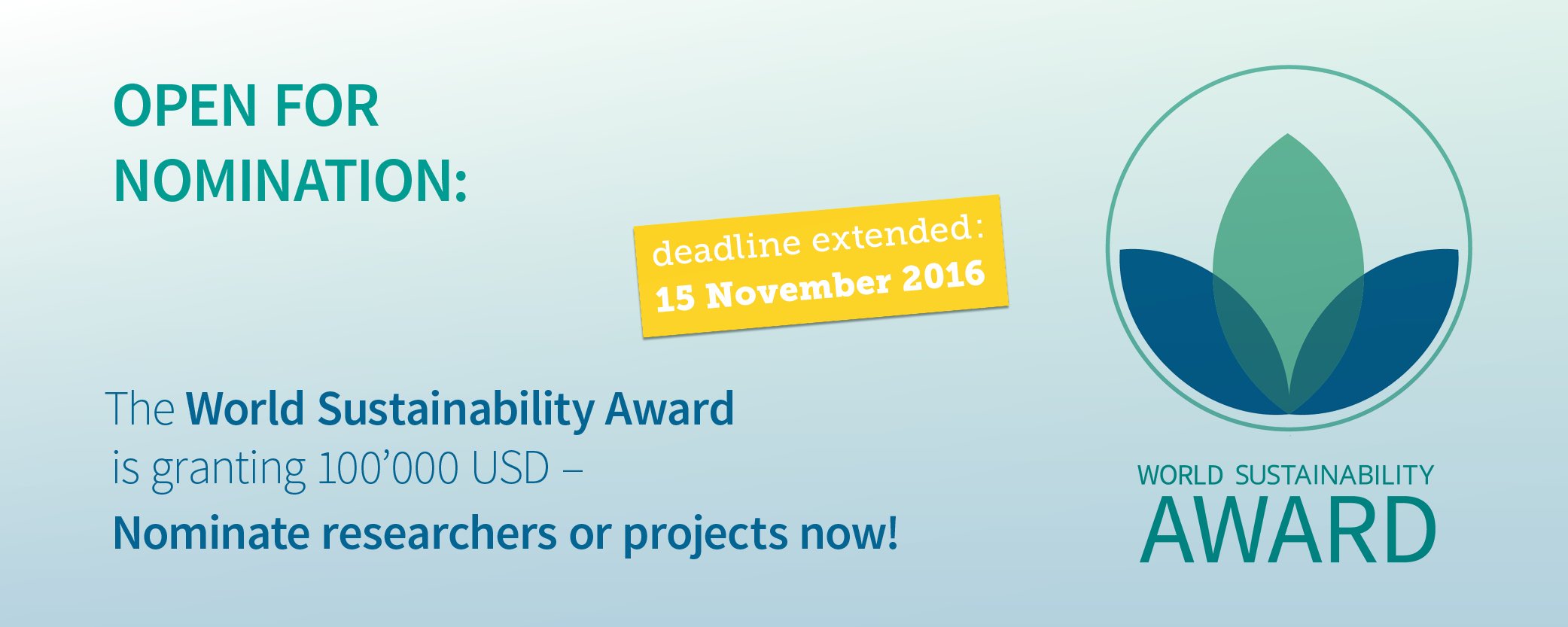 .
.